Welcome to Essential Politics, our in-the-moment look at California political and government news.
You’ll find coverage of the 13 congressional races key to the midterm elections, the race to be California’s next governor and what’s happening in Sacramento. Learn what California’s members of Congress are worth.
Visit Essential Washington for coverage of the White House and goings on in the nation’s capital.
Sign up for our free newsletter for analysis and more, and subscribe to the California Politics Podcast. Share your feedback here. To support in-depth journalism, subscribe to The Times. And don’t miss our Essential Politics page in Sunday’s California section.
Gavin Newsom releases ad that highlights his push to allow same-sex couples to marry
A new ad from Democratic gubernatorial candidate Gavin Newsom features Phyllis Lyon, who with her partner, Del Martin, received the first marriage license after Newsom vowed to allow same-sex couples to marry when he was mayor of San Francisco in 2004.
The current lieutenant governor’s push for marriage equality thrust him into the national spotlight and he has emphasized that effort to portray himself as a bold, progressive leader.
Failed California housing bill was ‘not a bad idea,’ Gov. Jerry Brown says
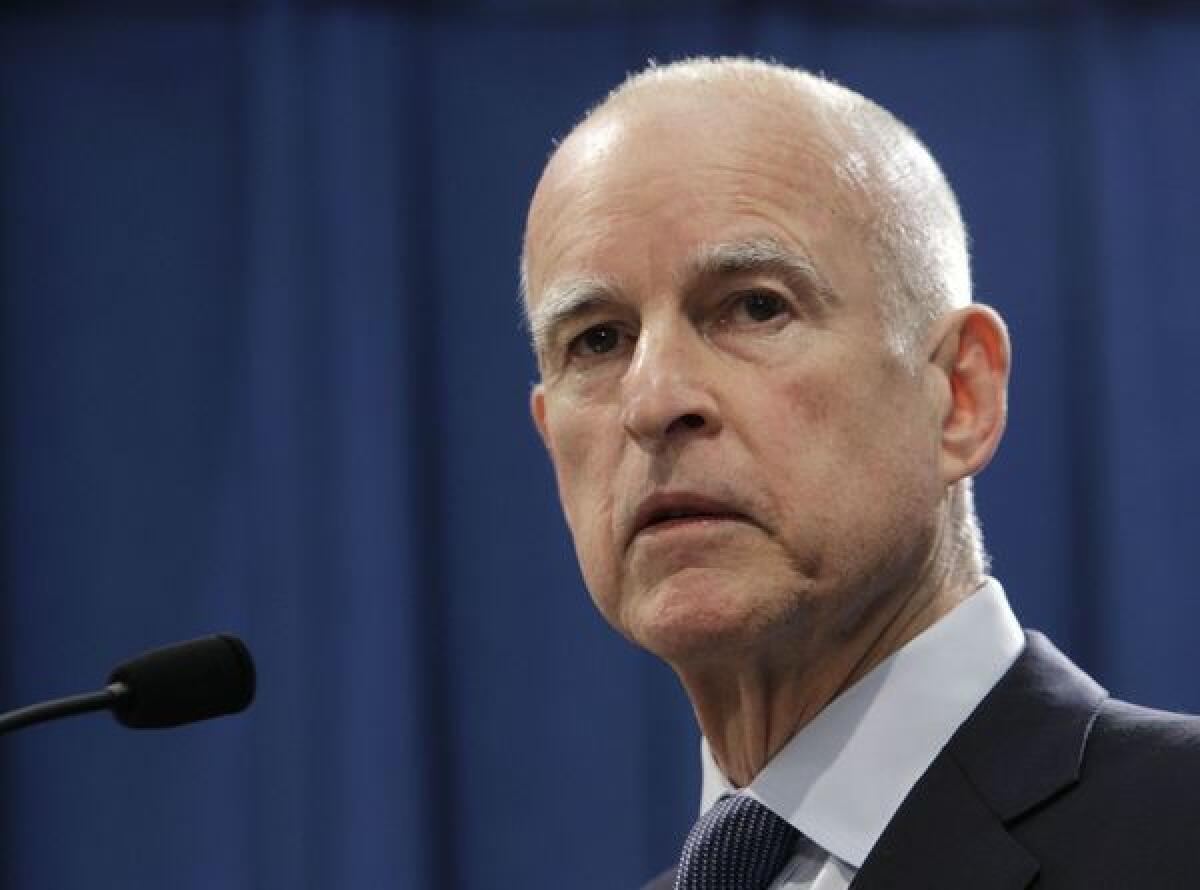
Earlier this month, high-profile housing legislation that would have allowed for four- to five-story apartments and condominiums near transit stops failed to advance in the state Legislature. But had it reached his desk, would Gov. Jerry Brown have signed it? Maybe.
“I think that was not a bad idea,” Brown said of Senate Bill 827 at a meeting with business leaders from the Bay Area Council on Monday afternoon.
The bill, written by Sen. Scott Wiener (D-San Francisco), attracted national attention and a maelstrom of opposition in part because it would have eliminated single-family zoning near transit stops in favor of apartments or condominiums. Brown said that a relative of his who lives in West Portal, a low-density neighborhood in San Francisco, told the governor he was “horrified” by the bill.
Brown also lamented dramatically rising housing costs. He said he bought his first house in Los Angeles in 1973 for $75,000 at a time when his salary as secretary of state was $35,000. Now, he said, buying a house for a little over twice one’s annual salary is virtually impossible anywhere in the state.
FOR THE RECORD
May 1, 9:32 a.m.: This post originally misstated the year Brown purchased his house as 1970. It was 1973.
John Cox begins California barnstorm with the delivery of gas tax repeal signatures
GOP gubernatorial candidate John Cox strolled up to the stack of 12 boxes in front of the Los Angeles County registrar-recorder’s offices in Norwalk on Monday and placed his hands on top of his party’s hope for success in 2018.
The boxes, stacked four across and three high, contained 211,000 signatures for an initiative to repeal recent increases in California’s gas tax and vehicle fees.
Cox says the effort has gathered more than 940,000 signatures from registered voters to put the measure on the ballot — far more than the 585,407 signatures that are required.
The aim: to bring out the party’s base to the polls this November and help candidates in tough congressional and legislative races down the ticket.
A USC Dornsife/Los Angeles Times poll in November found 54.2% of registered voters surveyed said they would repeal the tax and fee hike, but a survey a month earlier by another group said a majority would vote to keep the higher taxes.
Cox was flanked by Bill Essayli, a former federal prosecutor who is challenging Democratic Assemblywoman Sabrina Cervantes of Riverside in the June primary.
Cervantes voted for the gas tax and Essayli plans to use that vote against her. He even launched his campaign at a 76 gas station in Norco.
“This is a central issue in my campaign,” he said.
Cox also submitted signatures in San Diego on Monday and is headed to Bakersfield, Fresno and Sacramento, as well as Shasta and Butte counties in coming days.
“We are going all across the state,” Cox said. “The whole state is paying this tax and the whole state wants it gone.”
All Californians would be able to serve on state boards — even people in the U.S. illegally — under new bill
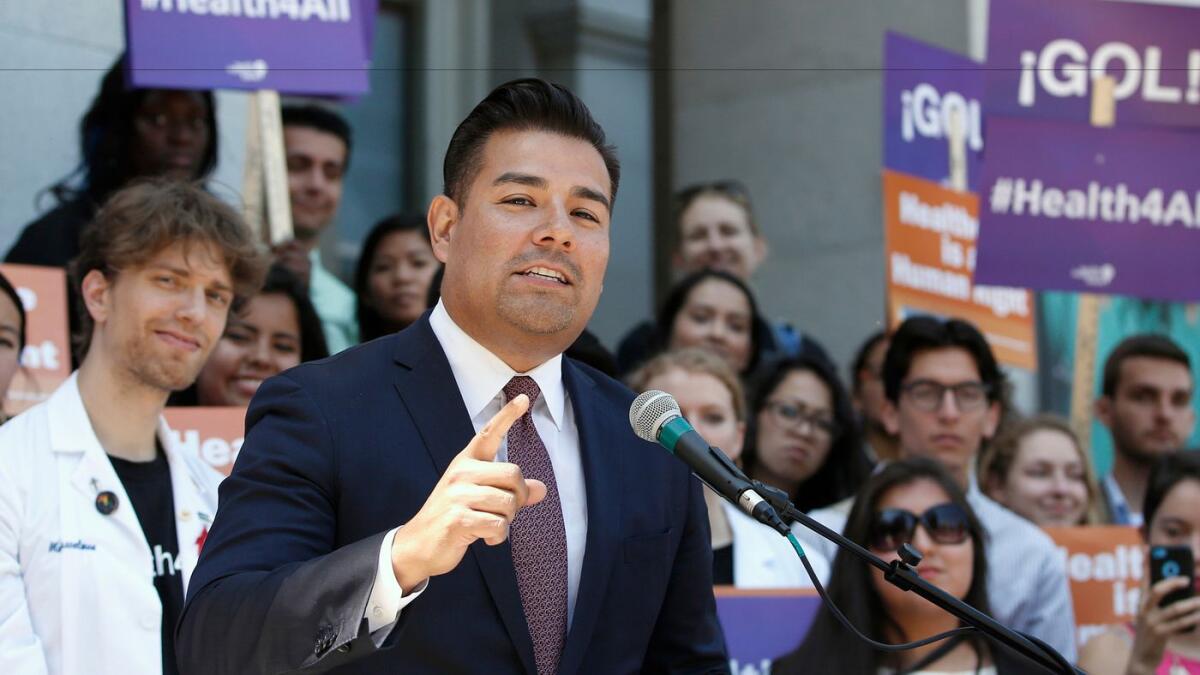
State lawmakers on Monday introduced legislation that would allow all Californians to serve on state boards and commissions regardless of immigration status.
Senate Bill 174, by Sen. Ricardo Lara (D-Bell Gardens) and Assemblywoman Wendy Carrillo (D-Los Angeles), comes as the state is locked in a broader legal battle with the Trump administration over state immigration laws and his call for mass deportations. Lawmakers point to what they say is the state’s own discriminatory history as their basis for introducing the legislation.
The proposal would amend an 1872 provision that was first adopted to exclude Chinese immigrants and other “transient aliens” from holding appointed civil positions. At the time, antipathy toward the Chinese had been building in California, though, Chinese immigrants opened hundreds of businesses across the state and would play a critical role in building the transcontinental railroad.
The Senate bill would delete the phrase “transient aliens” from the government code and make clear that any person, regardless of citizenship or immigration status, can hold an appointed civil office if they are at least 18 years old and a resident of the state. That would allow any Californian to serve on hundreds of boards and commissions that advice in an array of policy areas, including farm labor, history and employment development.
“California’s two million undocumented immigrants are a source of energy for our state,” Lara said in a statement. “It is shocking to read the words of fear and exclusion that are still in California law but belong in history’s trash can.”
Tony Mendoza’s fundraising dries up after resignation amid harassment inquiry
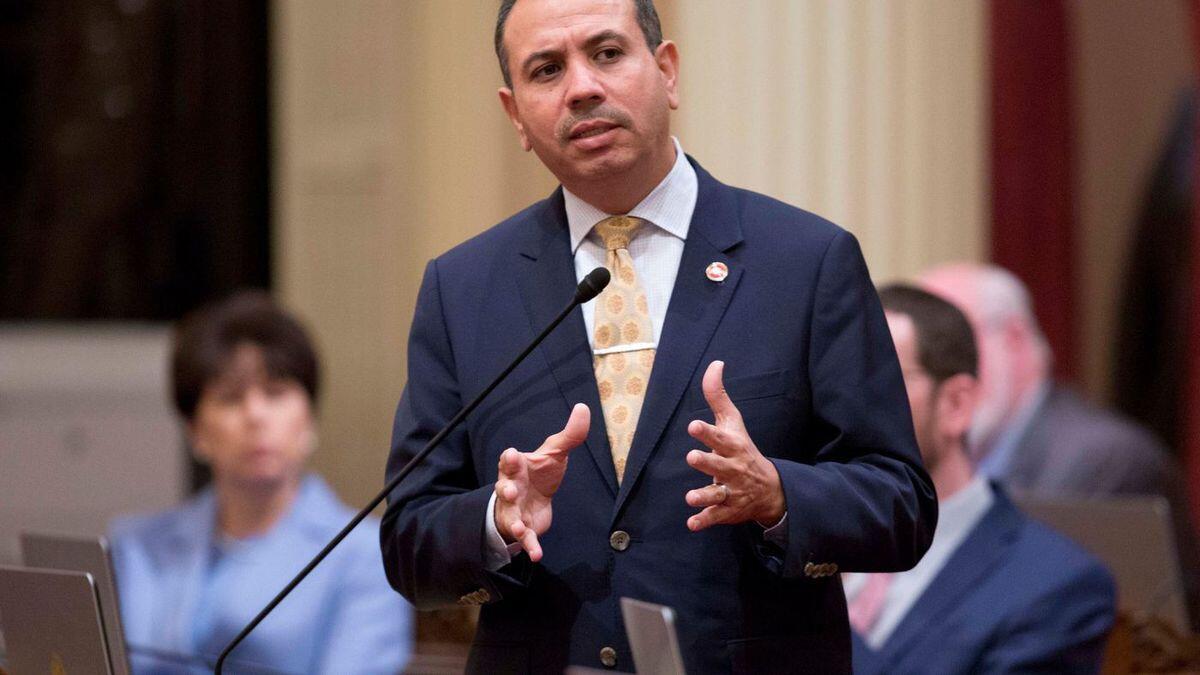
Political contributions to Tony Mendoza, who resigned from the state Senate under pressure amid sexual harassment allegations, have nearly dried up. New documents he filed with the state in his bid to reclaim the seat he once held show that his support has eroded.
As a result, five other candidates for the 32nd District senate seat in the June 5 election have raised more than Mendoza so far this year. With the June 5 election approaching, Mendoza has reported raising just $7,750 in cash from six supporters during the nearly four-month period from Jan. 1 to April 21.
Mendoza, a Democrat from Artesia, went on a leave of absence from the Senate Jan. 3 and resigned a month later under the threat of expulsion from colleagues. An investigation ordered by the Senate found a pattern of “unwanted flirtatious or sexually suggestive behavior” based on testimony from six women. Mendoza has denied wrongdoing.
Last year, Mendoza’s reelection campaign raised $412,600, or an average of about $34,000 per month, from more than 350 supporters.
Most of Mendoza’s 2018 total was contributed by the political arm of the Southern California Pipe Trades District Council 16 on Jan. 22, a month before Mendoza resigned. Mendoza also reported that his campaign loaned $125,000 this year to his legal defense fund. That left him with $446,600 in his campaign account at the end of April.
Mendoza is running against eight Democrats and two Republicans. Democrat Bob J. Archuleta, a Pico Rivera city councilman, raised the most, $210,000, during the period.
On Monday, Mendoza suffered another setback when the State Legislative Women’s Caucus endorsed Democrat Vicky Santana, a member of the Rio Hondo College Board.
Newsom and Villaraigosa affairs coming to TV ads in California
An independent political committee backing Republican John Cox for governor released an ad blasting both Lt. Gov. Gavin Newsom and former Los Angeles Mayor Antonio Villaraigosa for their past sexual affairs.
The “California Deserves Better” ad, which was first reported by Politico, criticizes Newsom for having an affair with a woman on his staff in 2005 while he served as mayor of San Francisco. It also goes after Villaraigosa for having an extramarital affair with a television reporter in 2007 while he was mayor of Los Angeles.
The ad, which begins airing on Fox stations in the state’s top media markets Monday, links Newsom and Villaraigosa to the men accused of sexual impropriety in the #MeToo movement, including movie mogul Harvey Weinstein and disgraced “Today” show veteran Matt Lauer.
“Powerful men are finally being held to account, punished for inappropriate sexual conduct with women over whom they exercise power,” the ad begins. “…Newsom and Villaraigosa think the rules shouldn’t apply to them.”
The independent campaign committee, called Restore Our Values, already has raised more than $100,000, said Leigh Teece of Emeryville in Northern California, co-founder of the group.
Teece, the CEO of a nonprofit that helps line up students with professional mentors, said the campaign will actively support Cox. She called him a “true conservative” and noted that he supports cutting taxes and opposes California’s sanctuary state policy.
“John is a business person who has demonstrated integrity,” Teece said.
Was that Cisneros in the voicemail? Dispute is latest espisode of Democratic infighting in crowded primary races
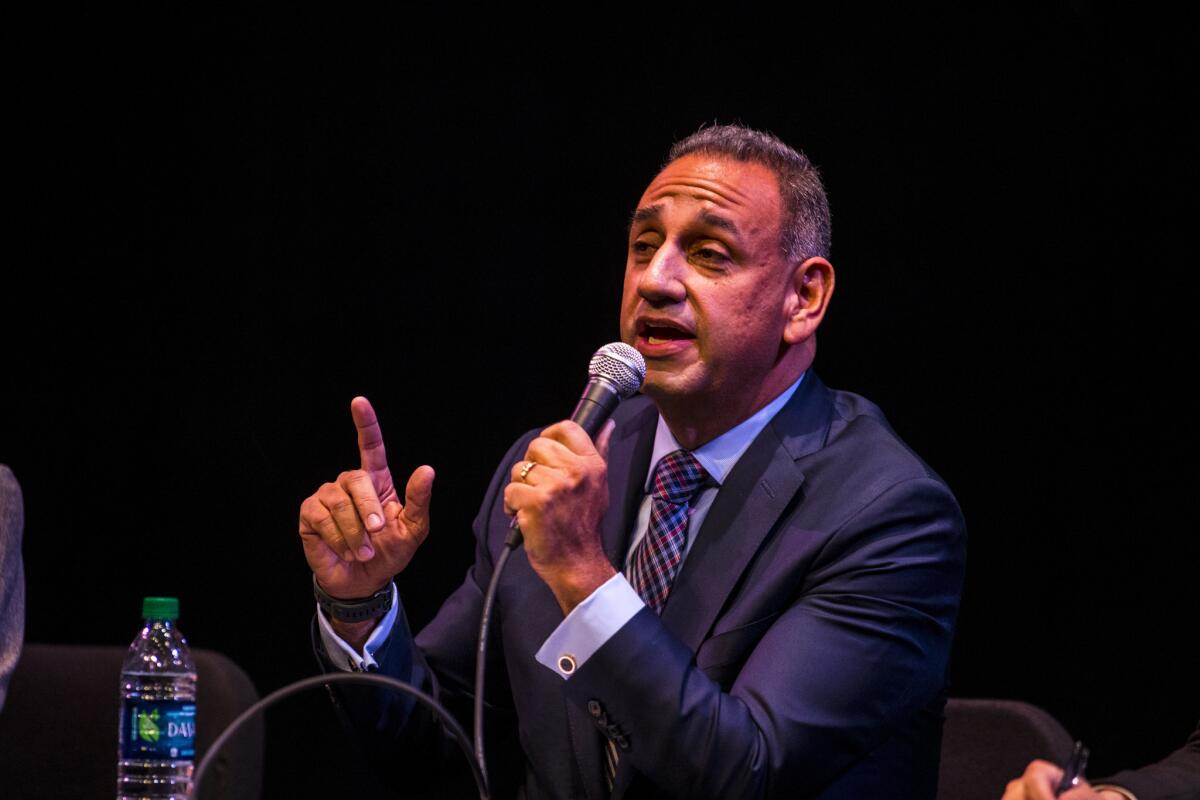
With less than five weeks to go before California’s primary, insults and accusations are flying with abandon in the most crowded races Democrats hope to ultimately win.
The latest example of this is in the 39th Congressional District, where a half dozen Democrats are vying for a chance to replace Rep. Ed Royce, who’s retiring.
It’s one of several California contests where Democratic leaders are already worried that divisions could ultimately split votes and shut Democrats out of key pickup opportunities.
In that race, millionaires Gil Cisneros and Andy Thorburn are going negative … about going negative. Cisneros was recently elevated to the Democratic Congressional Campaign Committee’s “Red to Blue” program in hopes it would serve as a signal to Democratic activists and donors that his campaign was the most viable. But both Cisneros and Thorburn have poured millions into the race, which promises to be a knock down, drag out fight through June 5.
At the center of the latest controversy is a voicemail, allegedly left by Cisneros on Thorburn’s home answering machine earlier this month.
The recording, which the Thorburn campaign turned over to media outlet The Intercept, lasts less than 10 seconds. “Hi Andy, it’s Gil Cisneros. I’m gonna go negative on you,” a man’s voice is heard saying.
Cisneros’ campaign manager Orrin Evans denied the candidate made the call, posting a cease and desist letter to The Intercept on Twitter. The letter, sent by a Cisneros campaign attorney, called the voicemail “fabricated” and demanded that the story be taken down, calling it “defamatory.” It gave the publication until 3 p.m. Friday to take down the story before they “pursue all legal rights and remedies.”
An attorney for The Intercept, in a letter to Cisneros, said the publication confirmed with “multiple sources familiar with Mr. Cisneros” that his voice was on the recording, and that it stands by its reporting.
Thorburn’s camp says it “flatly rejects” Cisneros’ denial, and that the timing of a negative website filled with unflattering background on Thorburn, released three days later, suggests it was him.
Track the California races that could flip the House
According to The Intercept’s report, Cisneros’ campaign manager did not respond to initial inquiries about the voicemail, calling its questions “ridiculous.” In a follow-up statement Friday, Evans said called the episode a “dirty, desperate trick” by the Thorburn campaign and said they are “readying to pursue legal action for defamation and false light” against both him and the publication.
“It sounded like him to me!” said Thorburn’s wife, Karen, in a statement released by the campaign. She was the one who first heard the voicemail, they said.
Thorburn campaign manager Nancy Leeds called Cisneros’ threats “Trump-like tactics” and accused the candidate of trying to “harass and intimidate anyone who stands in his way.”
It’s not the first time candidates from the same party have clashed in the lead-up to the June 5 primary, and it’s all but certain to not be the last. Cisneros sued two of his opponents, Thorburn and Sam Jammal, over their ballot descriptions until they had to change them.
Earlier this month, Democrat Bryan Caforio asked his opponent, Katie Hill, to sign a pledge rejecting the use of independent expenditure committees, entities that neither of them can legally coordinate with, in the race to unseat Rep. Steve Knight (R-Lancaster). Hill refused and called the attempt “hollow” and likened it to “political theater,” while Caforio accused her of “empty campaign promises.”
California Politics Podcast: The money raised in the race for governor hints at a race that’s now red hot
With less than six weeks before election day, the cash raised in the California governor’s race mirrors the overall dynamics: one major front-runner and a heated race for second place.
This week’s podcast episode offers a glimpse into those cash reports and how the Republican field seems more settled in a new statewide poll than the battle between Democrats.
We also examine the reasons why a nationally talked-about housing bill in Sacramento was killed by the Democratic author’s own allies.
I’m joined by Times staff writers Melanie Mason and Liam Dillon. You can subscribe to the podcast on iTunes, SoundCloud and Stitcher.
L.A. County politician sexually assaulted woman when she was 16, lawsuit claims
A woman sued an unnamed politician in Los Angeles County on Friday, alleging the man sexually assaulted her when she was a teenager after he gave her an unusual-tasting drink.
The politician, identified as John Doe, was in his early 40s and a “public figure” at the time of the 2007 assault, according to the lawsuit filed in Los Angeles Superior Court.
The man is an elected official today and lives in Los Angeles, said attorney Lisa Bloom, who is representing the woman identified in the lawsuit as Jane Doe. Bloom declined to say what branch of government the man represents.
Villaraigosa touts his working-class upbringing, accomplishments as mayor in first TV ad
Democrat Antonio Villaraigosa released his first TV ad in the governor’s race Friday, touting his record and accomplishments as mayor of Los Angeles when up against the economic downturn during the recession.
The 30-second television spot opens with a sweeping shot of Los Angeles and cuts to Villaraigosa sitting on a bus.
“In kindergarten, my sister and I took three buses to get to school. As mayor, I remembered that,” Villaraigosa says into the camera. “And despite the recession, we built more new schools and rail lines than any city in America, added 200,000 living wage jobs, built 20,000 units of affordable housing and nearly doubled graduation rates.”
Campaign spokesman Luis Vizcaino said the ad will air statewide over the next week at a cost of approximately $1 million. The commercial will being airing Saturday.
Two Democratic rivals in California’s race for governor, Lt. Gov. Gavin Newsom and state Treasurer John Chiang, also launched ads this week, signaling the biggest ramp-up of the campaign as the June 5 primary approaches.
Newsom is the front-runner, while Villaraigosa is battling for second place with Republican John Cox. One recent poll has Villaraigosa trailing both Cox and Republican Assemblyman Travis Allen of Huntington Beach. Chiang has been stuck in the single digits in almost all polling in the race.
Last week, an independent expenditure group called Families and Teachers for Antonio Villaraigosa for Governor, funded largely by a trio of wealthy charter school backers, launched a spot in support of the former mayor of Los Angeles. That ad campaign is focused on increasing Villaraigosa’s chances of coming in second in the June 5 primary and moving on to the general election.
Villaraigosa’s ad, titled “Three Buses,” emphasizes the struggles he faced growing up in East Los Angeles and addresses one of his central campaign themes — that he’s the candidate best suited to help working-class Californians.
“I know how far a bus can take you,” Villaraigosa says in the ad.
California lawmakers shelve proposal to ban tackle football for children under 12

Faced with a lobbying blitz by youth football fans, state lawmakers have sidelined a proposal that would have made California the first state to prohibit minors from playing organized tackle football before age 12, representatives said Friday.
The measure had been proposed after consultation with medical professionals who believe limiting tackle football would help prevent young athletes from sustaining long-term brain damage caused by repetitive tackling, hitting and blocking.
Assemblyman Kevin McCarty (D-Sacramento) confirmed Friday that he has cancelled a committee hearing scheduled for next week on the Safe Youth Football Act, signaling his decision that AB 2108 will not advance to a vote this year.
“We’re taking a time out,” McCarty said Friday.
Multiple studies are expected in the coming months on the health impacts of football on the brains of children and they could inform a future debate, said Terry Schanz, the assemblyman’s chief of staff.
“It’s an important issue that he is going to continue to look at,” Schanz said.
The bill, which originally banned tackle football for minors before high school, was amended but still faced a lack of support in the Legislature after youth football backers launched a social media drive under the banner of a new Save California Football Coalition. They collected more than 45,000 signatures opposing the legislation.
Pop Warner spokesman Brian Heffron said Friday the decision to shelve the bill “is welcome news for the 100,000 kids who play youth football in California. We’re grateful to those in the Assembly who recognize that tackle football has never been safer, thanks to our many rule changes, improved coaching education and commitment to player safety.”
Assemblywoman Lorena Gonzalez Fletcher (D-San Diego), a co-author of the measure, said the bill may not get a vote this year but the issue is not going away.
“I’m going to continue to talk about the dangers of youth tackle football whether there’s a bill or not,” she said. “I’m confident that one day in California, kids under 12 will be playing only flag football.”
Supporters of the bill had cited studies that show chronic traumatic encephalopathy is caused by repetitive impacts to the head sustained over a period of time. Gonzalez Fletcher said children who play contact sports during critical years of brain development are at a significantly greater risk for neurological impairments and CTE later in life.
However, Pop Warner officials said they have taken steps to make the sport safer for young kids, including “a series of dramatic rule changes and safety protocols” implemented since 2010 with guidance from an independent medical advisory committee of neurologists, sports medicine professionals and medical researchers.
Sen. Dianne Feinstein won’t participate in pre-primary debate
California Sen. Dianne Feinstein will not participate in a proposed pre-primary debate because there are too many candidates in the race, her campaign spokesman said Thursday.
Political activists with the group Indivisible Los Angeles said they had a venue and date — May 5 — reserved for a debate with four of the Senate candidates. But they said if Feinstein does not participate, it will be canceled.
Feinstein faces 31 primary opponents in her bid for a fifth full term representing California in the Senate.
Feinstein staffers initially said she had a prior commitment on May 5 in San Francisco. When organizers offered to let her campaign pick another date, her campaign said it wasn’t fair for the group to invite only some of the candidates when there is such a big field, said Tudor Popescu, volunteer community organizer with Indivisible Los Angeles.
The invited candidates, all Democrats, were Feinstein, state Sen. Kevin de León, political action committee director Alison Hartson and lawyer Pat Harris. They were selected based on fundraising and poll numbers. There are 11 Republicans, 10 Democrats, nine independents and 2 third-party candidates running for Senate on the June ballot.
Indivisible Los Angeles is still hoping Feinstein will pick another date, Popescu said.
Feinstein spokesman Jeff Millman pointed to a San Francisco Chronicle endorsement of Feinstein, which indicates that she told the editorial board she would be willing to have a debate ahead of November’s general election.
“Senator Feinstein looks forward to debating her opponent in the general election,” Millman said in an email.
Feinstein holds a substantial lead in both fundraising and in the polls. Front-runners in statewide races have routinely declined to debate their challengers, knowing that it’s free publicity for candidates who don’t have the cash to increase their name recognition on their own.
De León spokesman Jonathan Underland said the state senator has done candidate forums before, but planned to attend the May 5 debate only if Feinstein did.
“We basically said we’ll clear his calendar 100%, we’ll clear his calendar if Feinstein shows up,” Underland said. “We‘d love to make it happen, but we want her to be there.”
NRA, Olympic shooter sue California over its restrictions on ammunition sales

The National Rifle Assn. and its state affiliate have filed a fourth lawsuit against California over its gun control laws, this time challenging new restrictions on the sale and transfer of ammunition.
The NRA and the California Rifle and Pistol Assn. filed a challenge in federal court to a requirement that ammunition sales and transfers be conducted “face to face” with California firearms dealers or licensed vendors, ending purchases made directly from out-of-state sellers on the internet. The lawsuit in the United States District Court for the Southern District of California also challenged a requirement starting next year for background checks for people buying ammunition.
The lawsuit was filed in the name of Kim Rhode, a six-time Olympic medal-winning shooter, and others. It challenges California’s new ammunition sales restrictions as a violation of the 2nd Amendment and the commerce clause of the United States Constitution.
Restrictions on ammunition purchases were included in Proposition 63, approved by voters in 2016, and in bills approved by the Legislature.
“As a result of these laws, millions of constitutionally protected ammunition transfers are banned in California,” Chris W. Cox, executive director of the NRA’s Institute for Legislative Action, said in a statement. “California’s law-abiding gun owners are sick of being treated like criminals and the NRA is proud to assist in this fight.”
Lt. Gov. Gavin Newsom, who is running for governor, defended his initiative and vowed to fight the NRA lawsuit.
“We wrote Proposition 63 on solid legal ground and principle: If you’re a felon banned from possessing guns in California, then you should not be able to purchase the ammunition that makes a firearm deadly,” Newsom said in a statement. “California voters said loudly and clearly that guns and ammunition do not belong in the hands of dangerous individuals — but once again, the NRA has prioritized gun industry profits over the lives of law-abiding Californians.”
Nunes, McClintock races downgraded from ‘safe’ to ‘likely’ Republican by one election handicapper
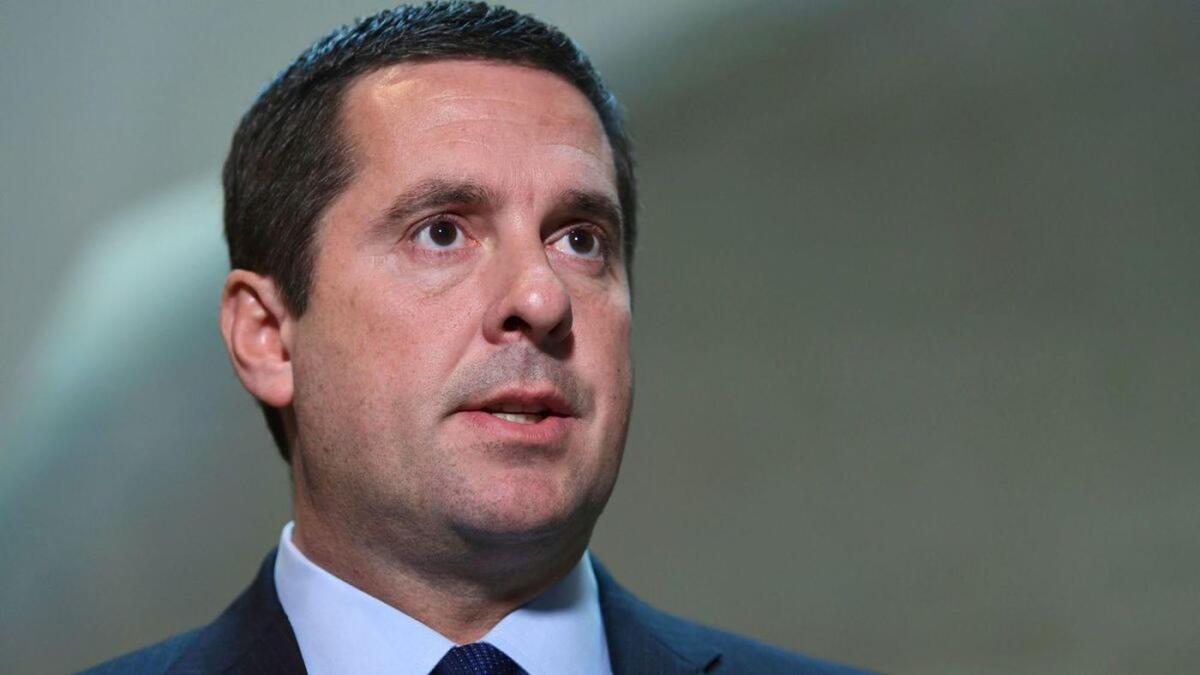
Reps. Devin Nunes (R-Tulare) and Tom McClintock (R-Elk Grove) fell behind in one election handicapper’s ratings on Thursday, giving more optimism to Democrats who hope to regain control of the House in November.
Nunes’ and McClintock’s districts were downgraded to “likely Republican” from “safe Republican” by analysts at Larry J. Sabato’s Crystal Ball at the University of Virginia Center for Politics on Thursday.
Nunes has made a name for himself as a Trump defender and as chairman of the House Intelligence Committee, a newfound notoriety that the analysts said could both hurt and help him. He raised more than $1 million in the first quarter of 2018, but so did his Democratic opponent, Andrew Janz, a Fresno County deputy district attorney.
McClintock, who only scraped out a close victory in 2008, a strong Democratic year, sits in a suburban Sacramento district Trump won, but it’s likely he will have a credible Democratic challenger in November.
See how Times politics editors rank the toughness of those races.
Republicans hope to ride a gas-tax repeal to victory
In a Central Valley barn decked out in red, white and blue, dairyman and state Senate candidate Johnny Tacherra drew cheers from a crowd of fellow farmers when he said he opposes the California Legislature’s hike on gas taxes and vehicle fees.
“I would not have voted for that. It is not the time to be voting on (raising) the gas tax,” said Tacherra, a Republican running against Democratic Assemblywoman Anna Caballero, who voted for the tax increase last year.
Three hundred miles away the same week, a campaign mailer arrived at homes in Orange County from an Assembly candidate with a message blaring from the cover in bold type: “Republican Greg Haskin — tough enough to stand up to Jerry Brown and repeal the gas tax.”
Treasurer John Chiang launches ad in governor’s race touting his record as a fiscal steward
In his first television ad in the governor’s race, state Treasurer John Chiang touts his record on fiscal issues as California faced the recession.
“Some thought we were done,” Chiang says in a voiceover in the 30-second spot he released Thursday, with images of him standing seriously at a lectern and complimentary headlines about his work as controller and treasurer. “But I knew better. I made the tough calls. And brought California back from the brink of financial disaster because you trusted me to manage our economy.”
Chiang’s campaign is spending about $500,000 to air the ad in Los Angeles and San Diego in coming days.
That buy is dwarfed by seven-figure purchases for ads supporting Lt. Gov. Gavin Newsom and former Los Angeles Mayor Antonio Villaraigosa. Newsom is the front-runner, while Villaraigosa is battling for second place with Republican businessman John Cox. Chiang has been mired in the single digits in almost all polling in the race.
His ad, called “Quiet Storm,” tries to portray Chiang as a progressive who is effective and can move policy in Sacramento.
Chiang points to his work challenging Wells Fargo before arguing that he could accomplish what “doubters” say is impossible to improve the state’s healthcare, housing and schools.
“I say, we got this,” Chiang concludes.
Been ignoring the race for California governor? That’s OK, in some ways it’s just starting
On a recent trip to Iowa, Eric Garcetti — the mayor of Los Angeles and a possible 2020 White House contestant — raised eyebrows with a bit of exuberant outreach.
Los Angeles and Iowa, Garcetti insisted, “have a ton in common,” and he didn’t simply mean both are inhabited by carbon-based life forms needing oxygen to survive.
Urban or rural, farmer or fashion plate, all of us harbor the same hopes and dreams, the mayor suggested, and if it wasn’t a terribly original thought it also wasn’t the most egregious sort of political pandering — like, say, ordering that every home in Los Angeles be powered by Iowa-produced ethanol.
California voters should expect to decide on an $8.9-billion water bond in November

A proposal to borrow $8.9 billion for improvements to California’s water quality systems and watersheds and protection of natural habitats is eligible for the statewide ballot in November, Secretary of State Alex Padilla announced in a press release Wednesday.
Padilla said the measure, which is backed by agricultural interests, had exceeded the 365,800 valid signatures it needed to qualify for the general election ballot.
The bond measure will appear on the ballot unless proponents withdraw it by June 28, the release said.
The bond is one of many voters could decide on in 2018. A $4-billion bond for parks and water infrastructure improvements will appear on the June 5 ballot. State lawmakers approved it last year.
They came for Darrell Issa. They stayed with their inflatable chicken, blue wall and signs for political therapy
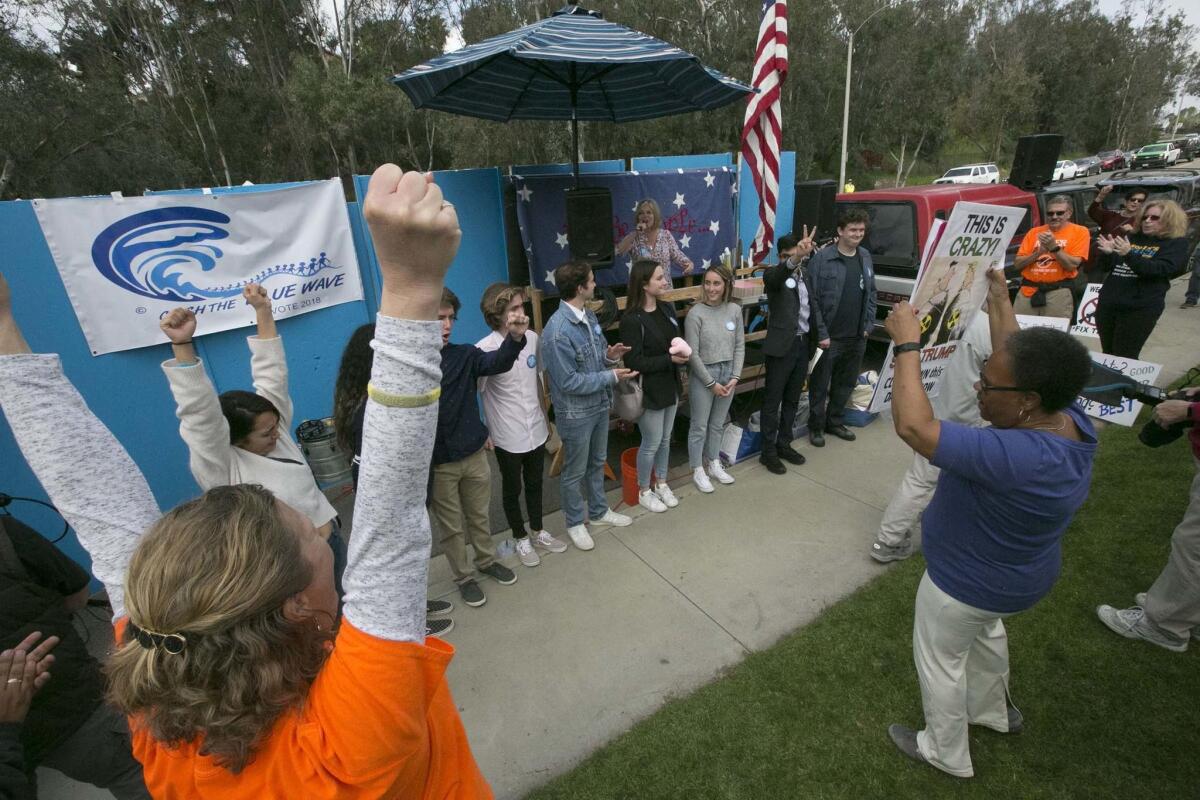
A mother of two turned ringleader of “the resistance” and more than a hundred of her faithful followers gathered on Tuesday morning outside Rep. Darrell Issa’s office in a northern San Diego County suburb. Across the street was her foil, a wedding DJ in a red “Make American Great Again” cap, setting up hefty speakers for an upcoming war of words.
For about 65 weeks the deep divide in America played out along this 100-yard stretch of road in Vista. Here, at 10 a.m. every Tuesday, passersby found signs, chants, songs and, if they were lucky, sometimes a 20-foot-tall inflatable chicken with a Trump-esque coif.
They’d also glimpse the state of the body politic in 2018, a time when shock has turned to anger and post-2016 calls for reconciliation have morphed into grudging acceptance that each side might be better off in their respective corners. Or in this case, their sides of the street.
On Tuesday, the anti-Issa, anti-Trump contingent fought this particular battle for the last time, declaring it their final protest at the congressman’s office. They said they planned to use their energy to knock on doors and get out the vote, with an occasional protest on the side. Their pro-Trump rivals vowed to show up wherever they do.
Efforts to regulate bail companies have some unlikely allies: bail agents

In recent years, the seriousness and number of official complaints related to the bail industry in California have significantly increased while bail agents and bounty hunters face limited oversight, putting vulnerable communities at risk of fraud, embezzlement and other forms of victimization.
This year, as Gov. Jerry Brown has pledged to work with lawmakers in a push to overhaul how courts assign defendants bail and to better regulate bail agencies, even some who profit from the court practice admit it’s time for regulation. These bail and bail-recovery agents could become unlikely allies, saying they advocate for change because they’ve seen the system abuse the poor.
California voters: Get ready for an onslaught of television ads
After a sleepy campaign, California voters are now being bombarded with television advertisements in the governor’s race, an onslaught that is expected to ramp up in coming weeks.
The ads most frequently seen on television are those promoting Lt. Gov. Gavin Newsom, the front-runner in the race, and former Los Angeles Mayor Antonio Villaraigosa, who is trying to secure the second spot in the June primary.
Newsom’s campaign and an outside group backing Villaraigosa are spending seven figures weekly on these efforts, according to filings with the California secretary of state’s office and a media buyer who asked not to be identified in order to freely discuss the ads.
Other gubernatorial candidates are expected to hit the airwaves soon, the media buyer said. State Treasurer John Chiang has reserved a half-million dollars in the coming days in the Los Angeles and San Diego markets, and Villaraigosa’s campaign has requested availability in at least five of the state’s biggest TV markets.
The GOP candidates in the race, who will be seeking the state Republican Party’s endorsement at its convention next weekend, have been much less active.
Businessman John Cox in recent weeks has been spending about $90,000 per week, but doubled that this week in Los Angeles and added small buys on KFI-AM radio and cable in markets including Fresno, Bakersfield and Salinas.
State Assemblyman Travis Allen of Huntington Beach, who has been scooping up Republican Party endorsements across the state, has yet to make a notable television or radio buy, though he and Cox have received some attention as commentators on Fox News.
Republicans ready to turn in signatures for ballot measure to repeal California gas-tax increase

Republican activists said Tuesday that they have collected at least 830,000 signatures for an initiative to repeal recent increases in California’s gas tax and vehicle fees, more than enough to qualify the measure for the November ballot.
The activists need 585,407 signatures of registered voters to qualify the ballot measure.
Because signatures are still being processed and counted by the campaign, backers hope to have 900,000 by the time they begin turning them in to the counties on Friday, according to Carl DeMaio, a former San Diego City Council member and organizer of the drive.
“The breadth and depth of voter anger over the car and gas tax hikes is just amazing,” said DeMaio, who hosts a radio talk show. “We are seeing Democrats, independents and Republicans sign the petition and volunteering to carry the petition, people from all walks of life.”
The initiative targets a law approved in April 2017 by the Legislature and Gov. Jerry Brown that is expected to raise $5.4 billion annually for road and bridge repairs and improvements to mass transit.
The money comes from a recent 12-cents-per-gallon increase in the gas tax, a 20-cent increase in the diesel fuel excise tax and a new annual vehicle fee ranging from $25 for cars valued at under $5,000, to $175 for cars worth $60,000 or more.
The petition drive raised more than $2 million with significant contributions from the California Republican Party and Republican members of Congress from California, including House Majority Leader Kevin McCarthy of Bakersfield and Reps. Ken Calvert of Corona and Mimi Walters of Irvine.
Republicans hope the issue will help their candidates for office in this year’s election and hurt Democrats who support the higher taxes.
“I think this is going to put Democrats in real bad spot,” DeMaio said.
A spokesman for Brown declined to comment until the signatures are filed.
DeMaio said there were approximately 20,000 volunteer petition circulators who brought in more than 250,000 signatures, with the rest collected by paid circulators who received $1 to $2.50 per signature.
“It’s a pretty comfortable margin [of signatures] that we have been able to hit here,” DeMaio said.
Opposition will grow, he said, as more Californians get their annual vehicle registration notice.
The repeal campaign hopes to raise $5 million for the campaign to pass the constitutional amendment, which would not only repeal the increase in the gas tax and vehicle fees but require future increases to be submitted to voters.
“We know that Gov. Brown and his cohorts are going to spend an amazing amount of money to mislead voters,” DeMaio said. “But I feel pretty confident that we will repeal the gas tax.”
Rep. Duncan Hunter sets up trust to raise money for legal expenses amid ongoing criminal investigation
Rep. Duncan Hunter, R-Alpine, has filed paperwork to establish a legal expense fund amid an ongoing federal criminal investigation into misused campaign cash.
Hunter filed the required paperwork March 27, seeking a rarely granted “Legal Expense Fund” through which members of Congress under investigation or being sued in connection with doing their jobs or running for office can raise money for their legal expenses.
Such funds are administered by an independent trustee and allow donors to give above the maximum amount they can contribute a candidate’s campaign. Hunter has spent more than $600,000 of campaign money on lawyers.
Kamala Harris says she won’t take corporate donations anymore
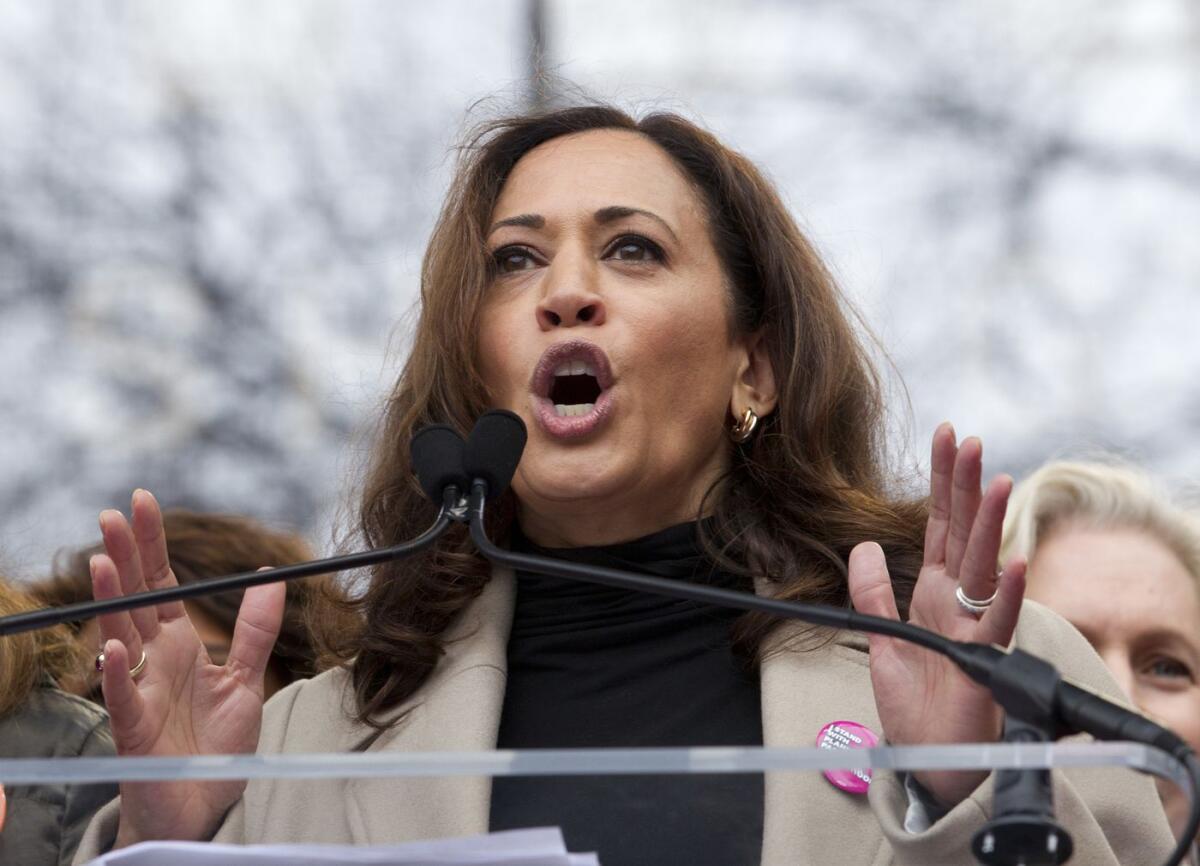
California Sen. Kamala Harris says she will no longer accept money from corporate political action committees.
In an interview with WWPM-FM’s “The Breakfast Club,” in New York that aired Monday, the senator said she wasn’t expecting a question at a town hall this month about whether she would accept money for corporations or corporate lobbyists.
At the time, Harris said “it depends,” but she said on Monday that she had reflected on the matter and changed her mind.
“Money has had such an outside influence on politics, and especially with the Supreme Court determining Citizens United, which basically means that big corporations can spend unlimited amounts of money influencing a campaign, right?” Harris said. “We’re all supposed to have an equal vote, but money has now really tipped the balance between an individual having equal power in an election to a corporation. So I’ve actually made a decision since I had that conversation that I’m not going to accept corporate PAC checks. I just — I’m not.”
You can watch the video of the interview here. (Harris’ corporate money comments come about 30 minutes in.)
Harris wouldn’t be on the ballot for a second Senate term until 2022, though it’s widely believed that she is planning a presidential bid in 2020. Other potential 2020 presidential candidates, including Sens. Bernie Sanders (I-Vt.), Cory Booker (D-N.J.) and Elizabeth Warren (D-Mass.), have also ruled out taking corporate PAC money.
Soon after Monday’s show aired, Harris’ campaign sent out a fundraising request noting her new stance.
“As corporate PACs continue to corrupt our politics and twist Congress’ priorities at your expense, we’re going to focus on raising money from small-dollar, individual donors like you,” the email says.
With money tied up in court, California lawmakers try again with new plan to spend $2 billion on homeless housing

A measure to spend $2 billion on housing homeless Californians could be on the November statewide ballot.
State Sen. Kevin de León (D-Los Angeles) is pushing the idea to deal with what he said was a “burgeoning humanitarian crisis whose epicenter is here in California.”
De León’s new measure is a do-over for a 2016 plan passed by the Legislature to redirect $2 billion toward building homeless housing from a voter-approved 1% income tax surcharge on millionaires that funds mental health services. A Sacramento attorney sued over that decision, arguing that the move violated constitutional rules on approving loans without a public vote and that lawmakers shouldn’t take money away from mental health treatment. The case remains active in Sacramento Superior Court and it’s unclear when, or if, the state will be able to spend the $2 billion.
De León’s Senate Bill 1206 would put the $2-billion loan on the ballot in November, freeing up the money if voters approve the measure. De León said had he been able to predict the 2016 plan would end up in court, he would have sought a ballot measure at the time.
“We thought this was like apple pie and baseball and puppies,” De León said. “Who would oppose the idea of repurposing the dollars to build immediate housing as a permanent solution for homelessness? Obviously with a crystal ball, had I anticipated the litigation, I would have worked to place it on the ballot.”
De León noted that the 2016 plan had bipartisan supermajority support in the Legislature, something his new bill also will need to get on the ballot. Sen. John Moorlach (R-Costa Mesa) is a coauthor of the plan.
SB 1206 is scheduled for its first hearing in the Legislature on Wednesday.
Should De León’s measure be approved, it will join a crowded list of housing issues before voters in November. Californians will decide on a separate $4-billion bond to help finance new low-income housing and home loans for veterans. De León said he’s not worried those two measures will compete against each other because voters are aware of the scale of the state’s housing problems and the proposed homeless housing bond redirects existing dollars instead of raising taxes.
“Once [voters] know that the impact on their pocketbook is not existent, I’m confident that they’ll join me and my colleague John Moorlach in support of this measure,” De León said.
California lawmakers say too many former felons are being denied professional licenses
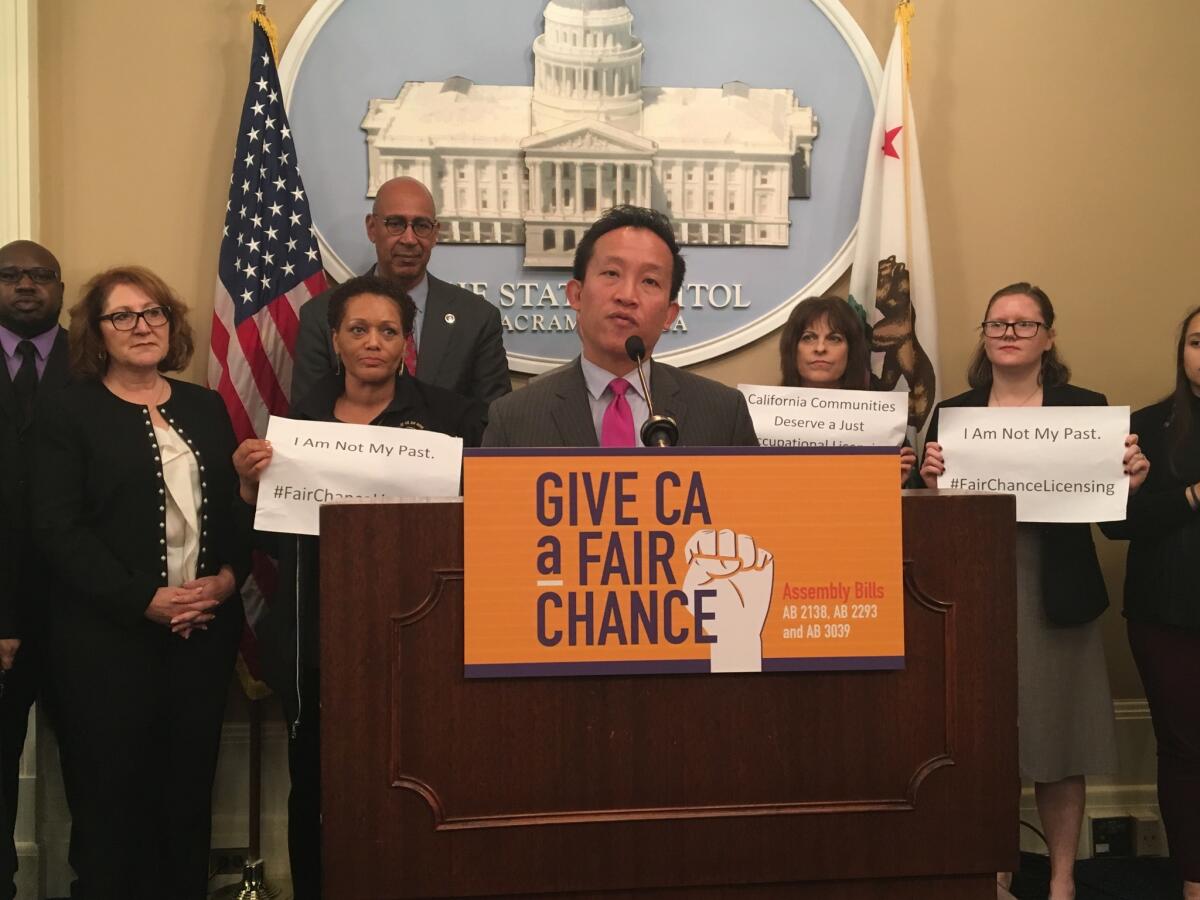
A trio of California Assembly members urged colleagues on Monday to pass legislation that would prohibit state commissions and agencies from rejecting a professional license for those who were once convicted of less serious crimes.
“We can’t say we want to rehabilitate people, and then block them from getting the jobs that they need when they’re released,” said Assemblyman David Chiu (D-San Francisco). “That leads to more recidivism and to more crime.”
The bills, scheduled to be heard in Assembly committees Tuesday, would ban the use of arrest or conviction records as the reason for denying a professional license. The bill would not apply to Californians who served time for any of the offenses on the state’s list of “violent crimes.”
The authors, all Democrats, said that a government-issued professional license is required for some 30% of all jobs in the state. Their bills would change the licensing process at the California departments of Consumer Affairs and Social Services and agencies that certify emergency medical technicians.
The bills would block prior convictions from leading to the delay or denial of a license unless that crime is “directly related” to the profession the person intends to pursue. Two of the bills also specifically say convictions less than 5 years old could continue to play a role in licensing decisions.
Last year, Gov. Jerry Brown signed a law that keeps private sector employers from inquiring about a job applicant’s conviction history prior to an offer of employment.
Advocates joined the lawmakers at a press conference in Sacramento to point out that limits on awarding licenses should focus only on those whose prior criminal activity could pose a threat to consumers.
“Continuing to hold people back for crimes that are 6, 7, 8, 10, 20 years old does not actually make sense if you’re looking at public safety,” said Jael Myrick of the East Bay Community Law Center.
One of the proposals, Assembly Bill 2293, seeks to make it easier for ex-felons to get a license allowing a job with the California Department of Forestry and Fire Protection — the same agency that often uses prison inmates to battle blazes around the state.
“If a person is good enough to risk their life fighting fires for the state of California as an inmate,” said Assemblywoman Eloise Gomez Reyes (D-Grand Terrace), “their previous actions should not prevent from having a job utilizing the skill set that they learned.”
Newsom highlights liberal bona fides in his first ad in the governor’s race
Gubernatorial front-runner Gavin Newsom released his first television ad of the race on Monday, days after a well-funded effort to boost fellow Democratic candidate Antonio Villaraigosa went on the air with its own spot.
The 30-second ad, being aired statewide on broadcast and cable, highlights Newsom’s record on same-sex marriage, universal healthcare and gun control.
“The one candidate with the record of bold leadership and bold results,” a narrator says over images of Newsom looking serious and making a speech. It also mentioned endorsements he has received from Sen. Kamala Harris and various unions, and included the slogan, “Courage for a change.”
Newsom’s campaign declined to say how much it was spending to air the spot, which appears designed to appeal to Democratic-base voters.
The lieutenant governor and former mayor of San Francisco is dominating fundraising and polls in the race. Last week, an independent expenditure group called Families & Teachers for Antonio Villaraigosa for Governor launched a spot in support of the former mayor of Los Angeles. The group is funded by a trio of wealthy charter school backers, and by law cannot coordinate with a candidate.
Its ad is aimed at boosting Villaraigosa’s chances of coming in second in the June 5 primary and moving onto the general election. In recent polling, Villaraigosa has placed third, behind Republican businessman John Cox.
The group released the ad on Thursday. The following day, the Newsom campaign’s attorney demanded that California television stations stop airing it, arguing that it violated elections law because it used snippets of video from the Villaraigosa campaign. The independent expenditure committee’s attorney responded by saying the allegations have “no merit” and are misleading.
Assembly speaker rebukes building trades union after it targets Assemblywoman Cristina Garcia
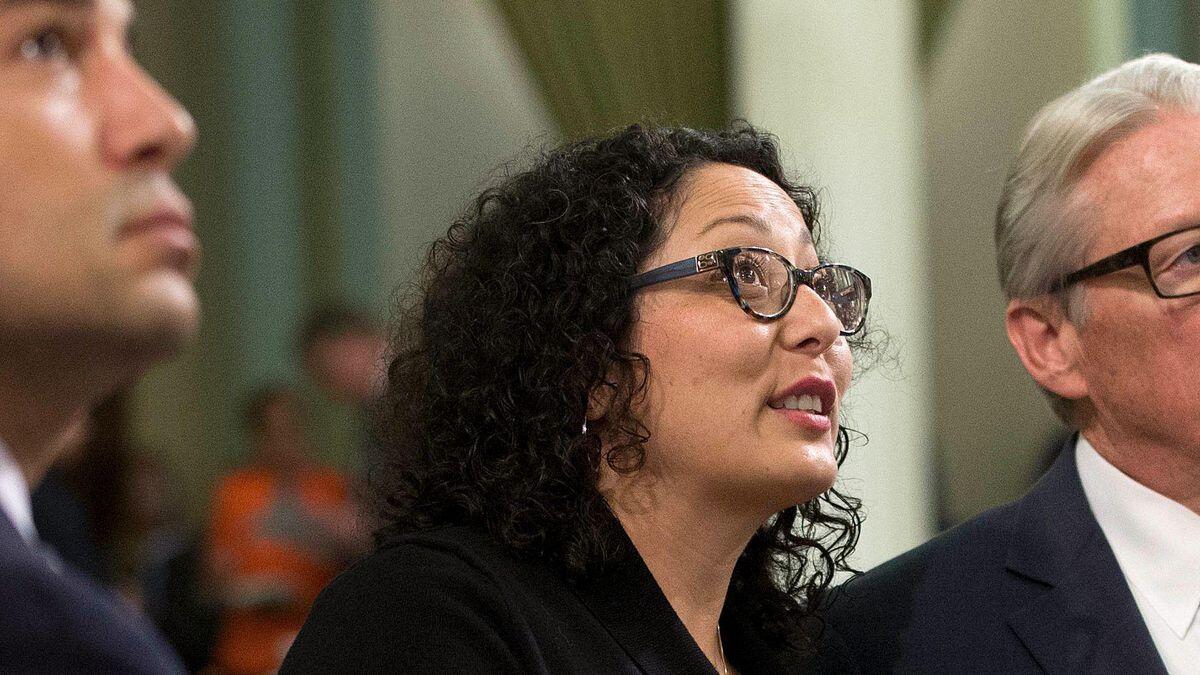
The decision by a politically powerful labor group to openly campaign against an embattled Los Angeles-area lawmaker drew a sharp rebuke on Friday from Assembly Speaker Anthony Rendon.
The Lakewood Democrat lashed out hours after the State Building and Construction Trades Council of California filed paperwork for a political action committee to defeat Assemblywoman Cristina Garcia (D-Bell Gardens). Garcia, who’s seeking her fourth term, took an unpaid leave of absence in February following allegations of sexual misconduct. She has denied the reports and an Assembly investigation remains underway.
Rendon didn’t criticize the labor group by name, insisting instead that the decision was driven by oil and gas industry interests.
“This is a thinly veiled attempt by Big Oil and polluters to intimidate me and my members. It is an affront to my speakership,” Rendon said in a statement. “We are proud of the work that the Assembly has done to increase jobs and wages while defending our environment. We will vigorously defend the members of our caucus from any ill-advised political attack.”
A statement from the labor group, which sparred with Garcia last year on her effort to link new climate change policies with a crackdown on air pollution, said it had decided to “reverse” past support for her.
“The Trades have thousands of hard working members in Garcia’s district, and we look forward to lifting up another Democrat in the 58th Assembly to better represent them and their families,” said the statement.
The political action committee’s campaign finance filing on Friday listed nonmonetary “in kind” contributions from Erin Lehane, a public affairs consultant aligned with the building labor group. Lehane said she had begun “researching” Garcia in November. In January, a former legislative staffer accused her of groping him in 2014.
Lehane, who identified herself as a spokesperson for the labor group’s political action committee, said on Friday that she believed Garcia’s “hypocrisy threatened a movement that will dictate how much harassment and abuse my daughter will face in her work life.”
Garcia, who has been an outspoken advocate for women in the #MeToo movement, has complained that her political opponents helped fan the flames of the accusations. Through a campaign consultant, she declined to comment on Friday.
Rendon’s critique came on the heels of a full-page ad in The Times on Friday, partly paid for by the Trades Council, that criticized “well-funded ivory tower elites” who push proposals that hurt the oil and gas industry.
“We are the real jobs that fuel the real California economy,” read the advertisement.
See Team Politics at the Festival of Books this weekend
For anyone interested in politics, this weekend’s L.A. Times Festival of Books at USC will be the place for you.
It’s a great event — the biggest book festival in the country and a showcase for ideas and literature in California.
Members of the Times’ California politics team and the Washington bureau will be there in force. We’ll talk about the contest for governor and the midterm elections on Sunday at 1:20 p.m. There also are a number of panels on the Trump administration and politics, moderated by Times journalists.
Here’s the full schedule. To see where we’ll be, filter the list by Politics & History. Also, don’t miss the Ask a Reporter booth on campus.
Legal tiff breaks out over independent committee’s ad backing Antonio Villaraigosa for governor
An attorney representing Gavin Newsom’s campaign for governor is demanding that California television stations cease airing an ad by an independent political committee supporting his Democratic rival Antonio Villaraigosa.
Attorney Thomas A. Willis, in a letter to the stations, said the ad is “false and misleading and violates California law” because it uses snippets of video footage from Villaraigosa’s own campaign ads. Willis called that illegal coordination between the campaign and PAC.
“Under California law, advertisements made by entities other than a candidate are presumed to be ‘coordinated’ — and thus not independent expenditures — when the advertisement replicates, reproduces or disseminates substantial parts of a communication, including video footage, created and paid for by the candidate,” the letter states.
A representative for the independent expenditure committee — Families & Teachers for Antonio Villaraigosa for Governor — fired back. Attorney Brian T. Hildreth says those allegations have “no merit” and accused the Newsom campaign of being misleading.
Hildreth sent a letter to the television stations in response, urging them to ignore the Newsom campaign’s accusations.
He said the Newsom camp “appears to intentionally misrepresent the law” and that the video use was permissible. He said only six seconds of video from Villaraigosa’s campaign ads was used, which is well within the legal limits.
The independent committee is sponsored by the group California Charter Schools Assn. Advocates, according to the California secretary of state’s office. The ad is airing on broadcast and cable stations statewide.
The committee’s ad is focused on Villaraigosa’s record as Assembly speaker and as mayor of Los Angeles when there was a drop in crime.
Governor’s race snapshot: Californians are generally upbeat but not focused on the campaign
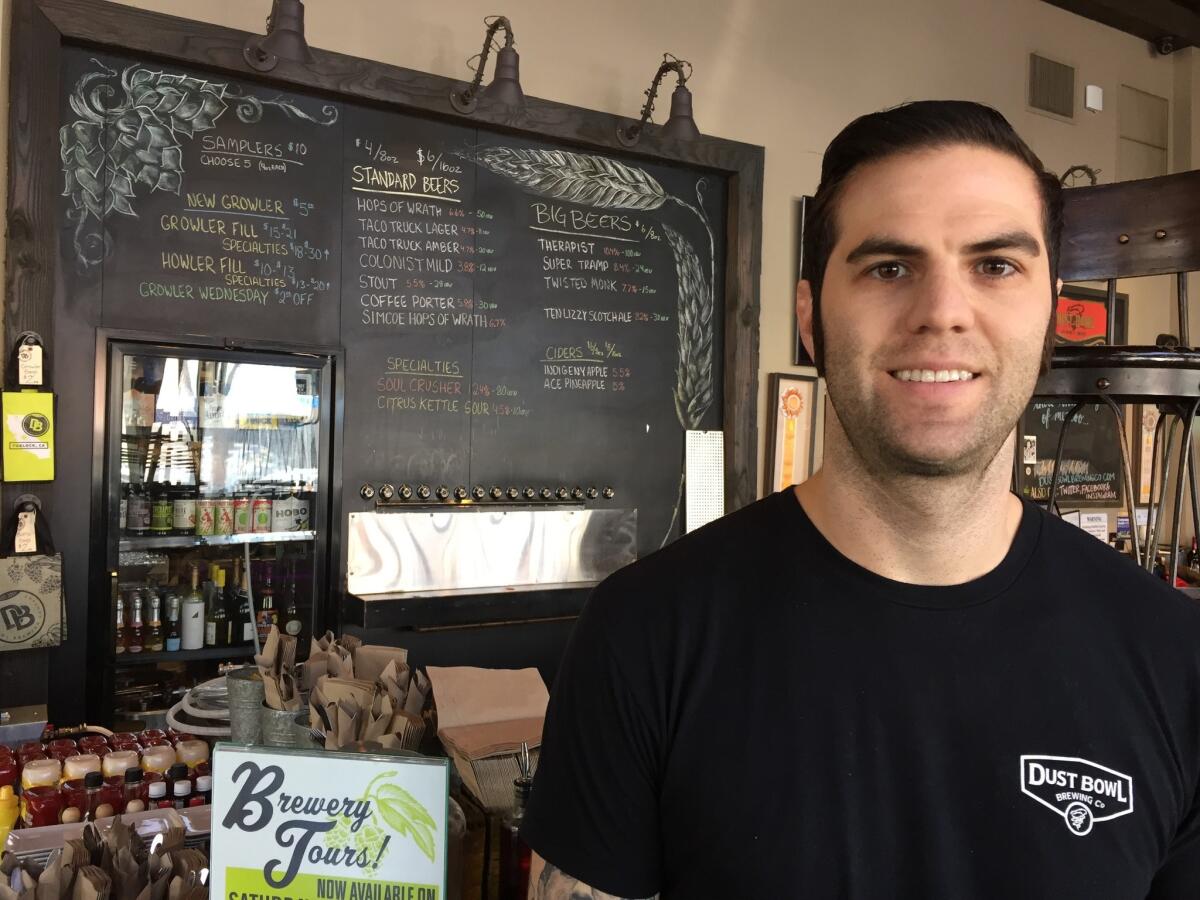
As California chooses a new governor — one of just a handful in the last 40 years not named Jerry Brown — the state seems to be enjoying something unusual in these tumultuous political times: a feeling of relative contentment.
Not to say things are perfect.
Still, more than 100 random interviews conducted over the length and breadth of the state — from Redding in the north to Santee in the south, from the Pacific coastline to the edge of the Sierra Nevada — found most saying things are looking up, at least so far as California’s direction is concerned.
California housing crisis podcast: One of the nation’s biggest housing bills meets its demise
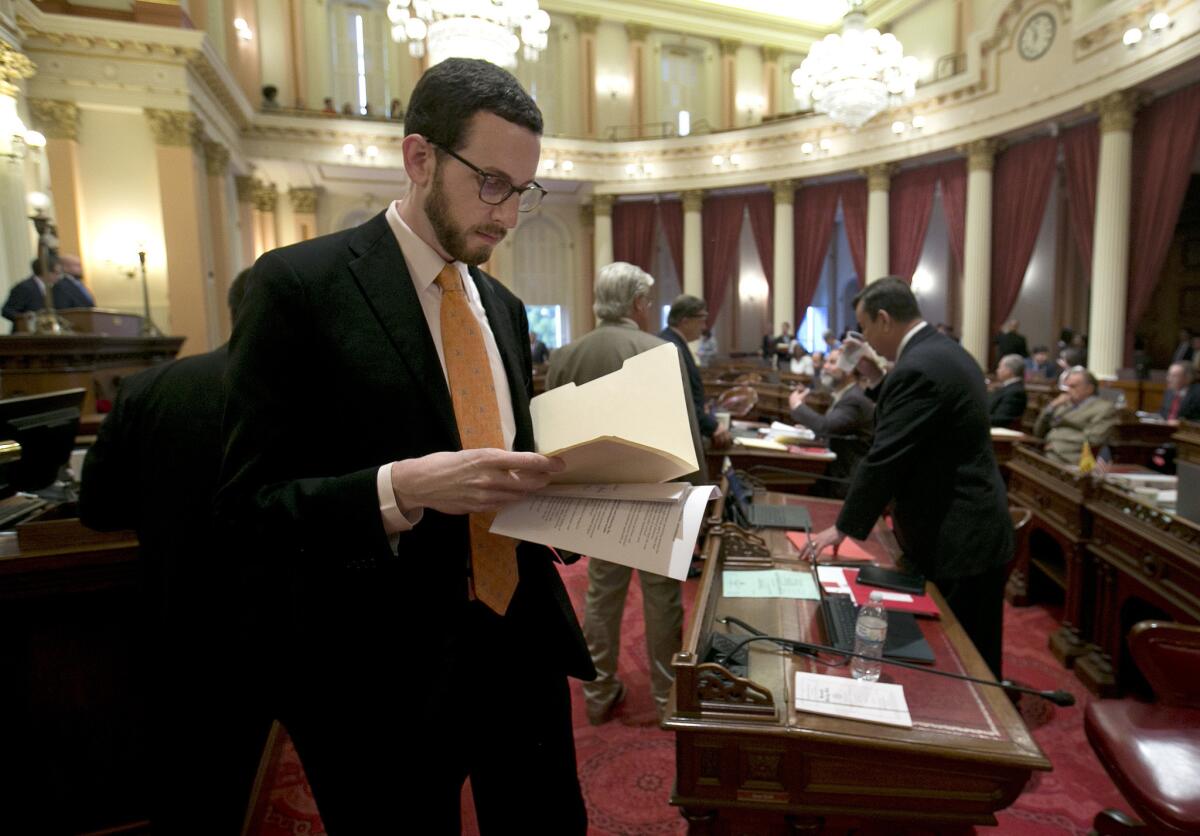
Earlier this week, state senators killed legislation that would have boosted the number of homes that could be built near transit stops across Los Angeles and the rest of the California.
The measure, SB 827, attracted national attention because it aimed to address both California’s housing shortage and environmental goals. But SB 827’s author, Sen. Scott Wiener (D-San Francisco), failed to garner enough support from his colleagues at the bill’s initial committee hearing.
On this episode of Gimme Shelter: The California Housing Crisis Pod, we break down why the bill failed and explain what might come next.
“Gimme Shelter,” a biweekly podcast that looks at why it’s so expensive to live in California and what the state can do about it, features Liam Dillon, who covers housing affordability issues for the Los Angeles Times’ Sacramento bureau, and Matt Levin, data reporter for CALmatters.
You can subscribe to “Gimme Shelter” on iTunes, Stitcher, Soundcloud, Google Play and Overcast.
Sierra Club backs Gavin Newsom for California governor
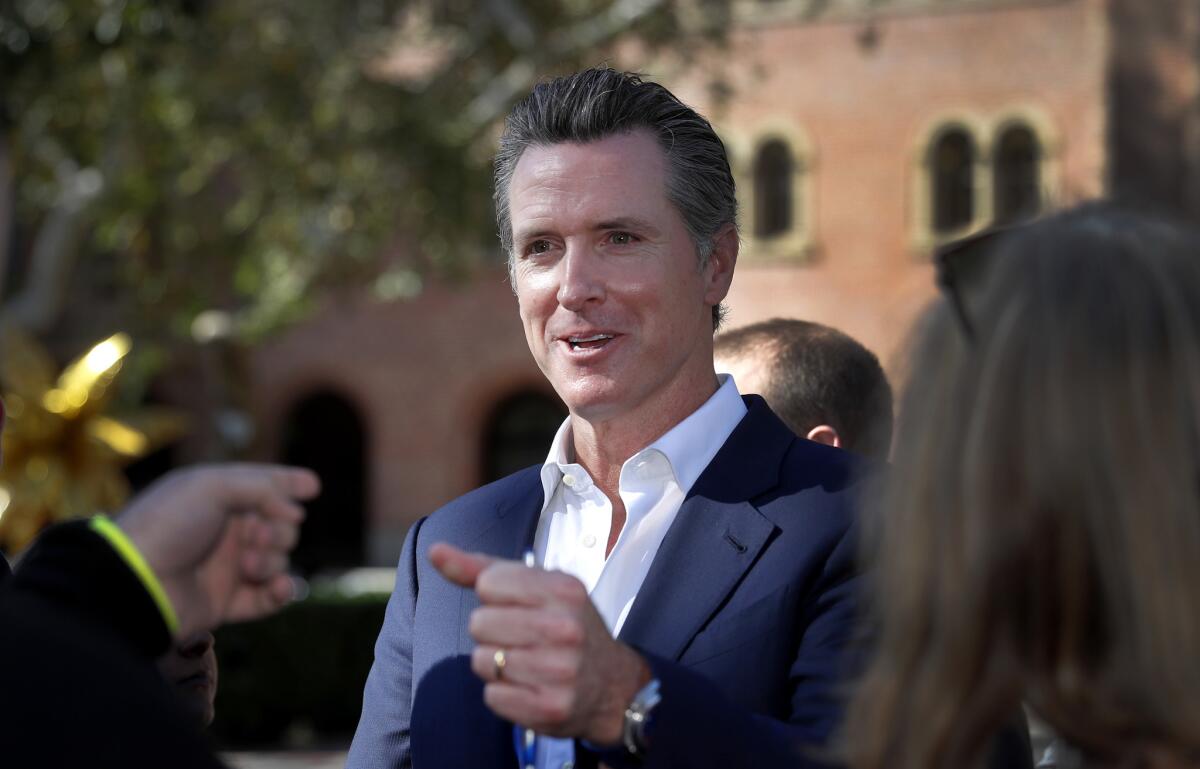
The Sierra Club endorsed Lt. Gov. Gavin Newsom in the race for California governor, with officials in the established environmental group praising the Democrat’s record on climate change and clean energy.
“He has a proven record for leading on environmental protection, public health and clean energy,” Kathryn Phillips, director of Sierra Club California, said in a statement released by the Newsom campaign. “He understands that we are feeling the effects of climate change and that California must reduce carbon emissions and reach 100% renewable energy to achieve our climate goals.”
Phillips said the Sierra Club’s extensive network of volunteers will campaign for Newsom as the June 5 primary approaches. Sierra Club executive director Michael Brune also praised the Democrat, saying he will protect California from “Donald Trump’s attacks on our clean air and water.”
The Sierra Club joins a series of other influential groups in California that have backed Newsom.
The California Medical Assn., the powerful state doctors lobby, announced its endorsement of Newsom on Thursday. The California Nurses Assn. and the Service Employees International Union, one of the most powerful labor unions in the state, also support Newsom.
Newsom is the race’s front-runner in polls and fundraising.
A poll released earlier this month by the nonpartisan Public Policy Institute of California found that 26% of likely voters backed Newsom. John Cox, a Republican from Rancho Santa Fe, was favored by 15% of likely voters and former Los Angeles Mayor Antonio Villaraigosa, a Democrat, by 13%.
California’s GOP House members are taking their challengers more seriously and the numbers show it
For much of last year, consultants and campaign managers for some of California’s most vulnerable Republican incumbents maintained a bullish tone on the prospect that the GOP would hold the House in this year’s midterms.
The National Republican Congressional Committee insisted that longtime Republican incumbents in California had built up reputations as effective champions of local issues that would help them weather a flood of Democratic enthusiasm.
Since then Rep. Ed Royce (R-Fullerton) and Rep. Darrell Issa (R-Vista) have decided not to seek reelection and the NRCC has opened a West Coast headquarters in Orange County.
GOP challenger to Rep. Dana Rohrabacher drops out, endorses another Republican opponent
California officials say Pentagon has confirmed National Guard funding despite Trump threat

The awkward dance between Gov. Jerry Brown and the federal government over the National Guard jerked back toward discord on Thursday, when Trump said he would refuse to pay for a new deployment of troops — just hours after his administration said otherwise.
And a few hours later, California officials said they had received written confirmation from the Pentagon that the mission would indeed be funded.
Trump had earlier called Brown’s decision to approve 400 troops for a mission focused on combating transnational crime and drug smuggling a “charade” in a tweet. “We need border security and action, not words!” the president wrote.
A spokesman for Brown pointed to a tweet written Wednesday night by Homeland Security Secretary Kirstjen Nielsen, thanking the California governor for his efforts. Trump was meeting on Thursday with Nielsen at his Mar-a-Lago estate not long after his tweet was posted.
A tweet later posted by the California National Guard said that almost three hours after Trump’s comment, the state received “written confirmation from the Pentagon” to fund the mission as outlined by Brown the day before.
“In short, nothing has changed today,” said a subsequent Guard tweet.
Brown was the last of the nation’s border governors to respond to Trump’s insistence earlier this month that National Guard troops were needed to assist with immigration-related duties at the U.S.-Mexico border. And he has consistently refused to allow California troops to engage in any mission related to federal immigration law.
“This will not be a mission to build a new wall,” Brown wrote last week to Nielsen and Defense Secretary James N. Mattis. “It will not be a mission to round up women and children or detain people escaping violence and seeking a better life.”
Exactly what the California operations will cost remains unclear, as state officials have said it will depend on decisions made once the mission begins. The funds would not be transferred to the state, but instead would be paid directly by the Department of Defense.
Trump has critiqued California several times over the past few days, often writing tweets that embrace the actions by some cities and counties to join his administration’s lawsuit against the state’s sanctuary immigration law. He made similar comments to reporters on Thursday afternoon.
“If you look at what’s happening in California with sanctuary cities — people are really going the opposite way,” Trump said. “They don’t want sanctuary cities. There’s a little bit of a revolution going on in California.”
2:26 p.m.:This article was updated with additional information from the California National Guard and with remarks from Trump.
This article was originally published at 9:51 a.m.
Gay ‘conversion therapy’ services would be banned under measure advancing in California
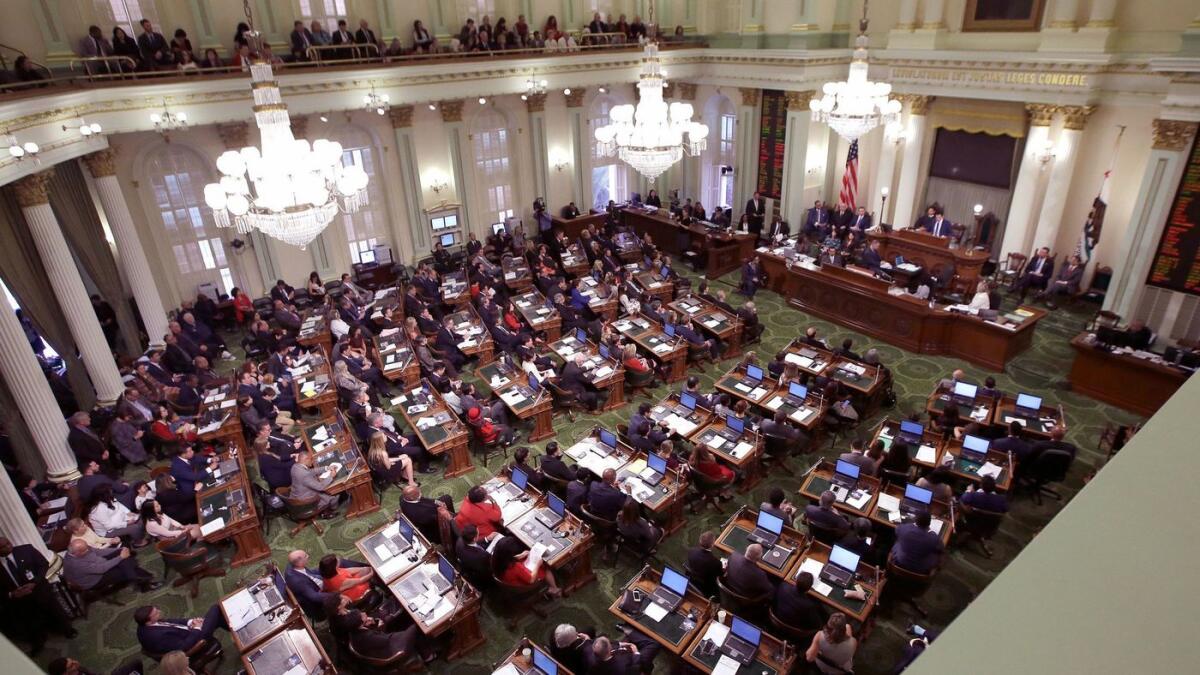
The California Assembly voted Thursday to add gay “conversion therapy” to the state’s list of deceptive business practices, following a debate that focused on the personal experiences of several lawmakers and hinted at potential lawsuits to come.
“It is harmful and it is unnecessary,” Assemblyman Evan Low (D-Campbell), the bill’s author and one of the Legislature’s most vocal LGBTQ members, said of the practice.
Low, who told Assembly members that he explored conversion therapy as a teenager and suffered depression over his sexual orientation, insisted that the bill would be limited to efforts that involve the exchange of money.
“There’s nothing wrong with me,” he said in an emotional speech on the Assembly floor. “There’s nothing that needs to be changed.”
The bill, which now heads to the Senate, has become the focal point of intense debate on social media. Some religious groups have said that such a law would be a violation of their constitutional rights, while advocates insist the provisions are narrow and there’s no credible evidence that the services work.
One key part of the debate centers on whether Assembly Bill 2943 would stretch beyond businesses that charge for these programs and extend to printed documents, even Bibles. An analysis by the Assembly Judiciary Committee says the bill would apply only to services that purport to change a person’s sexual orientation and offered “on a commercial basis, as well as the advertising and offering of such services.”
Lawmakers who spoke in support of AB 2943 also made clear that they believe those kinds of services have been discredited. “This is fraudulent, it should not be occurring,” said Assemblywoman Susan Eggman (D-Stockton). “But you can still try to pray the gay away, if you like.”
Assemblyman James Gallagher (R-Yuba City), who said the bill addresses a difficult issue, nonetheless said that it’s important to ensure laws don’t tamper with religious freedom.
“We have to think about the legitimate experience of people who have gone through conversion therapy and said this was a good thing for them,” Gallagher told his colleagues.
California law already bans the use of conversion therapy by mental health professionals on those under age 18. Low’s bill would expand the state’s efforts beyond minors. It would join a list of commercial activities deemed “unfair or deceptive acts or practices” and therefore banned under state law.
Gavin Newsom gets backing from doctors group, despite differences over single-payer healthcare
California’s doctors are siding with Gavin Newsom in the governor’s race, even though they don’t see eye-to-eye on a defining issue of the campaign: single-payer healthcare.
The California Medical Assn., the state doctors lobby and a political heavyweight, announced its endorsement of the lieutenant governor on Thursday.
“Gavin is a lifelong champion for health care in California, and we know he will continue to fight for pragmatic solutions to our most crucial health care challenges, including working to achieve universal access and tackling our state’s physician shortage,” CMA President Theodore M. Mazer said in a statement.
Newsom has made his support for state-financed healthcare a centerpiece of his campaign, and he earned the early backing of the most ardent single-payer supporters, the state nurses union.
The doctors, meanwhile, oppose the nurses’ bill, SB 562, which emerged as a flashpoint in the healthcare debate last year. The CMA said the bill “would dismantle the healthcare marketplace and destabilize California’s economy.”
Newsom has said SB 562 should advance in the Legislature, but also said it has “open-ended” issues that still need to be addressed.
The doctors group is also battling with another prominent Newsom endorser, the Service Employees International Union, over a new measure that would impose price caps on an array of medical services paid for by commercial health insurers in the state. The SEIU is a leading sponsor of the proposal; the doctors fiercely oppose it.
Newsom and the physicians group have a history of political alignment. Newsom was the first statewide official to support Proposition 56, a 2016 tobacco tax pushed by the CMA that raised revenue in part to increase money for doctors who saw Medi-Cal patients. That year, the association also endorsed two initiatives championed by Newsom: Proposition 63, which imposed new gun control measures, and Proposition 64, which legalized recreational marijuana.
Independent committee backing Antonio Villaraigosa for governor hits the airwaves with first ad
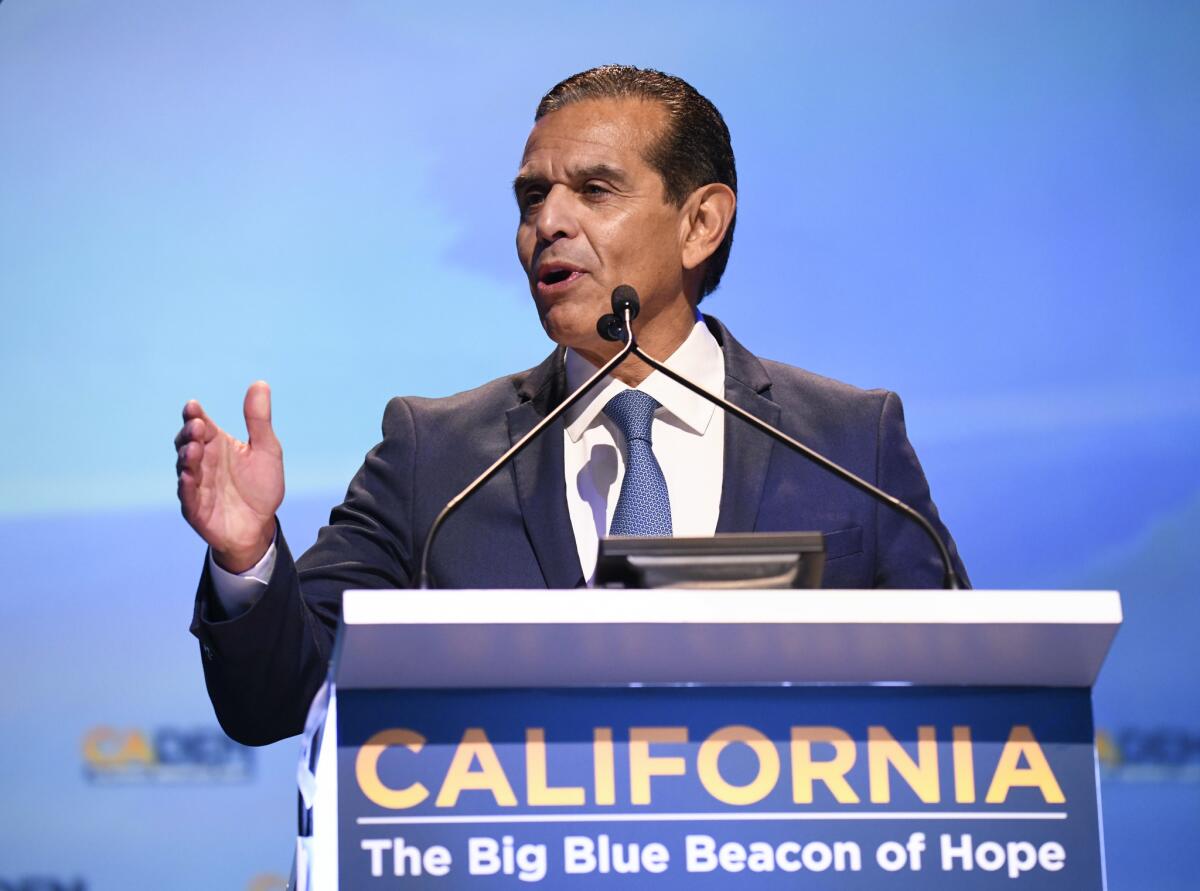
A well-financed independent committee backing Antonio Villaraigosa’s bid to be California’s next governor released its first television ad Thursday, praising his record for working with Republicans and as a candidate for “all of California.”
The ad, which is to air statewide on broadcast and cable stations, is focused on Villaraigosa’s record as Assembly speaker and mayor of Los Angeles, including on education and a drop in crime while he was at City Hall.
“To move California forward, we need to help more Californians get ahead,” the ad says. “That’s why Antonio Villaraigosa brought both parties together to balance the state budget with record investments in public schools and new career training programs.”
The independent expenditure committee behind the ad campaign, Families & Teachers for Antonio Villaraigosa for Governor 2018, is sponsored by the California Charter Schools Assn. Advocates, according to the California secretary of state’s office.
The committee is spending “seven figures” per week on the ad buy, said Josh Pulliam, a political consultant for the committee.
As mayor of Los Angeles, Villaraigosa clashed with teachers unions, starting with his failed attempt to take political control of the Los Angeles Unified School District. His fight with those unions continued after he left office in 2013.
Money has poured into the committee this month from wealthy charter schools supporters: Reed Hastings, chief executive of Netflix, donated $7 million, and Los Angeles billionaire and philanthropist Eli Broad donated $1.5 million. On Wednesday, former Los Angeles Mayor Richard Riordan donated $1 million.
The independent expenditure committee is expected to provide a boost to Villaraigosa’s campaign. Democratic front-runner Lt. Gov. Gavin Newsom has a major advantage in fundraising over all other candidates in the race and has received the backing of the California Teachers Assn. and other education unions.
A recent Public Policy Institute of California poll also showed Villaraigosa lagging in third place in the race, trailing Newsom and Republican businessman John Cox. The candidates who finish in the top two in the June 5 primary will advance to the November general election, regardless of their party affiliation.
Gov. Jerry Brown says Trump administration will fund his National Guard mission — without immigration duties
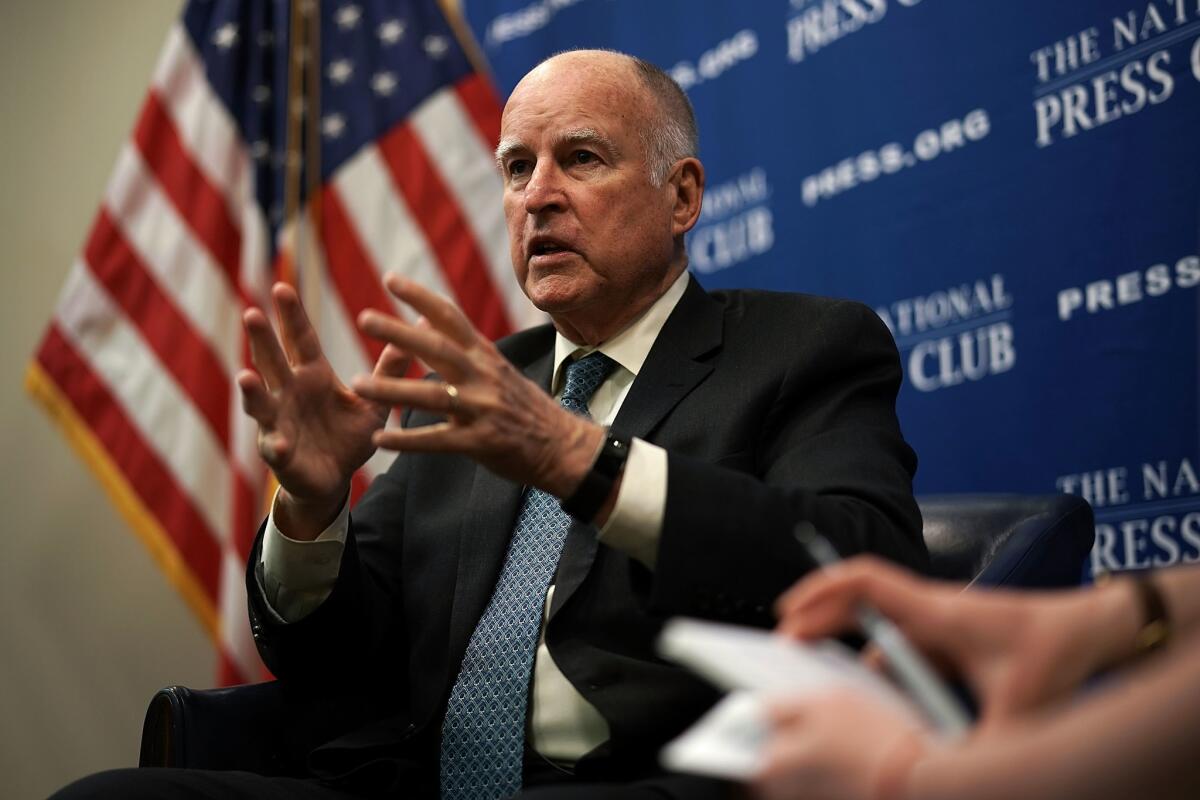
Gov. Jerry Brown formally mobilized 400 California National Guard members Wednesday for transnational crime-fighting duties, thus preventing any effort by President Trump to have the troops focus on immigration enforcement on the Mexican border.
The governor announced that federal officials have agreed to fund the plan he announced last week — a mission to “combat criminal gangs, human traffickers and illegal firearm and drug smugglers” in locations around California, including near the border. The order Brown signed makes clear that the troops will not be allowed to perform a broader set of duties as envisioned by Trump’s recent comments.
“California National Guard service members shall not engage in any direct law enforcement role nor enforce immigration laws, arrest people for immigration law violations, guard people taken into custody for alleged immigration violations, or support immigration law enforcement activities,” the order read.
The cost of the mission, a spokesman for Brown said, will be paid directly by the federal government. No initial estimate has been made, as the exact amount will depend on exactly how the troops will be used.
Though the duties of California Guard members were outlined last week, the state had been waiting for an agreement by federal officials to pay for the operations. Since that time, the president has taken Brown and the state to task over its decision to avoid any immigration-related duties at the border. On Wednesday morning, Trump tweeted, “Jerry Brown is trying to back out of the National Guard at the Border, but the people of the State are not happy. Want Security & Safety NOW!”
“Looks like Jerry Brown and California are not looking for safety and security along their very porous Border. He cannot come to terms for the National Guard to patrol and protect the Border,” Trump tweeted Tuesday.
There was no immediate reaction from the White House to Brown’s announcement.
On Tuesday, Brown told reporters in Washington that his plan was consistent with a safer border. “That sounds to me like fighting crime,” the governor said. “Trying to catch some desperate mothers and children, or unaccompanied minors coming from Central America, that sounds like something else.”
The order Brown issued Wednesday after returning from a brief trip to talk climate change in Toronto and to speak to a national trade union and visit with reporters in Washington is set to expire at the end of September. It specifically says no Guard service member may participate in a mission that would “exceed the mission scope and limitations” related to transnational crime activity. It also says troops cannot help build “any new border barrier.”
5:27 p.m.: This article was updated with information related to the cost of the Guard mission and Brown’s trip to Washington.
This article was originally published at 5:13 p.m.
California bill aims to end practice that keeps workplace misconduct cases out of court
A California bill would prohibit employers from requiring workers to use private arbitration to settle disputes, a practice that critics say shields improper workplace conduct from public view.
The bill by Assemblywoman Lorena Gonzalez Fletcher (D-San Diego) would bar businesses from making employees, when they are hired, waive their future rights to take any harassment, discrimination or other claims to court.
“Arbitration can be a highly effective dispute resolution method when both parties can choose it freely, when both parties are equal,” Gonzalez Fletcher said at a news conference on Wednesday. “It is far less successful when the more powerful party forces the other to accept those terms, especially as a condition of employment.”
Forced arbitration has come under increasing scrutiny since the #MeToo movement, with high-profile figures such as former Fox News anchor Gretchen Carlson pointing to the practice as shielding workplace abusers from public disclosure because arbitration resolutions often include nondisclosure agreements. Last year, a bipartisan bill was introduced in Congress to end mandatory arbitration in employment agreements.
Gonzalez Fletcher said she was pursuing an unusual tool to draw attention to the issue — a subpoena issued by the Legislature to compel testimony from a worker bound by a nondisclosure agreement as a result of arbitration. The Legislature has subpoena power but it is rarely used. The bill’s sponsors believe lawmakers last issued a subpoena in 2001 while investigating price manipulation by Enron.
Gonzalez Fletcher said she has requested Assembly Speaker Anthony Rendon (D-Lakewood) to issue the subpoena to require Tara Zoumer, who sued the company WeWork in 2016 for overtime pay, to testify before the Assembly Judiciary Committee next week.
Zoumer’s suit was moved to arbitration and resolved. She is now subject to a nondisclosure agreement and could face a financial penalty for speaking publicly about her case.
A spokesman for Rendon said the subpoena request is under consideration.
Business groups oppose the bill, AB 3080. The California Chamber of Commerce has dubbed it a “job biller,” claiming it would dramatically increase legal costs for businesses.
“Banning such agreements benefits the trial attorneys, not the employer or employee,” the group said.
The bill must first advance from the Assembly Labor Committee on Wednesday.
At least 240 House lawmakers want a vote on immigration. California supporters say they aren’t ready to force one
Rep. Jeff Denham says at least 240 of the 430 current House members have signed onto his resolution to hold votes on four immigration bills, and he hopes House Speaker Paul D. Ryan (R-Wis.) and President Trump are paying attention to the show of support.
But, the Republican from Turlock and his allies said Wednesday that they are not yet willing to commit to forcing Ryan’s hand through a little-used procedural move called a discharge petition; they acknowledged there’s no guarantee that all of 47 Republicans and 193 Democrats House co-signers will back them up if they try to force the issue.
“I’m sure that it is something that will be discussed in the coming weeks. You should not need a discharge petition. When you can show the overwhelming majority of the House, the support of it, you should not need a discharge petition, but it is something we would talk about in the future,” Denham said. “It is far too early to talk about next steps.”
Ryan said last week that he opposes Denham’s effort, saying it’s a waste of time for the House to vote on bills the president might veto.
Denham’s resolution would prompt debate and votes on four very different immigration bills: one favored by the Trump administration, one preferred by Democrats, one bipartisan proposal and another immigration bill of Ryan’s choice. Whichever got the most votes would move forward to the Senate.
All four bills would help Dreamers to differing degrees and include varying levels of border security or immigration enforcement. For example, the Trump-backed bill would also dramatically reduce legal immigration, while the Democrats’ would only deal with legal status for Dreamers.
Democrats say they don’t expect the show of support will sway Ryan. Congressional Hispanic Caucus Chairwoman Rep. Michelle Lujan Grisham (D-N.M.) said Tuesday night she expects Ryan will have to be forced into allowing a vote.
“It doesn’t matter how many signatures we get. We could have every signature, technically, except his, on the floor of the House and... if he doesn’t want to, it doesn’t happen,” Lujan Grisham (D-N.M.) said.
Rep. Pete Aguilar (D-Redlands), who gathered the Democratic co-sponsors for Denham, also wouldn’t give a deadline for House leaders to act, but said the co-sponsors are only willing to wait “weeks not months.”
“We do want to give them an opportunity to bring up the rule and to use whatever process they want,” Aguilar said. “They do have options, but I think they need to understand that we have options too.”
DCCC elevates Democrat Gil Cisneros in hopes of uniting Democrats to flip Rep. Ed Royce’s seat
National Democrats are inching closer to weighing in on the race to replace retiring Rep. Ed Royce (R-Fullerton).
The Democratic Congressional Campaign Committee on Wednesday added Gil Cisneros, a Democrat running for the Orange County seat, to its national “Red to Blue” program, which highlights particularly strong campaigns in crucial districts.
The only other California Democrat on the Red to Blue list is T.J. Cox, running against Rep. David Valadao (R-Hanford).
DCCC chairman New Mexico Rep. Ben Ray Lujan lauded Cisneros’ status as a Navy veteran who is involved in education policy and called his campaign “formidable.”
The move is the latest signal that national Democrats are trying to get activists on the ground to pick a single candidate who can get through California’s tricky top-two primary, which advances the top two vote-getters, regardless of party. With six Democrats and seven Republicans on the ballot in June, national Democrats have long feared conditions will be so unpredictable they could be shut out of a crucial pickup opportunity.
This led national and state party leaders to privately pressure some of the Democrats to drop out of the race ahead of the candidate filing deadline last month.
A Democratic insider said Cisneros has consistently led in several private polls taken in the district.
The announcement does not amount to an official endorsement but could give Cisneros access to the organizational and fundraising support from the committee. It also opens up the possibility that the DCCC could spend funds before the primary to support Cisneros or attack one of his fellow Democrats, a tactic that was met with fierce criticism when the party used it in a Texas Democratic primary.
The contest in Royce’s district is ranked No. 1 on The Times’ list of the most competitive California House races.
Billionaire Democratic activist Tom Steyer endorses Kevin de León in his insurgent bid against Sen. Dianne Feinstein
Billionaire Democratic activist Tom Steyer is endorsing state Sen. Kevin de León in his insurgent challenge to Sen. Dianne Feinstein, and did not rule out funding an outside effort to boost De León’s chances.
“I think he’s the kind of young progressive that reflects California and would be a very strong advocate for our state nationally,” Steyer said in an interview on Tuesday, pointing to De León’s efforts on issues such as immigration, climate change and gun control while he was the state Senate leader. “I know him well and he’s a friend. We share a lot of values.”
Steyer, who flirted with running for the Senate seat, did not criticize Feinstein as he has in the past.
“Sen. Feinstein has been an outstanding public servant who has dedicated the bulk of her adult life to the service of our state and the country,” he said. “These are two strong, very good Democrats. I just believe Kevin is the true progressive and he reflects something we need representing California going forward. I have nothing bad to say about Dianne Feinstein. I have a lot of good to say about Kevin de León.”
De León faces enormous odds as he tries to oust Feinstein, who has served in the Senate for a quarter-century, is well known to the state’s voters and has daunting leads in polls and fundraising.
But De León has gained notable endorsements, most recently from the 2.1-million-member California Labor Federation last week.
Campaign finance reports released this week show that Feinstein has more than $10 million in the bank, while De León has just more than $670,000.
Feinstein, a multimillionaire and one of the wealthiest members of the Senate, has already lent her campaign $5 million and could easily write another check.
But Steyer, a billionaire former hedge fund manager, could write a larger one.
He is among the largest Democratic donors in the nation and has already committed more than $50 million to push for the impeachment of President Trump and to register young voters.
He was noncommittal when asked if he would fund an independent expenditure group on behalf of De León.
“I don’t have any concrete plans for that,” he said.
California’s largest pension fund sends next year’s invoice to state government: $6.3 billion

As part of a shift toward less optimistic expectations for investment returns to pay for government worker pensions, board members of the California Public Employees Retirement System voted Tuesday to require an almost $6.3-billion payment from the state budget in the fiscal year that begins on July 1.
The action, which could receive final approval on Wednesday, reflects a gradually higher annual contribution to public employee pensions by the state and from local governments across California. In 2016, CalPERS approved a half-percentage point decrease in its official estimate of the long-term investment return on its $353.3-billion portfolio. That shift was designed to happen over several years, in hopes it would lessen the financial shock of shifting more of the costs onto government employers. The highest costs are also, in part, a reflection of increases in the size of the state’s payroll.
The state’s CalPERS payment will be about $450 million more than the total paid in the current fiscal year and more than double what it was only a decade ago.
CalPERS board members voted on Tuesday’s staff proposal with little discussion, save for a question about the increase in contributions also required from workers hired after a pension overhaul that took effect in June.
“It seems like it will be a ding on people’s salaries,” said Theresa Taylor, the chairwoman of CalPERS’ finance committee and a member of SEIU Local 1000, the union that represents some 96,000 state employees.
The $6.299-billion payment required from California’s state government must now be factored into the budget crafted by the Legislature and signed into law by Gov. Jerry Brown in late June. Brown had already assumed a similarly sized payment in his budget proposal unveiled in January.
In February, a coalition representing city governments warned about the effects of rising pension costs under the expectations of less money from Wall Street investments. The report issued by the League of California Cities projected an average increase of more than 50% in annual pension payments made by the state’s largest cities over the next seven years.
A CalPERS staff report notes that the net return on all of the fund’s investments for the fiscal year that ended in July was 11.2%. But expectations on profits over the next 30 years remain significantly more modest, and there’s long been a robust debate about how to properly set those future expectations. The lower the rate of projected investment return, the larger the share of pension costs that must be covered by taxpayers and some employees. Overall, CalPERS officials believe the system has assets to cover 71% of its long-term obligations.
California warns legal pot sellers not to participate in unlicensed 4/20 events

The state issued a warning Tuesday that businesses holding licenses to sell marijuana could face penalties if they participate in unlicensed temporary events away from their stores, including on Friday, April 20, which has become an annual celebration for counterculture groups.
The warning was issued ahead of 4/20 by the state Bureau of Cannabis Control. Since Jan. 1, the bureau has issued more than 700 state licenses to sell marijuana for medical or recreational use.
The bureau has issued 47 temporary event licenses to groups that are limited to holding the marijuana celebrations on county fairgrounds that have authorized such events with city approval.
“Any bureau licensee participating in an unlicensed cannabis event may be subject to disciplinary action,” the warning said, adding that “lawful participation by bureau licensees in any temporary cannabis event that allows sales and/or consumption is dependent upon issuance of the appropriate licenses from the bureau.”
While many Californians have been issued medical approval to sell or use marijuana, the law does not allow them to participate in unlicensed events, also referred to as “Proposition 215 events” after the ballot measure that legalized medical pot two decades ago in the state.
“Participation in such events may lead to civil penalties for unlicensed commercial cannabis activity,” the warning said.
Meanwhile, a survey of some 1,000 marijuana users that was released Tuesday by the firm LendEDU found that the average 4/20 participant plans to spend $71 on marijuana to celebrate the unofficial holiday, and about 35% of respondents are planning to take off work Friday.
California police groups shift position on officer discipline records, now consider support for making some of them public

Some major law enforcement groups signaled Tuesday they are willing to support making part of police officer disciplinary records public, a dramatic departure from their past positions.
Local and national attention on police shootings and misconduct has led law enforcement organizations to reconsider their blanket opposition to proposals that would give public access to some internal disciplinary investigations of officers.
“We’re going to be open to supporting efforts that would allow for some records to be released,” said Ryan Sherman, a lobbyist with the Riverside Sheriff’s Assn.
Debate over secrecy provisions in officer disciplinary files came during a legislative hearing on Senate Bill 1421 from Sen. Nancy Skinner (D-Berkeley). Skinner’s bill, which advanced out of the Senate Public Safety Committee on Tuesday, would require public disclosure of all internal officer shooting investigations and confirmed cases of sexual assault and lying while on duty.
Currently, all police discipline information is confidential outside of a courtroom in California, which has some of the nation’s strictest standards against public disclosure.
“Unfortunately, the fact that we have such strict restrictions on any access to public records has affected certain communities’ trust towards our law enforcement,” Skinner said during the hearing.
Prior to Skinner’s effort, other have tried to loosen these rules, some of which date back 40 years. Most recently in 2016, a bid by then-Sen. Mark Leno (D-San Francisco) failed in a Senate committee. In debate two years ago, no major law enforcement groups indicated they would accept changes to state laws that would make individual internal investigations public, saying they were essential to protect officer privacy and safety.
But Tuesday, Sherman and other lobbyists including those representing the state’s largest police labor organization, signaled they might be willing to entertain changes. They said they were negotiating with Skinner on the bill’s details.
Law enforcement groups still have major concerns about SB 1421 as written. Ed Fishman, an attorney for the Police Officers Research Assn., told legislators that the bill would wrongfully expose police officers who acted within departmental policy to invasions of their privacy.
“It has unintended consequences that are extreme and will hurt the public,” Fishman said.
Tuesday’s hearing featured testimony from many who have had relatives killed by police officers in recent years advocating for the bill. Senators on the Public Safety Committee also gave public rebukes to law enforcement lobbyists, criticizing them for a lack of diversity and insensitivity to concerns raised by communities of color.
“I think that you are completely and utterly out of touch with the realities of how those you are representing are perceived by major segments of California,” said Sen. Holly Mitchell (D-Los Angeles). “You are not going to be able to continue to lobby your way out of it.”
The bill faces at least one more committee hearing in the Senate before reaching the floor. It will have to pass both houses of the Legislature by the end of August.
Newest member of the California Assembly arrives ready to work on criminal justice issues
Two weeks after winning a Los Angeles special election, the newest member of the California Assembly says she hopes to focus on reforms to the state’s criminal justice system during her time in Sacramento.
Assemblywoman Sydney Kamlager-Dove (D-Los Angeles) took the oath of office on Monday, filling one of three vacant seats representing Los Angeles County in the lower house. The Democrat, a former community college trustee and legislative staffer, thanked her mentors in remarks from the Assembly rostrum.
“So many women, and in my life so many black women, have paid in giving me the kind of morals and integrity and grit that is required to fight on behalf of people that you know, and people that you don’t know,” she said.
Kamlager-Dove won handily on April 3, receiving 70% of the votes cast in the 54th Assembly District which encompasses communities west of downtown Los Angeles, from Crenshaw to Culver City and as far north as Westwood. She will serve the remaining eight months of the term of former Assemblyman Sebastian Ridley-Thomas, who resigned last year citing health concerns.
She has said she hopes to focus her attention on poverty issues and on reform of the state’s criminal justice system.
“I think we have an opportunity to really push the needle in terms of how we look at rehabilitation, how we look at incarceration, and how we look at changing the lives oftentimes of poor men and women of color,” Kamalager-Dove said on Monday in a video released by Assembly Democrats.
Survivors of violent crime raise their voices in California to call for a new approach to criminal justice

Her father, uncle, a cousin and two older brothers. Those are some of the family members 16-year-old Aaliyah Smith has lost to gun violence. Then there are her friends.
Jermaine Jackson Jr., 27, was shot and killed in 2016 while he painted over graffiti in San Francisco. Toriano “Tito” Adger, 18, was shot there a year later at a bus stop. He called Smith, who was nearby, and warned her to run. She made it inside a library moments before the crack of gunfire.
Last week, Smith was among hundreds who gathered in Sacramento for annual National Crime Victims’ Rights Week events, where calls were issued for a new approach to criminal justice and public safety in California, one that puts survivors at the center of policy. But a debate is brewing over what that entails.
Republican group plans to spend millions on TV ads in some California House districts
A group that’s aiming to help Republicans keep control of the House says it plans to spend millions of dollars in several vulnerable California districts.
The D.C.-based Congressional Leadership Fund, which has the blessing of House Republican leaders, says it has reserved TV ad time to support:
• Rep. Jeff Denham (R-Turlock): $2.35 million
• Rep. Steve Knight (R-Palmdale): $2.1 million
• Rep. Mimi Walters (R-Irvine): $2.3 million
The planned ads are part of a $38-million TV budget in 20 districts nationwide, all but one in which Republicans are on the defense.
The group also plans to spend an additional $10 million in digital ads across the country, some of which will support the three, plus Rep. David Valadao (R-Hanford).
As the June 5 primary nears, The Times has ranked the three California races as some of the toughest for the incumbents.
California expects $14 billion in tax payments this month

Gov. Jerry Brown’s proposed state budget is built on what taxpayers might find an audacious assumption: almost $14 billion in tax payments in the month of April, an average of $83 million collected per hour on every business day of the month.
Most of that money will come from the taxes Californians pay in advance of Tuesday night’s filing deadline for income tax returns. If history is any guide, the rate of payment could quadruple by week’s end.
While tax rules have shifted some of the payment schedules to other months, April remains a vitally important month to the fiscal health of state government. The state controller’s office reports more than 15% of all personal income tax revenues in 2017 were collected in April. In the recession years of a decade ago, tax revenue predictions were frequently off the mark by hundreds of millions of dollars.
The last two state budgets have seen significant windfalls of personal income tax revenue, thanks in part both to an improving economy and to the continuation of a temporary surcharge on the wealthiest taxpayers — extended by voters in 2016. In the budget plan he sent to lawmakers in January, Brown projected a $6.1-billion windfall and proposed using a sizable amount to top off California’s rainy-day fund ahead of schedule.
The independent Legislative Analyst’s Office reports that through the end of last week, the month’s income tax tally stood at $3 billion, slightly ahead of projections. By the end of the current week, a single day’s total could be almost that large.
Lawmakers began reviewing the governor’s $190.3-billion spending plan during the winter, but few decisions are made until they get a look at April’s tax revenues. The governor will release a revised plan based on the new data next month; lawmakers are required to send him a completed budget no later than June 15.
Feinstein war chest tops $10 million while Kevin de Leon struggles to keep pace
Sen. Dianne Feinstein widened her already-massive fundraising advantage in the run-up to June’s primary, raising twice as much in the first quarter than her strongest Senate challenger has sitting in the bank.
Feinstein raised $1.3 million between January and March, bringing her war chest to just over $10 million as California’s U.S. Senate race begins in earnest, according Federal Election Commission reports.
Former state Senate leader Kevin De León, the best known of the more than 30 people who will appear with Feinstein on the June primary ballot, raised just $575,991 in that same period, bringing his cash on hand to $672,331, according to his quarterly FEC report.
Newt Gingrich hits the airwaves to back Republican John Cox for California governor
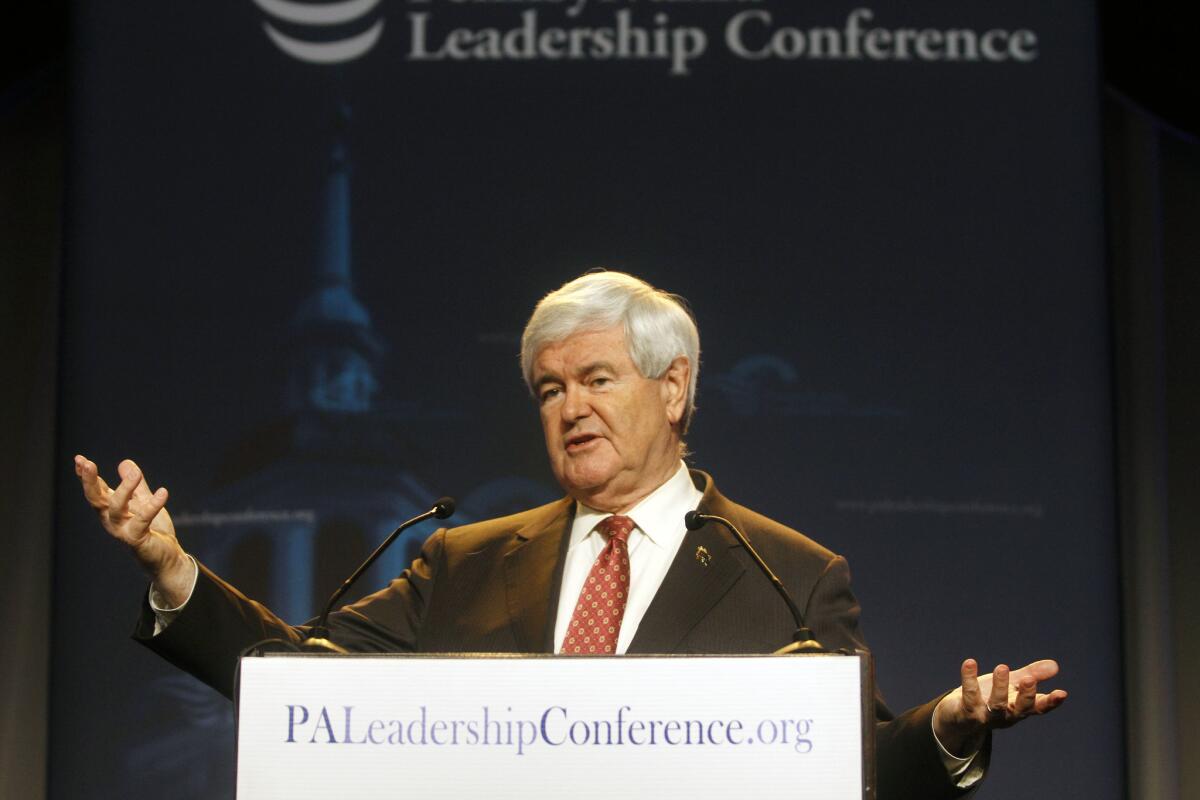
Former Republican House Speaker Newt Gingrich, in a new radio ad by GOP gubernatorial hopeful John Cox, calls the San Diego County businessman a “conservative champion” who is gaining momentum in California’s 2018 race for governor.
Gingrich notes that recent polls show Cox is second place in the race, behind Democratic front-runner Lt. Gov. Gavin Newsom, calling it evidence that the Republican candidate is leading a conservative resurgence in California.
“Why? Because they agree with John Cox on the two most pressing issues facing Californians — repealing Jerry Brown’s “sanctuary state” and his $52-billion gas tax increase,” Gingrich says in the ad.
Gingrich endorsed Cox in March.
The Cox campaign is spending $100,000 a week to air radio ads statewide, according to Cox spokesman Matt Shupe.
Cox, a wealthy Rancho Santa Fe businessman, is one of two prominent Republican candidates. Cox has poured $4 million into his campaign, giving him a major fundraising edge over his GOP rival, Assemblyman Travis Allen of Huntington Beach.
California has a top-two system, meaning if the Republicans don’t place first or second in the June 5 primary, there will not be a GOP gubernatorial candidate on the ballot in the November general election.
‘Trump has met his match,’ says Gov. Jerry Brown in promoting climate action on a quick trip to Canada
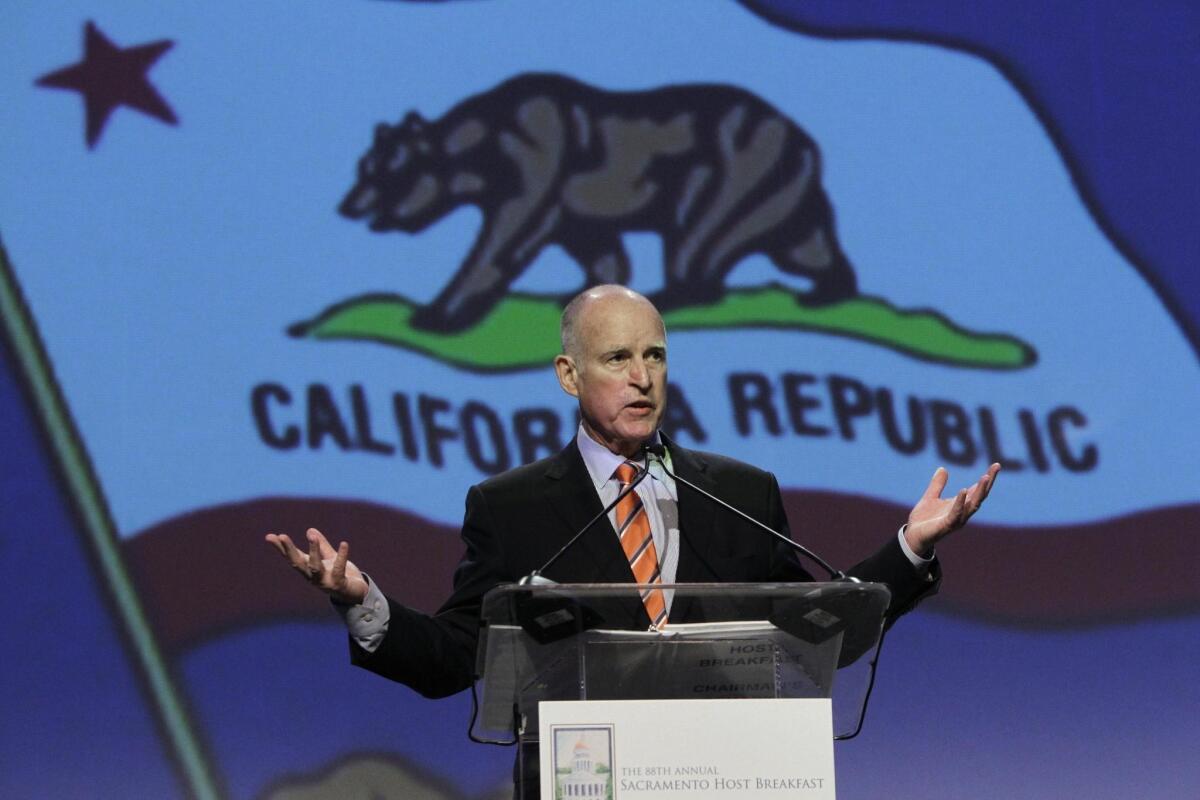
Gov. Jerry Brown told a Canadian audience Monday that he believes President Trump’s efforts to reverse course on climate change policy are a “momentary deviation” as others in the United States seek limits on greenhouse gas emissions.
“That’s very temporary, I can assure you,” Brown said at a joint event in Toronto with Ontario Premier Kathleen Wynne.
The governor’s quick international trip, announced only late last week, comes as Wynne’s Liberal Party faces a stiff challenge in June’s election from the Progressive Conservative Party of Ontario and its leader, Doug Ford. Critics of Wynne’s party have called for Ontario to pull out of the Western Climate Initiative, a cooperative agreement between three Canadian provinces and California on efforts to limit greenhouse gases.
Brown sought to link the efforts of Canadian conservatives with Republicans in the United States who oppose existing climate change programs. In contrast, he told the audience, several GOP lawmakers voted last summer to renew California’s cap-and-trade program.
”I would say to the conservatives of Canada, wake up and see what your friends in California are doing,” he said.
The Democrat took particular notice of Trump’s efforts to shift away from climate change policies from the administration of former President Obama, as well as a push by the Environmental Protection Agency to cancel California’s strict limits on automobile emissions.
“If Trump tries to change that, we’ll have litigation well beyond his term in office,” Brown said while also noting Chinese government efforts to produce more low-emissions vehicles. “Between California and China, Trump has met his match. What he’s saying is not going to happen.”
Many of the governor’s remarks, though, were aimed at the tough political situation in which Wynne finds herself with seven weeks to go before Ontario’s parliamentary elections.
“Dangers abound, but success is right in our hands,” Brown said. “So don’t blow it!”
California voters are getting to know the state’s attorney general through his aggressive stance challenging Trump
Less than two months from his first statewide election, California Atty. Gen. Xavier Becerra has become adept not only at challenging President Trump but at using the bully pulpit of his office to raise his profile with voters.
The aggressive effort may help boost the former Los Angeles congressman’s chances at winning a full term in office this fall, almost two years after he was appointed to replace Sen. Kamala Harris in 2017.
Appointed by Gov. Jerry Brown, Becerra took office as attorney general four days after Trump’s inauguration. That’s afforded him an opportunity to get in front of Californians — and potential voters — on an array of issues including immigration, healthcare and the environment.
Gov. Jerry Brown forms commission for 2020 census outreach
In an effort to make sure California has a strong showing in the next national census, Gov. Jerry Brown on Friday established a state commission to prepare outreach for the decennial count.
“It is vitally important for California to do everything it can to ensure that every Californian is counted in the upcoming census,” Brown said in a prepared statement.
The commission’s formation comes on the heels of a Trump administration plan to ask about citizenship status as a part of the census. State officials fear that such a question, which has not been asked in a census since 1950, could chill participation among California residents.
That could result in the state losing billions of dollars in federal funds and a seat in Congress.
The 23-member panel, appointed largely by Brown as well as picks by legislative leaders, comes from private- and public-sector backgrounds, including civil rights groups, religious institutions and educational institutions.
Garcetti kicks off Iowa visit with 2020 on his mind and a hardhat on his head
Asm. Rocky Chávez takes the lead in race to replace Issa, while Doug Applegate slips
A new poll shows that Republican Assemblyman Rocky Chávez has taken a clear lead over 15 other candidates running to replace Rep. Darrell Issa in Congress and has overtaken Democrat Doug Applegate, the previous frontrunner.
In a SurveyUSA poll by 10News and The San Diego Union-Tribune, Chávez, R-Oceanside, has support of 16 percent of likely voters, putting him ahead of Applegate, a lawyer, who was favored by 12 percent of voters and is in second place.
The top two vote-getters in June, regardless of party, will proceed to a November runoff election. Competing with Applegate for the No. 2 spot is Democrat Mike Levin, also a lawyer, with support of 9 percent of voters. Several other candidates were right at his heels. Democratic Businessman Paul Kerr and Board of Equalization Member Diane Harkey, R-Dana Point, were tied for fourth at 8 percent each.
Gavin Newsom, Kevin de León scoop up labor endorsement
Pro-Kevin de León group launches ad castigating Dianne Feinstein
A group that is supporting Kevin de León’s bid for the U.S. Senate launched a blistering ad against Sen. Dianne Feinstein on Thursday, questioning her progressive principles and tying her to President Trump.
The ad buy from A Progressive California is minuscule — $10,000 to air it in Los Angeles for one day on CNN and MSNBC during programming such as “The Rachel Maddow Show,” “Hardball with Chris Matthews” and “Anderson Cooper 360.”
The minute-long ad features news clips about Feinstein not getting the California Democratic Party endorsement earlier this year, as well as footage of Feinstein saying that Trump can be a good president and appearing to share a laugh with Trump.
That moment actually came during a White House meeting in the aftermath of the Parkland, Fla., school shooting when the president suggested an assault weapons ban should be included in a bipartisan bill to expand gun background checks.
It also features extensive clips of de León’s speech at the state party’s convention.
De León, who just ended his final term as leader of the state Senate, announced last year he would run against fellow Democrat Feinstein as she seeks her fifth full term.
Feinstein’s longtime political advisor dismissed the ad, noting the size of the buy.
“It’s not really a buy,” said Bill Carrick. “Ten thousand dollars in cable in L.A. Poof, it’s gone.”
Still, he said he planned to have the campaign’s lawyers review the ad to see if it violates campaign law that limits what outside groups like A Progressive California can do. Such groups cannot coordinate with campaigns or candidates, and are limited in how much their messages can support a candidate.
Ann Ravel, the former chair of the Federal Election Commission and the California Fair Political Practices Commission, said if the ad was in a state race, she is certain that the state commission would open an investigation into potential coordination with de León’s campaign because of the messaging and the types of footage in the ad. But the bipartisan federal commission can’t agree on how to enforce the federal regulations, she said.
“The problem is [outside groups] understand that given the lack of very strong enforcement at the federal level, there’s the ability to stretch the law,” she said.
A spokeswoman for the FEC declined to comment.
Dave Jacobson, a spokesman for A Progressive California, disputed the suggestion that the ad violated campaign law.
“This frivolous allegation shows that Sen. Feinstein is afraid of the public seeing an ad which showcases her own words, that ‘Donald Trump can be a good president,’” he said.
Dispute over money emerges in campaign to repeal California’s gas tax increase

A proposed initiative to repeal hikes to California’s gas tax has been caught in the middle of a dispute involving Republican rivals in the governor’s race.
Assemblyman Travis Allen, a Republican candidate for governor, decided in January to drop plans for his own initiative and said he would urge supporters to sign a separate petition being supported by several Republican members of Congress. Then last week, the committee Allen formed to finance his ballot measure reported a $300,000 contribution from PISF Inc., a Novato, Calif., real estate firm.
Now, an organizer of the still active “Give Voters a Voice” committee is urging the Allen committee to “immediately donate their funds” in support of the ongoing signature gathering efforts.
“There is only one gas tax repeal measure currently in circulation and that is the measure sponsored by the Give Voters a Voice Committee,” said Dave Gilliard, a consultant to the group.
PISF Inc., he said, “gave to repeal taxes and there is only one committee that can do that.”
Allen rejected the request, noting that the active initiative drive is co-chaired by wealthy businessman John Cox, a Republican also running for governor whose campaign has donated $250,000 to the initiative drive.
“I would be doing the gas-tax-repeal contributors a huge disservice if I was to transfer any funds to a campaign committee involving John Cox,” Allen said. “John Cox has spent millions of dollars campaigning for office and he has lost every single time.” Cox ran unsuccessfully for three offices in Illinois before he moved to California.
Allen said he will use the donations received by his ballot measure committee to campaign for approval of the gas tax initiative if it makes the November ballot, including a get-out-the vote effort.
“With this generous contribution, our coalition is stronger than ever and we will absolutely ensure that all Californians know that they will now have an opportunity to repeal Jerry Brown’s gas tax,” he said.
A change to California’s housing supply law could spur a big expansion in home building
A Bay Area lawmaker’s housing proposal could expand the size and scope of home building efforts in California at an unprecedented scale.
The legislation, Senate Bill 828, from state Sen. Scott Wiener (D-San Francisco), would require cities and counties to rezone land in their communities to permit many more homes than are currently in their plans.
Under the bill, local governments could have to double the amount of land made available for condominium and apartment complexes, and zone even more parcels for residential development in an effort to address a shortage of homes in the state that Wiener has estimated stands at 4 million.
Another Democrat drops out of race against Rohrabacher, backs fellow challenger Harley Rouda
Poll: Newsom still holds a solid lead in the governor’s race, and Cox remains in second place
Lt. Gov. Gavin Newsom remains the clear front-runner in California’s race for governor, with businessman John Cox and former Los Angeles Mayor Antonio Villaraigosa vying for second place, according to a new poll from the nonpartisan Public Policy Institute of California.
The survey, released Wednesday, found that 26% of likely voters backed Newsom, a Democrat and former mayor of San Francisco.
Only the top two finishers in the June 5 primary will advance to the November election, regardless of their party affiliation.
Cox, a Republican from Rancho Santa Fe, was favored by 15% of likely voters and Villaraigosa, a Democrat, by 13%. The narrow difference between the two candidates is within the poll’s margin of error.
Among the remaining candidates: Assemblyman Travis Allen (R-Huntington Beach) was supported by 10% of likely voters; state Treasurer John Chiang, a Democrat, by 7%; and former state schools chief Delaine Eastin, a Democrat, by 6%.
The results of the PPIC poll were very similar to those in a survey the organization released in March.
California parents fear school shootings but don’t want to arm teachers, survey finds
Two months after a gunman killed 17 people at a Florida high school, a new survey finds that most California parents are concerned about the threat of school shootings but that a large majority opposes allowing more teachers and school officials to carry guns on campus.
The statewide survey, released Wednesday, was conducted by the Public Policy Institute of California after a string of school shootings, including a Feb. 14 massacre at Marjory Stoneman Douglas High School in Parkland, Fla.
“In the wake of the Florida mass shooting tragedy, many California public school parents are concerned about school safety,” said Mark Baldassare, president and chief executive of PPIC. “Yet most oppose having more teachers carry guns.”
Survey takers were asked how concerned they are about “the threat of a mass shooting in your local school.”
The survey found 73% of California adults and 82% of public school parents say they are very or somewhat concerned. While 55% of Democrats said they are very concerned, only 24% of Republicans have that level of worry, according to the survey.
The survey found that 68% of Latinos and 57% of African Americans are very concerned, while that alarm level is felt by 49% of Asian Americans and 34% of whites.
Proposals have been made in other states to allow teachers and school officials to carry guns on campuses as a deterrent and protective measure against attacks by firearms.
The California survey found that 67% of adults and 68% of public school parents oppose allowing more teachers and school officials to carry guns at schools. There is more opposition in California than the nation as a whole. A recent CBS News poll found that 50% of adults nationwide oppose arming school officials.
The responses in California differ widely based on political affiliation. Some 86% of Democrats oppose arming school officials, but 60% of Republicans favor the idea.
Last year, the governor signed into law a measure that eliminates the power of school district administrators to give non-security school employees with concealed weapon permits permission to have firearms on K-12 campuses.
California lawmakers are currently considering a bill that would assign armed law enforcement officers to all school campuses at state expense.
Netflix CEO Reed Hastings donates $7 million to pro-Villaraigosa group
Reed Hastings, the chief executive of Netflix and a wealthy supporter of charter schools, donated $7 million on Wednesday to an independent expenditure group supporting Antonio Villaraigosa’s candidacy for governor.
The move is not surprising — Villaraigosa made waves taking on teachers unions as the mayor of Los Angeles, despite his roots as a labor organizer.
Villaraigosa is the most prominent Democrat in California to challenge the teachers unions, a fight he has continued since leaving the mayor’s office in 2013.
Hastings’ donation was made to Families & Teachers for Antonio Villaraigosa for Governor 2018, a group sponsored by the California Charter Schools Assn. Advocates, according to the California secretary of state’s office.
The money has the potential to increase Villaraigosa’s viability in the race. His chief rival is Lt. Gov. Gavin Newsom, who has received the backing of the California Teachers Assn. and other education unions.
Hastings was among the earliest contributors to Villaraigosa’s campaign, donating $56,400 in December 2016, according to filings with the state.
Facebook will no longer fund campaign opposing proposed California consumer privacy initiative

A representative for Facebook said Wednesday that the company would stop contributing funds to a campaign against a 2018 statewide ballot measure that would require companies to disclose what personal information from Californians they collect, buy or share.
The statement comes after Facebook Chief Executive Mark Zuckerberg underwent a grilling by 44 lawmakers over the social media giant’s role in the 2016 election and its lax privacy protections.
“We took this step in order to focus our efforts on supporting reasonable privacy measures in California,” Facebook spokeswoman Rochelle Nadhiri said.
Alastair Mactaggart, chief proponent of the the California Consumer Privacy Act, applauded the move. In a letter to Zuckerberg last month, he had slammed the company for attempting to sink privacy advocates’ efforts while federal officials had opened an investigation into how a data analytics firm, Cambridge Analytica, accessed the personal data of millions of Facebook users without their knowledge to help elect President Trump.
“Now that they have seen the error of their ways, we hope they will work with us proactively to protect the personal information of all Californians, and support us publicly and financially,” said Mactaggart, chairman of Californians for Consumer Privacy.
But a spokesman for the tech coalition funding the opposition campaign said a Facebook representative had called the ballot measure flawed.
The ballot measure “simply disconnects California,” said Steve Maviglio, who is representing the California Chamber of Commerce, TechNet and the Internet Assn. “It is unworkable and requires the internet in California to operate differently — limiting our choices, hurting our businesses and cutting our connection to the globe.”
Maviglio said the tech coalition plans to make major announcements of new opposition in coming weeks. Facebook, Google, AT&T, Verizon and Comcast have each contributed $200,000 to the opposition campaign.
Gov. Jerry Brown agrees to Trump’s National Guard request, but insists it won’t be to enforce immigration
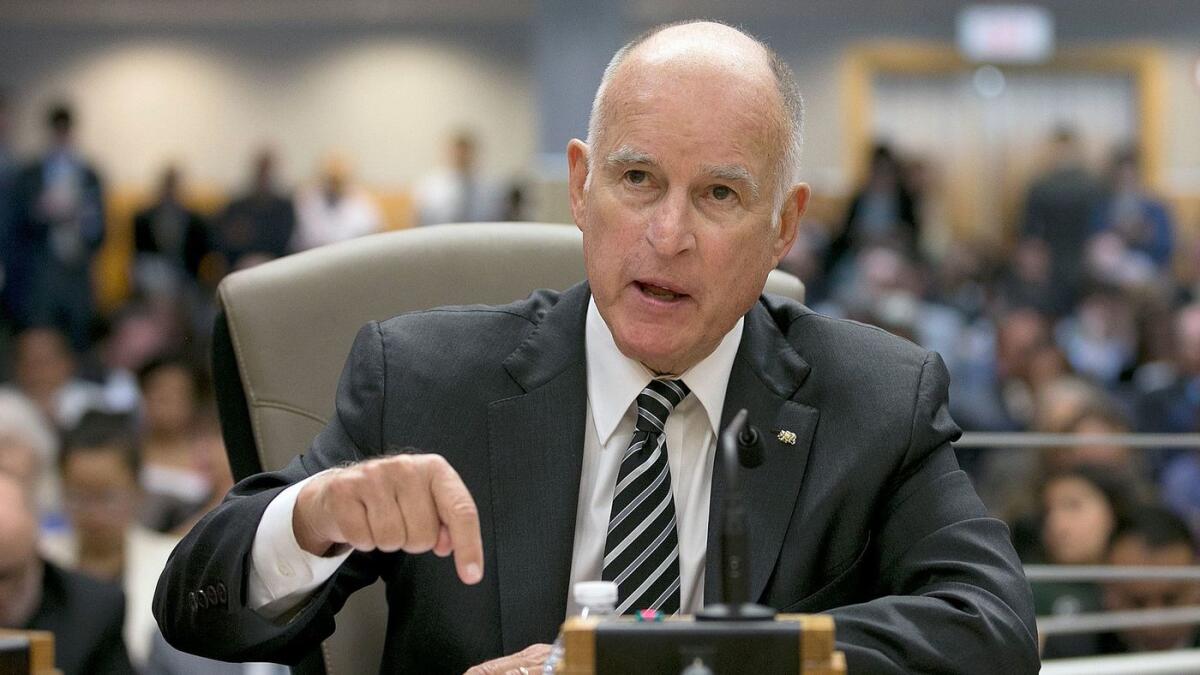
Gov. Jerry Brown agreed on Wednesday to expand the California National Guard’s efforts on crime and drug issues that cross the state’s border with Mexico, but insisted troops would not be used to enforce immigration directives from President Trump.
“This will not be a mission to build a new wall. It will not be a mission to round up women and children or detain people escaping violence and seeking a better life,” Brown wrote in a letter to Homeland Security Secretary Kirstjen Nielsen and Defense Secretary James N. Mattis. “And the California National Guard will not be enforcing federal immigration laws.”
The decision comes one week after the Trump administration asked governors in border states to provide Guard troops for assistance with the duties of Border Patrol agents. On Saturday, Mattis signed an order to send up to 4,000 Guard troops to the border, but barred them from interacting with migrants detained by the Border Patrol in most circumstances. The president later wrote on Twitter that “We are sealing up our Southern Border.”
But Brown suggested a very limited role for the 400 additional California troops, writing to Nielsen and Mattis that support operations would be focused on “targeting transnational criminal gangs, human traffickers and illegal firearm and drug smugglers along the border, the coast and throughout the state.”
A spokesman for Brown said the location and assignment of troops would “be dictated by the needs on the ground.”
And the governor insisted in his letter that Trump’s public pronouncements on border threats were misguided — pointing to statistics that show the number of detained immigrants in California is at its lowest point in nearly 50 years.
“Here are the facts: there is no massive wave of migrants pouring into California,” Brown wrote.
Man who accused of threatening to kill Rep. Maxine Waters expected to plead guilty
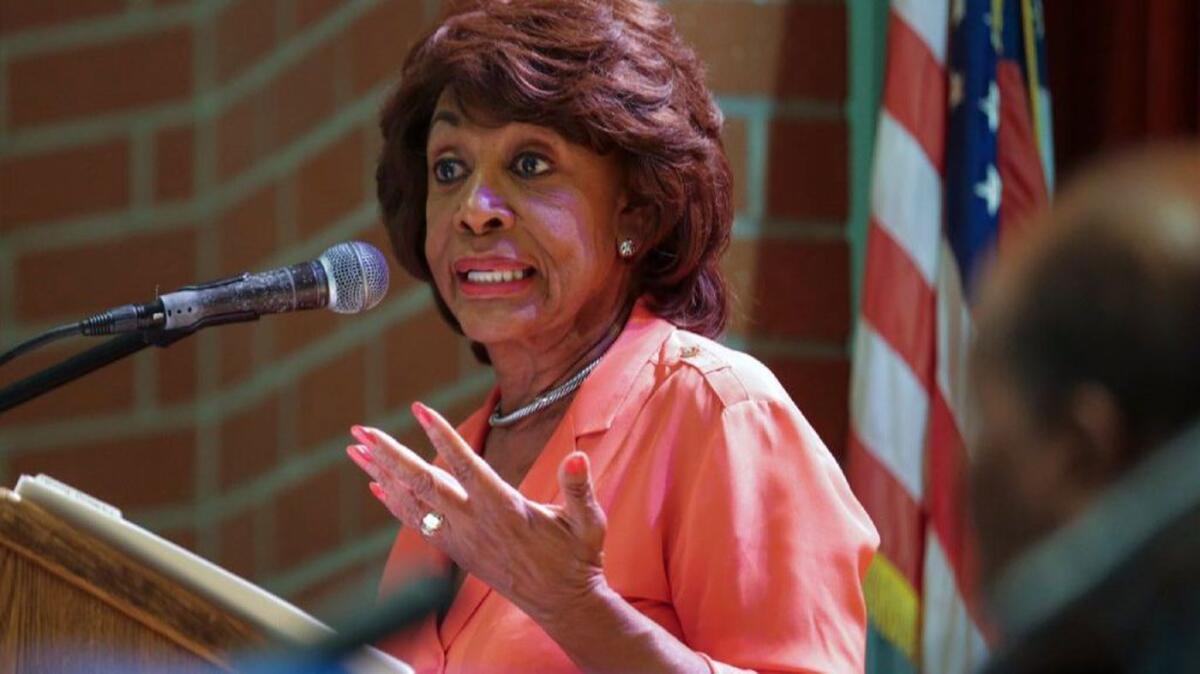
A San Pedro man is expected to plead guilty Wednesday to threatening to kill Rep. Maxine Waters over her criticism of President Trump.
Anthony Scott Lloyd, 45, faces a single count of threatening a United States official, according to a plea agreement filed March 26. It is punishable by up to 10 years in prison and a $250,000 fine.
According to the plea, Lloyd left a voicemail at Waters’ Capitol Hill office Oct. 22 using a racial slur to refer to Waters and an anti-gay slur, and stating that “if you continue to make threats towards the president, you’re going to wind up dead, Maxine, ’cause we’ll kill you.”
Waters’ staff forwarded the voicemail to Capitol Police, who referred it to the FBI.
According to the original complaint, Lloyd told the FBI that he was listening to talk radio and it was a “spur of the moment” decision to call Waters and leave the voicemail. Lloyd also told the FBI he had no intention of actually harming her.
Lloyd is scheduled to enter his plea Monday before U.S. District Judge Stephen V. Wilson in downtown Los Angeles.
Garcetti says state money would ‘accelerate’ Los Angeles’ homelessness plan
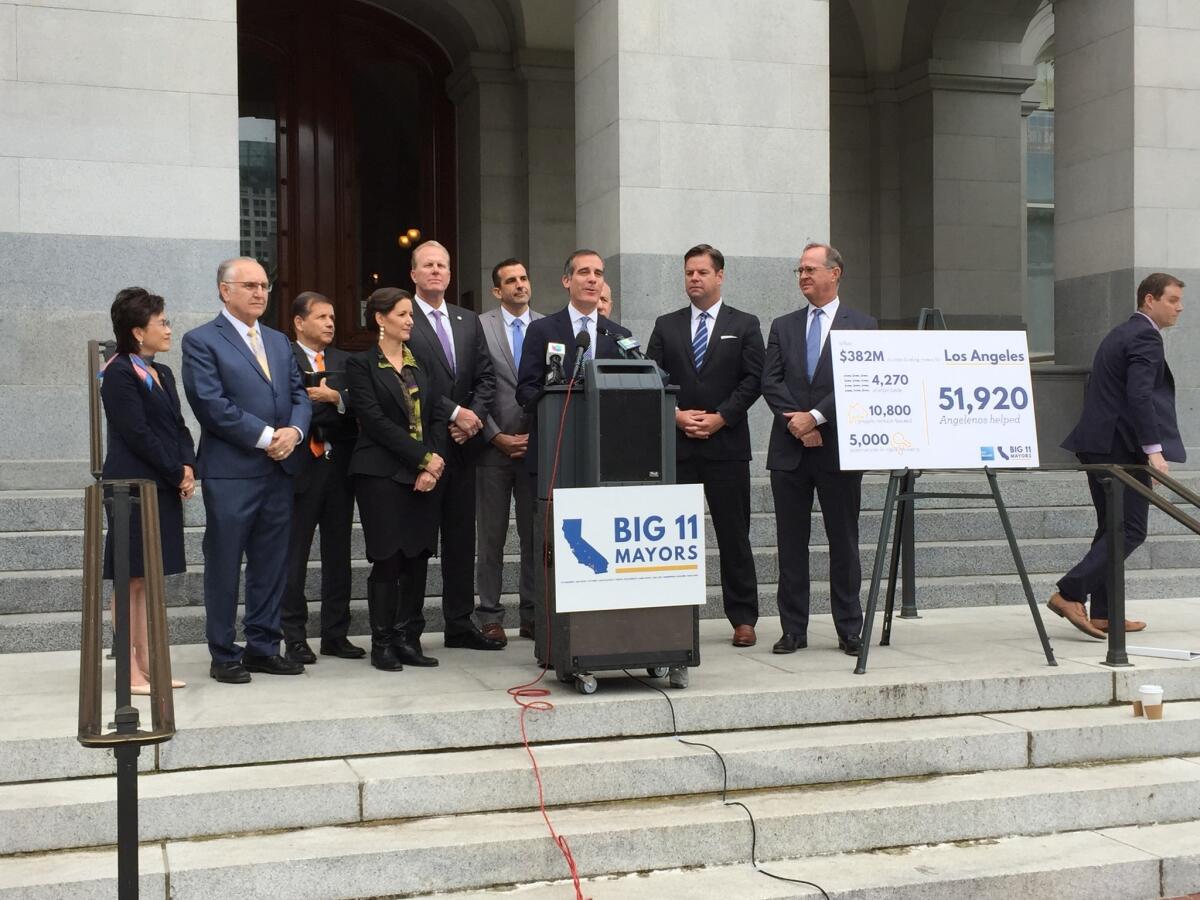
Los Angeles Mayor Eric Garcetti said Wednesday the city needs more money from the state to combat increasing homelessness, even though local voters recently approved ballot measures designed to bring in more than $1 billion in funding to help build new housing and provide supportive services.
Garcetti joined mayors from California’s other large cities at the Capitol to lobby for $1.5 billion in state homelessness funding, money that would come out of the more than $6 billion in a tax revenue windfall Gov. Jerry Brown is projecting in the coming year’s budget.
Although the city is working on using its new local dollars to build permanent homeless housing, state revenue could help with programs that could help people off the streets in the meantime, Garcetti said.
“We need help today from Sacramento,” he said. “We will be moving forward — I release my budget next week — on an immediate plan for shelter. But we can accelerate that and take thousands of people more off the streets if a portion of the surplus that we created comes here from Sacramento back to Los Angeles and to the other cities to immediately be able to have that housing.”
Wednesday’s news conference was the second one in recent months that large-city mayors have held to push for the homelessness dollars.
Garcetti: ‘We’re the same as Iowa’
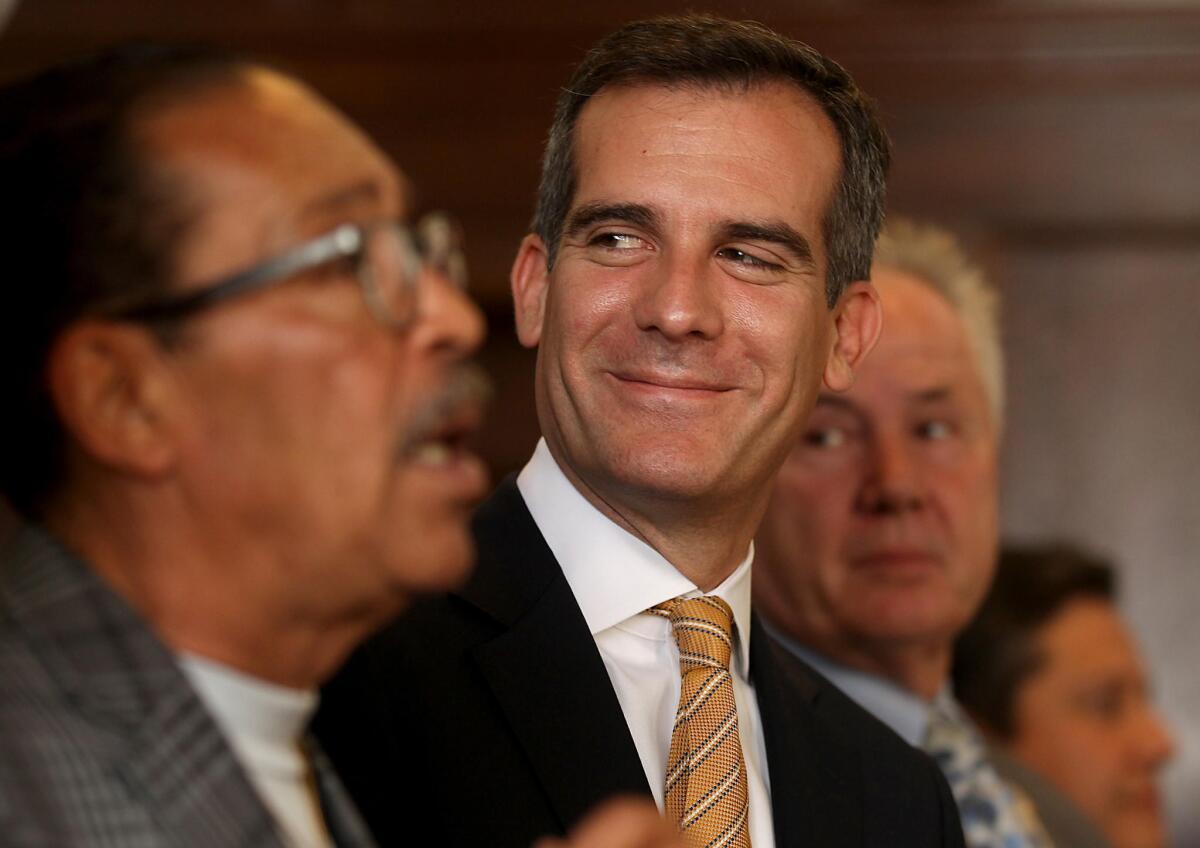
In advance of a trip later this week to the early presidential caucus state of Iowa, Los Angeles Mayor Eric Garcetti wants Iowans to know that they’re not any different from Angelenos.
“We’re the same as Iowa,” Garcetti said before a news conference in Sacramento. “These divisions that there’s the heartland and the coast to me are B.S.”
He went on to lavish compliments on the state. “Los Angeles is the heartland, and Iowa is the cutting edge. They have 31.3% of their power generated by wind, by renewable, the highest in the country,” he said. “They are a manufacturing capital like we are. They’re a farm state; we’re a farm state. I think we struggle with the same things: Will politicians listen to us? Will we have a country that brings us together rather than rips us apart?
“I think people probably imagine, as I’ve said before, that we’re mostly a city full of Kardashians and reality stars,” he said. “Well, we have a reality star leading this country. We’re actually everyday folks who are nurses and bus drivers and factory workers and firefighters, and we need to get back to work. We need a country that is not about driving people apart, but about multiplying our success.”
Garcetti, a Democrat, has said he’s considering a bid for the presidency in 2020.
Lawmakers retreat from ‘zero tolerance’ policy for young motorists who use pot
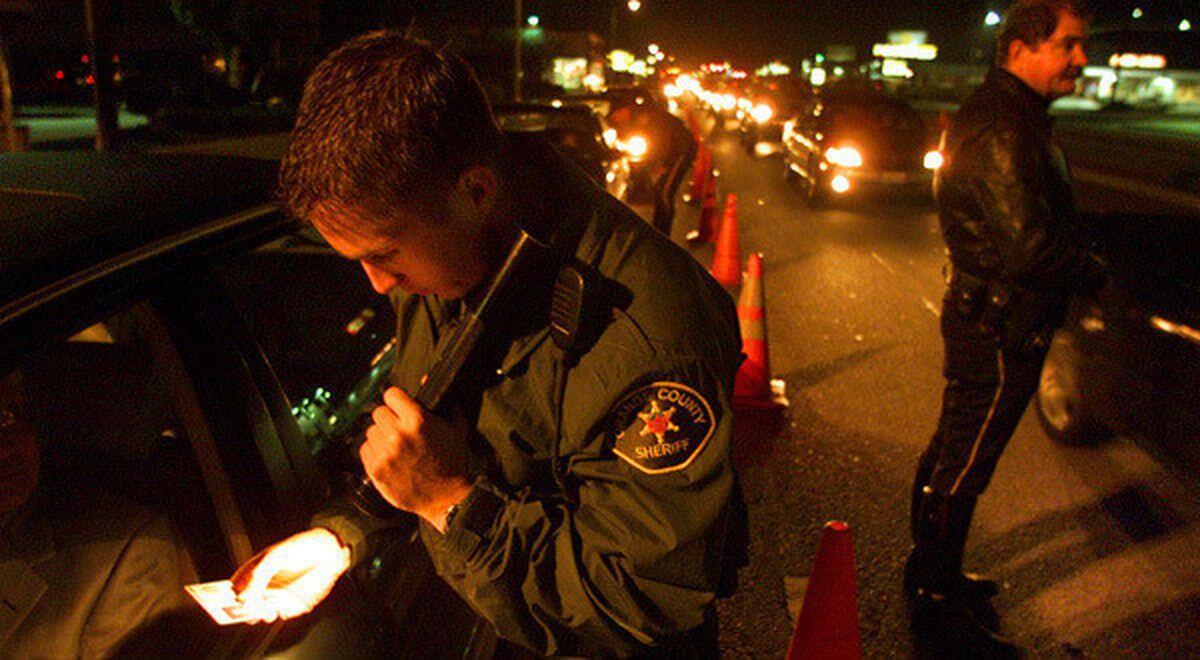
Faced with opposition from drug legalization advocates, California lawmakers backed away Tuesday from a proposal to adopt a “zero tolerance” policy on motorists under age 21 who drive after using marijuana.
A bill by state Sen. Jerry Hill (D-San Mateo) originally proposed a one-year suspension of driver’s licenses for minors caught for the first time driving with measurable amounts of marijuana in their system. Hill had said the state should have the same “zero tolerance” policy for cannabis that it has for those under 21 who drive under the influence of alcohol.
But faced with opposition, Hill agreed on Tuesday that the first offense would result in a warning, and the second offense would add one penalty point to the driver’s record, removable if they take a drug-awareness class. Only the third and subsequent offenses would result in suspension of the driver’s license.
The Senate Public Safety Committee recommended the amended bill with votes withheld by Democratic Sens. Holly Mitchell of Los Angeles and Steven Bradford of Gardena. The two lawmakers shared a concern that minority drivers would be disproportionately targeted by law enforcement.
“I think this is a slippery slope to target people of color,” Bradford said.
Sen. Nancy Skinner (D-Berkeley), the committee’s chairwoman, said she supported making the bill “a little more benign,” adding there is no “zero tolerance” policy for distracted driving, which she said causes more accidents by young people than do drugs.
Opponents included Glenn Backes, a lobbyist for the Drug Policy Alliance, which supported a measure that legalized the sale of marijuana for recreational use starting Jan. 1.
Backes said the oral swab saliva test proposed to determine the presence of delta-9-tetrahydrocannabinol has been known to produce “false positive” results.
“The tests that are being mandated in this bill are unreliable,” Backes told the committee.
The bill was also opposed by Mica Doctoroff, an attorney for the ACLU of California, who said the penalties — including suspensions and fees — are “too onerous,” and also said she is concerned they would disproportionately affect African American and Latino drivers.
“The uneven enforcement of California’s traffic laws on black and Latino drivers is very well established even though there are no documented differences in the driving behaviors of black, Latino and white drivers,” Doctoroff told the senators.
Sen. Joel Anderson (R-Alpine) was the only vote against the bill. He said he is concerned about innocent bystanders being cited after breathing secondhand marijuana smoke.
“I never smoked marijuana, but I went to a reggae concert once,” Anderson said.
Hill said it is unlikely those levels would register in the test.
He said the penalty for drugged driving is necessary, noting that 3.5% of minors killed in traffic accidents in 2013 in California had marijuana in their system, but the number jumped to 15% two years later.
“It shows that there is a problem,” he told his colleagues.
Students from UCLA and North High School in Torrance testified in favor of the bill and said their peers do not realize the danger of being impaired while driving after using marijuana.
The measure also was supported by retired California Highway Patrol Lt. Robert McGrory, whose son, CHP Officer Justin McGrory of Victorville, was killed by an 18-year-old who had been smoking marijuana before he got behind the wheel of his car.
“We have to educate the young,” McGrory told the panel.
California Air Resources Board sues Trump administration over repeal of anti-pollution rule
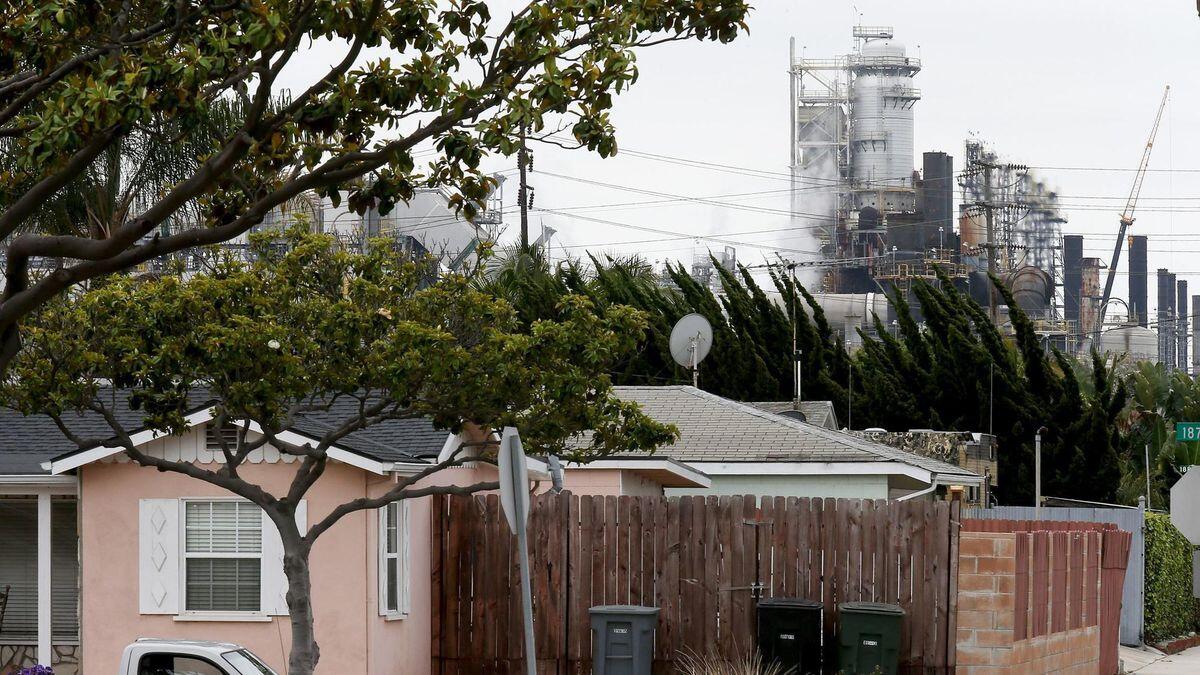
California’s clean-air board and its attorney general have sued the Trump administration to challenge as illegal the repeal of a policy that requires major sources of air pollutants, including oil refineries, to permanently take action to reduce their emissions, officials announced Tuesday.
The lawsuit filed by Atty. Gen. Xavier Becerra and the California Air Resources Board targets a policy change by the U.S. Environmental Protection Agency that would no longer require major polluters to install and operate equipment to permanently minimize the release of hazardous substances.
“Instead of prioritizing the health of hardworking Americans, EPA Administrator Scott Pruitt wants to let major polluters off the hook,” Becerra said in a statement. “That is unconscionable, and it is illegal.”
The lawsuit, filed in the U.S. Court of Appeals for the D.C. Circuit, is the 31st legal challenge undertaken by the Democratic attorney general against the administration of the Republican president, with others targeting Trump policies on immigration, healthcare and and the U.S. census.
Becerra has filed several other environmental lawsuits in the last year, including one to preserve a rule against release of methane from oil and gas operations on public lands. He also sued to challenge a delay in increased penalties for automakers whose vehicles fail to comply with fuel-efficiency standards. Yet another lawsuit challenged as unlawful the EPA’s one-year delay of ozone attainment standards.
Labor leader Maria Elena Durazo endorses Antonio Villaraigosa for governor
Delaine Eastin calls on rivals in California governor’s race to pledge pay equity and gender parity in hiring
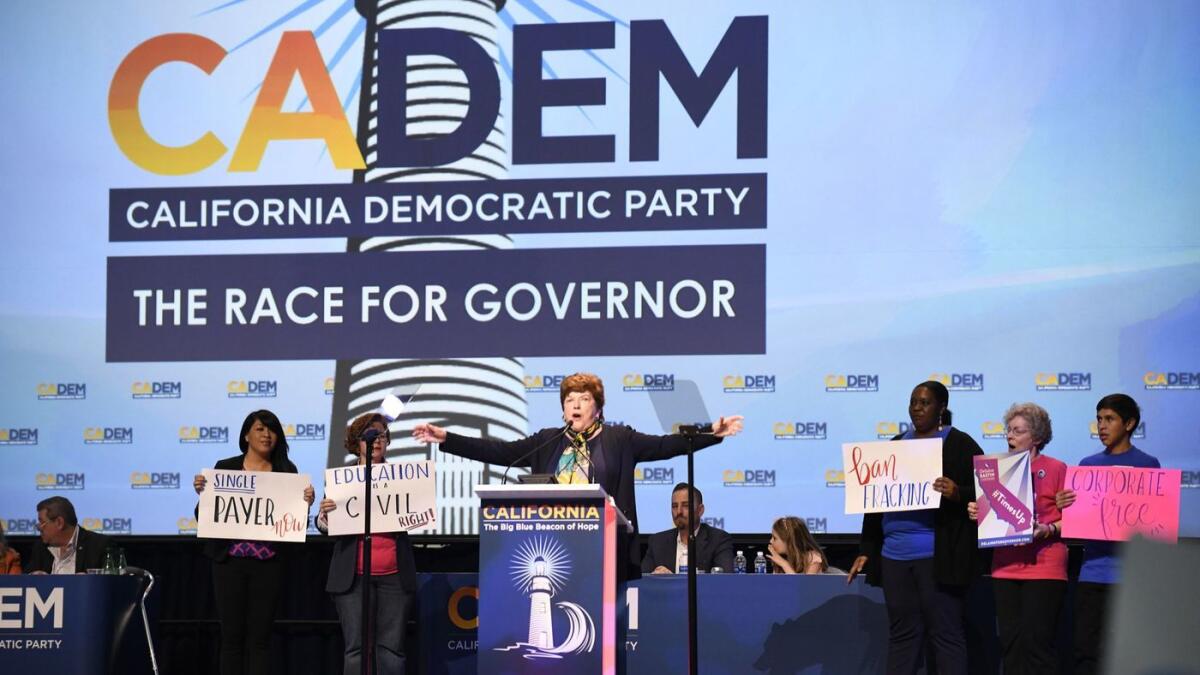
Democratic gubernatorial candidate Delaine Eastin marked Pay Equity Day on Tuesday by challenging her rivals in the race to pledge to hire equal numbers of men and women in their staffs and to pay them equally if elected.
“Several candidates have claimed to be feminists, so they should be more than comfortable making this pledge to gender parity in staffs and leadership, and pay equity for state workers in their administrations — or their claim is mere political grandstanding,” Eastin said in a statement.
The former state schools chief is one of only a handful of women to be elected statewide in California. The state’s voters have never elected a female governor, a glass ceiling Eastin hopes to shatter by campaigning vigorously around the state. But she badly lags behind her Democratic rivals in the polls and in fundraising.
Eastin announced her challenge on Equal Pay Day, which women’s rights advocates use to highlight the gender pay gap. The day marks how far into the year women must work to earn the same as men earned the previous year.
Major California housing bill narrowed before its first legislative debate
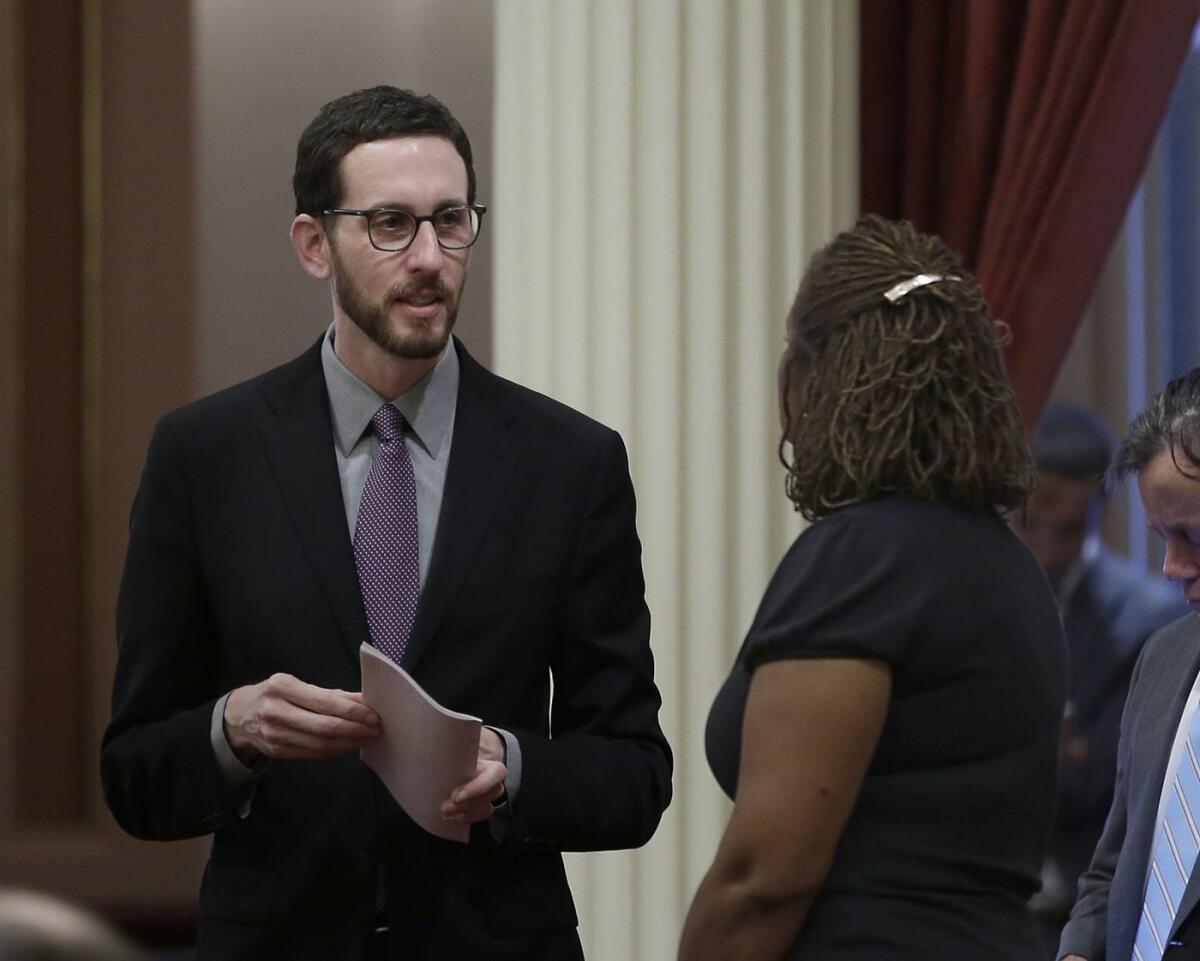
Ahead of its first legislative committee hearing scheduled for next week, a Bay Area lawmaker has narrowed his bill aimed at building more housing near transit across California.
Under the newly amended Senate Bill 827 from Sen. Scott Wiener (D-San Francisco), cities would be allowed to restrict building heights to four or five stories, down from a maximum of eight stories, within a half-mile of rail and ferry stops. Wiener also limited changes surrounding bus stops. The new version of the bill wouldn’t mandate height increases around bus stops, instead allowing for increased density and lower parking requirements. It also would apply only at bus stops with frequent service throughout the day, rather than just during rush hour.
SB 827 tries to address the state’s longstanding shortage of homes and a push by climate regulators to build near mass transit through dramatically changing development rules, particularly in the state’s largest metropolitan areas. Earlier versions of the bill would have affected nearly all of San Francisco and, according to a Times analysis, about 190,000 parcels currently zoned for single-family homes in Los Angeles — roughly half such parcels in the city.
The large swath of Los Angeles affected by the bill depended primarily on the legislation’s definition of bus stops. It was not immediately clear how much smaller the bill’s footprint would be in Los Angeles after the changes.
Major interest groups across the political spectrum already have weighed in on prior versions of the bill. Elected officials in San Francisco and Los Angeles, as well as smaller cities, are opposing SB 827 as an attack on their power. Development and business interests, including a group of tech executives, the California Assn. of Realtors and the California Building Industry Assn., have endorsed it. Environmental groups are split, with the Sierra Club California concerned that the bill might encourage communities to oppose new transit, while other organizations such as the Natural Resources Defense Council are in favor, arguing it helps the state meet its climate change goals.
Last week, 17 experts in the history of housing segregation across the country endorsed the bill, calling it a national model for addressing restrictive zoning practices. But nearly all groups representing low-income Californians and advocates for affordable housing that have taken a position on SB 827 oppose it, citing worries about displacement and gentrification.
Additional changes to the bill made this week try to address those concerns. All projects greater than 10 units will have to set aside a portion for low-income residents. It further restricts the demolition of rent-controlled or formerly rent-controlled properties. And the developers will have to provide monthly recurring transit passes to all residents at no cost.
“We have worked with both supporters and opponents on these amendments, and we will continue to work with anyone committed to solving our housing shortage as we move through the legislative process,” Wiener wrote in a Medium post announcing the changes. “We will bring more housing to our state if we work collectively on solutions.”
SB 827 is scheduled for its first hearing April 17 in the Senate Transportation and Housing Committee, Wiener’s office said.
Gov. Jerry Brown endorses Sen. Dianne Feinstein for reelection
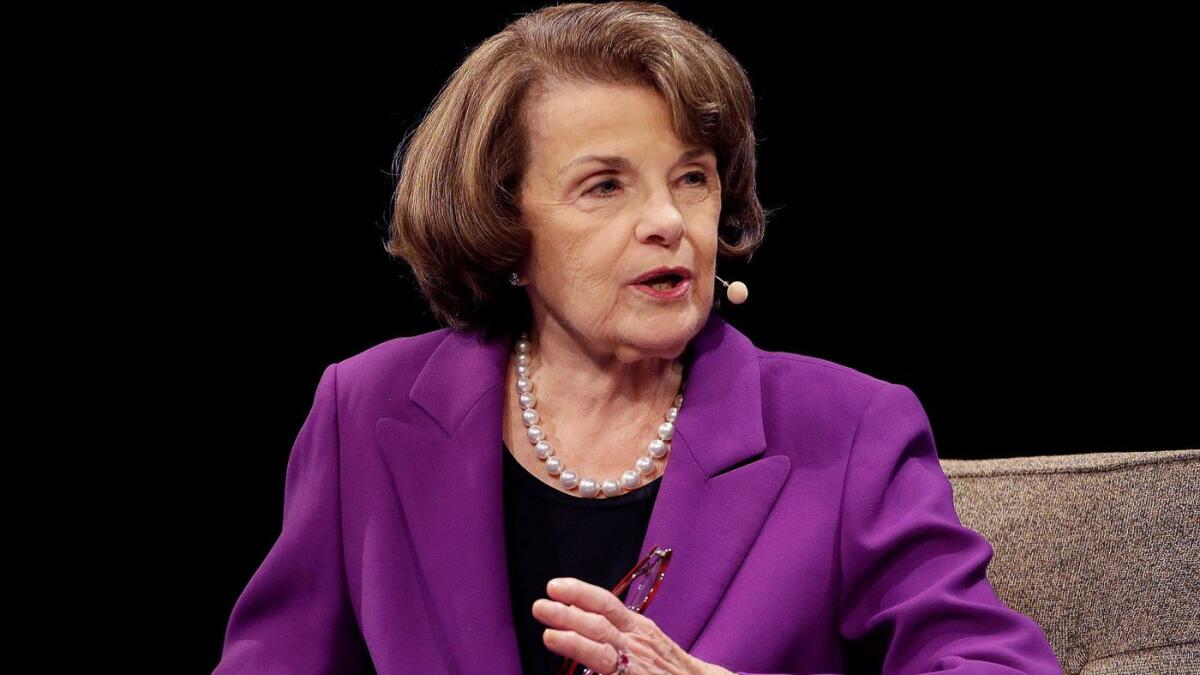
Gov. Jerry Brown on Tuesday endorsed Sen. Dianne Feinstein’s reelection bid.
“More than ever, we need Dianne Feinstein’s steady leadership in the U.S. Senate; she’s exactly the right person to ensure that Trump is held accountable. Dianne will continue to stand up for immigrants and fight to protect our healthcare and the environment,” Brown said in a statement.
The two San Francisco natives have developed a close relationship in the decades since Brown’s father, former Gov. Pat Brown, appointed Feinstein to the California Women’s Board of Terms and Parole. Feinstein officiated at Brown’s 2005 wedding and he has helped her raise cash in the past.
As she seeks her fifth full term, Feinstein’s opponents are trying to capitalize on progressive sentiment that Feinstein is too moderate and willing to compromise with Trump.
Sacramento district attorney addresses crime victims amid chants of ‘Stephon Clark’ from protesters
Sacramento Dist. Atty. Anne Marie Schubert was met with boos, applause and chants of “Stephon Clark” Monday at the state Capitol as she joined several law enforcement officials who were honored for their work in public safety at a crime victims rally.
Speaking over the protesters, Schubert did not address Clark’s case or take questions. She pledged only to represent victims and help people get back on track, whether through school or youth intervention programs.
“I will always stand with victims,” she said at the event hosted by Crime Victims United of California. “I will always do what’s right, and I will always follow the facts of the law.”
In the audience, a handful of protesters held a banner with Clark’s photo, shouting, “Clark was a victim” and “Why are you protecting cops?”
Schubert, one of three district attorneys honored by the victims rights’ group, has been under pressure from activists to criminally prosecute police officers Terrence Mercadel and Jared Robinet for shooting and killing Clark, 22, last month outside his grandparents’ home. She also has been under fire for receiving $13,000 in campaign money from two local law enforcement unions.
She has said those donations had been in the works before the shooting.
Anger over Clark’s death has spurred many demonstrations in recent weeks. Protesters have flooded Sacramento City Hall, blocked Interstate 5 and prevented access to the Golden 1 Center during Sacramento Kings games.
Protestors said they were angered to see Schubert honored. Conrad Crump, a friend of Clark’s, said he did not want Clark forgotten from the conversation.
California seeks to intervene to defend Obamacare in court

California on Monday jumped into the middle of a legal dispute over the future of the federal Affordable Care Act, seeking to preserve the law that is under assault in the courts by 20 other states.
California Atty. Gen. Xavier Becerra announced he is part of a coalition of 16 attorneys general who have filed a motion to intervene in the lawsuit filed in February by Texas, Wisconsin and other states seeking to overturn the Affordable Care Act, which provides tax credits for coverage and requires coverage for patients with pre-existing conditions.
“It is an irresponsible action,” Becerra said of the Texas lawsuit. “It is a legally unsound action, and it is a dangerous action for millions of Americans who left the bad days of pre-existing conditions and the inability to get care for their children.”
The lawsuit by Texas challenges Obamacare as unconstitutional, arguing that because Congress has set the penalty for going without insurance at zero, it does not count as a tax. A 2012 Supreme Court decision had upheld the law as a tax.
The motion to intervene by California, New York and other states argues that Texas’ lawsuit is legally insufficient and would cause chaos in the healthcare market.
The federal law has resulted in a reduction in the number of uninsured in California from double digits to about 7%, according to Carmela Coyle, president and CEO of the California Hospital Assn., who joined Becerra at a Sacramento press conference to announce the legal action.
“We can’t let the politics in a handful of states risk and erode the gains that we have made here in this state,” Coyle said.
The intervention to oppose the Texas lawsuit also drew support from Gayle Batiste, a nurse at Dignity Northridge Hospital and president of SEIU 121RN, a union representing registered nurses. She said before the Affordable Care Act, many patients waited until their illnesses were serious before seeing a doctor.
“They were waiting to come into the ER because they could not afford the care,” Batiste said during the event.
The states seeking to intervene have received more than half a trillion dollars in federal funding to provide healthcare to their residents under the federal law, with California getting $160 billion of that money, Becerra said.
“It’s our intent to protect the health of California families,” he added, criticizing the Trump administration for what he said was its history of not defending the Affordable Care Act.
Super-PAC launched media blitz for congressional candidate Sara Jacobs after her family gave major donation
An influential political committee launched a campaign blitz for Encinitas congressional candidate Sara Jacobs after her grandfather gave it one of the largest contributions it has received this election cycle.
The Women Vote! super-PAC launched a television campaign, digital ads, a website and a series of mailers this week following a $250,000 contribution by Jacobs’ grandfather, Qualcomm co-founder Irwin Jacobs.
Jacobs, 29, is running for the seat held by Rep. Darrell Issa, R-Vista, who is not seeking re-election. Her candidacy has made national news, including a profile in the magazine Cosmopolitan.
An ambitious California bill would put the state in charge of controlling prices in the commercial healthcare market
In one of the most aggressive efforts in the nation to curb soaring healthcare spending, a new California measure would put the state in charge of setting prices for hospital stays, doctor’s visits and most other medical services covered by commercial insurers.
The bill, backed by labor unions and consumer groups, is certain to rouse fierce opposition from physicians and hospitals, setting the stage for a brawl between some of the Capitol’s top lobbying heavyweights. Proponents also face friction on the left from advocates of single-payer healthcare, who espouse an alternate vision of how to overhaul the state’s healthcare.
Despite the political hurdles, an effort to rein in prices is tantalizing for policymakers, as healthcare costs gobble up more of state budgets, employers’ bottom lines and workers’ paychecks.
California’s special elections are a waste of time and taxpayer money
Want to save tax money? Have more dollars for schools or police? Then stop holding special elections hardly any voters care about.
Unlike many states, California wastes public funds by calling special elections to fill vacant seats in the Legislature.
Few people show up. Local taxpayers are out anywhere from a few hundred thousand dollars to well over a million. But the governor could do it for free and much more quickly.
Investigation finds sexual harassment allegations against top California legislative staffer ‘substantiated’
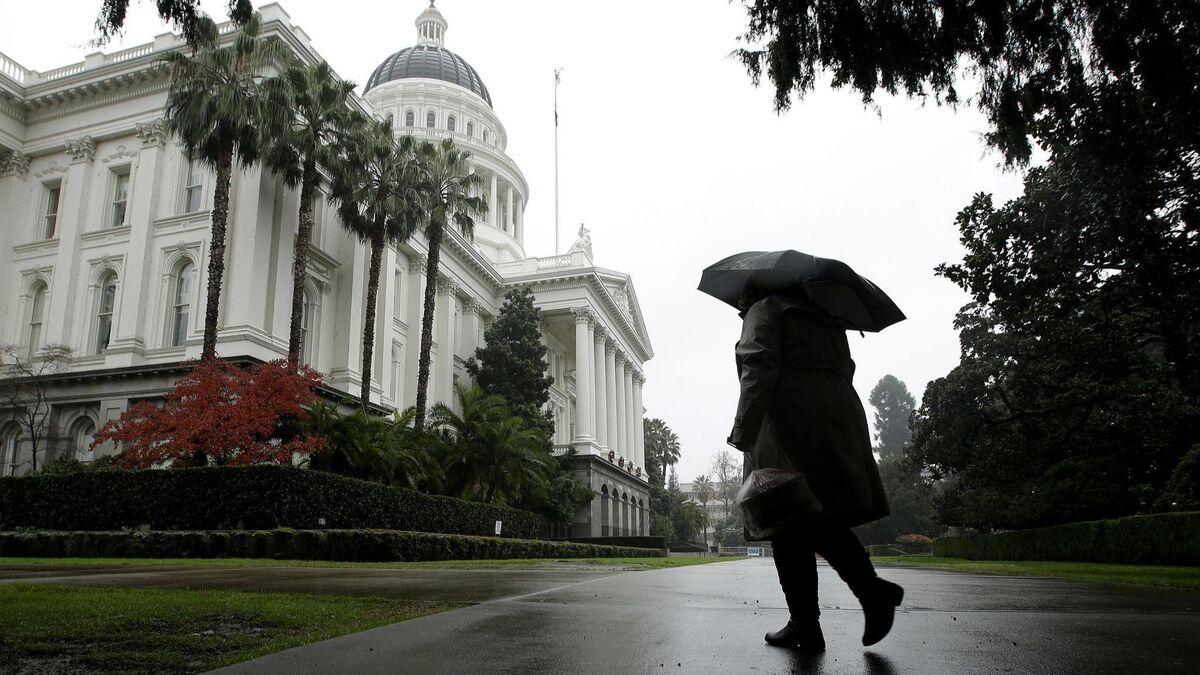
A top legislative staff member has resigned during an investigation that substantiated allegations he made sexually inappropriate comments to two female state employees in violation of state policies, according to internal documents and a letter to Wilson from Debra Gravert, the chief administrative officer for the Assembly.
The investigation looked at sexual harassment allegations against Rodney Wilson, who was chief of staff to Assemblyman Tom Daly (D-Anaheim) until Wilson resigned Jan. 2 to become a state lobbyist. One female state employee told Assembly personnel investigators that on the last day of session in September that Wilson came into an unidentified state office after hours and appeared intoxicated.
The staff member, whose name was redacted from investigative reports, alleged Wilson made “sexual innuendos” toward her and another woman who told her “she was upset with Wilson’s behavior,” according to internal documents and a letter to Wilson from Debra Gravert, the chief administrative officer for the Assembly.
The letter said there were two witnesses who heard sexually inappropriate comments made by Wilson toward another employee.
“Based on the interviews, the investigator determined this allegation was substantiated, that is, it is more likely than not that the alleged conduct did occur,” Gravert wrote March 13.
The investigator reached the same conclusion on an allegation that Wilson made “unwanted sexually suggestive” comments to a second employee.
“This finding is based on the fact that the complainant’s recollection of this conversation was found to be more credible than your denial,” Gravert wrote to Wilson.
The investigation also substantiated allegations that Wilson “leered at two Assembly employees, making them uncomfortable.”
Wilson said in a statement that his resignation had nothing to do with the allegations and he does not recall making offensive comments or looking at the women inappropriately.
“While I disagree with the `more likely than not’ conclusions of this investigation and believe I should be able to review the report, I respect the Assembly’s process in dealing with the complaint,” Wilson added. “I sincerely apologize to those who may have been offended by their perception of the way I looked at them or what they believe they might have heard.”
Although Wilson’s resignation precludes any personnel action, the Assembly Rules Committee will use the findings as the Assembly “works to improve the culture in the California State Capitol as it pertains to harassment including initiating remedial action designed to help preclude future occurrences of harassing comments,” Gravert wrote to the two female staffers who made the complaints.
Daly, who was not implicated in the allegations, said: “Today is the first that I have heard of any accusations against him (Wilson). I fully support the work of the Assembly toward reinforcing our zero-tolerance policy on harassment.”
The documents were released at the request of the Los Angeles Times and other newspapers as a series of allegations of sexual harassment have led to the resignation of three other state legislators.
Updated at 5 pm to include a comment from Daly. Updated at 6:25 pm to include a statement from Wilson.
The effort to raise taxes on commercial property by changing Prop. 13 delays push to 2020
An ambitious effort to raise commercial property taxes through revamping California’s Proposition 13 will no longer be aimed at earning a spot on this fall’s statewide ballot, supporters said on Friday.
“The longer that we have to explain this issue, the better that we’re going to do,” said Mac Zilber, a political strategist working with the coalition of community and labor groups behind the plan.
Long discussed among liberal and Democratic activists, the proposed initiative would redefine Proposition 13’s limits on property taxes to focus mostly on homeowners. Commercially owned properties would be assessed at market values — a change the group believes could generate as much as $11 billion a year for local services and schools.
It would also have a significant impact on California’s state budget, which has subsidized K-12 education with personal income tax dollars since local revenues were slashed by Proposition 13 in 1978.
The backers of the “split roll” initiative conceded that California’s election laws offer a unique opportunity to qualify their initiative now — while the number of signatures needed to qualify for the ballot is low — and have the measure be held over until the November 2020 election.
State law sets the number of signatures needed for an initiative on the total number of votes cast in the race for governor — a threshold that dropped to a historic low after anemic voter turnout in 2014. Those requirements will be reset after this fall’s election to replace Gov. Jerry Brown.
The initiative, which was cleared for signature-gathering in February, has until August to collect support for the 2020 ballot. The longer time frame means the process is likely to cost much less than a hurried effort to meet the deadlines for the Nov. 6 statewide ballot.
“It helps us shepherd our funds and use them in the most efficient way,” Zilber said.
Latino support becomes a flashpoint in race for California governor
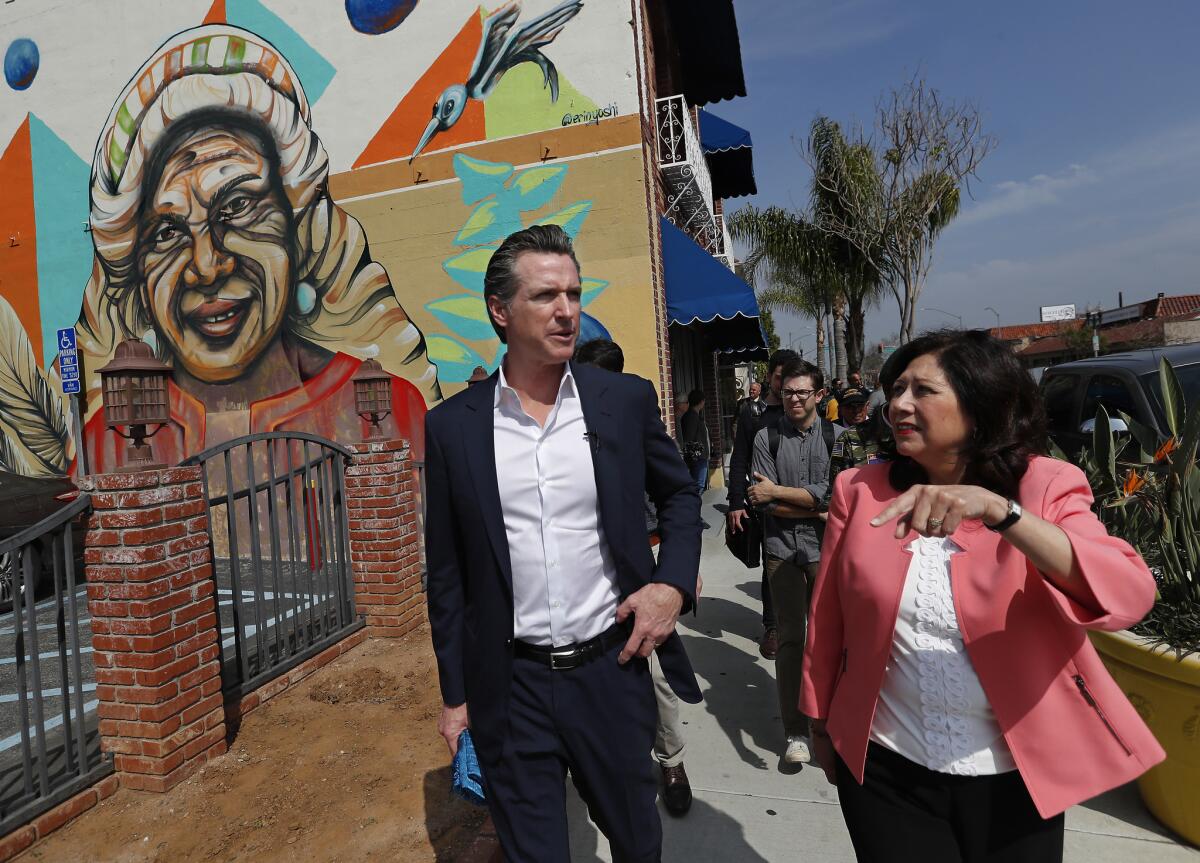
After facing criticism for not taking part in a Latino business group’s gubernatorial forum, Lt. Gov. Gavin Newsom has rolled out an endorsement from one of the most prominent Latino politicians in the state.
Hilda Solis, a former member of the Obama administration who now serves on the Los Angeles County Board of Supervisors, announced Thursday that she was backing Newsom at a campaign event in East Los Angeles.
“Gavin Newsom is a true champion for all Californians,” Solis said in a statement, pointing to his record on healthcare and city finances as mayor of San Francisco. “There’s no question that on issues that matter to families — from providing quality health care and good paying jobs to standing up for immigrant families and protecting Californians from Donald Trump’s attacks — Gavin’s the leader we need sitting behind the Governor’s Desk.”
The event took place the day after Newsom was the sole Democrat to skip a gubernatorial forum hosted by the L.A. Latino Chamber of Commerce in downtown Los Angeles.
A spokesman for his campaign previously said that Newsom had taken part in multiple debates and forums sponsored by labor, Democratic and education groups, and was not planning on attending another one until early May.
Former Los Angeles Mayor Antonio Villaraigosa, state Treasurer John Chiang and former state schools chief Delaine Eastin all noted his absence at the chamber gathering.
Gloria Molina, who represented Los Angeles for more than three decades in city, county and state legislative office, was among those who criticized Newsom for failing to attend the forum.
“Hillary Clinton and Bernie Sanders met more than 20 times in debates and forums — if the Democratic candidates for president were willing to show respect to the voters by debating, why won’t Gavin Newsom debate?” Molina said in a statement. “If Gavin won’t show up for our community when he is looking for votes, will he care about our community when he is Governor?”
Molina is backing Villaraigosa, who is fighting to make the top two in the June primary, and whose campaign is partly dependent on Latino voters turning out in large numbers. In a March poll by the Public Policy Institute of California, Villaraigosa won the support of 37% of Latino voters, with Newsom receiving 19%.
No, California’s ‘sanctuary state’ law does not allow the release of dangerous criminals to the streets

As the fight over California’s immigration policies intensifies, so have the attacks from opponents who argue its landmark “sanctuary state” law is allowing the release of violent criminals into the streets.
The California Values Act, which was signed into law last year, prevents law enforcement officers in many cases from holding and questioning people at the request of federal immigration agents, and limits them from sharing the release dates of some county jail inmates who are in the country illegally.
The law has set off a tense showdown over public safety. But some officials who oppose the measure have distorted its scope.
Here is a look at some of those statements.
100,000 California teenagers are now pre-registered to vote
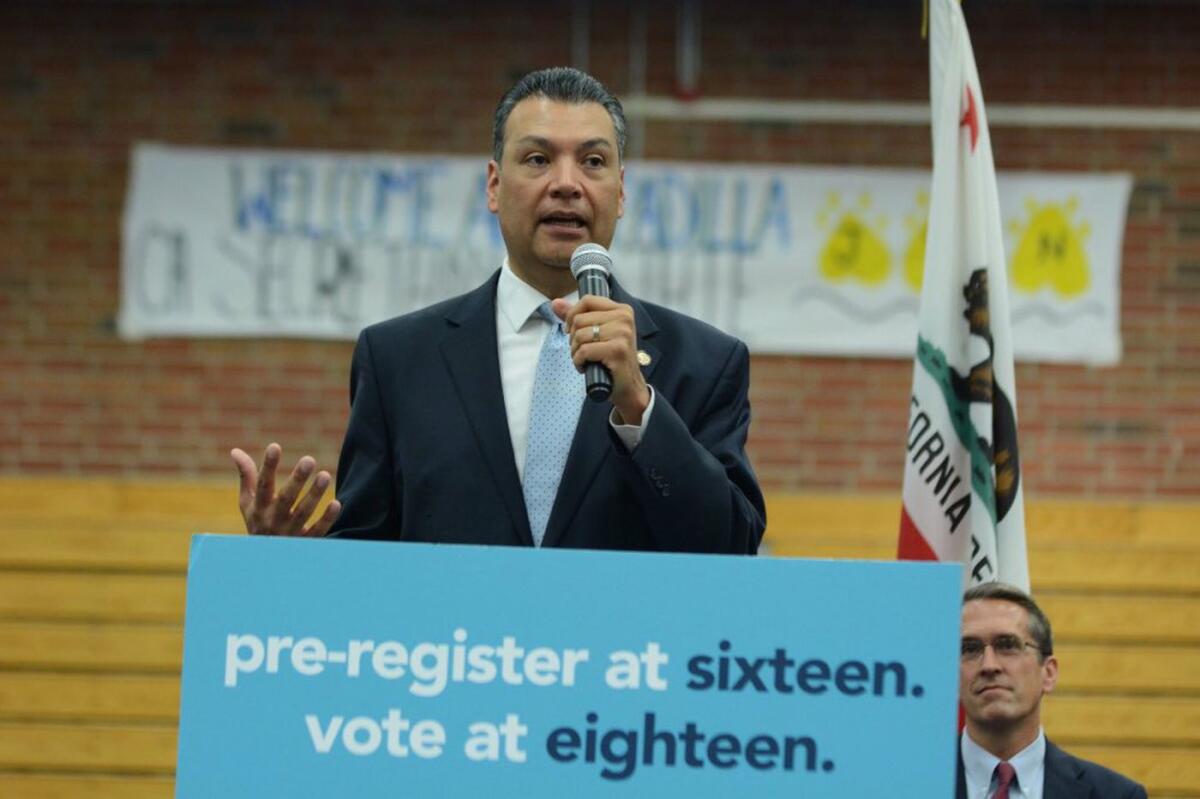
California’s effort to get 16- and 17-year-olds to pre-register to vote has now enlisted 100,000 teenagers, according to information released on Friday by Secretary of State Alex Padilla.
“This is a big milestone,” Padilla said. “I’m optimistic it’s going to translate into action at the ballot box.”
The program, which began in the fall of 2016, automatically activates the teen’s registration at age 18. State officials reported that more than 10% of the total number of pre-registrations have come in just the last few weeks.
Padilla said there’s been a noticeable uptick in teenagers signing up following the mass shooting at a Parkland, Fla., high school in February and last month’s nationwide protests over gun violence.
“The impact of recent events is undeniable,” Padilla said. “It’s absolutely served as a motivator for young people to pay more attention.”
About 43% of the pre-registrations were California teenagers who chose to be unaffiliated, non-party voters. About 38% chose the Democratic Party and just 10% chose to be ultimately registered as a Republican.
The state’s chief elections officer announced the new milestone for teenager pre-registration at the same time he unveiled a new state website designed to connect high school students with civic engagement opportunities, including mock elections and student poll worker programs.
Compton Mayor Aja Brown drops congressional bid
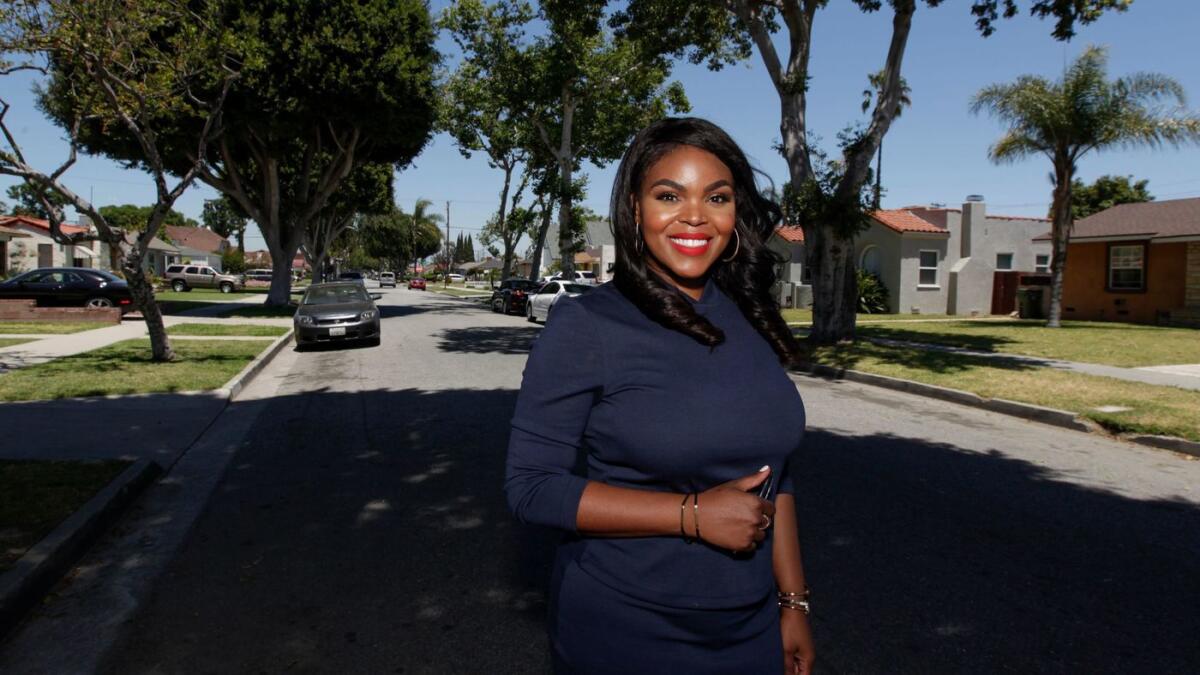
Compton Mayor Aja Brown said Thursday night she is withdrawing her candidacy in California’s 44th Congressional District, a week after conservative celebrity Stacey Dash dropped out of the race.
They each were trying to unseat freshman Rep. Nanette Barragán (D-San Pedro), who is running a well-funded campaign. The district is overwhelmingly Democratic.
Brown said she is expecting her first child. “My family commitments supersede my ability to expand my level of service,” the mayor said in a statement.
Brown, a Democrat, and Dash, a Republican, will still remain on the ballot.
The short-lived Dash candidacy shook up Barragán’s otherwise straightforward reelection race. Brown launched a last-minute bid last month citing Dash as a “motivating” factor in her decision.
Sen. Kamala Harris on Stephon Clark: ‘My heart breaks for what has happened’
Sen. Kamala Harris told a Sacramento crowd Thursday she was grieving with them over the death of Stephon Clark, an unarmed black man whose shooting by police nearly three weeks ago has roiled California’s capital city.
Hosting a town hall at a church, Harris addressed the shooting at the outset and touted training for law enforcement to counter implicit bias, telling the audience that Clark’s life “is a life that should not have been lost. That is a loss that should not have been taken.”
The Democrat, who had been criticized by some black lawmakers during her previous job as California’s attorney general for not taking stronger action on police shootings, spoke of her work to establish implicit-bias training while serving as the state’s “top cop.”
That program, she said, “trained over 2,000 police officers to recognize that we all carry bias. We all do. But when your bias is coupled with the fact that you carry a gun, it is something that has to be a priority for us.”
Clark’s shooting was a constant thread through the afternoon. At one point, the church’s leader paused questions to acknowledge Clark’s grandmother in the audience. She received a standing ovation.
The incident was at the forefront of attendees’ minds as well. Patricia Holt, who traveled from Vallejo for the town hall, said that she wanted to hear Harris say that “she is going to do something to make the Police Department be held accountable for what they’ve been doing.”
Harris was less specific when it came to proposals pending before the state Legislature to address police shootings, including one that would raise the standard for the use of deadly force.
“I’m looking forward to seeing the language,” Harris told reporters after the event. “I think they’re very interesting. Certainly there’s work to be done.”
Asked whether she believed law enforcement had too much clout in the state Capitol, she did not directly address their influence.
“I think we need to have reform,” she said. “There’s no question.”
Speaking before a largely friendly crowd who delighted in Harris’ frank descriptions of life in Washington — “It’s a whole situation in D.C.,” she said — the senator appealed to Democratic orthodoxy, calling for an overturn of the U.S. Supreme Court’s Citizens United decision on campaign finance and vowing to support bipartisan comprehensive immigration reform.
A small but vocal group of President Trump supporters occasionally shouted questions at her, accusing her of prioritizing those in the country illegally over American citizens.
“I’m not putting anybody over anybody,” she responded to applause.
California housing crisis podcast: Why aren’t there enough construction workers in the state?
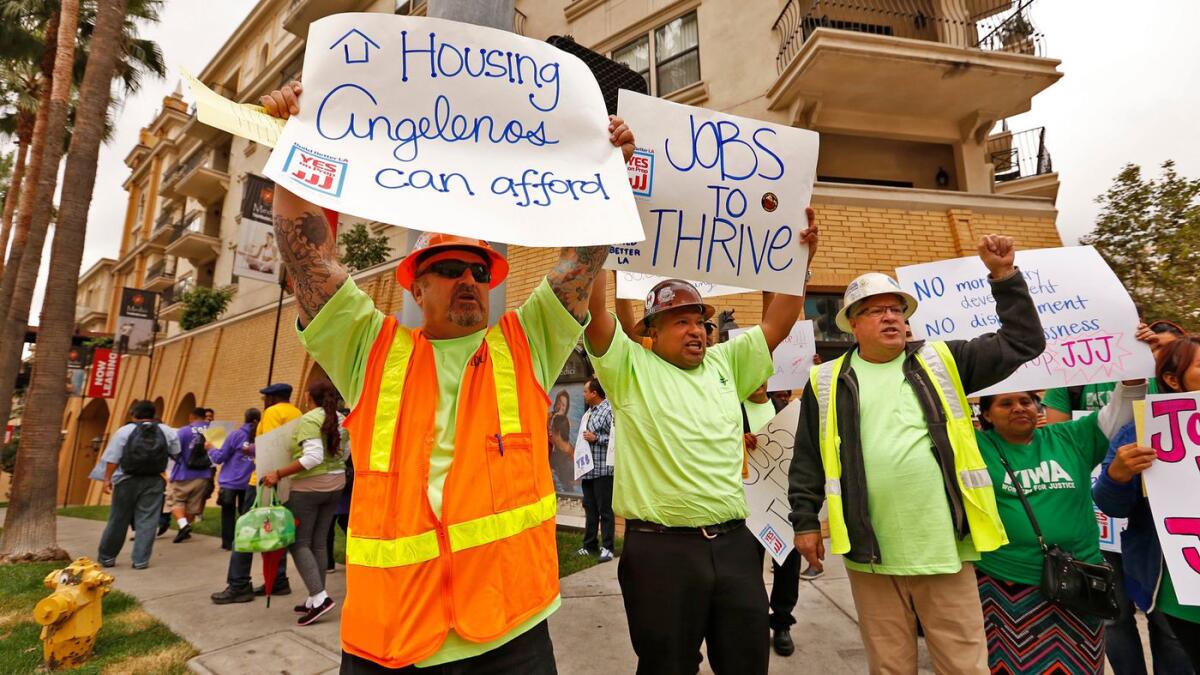
California has a shortage of homes, which is a key factor in the state’s affordability crisis.
To fix that problem, a lot more building will need to happen in the state. But there’s another issue: an ongoing shortage of construction workers.
On this episode of Gimme Shelter: The California Housing Crisis Pod, we talk about the labor shortage and how that is affecting homebuilding across California. We also debate the influence of the state construction workers union at the Capitol and the significance of union-level wages for building new houses.
Our guests are Rachel Bardis of Bardis Homes, a Sacramento-area developer, and Alex Lantsberg, an analyst with the San Francisco electricians’ union.
“Gimme Shelter,” a biweekly podcast that looks at why it’s so expensive to live in California and what the state can do about it, features Liam Dillon, who covers housing affordability issues for the Los Angeles Times’ Sacramento bureau, and Matt Levin, data reporter for CALmatters.
You can subscribe to “Gimme Shelter” on iTunes, Stitcher, Soundcloud, Google Play and Overcast.
In an already tough election year, Dana Rohrabacher is struggling with his own party
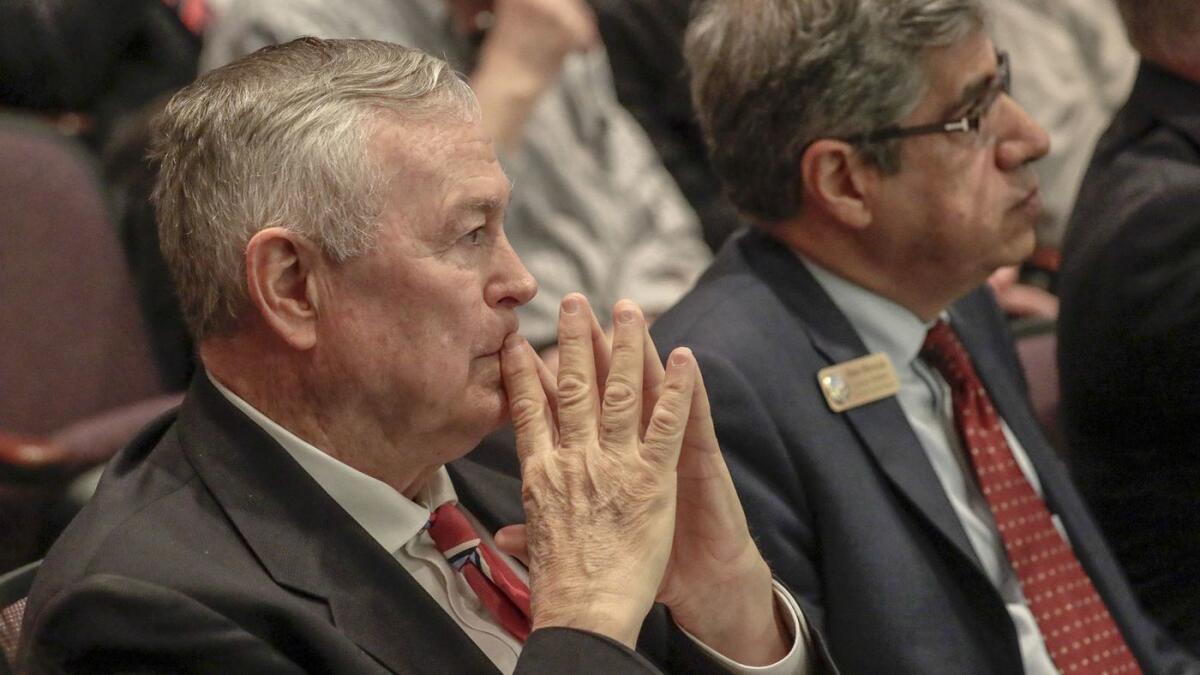
Rep. Dana Rohrabacher was already having a tough election year.
The Orange County Republican has drawn more than half a dozen Democratic challengers, some of whom have raised more cash than the 15-term congressman.
Election have handicappers declared his race a toss-up, protesters have shown up at his home and district office, and Rohrabacher’s name has frequently come up during the investigation into Russian election meddling because of his connections to key figures in the inquiry.
Then Scott Baugh, a well-known Republican who spent more than a decade leading the county party, decided to run against him.
As the GOP works to protect vulnerable incumbents whom Democrats want to oust in order to regain control of the House, Rohrabacher’s longtime local support network is starting to buckle.
California lawmakers want to roll back some criminal sentencing laws, keep young offenders out of adult court
In a legislative hearing packed with criminal justice experts and former youth offenders, California lawmakers pushed forward a bill this week to keep minors who commit crimes out of adult courts.
The proposal, one of several in a package of bills introduced by Sens. Holly J. Mitchell (D-Los Angeles) and Ricardo Lara (D-Bell Gardens), is part of an ongoing effort to divert young people from a path to prison and create parity in state punishment laws. Other bills would roll back mandatory sentencing rules that research shows disproportionally affect black and Latino defendants.
At a news conference on Tuesday, Mitchell pointed to the fatal Sacramento shooting of Stephon Clark, an unarmed, 22-year-old black man shot by police in his grandparents’ backyard, challenging lawmakers and advocates to redefine the definition of public safety so that it applies to everyone.
Watch: Democrats attend forum for Latino-owned businesses
Three gubernatorial candidates are talking about issues affecting Latino-owned businesses at a forum hosted by the Los Angeles Latino Chamber of Commerce in downtown Los Angeles.
Participating are Democrats Antonio Villaraigosa, John Chiang and Delaine Eastin. Front-runner Gavin Newsom is not attending.
Two races to replace assemblymen accused of sexual misconduct go to runoff
Contests to replace two Democratic San Fernando Valley state assemblymen who resigned amid accusations of sexual misconduct are headed to a June primary with Democrats favored to keep both seats.
Democrats Luz Rivas and Jesse Gabriel each won the most votes in their respective races to fill the remaining terms of former Assemblymen Raul Bocanegra and Matt Dababneh in the heavily Democratic districts, according to initial but still unofficial results.
Rivas, a 44-year-old science educator and Los Angeles Public Works Commissioner, beat out four other Democrats on the ballot with 41% of the vote. She will face No. 2 finisher Republican plumbing and electrical contractor Ricardo Benitez, 60, who claimed 21% of the vote in the race to replace Bocanegra.
Rivas and Benitez are competing to represent the 39th Assembly District, which includes Sylmar, Sun Valley and North Hollywood. Just over 52% of voters in the district are registered Democrats; 14% are Republicans.
In the 45th Assembly District, Gabriel, a 36-year-old Encino attorney with degrees from UC Berkeley and Harvard, came away with 32% of the vote, besting five other Democrats on the ballot and one candidate with no party preference. Republican Justin Clark, a 19-year-old freshman at Cal State Northridge who also works at a Calabasas ice cream shop, won 27% of Tuesday’s vote.
About 48% of voters in the district, which includes Hidden Hills, Canoga Park and Northridge, are Democrats; about 22% are Republicans.
Voter turnout was low in both contests with just 6.45% of voters casting ballots in the 39th district and 9.43% of voters in the 45th district.
Gabriel and Rivas were among the top fundraisers in their races and were aided by outside spending from a pro-charter school group called California Charter Schools Assn. Advocates. Rivas benefited from $595,000 in support while Gabriel received $292,000 worth of support.
Clark said he had raised about $1,500 while Benitez said he has raised around $2,500. Both expressed confidence in the face of long electoral odds.
“Our challenge is going to be making a dent in the fundraising race,” said Clark, who identifies as a constitutionalist on Twitter, about his campaign. “We have the message, we have the passion we just need the funds.”
Eric Bauman, chair of the California Democratic Party crowed at Tuesday’s results of the two special elections. He also boasted about the election of Sydney Kamlager to the state Assembly in a different Los Angeles County seat, saying the results “show that the Resistance is thriving and our progressive values are advancing in California.”
“These results only further energize us as we prepare for a Big Blue Wave in June and November,” Bauman said in a statement.
Voters might get a little confused when they go to vote June 5 to pick a candidate in these two races to fill the remaining terms of the resigned Assemblyman.
That is because on the same day they will have to pick between a similar field of candidates in a general election primary to pick the person to fill the same seats during the next full term in Assembly.
After Stephon Clark shooting, California lawmakers push to make it easier to prosecute police officers
Flanked by civil rights advocates, California lawmakers announced new legislation Tuesday designed to make it easier to prosecute police officers who kill civilians.
“We have been deeply saddened and frustrated by the killing of black and brown men by law enforcement,” said Assemblywoman Shirley Weber (D-San Diego), the bill’s author. “It seems that the worst possible outcome is increasingly the only outcome that we experience.”
The bill follows the Sacramento shooting of Stephon Clark, an unarmed, 22-year-old black man who was killed in his grandmother’s backyard last month by police looking for a vandal in the neighborhood. Lawmakers described Clark’s killing, and other instances in which officers shot black and Latino residents, as the impetus behind the legislation.
Community college trustee Sydney Kamlager wins Assembly special election, two other races go to June runoff
Sydney Kamlager, a Los Angeles community college trustee, was elected Tuesday to the Assembly in a special election while candidates in two other nearby vacant seats are headed to a June 5 runoff.
Kamlager, 45, will serve the remaining seven months in the term of former Assemblyman Sebastian Ridley-Thomas, who cited health issues in his resignation late last year.
Unofficial returns on Tuesday showed her winning almost two-thirds of the votes cast for any of the four candidates on the ballot in the 54th Assembly District — more than enough needed to win the job outright without a runoff election.
“It’s an awesome responsibility I have ahead of me,” Kamlager said.
The Democrat was elected to the Los Angeles Community College Board of Trustees in 2015. She also serves as district director for state Sen. Holly Mitchell (D-Los Angeles). Kamlager cited not only education, but criminal justice reform and poverty as issues she hopes to focus on upon her arrival in Sacramento.
“I think people responded to my experience in the district,” she said.
The Assembly district encompasses communities west of downtown Los Angeles, from Crenshaw to Culver City and as far north as Westwood.
Elections to fill two other Assembly vacancies — caused by the resignations of Democrats Raul Bocanegra of Pacoima and Matt Dababneh of Woodland Hills — were unresolved Tuesday. No candidate received 50% plus one of the votes, and the top two vote-getters in each race will square off on June 5. Bocanegra and Dababneh both resigned in the wake of sexual misconduct allegations.
Early returns indicated bipartisan runoffs in those districts come June: Democrat Luz Rivas and Republican Ricardo Benitez in the 39th Assembly District, and Democrat Jesse Gabriel and Republican Justin Clark in the 45th Assembly District.
Kamlager, who will join the Assembly this month, isn’t finished with campaigning. She is also a candidate for a new full two-year term that begins in December and will have to compete for that stint — as the incumbent — in June.
Former aide to Tony Mendoza sues him, California Senate alleging retaliation for whistleblowing
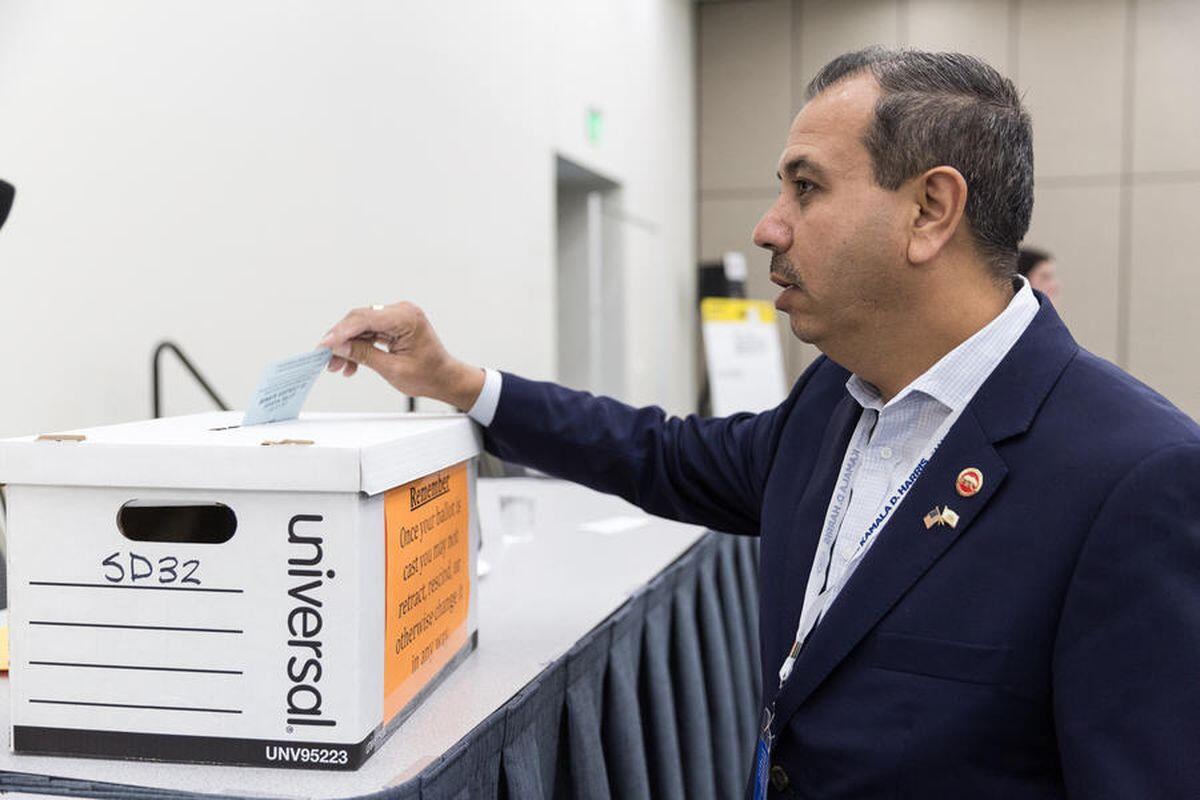
A former legislative aide sued the California Senate and recently resigned Sen. Tony Mendoza on Tuesday, alleging she was wrongfully terminated in retaliation for complaining about Mendoza’s alleged sexual harassment of a young female staff member.
Mendoza, a Democrat from Artesia, resigned in February under threat that the Senate would expel him after an investigation concluded that he made six female aides uncomfortable with a pattern of “unwanted flirtatious or sexually suggestive behavior.” He has denied wrongdoing and is running in the June election to reclaim his seat.
Adriana Ruelas, who filed the lawsuit in Sacramento Superior Court, was the legislative director for Mendoza when he terminated her in September. She was not one of the women allegedly sexually harassed.
The lawsuit, which seeks unspecified monetary damages and also names Senate administrators, alleges “unlawful termination” based on “retaliation” for Ruelas’ complaints regarding Mendoza’s “pattern of discrimination, harassment and inappropriate behavior towards a young female staff member.” Ruelas also alleges fraud and defamation by state officials.
Micha Star Liberty, Ruelas’ attorney, said she hopes the Legislature will change the system to address problems identified by the lawsuit. “This is the first step toward having a healthy, zero-tolerance policy for harassment and retaliation,” she said.
Ruelas says that she was warned in late 2016 by David Pacheco, then director of the California Senate Fellows program that Mendoza had “issues with women” in the past.
Mendoza twice asked a young female fellow assigned to his office to accompany him on overnight trips involving his post, making the aide uncomfortable, and invited her to his home with an offer to help her work on her resume, the lawsuit alleges.
The allegations of retaliation were previously contained in a formal complaint filed in January by Ruelas that was disputed by Dan Reeves, the chief of staff to then-Senate leader Kevin de León.
Reeves alleged that Ruelas did not complain about Mendoza’s behavior until after she was fired last year. An investigation by two outside law firms hired by the Senate concluded that Ruelas and two other former Mendoza staffers who complained about his conduct were terminated for “reasons unrelated to any complaint of sexual harassment.”
Ruelas’ lawsuit alleges the investigation was flawed and says she made complaints to Mendoza’s chief of staff, who told her he had relayed them to Jeannie Oropeza, head of human resources for the Senate, before Ruelas’ termination. The lawsuit disputes Mendoza’s claim that Ruelas’ termination was based on her work performance.
Oropeza and Senate Secretary Daniel Alvarez are also named as defendants in the lawsuit, which also alleges a hostile work environment was created by Mendoza’s district director.
Former California legislator Matt Dababneh, who resigned amid sexual harassment allegations, opens new campaign committee
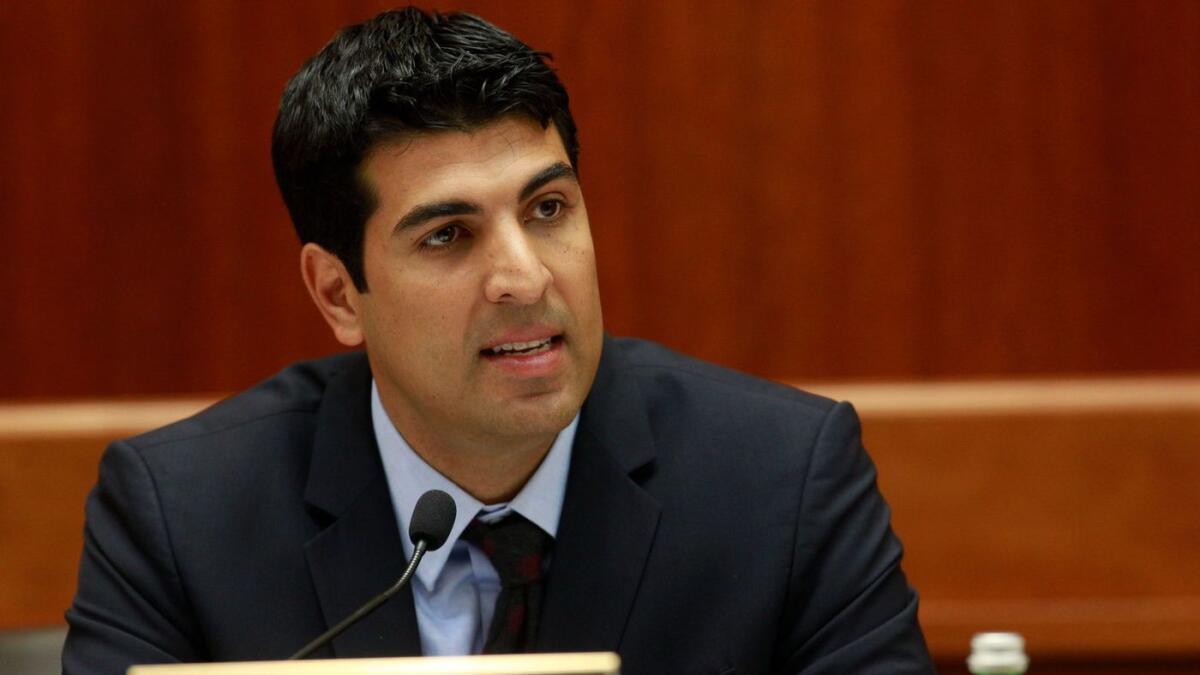
Matt Dababneh, the former Democratic assemblyman who resigned last year amid allegations of sexual misconduct, has opened a new fundraising committee that would enable him to tap into previously raised campaign cash.
Dababneh, who represented Woodland Hills from 2013 through 2017, stepped down at the end of last year after being accused of sexual misconduct by multiple women, including a female lobbyist who said he masturbated in front of her. Dababneh denied any wrongdoing but resigned in December, saying the current environment made it too difficult to do his job. A legislative investigation into those claims is ongoing.
A prolific fundraiser, Dababneh had more than $1.1 million in his reelection account as of January. Under campaign finance law, those funds would become “surplus” 90 days after he left office. Surplus funds are restricted in how they can be used, such as paying off debts or refunding contributors. They cannot be used for future elections.
But if those funds are transferred to a new campaign committee, they would be usable for a campaign in the future. A “Matt Dababneh for Lieutenant Governor 2022” committee was filed Friday with the Secretary of State. The move does not necessarily mean Dababneh is planning a run, but it keeps his campaign cash available.
A representative for Dababneh declined to comment.
Republican John Cox launches radio ad in the Central Valley blasting Democratic rival Antonio Villaraigosa
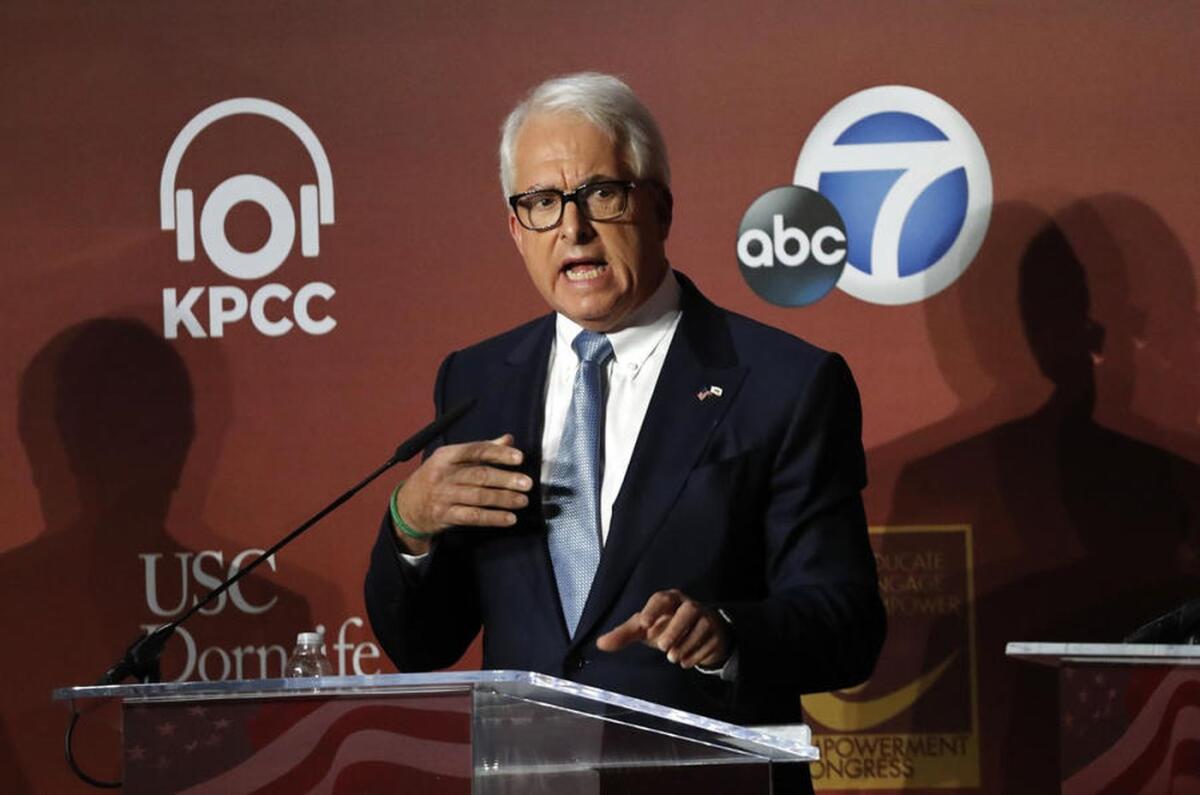
GOP gubernatorial candidate John Cox launched a radio ad in the Central Valley on Monday blasting Democratic rival Antonio Villaraigosa over his support for high-speed rail.
“L.A. Democrat Antonio Villaraigosa would spend billions on the bullet train because - quote – ‘it connects the two engines of the California economy.’ Apparently, Mr. Villaraigosa doesn’t realize that the Central Valley is home to another economic engine – one that actually produces something,” Cox says in the 60-second ad. “It’s called California agriculture, and it’s feeding the world.”
Cox, who inched ahead of Villaraigosa in a recent poll for second place in the race, is spending about $70,000 to air the ad for two weeks on radio stations between Bakersfield and Modesto, according to his campaign.
Villaraigosa has been spending considerable time in the Central Valley as he runs for governor. The quote Cox cites, from a July campaign event in Orange County, is incomplete.
While Villaraigosa did say that high-speed rail would connect Southern California and the Bay Area, he said it would connect those regions to affordable housing and benefit the swath of land between the two.
“In the Central Valley, it’s going to connect affordable housing with the two economic engines and provide more access to jobs,” Villaraigosa said, according to the Orange County Register.
A spokesman for Villaraigosa responded to the ad by reiterating the former Los Angeles mayor’s support for high-speed rail.
“Mayor Villaraigosa supports infrastructure investments, including the high-speed rail, which will create thousands of jobs and strengthen our economy by connecting the two economic engines of the state,” spokesman Luis Vizcaino said. “He has also said time and again that as governor, he will work to require greater efficiency in all aspects of the process.”
The Central Valley was once a GOP stronghold, but has moved leftward in recent years. In his ad, Cox noted his familial ties to the region as he sought to court its voters.
“I have family that lives in the Central Valley and they treasure its unique way of life and shared good-neighbor values,” he says. “Those values include hard work, faith and family – values worth fighting for. And fight we must.”
Cox noted that former state Senate leader Kevin de León called the region remote and full of tumbleweeds, and tried to tie Villaraigosa to De León.
“For the political elite, the Central Valley is just a whistle stop. Oh, and a place to steal water,” he said, before calling for a “Tumbleweed Rebellion.”
State senators condemn fatal police shooting of Stephon Clark
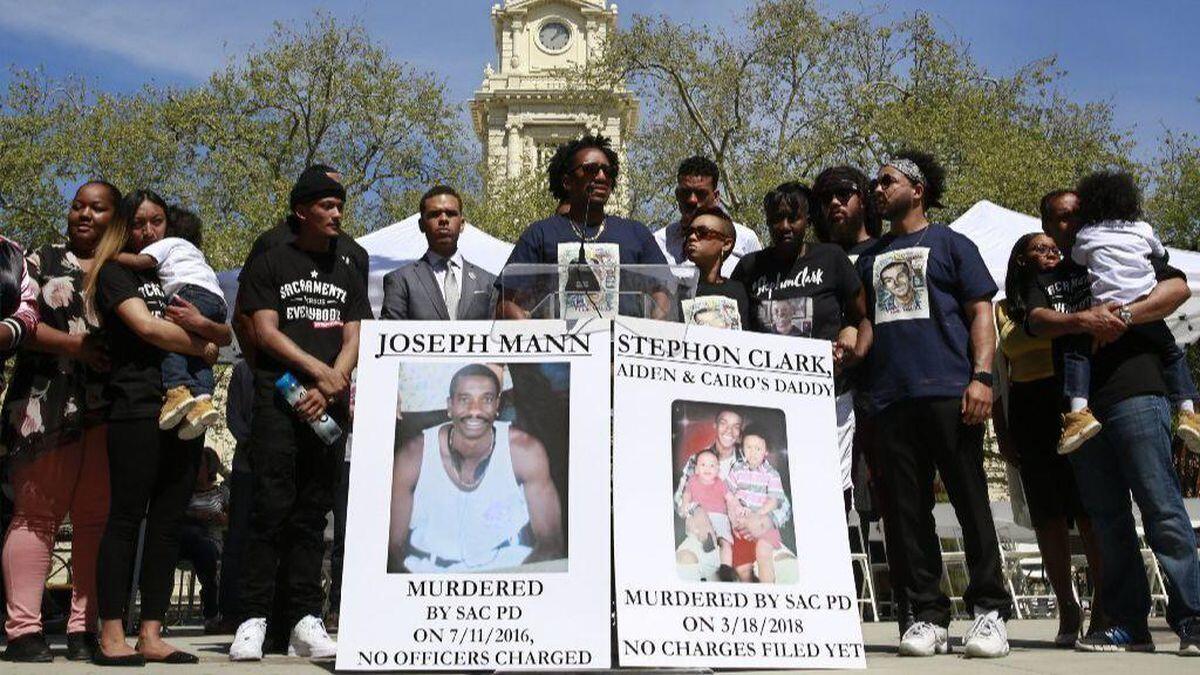
Lawmakers’ tempers flared Monday as the California Senate adjourned in memory of Stephon Clark, an unarmed African American man who was shot to death by Sacramento police officers on March 18.
Sen. Steven Bradford (D-Gardena) denounced the shooting, saying Clark did not get a day in court “because the police chose to be judge, jury and executioner.”
Bradford, who is black, said the shooting was part of a pattern of “brutalization of African Americans by law enforcement.”
Clark was shot dead in his grandmother’s backyard as two officers pursued reports of a vandal in his neighborhood. The shooting has led to demonstrations in Sacramento and condemnation from civil rights leaders across the country.
Sen. Holly Mitchell (D-Los Angeles), who is black, said “race matters” when it comes to the treatment of the public by the police.
“We clearly have a big problem here in America,” added Sen. Richard Pan (D-Sacramento).
Republican Sen. Ted Gaines of Rocklin said change is needed in police policies, adding “clearly something went wrong” in the outcome of the police response. Several lawmakers are introducing legislation in response to the Clark shooting.
President Trump and California governor spar on Twitter over immigrant pardons
Gov. Jerry Brown’s move on Friday to pardon five immigrants facing possible deportation for past criminal acts prompted a Twitter tit-for-tat with President Trump over Easter weekend.
Brown granted pardons to 56 people as part of his traditional Easter act of clemency. Among them were five people who face potential deportation due to their criminal records, including one person who is in Immigration and Customs Enforcement custody.
That prompted a Saturday morning rebuke from Trump, who used the nickname “Moonbeam,” which has dogged Brown since a newspaper columnist called him that in the 1970s.
The immigrants Brown pardoned are:
• Francisco Acevedo Alaniz, who was convicted of vehicle theft in 1997 and served five months in prison and more than one year parole.
• Sergio Mena, who was convicted of possession of a controlled substance for sale in 2003 and served three years probation.
• Daniel Maher, who served five years in prison for kidnapping, robbery and gun charges.
• Sokha Chhan, who was convicted of domestic violence charges and served just under a year in jail and three years probation.
• Phann Pheach, who served six months in prison and about a year on parole for drug charges.
Brown’s office said the governor granted pardons “to individuals who have demonstrated exemplary behavior and have lived productive and law-abiding lives following their convictions.” His office noted how those who receive pardons have worked to better their communities, noting, for example, that Alaniz is active in his church and coaches youth sports, and that Maher has received recognition for running a local recycling program.
Responding to Trump’s tweet, Brown’s office noted Trump himself had declared April “Second Chance Month.”
State officials want to expand task force that targets tax scofflaws in Los Angeles’ underground economy
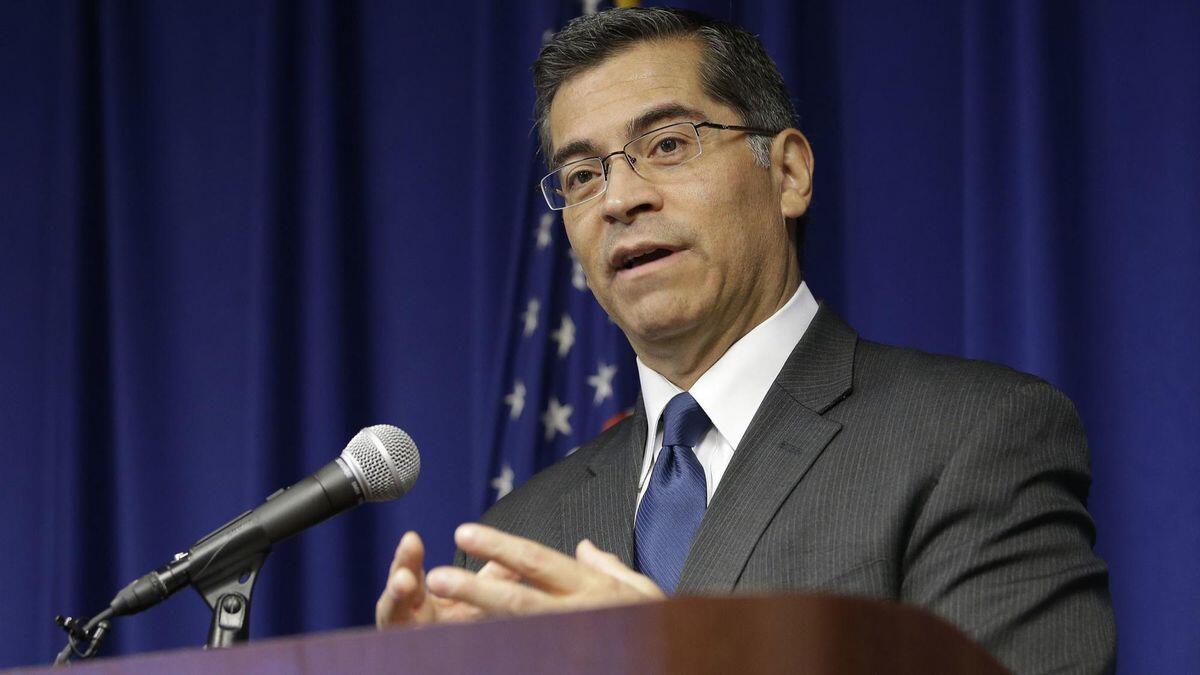
State officials on Monday proposed expanding a task force that has gone after tax scofflaws operating in the underground economy in Los Angeles and Sacramento, saying California continues to lose billions of dollars in revenue from the illicit activity.
The underground economy is made up of unlicensed individuals and businesses selling services and goods that are often counterfeited, without paying the state income or sales taxes, or paying legally required wages and benefits to employees.
Atty. Gen. Xavier Becerra said he supports legislation that would expand the Tax Recovery and Criminal Enforcement Task Force, a pilot project in the state Department of Justice, to also operate in San Diego, the San Francisco Bay Area and the San Joaquin Valley.
Becerra and state Sen. Cathleen Galgiani (D-Stockton), who authored the bill, said California’s underground economy is worth up to $140 billion annually and involves transactions that deprive the state of up to $8.5 billion in corporate, personal, sales and use taxes each year. He also said such businesses often underpay employees.
“They are evading the above-ground economy and undercutting businesses that are trying to do it the right way and are paying their employees the right wages,” Becerra said at a Sacramento press conference where he stood in front of dozens of illegal products seized by the task force, including cigarettes, foreign- made pharmaceuticals, NBA jerseys, counterfeit designer purses and slot machines.
Galgiani said the size of the state’s underground economy has doubled in recent years. Since 2014, the task force identified more than $210 million in unreported gross receipts and $46 million in associated tax losses to the state.
“It will do a great deal to curb the activity and level the playing field for the businesses that play by the rules,” Galgiani said of her bill, Senate Bill 1272.
Gov. Jerry Brown issues dozens of pre-Easter pardons, including to five immigrants facing possible deportation
Five immigrants with criminal records who face possible deportation were pardoned by California Gov. Jerry Brown on Friday, continuing his tradition of granting clemency around the Easter holiday.
The five individuals were among 56 pardons granted by Brown, as well as 14 sentence commutations for current inmates.
Brown’s inclusion of those at risk of deportation — which he has now done for several rounds of pardons — is yet another sign of how California has diverged on immigration from the federal government, which has increased arrests and detentions under President Trump.
A pardon from the governor can be decisive in helping a person avoid deportation.
Federal immigration law “makes clear that if you receive a full and unconditional pardon from the governor of a state, it can allow a noncitizen to avoid removal in certain circumstances,” said Ingrid Eagly, a professor of immigration law at UCLA.
Earlier this week, a U.S. Army veteran who had been deported to Mexico was granted citizenship, after Brown pardoned him last year.
One of the men receiving a pardon on Friday, Sokha Chhan, is currently in the custody of Immigration and Customs Enforcement, facing deportation to Cambodia. He had legally entered the United States at age 13 as a refugee fleeing the Khmer Rouge regime.
Chhan was convicted in 2002 of inflicting corporal injury on a spouse or cohabitant, and of threatening a crime with the intent to terrorize. He served 364 days in jail and three years of probation for the two misdemeanors.
Brown has exercised his pardon power substantially more than preceding governors. Since taking office in 2011, he has granted 1,115 pardons and 51 commutations.
‘Clueless’ actress Stacey Dash withdraws from Los Angeles congressional race — but will still be on the ballot
Actress-turned-conservative commentator Stacey Dash is calling her congressional candidacy quits a little over a month after jumping into a Los Angeles House race.
Dash tweeted a statement that she is “withdrawing” from the race because “the overall bitterness surrounding our political process, participating in the rigors of campaigning, and holding elected office would be detrimental to the health and wellbeing [sic] of my family.”
She will still appear on the June 5 primary ballot as a Republican “Actress/news analyst.”
Dash had a rough road to get out of the primary in the race to represent a Los Angeles district where registered Democrats outnumber Republicans 61% to 10%. She was aiming to oust Freshman Rep. Nanette Barragán (D-San Pedro).
The short-lived Dash candidacy shook up Barragan’s otherwise straight-forward reelection race. Compton’s Democratic mayor, Aja Brown, launched a last-minute bid, citing Dash as a “motivating” factor in her decision.
Dash quit the race one day before the end of the financial quarter but still will have to file federal paperwork by mid-April if she raised or spent more than $12,500 for the campaign.
California sues Sutter Health, alleging the hospital system unfairly inflated costs for consumers
The state attorney general has sued Sutter Health, the largest hospital system in Northern California, alleging anticompetitive business practices that unfairly drove up costs for consumers, officials announced Friday.
The lawsuit filed in San Francisco County Superior Court alleges that Sutter engaged in “anticompetitive contractual practices” and that it charged prices for hospital healthcare services that far exceed what it would have been able to charge in a competitive market.
The complaint also alleges that the excess profits received went toward extreme levels of executive compensation, purchasing other health firms and financing its own insurance arm.
“It’s time to hold healthcare corporations accountable and bring down illegally inflated healthcare costs that are imposed on California’s families,” state Atty. Gen. Xavier Becerra told reporters in Sacramento. “We seek to stop Sutter from continuing this illegal conduct.”
Sutter Health is aware that a complaint was filed, but system administrators had not seen it and therefore declined to comment on specific claims, spokeswoman Karen Garner said.
“Sutter Health is proud to save patients, government payers and health plans hundreds of millions of dollars each year by providing more efficient and integrated care,” Garner said in a statement, adding that “on average, total charges for an inpatient stay in a Sutter hospital are lower than what other Northern California hospitals charge.”
Sutter consists of some two dozen acute care hospital facilities with 8,200 physicians and 48,000 employees located in 19 counties in Northern California, according to the Department of Justice.
Becerra alleged that Sutter set “excessively high” prices for out-of-network healthcare and restricted insurance companies from providing low-cost options.
The lack of competition for healthcare in California has been a cause of concern for state officials for some time.
Becerra cited a study this week that found the rapid consolidation of healthcare markets in Northern California means the average inpatient hospital procedure in that part of the state, $223,278, exceeded that in Southern California, $131,586, by more than $90,000. That study was conducted by the University of California Berkeley’s Petris Center on Health Care Markets and Consumer Welfare.
Arnold Schwarzenegger in stable condition after heart surgery
Former California Gov. Arnold Schwarzenegger is in stable condition Friday after undergoing emergency open-heart surgery during a procedure to replace a valve in his heart, according to his spokesman.
Schwarzenegger, 70, went to Cedars-Sinai Medical Center on Thursday for a planned procedure to replace a pulmonic valve that was originally installed in 1997 due to a congenital heart defect, Schwarzenegger’s spokesman Daniel Ketchell said in a statement.
Schwarzenegger opted for a less-invasive catheter valve replacement but during that procedure an open-heart surgery team stepped in to replace the valve due to complications.
California voters are joining this party by mistake, but lawmakers aren’t doing anything about it
Two years ago this month, The Times investigated one of the longest-lingering questions in California politics: Are some voters mistakenly joining a political party when what they really want is to be an electoral free agent?
The answer seemed to be yes, with substantial evidence of citizens who thought they were an unaffiliated “independent” voter but instead registered with the American Independent Party. And no, those aren’t the same thing.
The American Independent Party was organized 50 years ago in California to boost the presidential candidacy of former Alabama Gov. George Wallace, best known for his support of segregation. Current party leaders insist those days are long gone, focusing now on a platform opposed to abortion and same-sex marriage while praising the 2nd Amendment and border security. In 2016, the party joined Republicans in nominating Donald Trump for president.
Lawmakers again take aim at California’s tight lid on police shooting investigations
After police killed an unarmed black man in Sacramento earlier this month, California legislators are poised to again try to loosen some of the nation’s strictest prohibitions on the release of officer shooting and misconduct investigations.
State Sen. Nancy Skinner (D-Berkeley) plans to introduce a bill next week that would require the disclosure of investigations of serious uses of force, including police shootings.
The legislation, which civil rights groups across the state support, is necessary because people have a right to know how law enforcement treats those cases, said Lizzie Buchen, a legislative advocate for the American Civil Liberties Union of California.
California tells schools how they should protect students from immigration enforcement
As the fight over California’s immigration laws intensifies, Atty. Gen. Xavier Becerra on Friday released a policy guide for school officials that lays out how they can protect students from immigration enforcement on school grounds.
The guide details the steps school officials should take if federal immigration agents try to detain someone on campus, or if a child’s parents have been detained or deported. It also instructs schools on how to shield the immigration status of students and their family members, and illustrates the kinds of court records federal officials must present before entering campuses.
The policies are the result of a new state law that was part of a legislative package passed last year to safeguard immigrants here illegally from President Trump’s call for increased deportations.
The schools guide was unveiled a day after Becerra sent law enforcement agencies their own guidelines on how to follow the state’s immigration laws, one of which the Trump administration is challenging in federal court. The all-Republican Orange County Board of Supervisors voted Wednesday to try to join the federal lawsuit.
State officials say about 250,000 students enrolled in California public schools do not have legal documentation to be in the country and 750,000 statewide have a parent who is living in the country illegally.
The guide also includes a “Know Your Educational Rights” handout for students that also will be available in Spanish, Chinese, Vietnamese, Arabic, Korean and Tagalog.
Obama coming to California to raise money for an endangered Democratic senator
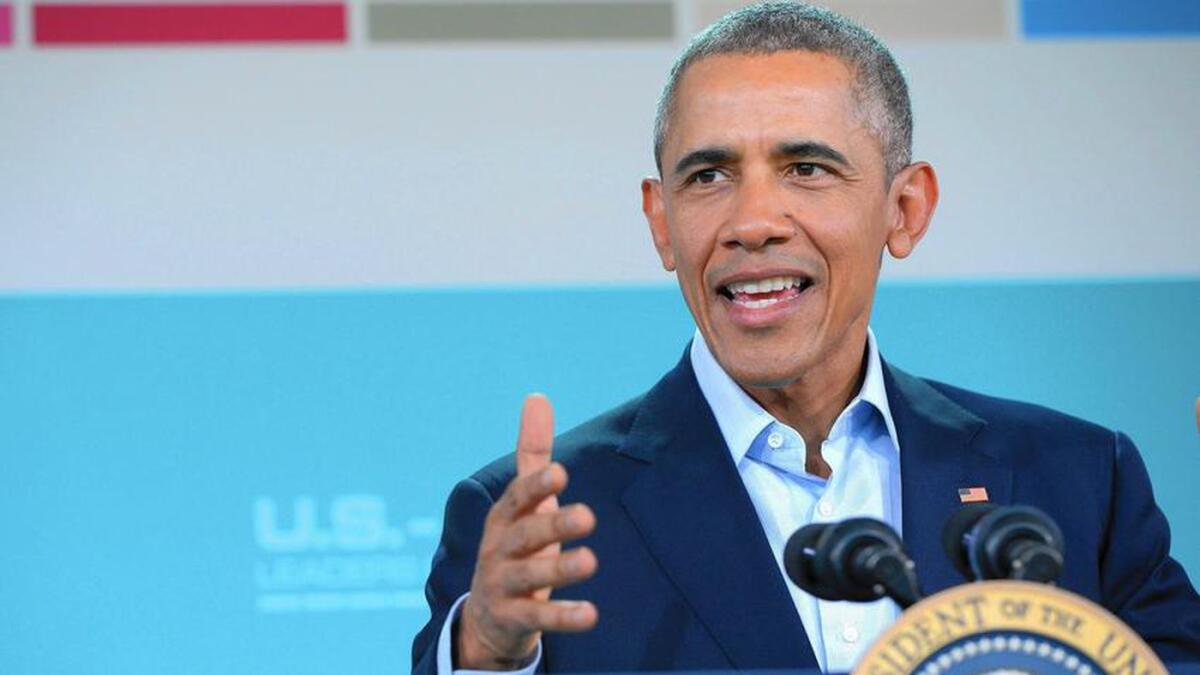
Former President Obama is heading to Beverly Hills in May to raise money for Sen. Claire McCaskill of Missouri in his first post-presidential fundraiser for a candidate, according to an invitation obtained by The Times.
The May 6 event is co-chaired by director J.J. Abrams, studio executives Jeffrey Katzenberg and Jeff Shell, sports executive Tim Leiweke, filmmaker Steven Spielberg and others.
As president, Obama appeared many times at L.A. fundraisers that raised millions of dollars for Democrats but sometimes caused traffic problems. Now that he is out of office, Obama will likely be traveling with a smaller entourage and security detail.
The invitation does not list donation levels and says the address will be disclosed once attendees RSVP. The event benefits a joint fundraising committee comprised of McCaskill’s reelection committee, the Democratic Senatorial Campaign Committee and the Missouri Democratic State Committee, according to the invitation.
McCaskill is running for a third term and is considered among the most endangered senators, in part because her state chose President Trump in 2016 by nearly 19 percentage points.
The Democrat’s GOP rival, Missouri Atty. Gen.l Josh Hawley, responded to the fundraiser by releasing an ad labeling McCaskill a “hypocrite” and contrasting the fundraiser with her claims of not being tied to her party’s establishment.
California’s John Chiang joins state treasurers seeking meeting with Trump administration over banking for pot industry
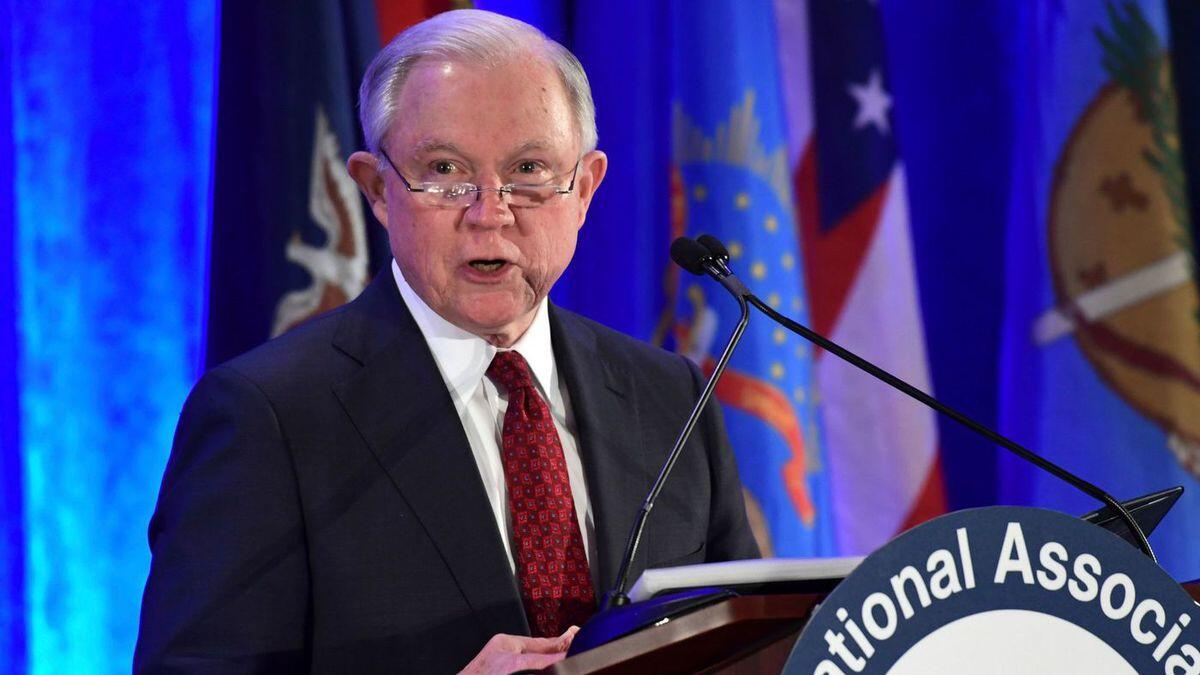
Four state treasurers including California’s John Chiang requested Thursday that U.S. Atty. Gen. Jeff Sessions meet with them to find a way to allow banks to handle money from the marijuana industry in states that have authorized cannabis sales.
“This is not just a blue state phenomenon but includes purple and red states in every corner of our country,” they wrote in a letter to Sessions. “A majority of Americans now live in states where they have decided to legalize cannabis.”
Besides Chiang, who is running for governor, those requesting a meeting included the treasurers of Illinois, Oregon and Pennsylvania, as well as leaders of the marijuana industry.
Their concern is that marijuana remains an illegal drug under federal law so federally chartered banks are unwilling to handle money from the cannabis industry, leaving pot shops and growers stuck holding large sums of cash. That makes them vulnerable to robbery and makes financial transactions inefficient, the industry says.
U.S. Justice Department memos had provided the marijuana industry and some banks comfort that they were not likely to be prosecuted if they took certain steps to make financial activity transparent, the letter said. But Sessions recently rescinded the memos.
“With legalization taking place, there are sound public policy reasons for providing financial institutions and other entities that do business with the cannabis industry some comfort that they will not be prosecuted, or lose access to customer assets, simply for banking this industry,” the letter said.
Sitting down together, the officials said, would provide “a unique opportunity for policymakers, regulators, and law enforcement officials from all sides to meet and reach a consensus.”
On Jan. 1, California became one of eight states to allow the sale of marijuana for recreational use. Twenty-nine states allow sales for medical or recreational use.
Joe Biden endorses Sen. Dianne Feinstein’s reelection bid
Former Vice President Joe Biden is endorsing Sen. Dianne Feinstein’s bid for a fifth full term in the Senate.
“She’s tenacious. She’s accomplished. And she’s exactly who we need in the Senate to stand up to this Administration and its Republican allies in Congress. Dianne is a dear friend, and I’m proud to endorse her re-election,” Biden said Thursday in a statement provided by Feinstein’s campaign.
Biden and Feinstein served together in the Senate, and Feinstein’s assault weapons ban was included in Biden’s Violent Crime Control and Law Enforcement Act of 1994.
The endorsement comes as Feinstein is facing an intra-party challenge from former state senate leader Kevin de León, who is trying to capitalize on progressive sentiment that Feinstein is too moderate and willing to compromise with Trump. De León remains far behind Feinstein in polls.
Orange County ‘sanctuary state’ vote cheered by Republicans in most competitive congressional races
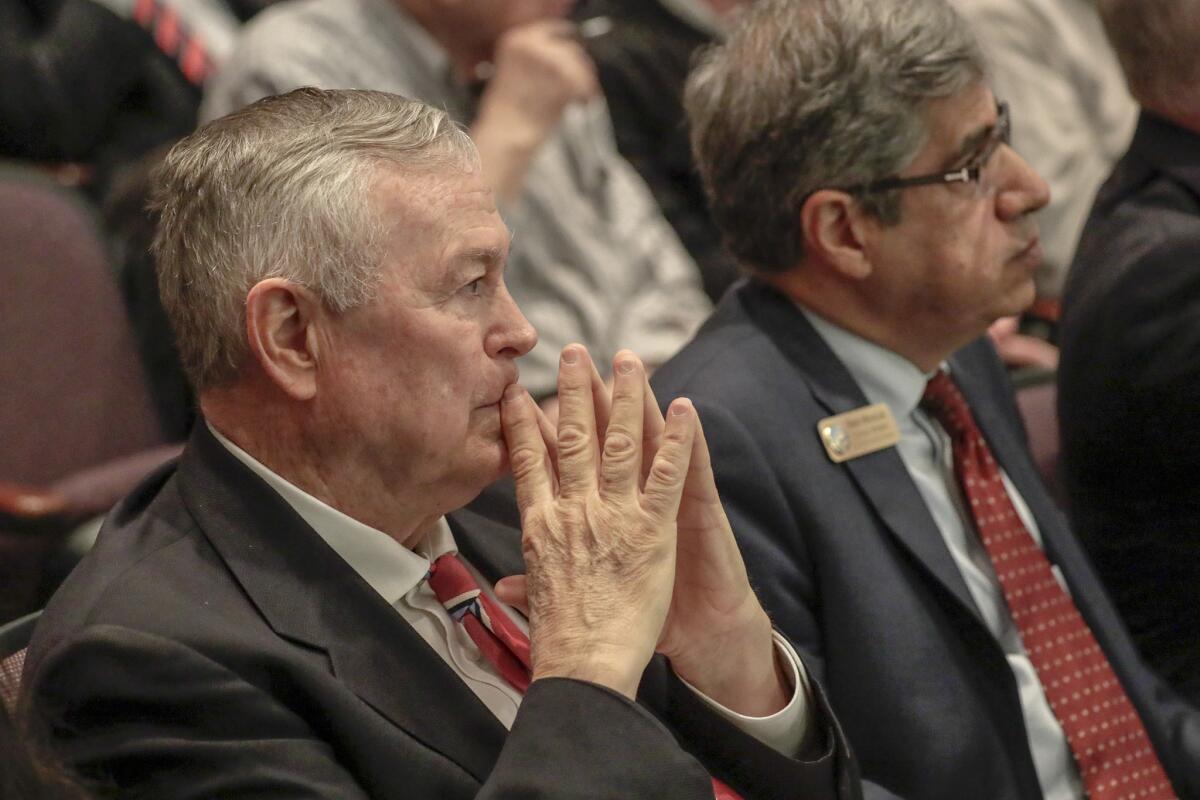
It’s not typical for a congressman to show up in person at a Board of Supervisors meeting. But that’s exactly what happened Wednesday, when Rep. Dana Rohrabacher spoke on a controversial matter the board was taking up Tuesday in Orange County: whether to join the Trump administration in suing California for its “sanctuary state” law.
“By making this a sanctuary city and a sanctuary state, we are doing nothing more than attracting millions of more people to come to this country,” Rohrabacher told the board. He added that a “flow of illegals” has diminished the quality of public schools, healthcare and housing for Californians. He also called immigrants in the country illegally “the greatest threat to the well-being” of county residents.
Rohrabacher’s words aren’t far off from talking points crafted more than a quarter-century ago during the campaign for Prop. 187, a ballot initiative that got its start in his coastal Orange County district and called for eliminating basic services such as healthcare and public schooling for immigrants in the country illegally. It passed, and helped propel Gov. Pete Wilson to the governorship, but was later struck down by the courts. It’s also received the brunt of the blame for the steep decline of the California Republican Party over the past couple decades.
Orange County is a rapidly changing place that two years ago voted for a Democrat for president for the first time in 80 years, making Rohrabacher one of the most vulnerable Republicans in the state. His tough stance on immigration in an increasingly tough reelection fight shows the galvanizing power he and many GOP candidates believe the issue still holds in the region.
In an election year when Democrats have an edge in voter engagement and enthusiasm, opposing California’s “sanctuary state” policy could bring more Republican voters out to the polls.
Scott Baugh, a former chairman of the Orange County Republican Party who’s now running against Rohrabacher, says he also opposes the law. “We can’t have a bunch of states out there being scofflaws of the federal government,” Baugh said in an interview. “We need our laws enforced, otherwise you just invite more and more people to take advantage of the situation.”
Taking such a strong position is not a sure-fire strategy. In a January poll by UC Berkeley’s Institute of Governmental Studies, two-thirds of voters in Rohrabacher’s district said they were in favor of providing legal status to young people brought to the country illegally as children. A majority opposed building a wall along the Mexico border.
Republican Shawn Nelson, who is running to replace retiring GOP Rep. Ed Royce in the 39th Congressional District, was one of the four supervisors who voted unanimously to condemn the sanctuary state policy.
“I have nothing against anyone, but our duty has to be first and foremost to the citizens,” Nelson said. “We need substantial immigration reform. But if we don’t reform things and start following the rules, what’s the point of reforming anything if people can just act like we don’t have rules?”
Several Democrats running for Royce’s seat responded swiftly and forcefully, calling the vote a “last gasp of conservative politics that no longer fits our community.” They said it would “enable Trump’s abusive immigration agenda” and endanger the “rights of Orange County’s vibrant immigrant community.”
Former state assemblywoman Young Kim, a Republican also running for Royce’s seat and an immigrant herself, said in a statement shortly before the vote that California’s sanctuary state law is an “affront to law-abiding citizens and a threat to public safety.”
Bob Huff, a former Republican state senator also running for the seat, said he thinks most 39th District residents oppose the sanctuary state policy, and that the immigration issue could quickly become a liability for Democrats in the 2018 midterm.
“It makes people feel uncomfortable when their own government is aiding and abetting felony fugitives. That’s a problem that cuts across party lines,” Huff said. “We are a country built of immigrants and the 39th Congressional District has a lot of immigrants in it. But most of those that I talk to think that those who want to come here should be coming legally and standing in line they way they did.”
Pit a youth movement for firearms regulation against an aging gun lobby — the kids will ultimately win
Those young people who marched for gun control all over the country showed this: The unyielding firearms lobby is in deep trouble with the next generation.
No one can be sure how many marched Saturday — hundreds of thousands, millions? There were more than 800 rallies.
“It was an amazing day,” longtime gun control advocate Sen. Dianne Feinstein (D-Calif.) told reporters. “I’ve never seen anything like it.”
With federal lawsuit pending, Becerra tells California law enforcement agencies how to follow state immigration laws
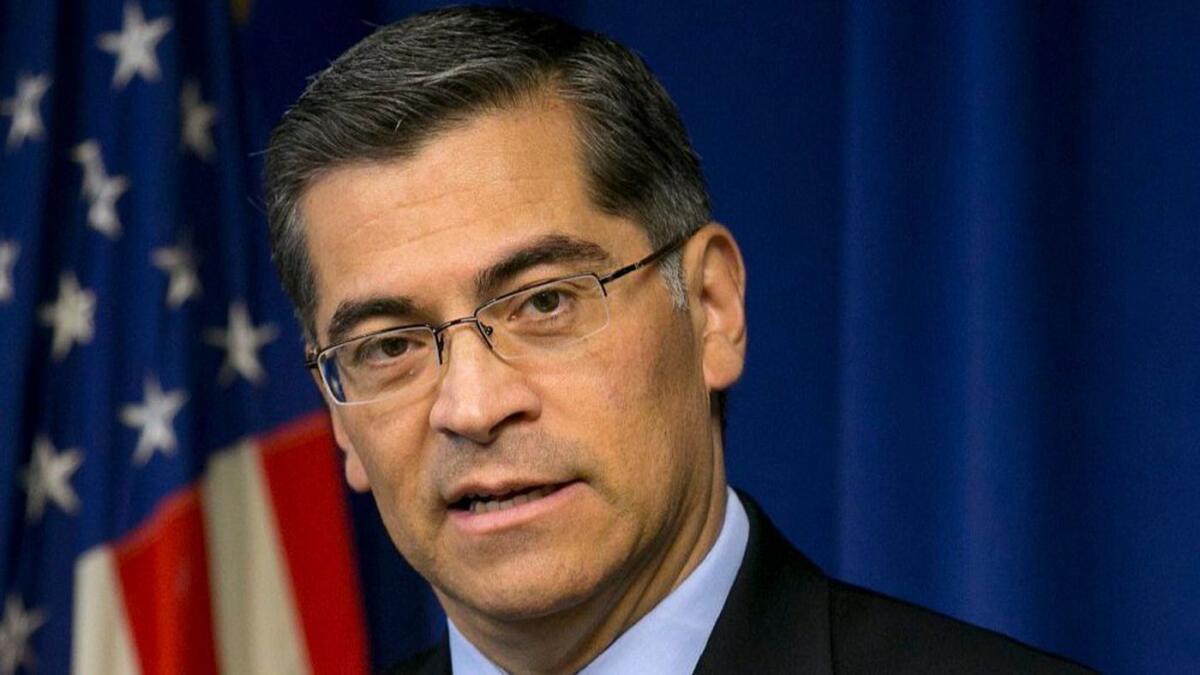
With a federal legal fight over the state’s immigration laws pending, California Atty. Gen. Xavier Becerra released two information bulletins for law enforcement agencies on Wednesday, detailing their obligations and the new statistical data they must report to his office under state statutes.
The first provides guidance on the information that agencies must provide about their participation in task forces that involve federal agencies, as well as on the people they transfer to immigration authorities. The second describes the level of cooperation agencies are permitted to have with federal immigration officers as outlined in two state laws, the California Values Act and the Truth Act.
The Trump administration filed a federal lawsuit this month against California over state immigration laws passed last year, including the Values Act, known as the so-called sanctuary state law. It limits local law enforcement from holding and questioning immigrants for federal immigration agencies, as well as communicating information about their release dates.
U.S. Atty. Gen. Jeff Sessions told a gathering of law enforcement officers in Sacramento earlier this month that California was attempting to keep federal immigration officials from doing their jobs, and he said Democrats were advancing the political agendas of “radical extremists.” Meanwhile, Gov. Jerry Brown accused the federal government of launching “a reign of terror.”
Becerra’s notices come as the all-Republican Orange County Board of Supervisors voted Wednesday to try to join the federal lawsuit. Elected leaders in Los Alamitos voted last week to attempt to exempt their city from the sanctuary state law.
Under the California Values Act, law enforcement officials are still able to participate in multi-agency task forces responsible for broad investigations, which sometimes include Immigration and Customs Enforcement criminal investigations. But the primary purpose of such task forces cannot be to enforce immigration laws, and they must submit annual reports to the attorney general on their activities, such as the type and frequency of arrests.
The law builds on the Trust Act, which was signed by Brown in October 2013, and prohibits state and local law enforcement from holding people longer than 48 hours for federal immigration agents — unless they’ve been convicted of certain crimes, most of them serious or violent.
“The guidance we’re issuing today simply gives our public safety authorities a clear sense of what the Values Act — which works in concert, not conflict, with federal law — requires,” Becerra said in a statement. “We’re not going to let the Trump administration coerce us into doing the federal government’s job of enforcing federal immigration law. We’re in the business of public safety, not deportation.”
Front-runner Gavin Newsom to sit out governor’s race debates until May
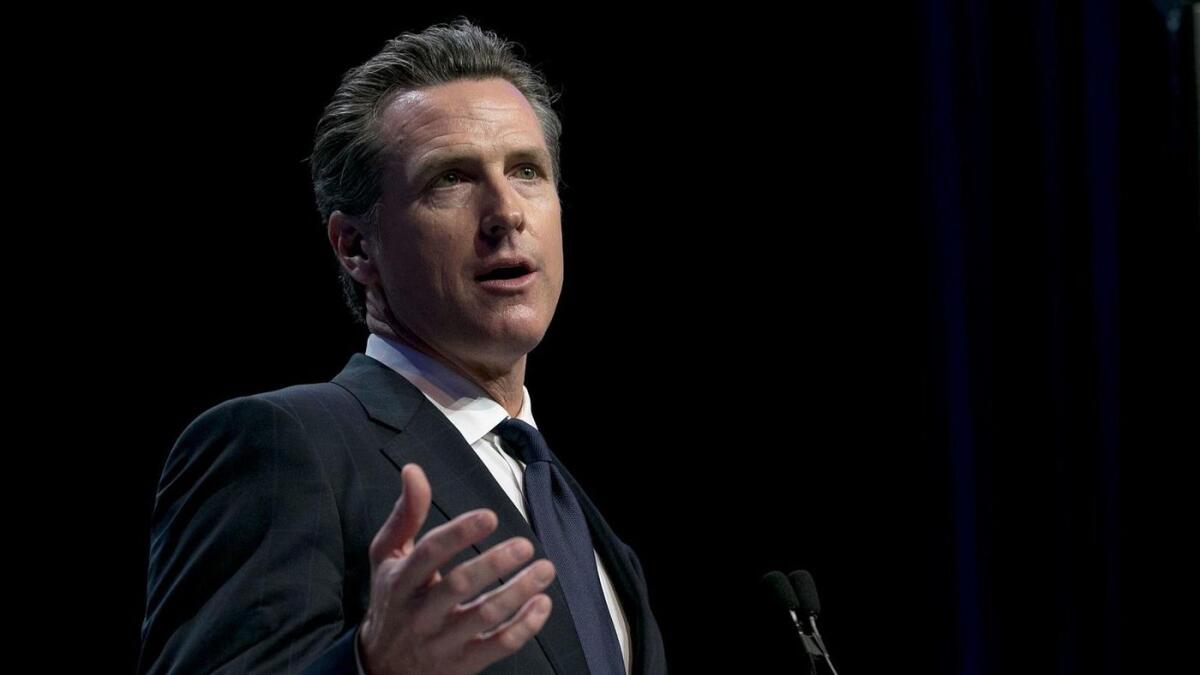
Gubernatorial front-runner Gavin Newsom will not participate in any more debates until early May, a spokesman for his campaign said on Wednesday.
While it’s not uncommon for political candidates to scale back debate appearances when they’re ahead in the polls, the move is drawing criticism from his rivals.
“Any honest candidate wouldn’t be afraid to debate the issues Californians care most about, but this is another reason why voters can’t trust Gavin Newsom to lead this state as governor,” said Fabien Levy, a spokesman for state Treasurer John Chiang, another Democratic candidate in the race.
Former Los Angeles Mayor Antonio Villaraigosa’s campaign accused Newsom of trying to avoid discussing his record and his policies.
“Gavin Newsom clearly doesn’t want to explain why he started a policy that turned over undocumented youth to ICE agents, or why he won’t release his 2016 tax returns, or what taxes he will raise to pay the $400 billion that [single-payer healthcare] will cost California taxpayers,” said Luis Vizcaino, a spokesman for Villaraigosa.
Of the candidates in the race for governor, Newsom, who leads in fundraising and the polls, has missed the most debates.
A spokesman for Newsom noted that he has taken part in multiple debates sponsored by labor, Democratic and education groups.
“Our campaign has participated in eight debates in the campaign so far and countless forums, and we are looking forward to participating in another televised debate May 8,” spokesman Nathan Click said.
The last debate Newsom took part in was on Feb. 22 in San Diego on the eve of the California Democratic Party Convention. The May 8 debate in San Jose will be moderated by NBC News’ Chuck Todd, host of “Meet the Press.” The debate takes place the day after counties begin sending out vote-by-mail ballots.
That leaves a window of more than 10 weeks in the run-up to voting that Newsom will have refrained from participating in debates, including a debate Monday that was televised on NBC in Los Angeles, and upcoming events sponsored by Latino and Asian American groups.
Newsom’s absence has been highlighted by his rivals. At a Sunday debate in San Diego, Republican Assemblyman Travis Allen wrote Newsom’s name on a piece of paper and put it on an vacant lectern.
Dan Schnur, a political communications professor at USC and former campaign strategist, said it is common for front-runners to participate in fewer debates because preparing for them takes time that could be used for fundraising or campaigning, and because the events provide an opening to make a mistake.
“When your team is winning a football game, you don’t throw many long passes. You keep the ball on the ground,” he said. “By the same token, when your candidate has a good-sized lead in the polls, you take as few risks as possible.”
It’s natural for candidates who are trailing to call for additional debates, as Villaraigosa and Republican businessman John Cox have, to increase their exposure to voters and in hopes that the front-runner will slip and change the narrative of the race, Schnur added. But Newsom’s decision not to participate in some of these forums is unlikely to draw the kind of fallout it may have in prior election cycles because of the amount of focus on President Trump, he added, pointing to Monday’s debate.
“The candidates for governor of California gathered to debate less than 24 hours after Stormy Daniels went on television [to discuss her alleged affair with Trump],” Schnur said. “And you wonder why nobody noticed?”
Meet Cali, the Golden State’s new ‘deputy first dog’
Gov. Jerry Brown’s administration just got a whole lot cuter.
The governor announced Wednesday that Cali, a 2-month-old “bordoodle”— a mix of a border collie and a standard poodle— will serve as the state’s “deputy first dog.”
The job responsibilities entail helping Brown’s dog Colusa, dubbed the state’s “First Dog” in “herding staff at the state Capitol and lending a paw around the family ranch in Colusa County,” according to the governor’s office.
The news was buried in a routine press release unveiling a number of Brown’s administration appointments. But the canine-inspired comedy indicated this announcement was unlike the others.
“This position does not require Senate confirmation – though the Deputy First Dog will gladly appear almost anywhere there are treats – and the compensation is per diem belly rubs. Cali is a Doggocrat,” said the news release.
Brown’s pups have played a high-profile role during his tenure as governor. Sutter, his beloved Corgi who died in 2016, was the face of Brown’s 2012 effort to pass Proposition 30, a temporary tax hike. Colusa, a border collie-corgi mix, is a constant Capitol presence with a cheeky Twitter account.
Gun violence has defined Sen. Dianne Feinstein’s political career. The issue is more important than ever for her now
Dianne Feinstein was settling into her office at San Francisco City Hall after a two-week vacation in the Himalayas. A former colleague passed by, but didn’t respond when she called out. She heard gun shots. And then silence.
The year was 1978, and Feinstein was president of the county board of supervisors. She was the first person to discover Supervisor Harvey Milk on the floor of his office.
“I could smell the gunpowder. Harvey was on his stomach,” Feinstein told The Times in an interview. “I tried to find a pulse. I put my finger in a bullet hole.”
Assemblywoman Cristina Garcia says she made homophobic remark ‘in a moment of anger’
Assemblywoman Cristina Garcia apologized for a homophobic comment she made years ago about then-Assembly Speaker John A. Pérez, saying the public scrutiny over her remark was “a good learning experience.”
Garcia said in a statement that she called Pérez, who is gay, a “homo” five years ago. On Monday, she said in an interview with KQED that she had used that slur in the past.
“I did make that remark in a moment of anger. I have no reason to lie about something that is true,” Garcia said in the statement.
“However, in no way was my use of that term meant to belittle Mr. Perez for his sexuality,” she said. “I have a long and chronicled history of being a straight ally of the LGBTQ community.”
Garcia is currently being investigated for accusations of making unwanted sexual advances toward two men. She denies the allegations.
Her admission that she had used “homo” prompted criticism from fellow Democrats.
“I realize that words can be harmful and I humbly and sincerely apologize to Mr. Perez and any member of the LGBTQ community who feels offended by the comment,” Garcia said.
California Legislature will ‘proactively’ release records on substantiated sexual harassment complaints
In response to concerns raised by the Capitol press corps, leaders of the California Legislature said Tuesday that the Assembly and Senate will automatically release information about substantiated sexual harassment investigations.
The Capitol Correspondents Assn. of California reached out to legislative leaders earlier this month with concerns about inconsistencies in how the Legislature was releasing records under the Legislative Open Records Act. After releasing a decade’s worth of records on sexual harassment investigations in February, both houses offered conflicting guidance on how journalists could obtain records from recent probes.
“By operating under a confusing patchwork of rules on how and when such documents are released, the Legislature is hindering the very public access and discourse it professes to support,” the association’s board wrote on March 14. The board asked legislative leaders to proactively post documents on completed investigations online in a timely manner.
Instead, Senate President Pro Tem Toni Atkins (D-San Diego), Assembly Speaker Anthony Rendon (D-Lakewood) and Assembly Rules Committee chairman Ken Cooley (D-Rancho Cordova) said their houses would “proactively” provide those documents to the association. A spokesman for Rendon said disclosure would happen on a rolling basis as investigations are concluded. The leaders’ response does not specify how the records would be disseminated to news outlets.
The new policy will apply to substantiated complaints of sexual harassment involving a member of the Legislature or senior staff.
There may be more changes to come in how such records are released. The two houses are jointly working to overhaul how the Legislature handles sexual harassment complaints. The legislative leaders said they will “notify the media at the time new procedures are adopted.”
Assemblywoman Cristina Garcia criticized by fellow Democrats for using homophobic slur
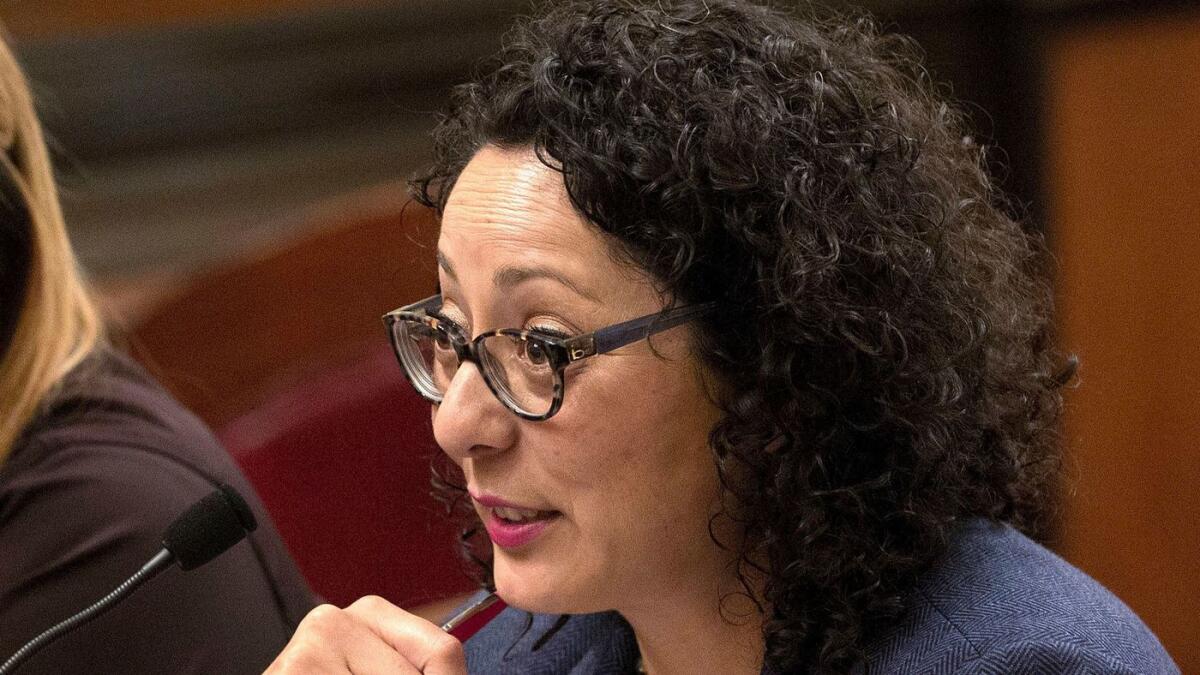
An admission by Assemblywoman Cristina Garcia that she likely used a homophobic term to refer to a gay legislative leader has prompted rebukes from her fellow Democrats.
Garcia (D-Bell Gardens) acknowledged in an interview with KQED that she had used the word “homo” to describe gay people and did not dispute an allegation that she used the term to describe former Assembly Speaker John A. Pérez, the state’s first openly gay speaker. She denied using other homophobic slurs.
“Have I at some point used the word ‘homo’? Yeah I’ve used that word ‘homo,’” Garcia said. “I don’t know that I’ve used it in derogatory context.”
She said she uses “candid language” in settings “where you think you’re in a safe space and you could speak your mind and be vocal.”
Garcia, who is under investigation for allegations that she inappropriately touched and made sexual advances toward two men, denied that she sexually assaulted anyone. She rejected a spate of accusations levied against her, including that she encouraged staffers to play “spin the bottle,” that she excessively consumed alcohol at work and that she made staff perform personal errands.
She said the allegations were meant to silence her work on issues including environmental justice or the #MeToo movement. Garcia has been on voluntary unpaid leave since February, when the accusations first surfaced.
Democrats condemned Garcia’s use of the slur on Tuesday.
Pérez told Politico that Garcia was attempting to “rationalize” her comments by saying she only used the term in “safe spaces.”
Assembly Speaker Anthony Rendon (D-Lakewood) said in a statement that he does not comment on ongoing investigations.
“That said, using homophobic language is inappropriate and indefensible,” Rendon said. “Words have consequences and can cause harm. Officials who are elected to represent everyone in their districts should know better and do better.”
“It’s disappointing to hear a respected former Speaker be subjected to hurtful homophobic comments,” said Assemblyman Evan Low (D-Campbell), who chairs the Legislative LGBT Caucus. “It’s upsetting but not surprising — it reflects the everyday struggles that our LGBT community faces on a daily basis. We must continue to work to educate others about the importance of eradicating all forms of homophobia — and the ignorance and bigotry behind them.”
Late Tuesday, Garcia issued a statement of apology, saying she had made the remark in anger.
9 p.m.: This post was updated with the assemblywoman’s apology.
Female Democratic senators are coming to Hollywood to raise money

Prominent female Democratic senators from across the country plan to visit Los Angeles for a star-studded fundraiser during a three-city West Coast swing, according to an invitation obtained by The Times.
The April 20 reception, at the home of Hollywood philanthropists Leslie and Cliff Gilbert-Lurie, will be headlined by Sens. Dianne Feinstein of California, Catherine Cortez Masto of Nevada, Maria Cantwell of Washington, Maggie Hassan of New Hampshire, Mazie Hirono of Hawaii and Amy Klobuchar of Minnesota, as well as Rep. Jacky Rosen of Nevada, who is running for a Senate seat.
The hosts include actresses Jane Fonda and Connie Britton, television producer Marcy Carsey, former L.A. city controller Wendy Greuel, prominent Democratic donor Elizabeth Hirsh Naftali and others.
The invitation does not list the cost of entry to the event, but says contributions will benefit Women on the Road California 2018, a joint fundraising committee for the Democratic Senatorial Campaign Committee, as well as the campaigns of Feinstein, Hirono, Cantwell, Klobuchar, Rosen and Sen. Tina Smith of Minnesota.
The group is also scheduled to hold fundraisers in Menlo Park, Calif., and Seattle.
He struck out at baseball, but made it big in politics. Now he’s returned to his first love
When Ace Smith was a boy he dreamed, like many, of growing up to be a Major League Baseball player. A power-hitting catcher, to be precise.
As he grew older, though, he came to understand, like most boys, he wasn’t talented enough to realize his dream. So he pursued another career, which proved highly successful.
Smith’s passion for baseball remained undimmed, however. So in between helping elect Kamala Harris to the U.S. Senate and Jerry Brown as California governor and Gavin Newsom as lieutenant governor, he returned to his first love, chronicling a strange and obscure slice of baseball history.
Rivals in the California governor’s race rip Gavin Newsom for skipping debate
California gubernatorial candidates blasted front-runner Gavin Newsom on Monday for skipping a televised debate in Los Angeles in order to attend a fundraiser.
“Thank you for caring enough about this state to be here,” former Los Angeles Mayor Antonio Villaraigosa told the audience in his opening statement. “I respect you for that. That’s why I showed up.”
State Treasurer John Chiang called it “sad” that Newsom didn’t attend the debate at the University of Southern California.
“If he doesn’t respect you now as a candidate, why should you trust him as governor?” he said.
Businessman John Cox, a Republican who advanced to second place behind Newsom in a recent poll from the Public Policy Institute of California, also noted the lieutenant governor’s absence twice.
Monday’s 90-minute debate was streamed in its entirety online, with an hour of it broadcast on NBC-TV Channel 4 in Los Angeles. The event was moderated by anchor Colleen Williams and chief political reporter Conan Nolan, who both noted Newsom’s absence.
Newsom, who leads in polls and fundraising, was attending a fundraiser in Pasadena hosted by former Assemblyman Mike Gatto. Donors contributed up to $5,000 to attend the dinner.
A spokesman for Newsom said he had attended several gubernatorial events with the other candidates.
“Our campaign has participated in 8 debates (including one held on the very same USC stage two months ago) and countless forums, and we are looking forward to participating in another NBC debate in May,” spokesman Nathan Click wrote in an email.
The debate followed the outlines of prior match-ups, with the Democrats largely agreeing on issues such as their opposition to President Trump’s immigration policies, and the GOP candidates promising to fight termed-out Gov. Jerry Brown’s high-speed rail project and the state’s increased gas tax and vehicle fees.
Assemblyman Travis Allen (R-Huntington Beach) unveiled a new attack against Cox, accusing him of leveraging federal housing funds for the poor and being a slumlord, owning units with “rodents, roaches and holes in the wall.”
Cox, a Rancho Santa Fe businessman, hit back at Allen.
“Every single one of my properties is fantastic,” he said. “This is what a typical politician does – a typical politician lies and distracts people from the truth.”
Allen’s campaign did not respond to a request for additional information about his allegations.
Our California House race rankings have been updated. See what’s changed
California’s June 5 primary will set the course for which congressional districts will be battlegrounds — or missed opportunities — this fall. With just over two months to go, we’ve updated our rankings of the most competitive contests in the state. The stakes in the midterm elections couldn’t be higher: control of the U.S. House. Democrats consider 10 Republican-held districts here to be battlegrounds and can’t win the House without winning at least a few of them.
California election official says Tony Mendoza can’t call himself a ‘state senator’ on the June ballot
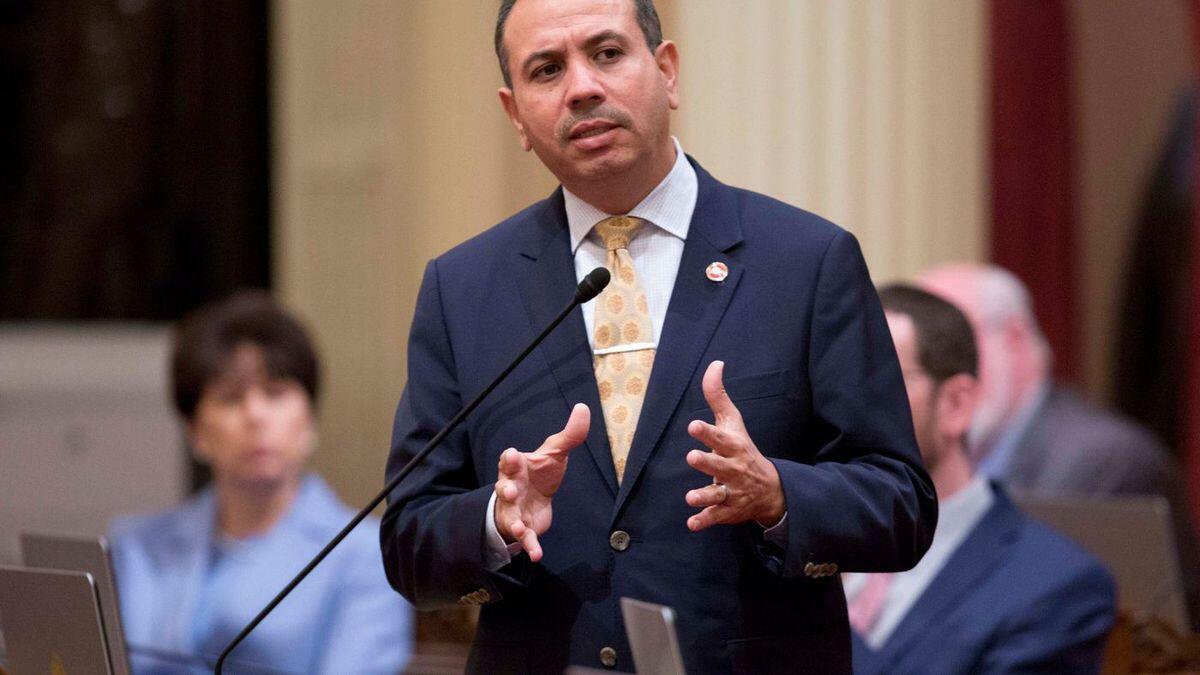
The California secretary of state has rejected Tony Mendoza’s proposed ballot designation of “state senator” in the June election, saying it is deceptive because he resigned from the Senate last month amid allegations of sexual harassment.
Mendoza, a Democrat from Artesia, resigned under threat that the Senate would expel him after an investigation concluded that he made six female aides uncomfortable with a pattern of “unwanted flirtatious or sexually suggestive behavior.”
“As such, your proposed ballot designation of ‘State Senator’ is misleading,” wrote Rachelle Delucchi, an elections counsel for the secretary of state in a letter to Mendoza.
Mendoza can appeal to the courts on the ballot designation issue or the ballot will have the words “no designation” under his name when it is finalized on Thursday.
Mendoza has denied wrongdoing and is running in a special election in June to serve the remaining months of his term, while also being a candidate in June for a new four-year term. He did not immediately respond to a request for comment on the ballot designation issue.
In a statement sent to supporters in recent days, Mendoza said he has been a target of “Sacramento special interests and establishment leadership” and the Senate leadership “circumvented its own process” by not taking the allegations to the Senate Ethics Committee.
“I have great remorse for making anyone feel uncomfortable or awkward,” Mendoza said in the message on social media. “Those were not my intentions and I am deeply sorry. After months of reflection, I am guilty of being a part of a male-dominated Sacramento culture of power and privilege.”
He said he looks forward to discussing the issue during the campaign and clearing his name.
The other candidates running to represent the 32nd District in a new, four-year term are Democrats Bob J. Archuleta, Rudy Bermudez, David Castellanos, Vanessa Delgado, Vivian Romero and Vicky Santana and Ali S. Taj; and Republicans Ion Sarega and Rita Topalian.
----------
For the record
9:01 a.m. March 27: An earlier version of this post identified Ali S. Taj as a Republican. Taj is a Democrat.
-----------
California joins other states to demand answers from Facebook on Cambridge Analytica’s use of personal data

California Atty. Gen. Xavier Becerra joined counterparts from 33 other states in demanding Monday that Facebook explain how personal information from millions of people was used without their consent by a political consulting firm with ties to Donald Trump’s 2016 presidential campaign.
The letter asks Facebook Chief Executive Mark Zuckerberg to detail when his company learned that data were being used by the firm Cambridge Analytica, how many Facebook users’ information was taken and what policies exist to make sure consumers give consent before their personal information is used by third parties.
“Facebook left millions of Californians’ personal information vulnerable,” Becerra said in a statement, adding his office intends to “make sure that consumers’ personal information is kept private and secure.”
The letter was signed by top attorneys in 34 states including New York, Illinois and New Jersey. It was also signed by attorneys general for Guam, American Samoa and the District of Columbia.
The attorneys general wrote that they want a “full accounting” of what happened and that they are “profoundly concerned” by news reports that personal data from up to 50 million Facebook users might have been used by Cambridge Analytica to target political messaging during the last presidential campaign.
Zuckerberg said last week that Facebook would take action to try to prevent other outside parties from exploiting user data.
The U.S. Federal Trade Commission is also investigating the matter.
Becerra said the review by states is needed.
“My fellow attorneys general and I demand answers on behalf of all those whose trust and personal data has been compromised,” he said.
Political campaigns will run more digital ads this year than ever. Here’s how they’ll find you
There was plenty of outrage to go around last week following revelations that Facebook data on some 50 million users were used to allegedly build profiles of voters, serve them tailor-made ads and try to help President Trump get elected.
California housing bill will rezone wide swaths of Los Angeles

About half the single-family parcels in Los Angeles — 190,000 — could be rezoned to allow for multistory apartments and condominiums under major new state housing legislation.
That’s just one of the local impacts from Senate Bill 827, legislation from Sen. Scott Wiener (D-San Francisco). The bill is drawing cheers from some environmentalists and housing activists, but also causing major heartburn for homeowner groups and advocates for low-income residents.
Kevin de León has proven energy, but Feinstein still has the clout
The best way to judge a job applicant is to look at his past work record. So let’s look at state Sen. Kevin de León’s.
The Los Angeles Democrat is challenging U.S. Sen. Dianne Feinstein, the grande dame of his party, trying to grab the coveted seat she has held for 26 years.
De León’s job performance as a legislator, including the last three-plus years as leader of the California Senate, indicates he’d be an energetic, in-your-face, ultimately effective U.S. senator — and much more liberal than Feinstein.
Billions of dollars to help California’s homeless population are piling up — and going unspent
California’s homeless population has grown to more than 134,000 people, and key state government spending is taking a while to reach the streets.
In summer 2016 the state approved its largest homeless program, a $2-billion loan to help finance new housing, but the money is tied up in court. That same year, lawmakers allocated $35 million for rental assistance and emergency shelters, but staff shortages at the housing department delayed spending the money for 18 months. Last year’s package of housing legislation included more than $100 million for programs to help the homeless, but the state won’t begin spending those dollars until fall at the earliest. The spending difficulties come as the state’s homeless population has risen 16% over the past two years.
Some of the state’s sluggishness, advocates say, springs from a history of limited investment. But that could be changing. Legislators are considering proposals that could pump an additional $1.5 billion into homelessness prevention next year, efforts that could lead to thousands of new beds for those needing shelter — and stronger scrutiny of state spending.
California housing crisis podcast: Everything you need to know about the most talked about housing bill in the country
News outlets across the country are writing about Senate Bill 827, the California housing bill that would dramatically increase homebuilding near transit lines. The legislation from Sen. Scott Wiener (D-San Francisco) would address two of the state’s biggest housing problems: a shortage of available homes and the need to build at greater densities to help meet climate change goals.
But one aspect of the bill that hasn’t gotten as much attention is its potential effects on low-income Californians. On this episode of Gimme Shelter: The California Housing Crisis Pod, we discuss how the bill impacts long-simmering debates about gentrification and displacement across the state.
Our interviews are with Cynthia Strathmann of Strategic Actions for a Just Economy in South Los Angeles, and Brian Hanlon of California YIMBY, the principal backer of the legislation. Plus we talk about some of the meme art about the bill.
“Gimme Shelter,” a biweekly podcast that looks at why it’s so expensive to live in California and what the state can do about it, features Liam Dillon, who covers housing affordability issues for the Los Angeles Times’ Sacramento bureau, and Matt Levin, data reporter for CALMatters.
You can subscribe to “Gimme Shelter” on iTunes, Stitcher, Soundcloud, Google Play and Overcast.
California lawmakers hope to stymie ballot initiative that would hand taxpayers the bill for lead paint cleanup
A group of state lawmakers announced legislation Thursday to fight a proposed November ballot measure that would allow three national paint companies to hand California taxpayers the bill for cleaning up hazardous lead paint in homes.
The six bills, introduced by Democratic members of the Assembly from across the state, would add legal protections for homeowners with lead paint in their residences, increase the number of lead paint inspectors and make it easier to sue the companies, among other proposals.
“For too long, paint companies have been able to dodge responsibility for their actions,” said Assemblyman Rob Bonta of Alameda at a Thursday news conference.
San Diego lawmaker wants to make it harder for local police to obtain tanks and other military vehicles
A new bill from a San Diego lawmaker aims to prevent California police departments from obtaining military-grade equipment without the explicit approval of local government.
“This bill helps further the impression that a police department is there to serve,” Democratic Assemblyman Todd Gloria said. “That’s a very different objective than national defense.”
In 2014, President Obama curtailed a Department of Defense program that allowed the military to distribute surplus armored vehicles, grenade launchers and large-caliber weapons to local police after complaints about police militarization during protests that year in Ferguson, Mo. Last summer, however, President Trump announced the revival of the program, saying that police needed the equipment to do their jobs.
Under Assembly Bill 3131, any police department that wants such equipment would have to receive explicit approval from a city council or other local governing body. The bill also would require the state attorney general’s office to compile a list of police departments with such equipment across California.
Aside from Trump’s recent action, Gloria said a situation in his district four years ago inspired his bill. Police in the San Diego Unified School District acquired a tank-like, mine-resistant, ambush-protected vehicle from the Defense Department without notifying district leaders. The district’s police chief initially said the vehicle would be used in rescues, including transporting “teddy bears” to disaster situations. After community pressure, the district returned the vehicle to the military.
“There’s just a difference between a squad car and a tank,” Gloria said.
Watchdog agency that told ex-Sen. Tony Mendoza he could tap legal defense fund withdraws that advice

California’s political campaign watchdog panel voted Thursday to withdraw an advice letter its attorneys sent to former Sen. Tony Mendoza that indicated he could use contributions from supporters to a legal defense fund in connection with an investigation of sexual harassment.
Mendoza, a Democrat from Artesia, resigned his Senate seat last month under threat of expulsion from the Senate after an investigation said he likely engaged in a pattern of harassment against female aides.
Mendoza denied wrongdoing and has sued the Senate, saying its investigation was flawed, but he is also facing a claim by another employee who says she was wrongly fired for reporting the harassment of others. Mendoza has lent his legal defense fund $125,000 from his Senate reelection campaign.
On Thursday, the Fair Political Practices Commission voted to withdraw an advice letter that concluded that Mendoza could use the legal defense fund as long as the legal issues “arose directly out of the performance of Senator Mendoza’s governmental activities and duties.”
Commissioners Brian Hatch and Allison Hayward proposed the withdrawal of the advice letter, leaving Mendoza with the option of seeking a formal legal opinion from the commission.
“It just doesn’t look good. It reflects on us,” Hatch said of the advice. “I don’t want to be giving him the card to use lobbyist money to resolve this.”
The withdrawal leaves Mendoza vulnerable legally, Hatch said.
“It puts him in a position where he dare not spend any legal defense money on something we’ve withdrawn our advice on because he’s likely to end up in an enforcement action over that,” Hatch warned.
California campaign watchdog panel divided over proposed dramatic oversight changes
At the request of California Gov. Jerry Brown, the state’s political watchdog panel on Thursday delayed action on a controversial plan that could transfer power from its full-time chairwoman to give other, part-time commissioners a greater say in key decisions.
The state’s five-member Fair Political Practices Commission is locked in a power struggle in which some part-time members, with support from attorneys representing candidates and elected officials, are proposing that Chairwoman Jodi Remke be required to share oversight power on budgets, court cases, hiring and policy changes.
Peter A. Krause, the governor’s legal affairs secretary, wrote to the panel on behalf of the governor that he appreciates that Commissioners Allison Hayward and Brian Hatch want the part-time panelists to have a bigger role in the agency’s operations.
But he said the proposal to create four new standing committees — each with two commissioners — “could either streamline the work of the Commission between meetings, or significantly impede its work.”
“Given the importance of the commission’s work, particularly during an election year, it is vital to provide the regulated community and the public more time to better understand how these governance principles will work in practice and to provide input into the revision process,” Krause added, asking for a one-month delay.
The FPPC was created to be led by a full-time chairperson appointed by the governor to oversee management of the agency on a day-to-day basis along with an executive director.
“There has never been a Shangri-La of FPPC governance where all was balanced and everybody has been happy. There has always been a tension,” Hayward told the panel. “I’d like to think there are some things we can do to alleviate that.”
Remke said she agrees commissioners can play a larger role in budgets, but she bristled at other aspects of the proposal and claims her powers are not supported by the agency’s governing guidelines.
“This is dramatic change to the way the agency is structured,” Remke said at the meeting.
Hatch and Hayward proposed four advisory committees that would exclude the chairwoman and make recommendations on legislation, personnel, laws, policies and budgets.
“We conclude, from what we know, that as a practical matter, the Commission is only sometimes presented with budget information, and ordinarily has not voted on the budget,” the report said.
The proposal is backed by the California Political Attorneys Assn., which is made up of lawyers representing elected officials and candidates regulated by the FPPC.
“It is our hope that the establishment of such committees will bring more order and consistency to legislation, regulations, rules and advice considered and adopted by the commission and other policymakers,” wrote Richard Rios, a board member for the group and an attorney for the Senate Democratic Caucus.
Schwarzenegger and Kasich back Republicans looking for a ‘new way’ for California’s party
A gymnasium in East Los Angeles is an odd setting for a Republican summit, but it offered the kind of symbolism former Assembly Republican leader Chad Mayes is seeking these days: For the GOP to stay relevant in California, it has to try something new.
So somewhere new is where Mayes, former Gov. Arnold Schwarzenegger and Ohio Gov. John Kasich found themselves Wednesday at the first meeting of Mayes’ centrist advocacy group New Way California. He started it after he stepped down as the leader of his Assembly caucus last summer amid criticism for helping Democrats renew California’s landmark climate program.
The event was a sort of coming out party for the group, aimed at articulating a different path for the Republican Party as it continues on a slow slide toward irrelevancy in the state. There are about as many registered Republican voters in California as there are voters with no party affiliation, according to the most recent figures.
In races to replace lawmakers felled by sexual harassment claims, one group aims to send women to Sacramento
Civil rights lawyer Valerie McGinty founded a political action committee late last year to help boost the low numbers of women serving in the California Legislature. As it launches in Los Angeles, it will have an additional objective: backing women pursuing the seats left empty by men whose careers were ended by sexual harassment accusations.
Women in California and nationwide have jumped into political races in high numbers since the election of President Trump, and still more female candidates have been inspired to run as the national #MeToo movement brought attention to the need to reverse a culture of sexual misconduct in the political world. The overall mission is to reach gender parity in state representation by 2028, and with the new momentum, McGinty says, that is more within reach than ever.
“These aren’t just seat games,” McGinty said of the latest endorsements from her group, called Fund Her. “This is an opportunity to come out of the gate with a strong statement.”
Republican John Cox inches ahead of Antonio Villaraigosa for second place in California governor’s race, new poll finds
Republican businessman John Cox has nudged ahead of former Los Angeles Mayor Antonio Villaraigosa for second place in California’s race for governor, while Lt. Gov. Gavin Newsom has shored up his front-runner status among voters, according to a new poll from the nonpartisan Public Policy Institute of California.
The survey released Wednesday night also found that Sen. Dianne Feinstein continues to hold a sizable lead in her reelection bid over fellow Democrat and former state Senate President Pro Tem Kevin de León of Los Angeles.
With the June 5 primary approaching, Cox’s rising fortunes in the governor’s race should be well received by Newsom — facing a Republican in the November election will likely increase his odds for victory. No Republican has been elected to statewide office in California since 2006, and Democrats currently hold an edge of nearly 20 percentage points over the GOP in voter registration.
Democrat drops out of race against Rohrabacher in the name of unity, calls on other candidates to do the same
Calling for party unity, Democrat Laura Oatman on Wednesday dropped out of the race against GOP Rep. Dana Rohrabacher and endorsed her opponent Harley Rouda.
Democrats across California have been worried about getting shut out of key congressional races this year because of the massive field of candidates challenging GOP incumbents.
It’s too late for Oatman to remove her name from the ballot, but she said in a statement that she hopes “all local activists … can now unite into one mighty force” behind Rouda, a fellow Democrat. She called on the other Democrats left in the Orange County race to drop out, too.
She also said Rouda “represents the best choice to flip the 48th District from red to blue.”
Rouda is one of seven Democrats still hoping to unseat Rohrabacher as the party seeks to retake control of the House. However, the recent entry of prominent Republican Scott Baugh into the race may have lowered their chances.
Many Democrats fear that with so many Democratic candidates splitting the vote, Baugh could make it through California’s primary, which advances the top two vote-getters in each race regardless of party. If that happens, a prime pickup opportunity for Democrats could evaporate.
Rep. Mimi Walters was the only House member who reported using Cambridge Analytica data in 2016 election
Rep. Mimi Walters (R-Irvine) was the only House member who reported using Cambridge Analytica for voter data during the 2016 election cycle.
The firm, which has been facing a storm of scrutiny for using allegedly ill-gotten Facebook data on millions of the site’s users, also provided data for the campaigns of two Republican senators.
Walters’ campaign consultant, Dave Gilliard, said a $20,000 payment was made to Connell Donatelli Inc., an online advertising firm, which in turn paid the money to Cambridge Analytica. The payment was for “voter data for media ads,” according to Federal Election Commission records.
“They only provided issue preference data and not psychographic data,” Gilliard said, referring to the more in-depth profiles Cambridge Analytica claimed to be able to create by pumping the tastes and interests of millions of voters into algorithms in order to target them with tailor-made digital ads. Connell Donatelli has been told to stop using the firm’s data on projects for Walters’ campaign, Gilliard added.
Reports from the New York Times and the Observer of London have detailed how the company used troves of data to build “psychographic” profiles on voters during President Trump’s campaign, but the efficacy of its methods is unclear.
Just because Walters was the only House member to report paying Cambridge Analytica doesn’t necessarily mean hers was the only campaign to use the firm. FEC regulations do not require campaigns to report sub-vendor relationships in which a campaign vendor such as a consultant acts as a middleman to pay other vendors like media buyers or data firms.
Another California Republican running for Congress, former state Sen. Bob Huff, reported paying the firm more than $37,000 in 2016 during his run for the Los Angeles County Board of Supervisors. The San Jose Mercury News reported that Huff had already paid Cambridge Analytica a deposit of more than $10,000 for his current campaign in the 39th Congressional District, but has canceled the contract.
Walters, who represents inland Orange County including Irvine, is considered vulnerable in this year’s midterm election and has multiple Democratic opponents.
Proposal to put armed peace officers on all California school campuses advances in Assembly
Armed law enforcement officers would be assigned to all school campuses in California at state expense under a measure that advanced Wednesday in response to a series of recent mass shootings across the country.
The measure by Assemblyman James Gallagher (R-Yuba City) was recommended Wednesday by the Assembly Education Committee, which eliminated a proposal that would have allowed private security guards to be used on campuses.
“Why not have these individuals at every school in the state to ensure that there will be someone there [to stop shooting incidents]?” Gallagher asked the panel. “We need to have a first line of defense.”
As for the cost, which has not been calculated, Gallagher said: “I don’t think you can put a price on it when it comes to peace of mind, when it comes to our kids.”
Approval of the measure comes after a shooting last month that killed 17 people at Marjory Stoneman Douglas High School in Parkland, Fla. Some California campuses already have school safety officers, but many schools cannot afford the extra security.
The American Civil Liberties Union of California and the California Teachers Assn. oppose the bill, AB 2067. Kathy Sher of the ACLU said armed guards on campuses will make students feel like they are in detention centers, not places of learning.
“Putting guns in schools in the hands of security guards or school resource officers will make schools less safe, not more safe,” Sher told the panel.
Opponents also cited incidents at other schools where armed law enforcement officers got involved in disciplinary matters and used excessive force.
But Gallagher cited an incident earlier in the week at a Maryland high school in which an armed school safety officer stopped a student who had shot two other students before additional people could be injured.
The measure passed out of committee on a 4-0 vote, with support also coming from Assemblyman Tom Lackey (R-Palmdale), a retired California Highway Patrol officer.
“This is a very disturbing problem in our society,” Lackey said of school shootings. “It’s not OK to leave our children defenseless, and that’s what we’ve done.”
The bill still has to go through a fiscal committee before it reaches the Assembly floor.
New Senate President Pro Tem Toni Atkins pledges change in the Capitol on sexual misconduct
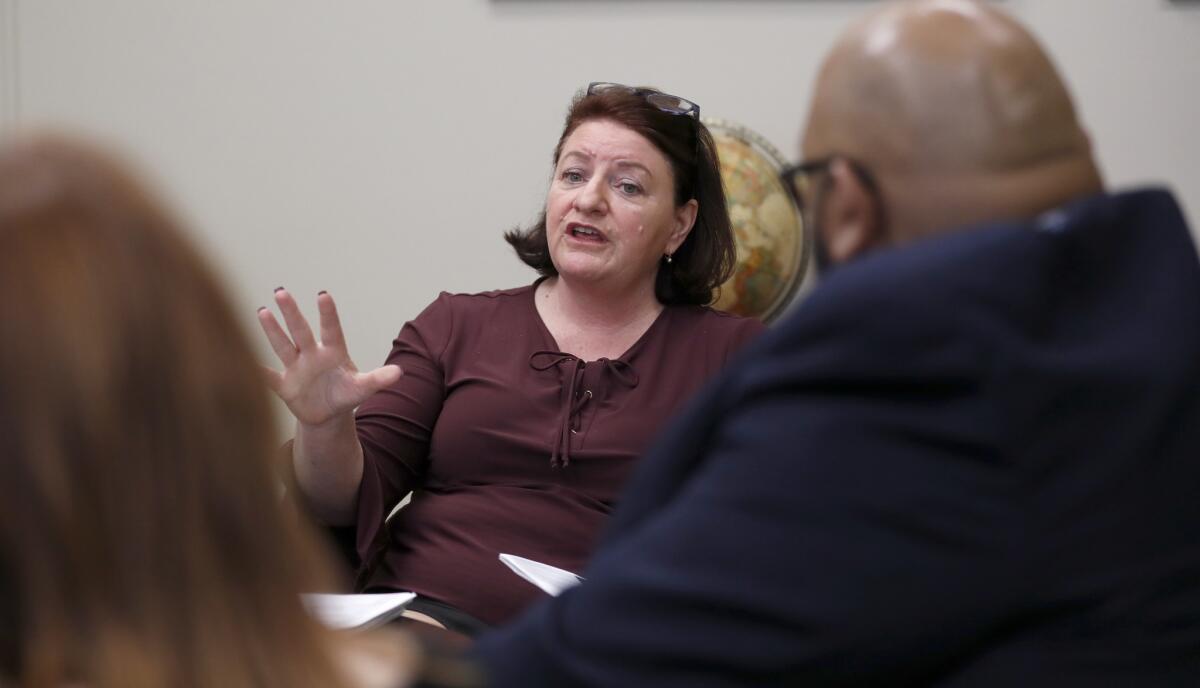
As she became the new leader of the California Senate, Toni Atkins used her remarks after taking the oath of office as Senate president pro tem to make a direct promise to change the culture of the statehouse when it comes to workplace behavior.
“True culture change — holding ourselves to a higher standard — requires the active, everyday enlightened participation of every person who works in and around this Capitol,” Atkins (D-San Diego) said on the Senate floor Wednesday. “And I pledge to you, that will be our mission and our mandate.”
Atkins, 55, was elected on a unanimous vote of the Senate to succeed the former leader, Sen. Kevin de León (D-Los Angeles), who is termed out this fall. She becomes the first person since 1871 to have served both as leader of the Senate and as speaker of the state Assembly.
She served as speaker for two years ending in 2016 and was elected to the Senate that fall.
Atkins took the oath of office standing next to her spouse, Jennifer LaSar, and in a Senate chamber crowded with members of both houses of the Legislature and a cast of former state and legislative leaders.
She is the first woman to lead the Senate, as well as the first lawmaker to come out as gay to do so. San Diego last saw a Senate leader from the community in 1980.
Atkins assumes leadership of the upper house as the state Capitol continues to grapple with the impacts of a new conversation about sexual misconduct. Three lawmakers, including one member of the Senate, have resigned since October in the wake of allegations of improper conduct.
Atkins made an emphatic point in her 17-minute speech to pledge change in the workplace practices of how sexual harassment allegations are investigated and resolved.
“Recently, we’ve reformed some of our internal processes for the better,” Atkins said. “But we know that true culture change cannot be legislated or decreed. It doesn’t occur overnight. And it doesn’t get solved simply by electing women to leadership.”
Atkins’ legislative record includes significant work on affordable housing issues, including a 2017 law enacting a real estate transaction fee to fund housing projects. She has also championed legislation on healthcare issues and on expanding the rights of gay and transgender Californians.
“I’m not interested in happy rhetoric,” she said from the Senate rostrum. “I’ll be happy when we get results. And I’m willing to work with anyone willing to shake off the shackles of zero-sum thinking and put some big ideas on the table for the people of California.”
After Democrats chose Atkins to be the next leader, she reached out to the Republicans. Senate Republican leader Patricia Bates of Laguna Niguel said that Atkins made the gesture of bipartisanship and asked to meet with the GOP lawmakers to discuss their concerns and interests.
“We really need to do more of that,” Bates said during the swearing-in ceremony. “We’re going to find two paths, but we want those paths to merge where they can.”
Atkins, whose life’s journey from an Appalachian mining town west to California has an ongoing influence on her governing philosophy, has the potential to be one the longest-serving leaders of the Senate since legislative term limits were first imposed in 1990. If she wins reelection in her coastal district in two years, she could serve as president pro tempore until 2024.
Gov. Jerry Brown did not attend Wednesday’s swearing-in ceremony, but celebrated with Atkins earlier in the day, giving her a gift of olive oil from the trees on his rural Northern California ranch.
Candidates for California attorney general criticize incumbent Xavier Becerra for missing debate
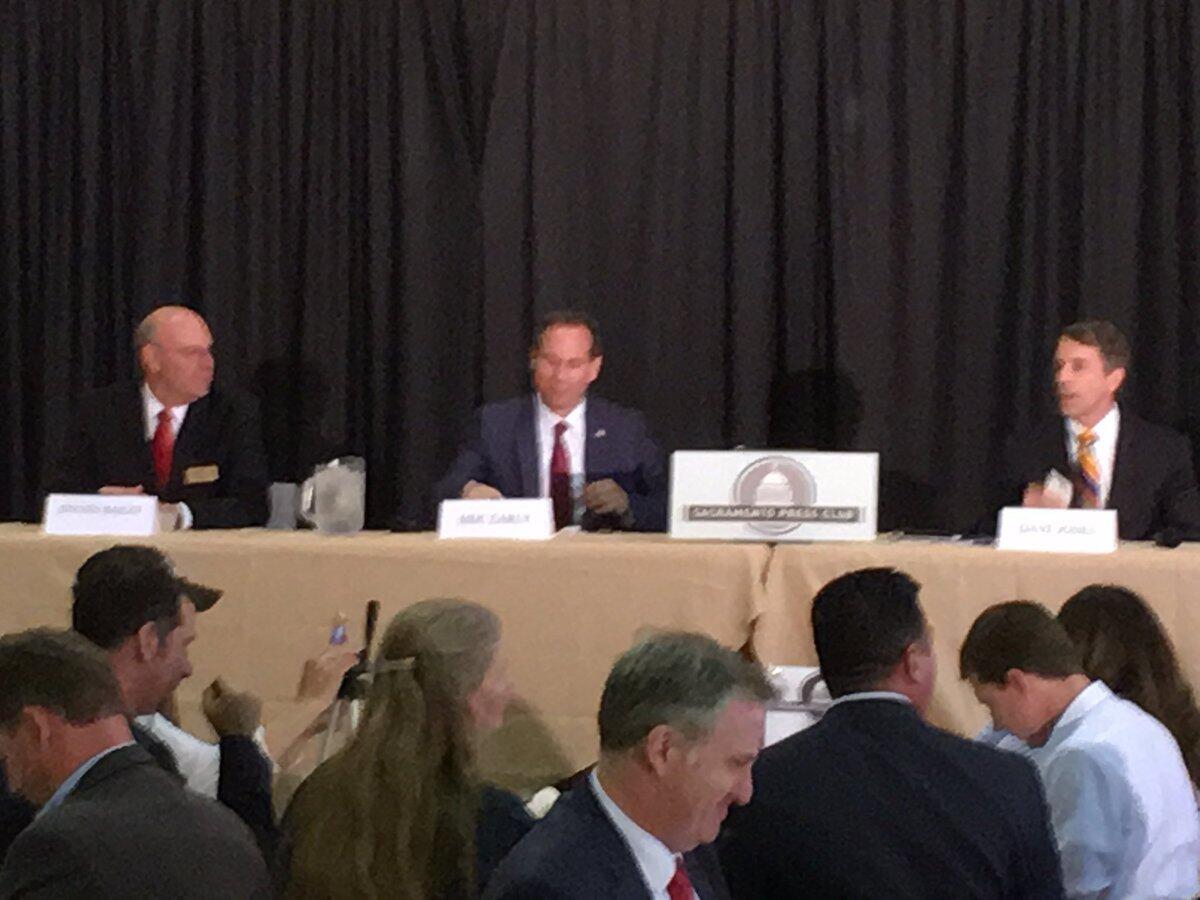
Three candidates challenging California Atty. Gen. Xavier Becerra in this year’s election criticized the incumbent for skipping a debate Wednesday and also accused him of neglecting other duties they said are needed to protect public safety.
Becerra was appointed to the post more than a year ago by Gov. Jerry Brown to fill a vacancy created when Kamala Harris was elected to the U.S. Senate. In running for election in the June primary, Becerra faces challenges from Democratic Insurance Commissioner Dave Jones and two Republican attorneys, Steven Bailey and Eric Early.
“The appointed attorney general is absent today,” Jones said. “That’s disappointing, but this is not the first time he has been missing in action.”
Representatives for Becerra said the attorney general had other commitments, including travel to Washington, D.C., on Tuesday to attend a hearing in a Supreme Court case. The case has the attorney general defending a state law requiring women’s health clinics to post notices on the availability of abortion services, even if they are not offered at a clinic.
“It’s a sign of his arrogance that he isn’t here,” Early said. “He has thumbed his nose at California voters by not being here.”
Jones accused Becerra of not leading on issues including bail reform, of failing to sue Exxon Mobil over climate change issues and for not taking sufficient action to reduce a backlog of 10,000 people who own guns but are disqualified from having them because of criminal convictions or mental illness.
Bailey said Becerra has neglected to take action to stop 40,000 criminals from being released as part of law changes addressing prison overpopulation.
“We have a public safety crisis in this state,” he said.
Asked about Becerra’s suing the Trump administration more than two dozen times on issues including a proposed border wall and restrictions on immigration from predominantly Muslim countries, Bailey called the wall lawsuit “frivolous.” He said the public is put at risk by Becerra’s support of a so-called sanctuary state law that restricts the ability of local law enforcement to cooperate with federal immigration agents.
Early also opposed that law and state efforts to block the border wall.
“We are a country of laws, and we cannot afford an endless flow” of immigrants in the country illegally, he said.
Jones said he supports the sanctuary state law but added, “There is a long list of things this attorney general is not doing because he is fixated on Trump.”
Jones said he would go to court to block Trump administration proposals to allow more oil drilling off the California coast and on public lands. Bailey said he opposes more drilling off the coast but supports exploration on public lands. Early said he also would limit offshore drilling.
Early and Bailey said they support the death penalty, while Jones said he opposes capital punishment as costly and ineffective as a deterrent, but he would enforce the law as it has been approved.
California privacy advocates ask Facebook to stop opposing their proposed ballot measure following Cambridge Analytica debacle

The lead proponent behind a proposed voter measure that would expand online privacy protections for California consumers has a message for Facebook Chief Executive Mark Zuckerberg: “Put your money where your mouth is.”
In a letter to Zuckerberg, emailed to the social media company and posted on Zuckerberg’s Facebook page, Alastair Mactaggart, chairman of Californians for Consumer Privacy, says he was disappointed to learn Facebook has chosen not to support the privacy ballot campaign — and is pouring hundreds of thousands of dollars into an attempt to sink privacy advocates’ efforts.
The letter comes as the Federal Trade Commission has opened an investigation into how a data analytics firm, Cambridge Analytica, accessed the personal data of 50 million Facebook users, without their knowledge, to help elect President Trump.
“Something’s not adding up here,” Mactaggart writes. “It is time to be honest with Facebook users and shareholders about what information was collected, sold or breached in the Cambridge Analytica debacle; and to come clean about the true basis for your opposition to the California Consumer Privacy Act of 2018.”
Facebook did not immediately respond to a request for comment.
The state consumer privacy act, a proposed 2018 ballot measure, would require companies to disclose what personal information from Californians they collect, buy or share. It would allow many consumers to “opt out” from those practices and would prevent businesses from charging a higher price to those who make that choice.
The ballot measure also would give new power to prosecutors and residents to file civil lawsuits after a data breach or for selling their personal information.
Mactaggart, a San Francisco real estate developer, has said he and privacy advocates want to shift the balance of power over data sharing to consumers. They met with representatives from major tech companies, including Facebook, Apple and Google, in December in an attempt to win over their support.
They were noncommittal, Mactaggart said, but in February, Facebook joined Google, Comcast, Verizon and AT&T to contribute more than $1 million to a political action committee set up to oppose the measure.
“Right now, [Facebook’s] money is saying something differently than what they are telling the world,” he said Tuesday.
Californians appointed to state posts could soon be barred from writing checks to lawmakers who vote on their nomination
A few months before the state Senate confirmed Lucy Dunn’s reappointment to the California Transportation Commission in 2013, she made a political contribution to the president pro tem of the state Senate, whose support was crucial to her staying on the panel.
Last year, Dunn, the president and CEO of the Orange County Business Council, was confirmed for a third term on the influential transportation panel. Three months later she contributed to a political campaign for the current Senate leader, Kevin De León.
Dunn’s contributions are allowed by state law, but some believe such payments undermine public confidence in the appointment process. That concern is behind a new proposal by Assemblyman Adam Gray (D-Merced) to outlaw contributions to senators by political appointees for up to a year between the time they are chosen by the governor until their required confirmation by the Senate.
Gov. Jerry Brown curses high-speed rail critics in forceful speech to labor leaders
California Gov. Jerry Brown gave a forceful defense of one of his signature projects Monday night, responding to critics of the escalating costs of the state’s high-speed rail program.
“That’s bullshit,” Brown said, at the outset of a 15-minute speech to California labor leaders at a Sacramento hotel.
Brown said the high-speed rail effort, with a newly escalated cost estimate of $77.3 billion to connect Los Angeles to San Francisco, was a small investment when compared with the scale of the California economy. Other countries such as Spain with much smaller economies, Brown said, have already built major high-speed rail lines.
“I’m so tired of all the nonsense that I read in the paper and you hear from other politicians,” Brown said.
“We can do it if we have the imagination, if we have the will and we don’t let these small-minded people intimidate us into lowering our expectations.”
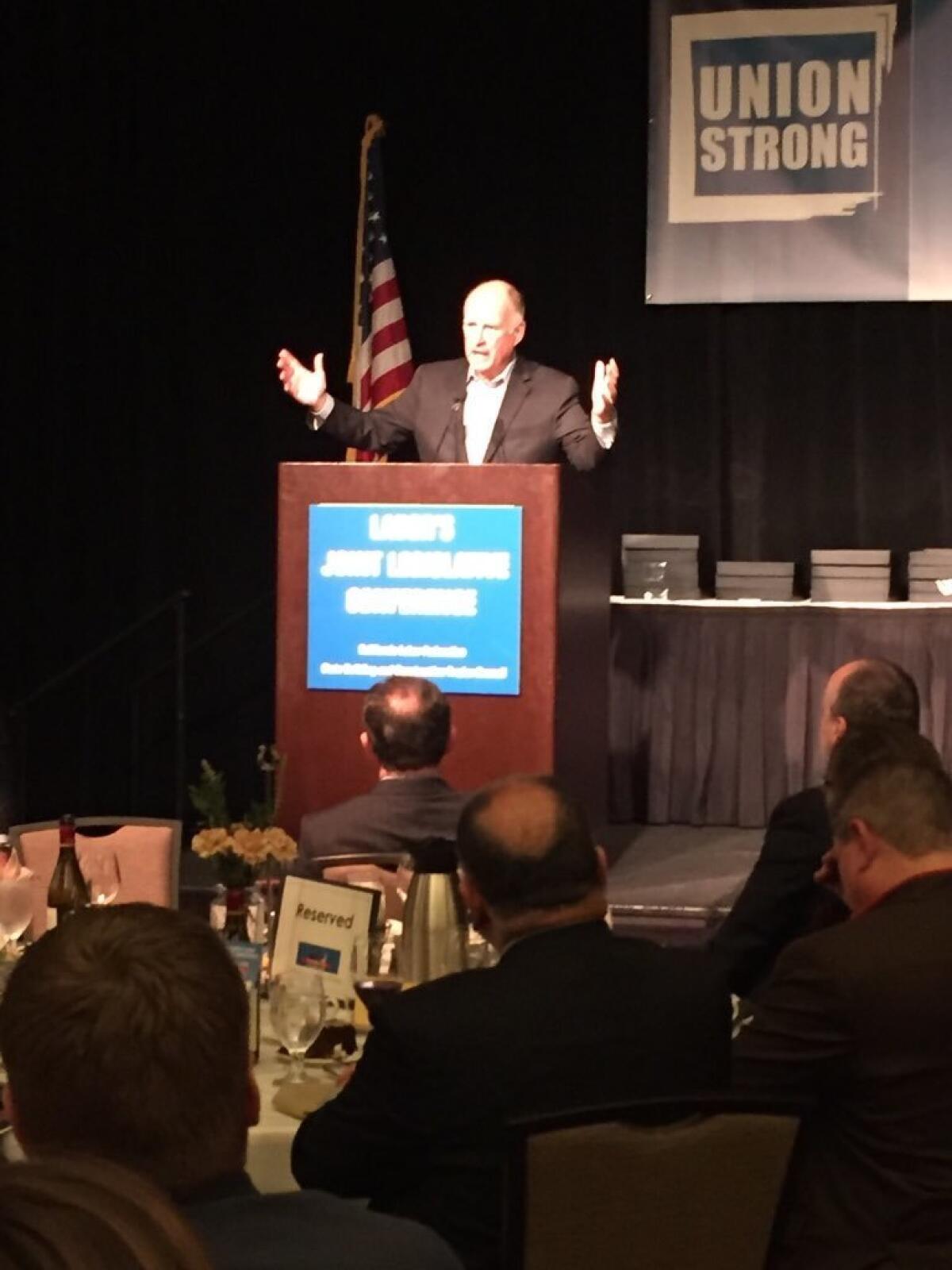
Brown also connected the high-speed rail project to the state’s housing affordability crisis, saying that people could live in less expensive housing in the Central Valley and take high-speed rail to commute to the Bay Area for work.
“High-speed rail is affordable housing,” he said.
Brown said he has little hope of securing more funding for the project under President Trump and the GOP-controlled Congress. But the governor said he was going to do everything he can to return Democrats to power in Washington so that high-speed rail gets built.
“People say, ‘How are you going to fund the railroad?’ ” Brown said. “I’ll tell you how we’re going to fund the railroad. We’re going to take back the Congress and then a Democratic congress is going to put the high-speed rail in the infrastructure bill and then we’ll get that trillion dollars and we’ll put America back to work.”
California’s Senate leader, Kevin de León, prepares to step aside and urges colleagues to ‘Take advantage of this moment’
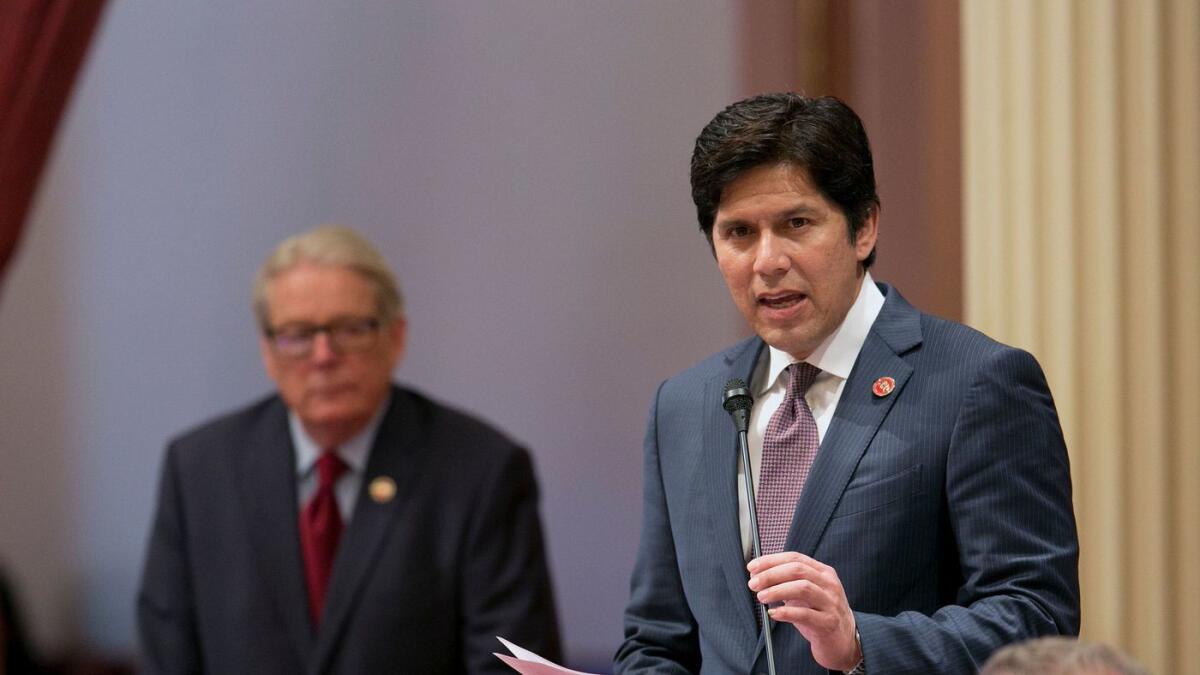
In his final floor session before stepping aside for a new leader, Senate President Pro Tem Kevin de León urged his colleagues on Monday to reject the suggestion that lawmakers should be “measured” in their approach to governing.
“This moment is fleeting,” De León said of the term limits era of legislating in Sacramento. “Take advantage of this moment and seize it.”
On Wednesday, state Sen. Toni Atkins (D-San Diego) will take over as leader of the upper house of the California Legislature. De León, who will leave his post in Sacramento at the end of the year due to term limits, had led the Senate since October 2014. He is the first Latino in California history to hold the position.
A number of senators rose during Monday’s ceremonial floor session to thank the Los Angeles Democrat for his work on a variety of issues. Special praise, though, came from Democrats who noted De León’s leadership on the package of bills crafted as a political and policy resistance to the agenda of President Trump.
“You have shaped what it means to be a Californian in the current political climate,” said Sen. Hannah-Beth Jackson (D-Santa Barbara).
De León wrote the law that was the centerpiece of the state’s 2017 package of laws in support of state residents who are in the U.S. illegally. The Trump administration filed a lawsuit earlier this month that argues the state laws are unconstitutional.
De León is running against a fellow Democrat, Sen. Dianne Feinstein for her seat. He has staked much of this year’s campaign on his accomplishments in Sacramento — including efforts to extend the state’s landmark climate change law, a new background check on ammunition purchases and legislation to create a state-run retirement system for private sector workers.
Sen. Ed Hernandez (D-West Covina) said that De León’s leadership came “at the right time in history.”
Atkins praised her predecessor as Senate leader for the lasting impact his work will have on the lives of Californians.
“You are the California success story,” she said. “You’re making a mark on history.”
California legislation would eliminate Los Angeles rules blocking homeless housing
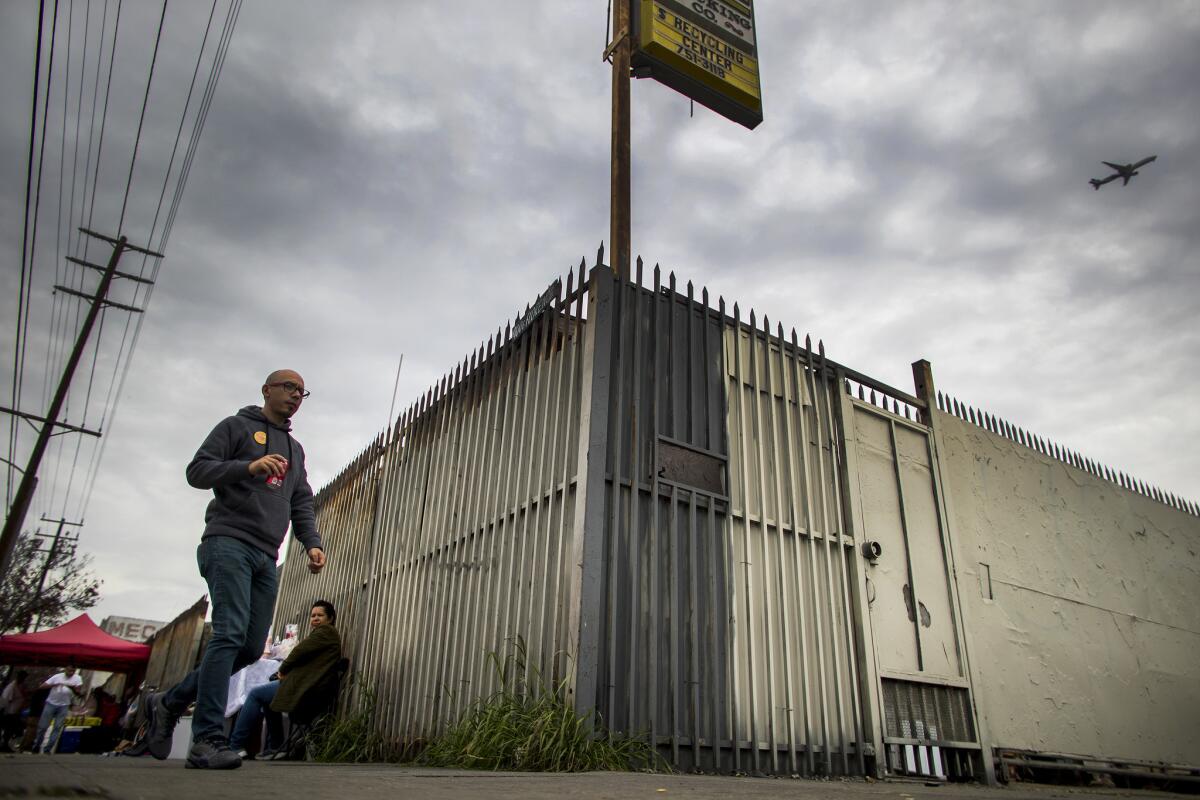
A California lawmaker wants to make it easier to build homeless housing across the state and is taking aim at Los Angeles.
Legislation from Assemblyman David Chiu (D-San Francisco) would require cities and counties to approve permanent supportive housing projects for homeless residents anywhere housing is allowed under that local government’s zoning rules.
Assembly Bill 2162 is necessary to remove barriers to housing California’s growing homeless population, which now tops 134,000 people, Chiu said. He’s also planning to make changes to the bill that would block policies, like those in Los Angeles, that allow local elected officials to spike homeless housing in their districts if those officials don’t provide explicit support prior to a vote.
Earlier this month, The Times reported on city of Los Angeles rules that require council members to write a “letter of acknowledgement” before a project in their district could receive funding from Proposition HHH, a $1.2-billion bond passed in 2016 to finance homeless housing in Los Angeles. A proposed 51-unit development in South Los Angeles fell apart earlier this year because Councilman Curren Price withheld a letter, arguing that the project should have provided apartments for homeless families, not just studios.
Chiu said if such requirements are allowed to continue, it would create a loophole for local governments to sidestep his bill’s intent to help build homeless housing quickly.
“It’s a barrier that we don’t think is necessary,” Chiu said. “Local officials have lots of say in the process. We don’t think that this particular practice is one that’s helpful.”
Under Chiu’s proposed changes to the bill, which he plans to formally introduce next month, cities and counties could no longer make funding for low-income housing contingent on the signoff from an individual elected official. AB 2162 will have its first hearing before the Assembly Housing and Community Development Committee, which Chiu chairs, on Wednesday.
5 things to know about California’s crucial House races
There are fewer than 80 days until the California midterm primaries that might set up Democrats to reclaim control of the House.
The contests in California are essential for the party, which has based its strategy on winning at least a few of the Republican-held districts in the state that backed Hillary Clinton for president.
With the candidate lists finalized and the campaigns chugging along, here are some important things to know about the races:
California retirement board won’t divest from retailers of assault rifles
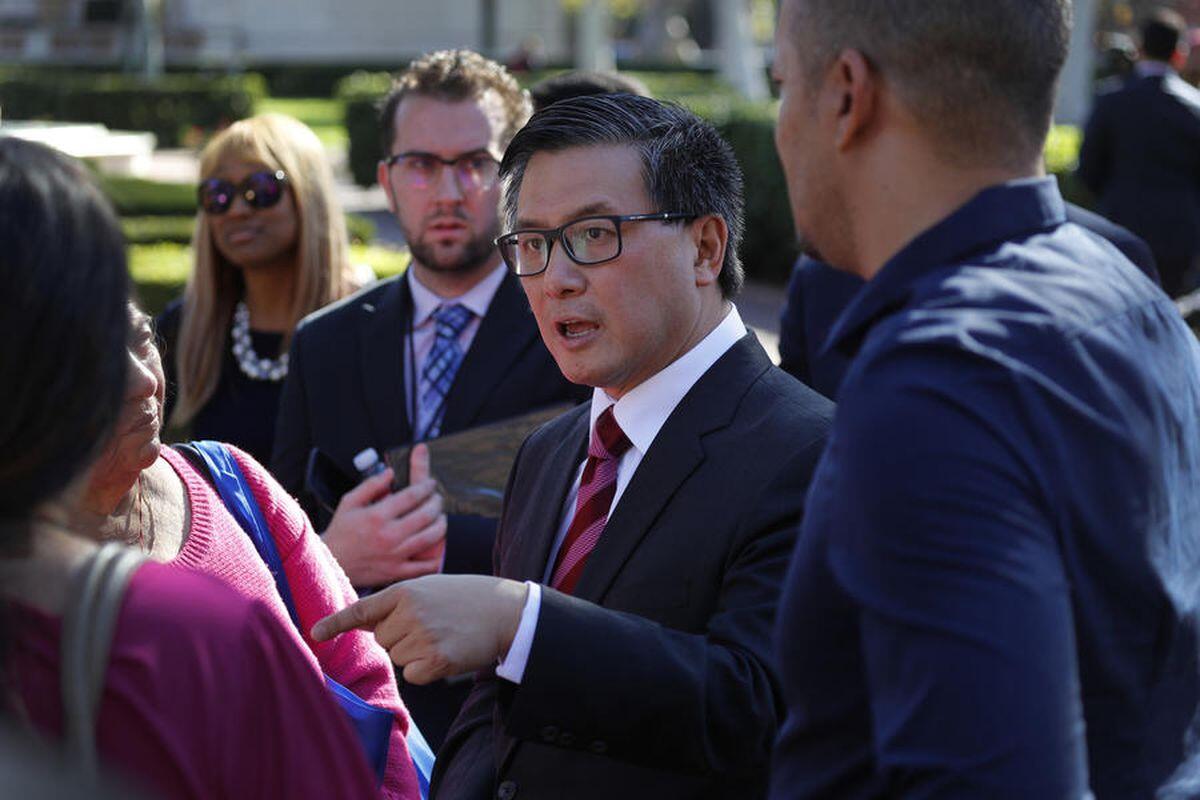
Despite pleas from relatives of those killed in the 2015 mass shooting in San Bernardino, the state retirement board on Monday rejected a proposal by California Treasurer John Chiang to consider divesting from retailers who sell assault weapons.
Chiang’s motion was defeated by the Board of Administration for the California Public Employees’ Retirement System, or CalPERS, with nine members voting in opposition and three in support. Opponents of the motion said divestment would take away their ability as major investors in retail firms to affect store policies on the sale of assault rifles.
“We obviously have a significant problem in this country,” said board member Bill Slaton. But, he added. “We have found engagement is a better alternative in order for us to accomplish something in this arena.”
He noted some retailers have already restricted gun sales to those 21 or older, and stopped selling assault rifles.
Chiang, a member of the board and candidate for governor, argued that without a divestment policy, the retirement system loses leverage to force change.
“If we don’t take action nobody is going to take us seriously on engagement,” Chiang argued.
The board could still consider divestment next year when it engages in a review of its overall investment policy on social issues, officials said.
The vote came after testimony from relatives of some of the 14 people killed by the mass shooting at the Inland Regional Center in San Bernardino.
Erica Porteus supported the divestment policy, saying her sister was “purposely murdered” in San Bernardino in a manner common to “military warfare.”
“Do everything possible to put a dent in gun violence,” urged Arlen Verdehyou, whose wife was killed in the shooting.
The divestment policy was opposed by Phil Jonas, a director with the Peace Officers Research Assn. of California, who said the CalPERS’ priority should be to get the best return on its investment for retirees. The Chiang proposal, he said, meant retirement system members would “contribute against their will to social causes favored by activists.”
How are California Republicans responding to Trump’s attacks on Mueller, McCabe firing?
President Trump’s new attacks over the weekend against the man leading the Russia probe put renewed pressure on California House Republicans already facing a tough reelection campaign.
Trump repeated his characterization of the investigation as a “witch hunt” and for the first time criticized by name Robert S. Mueller III, the former FBI head who is leading the probe into Russia’s election meddling and possible collusion with the Trump campaign.
Trump also celebrated the firing of former deputy FBI director Andrew McCabe, whose notes about his interactions with Trump could be helpful to Mueller’s probe. The FBI’s Office of Professional Responsibility recommended McCabe be fired over allegations that he authorized the disclosure of sensitive information to a reporter and misled investigators when asked about it.
Pelosi as Democratic leader? These congressional hopefuls won’t commit
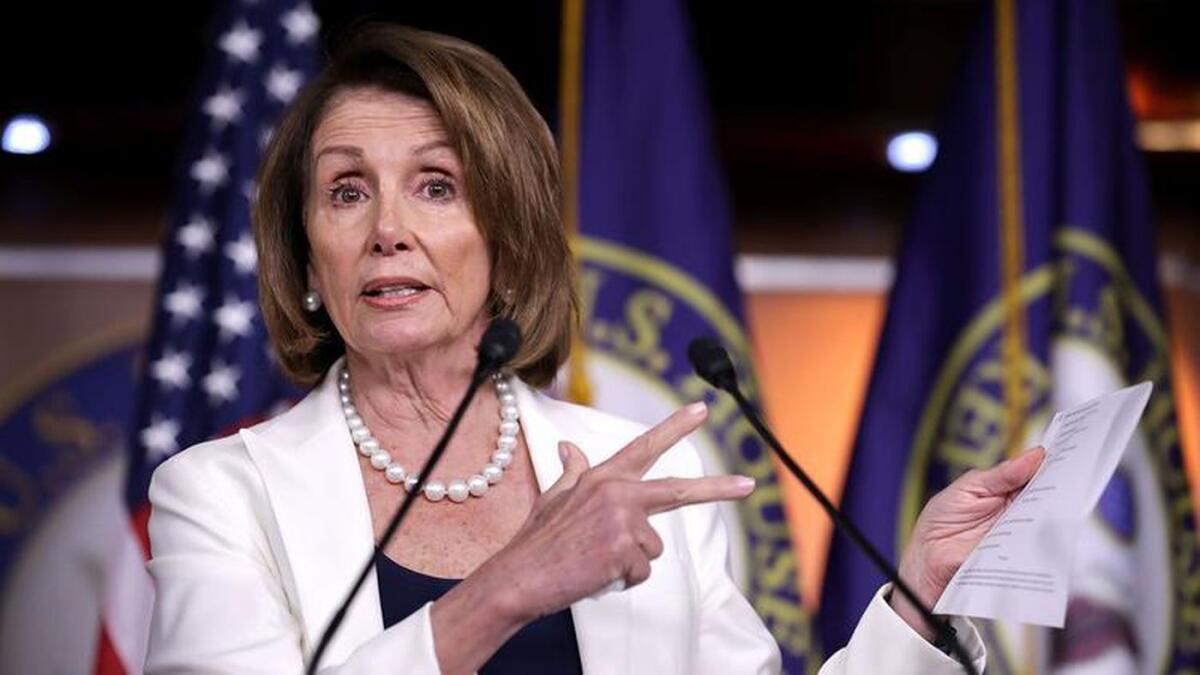
The very mention of Conor Lamb’s name got the crowd of Democrats packed into a Palmdale community center for a congressional debate Thursday night hooting and clapping.
The Pennsylvania Democrat’s apparent upset victory in a U.S. House district that President Trump carried by a large margin in 2016 is giving liberal activists fever dreams of a blue wave that could flip dozens of seats currently held by Republicans.
So the question was posed to the three Democratic candidates looking to oust Republican Rep. Steve Knight this November in a district that Hillary Clinton won in 2016: What lessons does Lamb’s victory offer Democrats?
Homelessness nonprofit executive Katie Hill said even the most passionate progressives in the party need to be open to compromise on some issues — with the exception of abortion access. Scientist Jess Phoenix and attorney Bryan Caforio both spoke about tapping into newfound energy and broadening the party’s base.
Left unsaid was whether they agreed with Lamb on probably his most distinct break from most Democrats running in 2018 — he wants to see someone besides Nancy Pelosi as House Democratic leader.
Hill:
“It is going to depend. We need a stronger bench, we need more people who are in a position to take that leadership position. But I have a tremendous amount of respect for Nancy Pelosi and what she has accomplished. And I think we will just have to see when the time comes, what that looks like.”
What factors play into that decision:
“When I am there what is going to matter the most is who is going to best be able to navigate this and get things done. As far as I am concerned we are so far behind the curve, we have so much to make up for in terms of the failures of this administration and the failures of the Congress before that we need to be incredibly effective in a very fast period of time and so I want leadership that is going to be able to make that happen.”
Caforio:
“I honestly have no idea. I am focusing on this election. And I need to win this election and we need to get to office a year from now see all the people who are running, make the decision. And I am focusing on winning this seat, getting a representative from the 25th district and getting someone in who is not Paul Ryan because he has shown he is not concerned about the future direction of the country. So we need somebody other than him.”
Phoenix:
“That is a tricky one. I would want to sit down and talk to her because I would need to know that the leadership would be more inclusive than it is currently. But of course I like to make decisions based on facts so I would want to make sure that whoever we put into positions of leadership within the party are people that represent where the party is now. And that is something that I would only be able to really fully assess when I see who my colleagues would be: who gets the seats, who keeps their seats, who is new. I wouldn’t be so foolish as to say I’d rule something out or be 100% yes. I think it is a really important point to consider and people running should be thinking about what they would do should they actually get elected.”
Democrats who want to oust Rep. Steve Knight make their case at forum
Althea Krim, 62, watched from the front row as the three top Democrats trying to defeat Republican Rep. Steve Knight squared off at a debate Thursday night.
It was the first political debate Krim, a recently retired audio visual installation manager from Palmdale, had attended. She didn’t follow politics until Donald Trump was elected president in 2016.
Now, the 32-year Antelope Valley resident is a bona fide political agent: She is knocking on doors trying to boost turnout to oust Knight from the Democratic majority district.
The question for her now is which Democrat can topple Knight in the general election: attorney Bryan Caforio, homelessness nonprofit executive Katie Hill or scientist Jess Phoenix.
Krim had a tough time differentiating the candidates when it came to policy matters during the 90-minute forum. You could hardly blame her — the Democrats largely agreed on most of the central issues for their party.
They each support moving toward a so-called Medicare-for-all healthcare system, increased gun control and long-term protection for DACA recipients in the country.
To the degree there was a difference between any of the three it was a rhetorical one.
Caforio came out swinging at the Trump administration, calling the president a “pathological liar” and a “despicable human being” in his opening remarks. He later called Trump the greatest threat to national security. The sharp tone from the former attorney drew applause. He also scored points with the crowd calling for infrastructure improvements to the high desert area, including better access to broadband internet.
Phoenix, a volcanologist who used to be on a reality TV show on the Discovery Channel, cracked jokes and called Trump’s border wall “asinine.” She cried when she recalled her friendship with one of the victims who died in the Columbine High School shooting. Krim enjoyed Phoenix’s blunt tone.
“People are pissed off, and they are showing up,” she said, citing the apparent victory of a Democrat this week in a special election for a U.S. House seat in Pennsylvania. “We can actually change things by being pissed off.”
Hill struck a more measured tone. She didn’t lob zingers about the Republicans, instead repeating that she was raised in a split-party household with a father in law enforcement.
Though she said she supported moving toward the popular liberal idea of Medicare-for-all she had reservations about the possibility of doctor shortages. Hill has tried to walk a delicate line on the single-payer issue, as the state of California debates the idea of universal healthcare.
“The real question is how we do it,” Hill said.
Krim said it was important for her that Democrats bring more to the table and aren’t “just anti-Trump.”
She walked away from the debate leaning toward supporting Caforio — who lost to Knight in 2016 — in the June 5 primary, and newly intrigued by Phoenix.
She said she didn’t know much about Hill before Thursday.
“I have to go do more research,” she said. “It can’t just be about who I like the most. It has to be about who can win.”
She said she was confident about one thing: “A big blue wave is coming,” she said.
New California bill would give big state funding boost to affordable housing
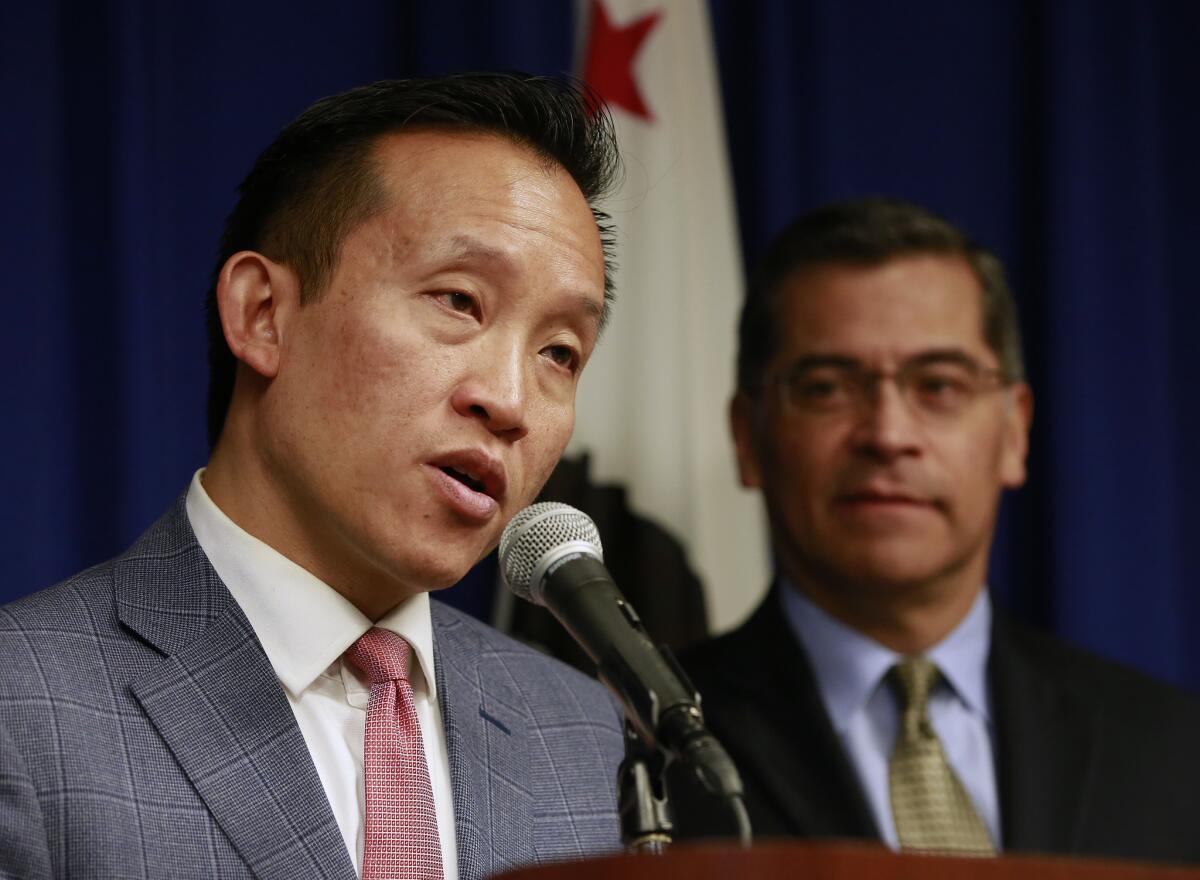
A Bay Area legislator is unveiling new legislation to provide major state funding for cities and counties to finance low-income housing, transit and other infrastructure.
Assembly Bill 3037 from Assemblyman David Chiu (D-San Francisco) would re-create a version of a program known as redevelopment that set aside billions of dollars in property taxes each year for local economic development and affordable housing. Gov. Jerry Brown and lawmakers eliminated that program in 2011 during the depths of the state’s budget crisis, arguing the effort was too costly and rife with abuses, such as money financing upgrades to luxury golf courses.
Chiu said lawmakers have learned from the previous program’s failures and that the new version will provide enough money to help local governments meet key state housing affordability and climate change goals while also adding greater accountability to the spending.
“This bill is about making a serious and lasting commitment to funding affordable housing and sustainable infrastructure,” Chiu said.
Under Chiu’s bill, which is expected to be formally introduced in the coming days, local governments will be able to sequester most of the new property taxes generated in a neighborhood they declare in need of additional investment. But there would be many strings attached:
- The state has to agree a local government’s plan would further California’s goals to reduce greenhouse gas emissions and that the state budget could support the new expenditures. The state would indirectly subsidize the program by repaying any property tax losses incurred by local school districts.
- At least 30% of the money has to be spent on low-income housing, and cities and counties have to pass anti-displacement policies to access the money.
- A local government has to agree to numerous auditing and record-keeping provisions, with major fines for non-compliance.
Brown has been hostile to previous attempts to revive redevelopment agencies. But Chiu said he hopes the governor would be willing to work on a new program while he still can shape it. Leading Democratic candidates to replace Brown next year have endorsed bringing back redevelopment in some form. More than half a dozen Democratic lawmakers from different parts of the state are co-authoring AB 3037, showing that there’s broad support for the idea, Chiu said.
“Everyone has been interested in figuring out a financing tool that would work best in all of the diverse areas across the state,” he said.
36 candidates are on the ballot in these California districts, and two of them will be heading to Congress
In theory, Democrats hoping to win back congressional control have two of their best shots in California, where two Republicans are retiring from racially diverse districts that have been trending against the GOP.
It’s actually a lot more complicated. There are 13 Democrats running to replace Reps. Ed Royce (R-Fullerton) and Darrell Issa (R-Vista) in the 39th and 49th congressional districts, and Democrats are panicked the top-two primary could prevent them from even making the November ballot. When Royce and Issa said they would head to the exits, that invited new candidacies from multiple Republicans, many with more experience than the Democratic contenders.
In a year when Democrats must flip 24 Republican House seats to reclaim the majority, every race counts. The California contests in Orange County and northern San Diego should be low-hanging fruit, since both districts chose Hillary Clinton for president in 2016. The crowded races and the top-two primary back the results far less certain.
California Senate leader Kevin de León appoints lawyer in the U.S. illegally to statewide post
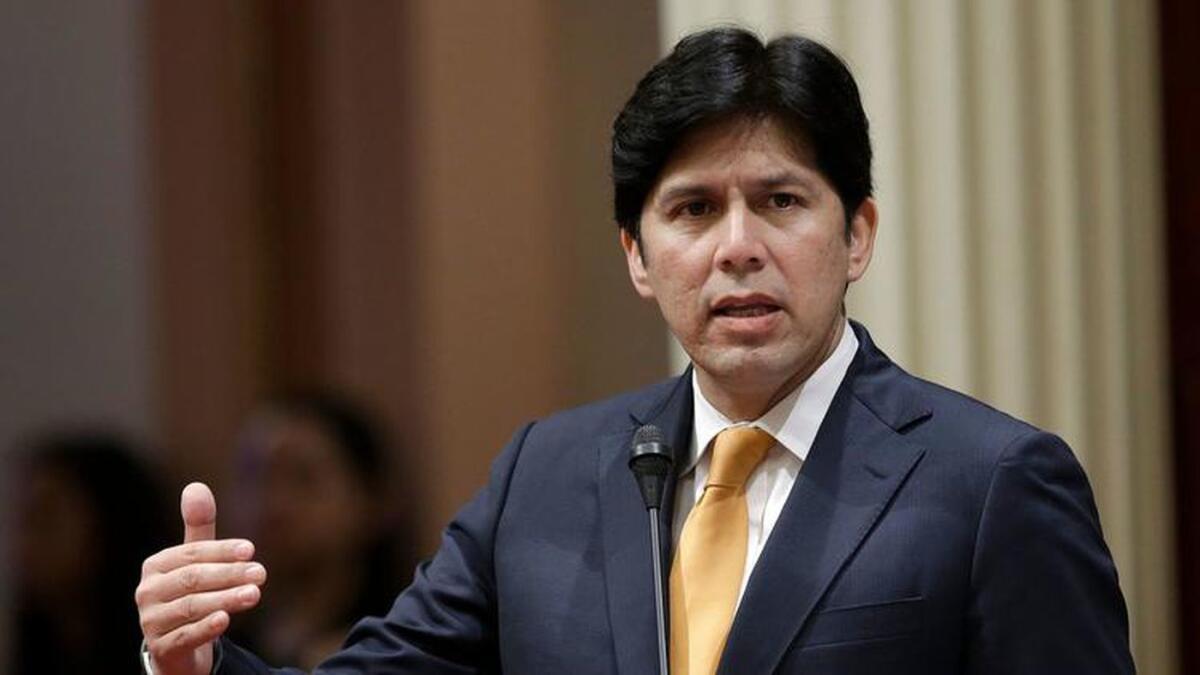
An attorney and immigrant rights activist is the first person living in the U.S. illegally to be named to a statewide appointment in the nation’s most populous state, California’s Senate leader announced Wednesday.
The Senate Rules Committee appointed Lizbeth Mateo to be an advisor on college access and financial aid.
Mateo is well-known for championing protections for people without legal authorization to live in the U.S. who were brought to the country as children. Senate President Pro Tem Kevin de León (D-Los Angeles) framed her appointment as a rebuke of President Trump’s immigration policies.
As a member of the Student Opportunity and Access Program’s Project Grant Advisory Committee, Mateo will advise the California Student Aid Commission to help low-income and marginalized people attend college. The position is not paid.
The Senate Rules Committee, which oversees such appointments, does not have a record of ever before confirming a person living in the country illegally to a statewide position, according to De Leon’s office.
Mateo, 33, was born in Mexico and came to California with her parents at age 14. She was the first person in her family to earn a college degree. She now has her own law office in Los Angeles.
“I hope to be able to draw from my own experiences as an undocumented, first generation college graduate,” she said in a statement. “I have no doubt that California can do more for all underrepresented students, especially in regions with low college participation rates, and I appreciate the opportunity to be able to help in any way I can.”
De León announced Mateo’s appointment the day after Trump visited California to view prototypes of his proposed border wall and a week after the U.S. Justice Department sued the state over policies that limit cooperation with federal immigration authorities. Democrats who run California’s government, including De León, vehemently oppose the wall and Trump’s conservative stance on immigration.
Mateo’s appointment comes as the U.S. Congress is struggling to reach an agreement about the Deferred Action for Childhood Arrivals program, which grants temporary protected status to people living in the country illegally who came to the U.S. as children. The program’s future is uncertain after Trump attempted to cancel it last year and tasked Congress with reauthorizing it.
Although she isn’t a DACA recipient herself, Mateo has been a vocal advocate of protections for young immigrants. She was among the most prominent activists to call for passage of the DREAM Act, which would have provided similar protections to DACA but was never passed by Congress.
Assemblyman Travis Allen, a Republican from Huntington Beach, criticized the appointment.
“This is an insult to every California citizen and legal resident,” he said in a statement. “The California Democratic Party now prioritizes illegal immigrants over California citizens.”
But De León said Mateo embodies California values.
“Ms. Mateo is a courageous, determined and intelligent young woman who at great personal risk has dedicated herself to fight for those seeking their rightful place in this country,” he said in a statement.
California Democratic Party chairman challenges Tony Mendoza’s ballot designation as ‘state senator’

The chairman of the California Democratic Party has asked the secretary of state to reject Tony Mendoza’s ballot designation as “state senator,” saying it is misleading because Mendoza resigned from the Senate last month under threat of expulsion over sexual harassment allegations.
Party Chairman Eric Bauman said in a letter released Thursday that “law and common decency dictate” that Mendoza, a Democrat from Artesia, should be required to describe himself another way on the ballot.
Mendoza is running to reclaim the 32nd Senate District seat in a special election June 5 for the last six months of the current term, and for a new four-year term.
The secretary of state, Bauman wrote, is required by law to determine whether ballot designations are accurate.
“Under this standard, Mr. Mendoza’s proposed ballot designation is clearly misleading and would deceive the public into believing that he is running for reelection as the incumbent officeholder,” Bauman wrote, adding it would be “an affront to the voters” and staffers mistreated by Mendoza.
An investigation by outside attorneys hired by the Senate found it was likely that Mendoza made unwanted advances toward six women during his tenure as a lawmaker, including four women who worked as his staffers.
The Secretary of State’s Office is “reviewing Mr. Mendoza’s proposed ballot designation, just as we review all ballot designations proposed by candidates for state or congressional office,” according to Sam Mahood, a spokesman for the agency.
Top Democrats split with state party in race against Rohrabacher
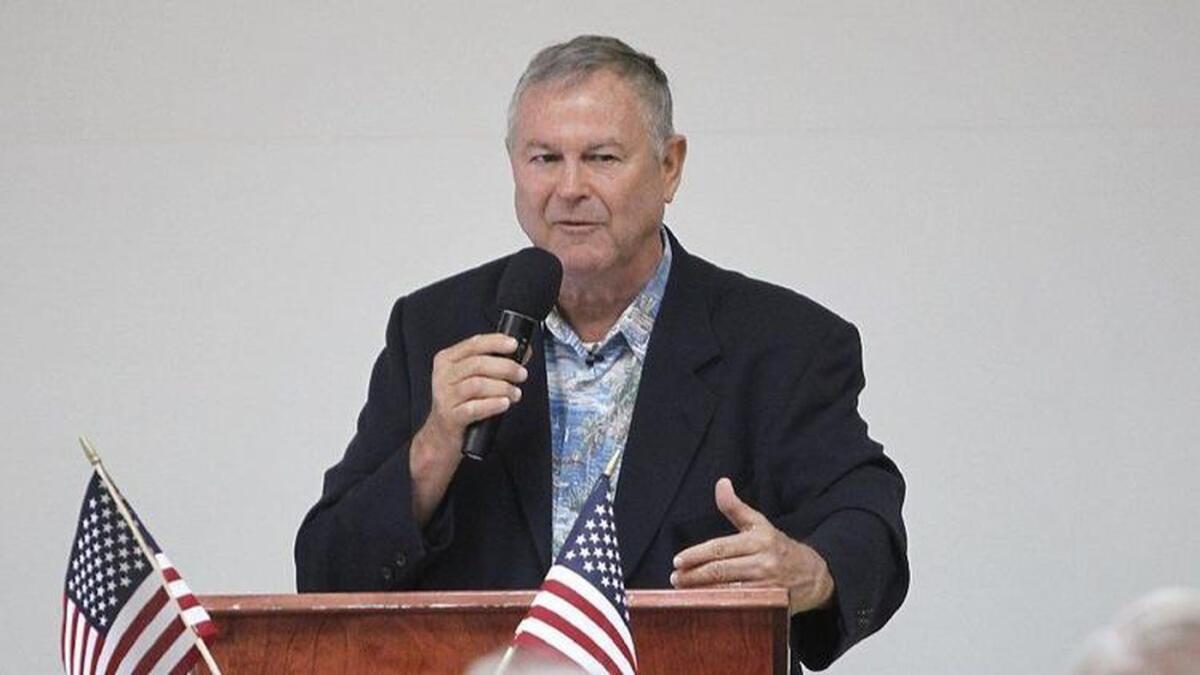
Three congressional Democrats who represent Orange County are endorsing Harley Rouda in the race against Republican Rep. Dana Rohrabacher.
Reps. Lou Correa, Alan Lowenthal and Linda Sanchez, who is also vice chair of the Democratic caucus, all announced their endorsement of Rouda on Thursday morning.
In a statement, Sanchez said Rouda “represents the best choice to move California’s 48th Congressional District forward.”
It’s a notable break from the California Democratic Party, which officially endorsed Hans Keirstead at its convention last month. Rouda and the other candidates made an eleventh-hour attempt to block him from getting the endorsement but failed.
In the days leading up to the convention, the campaign had gotten increasingly nasty, with Rouda running ads highlighting unflattering news coverage of Keirstead.
The endorsements from the three Democrats in Congress who represent Orange County constituents signal that Democrats may not be ready to unite behind Keirstead, even after he received the state party’s nod. Democratic leaders in California had been trying to narrow wide fields of candidates in several of the competitive House races here, for fear that the top-two primary could shut them out and advance two Republicans instead.
While the 48th Congressional District has been less of a concern in that respect, the late entry of well-known Republican and former Orange County party chair Scott Baugh has stoked fears that he and Rohrabacher could end up on the ballot in November. If that happens, it means Democrats will lose a prime pickup opportunity.
California needs new laws to boost earthquake safety, assemblyman says
A Los Angeles lawmaker says California needs new statewide laws that boost earthquake safety, and wants to toughen rules on how strong new buildings should be and require cities to identify buildings at risk of collapse.
Assemblyman Adrin Nazarian (D-North Hollywood) said the bills are important for keeping California functioning after a major earthquake.
California’s construction requirements are so minimal that even a new building can be legally built to a weakness that would leave it severely damaged in an earthquake — so much that it would have to be torn down, Nazarian said.
Former state Controller Steve Westly decides not to run for California governor despite speculation
With hours left before filing deadline, another Democrat drops out of race to replace Ed Royce
Where were California GOP candidates Tuesday? Not with Trump

President Trump vowed earlier this year to stump for Republicans in competitive House races, saying he would spend “probably four or five days a week” helping GOP candidates get elected. As he made his first visit to California, a state with several seats in play, few Republicans seemed interested in taking him up on his offer.
A presidential visit in an election year often comes with an entourage of local officials and candidates hoping to catch a photo op or ride his coattails. But in Southern California, a hotbed of the left’s resistance out West that could prove crucial in the midterms, many aren’t eager to appear with Trump.
Breaking with tradition, no members of Congress traveled to California on Air Force One. When Trump arrived in San Diego on Tuesday morning, he was met at different points by retiring Rep. Darrell Issa (R-Vista) and the other Republican congressman from the area, Rep. Duncan D. Hunter of Alpine.
The Times asked more than a dozen Southern California GOP candidates if they would attend events with Trump. Most of them either did not respond or said they had no plans to join the president.
“I can 100% assure you that he will not be at any Trump events this week, fundraisers or otherwise,” said Brooke Borcherding, a campaign spokeswoman for Assemblyman Rocky Chavez of Oceanside, a moderate Republican running for Issa’s seat. Borcherding said Chavez’s absence is both a deliberate choice and an indication of his demanding schedule “being out in the community, talking to voters.”
California legislators join student protests over gun laws
More than 30 California state lawmakers walked out of the Capitol on Wednesday morning to support national student protests for stricter gun laws.
The legislators, joined by staff members and young people, stood in silence for 17 minutes in homage to the 17 people who lost their lives at Marjory Stoneman Douglas High School in Parkland, Fla., last month.
“Today’s actions in silence were the loudest advocacy for gun control in the history of America,” said Assemblyman Reggie Jones-Sawyer (D-Los Angeles) after the protest.
Jones-Sawyer, who is chairman of the Assembly Public Safety Committee, said lawmakers wanted to show solidarity with students across the country and pledged to strengthen the state’s gun control laws.
“We’ve done a lot in California, but it looks like we haven’t done enough,” he said.
State lawmaker unveils proposal to preserve net neutrality in California
A state senator on Wednesday unveiled his full proposal to restore net neutrality in California, a set of rules to prevent internet service providers from manipulating or hindering access to online content.
The latest version of Senate Bill 822 by Sen. Scott Wiener (D-San Francisco) would bar broadband companies doing business in the state from blocking, throttling or interfering with a customer’s internet access based on the nature of the content or type of service. It also would prevent providers from varying speeds between websites, or charging customers additional fees for their services to reach more people.
“An open internet is essential to maintaining our democracy, growing our economy, protecting consumers, and preserving critical health, safety and energy services,” Wiener said in a statement. “ISPs must not be allowed to decide who can access what websites or applications.”
His legislation is one of two bills introduced by California state lawmakers this year in hopes of reviving federal net neutrality regulations. The Federal Communications Commission voted to roll back those rules in December. A proposal by Senate President Pro Tem Kevin De León (D-Los Angeles) would task a state agency with establishing new regulations.
Wiener said he proposed his own set of rules after meeting with civil rights and privacy advocates, public policy experts, former state and federal communications commissioners and business leaders. He said he and his staff also met with leaders working to enact net neutrality in other states.
Lobbyists representing industry groups and major wireless companies — including AT&T, T-Mobile and Sprint — oppose both proposals, saying state net neutrality legislation would create an uneven patchwork of laws nationwide.
Still, since the FCC vote, states and cities across the country have sought their own ways to ensure companies maintain neutral access to the internet. A governor’s order made Montana the first state to prevent companies from receiving state contracts if they interfere with internet traffic or give advantages to higher-paying sites or apps.
Washington and Oregon have put forth legislation of their own. But none go as far to establish net neutrality as the proposed California legislation because lawmakers here aim to enshrine all of the 2015 rules in state law, said Barbara van Schewick, a professor at Stanford Law School.
Wiener’s legislation also goes further, she said. It bars economic discrimination, such as zero-rated data plans, which exempt some data from counting against a customer’s data plan. It also prevents internet service providers from engaging in misleading marketing practices and paid prioritization, which occurs when a company favors certain data in exchange for compensation.
Other states “just copied some of the rules,” Schewick said.
Single-payer healthcare would take years to develop in California, legislative report says
As progressive activists clamor for California to push ahead a sweeping single-payer health plan, a legislative report released Tuesday cautioned that such an overhaul would take years.
The report, which marks the end of months of Assembly hearings on paths to achieving universal healthcare, lays out a number of options lawmakers can pursue in the near term to improve how Californians get and pay for healthcare.
The report estimated that a healthcare overhaul that would cover all Californians under one system with public financing — including those who are insured through their employer and Medi-Cal or Medicare — would probably be a multiyear process to determine what kind of benefit would be provided. It would include how the system would be paid for, how to overcome state constitutional hurdles and how to obtain necessary permission from the federal government.
“The combination of all those factors led us to think it could not happen tomorrow, even if there were complete consensus in the state” to enact such a policy, said Richard Kronick, a professor of family medicine at UC San Diego and one of three authors of the report.
The findings underscore the key tension in the debate over California’s healthcare future and, specifically, Senate Bill 562, which aims to establish a statewide single-payer program. Claiming momentum and urgent need, proponents want the bill released from legislative purgatory this year.
But Assemblyman Jim Wood (D-Healdsburg), who is co-chair of the Assembly panel on universal healthcare, said the complexity of the current system meant legislators should proceed with caution.
“You can’t just cast this all aside and start over,” Wood said. “That’s why, for me, the idea of short-term things that we could do and a long-range plan is really, really appealing. I think it’s the most realistic way to get us to where we want to be.”
Bonnie Castillo, executive director of the California Nurses Assn., which sponsored SB 562, said the report was a “public disservice” by being dismissive of their proposal.
“The report inflates the obstacles to single payer, all of which are a reflection of lack of political will, the kind of political will California has demonstrated when it wants to in pushing for environmental protections, a gas tax, a carbon tax, a highway system, a world-renown public university system, and other examples,” Castillo said. “Why is the health of Californians such an irrelevant priority to California policymakers?”
The more immediate policy options include expanding Medi-Cal to cover people without legal immigration status, using state money to increase subsidies for those buying insurance on the Covered California exchange and increasing Medi-Cal payments to doctors as a way to increase access to care.
Castillo derided those recommendations as “a deceptive façade, pretending to address the problem, but not solving it.”
The co-chairs did not commit to specific legislation based on the report’s findings but noted they had introduced “spot bills” that could eventually serve as vehicles to enact some of the policy suggestions.
“I would expect multiple proposals that are referenced [as short-term options] will find a place within legislation this year,” said Assemblyman Joaquin Arambula (D-Fresno), also a co-chair of the committee.
California lawmaker proposes a new gun and ammunition fee to pay for school counselors and safety officers
Californians who buy guns or ammunition would have to pay a new fee to fund more counselors and safety officers at schools under legislation proposed in response to the recent mass shooting at a Florida high school.
Assemblyman Jim Cooper (D-Elk Grove) said his bill would strengthen counseling support at California’s 1,400 middle schools and junior high schools while providing more armed school resource officers at high schools.
“It sickens me to think about all the kids who have lost their lives in the school shootings that are plaguing our country,” Cooper said in a statement on Tuesday. “Arming teachers is not good public policy and shouldn’t be considered.”
The bill follows a shooting last month that left 17 dead at Marjory Stoneman Douglas High School in Parkland, Fla.
California school resource officers are already armed, state-certified law enforcement officers and assigned to a number of high schools. The new fee, the amount of which has not yet been decided, would allow more high schools to decide whether they want a safety officer on campus. The bill would not require such officers at schools. In addition, counselors at middle schools would not be armed.
Budget cuts during California’s recession led many school districts to reduce the number of counselors. Providing additional counselors would address concerns raised in a 2004 report by the U.S. Department of Education that looked at 37 incidents of school violence, Cooper said, finding nearly three-quarters of attackers felt bullied, threatened, attacked, or were injured prior to the incident.
The new fee on the sale of all firearms and ammunition would begin Jan. 1 under the bill introduced in the state Assembly.
“I believe that strengthening support services and counseling for students is critical and can help aid and support kids, helping keep them and their peers’ safe,” Cooper said, adding the bill would also be “providing counselors an opportunity to identify potential threats and help prevent school tragedies.”
Citing concern over top-two primary, Democrat drops out of race for Rep. Ed Royce’s congressional seat ahead of filing deadline
On the eve of Trump’s visit, state lawmaker proposes cutting tax breaks for companies that help build border wall
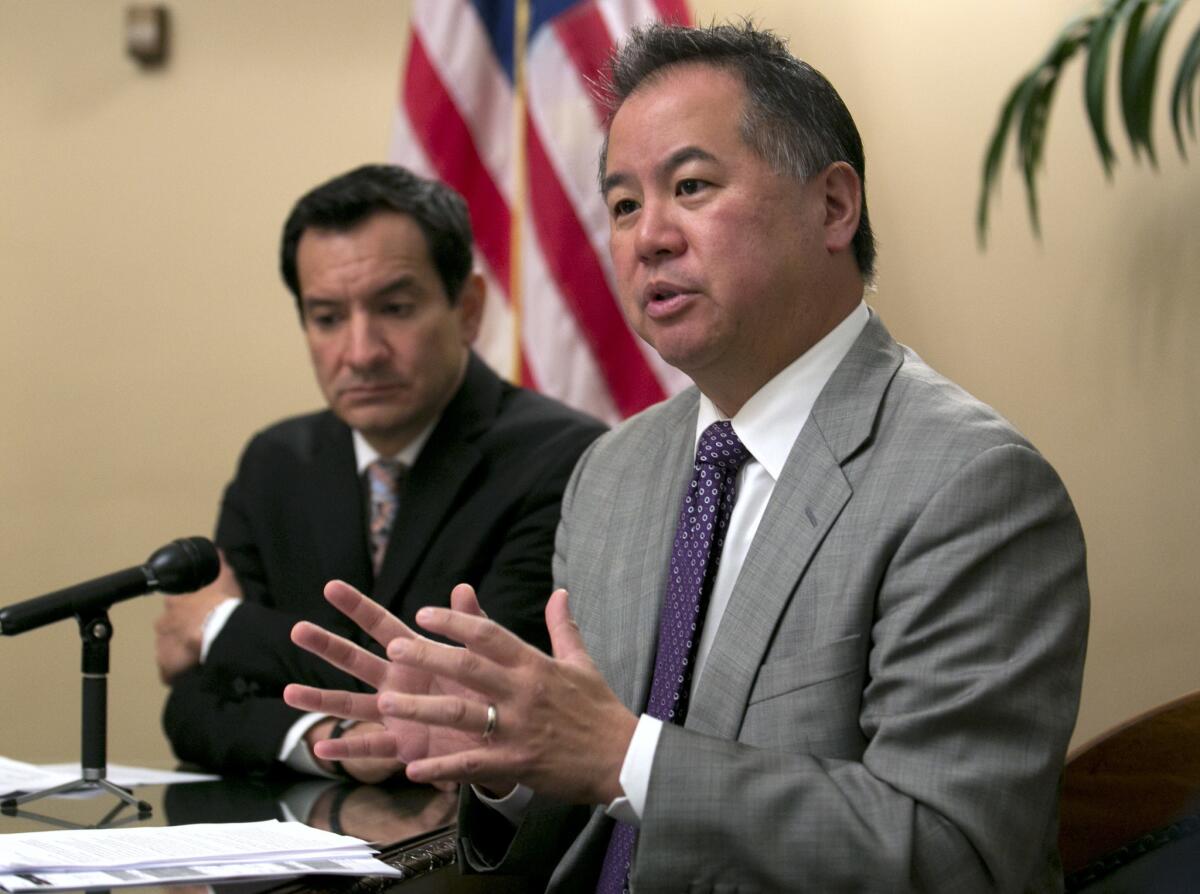
On the eve of President Trump’s first visit to California since he took office, a state lawmaker says he wants to deny state tax breaks to companies that contract or subcontract to build the proposed wall along the U.S.-Mexico border.
Assemblyman Phil Ting (D-San Francisco), who wields substantial influence in the creation of state tax policy as Assembly budget committee chairman, has been among the vocal opponents to the border wall, calling it counterproductive to the state’s economic growth and “a symbol of weakness and hate to the world.”
He plans to present his proposal to an Assembly committee on Monday, and the bill is expected in print next week. It would prevent companies that profit from the wall’s construction from receiving some tax credits, such as those given for hiring new employees, buying or using certain manufacturing and research equipment or for promoting alternative energy and advanced transportation.
Trump is expected in San Diego on Tuesday to inspect prototypes for the wall. Ting’s proposal has been one of several attempts to slow or stop its construction in a state that has billed itself as home to a resistance movement against Trump’s hard-line immigration policies.
California Atty. Gen. Xavier Becerra in September filed a lawsuit alleging that Trump’s proposal to expedite construction of the wall violates laws protecting the environment, though legal experts have said such challenges face a slim chance of success. Another pending bill by state Sen. Ricardo Lara (D-Bell Gardens) would ban state government contracts for any company that helps build the wall.
Ting, Assemblyman Eduardo Garcia (D-Coachella) and Assemblywoman Lorena Gonzalez Fletcher (D-San Diego) introduced separate legislation last year that would require California’s pension funds to divest from any company involved in the creation of the barrier. It died in committee.
Ting said lawmakers need to address the concerns of Californians: A September 2017 poll from the Public Policy Institute of California found 73% of all adults in the state oppose a wall along the border with Mexico.
“California builds bridges not walls,” Ting said. “At a time when we need critical infrastructure, spending $20 billion on a wall that won’t work is a waste of taxpayer money.”
Assemblywoman Shirley Weber agrees to $4,000 fine for campaign finance reporting violations
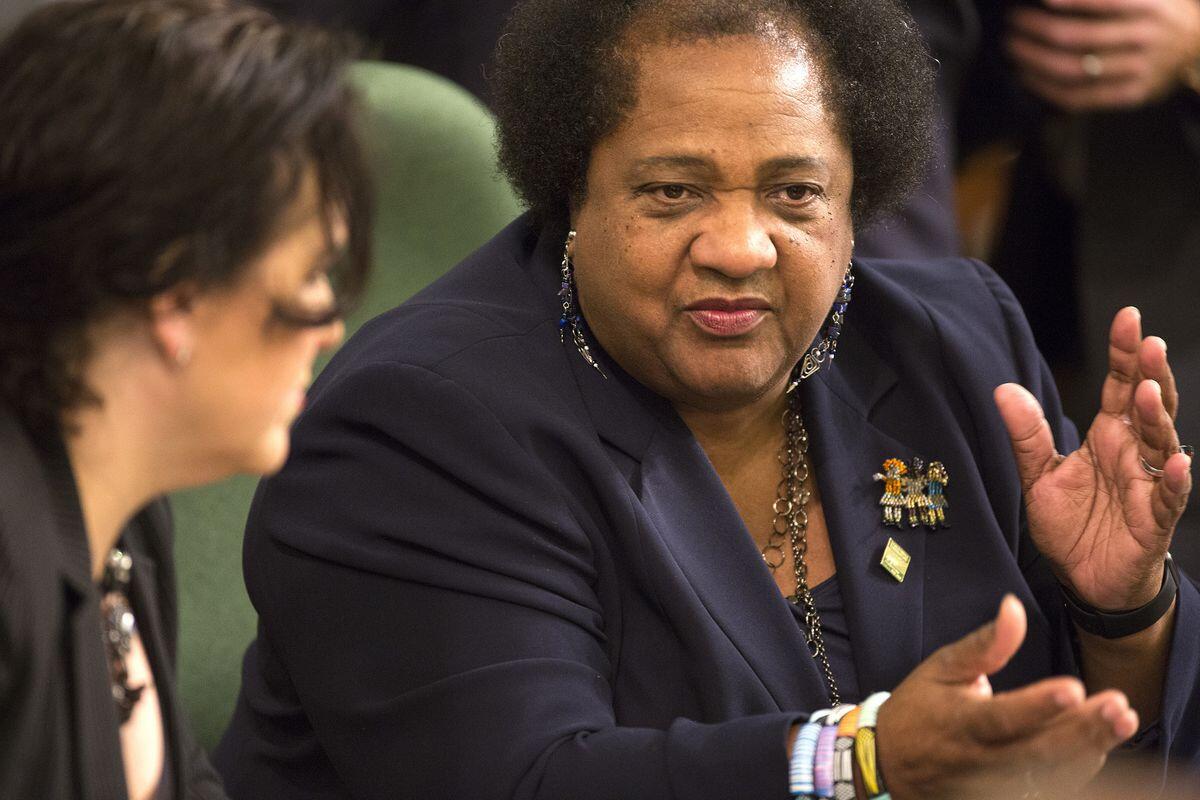
Assemblywoman Shirley Weber (D-San Diego) has agreed to pay $4,000 in fines to the state’s campaign watchdog agency for failing to properly disclose contributions made and received by her 2014 campaign for the Legislature, according to documents released Monday.
Weber didn’t immediately report an $8,200 contribution to her campaign from the United Domestic Workers of America Action Fund and did not report, within 24 hours as required, five other contributions that happened close to the election, including $34,000 her campaign gave to the California Democratic Party, according to an investigative report by the state Fair Political Practices Commission.
“The public harm inherent in the failure to file 24-hour reports is that the public is deprived of important, time-sensitive information regarding political contributions and expenditures,” said the FPPC report. “In the case of 24-hour reports, the reportable activity is meant to be disclosed to the public before the election.”
The violations were inadvertent, according to Xavier Martinez, the treasurer for Weber’s campaign.
“In this case, the enforcement division did not find evidence of intentional concealment or deception. Rather, it appears the violations were the result of negligence,” said the report by the commission’s enforcement staff, which recommended the fines. The recommendation will be considered for approval by the commission at its meeting March 22.
California attorney general ordered to rewrite description of cap-and-trade cash plan, Proposition 70
The official title for Proposition 70, a ballot measure laying out rules for future climate change revenues collected by the state, must be rewritten after a Sacramento judge agreed with a Republican lawmaker that voters in June would otherwise be misled.
Assemblyman Chad Mayes (R-Yucca Valley) filed the lawsuit last week calling the ballot title “both wrong and highly prejudicial” for the proposed amendment to the California Constitution. Mayes was the GOP leader of the Assembly during last year’s negotiation over extending the state’s cap-and-trade program, which passed the Legislature with support from eight Republican lawmakers.
Proposition 70 would require the Legislature to take a one-time vote in 2024 on how revenues collected from cap-and-trade are spent. Those dollars come from companies that pay money for any emissions beyond the “cap” imposed by state regulators. Revenues collected from those emission allowances have added up to almost $5 billion to date. The spending plan would require a supermajority vote in both the state Senate and Assembly.
The ballot title written by state Atty. Gen. Xavier Becerra suggested to voters that Proposition 70 would have a negative impact on the environment. That title was “Limits Legislature’s Authority To Use Cap-and-Trade Revenue To Reduce Pollution.”
“Proposition 70 in no way changes the purposes for which the funds can be used,” Mayes wrote in a legal brief filed last Friday.
Sacramento Superior Court Judge Allen Sumner agreed with Mayes and ordered that the title should be changed. The Monday ruling instructs Becerra and state elections officials to change Proposition 70’s title to “Requires Legislative Supermajority Vote Approving Use of Cap-and-Trade Reserve Fund.”
The ruling comes as a number of Democrats are lining up to defeat Proposition 70, even though Gov. Jerry Brown and the party’s legislative leaders voted for the ballot measure last summer. Brown has also signed the official argument in support of the proposition that will appear in the statewide voter information guide.
Critics have long suggested the duty of writing titles and summaries for statewide ballot measures would be better handled by the nonpartisan Legislative Analyst’s Office. Becerra, who was appointed in December 2016 to replace Sen. Kamala Harris, told legislators during his confirmation hearings that he believed in fairness when it comes to writing the ballot summaries.
“I know many of you will be reading over my shoulders,” Becerra told assembly members in January 2017. “And I understand the importance of a word.”
Former House Speaker Newt Gingrich endorses John Cox in governor’s race
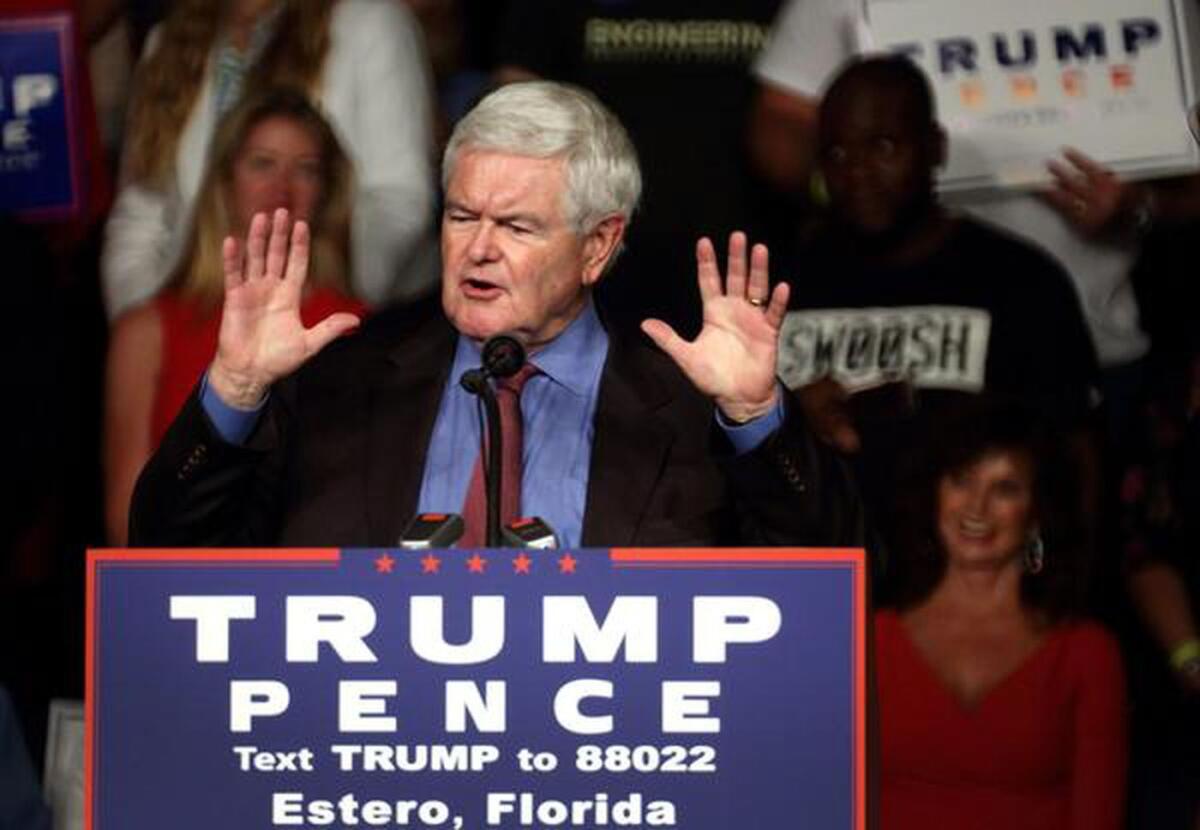
Former House Speaker Newt Gingrich endorsed John Cox’s California gubernatorial campaign on Monday.
“As a lifelong conservative and taxpayer advocate, John Cox will put California on the road back to lower taxes, fiscal accountability and individual liberty,” Gingrich said in a statement. “He is the person we need to rescue California from decades of radical, left-wing policies.”
Gingrich, who unsuccessfully ran for president in 2012 and is an ally of President Trump, is the most prominent Republican to endorse a GOP candidate in the race to replace Gov. Jerry Brown.
Gingrich served in Congress for 20 years and was the architect of the GOP takeover of the House in 1994, ending four decades of Democratic control.
Matt Shupe, a spokesman for Cox, said Gingrich planned to take an active role in the campaign, with fundraising and a possible visit to the state.
Cox, a Rancho Santa Fe businessman, is one of two prominent Republican candidates. He has a fundraising edge over Assemblyman Travis Allen, but both men lag in the polls behind their Democratic rivals. California has a top-two system, meaning if the Republicans don’t place first or second in the June 5 primary, they won’t be on the ballot in the general election.
Artificial intelligence can transform industries, but California lawmakers are worried about your privacy
The use of bots to meddle in political elections. Algorithms that learn who people are and keep them coming back to social media platforms. The rise of autonomous vehicles and drones that could displace hundreds of thousands of workers.
The “robot apocalypse” that some envisioned with the rise of artificial intelligence hasn’t arrived, but machine learning systems are becoming part of Californians’ everyday lives, tech experts told state lawmakers in Sacramento last week. As use of the technology becomes more widespread, so will the challenges for legislators who will have to grapple with how and when they should step in to protect people’s personal data.
“AI might be over-hyped, but it is here to stay,” said Olaf Groth, an international business professor at UC Berkeley. “We are indeed at the threshold, at the moment, between AI being a new development that promises significant growth in the economy, and AI also causing significant disruptions in society.”
Gov. Jerry Brown urges Trump to ‘come aboard’ efforts to build bullet train while visiting California
Seeking to capitalize on President Trump’s pledges to focus on the nation’s infrastructure, Gov. Jerry Brown is urging the president to consider California’s high-speed rail efforts as part of his first official visit to the Golden State.
“You have lamented that ‘we don’t have one fast train’ in our country,” Brown wrote in a Monday letter to Trump. “Well, Mr. Trump, in California we are trying to fix that. We have a world-class train system under construction. We invite you to come aboard and truly ‘Make America Great Again.’”
Trump’s visit on Tuesday is scheduled to focus on a review near San Diego of prototypes for his promised border wall, followed by a Beverly Hills fundraiser for the Republican National Committee. A spokesman for Brown said the governor is not planning to greet the president on his arrival or accompany him on the border wall inspection.
But the Democratic governor, who last week lashed out at the Trump administration for filing a lawsuit against California’s new immigration laws, is seeking to capitalize on the presidential visit for a chance to pitch the beleaguered train project. Last week, officials at the agency responsible for building the bullet train system released a new business plan that raised the cost to at least an estimated $77.3 billion.
“I invite you to head north to the Central Valley — the heart of California,” Brown wrote. “Here in cities like Fresno and Madera more than a dozen bridges and viaducts are being built for the nation’s first and only High-Speed Rail line.”
Brown’s letter, which also noted the history of past inaugural presidential visits to California, took aim at the central premise of Trump’s promise to crack down on illegal immigration.
Reminding the president of the state’s creation of almost 3 million jobs since the recession, Brown wrote that “our prosperity is not built on isolation.”
“Quite the opposite,” the governor wrote to Trump. “California thrives because we welcome immigrants and innovators from across the globe.”
Villaraigosa is right, single-payer healthcare in California is a political pipe dream
Antonio Villaraigosa thinks he has a solid weapon to hammer Lt. Gov. Gavin Newsom with as they run for governor. And he probably does.
It’s Newsom’s strong support for creating a state-run, single-payer health insurance program.
That may sound too wonky and eye-glazing for use as campaign ammunition. But it could get attention if more voters learn that the current single-payer bill pending in the Legislature would require a dramatic doubling of state taxes plus Sacramento taking over popular federal Medicare.
Republicans who could run a competitive race are taking a pass on ousting Feinstein
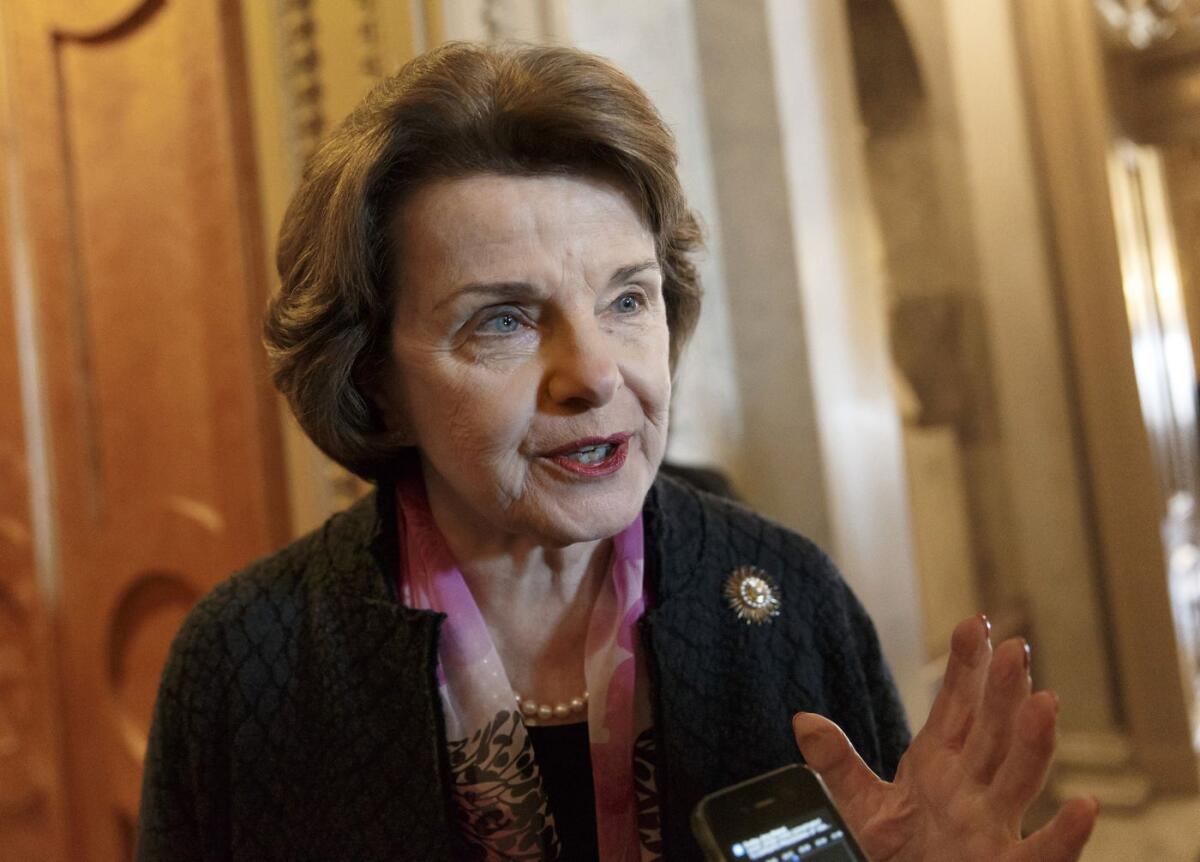
The deadline came and went, and no prominent Republicans filed to run against Democratic Sen. Dianne Feinstein, meaning for the second election in a row there will be two Democrats facing each other in a race at the top of the ballot in California.
Feinstein, 84, is seeking her fifth full term. She will have 31 opponents on the June 5 primary, with one serious contender, a Democrat, taking most of her attention and showing up in polls.
California has a top-two primary system, which means the top-two vote-getters advance to the general election, regardless of party. In 2016, a handful of Republican candidates in the top of the pack split the GOP vote, and sent then-Rep. Loretta Sanchez, a Democrat, to the general election with Democrat Kamala Harris, who won the race. It was the first time two Democrats ran against each other statewide.
The senator had $10 million in the bank as of Dec. 31.
Senate leader Kevin de León of Los Angeles, who is running against Feinstein, had raised about $360,000 through the end of last year and has struggled to match the name recognition brought by Feinstein’s quarter-century in the public eye. He did manage to prevent the California Democratic Party from endorsing Feinstein, thanks in part to his embrace of progressive activists frustrated by Feinstein’s moderate nature.
Republicans weren’t able to recruit a candidate with statewide name recognition, despite concerns that the lack of a standard bearer at the top of the ticket could keep GOP voters from turning out in November. Depressed turnout could hurt the party’s chances of holding crucial congressional seats. Polls also suggest no Republican will make it to the top-two in the governor’s race, although two better-known candidates are trying to prevail.
Democratic candidates are flooding the ballots even in solidly Republican California districts
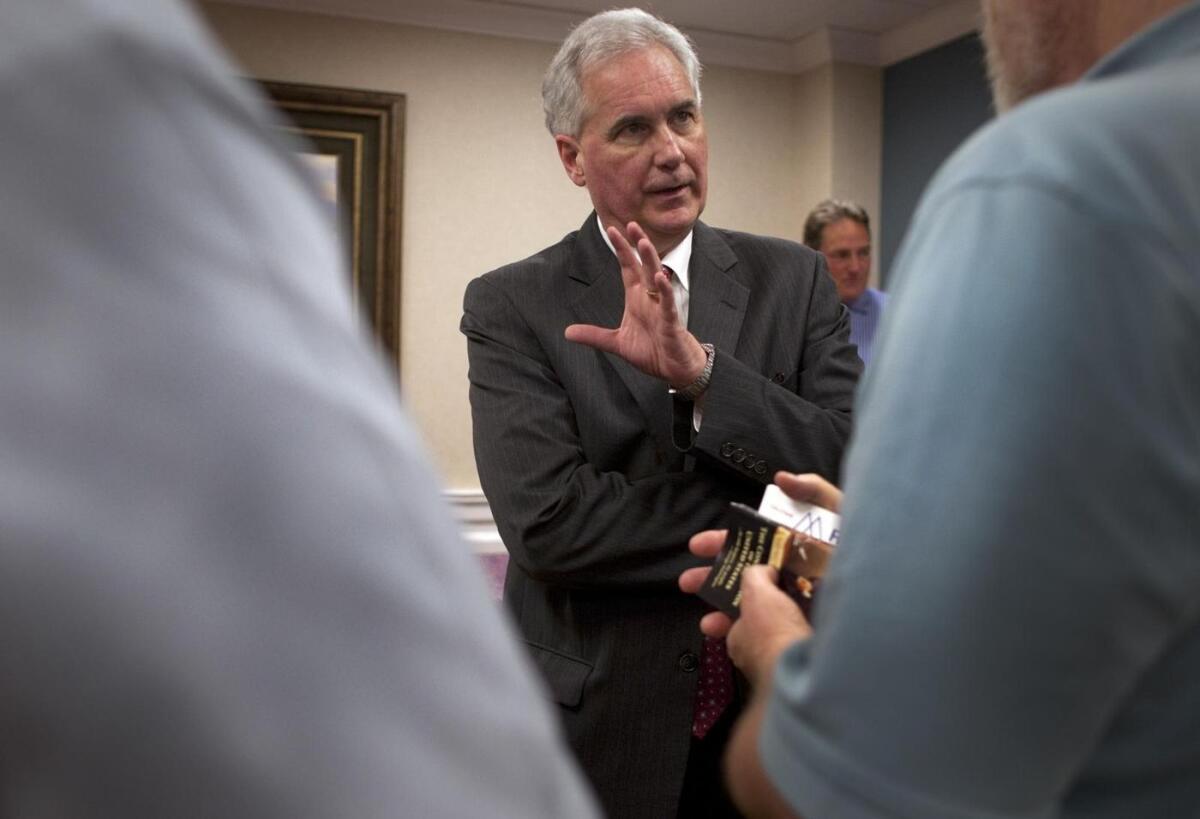
Democrats may have added both the 4th and 22nd congressional districts to their California target list, but they face an uphill battle where Republicans hold a large voter registration advantage and where President Trump won by a large margin. Still, several candidates are banking on a wave election to attempt to oust sitting Republicans.
Rep. Tom McClintock’s 4th Congressional District wasn’t initially on the radar, but unexpectedly strong fundraising by two Democrats prompted Times editors to recently add the race as No. 10 on the ranking of the most competitive House races.
Local Democrats have been particularly enthusiastic about their chances, and five people have filed to run against McClintock, 61, a conservative fifth-term congressman who lives in Elk Grove.
They are:
Democrat Jessica Dawn Morse, 36, of Pollock Pines, who worked for the State Department in Washington and U.S. Pacific Command in Hawaii.
Democrat Regina Bateson, 36, of Roseville, who formerly was a political science professor at MIT. She also previously worked as a foreign service officer.
Morse and Bateson both outraised McClintock in the last three months of 2017.
Democrat Roza Calderon, 33, of Granite Bay, who fled violence in El Salvador as a child. A longtime local activist, she ran a geographic mapping company before starting the campaign.
Democrat Robert A. Lawton, 51, a businessman from Coarsegold who is the founder and CEO of Crowdsource Studios.
Republican Mitchell White, 27, an accountant who left Ernst & Young to run for Congress.
House Select intelligence Committee Chairman Devin Nunes, controversial for his role in the investigation into Russian interference in the 2016 election, has drawn five opponents in his reliably Republican Central Valley district, which is ranked No. 9 by The Times.
Most prominent among them is Fresno County Deputy Dist. Atty. Andrew Janz, 33, of Fresno, who has shown lackluster fundraising in the last few months, especially considering Nunes, 44, is sitting on a $3.6-million warchest.
Also running are Democratic community health center manager Bobby Bliatout, 41, of Fresno; Libertarian Bill Merryman, 33, of Fresno; and Brian Carroll, 69, of Visalia, a junior high school history teacher running as an American Solidarity Party candidate.
ALSO
These are the candidates running against vulnerable congressional Republicans in the Central Valley
Here are the challengers who signed up for the tough task of trying to unseat California’s House Democrats (in 2018, at least)
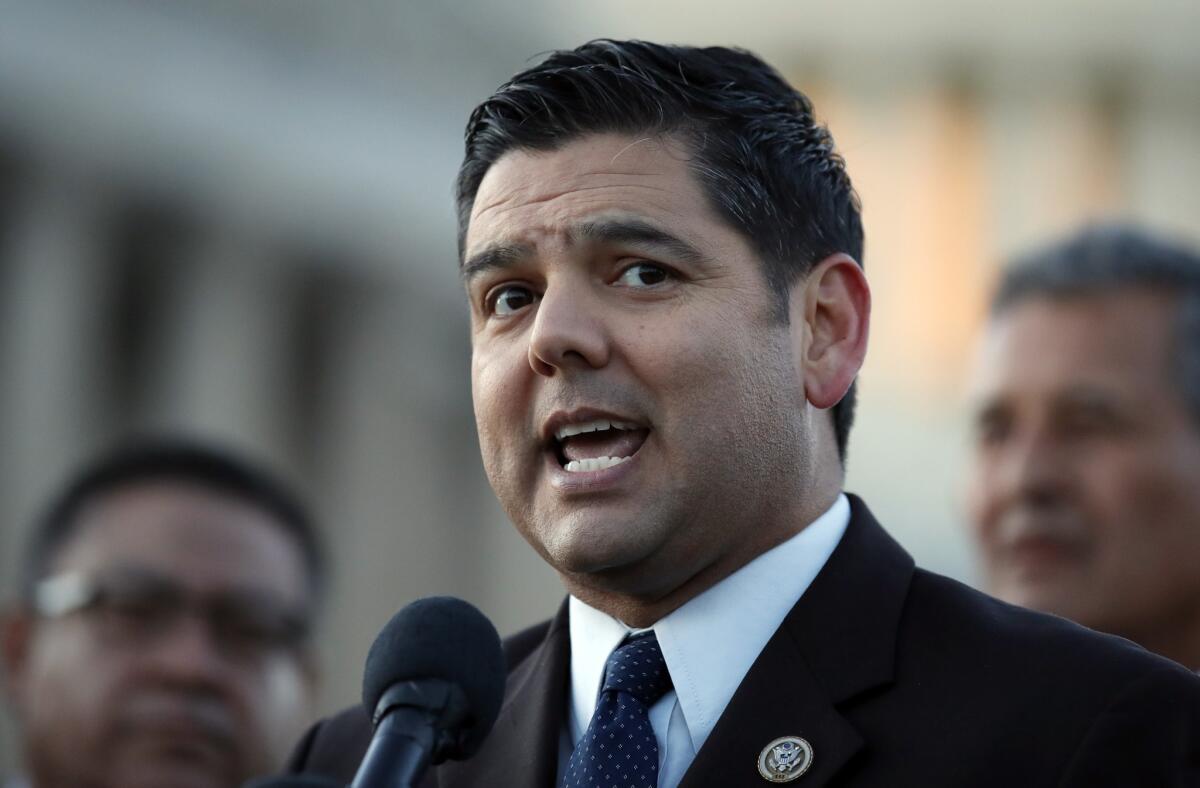
Republicans are going to be largely on the defensive this year in California’s House races, defending 10 of their 14 seats, seven of which were won by Hillary Clinton in 2016.
There are some swing districts where Republican challengers are attempting to make gains and where the GOP will invest resources, however unlikely the chances of ousting a Democrat this fall.
Here’s a look at who has filed to run in each district. The list still needs to be finalized by the Secretary of State.
7th Congressional District
Rep. Ami Bera is in his third term in this Sacramento County swing district and won reelection by a close 51%-49% margin in 2016 amid a scandal in which his father was convicted of making illegal donations to Bera’s campaign. This year, none of Bera’s Republican challengers have demonstrated strong fundraising ability. The congressman is a physician and former UC Irvine Medical School professor.
Here are the candidates who have submitted their papers:
Bera, Democrat, ballot designation pending
Yona Barash, Republican, ballot designation pending (oncologist and attorney)
Reginald H. Claytor, no party preference, ballot designation pending (aerospace employee)
Andrew Grant, Republican, ballot designation pending (businessman and Marine Corps veteran)
Robert Christian “Chris” Richardson, Green Party, ballot designation pending (nonprofit executive)
24th Congressional District
Freshman Rep. Salud Carbajal won election here in 2016 with 53.4% of the vote. This is a perpetual swing district that runs along California’s Central Coast and includes Santa Barbara, San Luis Obispo and a tiny portion of Ventura counties. Forty percent of voters are Democrats, 31% are Republicans and 23% are unaffiliated.
How the ballot will look:
Carbajal, Democrat, ballot designation pending
Justin Fareed, Republican, ballot designation pending (executive of medical device manufacturer)
Fareed ran in the 24th in 2014 but failed to make the runoff. In 2016, he lost to Carbajal but received 46.6% of the vote.
Michael Erin Woody, “Business Owner/Engineer”
36th CONGRESSIONAL DISTRICT
Rep. Raul Ruiz, an emergency room physician, is in his third term in this Riverside County district that includes Palm Springs and stretches across the desert to the Arizona border. He won reelection in 2016 with 62% of the vote.
How the ballot will look:
Ruiz, Democrat, “Congressman/Emergency Physician”
Dan Ball, Republican, “Television Journalist/Realtor”
Robert Bentley, Republican, “Software Developer”
Douglas Hassett, Republican, ballot designation pending
Kimberlin Brown Pelzer, Republican, ballot designation pending (actress and avocado farmer)
Stephan J. Wolkowicz, Republican, “Financial Accountant”
Wolkowicz previously ran in 2016, receiving 10% of votes and failing to make the general election.
52nd Congressional District
Rep. Scott Peters has continually faced relatively close elections in this San Diego County district, which lies almost exclusively within the San Diego city limits. An attorney and former San Diego city councilman who was first elected in 2012, Peters won reelection with 56% of the vote in 2016.
How the ballot will look:
Peters, Democrat, “U.S. Representative”
Michael Allman, Republican, “Direct Democracy Advocate”
Daniel Casara, Republican, “Retired Army Sergeant”
Jeffrey Cullen, Republican, ballot designation pending (physician)
John Horst, Republican, “Cybersecurity Engineer”
Freeman Michaels, Democrat, “Retired Computer Geek”
Omar Qudrat, Republican, “Counter Terrorism Attorney”
James Veltmeyer, Republican, “Physician/Surgeon”
ALSO
These are the candidates running against vulnerable congressional Republicans in the Central Valley
Villaraigosa is not the former mayor of Los Angeles — at least not on the ballot for governor
Antonio Villaraigosa is best known as the former mayor of Los Angeles. But that title will not be on the ballot when voters choose the next governor of California.
Instead, Villaraigosa will be listed as a “Public Policy Advisor,” a reference to his most recent profession.
The three words that appear next to candidate names are governed by state regulations. Since Villaraigosa left office nearly five years ago, after serving from 2005 to 2013, he can’t use his mayoral title. He formed a public consulting firm that advised companies such as Herbalife, Banc of California and Cadiz from 2013 to last year.
Well-known Orange County Republican files to challenge Rohrabacher: ‘Dana has changed’
It’s official: Well-known Orange County Republican Scott Baugh filed papers Friday evening to run against GOP Rep. Dana Rohrabacher, his onetime friend and mentor.
In a statement, Baugh said voters “deserve a Representative who is in touch and focused on what’s important to the families who live here.”
“Three decades in Congress can change a person and unfortunately Dana has changed,” his statement continued. “He has lost focus on what’s important and does not seem to understand that the middle-class families in our district care more about their jobs, the economy and taxes than about Vladimir Putin, Julian Assange and marijuana.”
Baugh, a former state legislator who led the Orange County GOP for more than a decade, has been contemplating a run in Rohrabacher’s district for some time but had previously said he wouldn’t unless the 15-term congressman from Costa Mesa retired.
With more than half a dozen candidates already in the race, Baugh is getting a late start. He already had about $550,000 sitting in a campaign account as of Dec. 31.
His entry threatens to scramble the crowded field and raises concerns among Democrats that two Republicans could advance to the November election thanks to California’s top-two primary system. That would cost them an opportunity to capture a GOP seat as they attempt to reclaim control of the House this fall.
Forty percent of the 48th Congressional District’s voters are Republicans, 30% are Democrats, and 25% are unaffiliated.
Polling released Wednesday by the Fight Back California PAC, a group seeking to elect Democrats to seven GOP-held seats, confirmed those fears. A poll showed Baugh was within striking distance of second place, with Rohrabacher leading, if no Democrats drop out of the race. The group released the results hoping it would encourage more Democrats to withdraw before Friday’s candidate filing deadline. As of midday Friday, eight Democrats had filed to run in the district.
Iowa Sen. Joni Ernst will deliver keynote address at California Republican Party convention
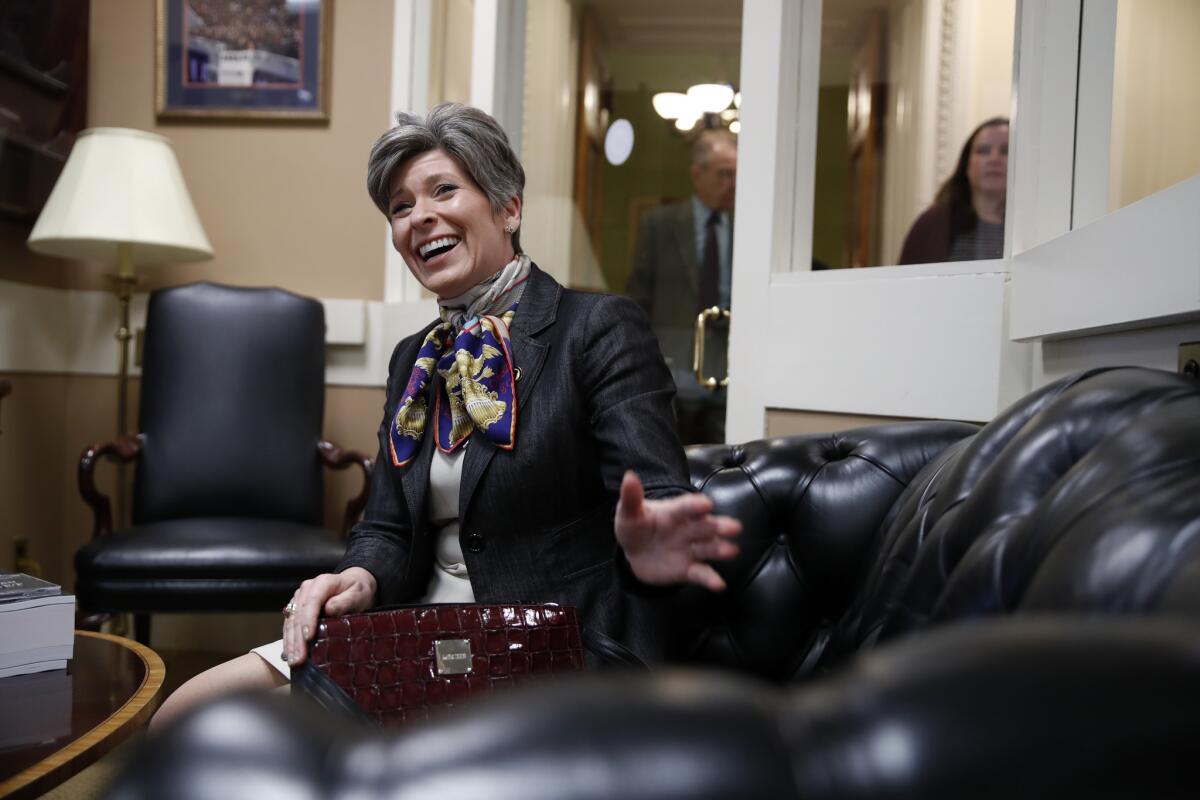
Iowa Sen. Joni Ernst, an Iraq war veteran and up-and-comer in the GOP, will give the keynote address at the California Republican Party’s three-day convention in San Diego in early May.
Ernst, the first woman to represent Iowa in Congress, was considered to be on President Trump’s short list of potential vice presidential running mates in the 2016 campaign — but removed her name from consideration.
The senator has come out in opposition to the president’s plan to place tariffs on steel and aluminum imports. She also criticized the White House for the way it handled the Rob Porter domestic abuse scandal.
“Senator Ernst has been shattering glass ceilings for years,” Jim Brulte, chairman of California Republican Party, said in a statement released Friday. “Her public service in both Iowa and Washington, D.C., her exemplary military career and her service in her community makes her an excellent role model for both women and men alike.”
He resigned his state Senate seat. But now he’ll be on the ballot twice to try to get back to Sacramento

Although Tony Mendoza resigned from his state Senate seat last month under threat of expulsion, he could be back in the seat as early as June in time to vote on the state budget.
The Artesia Democrat, who was pressured to quit because of sexual harassment allegations, was among a handful of candidates who took out papers on Friday to run in a special election to fill the vacancy in the 32nd Senate District caused by his own resignation.
Mendoza, 46, is running in the special election for the remaining months of the current term that ends Dec. 3 as well as in the primary for the new, four-year senate term. That means voters on June 5 will see Mendoza as a candidate for two elections at the same time.
Under the rules of a special election, if any candidate wins more than 50% of the vote in the June 5 primary, he or she wins the seat. If not, there is a general election scheduled for August. In other words, if Mendoza wins outright, he could be seated back in office in time for the Senate’s important vote on the budget by June 15.
Mendoza signaled his intentions in a statement Friday: “I am planning to be a candidate for the Special as well as the regularly scheduled election for the 32nd Senate District.”
For the record: A previous version of this article referred to Bob Archuleta as Montebello mayor. He is a Pico Rivera councilman.
Also appearing on the regular June 5 primary ballot: Democrats including Montebello Mayor Vanessa Delgado, Rio Hondo College Board member Vicky Santana, Pico Rivera Councilman Bob Archuleta and former Assemblyman Rudy Bermudez.
Santana also has pulled papers to run in the special election. Candidates have until April 12 to file for that race, according to the county registrar’s office.
Josh Pulliam, a campaign spokesman for Delgado, criticized Mendoza’s decision to run, saying the former senator “has no shame.”“He’s abusing the system and playing politics, when he should be in sexual harassment counseling,” Pulliam said.
Mendoza was first elected to the Senate in 2014 with 52% of the vote. The district, which includes much of southeastern Los Angeles County, is overwhelmingly Democratic.
Mendoza, who resigned Feb. 22, has denied he acted improperly even though an investigation by outside attorneys hired by the Senate described an apparent pattern of “unwanted flirtatious or sexually suggestive behavior.” Six women said his behavior made them uncomfortable.
Mendoza apologized if he made anyone uncomfortable but said in his resignation letter that he was denied due process by a secret investigation, adding, “I cannot expect fairness and justice.”
The state Democratic Party declined to endorse his surprise candidacy at the convention in San Diego, days after the resignation.
Mendoza’s decision disappointed Christine Pelosi, chairwoman of the state Democratic Party’s Women’s Caucus.
“His constituents will make the ultimate decision but it really is just an absolutely arrogant response to people who came forward and said he victimized young women,” she said.
3:25 p.m.: This article was updated with information about the district.
Here’s another glimpse of Kamala Harris’ finances as she looks to 2020

California Sen. Kamala Harris, who is serving her first term, has an estimated net worth that puts her financially near the middle of the pack in a delegation that includes both the richest and poorest members of Congress.
Harris reported an estimated minimum net worth of $391,100 in 2017, the first year she held federal office and had to submit the disclosures every member of Congress files.
Harris is thought to be considering a presidential bid in 2020, and the disclosure was among the first glimpses of the former California attorney general’s finances. Harris released tax returns during the 2016 campaign that showed she and her husband made $1.17 million in 2015 and paid $450,000 in state and federal income taxes.
According to the 2017 disclosure, Harris had $2 million in assets, including at least $250,000 in savings and a San Francisco Employees Retirement account worth at least $250,000 from her time as a city and county district attorney. The Democrat’s husband, intellectual property and entertainment lawyer Doug Emhoff, held the bulk of their wealth. He has more than $900,000 in investments and retirement accounts. Emhoff also held their biggest liability, a mortgage worth at least $1 million.
Compared with Senate colleagues such as fellow Californian Dianne Feinstein, who with a net worth of at least $58.5 million is one of the wealthiest members of Congress, Harris is toward the bottom of the pack. But she is by no means the poorest senator: 29 had a lower net worth in 2017, according to Capitol Hill publication Roll Call, which also compiled the annual data for The Times.
See the full list of the California delegation’s wealth at latimes.com/wealthranking.
California housing crisis podcast: Why the state’s homeless population is booming
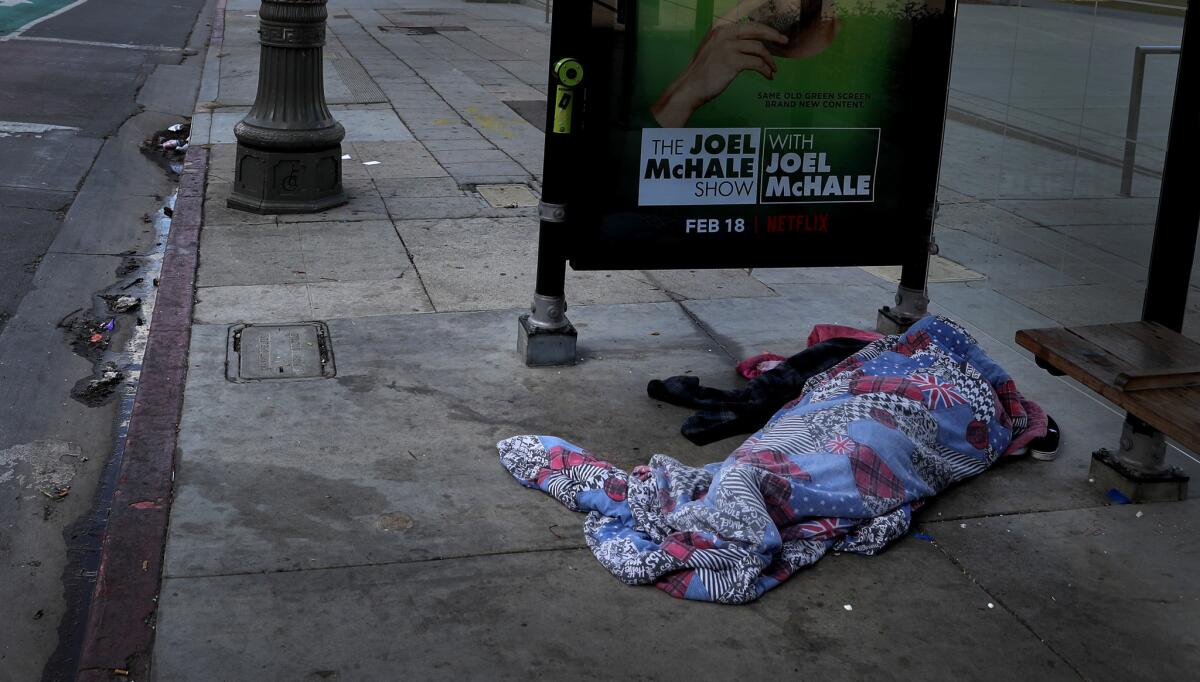
California’s homeless population has grown to more than 130,000 people, an increase of nearly 14% over the last year.
On this episode of Gimme Shelter: The California Housing Crisis Pod, we delve into some of the causes of the increase and discuss why a state-approved $2-billion bond to help finance new housing for the homeless is tied up in court.
We recorded the show from the Housing California conference in Sacramento, one of the state’s largest annual gatherings of low-income housing developers and advocates. Our guests are advocates for the homeless from across the state: Ann English of the Corporation for Supportive Housing in Los Angeles, Laura Guzman of EveryOne Home in Alameda County and Stephen Russell of the San Diego Housing Federation. Our interviews focus on how homelessness is different around the state and how the homeless population has changed over the years.
“Gimme Shelter,” a biweekly podcast that looks at why it’s so expensive to live in California and what the state can do about it, features Liam Dillon, who covers housing affordability issues for the Los Angeles Times’ Sacramento bureau, and Matt Levin, data reporter for CALMatters.
You can subscribe to “Gimme Shelter” on iTunes, Stitcher, Soundcloud, Google Play and Overcast.
California teens are preregistering to vote, and taking a pass on political parties
California’s relatively new system in which 16- and 17-year-olds can preregister to vote has been used by 88,700 teenagers during its first months in existence, with most of them declining to identify as Republicans or Democrats.
The data released by Secretary of State Alex Padilla on Thursday cover the first 18 months of a law designed to encourage teenagers to begin thinking about the voting process before they actually become eligible.
“It’s just picking up as time goes on,” Padilla said in an interview. “More and more young people are aware of it.”
An online signup system will automatically register them to vote on their 18th birthday as long as they’re a U.S. citizen and a California resident.
The largest bloc of the pre-registrations — almost 44% — were by teens who said they had “no party preference,” California’s version of an unaffiliated or independent voter. Those who wanted to be Republicans were especially few and far between, making up only 10.3% of preregistrations. Thirty-seven percent of the teenagers selected the Democratic Party.
Padilla attributed some of the uptick in preregistration to current events, including last month’s mass shooting at a Parkland, Fla. high school.
“The shooting has high school students very active, aware and engaged,” he said. “We’ve seen the numbers go up even recently.”
Investigation finds state Sen. Bob Hertzberg’s hugs were unwanted, but not sexual in nature
A legislative investigation into unwanted hugs by a state senator nicknamed “Huggy Bear” in California’s state Capitol found that he made people feel uncomfortable, but his behavior wasn’t sexually motivated.
The Times obtained the report into hugging by state Sen. Bob Hertzberg (D-Van Nuys). It resulted in a letter of reprimand from a key Senate panel, which instructed him to stop initiating hugs.
“You are now on notice that your behavior has been unwelcome,” members of the Senate Rules Committee wrote in a letter to Hertzberg on Tuesday.
Former L.A. Mayor Antonio Villaraigosa files to run for California governor

A fight simmers in the Bay Area over protecting the privacy of immigrants here illegally
Panicked callers to Alba Hernandez’s hotline reported a possible immigration raid. She rushed to the West Oakland home to find officers had blocked off traffic in what they described as a human-trafficking investigation.
The police revealed no criminal charges from the August incident. Instead, two Guatemalan brothers were questioned on civil immigration violations, and one was detained for weeks, according to court records and interviews with residents.
This wasn’t supposed to happen in Oakland, a city that has made national headlines for its mayor’s defense of so-called “sanctuary” policies, Hernandez and other immigrant rights activists said. Oakland has greatly limited police cooperation with U.S. Immigration and Customs Enforcement, drawing the ire of Atty. Gen. Jeff Sessions.
Prominent Republican’s entry into Rohrabacher race would scramble competitive contest
Former Orange County GOP chairman Scott Baugh plans to run for the House seat of Rep. Dana Rohrabacher, a fellow Republican, according to multiple sources close to Baugh.
The entry of Baugh, a well-known name in Orange County Republican circles, would scramble the already crowded field in the 48th Congressional District race. With more than half a dozen Democrats hoping to flip the district and the an ugly party-endorsement fight still lingering, Baugh could put Democrats at added risk of getting shut out of the November top-two runoff.
Baugh pulled filing papers at the Orange County Registrar of Voters’ office Wednesday and paid the $1,740 fee to run. He has yet to announce a campaign and did not respond to a request for comment. Baugh has until Friday to complete additional paperwork to get his name on the June 5 primary ballot.
The former state assemblyman has been mulling a run in the 48th District for some time. He raised money ahead of the 2016 election, saying he would only run if Rohrabacher retired. He told the Daily Pilot that GOP incumbents who hold to party principles shouldn’t be challenged by fellow Republicans.
But Rohrabacher didn’t retire, Baugh’s fundraising slowed and he never filed to run.
Baugh raised no money in 2017 but reported about $550,000 in cash on hand as of Dec. 31, putting him ahead of all but one of the Democrats running to unseat Rohrabacher.
Rohrabacher is believed to be among the most vulnerable Republican House candidates and has long been the subject of retirement rumors. His controversial antics, strong support for legalizing marijuana use and persistent fondness for Russia have made him an outlier in his party.
Rohrabacher has already completed the paperwork to run and qualified for the ballot. Officials said state law doesn’t provide a way for Rohrabacher to remove his name from the ballot without a court order.
Baugh was chairman of the Orange County Republican Party for more than a decade and served in the state Assembly from 1995 to 2000.
Times staff writer Seema Mehta contributed to this report.
California’s pot regulator warns 900 marijuana shops that they must stop operating without a state license

California’s pot regulation agency has sent 900 warning letters to marijuana shops suspected of operating without state licenses.
Lori Ajax, the chief of the state Bureau of Cannabis Control, also sent a cease-and-desist notice to the marijuana-location service Weedmaps, telling it to stop advertising sellers that lack a permit, officials said Wednesday.
Ajax, the first person to hold her post, notified Weedmaps that a new state law that took effect Jan. 1 requires all marijuana sellers to have state licenses and all advertisements to contain the state license number.
“Your website contains advertisements from persons offering cannabis and cannabis products for sale that are not licensed to conduct commercial cannabis activity; therefore, you are aiding and abetting in violations of state cannabis laws,” Ajax wrote.
She said that violations of the state law could result in criminal, civil or administrative penalties.
A representative of Weedmaps did not respond to a request for comment.
Democratic PAC reserves nearly $8 million in California ad time right before November election

The most prominent super PAC dedicated to helping Democrats regain control of the House is reserving nearly $8 million worth of television ad time in California in the final weeks of the 2018 campaign.
Flipping a few of California’s Republican-held congressional districts is a big part of Democrats’ strategy to retake the House, and candidates, outside groups and political action committees are expected to flood the state’s airwaves.
California’s expensive media markets are getting nearly a fourth of the $43 million House Majority PAC is spending across 33 media markets. The PAC, which has close ties to House Minority Leader Nancy Pelosi, is reserving $5.2 million in ad time on cable and broadcast in Los Angeles, $1.5 million in Sacramento and $1.2 million in San Diego.
PACs and campaigns often reserve TV time early to lock in lower rates. Closer to the election, they decide where they should spend money on ads and might end up canceling some of the reserved time.
California Democratic leaders embrace being singled out in Sessions’ speech

Lt. Gov. Gavin Newsom and Oakland Mayor Libby Schaaf seized upon remarks U.S. Atty. Gen. Jeff Sessions made Wednesday as he castigated them during a speech in Sacramento, accusing the state’s leaders of illegally undermining federal immigration policy.
Sessions, who was speaking at a law enforcement conference where he announced the federal government’s lawsuit against California over “sanctuary state” policies, accused Schaaf of warning about impending immigration raids in Oakland and helping criminals who are in the country illegally avoid apprehension.
“Here’s my message to Mayor Schaaf: How dare you,” Sessions said. “How dare you needlessly endanger the lives of law enforcement just to promote your radical open-borders agenda.”
He also singled out Newsom for praising Schaaf’s actions.
“Bragging about and encouraging the obstruction of our law enforcement and the law is an embarrassment to this proud and important state,” Sessions said.
Newsom tweeted that he was proud to be singled out by Sessions.
“I take that as a HUGE compliment,” Newsom wrote, attacking the attorney general’s positions on immigration, drug policy and private prisons, and accusing him of being an apologist for white supremacists.
Newsom later spoke with three immigrants about their experiences under President Trump’s administration in a Facebook Live discussion, and highlighted Sessions’ comments in a fundraising email for his gubernatorial bid.
Prior to Sessions’ speech, Newsom and other Democrats running for governor protested the Trump administration’s decision to sue the state over its immigration policy while the GOP candidates in the race rejoiced.
Schaaf accused Sessions of vilifying hardworking immigrants and distorting crime statistics “to advance a racist agenda.”
“How dare you distract the American people from a failed immigration system that tears apart decent families and forces the workers that our economy depends on to harvest our crops, deliver our services, and build our cities to live in fear and work under oppressed conditions,” Schaaf said in a statement.
State Treasurer John Chiang officially files to run for governor

California Republicans urge Trump to rethink steel and aluminum tariffs
Several of California’s Republican representatives are openly challenging President Trump’s plans to impose steel and aluminum tariffs. The tariffs are a rare source of disagreement between congressional Republicans and the White House, and the opposition in California comes from several lawmakers who face difficult reelection bids this fall.
Reps. Devin Nunes of Tulare, Tom McClintock of Elk Grove, Ed Royce of Fullerton, Mimi Walters of Irvine and David Valadao of Hanford were among the 102 House Republicans who wrote a letter to Trump on Wednesday urging him to narrowly tailor tariffs rather than impose them worldwide. House and Senate GOP leaders also have pushed Trump to change his mind, or at least narrow the tariffs to avoid retaliatory tariffs or a trade war.
White House Press Secretary Sarah Huckabee Sanders said Wednesday that the president would sign a proclamation on new steel and aluminum tariffs by the end of the week, and indicated exceptions could be made for Canada and Mexico.
Valadao said people in his largely agricultural district were worried about how such a move would affect the price of steel and aluminum and if California-grown products would be heavily taxed if other countries retaliated by imposing tariffs of their own.
“I’d rather this not be part of the conversation right now,” Valadao said.
Walters said she was worried about consumer prices going up in her suburban Orange County district.
“I think we need to look at the bad actors when it comes to the countries that are not being good partners with us when it comes to aluminum and steel,” Walters said.
Trump to raise money in Beverly Hills next week. Donors can give up to $250,000
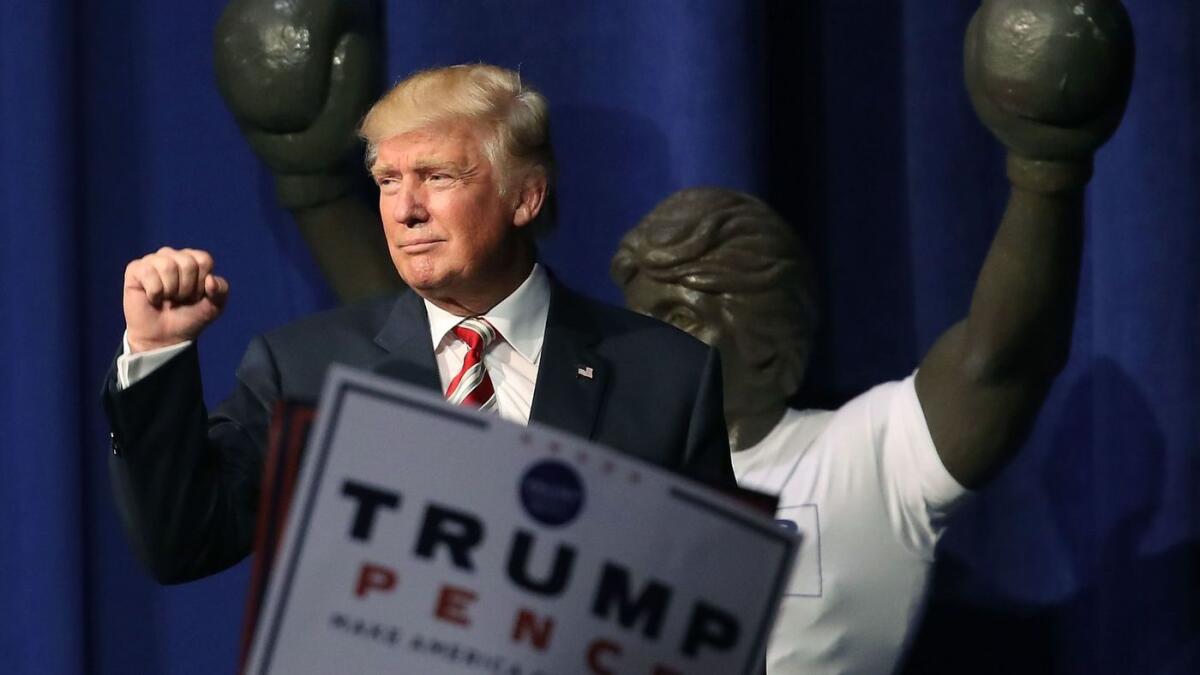
President Trump will headline a high-dollar fundraiser for his reelection campaign when he visits California next week for the first time in his presidency, according to an invitation obtained by The Times.
Donors will contribute up to $250,000 each to Trump’s campaign and various Republican National Committee accounts to attend the Tuesday evening event at an undisclosed location in Beverly Hills.
The top ticket price includes a roundtable, photo opportunity and dinner. The cheapest ticket, which is dinner only, costs $35,000 for an individual and $50,000 for a couple.
The fundraiser is being hosted by Republican National Committee Chairwoman Ronna McDaniel, national finance chairman Todd Ricketts and deputy national finance chairman Elliott Broidy.
Earlier in the day, the president will inspect border wall prototypes in San Diego.
The visit is Trump’s first to California since becoming president. His administration and the state’s Democratic leadership have repeatedly clashed over immigration, environmental, marijuana and other policies. This week, the Department of Justice sued California over state laws that offer protections for illegal immigrants.
Jeff Sessions’ appearance draws protesters to streets of Sacramento
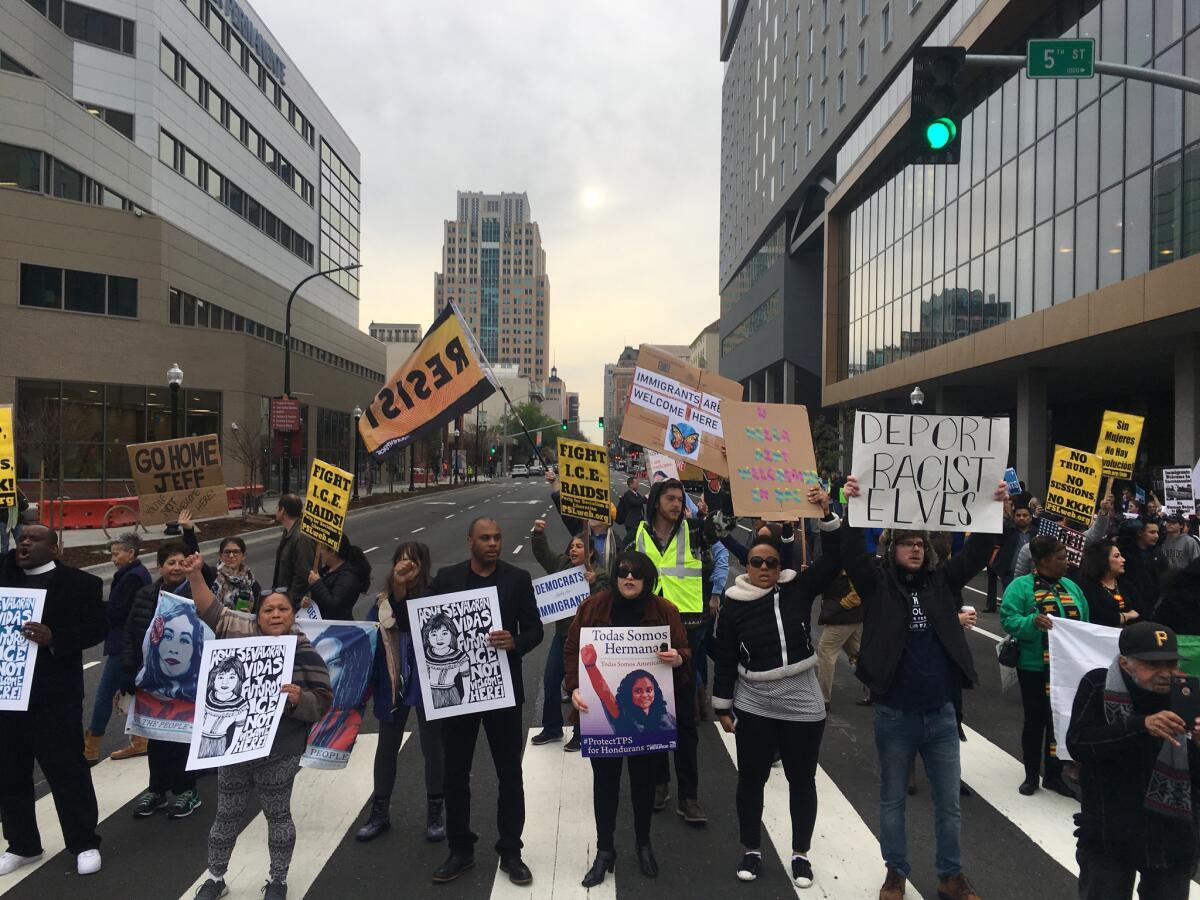
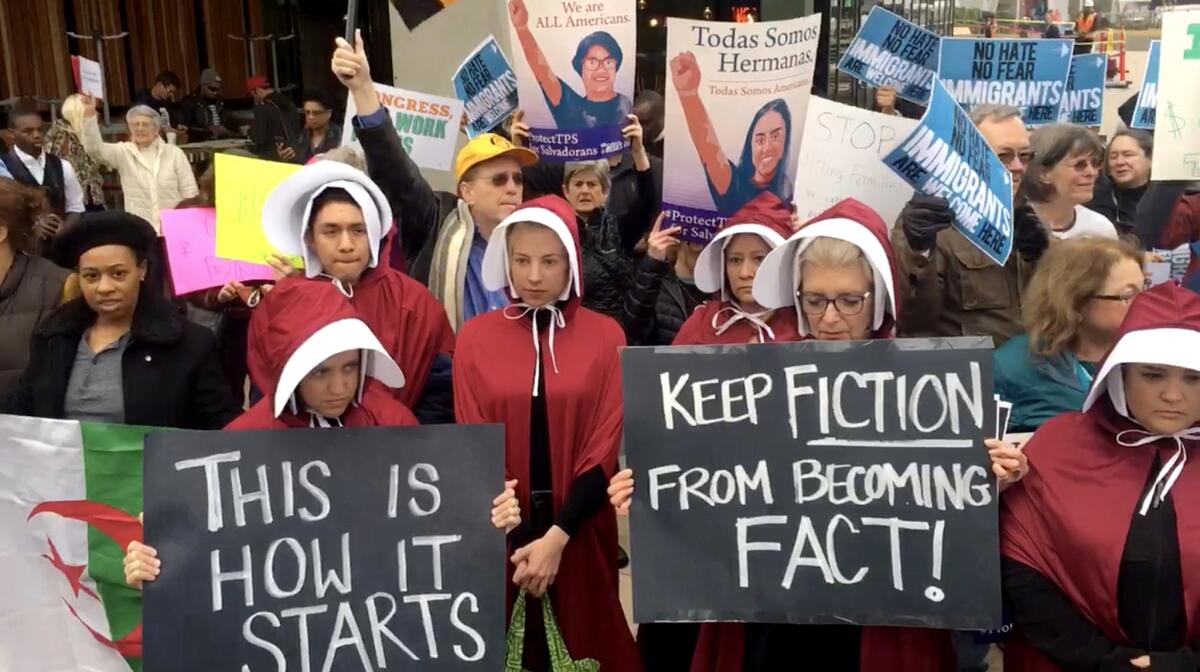
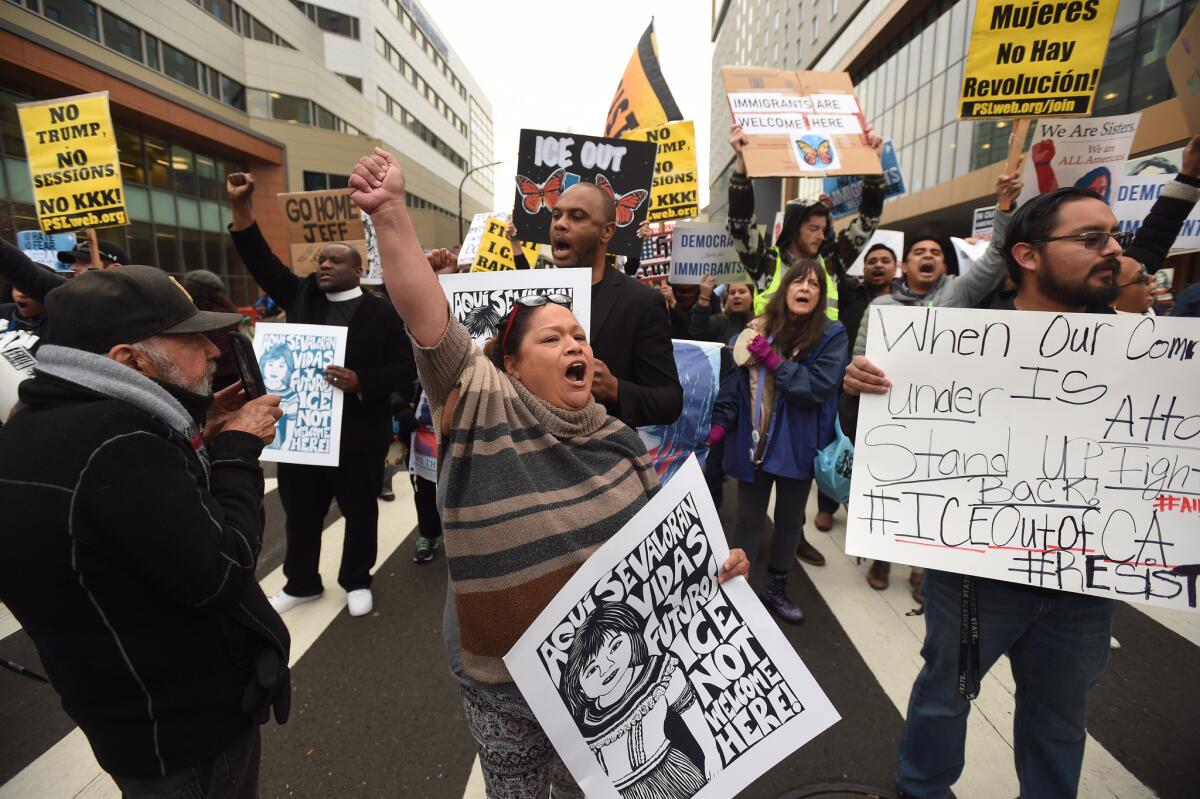
How Trump’s immigration war with California reached a fever pitch
Donald Trump and California have long been at odds on the issue of illegal immigration. The president wants to deport those who are here illegally, while many Californians and their leaders want to protect them.
But in the last month, this battle has reached a fever pitch.
President Trump has said California police are soft on street gangs and suggested pulling federal immigration agents out of the state.
Gov. Jerry Brown: ‘This is basically going to war against the state of California’
This is basically going to war against the state of California.
— Gov. Jerry Brown on U.S. Atty. Gen. Jeff Sessions’ legal attack on California’s so-called sanctuary laws
Read Jeff Sessions’ prepared remarks about California’s ‘sanctuary state’ laws
Atty. Gen. Jeff Sessions delivered remarks at the Law Enforcement Legislative Day hosted by the California Peace Officers’ Assn. in Sacramento. Here is a transcript of his speech.
Thank you, Mark, for that kind introduction, for your leadership with the CPOA and most of all, for your 22 years of service in law enforcement.
I also want to thank all of the other law enforcement leaders who are here today:
Protest wanes but chants continue outside downtown Sacramento hotel where Sessions appeared
Watch: California Gov. Jerry Brown and Atty. Gen. Xavier Becerra speak on Trump administration suit
Read the Justice Department’s lawsuit against California’s laws protecting immigrants
Sessions: ‘California... is using every power it has — powers it doesn’t have — to frustrate federal law enforcement’
I sign condolence letters for law enforcement officers killed in the line of duty — I signed two yesterday. I fundamentally believe, at my core, that we should further endanger the lives of those who risk everything for us because some officials want to violate the law in promoting an agenda that the American people reject. So California, [it] absolutely appears to me, is using every power it has — powers it doesn’t have — to frustrate federal law enforcement. So you can be sure I’m going to use every power I have to stop them.
— U.S. Atty. Gen. Jeff Sessions
Sessions to Oakland Mayor Libby Schaaf: ‘How dare you’
How dare you. How dare you needlessly endanger our law enforcement officers to promote a radical, open-borders agenda.
— U.S. Atty. Gen. Jeff Sessions to Oakland Mayor Libby Schaaf, who warned immigrants in her city of imminent federal immigration enforcement actions
Watch: Jeff Sessions announces that Trump administration is suing California
California Senate leader Kevin de León: Sessions’ policies are based on ‘white nationalism and white supremacy’
Trump administration sues California over laws protecting immigrants
The Trump administration, seeking to force a defiant California to cooperate with its agenda of stepped-up immigrant deportations, went to federal court Tuesday to invalidate three state laws — the administration’s most direct challenge yet to the state’s policies.
Administration officials say the three laws in question, all passed by the Legislature last year, blatantly obstruct federal immigration law and thus violate the Constitution’s supremacy clause, which gives federal law precedence over state enactments.
“The Department of Justice and the Trump administration are going to fight these unjust, unfair, and unconstitutional policies that are imposed on you,” Atty. Gen. Jeff Sessions plans to tell a meeting of the California Peace Officers Assn. in Sacramento on Wednesday, according to excerpts of his remarks released by the Justice Department.
A fight simmers in the Bay Area over protecting the privacy of immigrants here illegally
Panicked callers to Alba Hernandez’s hotline reported a possible immigration raid. She rushed to the West Oakland home to find officers had blocked off traffic in what they described as a human-trafficking investigation.
The police revealed no criminal charges from the August incident. Instead, two Guatemalan brothers were questioned on civil immigration violations, and one was detained for weeks, according to court records and interviews with residents.
This wasn’t supposed to happen in Oakland, a city that has made national headlines for its mayor’s defense of so-called “sanctuary” policies, Hernandez and other immigrant rights activists said. Oakland has greatly limited police cooperation with U.S. Immigration and Customs Enforcement, drawing the ire of Atty. Gen. Jeff Sessions.
California’s candidates for governor react to Trump administration lawsuit over immigration policy
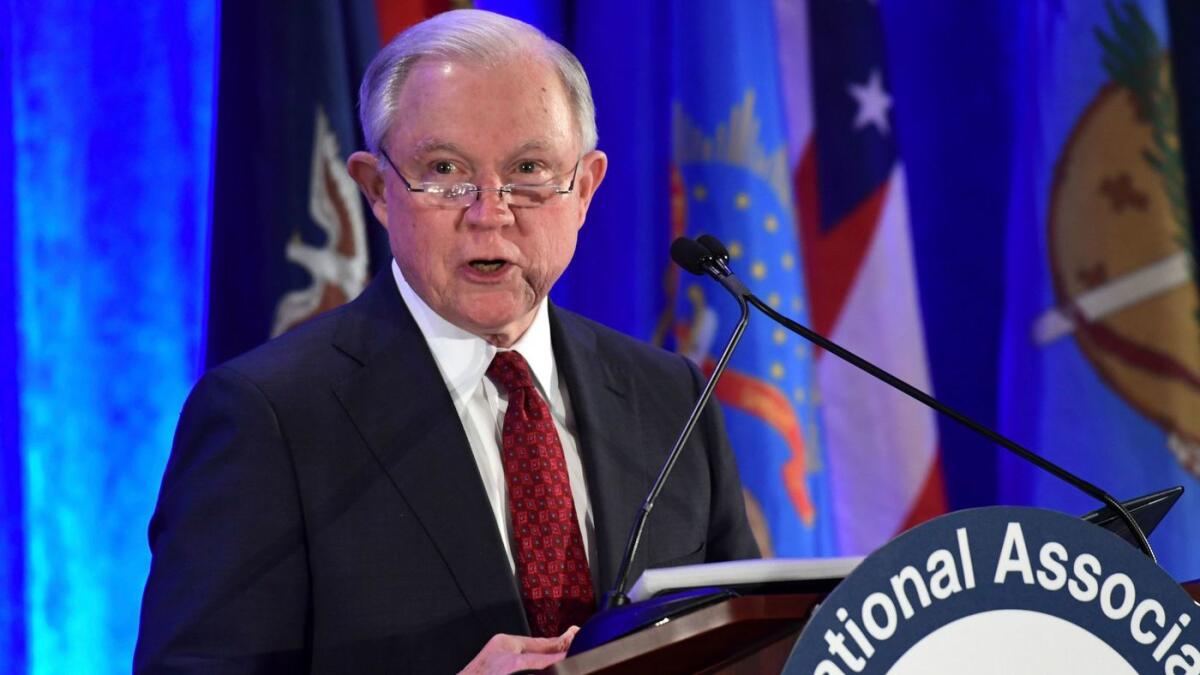
The candidates running for governor reacted in familiar ways to news Tuesday that the Trump administration is suing California over its immigration policies, with Democrats calling for insurgency and Republicans rejoicing.
Businessman John Cox, a GOP candidate, released a minute-long radio ad seeking to tie California and San Francisco sanctuary policies with the tragic death of a young woman who was killed in that city in July 2015.
“The senseless, random killing of 32-year-old Kate Steinle by an illegal alien convict, is chilling testimony to how Gavin Newsom’s sanctuary city values differ from the rest of us,” Cox says in the ad, which his campaign says is airing statewide for two weeks in an $80,000 buy.
Cox notes that a San Francisco jury declined to convict the man accused in her death. He then pledged to overturn the state’s so-called “sanctuary state” law, which he attributes to Newsom and Gov. Jerry Brown.
The ad is aimed at burnishing Cox’s credentials among conservative voters while knocking down Newsom, the front-runner in polls and fundraising. It does not note that Newsom was not mayor of San Francisco when the killing occurred, nor that SB 54, the state’s sanctuary state bill, was signed into law by Brown years after the killing.
Assemblyman Travis Allen of Huntington Beach, Cox’s Republican rival in the race, has been calling on the Trump administration to prosecute California elected officials over the state’s immigration’s policies. He welcomed Atty. Gen. Jeff Sessions’ arrival in Sacramento for a speech Wednesday announcing the legal challenge.
“All the Democratic politicians running California know they’re in trouble with Jeff Sessions’ arrival in Sacramento,” Allen told Fox News’ Shannon Bream on Tuesday night. “Justice is finally coming to California, and California’s citizens can sleep a little bit easier at night knowing that the U.S. Department of Justice is actually going to enforce federal immigration law.”
Democrats, meanwhile, pledged to fight the Trump administration over the lawsuit, filed in federal court late Tuesday. It seeks to invalidate three state laws that the administration argues violate the federal government’s authority over immigration policy.
The laws make it a crime for business owners to voluntarily help federal agents find and detain undocumented workers, prohibit local law enforcement from alerting immigration agents when detainees are released from custody and create a state inspection program for federal immigration detention centers.
“California thrives because of its diversity, not in spite of it,” Newsom said. “California won’t be bullied by Donald Trump and Jeff Sessions, and we won’t back down from defending law-abiding residents.”
Democratic State Treasurer John Chiang pledged to defend the state’s immigration policies if elected governor.
“California refuses to be a cog in Donald Trump’s deportation machine, and we will not tolerate these attacks on our communities,” he said. “This isn’t just a stand against the administration. This is a statement of values.”
Antonio Villaraigosa, the former mayor of Los Angeles and another Democratic gubernatorial candidate, said policies that nurture cooperation between immigrants in the country illegally and law enforcement made his city safer.
“This lawsuit is not about public safety; it is simply more divisive politics from Donald Trump,” he said. “Encouraging every resident, regardless of their immigration status, to report crimes, to agree to be witnesses and cooperate with local law enforcement is a cornerstone of our public safety strategy, and we must fight to protect these policies that are now under attack from Donald Trump.”
Protesters gathering in Sacramento to challenge Atty. Gen. Jeff Sessions before his ‘sanctuary state’ speech
We asked the candidates how they planned to meet housing production goals. Here’s how they responded
We asked California gubernatorial candidates Gavin Newsom and Antonio Villaraigosa a series of questions about their unprecedented goals of having 3.5 million homes built in the state by 2025 to address the state’s housing shortage. Below are their written responses in full.
Los Angeles Times: The McKinsey report called for building 3.5 million new homes between 2015 and 2025 — 11 years — and you want to do it in seven. Why is your goal more ambitious than the report you based your goal on?
Lt. Gov. Gavin Newsom: It’s not just what I want to do — it’s what we must do to address California’s housing crisis, which worsens every day. The McKinsey report, published in October 2016, identified the goal of 3.5 million new homes by 2025 to close the housing gap, stabilize the state’s housing market and address our future needs. The next governor, who won’t take office until January 2019, must be prepared to prioritize and accelerate our commitment to affordable housing — and hold state government accountable for achieving it. This is why I have outlined a comprehensive housing reform and production plan that I will make a top priority from day one. As I have said, there is no single silver bullet to solving this crisis. It requires an aggressive, multi-pronged approach that engages every stakeholder and includes additional funding for affordable housing, implements financial and tax incentives for jurisdictions that produce housing — and penalties for those that don’t — and regulatory reform. Most of all, it requires focused leadership and the ability to bring diverse stakeholders together in common cause.
Times: Since 1954, the most amount of housing California has built in a single year is 322,018 in 1963 per Building Industry Assn. statistics. Given that, is it reasonable to expect to build 500,000 new homes annually for seven years in a row?
Newsom: When I embraced the goal of 3.5 million new units by 2025, I knew it was unprecedented and audacious. But it’s what must be done. A crisis of this magnitude requires ambitious goal setting matched with focused leadership and bold, innovative policy initiatives. It requires an affordable housing “moonshot.” We can’t stand by and do nothing as skyrocketing housing costs and the habitual undersupply of [housing] slowly erodes the California Dream and forces more families onto the streets and out of their communities. Achieving the 3.5 million target will require working with local governments to reform planning and zoning for housing production. It will also require streamlining burdensome regulations — with a focus on incentivizing affordable, inclusive and workforce housing projects.
Times: How many new homes do you expect each of your policy ideas to generate?
Newsom: We are failing to produce housing because the State has no mechanism to enforce or compel production. The problem is made worse by existing fiscal incentives for local jurisdictions to approve sales-tax generating uses rather than affordable homes. The state’s system for identifying housing production goals is also flawed and understates the need.
Currently, the California Department of Housing and Community Development calls for only 1.8 million new units by 2025. This goal will not stabilize the housing market, nor address the state’s worsening affordability crisis. Along with failing to address the actual need, these goals lack teeth and are routinely ignored by local jurisdictions through the Regional Housing Need Allocation (RHNA) process. We must completely revamp both the RHNA methodology as well as the State’s ability to leverage tax dollars and utilize fiscal incentives to ensure production targets are actually achieved. This would be a dramatic change to current policy and would give the State and local jurisdictions the necessary tools to address the housing crisis.
Times: Do you support the state’s goal of reducing carbon emissions by 40% below 1990 levels by 2030 as outlined in Senate Bill 32? If yes, state climate regulators and academics have said that to meet that goal the state needs to concentrate development near job centers and transit. So does that mean you would try to limit new sprawl development at the same time you’re pushing for a large increase in overall production? If you don’t support SB 32, would you encourage new sprawl development?
Newsom: I am a strong supporter of SB 32 and believe more must be done to reduce greenhouse gas emissions statewide. As the Trump Administration pretends global warming doesn’t exist, it’s more important than ever for California to lead on climate action. A key component of addressing climate change is aligning land use policy with greenhouse gas reduction. Concentrating density near transit nodes is essential to both addressing the housing crisis and reducing vehicle miles traveled and mobile source carbon emissions. The State took a significant step by enacting SB 375, which required regional planning agencies to adopt Sustainable Communities Strategies to encourage land use decisions that reduce GHGs. More can and should be done. As the McKinsey study notes, increasing density within one-half mile from major transit hubs offers the potential to generate between 1.2 [million] and 3 million new housing units by 2025. Boosting infill, transit-oriented housing development is therefore critical to achieving the ambitious goal of 3.5 million new units by 2025.
Times: Do you support state Sen. Scott Wiener’s SB 827, which would significantly upzone residential land near transit? Why or why not? (Note: We asked this question before changes to the bill made on March 1.)
Newsom: I support the intent of SB 827, since California clearly needs more housing near public transportation. I know the bill is a work in progress and that Senator Wiener is working with local stakeholders to protect existing residents and other issues. I hope all sides can work together to craft solutions that move us toward a more affordable and sustainable housing future -- one that creates more housing while protecting existing communities.
Times: I spoke with a UCLA professor and an L.A.-based economist who said that to accomplish your goal you’d need, at the least, to dismantle Proposition 13, the California Environmental Quality Act or local control over zoning and potentially do away with all three. Are you proposing getting rid of any of them?
Newsom: I respectfully disagree. We can address the State’s housing crisis by altering the financial dynamics that underpin land use and planning, giving the state more leverage to compel housing production at the local level and accelerating approval and entitlement timelines and closing loopholes without eroding the core environmental tenets of CEQA. This would represent a bold change in policy and a significant departure from the State’s current approach of setting unambitious goals with no mechanism to compel results.
Times: I spoke with the head of the Associated General Contractors and an official with the Northern California Carpenters Regional Council. Neither said it was possible to build 500,000 units a year, the AGC person said because of a labor shortage and the Carpenters official said because developers’ returns wouldn’t be high enough to justify that amount of building. How do you respond to those concerns?
Newsom: Again, I respectfully disagree. Most of the experts and economists we’ve discussed this issue with believe that, if the overall economy remains strong and we take necessary steps to incentivize and accelerate new construction, continued demand will ensure continued developer returns — and there is no shortage of California companies looking to build. As for workforce, we can always do more to provide training through apprenticeships and other successful programs, but demand for skilled workers is a good problem to have. I would also point out that under SB 35 passed last year, new jobs created by those projects will pay a prevailing wage, attracting and retaining more skilled workers. All of this requires determination and constant diligence. California currently ranks 49 out of 50 states in housing production per capita — ahead of only Utah. From 2009 to 2014, California added 544,000 new households but only 467,000 net new housing units. New York, by comparison, added 80% more housing units during this period relative to population growth. We can and must do better — and I believe we will.
The Times provided the same list of questions to former Los Angeles Mayor Antonio Villaraigosa, who responded with a statement instead of addressing the questions one by one.
Villaraigosa: Building 3.5 million units is what experts are saying is necessary to address this housing deficit. Elected leaders from the local to the state level have to address this issue with the urgency it demands. It’s not about when the clock starts — what I am saying is time is up. And I will continue the effort on my first day in office.
I have consistently said this is a man-made disaster. It is making middle-class families poor, and making poor families homeless. I’ve also said we need everything and everyone at the table to find comprehensive, multi-faceted solutions. One-off policy proposals haven’t worked because they often pit one interest against the other.
As governor, I will fight to make sure we do not continue down this path of excessive commutes, segregated communities and land-use decisions that drag us further away from our environmental goals and from livable, affordable communities.
When I was mayor, we didn’t shy from the big challenges before us. We took them on and made progress. We financed more than 2,500 permanent supportive housing units for the formerly homeless. And we partnered with the L.A. County Departments of Mental Health and Health Services to provide support for those residents.
I also announced an ambitious plan to increase affordable housing for families. We set a goal: 20,000 new rental units for a family of four making up to $100,188 a year. Within four years, we not only met, but we exceeded that goal.
I’m not afraid of metrics, and I won’t back down from a challenge this important. Bringing back tools like redevelopment, which had a 15% set aside for affordable housing, will be an integral part of my approach. (Note: The affordable housing set aside under the prior redevelopment program was 20% of all funds.) That 15% may be too low, but the fact is we’ve never effectively replaced those tools and having smart financing mechanisms in place is essential to attract the investment we need to grow our housing stock. We are one of just a few states that don’t have some form of redevelopment financing to help our local governments. I will change that.
I also want to create a revolving fund to assist with secondary units. McKinsey’s report estimates the state “could add up to 790,000 housing units by allowing homeowners to adapt their homes in these ways.” This is just one example of the potential to cut into this problem with programs that many communities are already exploring.
We also need to build needed housing while still meeting the goal of reducing carbon emissions to 40% below 1990 levels as required by SB 32. We need to support transit-oriented development, but not to exclusion of other ways to achieve our goals. With respect to local regulations, ideas such as those expressed in SB 827 aren’t going to work unless everything and everyone is at the table. That bill, in particular, is in its early stages and has yet to have a committee hearing. The only path forward is to build consensus and create the right incentives to finance and approve projects.
Lastly, we must find ways to incentivize cities to pool resources on housing because it’s a regional need. In L.A. County alone, we have 88 cities with a million people also living in unincorporated areas. Most, if not all of them, are seeing the challenge of affordability, and we have to work together to meet our goals.
Whether it’s reforming the California Environmental Quality Act or Proposition 13, or balancing regional and local needs, or achieving our Senate Bill 32 goals while building more housing, only by having all interests at the table can we begin to develop pragmatic solutions to these hard problems.
This last piece is so important because housing has to be delivered at the local level, and building consensus is the only way to get there. It comes down to having the courage and experience to lead on this issue, and I am committed to getting it done.
Senate fellows program director is gone following Mendoza investigation

In further fallout from a sexual harassment investigation, the director of Cal State Sacramento’s Senate fellows program has left the job, officials said Tuesday. David Pacheco’s departure comes nearly four months after he was placed on an indefinite leave in response to allegations that former Sen. Tony Mendoza engaged in inappropriate behavior toward a young woman in the program.
Pacheco ended his time as director on Feb. 20, the same day the Senate released the results of an investigation that described a pattern of “unwanted flirtatious or sexually suggestive behavior” by Mendoza toward six women. The investigation found the allegations were “more likely than not” valid.
Former employees of Mendoza’s office complained to Senate officials that Mendoza inappropriately invited a young woman in the fellows program to his house after hours with an offer to help her work on her resume. Mendoza, a Democrat from Artesia, said he offered to help the fellow find a job, but did not do anything inappropriate.
Micha Star Liberty, an attorney for one of Mendoza’s former employees, said concerns about the senator’s behavior toward a female fellow in her 20s were reported to Cal State Sacramento’s Senate fellows program, but they were not initially documented or investigated by officials there.
University spokesman Brian Blomster on Tuesday would not describe the circumstances of Pacheco’s departure.
“David Pacheco is no longer employed by the university,” Blomster said. “A search for a permanent replacement will be conducted.”
Kathy Dressler, a former top aide to former Senate leader Darrell Steinberg, was given a temporary appointment to help with the selection process for next year’s Senate fellows, Blomster said.
California voters should be told if their ballot signatures don’t match, judge rules
A state court judge has ruled the process by which California elections officials refuse to count an absentee ballot because of mismatched voter signatures is unconstitutional, a ruling with particular importance in a state where millions of ballots are being cast away from traditional polling places.
The case centers around a Sonoma County voter whose November 2016 ballot was rejected when elections officials decided the man’s signature that was in their records system didn’t match the one on the back of the vote-by-mail envelope. That voter, Peter La Follette, along with the ACLU of Northern California, sued local and state elections officers last summer.
On Monday, San Francisco County Superior Court Judge Richard Ulmer ruled in favor of the plaintiffs.
“The statute fails to provide for notice that a voter is being disenfranchised and/or an opportunity for the voter to be heard,” Ulmer wrote. “These are fundamental rights.”
Ulmer ruled that local elections officials must notify a voter whose signatures don’t match, though he didn’t offer specifics on how to implement the new system. He noted that elections aren’t certified for 30 days, providing at least a limited window of time for action.
Secretary of State Alex Padilla declined to discuss the lawsuit on Tuesday.
“We are currently reviewing our options and have no further comment at the moment,” spokesman Jesse Melgar said.
William Rousseau, the registrar of voters in Sonoma County, said his office followed the law as it existed.
The lawsuit alleged as many as 45,000 ballots across the state weren’t counted in the last election because they failed a signature verification test. But there’s no standard for that process when it comes to a sloppy signature. Current law states only that a voter’s ballot should count if the elections official “determines that the signatures compare.”
California is on the cusp of a major move away from ballots cast on election day in traditional polling places thanks to a sweeping 2016 state law, raising the possibility of additional signature matching disputes in elections this year and in 2020.
Last year, Gov. Jerry Brown signed into law an expansion of voter rights for those who fail to sign their absentee ballot envelope. But lawmakers did not take action on the issue of signature verification.
A federal judge in October 2016 described a similar voter signature law in Florida as “obscene” and a disenfranchisement of the state’s voters. A bill introduced last September in the California Legislature would require notice and a chance for voters to verify those signatures. The bill passed the Senate last month on a bipartisan vote.
California homeowners receive $6 billion a year in subsidies — 15 times more than renters, report finds

Homeowners in California received nearly $6 billion in state tax subsidies last year, according to a new report that also revealed a wide gap between state support for homeowners and renters.
The report from the California Housing Partnership, a nonprofit low-income housing advocate, found that homeowners in the state received billions in subsidies through being able to deduct interest on their mortgages and their property taxes from their state tax bills. The report determined that the single largest housing subsidy in 2017 was $3.9 billion for the mortgage interest deduction, which is the state’s version of a benefit that also applies to homeowners’ federal taxes.
State support for renters, however, was limited to a couple hundred million dollars for a $60 annual tax credit for low-income renters and state tax credits for developers to help finance low-income rental projects.
“This new analysis of state spending reveals what many have long suspected: When it comes to the California budget, wealthier homeowners are getting the lion’s share of the benefits, while renters get crumbs,” said Matt Schwartz, president and chief executive of California Housing Partnership, in a statement.
State subsidies for renters are scheduled to double next year as funding from a $75 fee on mortgage refinancing and other real estate transactions passed in 2017 begin being spent to further help finance low-income projects.
But the state is planning to spend even more money on the mortgage interest and property tax deductions next year, with subsidies increasing to $6.5 billion.
There are nearly 7 million homeowner households in California compared to 6 million renter households. The report found that next year, the state will spend $929 per household on homeowner subsidies compared to $71 per renter household.
U.S. Atty. Gen. Jeff Sessions plans to make a major announcement over ‘sanctuary jurisdictions’ in Sacramento

U.S. Atty. Gen. Jeff Sessions is expected to make a major announcement in Sacramento on Wednesday about “sanctuary jurisdictions,” a label used to describe cities or states where leaders have limited collaboration between law enforcement and federal immigration agencies.
The nation’s top law enforcement officer is scheduled to speak at the 26th Annual Law Enforcement Legislative Day hosted by the California Peace Officers’ Assn. Sessions will make his announcement at the event, the Justice Department said in a news release.
A longtime advocate for reduced immigration — both legal and illegal — Sessions has led the Trump administration’s effort to increase deportations and has been in an ongoing battle with so-called “sanctuary cities” to force them to cooperate with federal immigration officials. Cities and counties across the country have been fighting the crackdown, winning federal court rulings against executive orders that block “sanctuary” policies from taking effect.
But in recent months, some of Sessions’ fiercest attacks have centered on California’s new “sanctuary state” law, which took effect in January and attempts to shield more than 2 million immigrants living in the state illegally. He has called it “unconscionable” and a threat to public safety.
President Trump criticized California officials in late February for how they are dealing with gangs and threatened to pull immigration and border agents out of the state.
“Frankly, if I pulled our people from California, you would have a crime nest like you’ve never seen in California,” Trump said in a discussion of gun violence following the mass shooting at a school in Parkland, Fla.
California’s Democratic politicians swiftly responded.
Gov. Jerry Brown said California’s law does not prevent or prohibit federal immigration officials from doing their work in any way.
“In California we protect all of our people from criminals and gangs, as well as dangerous assault weapons. We do our job Mr. President, you do yours,” he said in a statement.
Villaraigosa and Newsom want to build more houses in California than ever before. Experts see the candidates’ goal as an empty promise
Two of California’s leading candidates for governor say they’re going to end the housing shortage, a driver of the state’s affordability crisis.
Lt. Gov. Gavin Newsom and former Los Angeles Mayor Antonio Villaraigosa both have said they want developers in California to build a half million homes in a year — something that’s never happened, at least in modern history. And they want builders to do it for seven straight years, resulting in 3.5 million new homes from the time the next governor takes office through 2025.
Those numbers are so out of scale with California’s history that they might be impossible to achieve. Practical concerns, including developers lining up enough financing and construction workers to build so many homes so quickly, could stymie the effort. Meeting the goals could also require rolling back decades of popular state policies on growth, taxation and the environment, according to housing academics and economists.
A new Democrat has stepped up to run against Rep. David Valadao
Democratic engineer T.J. Cox announced on Tuesday he will try to unseat GOP Rep. David Valadao in the Central Valley’s 21st Congressional District.
Cox was already running for Congress in the nearby 10th Congressional District, but faced a tough battle against a crowded field of Democrats who had more name recognition or more money.
Cox is now the only Democrat running for the seat. Emilio Huerta, a local lawyer and son of labor rights icon Dolores Huerta, dropped out of the race Sunday just days before the Friday deadline to file to run for office.
Cox announced the move to the 21st District in the Bakersfield Californian on Tuesday morning.
While living in the district isn’t a requirement to run for Congress, Cox had moved his voter registration from a home in Fresno to an apartment in Modesto in the 10th District. He said in July that he planned to move his family to Modesto.
Democrats consider the 21st District a top pickup opportunity in their quest to retake control of the U.S. House. The largely agricultural district is predominantly Latino, and backed Hillary Clinton for president in 2016. But Democrats face an uphill climb to unseat Valadao. Valadao has almost $1 million in the bank, and has fended off challengers since he was first elected in 2012. Cox had less than $300,000 in cash on hand at the beginning of the year, and has loaned his campaign more than $200,000.
Cox in 2011 founded Central Valley NMTC Fund, an organization that invests public and private funds in economically disadvantaged Central Valley communities. His campaign plans to highlight the group’s projects, including community health clinics and agricultural education programs.
This will be Cox’s second bid for a Central Valley congressional seat. In 2006, he lost to former Rep. George Radanovich by more than 20 percentage points in what was the 19th Congressional District before district boundaries were redrawn.
Pelosi’s real estate makes her the 5th richest Californian in Congress
Thanks to a bunch of pricey real estate in swanky locations, House Minority Leader Nancy Pelosi remains high on the ranking of the California congressional delegation by minimum net worth, a new analysis of financial disclosures finds.
The San Francisco Democrat listed 10 properties, worth at least $23 million. With the exception of a St. Helena estate and vineyard on Zinfandel Lane at the banks of the Napa River with a reported value of at least $5 million, the rest of Pelosi’s properties are owned by her husband, Paul Pelosi. She reported multiple mortgages as liabilities on her disclosure forms covering 2016, the most recent year available.
One of the deadly blazes that ravaged Northern California in October stopped less than four miles from the Pelosi vineyard. Public records show that property was assessed at $4 million on Jan. 1, 2017.
“It’s like in an inferno there, you’d think it had been bombed to see some of the areas in the valley,” Pelosi told The Times last fall when asked if any of her property was affected by the fires.
Sign up for the free Essential Politics email newsletter »
Pelosi and her husband also earned rental income in 2016 from a townhome near the Sugar Bowl Ski Resort in Norden. The forms state they sold that home at the end of the year for somewhere between $1,000,001 and $5 million. Records show it sold for $1.53 million. They also listed the sale of real estate in Napa Valley for between half a million and $1 million. Records show that sale was for $600,000. Other notable Pelosi properties include Russell Ranch in Sacramento and a commercial property at 25 Point Lobos in San Francisco, both valued at minimum of $5 million.
She was the No. 5 richest Californian in Congress, despite an $11 million decrease in assets in 2016.
Paul Pelosi previously disclosed an asset worth at least $10 million in the Sacramento Mountain Lions team of the now-defunct United Football League. The team was not listed on Pelosi’s 2016 forms. Paul Pelosi also unloaded about $4.5 million worth of investments in Salesforce.
In 2016, Paul Pelosi owned at least $1.5 million worth of Apple stock, reported an investment of at least $1 million in Walt Disney Co. and owned at least half a million in Facebook stock.
California’s watchdog agency approved record number of settlements for ethics and campaign violations last year
California’s campaign watchdog agency last year approved a record 340 settlements of cases involving violations of ethics and political finance rules, according to its annual report issued Monday.
The state Fair Political Practices Commission said it collected more than $1.1 million in fines from elected officials, lobbyists, political donors and others in 2017 for issues that included failing to properly report contributions.
“These results hopefully will help restore public confidence in the political process by highlighting that California has strong laws that are vigorously enforced,” said Jodi Remke, the FPPC chairwoman.
One of the biggest cases last year resulted in the Huntley Hotel of Santa Monica agreeing to pay $310,000 in fines for laundering $97,350 in donations to City Council candidates and committees in hopes of thwarting the expansion of a competing hotel, according to the report.
Comedian Patton Oswalt to host fund-raiser for candidate hoping to unseat GOP Rep. Steve Knight
Comedian Patton Oswalt will host a comedy show later this month on behalf of congressional candidate Jess Phoenix, who is running to unseat GOP Rep. Steve Knight in the 25th Congressional District.
Oswalt said friends tipped him off to Phoenix’s candidacy and the two met through Twitter.
While he does not live in the district, Oswalt said he was struck by Phoenix’s knowledge of environmental policy and her refusal to take donations from political action committees or corporations. She is a geologist who runs an educational science nonprofit that researches the Mojave Desert.
“If you keep politics focused just on ‘How does this affect me?’ then you will ignore things that do affect [you],” Oswalt said. “You don’t just look at your own backyard, because we’re all interconnected whether you like it or not.”
Phoenix said most tickets to the March 17 show at the Newhall Family Theatre are being sold for $25. Additional comedians are expected to join the lineup.
“We want this to be something that is for everybody in the community, because politics is supposed to be for everybody,” Phoenix said.
The district is a frequent target of Democrats, and Phoenix so far has lagged behind in fundraising against some of the other Democrats hoping to unseat Knight of Palmdale.
These California bills on sexual harassment got an Oscars red carpet shoutout
A slate of California bills meant to combat sexual harassment in the workplace got a high-profile plug on Hollywood’s biggest night.
Mira Sorvino, an actress and leading figure in the Times Up movement taking on harassment in the entertainment industry and beyond, highlighted a number of measures making their way through the state Legislature during a red carpet interview at the Academy Awards on Sunday night.
“I want people to know that this movement isn’t stopping,” Sorvino said in an interview on ABC. “We’re going forward until we have an equitable and safe world for women.”
Sorvino said she is working with the women’s rights group Equal Rights Advocates to push a legislative package, which she described as “the strongest suite of bills against sexual harassment anywhere in the country.”
The bills are:
- SB 1038 by state Sen. Connie Levya (D-Chino), which would make clear that individuals could be held personally liable for retaliating against an employee who has filed a harassment complaint.
- SB 820, also by Leyva, which would bar confidentiality provisions in settlement agreements in cases of sexual assault, sexual harassment or sexual discrimination.
- SB 224, by state Sen. Hannah-Beth Jackson (D-Santa Barbara), which would make clear that investors, elected officials, lobbyists, directors and producers could be held liable for sexual harassment under state law
- SB 1300, also by Jackson, which would expand sexual harassment training requirements for employers.
Villaraigosa challenges Newsom to one-on-one debate over single-payer healthcare
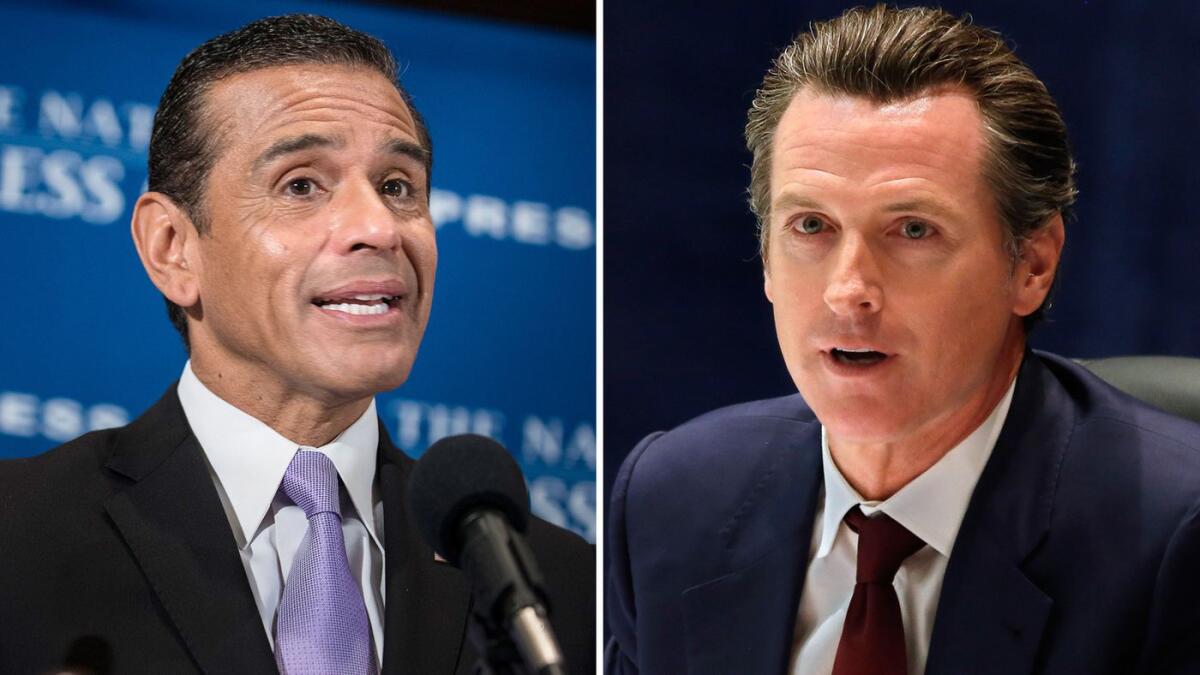
Antonio Villaraigosa on Monday challenged his top rival in the governor’s race, Lt. Gov. Gavin Newsom, to a one-on-one debate over the viability of a state-sponsored single-payer healthcare system in California.
The issue has divided the Democratic field of candidates. Newsom and former state schools chief Delaine Eastin have expressed strong support for the proposal, while Villaraigosa and state Treasurer John Chiang have expressed doubt that the state can afford it.
“Enough with the slogans — it’s time to show real leadership and have a serious in-depth discussion,” Villaraigosa said in a statement sent to the news media Monday.
The debate challenge by the former two-term mayor of Los Angeles comes after Villaraigosa wrote an opinion article explaining his stance on the issue that was published in newspapers this past weekend.
Notably, Villaraigosa’s challenge only extends to Newsom and none of the other Democrats or Republicans in the race, likely an attempt to cast the contest as a two-candidate race as the June 5 primary approaches. Recent polls peg Newsom as the front-runner with Villaraigosa trailing closely behind.
“It’s laughable that a guy who, at the the last 8 debates and countless forums, has trashed single payer and ridiculed its supporters NOW claims he wants to have a conversation about health care policy,” Newsom compaign spokesman Nathan Click said in text message.
The California single-payer proposal, SB 562, came before the state Legislature in 2017. It would cover all Californians and dramatically reshape medical coverage in the state. The bill was shelved, in part because of an estimated price tag of up to $400 billion a year.
Villaraigosa has accused Newsom of dodging questions about how the state would pay for the healthcare system, saying he was selling “snake oil” about the plan.
He said Newsom underestimated the complexities in creating a new system that replaces Medicare, Medi-Cal and insurance plans for government and private-sector employees. He also cautioned that the plan would need approvals from a Trump administration that’s proven to be hostile to California.
Newsom has accused Villaraigosa and Chiang of being “defeatist Democrats,” criticizing them for saying they support the concept of universal healthcare but adding that they lack the political courage and foresight to make it a reality. He said San Francisco enacted a universal health care program while he was mayor, proving that it would be done.
Newsom said most of the money needed to support the state healthcare system is already being spent on the plans that it would replace — government-run coverage and exchanges and private healthcare plans.
9:24 a.m.: This article was updated with a comment from the Newsom campaign.
This article was originally published at 9:06 a.m.
California’s members of Congress are worth at least $439 million
Come January, California will lose the distinction of being home to the richest man in Congress. More than a third of the lawmakers in the state’s congressional delegation are millionaires, and Rep. Darrell Issa’s wealth dwarfs them all.
Issa, a Vista Republican who won’t run for reelection this fall, claimed a minimum net worth of at least $283.3 million on his most recent federal financial disclosure form.
There are 20 millionaires in Congress from California, an analysis of the data finds. Their fortunes come from real estate holdings, tech stocks, investment portfolios and their spouses. Lawmakers are not required to disclose property they own unless it is earning income, and they also do not need to list their $174,000 annual salaries, putting each and every one of them above the average Californian.
Oakland area students join Congress on Civil Rights Pilgrimage
A group of Oakland-area students this weekend stood alongside major civil rights figures as part of the Faith and Politics Institute Congressional Civil Rights Pilgrimage tied to the anniversary of “Bloody Sunday.”
Rep. John Lewis (D-Ga.), who was among those beaten on the Edmund Pettus Bridge in 1965, asked the students for the first time to play an active role in the events by giving speeches and presentations.
“Especially as a young person, we don’t get this type of exposure just in school,” Laelah Jackson, 16, of Berkeley said in an interview.
This year, students spoke on panels, explained how a younger generation is still embracing nonviolent protest, and quizzed Lewis at dinner Saturday night in Montgomery after touring Martin Luther King Jr.’s home.
David Gaines, 17, of San Leandro, marveled at the chance to hear the firsthand stories of pivotal moments in the civil rights movement.
The students spent three days sitting for meals and riding a bus with 29 members of Congress on a trip that began in Memphis at the National Civil Rights Museum at the Lorraine Motel, where King was shot nearly 50 years ago. It ended walking across the Edmund Pettus Bridge to commemorate the 53rd anniversary of Bloody Sunday.
“It is a completely different thing to be inside Dr. King’s house instead of looking at it as a picture, and it is a completely different thing to hear John Lewis, Juanita Abernathy talk about their stories instead of reading them,” Gaines said.
Rep. Barbara Lee, an Oakland Democrat who helped found the Freedom Center, has been taking students to the march for years.
Lee said her first experience with an annual congressional trip to historic civil rights sites in 1998 made her realize she hadn’t fully processed what it was like to grow up black in Texas during segregation. She’s attended nearly every year since and soon started bringing a handful of Oakland-area high school students along.
“I want some of them to feel and see what I’m seeing,” Lee said.
Karen Bohlke, director of government and external relations of the Freedom Center, said several members of Congress asked how students from their districts can be included in the future.
Hollywood bigwigs to host fundraiser for Villaraigosa
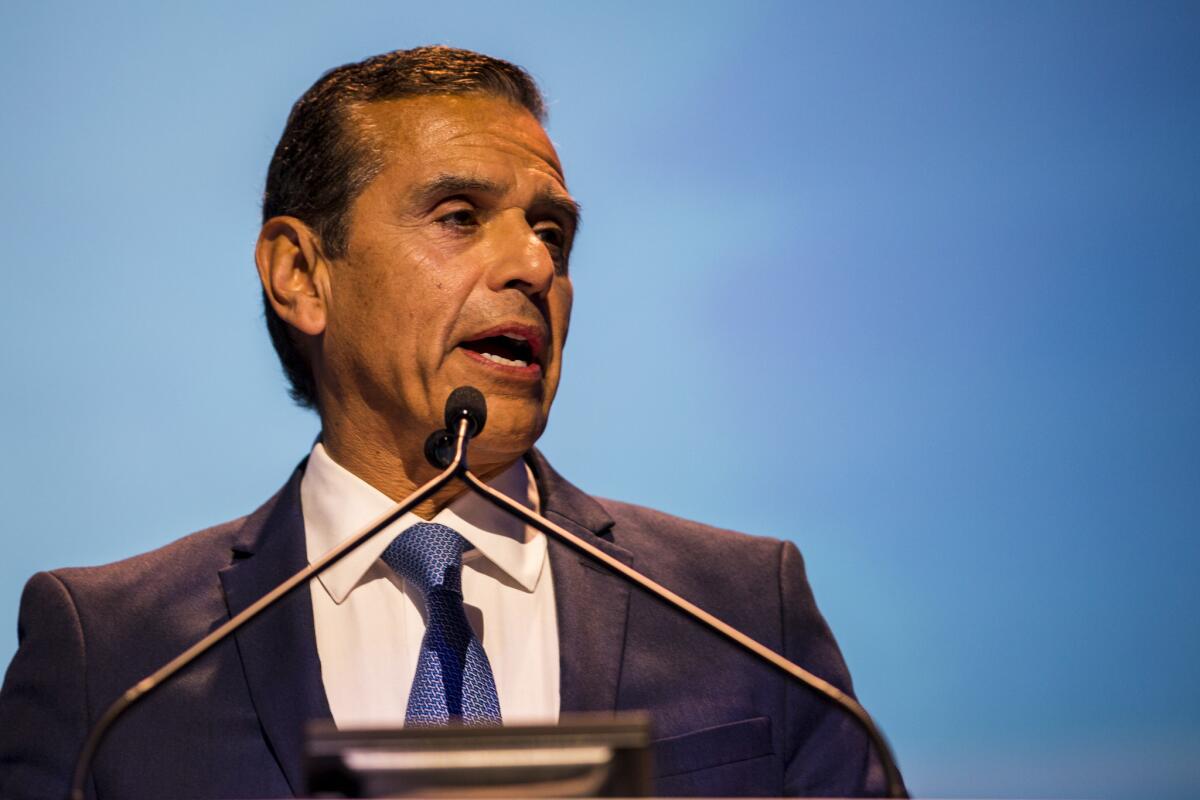
Wealthy Hollywood producer Steve Bing is teaming up with other entertainment bigwigs to host a fundraiser this month for former Los Angeles Mayor Antonio Villaraigosa’s campaign for governor.
The event’s co-hosts include Peter Chernin, producer of the blockbuster movie “Black Panther,” and Paramount Pictures Chairman and CEO Jim Gianopulos. The fundraiser is being held March 14 at the Crossroads restaurant in Los Angeles.
Suggested contributions range from $1,000 to $10,000.
Bing notably bankrolled a proposed ballot measure for an oil extraction tax in 2006, spending $50 million in support of the initiative. The oil industry helped defeat the measure by spending $90 million and warning that any tax increase would lead to higher gasoline prices.
The only Democrat running against a vulnerable California Republican just dropped out of House race
The lone candidate for a U.S House seat the Democrats consider a prime pickup opportunity for the midterms is ending his congressional bid.
The Fresno Bee reported the news Sunday and said Emilio Huerta wrote in an op-ed that he would instead focus on helping other Democrats win election to various levels of government office.
Huerta, a lawyer and son of labor rights icon Dolores Huerta, was attempting to unseat GOP Rep. David Valadao for the second time in November. He lost to Valadao by 13 percentage points in 2016.
For Sacramento, ‘Lady Bird’ offers a vivid portrait of a city that revels in its ‘modest pleasures’
“You clearly love Sacramento,” says the Catholic nun and high school principal as she looks over the college essay written by one of her students.
The teenager, who clearly thinks the city is uncool, shrugs and says she just pays attention to her surroundings.
“Well, it comes across as love,” says the nun. “Don’t you think maybe they are the same thing, love and attention?”
California Politics Podcast: Democrats try out their best pitch to the party faithful
The leading Democratic candidates for governor and U.S. Senate want to draw a sharp contrast with each other, but they don’t want to be seen as throwing the first punch.
On this week’s California Politics Podcast, we take a look at the pitch each candidate made to delegates at the recent California Democratic Party convention in San Diego.
We also discuss the decision by former Rep. Doug Ose to drop out of the race for governor, winnowing the field of Republicans to two prominent hopefuls as candidate filing season comes to a close.
The podcast is available for subscriptions on iTunes and Soundcloud.
Democrat Christina Prejean drops out of race to replace Rep. Darrell Issa
Pelosi optimistic on gun control bill, but doubts a renewed assault weapons ban can pass
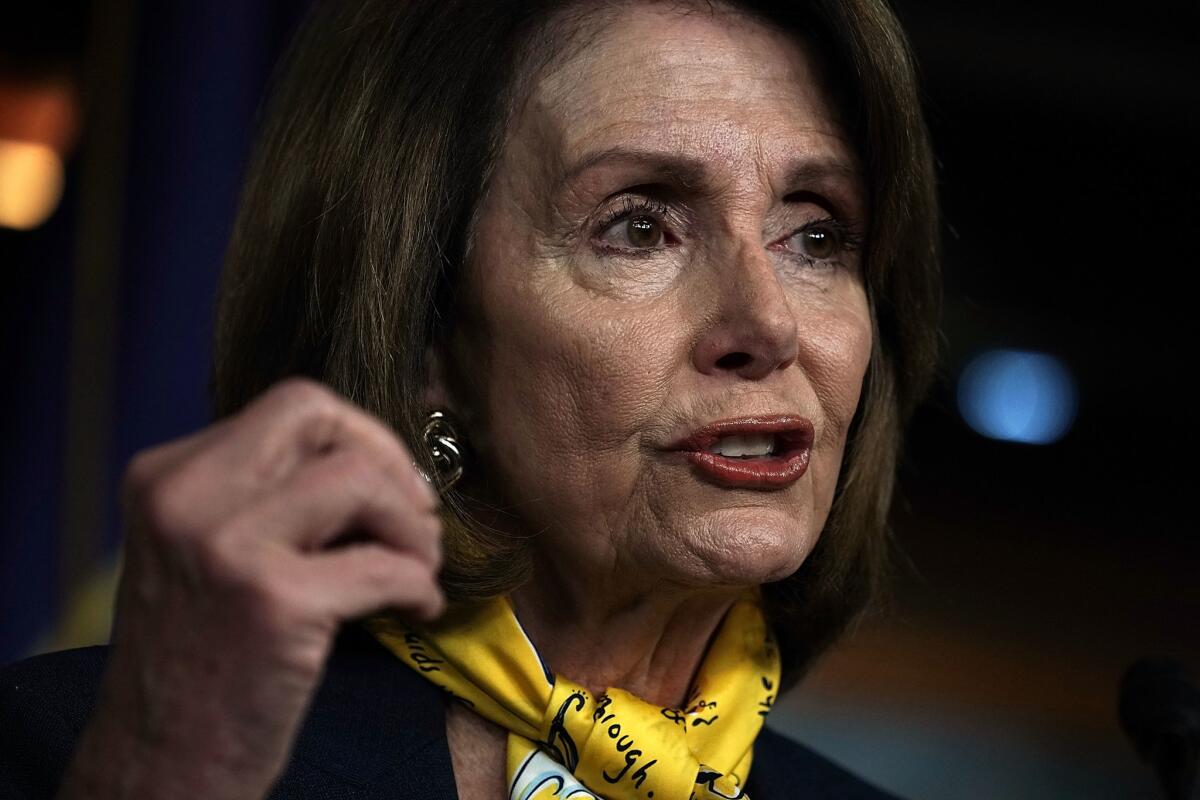
House Minority Leader Nancy Pelosi was optimistic Thursday that the Republican-controlled Congress can pass comprehensive gun legislation, but said she doesn’t expect an assault weapons ban to be part of such a measure.
“It might not be [an] assault weapon ban, but practically anything short of that is what we would expect,” Pelosi (D-San Francisco) said at her weekly news conference. “That might take longer. We need to have the best package we can get done now.”
President Trump seemed to embrace a variety of bipartisan proposals to address gun violence at a White House meeting Wednesday, and urged Republicans to consider adding an assault weapons ban to a popular bipartisan Senate background check bill. The moment left the author of the ban, Sen. Dianne Feinstein, outwardly showing glee. She’s pushed to reinstate the ban since a GOP-controlled Congress let it expire in 2004.
The assault weapons ban is a nonstarter for many Republicans, and including it would make more difficult to pass gun control legislation.
Still, Pelosi said she was encouraged by the content of the White House meeting, adding that the U.S. is at a tipping point on how to address gun violence. Pelosi pointed to a House bill to expand background checks, which reached 200 co-signers Thursday.
“We’ve never had anything like 200 names on a gun safety bill. This is remarkable,” Pelosi said.
The Golden State Warriors skipped the White House. Here’s who they did meet when visiting D.C.
Even though they didn’t visit President Trump at the White House to celebrate their 2017 NBA Finals win, the Golden State Warriors got a face-to-face with two California lawmakers in Washington.
House Minority Leader Nancy Pelosi (D-San Francisco), Reps. Barbara Lee (D-Oakland) and Mike Thompson (D-St. Helena) waited to congratulate the Warriors outside the locker room after their 109-101 victory over the Washington Wizards on Wednesday.
Pelosi wore her Warriors gear (a golden scarf with a map of the UC Berkeley campus) during her weekly news conference at the Capitol to celebrate the win.
It’s customary for NBA teams to visit the White House after winning the finals, but Warriors players who disagree with the president’s politics said they were uncomfortable with making the trip. Trump tweeted that they were no longer invited, one more plot point to his ongoing feuds with California sports teams.
Team members had sought not to politicize their trip and had turned down an offer from Pelosi to come to the Capitol for a ceremony when they were in town to play the Wizards.
Instead of political meetings on this trip, the Warriors organized a trip for local schoolkids to the National Museum of African American History and Culture.
11:30 a.m.: This post was updated to include Rep. Mike Thompson (D-St. Helena) and include a new photo. It was first posted at 9:55 a.m.
Trump threatens to delay border work in California, baffling many
President Trump on Wednesday threatened to delay building border barriers in California until his long-promised wall goes up elsewhere, seemingly slinging another arrow in his running battle with the nation’s most populous state.
“Sections of the Wall that California wants built NOW will not be built until the whole Wall is approved,” Trump declared in a morning message on Twitter.
His threat confused just about everyone involved in the fight over border protection. If the goal was to gain leverage in his fight for the wall, the warning shot seemed oddly aimed: California officials have fought vigorously against Trump’s project, his top priority as a presidential candidate, even going to court to try to block it — an effort that lost a round Tuesday. They haven’t been clamoring for construction of new border fences.
Why the rise of the independent voter is a political myth
For a party halfway in the grave, the news thudded like another shovelful of dirt — thwack! — heaved atop its coffin: The Republican Party may soon slip into third place among registered California voters, trailing Democrats and self-declared independents.
The decline of the GOP — now barely a quarter of the state’s electorate — has been a precipitous one in this formerly deep-red redoubt, a decline all the more striking given the provenance of figures like Earl Warren, Richard Nixon and Ronald Reagan. Between them, they represented California on the national ticket in 8 out of 10 presidential races over a nearly 40-year span.
That said, the latest registration figures weren’t that hot for Democrats, either. True, at 45%, the party enjoys a sizable advantage over Republicans. But that level of support has hardly budged in 20 years, even as the party tightened its vise grip on the state.
$2 billion to help house California’s homeless isn’t being spent — and no one knows when it will be
Nearly two years after California lawmakers approved a $2-billion bond to help finance new housing for the state’s homeless, not a penny has been spent, and it’s unclear when any of the money will be available.
The dollars are tied up in court as a Sacramento attorney challenges the state’s plan to pay off that debt with money California voters approved in 2004 for mental health services. The funding, the attorney contends, should not be diverted from treatment programs, even if the mentally ill benefit from the housing. State housing officials said they don’t know how long the litigation will take to resolve.
The delay is causing deep frustrations. Over the last year, homelessness increased nearly 14% in California and now affects more than 130,000 people in the state — a quarter of the nation’s homeless population. The lack of funds is slowing the amount of housing that can be built, said Ruth Schwartz, co-founder and executive director of the Los Angeles nonprofit Shelter Partnership.
Legislative investigation substantiates harassment claims against former Assemblyman Raul Bocanegra
Three months after Assemblyman Raul Bocanegra resigned amid allegations of sexual harassment, an Assembly investigation has found the Pacoima Democrat likely engaged in “unwanted conduct” toward three subordinate employees while he worked as a legislative staffer.
The investigation’s conclusions, released Wednesday, back up a number of allegations first reported by the Times in November, including claims that, as chief of staff to then-Assemblyman Felipe Fuentes, Bocanegra commented on a younger staffer’s appearance and asked her out on dates, and that he placed a subordinate’s bracelet in his front pants pocket and asked her to retrieve it.
“Regarding this time period from when I was a staffer nearly 10 years, I can only say that I always intended to treat staff fairly and respectfully,” Bocanegra said in a statement.
Feinstein shakes with glee after Trump suggests adding assault weapons ban to background check bill
Sen. Dianne Feinstein shook with glee on Wednesday after President Trump suggested an assault weapons ban should be included in a bipartisan bill to expand background checks on gun sales.
The California Democrat, who became mayor of San Francisco after the shooting deaths of George Moscone and Harvey Milk in 1978, authored the original assault weapons ban in the 1990s and has been pushing to reinstate it since Congress let it expire in 2004.
Amid a nationwide reckoning over the latest mass shooting at a school, Trump said during a White House meeting with lawmakers Wednesday that he wants a comprehensive gun bill, something Congress has repeatedly struggled to get done.
Feinstein, who sat next to Trump, went to the meeting armed with a letter to the president that argued for a new assault weapons ban. Feinstein told Trump it would be possible to include the ban in a bigger bill “if you help.”
Trump then asked Sen. Joe Manchin (D-W.Va.) and Sen. Patrick Toomey (R-Pa.), the authors of the bipartisan background check bill, if an assault weapons ban amendment could be added to their bill, which has repeatedly failed to pass since it was proposed in 2013.
“Are you ready, Joe?” Feinstein said, with a laugh.
Manchin rubbed his eyes. Toomey laughed.
“In my view, she can have an amendment ... and then everybody can vote,” Toomey later told reporters at the Capitol.
Garcetti says major state housing bill doesn’t protect single-family neighborhoods
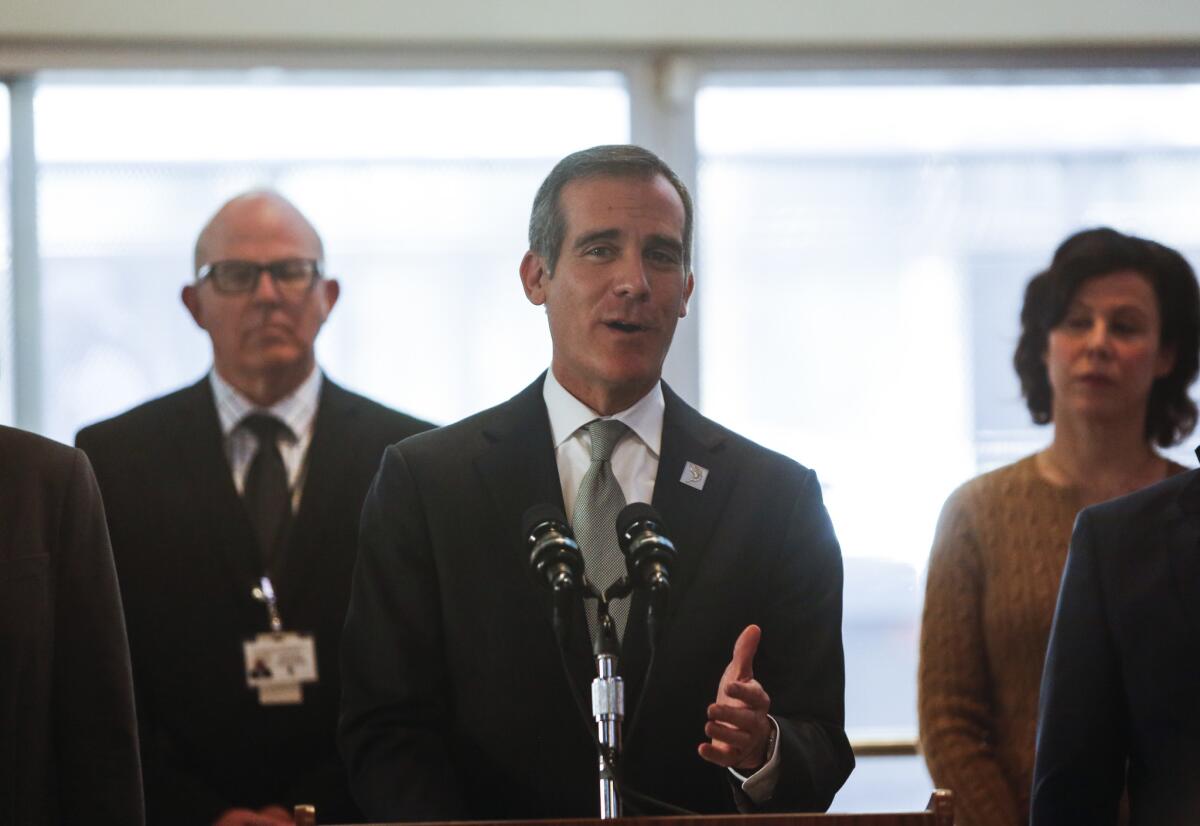
Los Angeles Mayor Eric Garcetti is not on board with high-profile state legislation designed to substantially increase new housing near transit despite pending changes intended to protect renters from displacement.
Garcetti believes Senate Bill 827 from Sen. Scott Wiener (D-San Francisco) doesn’t go far enough to address concerns about housing affordability and the existing character of Los Angeles’ neighborhoods.
“Mayor Garcetti appreciates Sen. Wiener’s bold proposal to help address our housing crisis, and the most recent amendments are encouraging,” Garcetti spokesman Alex Comisar said in a statement. “But this bill is still too blunt for our single-family home areas.”
Comisar said Garcetti was continuing to work with Wiener on further changes.
Wiener’s legislation would increase height limits to a minimum four to eight stories within half a mile of transit stops and major bus routes, as well as eliminate parking requirements. He’s cast the bill as a way to address the state’s housing shortage and the need to increase development near transit to fight climate change. As written, large swaths of Los Angeles, San Francisco and other major cities in California would be affected.
Since Wiener introduced the bill in January, some groups representing low-income renters have criticized the measure as potentially fueling displacement and gentrification. Wiener announced a number of changes to the bill this week aimed at addressing those concerns.
The biggest change will require any developer that displaces tenants to offer units in the new building at the same rent and pay the tenants’ living expenses in the meantime. The bill also will make clear that it won’t override any city or county rules that prohibit the demolition of rent-controlled buildings, or require developers to set aside units in new projects for low-income residents.
“We need to make sure that tenants of all income levels, but particularly low- and moderate-income people, directly and immediately benefit from new, transit-oriented development in their neighborhoods,” Wiener said in a Medium post announcing the changes.
But the amendments, which have yet to be formally incorporated into the bill, have not calmed unease from equity groups. Chanell Fletcher, executive director of Climate Plan, a nonprofit that advocates for sustainable development near transit, called Wiener’s bill “gutsy” and welcomed the changes announced this week. But she thinks the measure should go further, in part by upping required set-asides in new developments for low-income residents.
“We definitely we want to increase density, we want to see more homes near transit, we just want to make sure they’re not for a privileged few,” Fletcher said.
Larry Gross, executive director of the Coalition for Economic Survival, said the bill doesn’t protect tenants in cases where landlords would demolish rent-controlled apartments and replace them with larger, for-sale condominium buildings.
Gross said families who are temporarily relocated and then moved into a new apartment building also would be at risk of “unlimited” rent hikes over the long term, since the new building would not be covered by the city’s rent stabilization ordinance.
“What protections do they have against exorbitant rent increases? None of that is in here,” said Gross, whose group advocates for low-income tenants in Los Angeles.
Wiener’s bill has yet to be scheduled for a committee hearing.
Lawmaker would raise minimum age for buying rifles to 21 in California

California would raise the minimum age for purchasing a rifle and other long guns from 18 to 21 under legislation proposed Wednesday in response to the recent mass shooting at a Florida high school.
The measure by state Sen. Anthony Portantino (D-La Cañada Flintridge) would also ban the purchase of more than one firearm by individuals in any 30-day period.
Portantino proposed the bill after a gunman armed with a semiautomatic rifle killed 17 people at a Parkland, Fla., high school on Feb. 14. The suspect is a 19-year-old who authorities say purchased the weapon legally.
“Like most Americans, I was horrified by recent events in Florida,” Portantino said in a statement. “As a father of a high school sophomore I can’t stop thinking about the unnecessary nightmare that this tragedy caused for the affected families. I feel it is imperative that California leads when Washington refuses to act.”
The sale of handguns in California is limited to those 21 and older, but people 18 and older can purchase long guns.
State law also prohibits people from buying more than one handgun a month, but Portantino is proposing to extend that restriction to long guns as well.
An effort to limit purchases of long guns to one a month failed to make it out of the state Assembly last year after opposition from the National Rifle Assn. and the Firearms Policy Coalition.
Portantino’s proposal was criticized as excessive by Sam Paredes, executive director of Gun Owners of California, who noted 18-year-old Californians are allowed to drive cars, vote and serve in the military.
“We question the logic of this,” Paredes said. “The vast majority of 18- to 21-year-olds who own guns are responsible. They are hunters. They are target shooters. They are participants in programs that allow them to go to college.”
State GOP puts $200,000 into gas tax repeal campaign as study indicates economic benefits from road repairs

The California Republican Party has donated $200,000 to an initiative drive aimed at repealing recent increases to the state gas tax and vehicle fees while the campaign is still struggling to collect enough signatures to qualify a measure for the November ballot.
The infusion of cash to the group Give Voters a Voice comes as supporters of the tax increases in Senate Bill 1 released a study Wednesday that predicted the revenue generated by the levies will significantly boost the state economy.
The initiative drive has collected 550,000 of the 585,000 signatures needed to qualify a constitutional amendment that would not only repeal the taxes but require future increases to be approved by voters.
Although the official deadline for the drive is May 21, Carl DeMaio, a leader of the campaign, said the goal is to file signatures in the next few weeks and he wants to file more than 585,000 signatures in case some are ruled invalid.
“We have our campaign teams out collecting signatures and we absolutely must finish the job soon,” DeMaio said in an email to supporters this week.
The support of the repeal initiative by the state Republican Party and GOP members of Congress is seen by some political strategists as helping Republican candidates in the November election who can highlight the increase in taxes by the Democratic-controlled Legislature.
Senate Bill 1, approved in April, is expected to generate $5.4 billion annually for road and bridge repairs and improvements to mass transit.
An analysis released Wednesday by supporters of SB 1 estimated it will lead to at least $182.6 billion in increased economic activity and benefits for California residents and businesses during the next 10 years, including the support of 68,203 additional jobs each year.
In addition to the wages from the new jobs and increased sales by businesses, the analysis estimates drivers will save an average of $818 million annually in operating costs as they have to make fewer repairs of their vehicles because there are not as many damaging potholes.
The study by the American Road & Transportation Builders Assn. was commissioned by supporters of SB 1 including Transportation California, a coalition of construction industry and labor groups.
“Every driver in every city and county will benefit from road improvements and the economic benefits,” said Roger Dickinson, executive director of Transportation California, in a statement.
New pro-Feinstein super PAC launches today
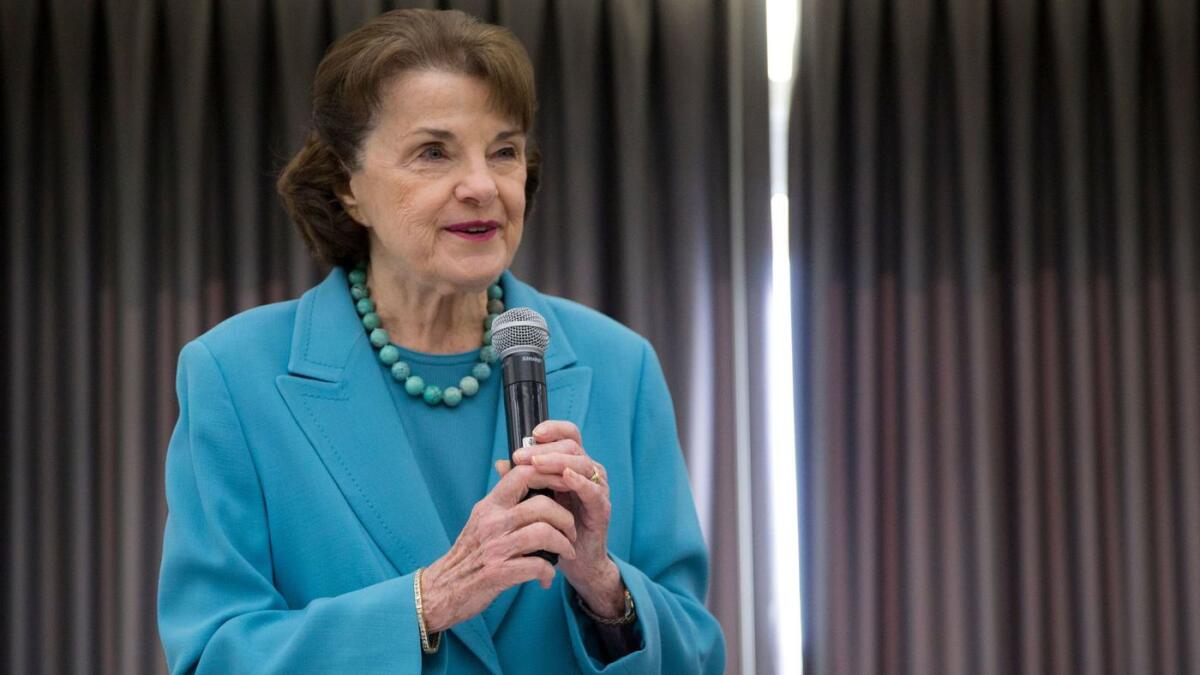
A group of Sen. Dianne Feinstein’s longtime supporters and staff are hoping to remind Californians of the senator’s quarter century of work in Washington with a new super political action committee called “Delivering for California.”
“I want Dianne Feinstein in the crucible,” said former California Democratic Party Chairman Phil Angelides. “I can’t think of anyone who is better equipped for these extraordinary times.”
Angelides, who is also a former state treasurer, and labor rights icon Dolores Huerta will serve as co-chairs.
Several former political staffers for former Sen. Barbara Boxer and Feinstein are spearheading the effort, including Feinstein’s former state director and spokesman Bill Chandler, who will lead the PAC. Chandler said the group expects to raise what it needs for advertising and other media, but would not say how much.
Chandler said the group is looking to help explain why “it’s important to keep Sen. Feinstein in Washington, D.C.”
Feinstein is facing an unexpectedly robust challenge from state Senate leader Kevin de Léon, and neither secured the state party’s endorsement at the California Democratic Party Convention last weekend. Organizers said the super PAC wasn’t created in response to her failure to get the endorsement.
“This is a group that’s come together over the last couple of weeks … and we’re excited to help ensure the senator return to Washington,” Chandler said. “We’re not going to take anything for granted.”
Another pro-Feinstein super PAC, “Fight for California,” was created by San Francisco political consulting firm SCN Strategies in October, but it reported in January that it had raised no money.
Super PACs can raise unlimited contributions but face stricter limits on how much they can donate to a federal campaign. The PAC cannot coordinate with Feinstein’s campaign, which has $9.8 million in the bank.
A similar group was created on behalf of de León in October, shortly after the Los Angeles Democrat launched his bid. It has raised $504.
Angelides said the new super PAC intends to focus on Feinstein rather than criticizing De León for what he called the “wrong challenge at the wrong time against the wrong person.”
Employer of Rep. Linda Sanchez’s husband settled a workplace harassment complaint against him in 2016
The former employer of Rep. Linda Sanchez’s husband, Jim Sullivan, paid $35,000 to settle a 2015 harassment complaint against him, according to the settlement agreement.
Norwich Public Utilities agreed in May 2016 to pay $35,000 to settle a harassment complaint filed by a female utilities employee in September 2015 against Sullivan, who was then chairman of the Connecticut-based utilities commission. A month later, Sullivan resigned from the commission he had served on for 16 years.
“My husband and I have addressed this as a family. It does not affect my views on the need for serious change in how we deal with and put an end to workplace harassment,” Sanchez, who is the vice chairwoman of the House Democratic Caucus, said in a statement Tuesday.
Sanchez of Whittier handled sexual assault claims as a labor attorney before being elected to Congress and is among a handful of female House members who has detailed their experiences with sexual harassment at the Capitol.
The settlement does not specify what kind of harassment Sullivan was accused of beyond that it was “harassment in connection with her employment.”
The settlement says the payment was for “stress anxiety, sleeplessness, depression, and diminished self-esteem.” As part of the settlement, the woman withdrew her complaint from the Connecticut state Commission on Human Rights and Opportunities. The woman’s name has been redacted throughout the four-page document.
The settlement was first reported by the Day, a regional newspaper serving Norwich, Conn., which obtained it last week after a lengthy fight over whether it had to be released under the state’s freedom of information law.
Norwich Mayor Peter Nystrom told the Norwich Bulletin that he was “disgusted” that taxpayers, rather than Sullivan, paid the $35,000 settlement.
Sullivan has his own government and public relations consulting firm, JMS Consulting.
The settlement includes a confidentiality clause that prohibits Sullivan, the utility and his accuser from discussing the complaint with the media. A Norwich Public Utilities spokesman declined to comment, citing the confidentiality clause.
An aide in Sanchez’s office also cited the clause as a reason the eight-term congresswoman could not speak more about the settlement.
Sanchez and Sullivan married in 2009 in the district office of Rep. John Larson (D-Conn.), who introduced them.
Watch live: Rep. Dana Rohrabacher holds a Facebook ‘town hall’ meeting
Rep. Dana Rohrabacher (R-Costa Mesa) announced earlier Tuesday that he planned to hold a “town hall” on Facebook to answer questions from constituents on a video live stream.
Rohrabacher didn’t hold an in-person town hall last year, but did hold at least three telephone town halls in 2017. His spokesman, Ken Grubbs, says they’re conducive to “more thoughtful questions and answers and do not abide organized protests in which constituents cannot communicate with him.”
Hours before the live stream began, Facebook users began posting questions on the event page about sanctuary cities, sober living homes, gun control and the Russia investigation. Rohrabacher said questions would be chosen from the ones posted there.
Watch live:
Orange County Republicans pick a favorite in race to replace Rep. Darrell Issa
Chelsea Handler moderates star-studded panel at Emily’s List event in Beverly Hills
A California congressman is trying to force a vote on a gun background check bill
California Rep. Mike Thompson of St. Helena is trying to get support for a rarely successful procedural move that would force a vote on a bill to require background checks for all gun purchases.
Thompson, a lifelong hunter who leads the Democrats’ Gun Violence Prevention Task Force, introduced the bill with Republican Rep. Peter King of New York in November. It has been sitting in committee since.
The bill would expand the use of the National Instant Criminal Background Check System for guns that are purchased online and at gun shows.
Thompson needs a majority of his House members to sign a petition in order to force the bill to the House floor, meaning he would have to get more than two dozen signatures from Republicans willing to buck their party’s leadership. As of Tuesday morning, it had 91 signatures, including 21 California Democrats.
GOP Rep. Mimi Walters is feeling pretty good after her opponents endured a bruising endorsement fight
In case you missed it, the Democrats running to unseat Republican Rep. Mimi Walters in Orange County had some major drama at the state party convention this weekend. Up for grabs was the official California Democratic Party endorsement, and UC Irvine law professor David Min nabbed it.
As his opponents raced to try to challenge the endorsement, accusations flew that Min and his camp engaged in “intimidating” behavior in the convention halls, while his supporters urged others not to overturn a vote of local activists.
Asked Monday about the fracas, Walters sounded pretty confident.
“It’s going to be interesting to see how it plays out, but I think what they are learning now is they are going to have to run against each other in order to have somebody get into the runoff against me,” Walters said.
“Everything has been a referendum on Donald Trump and on me,” she continued. “They haven’t distinguished themselves from each other, why constituents should vote for them, and they are going to have to learn to do that now.”
Walters added that she’s confident she’ll win, whoever she faces in November. Her district is one of several that Democrats are attempting to flip in the midterm.
Reached by phone, Min called Walters’ words “a lot of bravado” and noted she tried to raise money based off his endorsement. “Rather than having multiple liberals fighting amongst themselves, a single candidate will now have the full weight and financial support of the Democrat machine behind him,” the Walters campaign email read.
Min says he’s not wasting any more time on the weekend’s events. “We’re looking ahead to how we can beat Mimi Walters.”
Having too many Democrats running in key House seats in California has become a pressing concern for top party leaders. The worry is greatest in open-seat races because of the state’s primary that advances the top two vote-getters regardless of party.
The other candidates — UC Irvine law professor Katie Porter, former congressional staffer Kia Hamadanchy and former Obama advisor Brian Forde — haven’t signaled they’re ready to drop out ahead of the June 5 primary.
“The party should not decide before the voters have a chance to decide,” Hamadanchy said on the convention floor Sunday.
Track the most competitive congressional races in California >>
Focus on Devin Nunes prompts group to spend money in his district
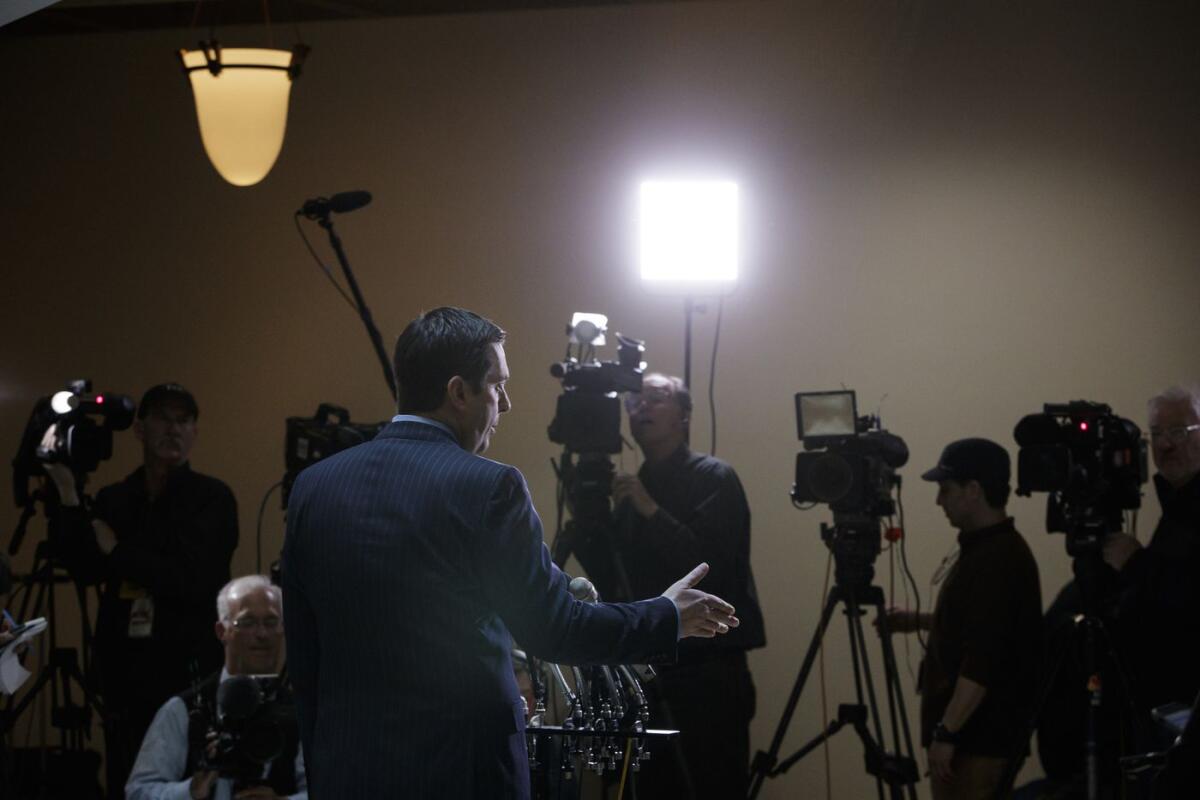
Rep. Devin Nunes’ high-profile role in the House Russia investigation has prompted one state political action committee to focus its attention on his Central Valley seat.
The committee, Red to Blue California, was created to steer money to the seven Republican-held districts in the state that backed Hillary Clinton for president, but Nunes’ Tulare district backed Trump by 10 percentage points.
Committee spokesman Andrew Feldman said the group added Nunes’ seat to its target list because it has received a lot of requests to focus on the race, and fundraising emails that mention the House Select Intelligence Committee chairman’s name bring in three times more donations than emails that don’t. Nunes has several Democratic opponents.
“The encouragement on this has been crazy,” Feldman said. “We’re literally following the energy here.”
A House panel on Saturday released a Democratic rebuttal to Nunes’ controversial memo, which argued that the FBI did not follow proper procedures when it surveilled a former Trump aide during the 2016 campaign.
Schwarzenegger, Kasich to team up in L.A. for group seeking to reform California GOP
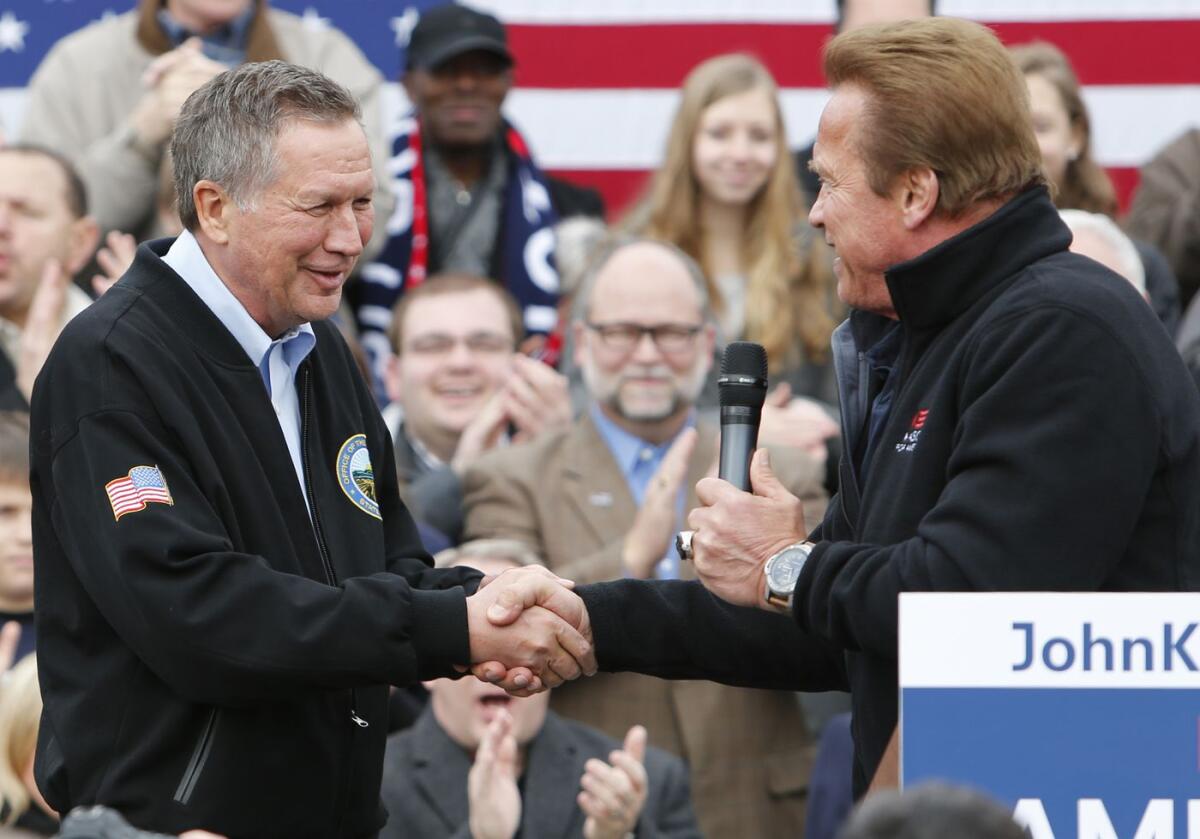
Former Gov. Arnold Schwarzenegger and Ohio Gov. John Kasich will headline an event to debut a new group seeking to reform the California Republican Party.
The pair will deliver speeches and participate in panels on March 21 in Los Angeles at an event for New Way California, a group formed by Assemblyman Chad Mayes (R-Yucca Valley).
“They will be focused on reminding the Republican Party we need them to be successful, but in order to be successful, they need to choose policies and messaging that helps them grow rather than continue to shrink,” said Daniel Ketchell, a spokesman for Schwarzenegger.
The former California governor, one of the last Republicans to win statewide election, has been lamenting the party’s decline for years. In 2007, he famously made a speech about the state party “dying at the box office.”
Since then, the GOP’s share of voter registration in California has slipped to 26%.
Kasich shares Schwarzenegger’s concerns, advisor John Weaver said.
“He believes the Republican Party should be positive and inclusive and expansive, as opposed to the narrow cast that it has been nationally, and in California particularly, for some time,” Weaver said. “What has happened with tone and on immigration clearly over the last decade, longer, has put the party back, and now the party, by and large, is run by people who would rather be leaders in a phone booth and are not inclusive enough and not positive enough to win a statewide election.”
“He has concerns about that because what happens in California is a precursor to what happens nationally,” Weaver said.
Kasich, who has been a fierce critic of President Trump since his unsuccessful presidential bid in 2016, has toured the nation calling for civility and bipartisanship in politics, and is reportedly considering another presidential run.
Schwarzenegger and Kasich are also longtime friends, a relationship forged in part by Schwarzenegger holding his Arnold Classic bodybuilding competition in Ohio. Schwarzenegger previously endorsed and raised money for Kasich, and has called on him to run for president in 2020.
Schwarzenegger sits on the board of Mayes’ political action group, which was formed after the assemblyman was forced from his GOP leadership post for joining with Democrats to extend the state’s cap-and-trade program. The group is expected to organize a super PAC for this year’s elections.
4 p.m.: This post was updated to clarify the nature of the politics around the cap-and-trade program.
California Democrats adapt their political convention to fit the #MeToo moment
Standing in a darkened room, California’s most powerful politicians were peppered with catcalls. “Hey beautiful! Why aren’t you smiling?” “You’re too fine to be walking out here alone!” Those were the mild ones. Many more were sexually explicit or profane.
Welcome to a political convention, #MeToo-style, where the sexual harassment reckoning that continues to rattle the California political world permeated the weekend’s festivities — sometimes overtly, sometimes subtly.
The catcalling came from a traveling art installation sponsored by Planned Parenthood, set up in an exhibition hall of the San Diego Convention Center, part of the California Democrats’ annual confab that attracts thousands of delegates, politicians, lobbyists and activists. Nearly 1,000 men — including the top candidates for governor — walked through the interactive auditory exhibit meant to flip the script on the harassment women endure.
California lawmakers consider new gun control laws in wake of Florida mass shooting
Calling on Washington to pass sensible gun-control laws after the recent mass shooting at a Florida high school, California lawmakers on Monday underscored their own efforts to tighten access to firearms across the state.
New bills this year would extend lost or stolen firearm reporting requirements to all state law enforcement agencies, expand gun violence restraining orders against people who pose a serious risk of harm and prohibit purchases of guns by people who have been convicted of domestic violence. Another would bar city, county and state agencies from giving out gun or ammunition store gift cards in exchange for voluntarily returning old weapons.
“The parents thought that their children were in a safe environment,” Assemblyman Mike A. Gipson (D-Carson) said of the massacre in Parkland. “Those children would come home, do homework and eat dinner. Unfortunately, that was not the case… We are here to say enough is enough.”
Spurred by the outrage over mass shooting, California lawmakers in 2016 sent Gov. Jerry Brown an unprecedented package of gun-control bills, including a ban on the sale of semiautomatic rifles with detachable magazines, background checks for those buying ammunition and new restrictions on homemade firearms.
Assemblyman Rob Bonta (D-Oakland) said President Trump did not give him hope the country would pass new gun laws after he failed to act in the wake of the mass shooting in Las Vegas. But he said California would take the lead when others would not.
“Movie theaters, offices, holiday parties, concerts, night clubs, churches, colleges, high schools, elementary schools — these should all be places where we feel safe and can live our lives free of the threat of mass threat and destruction,” Bonta said. “Our children are screaming at us to do something.”
Doug Ose says he has ‘no interest’ in joining California’s U.S. Senate race
Far-right radio host Michael Savage weighing U.S. Senate bid in California
Far-right radio host and author Michael Savage says that “very important people” have asked him to run for U.S. Senate in California.
“Some very important people have come to me and said ‘Savage, would you like to run as an independent for the U.S. Senate in the state of California against the esteemed Dianne Feinstein?’” Savage said on his show, “The Savage Nation,” Friday. “I’m asking you should I run or not run?”
The 76-year-old who lives in Mill Valley said that the political establishment and the media would come after him if he decides to run.
“I don’t know that I want to put myself through this,” Savage said, following up later with: “There’s a thing called public service. If not me, who?”
Savage, whose legal name is Michael Weiner, is registered in California as a Republican. A phone call to his home on Monday was not answered.
He laid out a potential platform that included lowering California’s tax rate, making ballots only available in English, “no more racism as a way of life in California” and building an extensive wall on the Mexican border.
“I’m not talking about a wall, I’m talking about a citadel,” Savage said.
If Savage were to run, he would be challenging Feinstein as she seeks a fifth full term in a contest that does not have a prominent Republican or independent candidate. Feinstein has a war chest of $9.8 million.
Sarah Silverman to co-host L.A. fundraiser for four congressional candidates

Sarah Silverman is co-hosting a fundraiser at the home of a Hollywood executive Tuesday to benefit four women running for Congress in Southern California.
Emily’s List president Stephanie Schriock is also listed as a host for the event, which is being held at the Hancock Park home of MGM film division president Jonathan Glickman and his wife, writer Christy Callahan.
Tickets start at $250 for guests and go up to $2,700.
Proceeds go to the So Cal Victory Fund, a joint fundraising committee that benefits four women running for hotly contested House seats in L.A. and Orange Counties: Katie Hill, who’s running against GOP Rep. Steve Knight; Mai Khanh Tran, hoping to replace Rep. Ed Royce; Katie Porter, who’s opposing Rep. Mimi Walters; and Sara Jacobs, who’s running for Rep. Darrell Issa’s open seat.
Earlier in the day, Emily’s List is also hosting a star-studded panel on electing more women to office. The panelists include former U.S. Sen. Barbara Boxer and actresses Padma Lakshmi and Constance Wu, and will be moderated by comedian Chelsea Handler.
On Saturday, Boxer will headline a Del Mar fundraiser to benefit Flip the 49th, a group working to elect a Democrat to Issa’s seat.
Conservative commentator and ‘Clueless’ star Stacey Dash running for Congress in California
Conservative commentator Stacey Dash has opened a federal committee to raise money to challenge freshman Rep. Nanette Barragán (D-San Pedro), who represents a Los Angeles district where registered Democrats outnumber Republicans, 61% to 10%.
Dash filed federal paperwork Monday morning declaring her intent to run in the 44th Congressional District as a Republican and set up a campaign committee dubbed “Dash to DC.” The “Clueless” actress has not yet submitted the paperwork with the Los Angeles County Registrar. She has until the March 9 deadline to get herself on the June 5 primary ballot.
Dash’s representatives and the committee treasurer did not respond to calls. Her website shows only the “Dash to DC” logo.
Dash, 51, has been teasing a political run recently on Twitter.
She rose to fame in 1995 as a supporting actress in the cult classic and has been in a number of television shows and films. She is now known as a conservative television commentator. She wrote a book called “There goes my social life: From Clueless to Conservative.”
Dash, who has been described as “Bajan, African American and Mexican,” has called for an end to Black History Month. She was suspended from her job at Fox News after she said President Obama didn’t “give a ...” about terrorism. She left her job at Fox News last year.
She is registered to vote in Rep. Adam Schiff’s West Hollywood district and faces long odds in the 44th Congressional District running as a Republican thanks to the lopsided voter registration. About 51% of voters in the district are Latino, 25% are black, 5% are Asian, according to the California Target Book.
The district is so Democratic that no Republican made it to the general election in 2016. Barragán won a heated race against then-state Sen. Isadore Hall (D-Compton) to replace Rep. Janice Hahn.
Hall entered as a favorite, but Barragán closed the gap, framing herself as a progressive outsider. She attacked Hall, a 15-year veteran of Los Angeles politics, for his ties to special interests in the alcohol and tobacco industries and for benefiting from contributions from petroleum interests.
The campaign became bitter down the stretch. Hall and his allies accused Barragán of making racist attacks against Hall after she said he could have “a black taint on the party with the number of ethical issues” he faced. She apologized and won the seat with 52% of the vote.
In a statement, a Barragán spokesman boasted about her endorsement from the state Democratic Party and said she will “continue to work hard to maintain her widespread support” from the district.
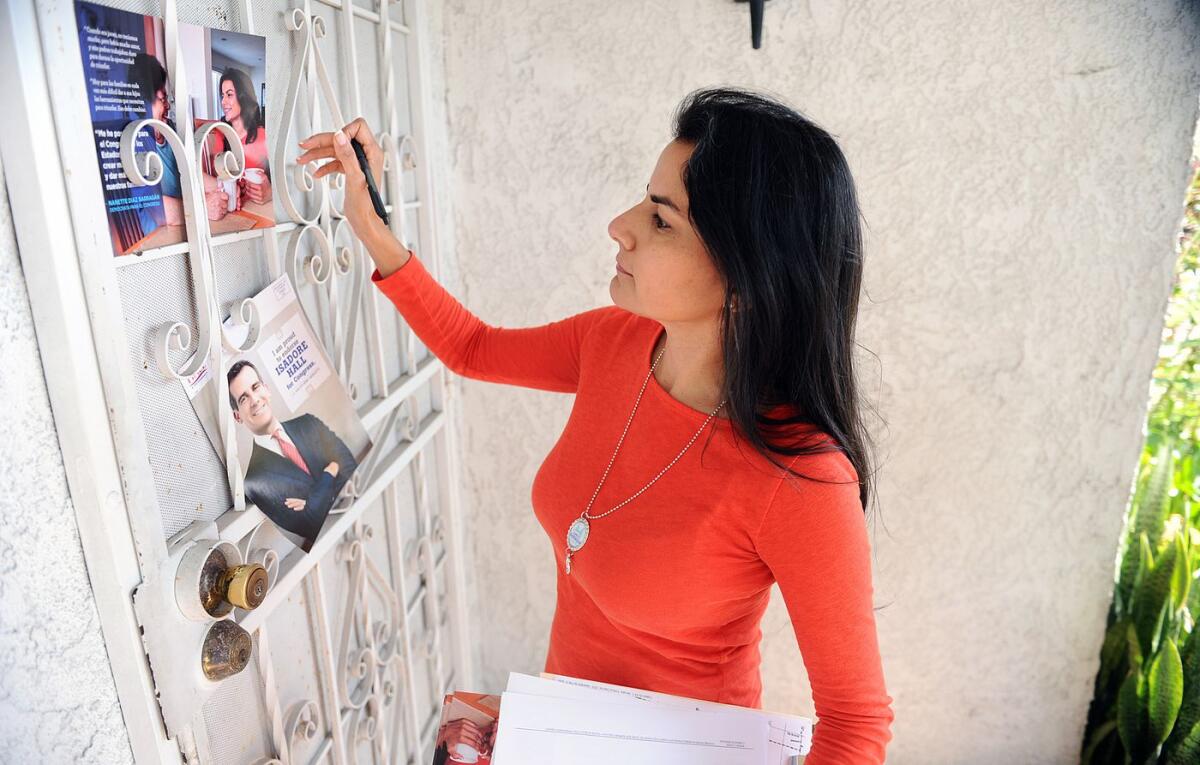
Former GOP Rep. Doug Ose drops out of California governor’s race
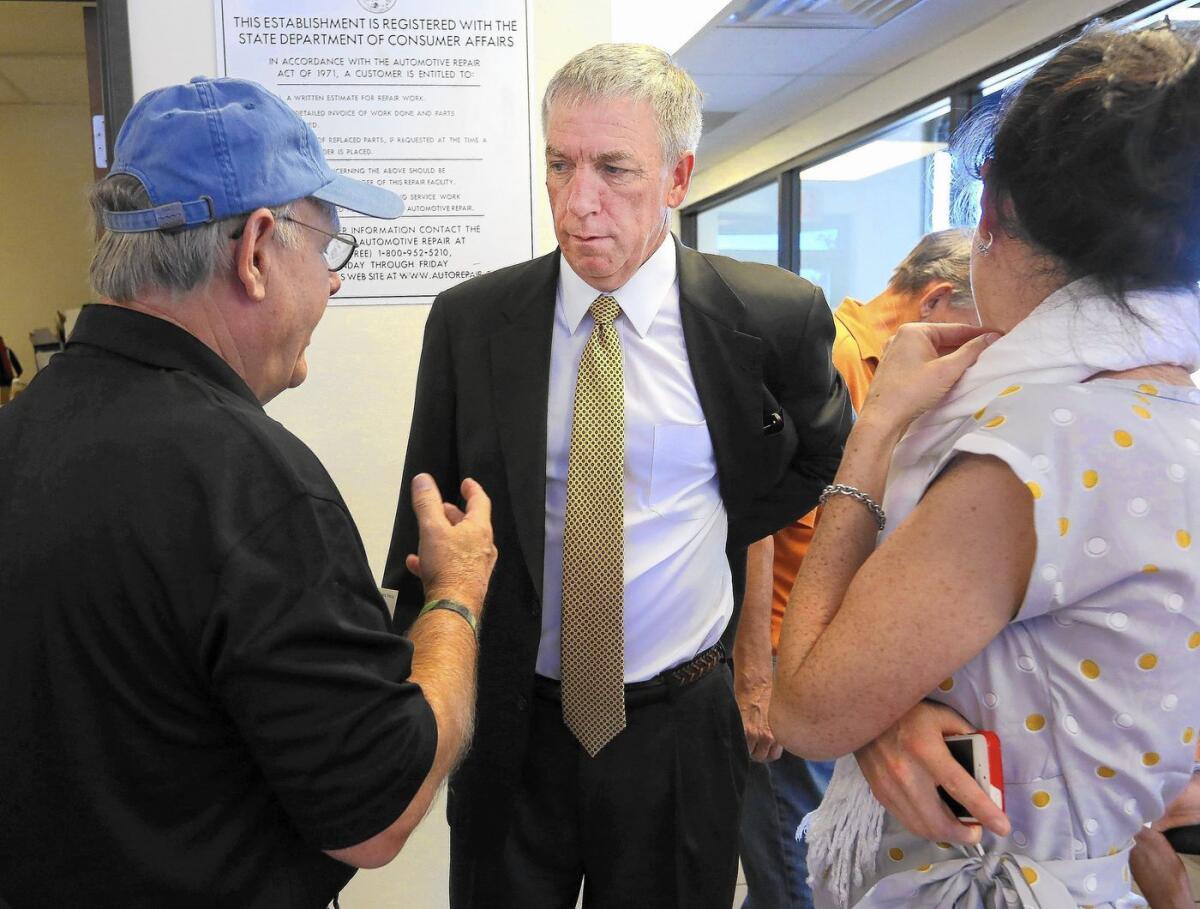
Republican Doug Ose dropped out of the California governor’s race on Monday, according to a spokeswoman for the former congressman.
The move comes as Republicans fear being shut out of the gubernatorial race entirely because the top candidates are all Democrats and no prominent Republicans are running for Senate.
Attempts to reach Ose, who entered the race in early January, were unsuccessful.
Angela Toft, his spokeswoman, said Ose told her Monday morning that he was leaving the race and did not explain why. Toft said she was surprised and was in the midst of canceling 50 events planned for Ose’s campaign.
Jim Brulte, spokesman for the state GOP, said Ose’s decision will mean less splintering of the Republican vote in the June primary, potentially helping the party claim one of the top two spots and move on to the general election. Now there are two main Republican candidates in the race — Assemblyman Travis Allen and businessman John Cox.
“If I had my way another Republican candidate for governor would drop out,” said Brulte, who is a longtime friend of Ose.
“He’s a very experienced public servant and would have been a great governor but I think he got into the campaign a little late,” Brulte said.
Ose, a wealthy real estate developer who represented the Sacramento area in Congress from 1999 to 2005, was in the race for nearly eight weeks and became the second Republican to exit the race. In July, former state lawmaker David Hadley dropped out of the race after a two-week candidacy.
“I guess the other two will have to get out,” Ose told The Times when he announced his candidacy. “I happen to think people are going to respond very positively to my efforts to rebuild the California dream.”
Filings with the secretary of state’s office show that he was struggling to raise the amount of money it takes to campaign in a state as large and expensive as California.
He had raised $136,800 in large donations, nearly two-thirds of which came from himself or his relatives, according to financial disclosures. Ose’s late entry into the race kept him off the stage for the two major gubernatorial debates that have taken place.
Toft said she had urged Ose to run for Senate in late 2017 as he was weighing whether to run for office, but she said Ose did not bring up the Senate race when he told her he was dropping out.
“I thought he would be perfect for that office,” Toft said.
Cox responded to the Ose’s announcement by urging Republican voters to unite behind his campaign.
UPDATES
11:50 a.m.: This post was updated to add reaction from John Cox.
This post was originally published at 11:26 a.m.
California Democrats’ snub of party icon Dianne Feinstein could be a speed bump — or a signal
California Democrats overwhelmingly decided not to endorse Sen. Dianne Feinstein this weekend, an embarrassing rebuke of a party icon who has represented California in the Senate for a quarter-century.
Nearly two-thirds of the party’s delegates voted against backing her campaign for a fifth full term, a reflection of the dissonance between an increasingly liberal state party and the moderation and pragmatism that have been hallmarks of Feinstein’s political career.
The lack of support could simply be a speed bump on Feinstein’s path to reelection in November. But many Democrats gathered in San Diego for their annual convention said they were looking for a flamethrower who would more aggressively confront President Trump and viewed Feinstein as a creature of the nation’s capital who has lost touch with her California roots.
Dave Min gets Democratic endorsement for Congress after intense fight on the convention floor
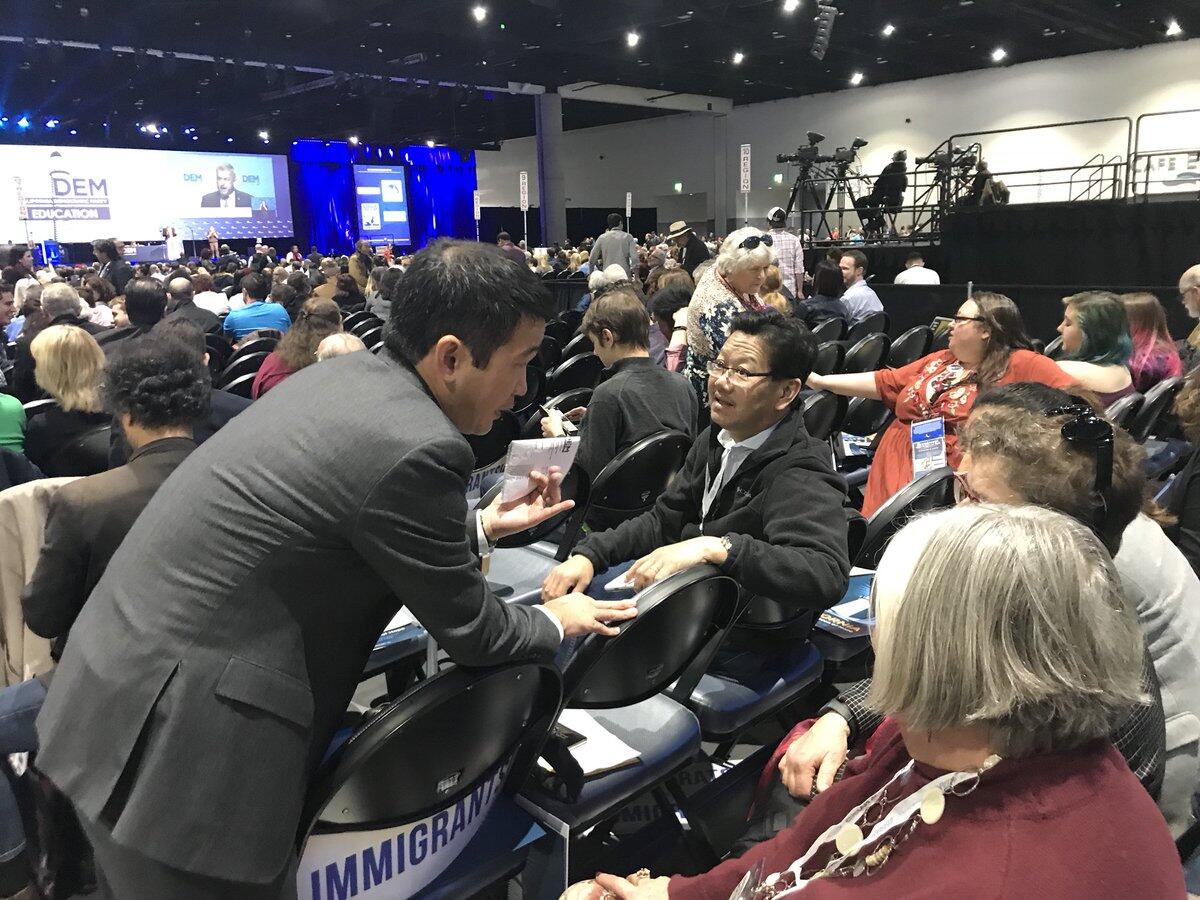
In a moment of high drama, California Democrats on Sunday finalized the list of candidates who will get the official state party blessing. The race that was uncertain as the convention began its final day’s business was the 45th Congressional District.
Dave Min had received 60% of votes in a meeting of Democrats from the district Saturday, but his opponents banded together to try to block his endorsement by gathering more than 300 signatures from convention-goers.
Min campaign supporters followed some of the signature-gatherers around, causing a couple of late-night confrontations in the convention center halls.
The signature effort succeeded and forced Min’s endorsement to a floor fight.
Min worked the room, personally lobbying delegates Sunday as they walked into the day’s general session.
Betty Yee, the state controller, sent delegates a text message encouraging convention-goers to support Min.
State party chair Eric Bauman gave a speech about the need to unite behind a Democrat in competitive House races to avoid the potential of too many candidates splintering the June 5 primary vote.
“We have an overpopulation problem. We don’t have one or two Democrats running in these seats, we have four and five and six and seven,” Bauman said. “We may be aced out of seats that are primed, set and ready for us.”
Then the 45th Congressional District was up. Three speakers for Min’s endorsement and three against it were allowed one minute each.
Fellow candidates Katie Porter, Kia Hamadanchy and Brian Forde all spoke against his endorsement, and accusations flew about Min’s campaign staff intimidating others.
“We know it isn’t just about electing any Democrat,” Porter said. “It’s about electing a Democrat who will act like a Democrat!”
Orange County Democratic Party chair Fran Sdao spoke in favor of Min, saying local Democrats “have been vetting candidates to coalesce behind the strongest one” for months.
“We want to flip this seat; we need the strongest Democratic candidate that we can get,” she said.
Bauman called for a voice vote and ruled that more people backed Min’s endorsement than didn’t. That means Min will have the full force of the California Democratic Party, which could come with financial support and advertising.
The candidates are running against GOP Rep. Mimi Walters of Irvine.
Here’s the list of the other endorsements decided during the convention.
Watch speeches about sensitive subjects during the final California Democratic Party convention business
None of the Democrats running for California attorney general won the party’s endorsement
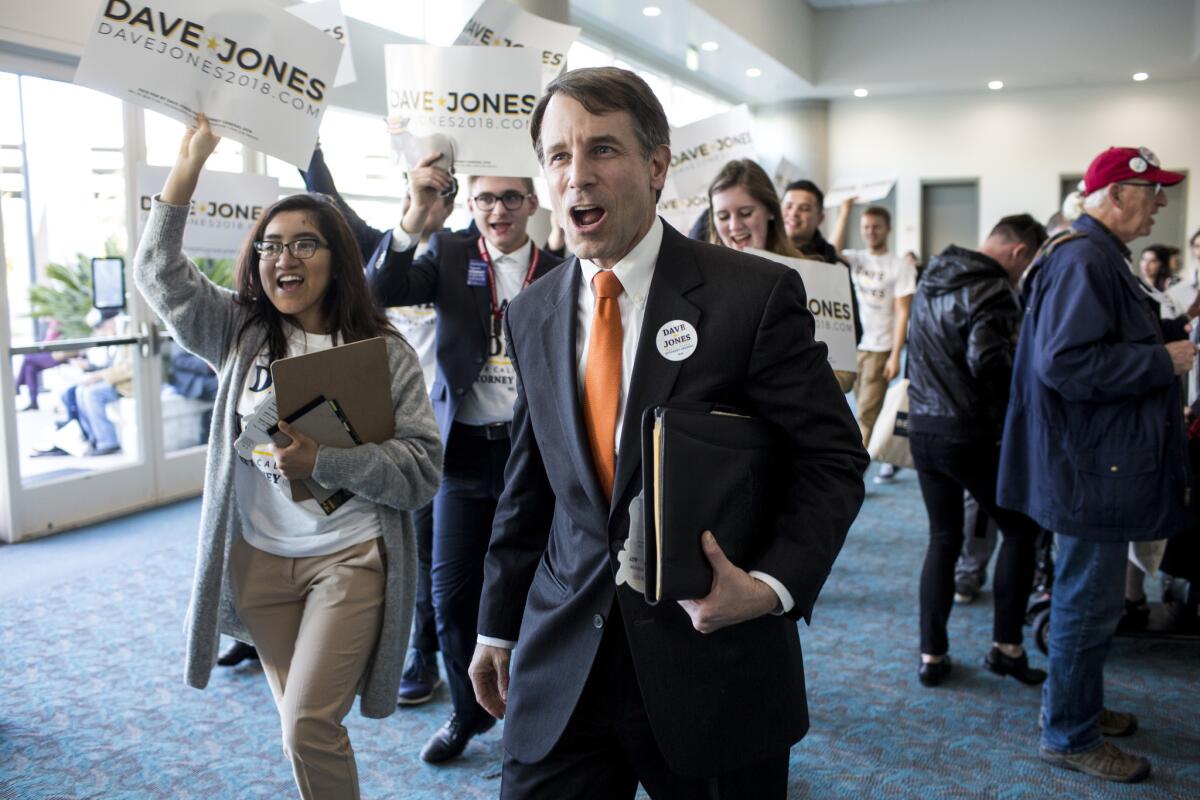
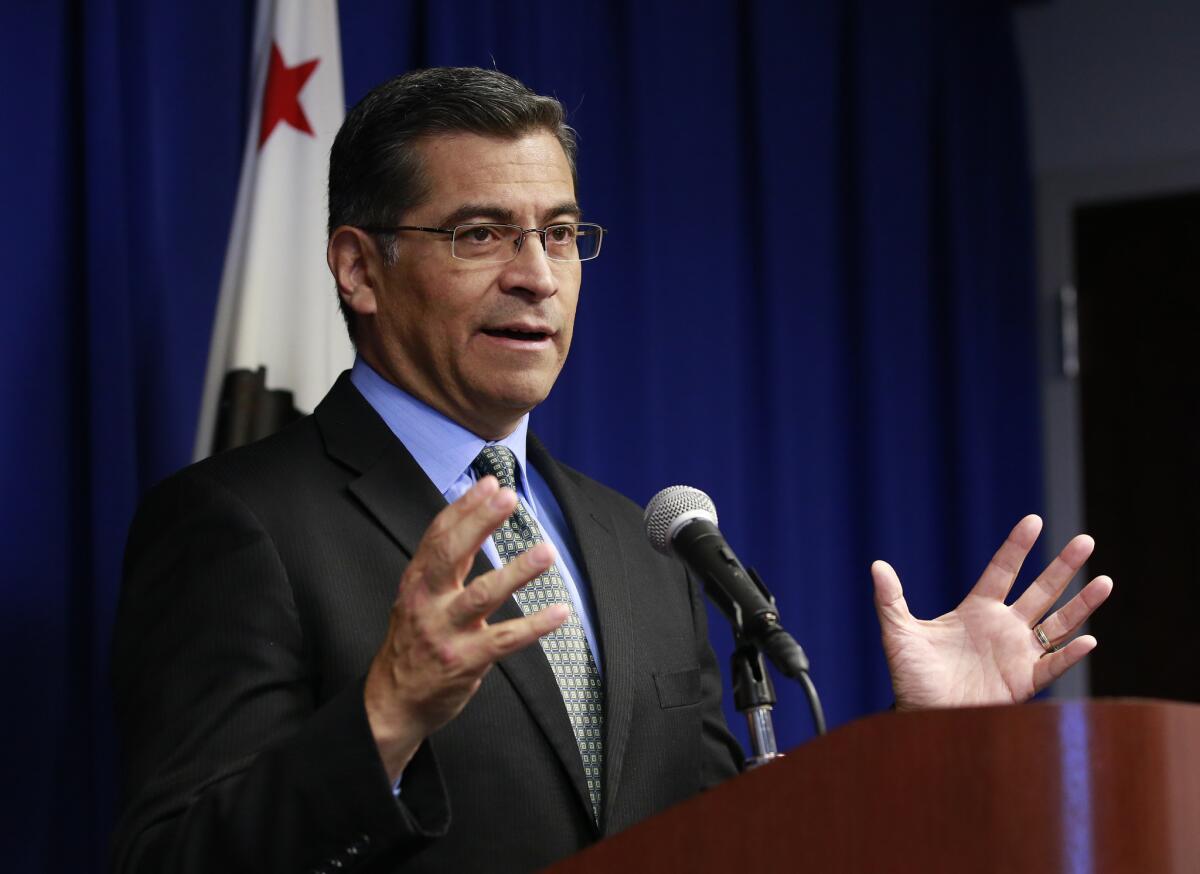
The California Democratic Party on Saturday opted to forgo endorsing either of the two candidates in the running for state attorney general.
Atty. Gen. Xavier Becerra, who was appointed to the post in early 2017 by Gov. Jerry Brown, is running against two-term state Insurance Commissioner Dave Jones to become California’s top law enforcement official.
To win the party endorsement, one of the candidates needed to nab 60% of the votes cast by delegates at the party’s convention in San Diego this weekend. Jones received 56% and Becerra got 42%.
Jones had feverishly lobbied Democratic delegates over the past few weeks, and both candidates courted delegates during the convention.
Becerra, a former congressman from Los Angeles who took over after then-Atty. Gen. Kamala Harris was elected to the U.S. Senate, has been a vocal challenger of Trump administration policies.
California Democratic Party offers no endorsements in U.S. Senate or governor’s races
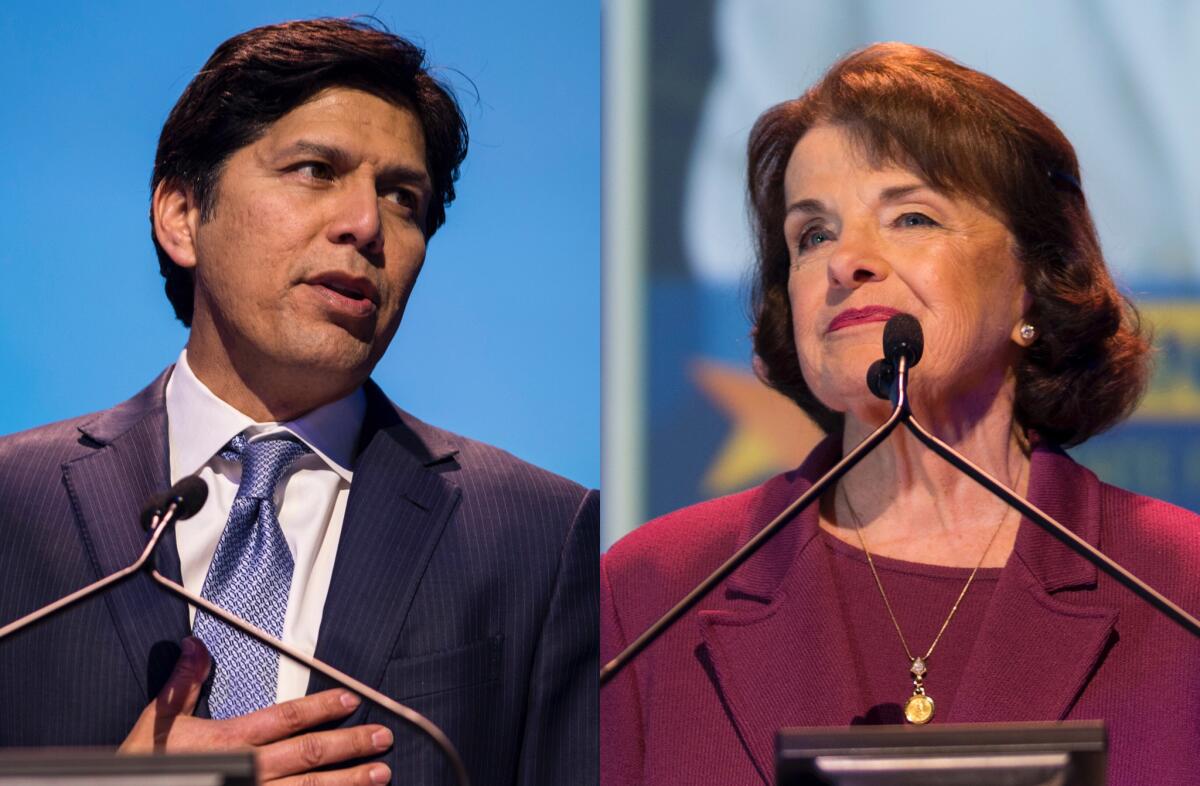
The California Democratic Party decided not to endorse in the U.S. Senate contest on Saturday, an embarrassing rebuke of veteran Sen. Dianne Feinstein.
Feinstein, who has represented California in the Senate for a quarter-century, is facing an insurgent bid by a fellow Democrat, state Senate leader Kevin de León.
He earned nearly 500 more votes than the senator, who was first elected in 1992.
Though De León did not get the endorsement, his success in blocking Feinstein from receiving it shows that his calls for generational change and a more aggressively liberal path have resonated with some of the party’s most passionate activists.
Feinstein has never been a state party glad-hander, while De León has cultivated relationships with the party’s delegates. He still faces a significant challenge in trying to topple Feinstein, who trounces De León in all public polling and fund-raising.
The party also did not endorse a Democrat for California governor, an expected outcome.
Votes cast by delegates at the party’s annual convention Saturday splintered among the four top Democrats in the race: Lt. Gov. Gavin Newsom, state Treasurer John Chiang, former state schools chief Delaine Eastin and former Los Angeles Mayor Antonio Villaraigosa.
A candidate had to capture 60% of the delegates’ votes to win the party’s seal of approval, considered unlikely given the field of politicians in the race with deep ties to the state party.
There were also no endorsements in the races for lieutenant governor or state attorney general.
In the other statewide races, delegates of the state Democratic Party voted to endorse the following party members: incumbent Betty Yee for state controller; state Sen. Ricardo Lara for insurance commissioner; incumbent Alex Padilla for secretary of state; Board of Equalization member Fiona Ma for state treasurer; and Assemblyman Tony Thurmond for state superintendent of public instruction.
Here’s how California’s Democratic Party endorsements are shaping up this weekend in crucial House races
One of the top tasks for California Democrats at the convention is settling whether the state party will endorse in some congressional races. Some of those endorsements were decided at the local level in January.
Some races with crowded fields were left for small meetings among district activists at the convention Saturday.
Races for which Democrats didn’t agree will be decided Sunday on the convention floor. Some campaigns are attempting to challenge initial results. Here’s what we know so far:
Districts where the result is all but certain
- 8th Congressional District: Marge Doyle got the endorsement with 73%. Candidates needed 60%.
- 22nd Congressional District: Andrew Janz got it, with 68%.
- 25th Congressional District: There will be no endorsement, a surprising development given that Bryan Caforio got almost 73% in the January vote. Katie Hill’s campaign did some lobbying and was able to block the endorsement. Caforio got just 52.8% in Saturday’s revote.
42nd Congressional District: Julia Peacock got the endorsement with 84%.
49th Congressional District: No endorsement. Mike Levin won 57% of votes in January, forcing a new vote Saturday. He called for unity among the fractured field of five candidates, reiterating Democrats’ concerns that two Republicans could get through their primary. But he couldn’t convince enough of the local activists.
Races where challenges are underway
4th Congressional District: Jessica Morse got 65.6%, but her opponents are trying to block her endorsement.
45th Congressional District: Dave Min was initially short of the 60% he needed, but a single provisional ballot put him over the top and headed for an endorsement. But his camp can’t yet breathe easy: At least two of his Democratic opponents are trying to force a floor fight to block him.
- 48th Congressional District: Hans Keirstead won with 63% Saturday. Five of his opponents together asked delegates to make “no endorsement.” The other campaigns have a couple dozen volunteers trying to gather the 300 signatures needed to block Keirstead’s endorsement Sunday.
Districts where the dust has already settled
Split votes during the January district meetings led to no endorsements in the 39th Congressional District and 10th Congressional District.
In the 21st Congressional District, Emilio Huerta is so far the only Democrat in the race and received no challenges to his endorsement.
Ammar Campa-Najjar won the endorsement in the 50th Congressional District.
There are still a lot of moving parts with these endorsement fights. For more developments, follow @cmaiduc and @jpanzar on Twitter.
11:55 p.m.: This post was updated with additional details.
Tony Mendoza, who resigned facing expulsion, will run again for his Senate seat without Democratic Party approval
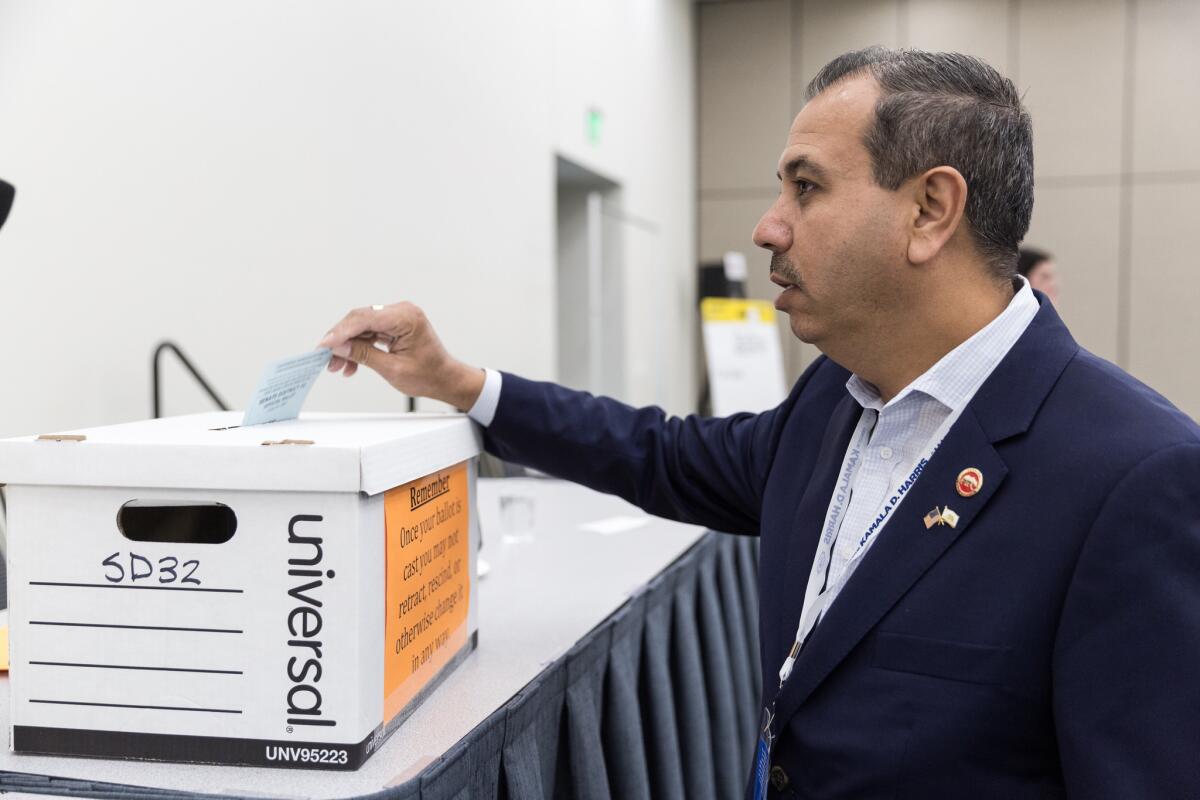
Two days after state Sen. Tony Mendoza resigned his post following a sexual misconduct investigation, he arrived at the California Democratic Party convention to confirm he’ll seek the seat again.
Party activists in his district rebuffed his attempt to win the Democrats’ endorsement by a sizable margin.
The vote on Saturday evening capped off a wild week for the Democrat from Artesia, who faced a potential expulsion vote by his colleagues on Thursday after an independent investigation found it was likely he made unwanted advances toward six women during his tenure as a lawmaker, including four women who worked as his staffers.
Mendoza abruptly resigned before his colleagues could consider disciplinary measures. In his resignation letter, he raised the potential he would continue his 2018 campaign, saying he would “canvass my district to determine my candidacy for the Senate this year.”
On Saturday, Mendoza said that process was continuing. He noted that he filed reelection papers last week and said he intended to follow through.
“We haven’t finished canvassing the district, but our papers are there. We filed it and are ready to go,” Mendoza said.
He declined to address delegates at length Saturday afternoon, instead urging the vote tally to proceed.
Noemi Tungui, a party delegate who does not live in Mendoza’s district, held up a #MeToo sign for most of the proceedings. She said she was baffled that Democrats would consider backing Mendoza after the misconduct allegations, which he denies.
“California is supposed to be a progressive state. We’re supposed to stand up for strong values,” Tungui said. “It makes no sense to me.”
Delegates voted 35-10 to not endorse in that state Senate race, as opposed to backing Mendoza. Among those voting for no endorsement were Assembly Speaker Anthony Rendon (D-Lakewood) and his wife.
Here’s what California’s Democratic candidates for governor said in their endorsement pitches to party delegates
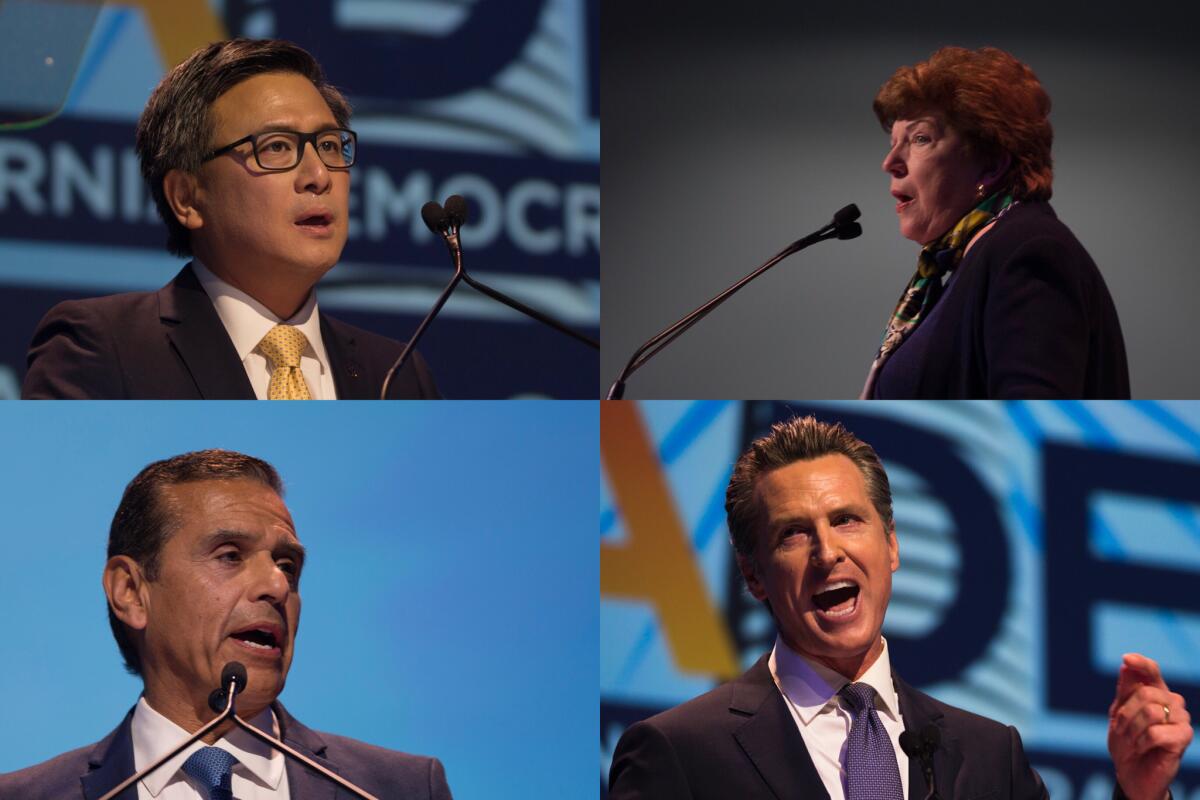
The top Democratic candidates for California governor pitched their cases to a raucous, fractured audience at the state Democratic Party’s convention in San Diego on Saturday, hoping to win the party’s endorsement.
The five-minute speeches hit all the familiar Democratic themes — including plenty of President Trump bashing — and were laced with subtle and not-too-subtle digs at one another.
Here are some of their most interesting comments.
Lt. Gov. Gavin Newsom on his rivals:
“By the way, if these can’t-do Democrats were in charge, we would have never had Medicare and Social Security. So to me, this is about more than a political campaign. It’s about Democrats acting like Democrats in a battle for America’s soul against a president without one.”
Antonio Villaraigosa, in an apparent strike at Newsom, who owned a Tesla:
“We have enough Democrats worrying about Tesla drivers. We need a governor who is thinking every day about how families are going to earn gas money or bus fare to get to work.”
John Chiang, alluding to the affairs two of his rivals had while in office:
“As God as my witness, I will stand up to [Trump] when he seeks to undermine the #MeToo movement. As folks who care about the future of our state, you deserve a governor you can trust; a governor with the credibility to go after sexual harassers.”
Delaine Eastin, on the need for new Democratic leadership in California:
“California is a state overwhelmingly run by Democrats. We are the leaders of the resistance to Trump, but we are also the state with the highest number and percentage of poor and homeless individuals in the county. If Democrats can’t protect and grow the middle class in the richest state, in the richest country on Earth, what good are we?”
Feinstein, De León make their cases to delegates ahead of California Democratic Party endorsement vote
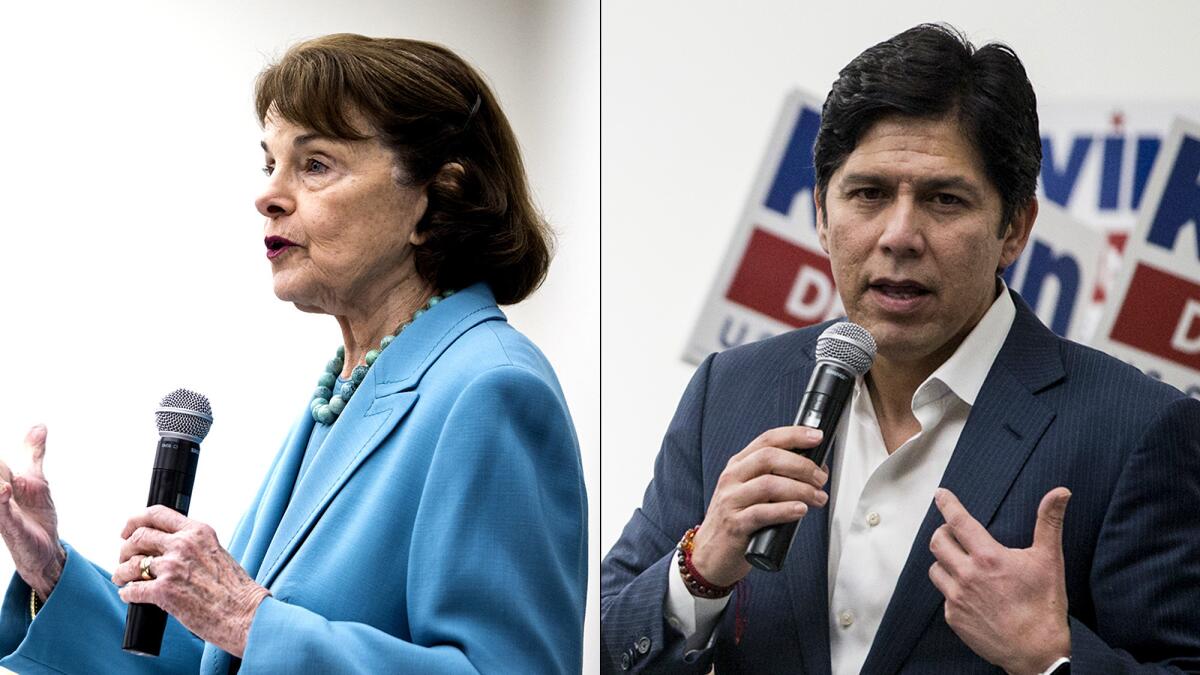
Sen. Dianne Feinstein and rival Kevin de León offered contrasting messages to California Democrats on Saturday, hours before delegates vote on an endorsement in the race.
De León, the state’s Senate leader, repeatedly and forcefully criticized Feinstein, though not by name.
“I’m running for the United States Senate because the days of Democrats biding our time, biting our tongue and triangulating at the margins are over,” De León said. “And I’m running because California’s greatness comes from acts of human audacity, not from congressional seniority.”
De León pointed to controversial statements Feinstein has made about having “patience” with President Trump, as well as votes she has cast over her quarter-century tenure that are unpopular with liberals, such as for the Iraq war and warrantless wiretapping by the federal government.
“Being good sometimes is not good enough,” he said.
Feinstein did not mention De León or his challenge to her campaign. Instead, she castigated Trump and Republicans in Congress.
“These are dangerous times,” she said. “We have a president who launches insulting tweets instead of real solutions, and a Republican House and Senate that reduces taxes for the wealthy that ignores the primary needs of our people.”
She cited last week’s school shooting in Parkland, Fla., to draw attention to her longstanding efforts to crack down on assault weapons. Feinstein noted that she wrote the assault weapons ban that was in place for 10 years before its sunset in 2004. She and 25 colleagues have introduced a new iteration of the legislation.
“Passing it now is my quest, it’s my mission. I am absolutely committed to achieving this,” she said.
Feinstein also pledged to stand for Dreamers and against a $25-billion appropriation for a border wall. She began to speak about Democrats successfully stopping GOP efforts to overturn Obamacare when she exceeded her five-minute time limit and music began playing.
“I guess my time’s up,” she said, laughing.
Maxine Waters is reclaiming her time at the convention and, as usual, not holding back
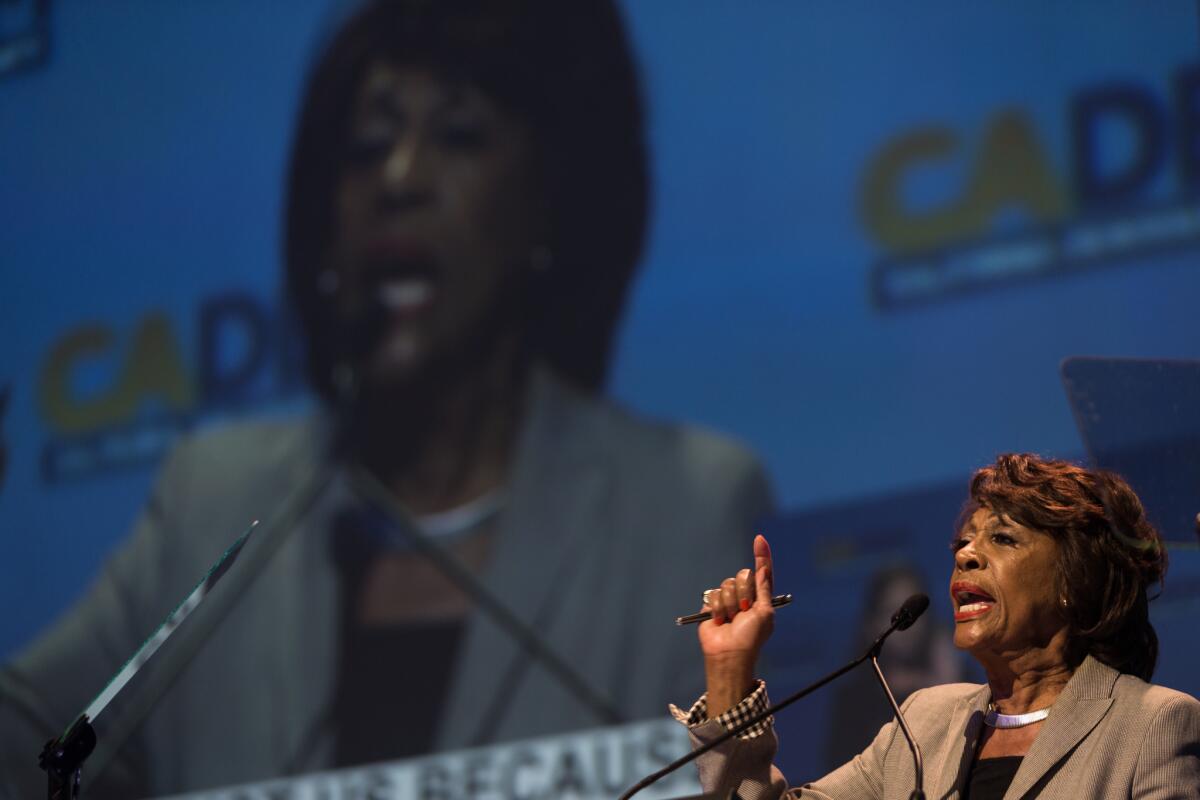
Rep. Maxine Waters knows how to take advantage of a good viral moment when she creates it. More than six months after she cut off Treasury Secretary Steve Mnuchin during a committee hearing and declared she was “reclaiming my time,” she took the stage at general session of the California Democratic Party and repeated the same words.
“I shut down him down,” she told the audience, which cheered and held signs that bore the three-word slogan as she said it three times more: “Reclaiming my time, reclaiming my time, reclaiming my time.”
Blasting Republicans in Congress as “spineless, unpatriotic, intimidated” and calling President Trump “the most unworthy, untrustworthy, duplicitous human being this country has ever witnessed,” Waters held nothing back.
The moment was even more poignant since Waters had her microphone cut off during a meeting at the last California Democratic Party convention. The snafu prompted the African American Caucus to demand an apology.
Speaking about Trump’s tweets directed at North Korea, Waters said: “My gun is bigger than your gun. My rocket is bigger than your rocket … All I see is two heads of state, Donald Trump and Kim Jong Un, both who have questionable agendas and questionable mental health.”
She also touched on a subject many Democrats, including House Minority Leader Nancy Pelosi, have been uncomfortable with: the idea of Trump’s impeachment.
“They said, ‘Don’t use that word … the Republicans will only use it against us,’” Waters said. “Democrats, I don’t care what the Republicans say, I say Impeach 45! Impeach 45!”
Times staff writer Javier Panzar contributed to this report.
Was the next president on stage at Saturday’s California Democratic Party convention?
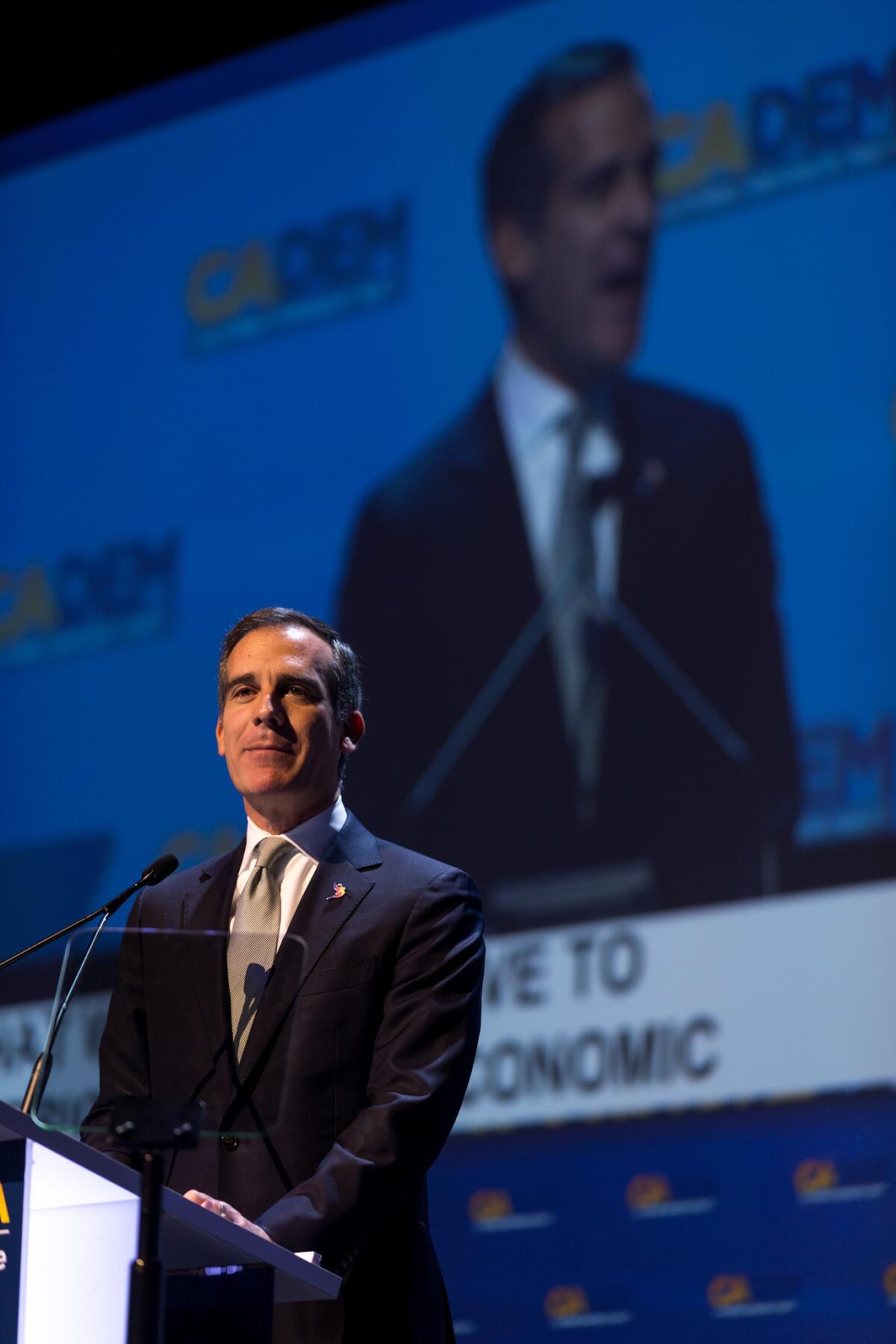
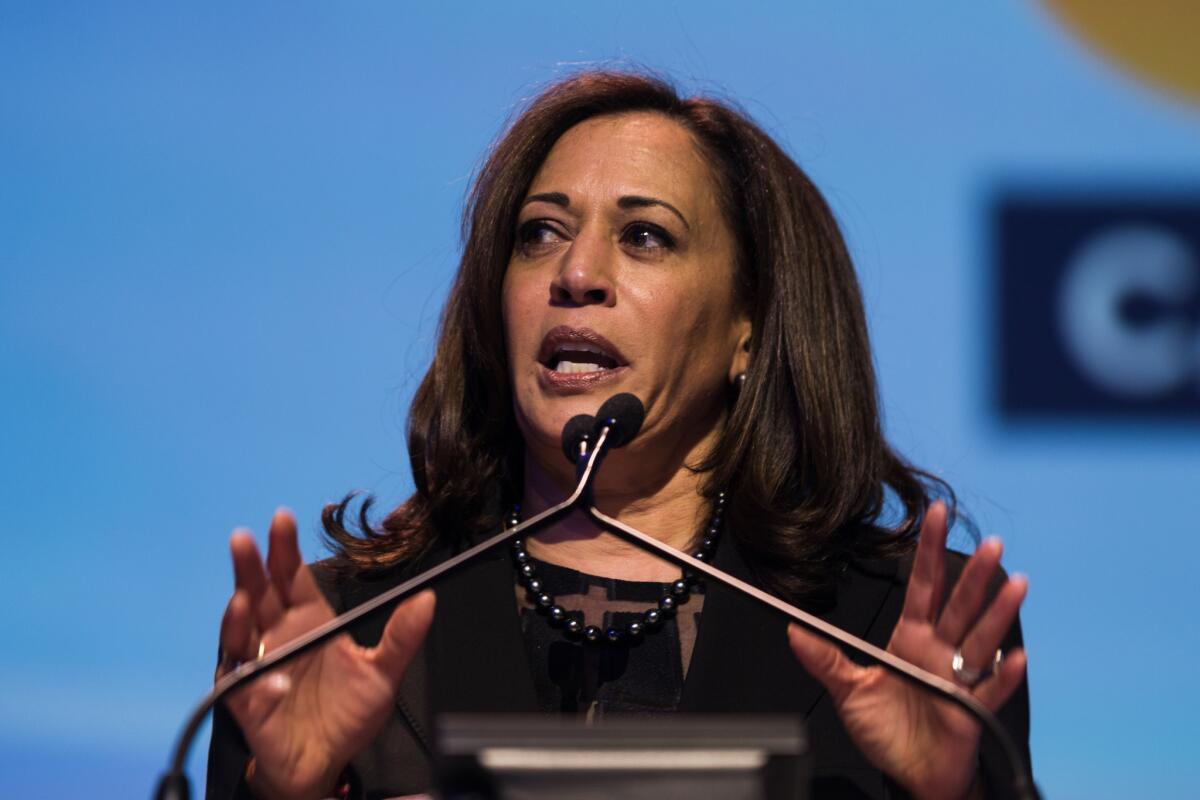
California Democrats got a glimpse Saturday of four up-and-comers considered potential contenders for the White House in 2020, each of whom talked of ending what they described as the dark era of President Trump.
Three were California’s own, Los Angeles Mayor Eric Garcetti, Sen. Kamala Harris and billionaire political activist Tom Steyer. The fourth, Oregon Sen. Jeff Merkley, lives a state away.
Just back from a trip to the early presidential primary state of South Carolina, Garcetti was the first of the group to address the California Democratic Party convention in San Diego.
He started off upbeat, calling California the heart of the nation and the Democratic Party its eventual savior. But his sights quickly turned to Trump and Washington’s Republican leadership.
“Americans are anxious about their jobs, their retirement, their healthcare and their housing,” Garcetti said. “And every American can see how weak and broke our nation’s capital has become.”
Again and again, Garcetti and the others teed off on Trump’s tweeting.
“The two Americas are Washington and the rest of us,” he told a packed ballroom at the San Diego Convention Center. “Those who fix our streets, and those who send us tweets.”
Steyer took the stage and continued his drumbeat for Trump’s impeachment. To cheers from the crowd, the former hedge fund manager announced that his impeachment campaign has collected more than 5 million signatures calling for Trump’s ouster.
“Does anyone think Donald Trump is fit to be the president of the United States,” Steyer asked the audience, prompting shouts of “No!.”
Harris, the former California attorney general who was elected to the Senate in 2016, put the biggest charge into the crowd of Democratic loyalists.
“People ought to feel resentment at this administration and this president who claimed he would fight for the middle class but instead, in a tax bill, handed over one trillion dollars to big corporations,” Harris told the crowd.
In the wake of Trump’s election, Harris said the Democratic Party needs to show it will stand up for all Americans, whether white blue-collar workers in the Rust Belt or black and Latina mothers. All want the same things: good health care for their family, a good job and a secure retirement, she said.
“The vast majority of us have so much more in common than separates us,” Harris said.
Merkley had the biggest challenge on Saturday. He took the stage to polite applause, but never really connected with the thousands of delegates on hand, many of whom wandered around the hall during his speech.
He called for a conversion to 100% renewable energy, protecting union workers and Dreamers, and pushing back against what he called the “Donald Trump hate machine.”
“California, people back in Oregon want to know are you ready to be a big blue beacon of hope for the nation,” he told the crowd. “Let’s rebuild the economy that works for working Americans.”
Watch Maxine Waters, Kamala Harris and candidate speeches at the California Democratic Party convention
State Sen. Tony Mendoza appears at Democratic Party convention days after resigning under threat of expulsion
Nancy Pelosi, Eric Garcetti rally Democrats in race to win back the House
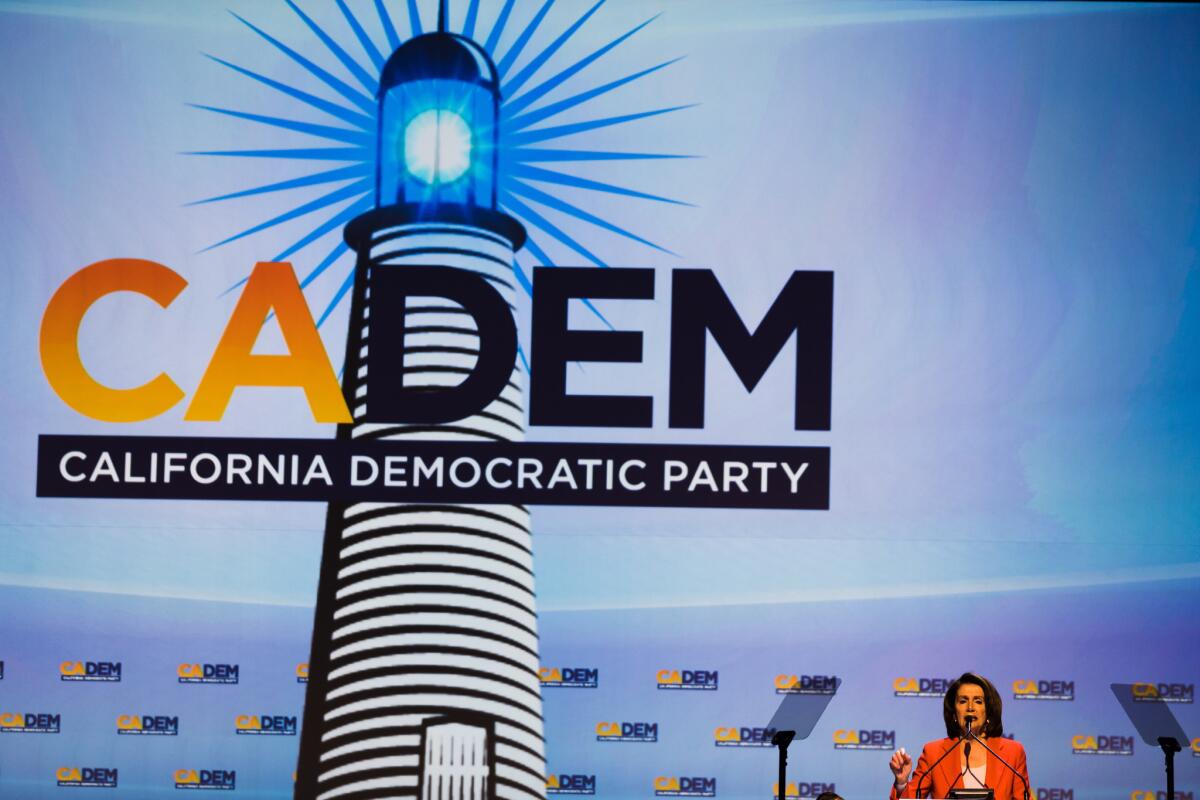
Two of the biggest names in California Democratic circles implored party faithful to fight to win in the midterms as Democrats try to seize back control of the U.S. House.
“Standing in the way of the American Dream are Paul Ryan, Mitch McConnell, Donald Trump and Mike Pence,” said House Minority Leader Nancy Pelosi. “They are in the way of equality of opportunity, public education and debt-free college. They are in the way of affordable healthcare.”
Despite intractability on issues such as gun control, immigration and sexual harassment, “We don’t agonize, we organize!” Pelosi said. The same slogan was plastered on posters that bore her name and likeness imposed on the classic image of Rosie the Riveter.
She added that her party would have to be “strategic” in order to win the 24 seats they need to regain control of the U.S. House. National Democrats have been vexed about the numbers of Democrats running in crucial California races, a factor that could lead to two Republicans on the November ballot.
“California Democrats are ready to win back the House for the Democrats, but also for America. And we’re going to get California Republicans out of the way!” Pelosi said.
Los Angeles Mayor Eric Garcetti told California activists: “We’re not going to give up.”
“We’re going to rise up in Santa Clarita and in San Marcos. ... We’re going to rise up in Fullerton and in Fresno!” Garcetti said. Those are cities that fall in GOP-controlled House districts represented by Reps. Steve Knight, Darrell Issa, Ed Royce and Devin Nunes.
“My fellow Democrats, it’s time to rise up,” he said. “Go win!”
After facing hecklers for his union policy, Villaraigosa picks up United Farm Workers endorsement
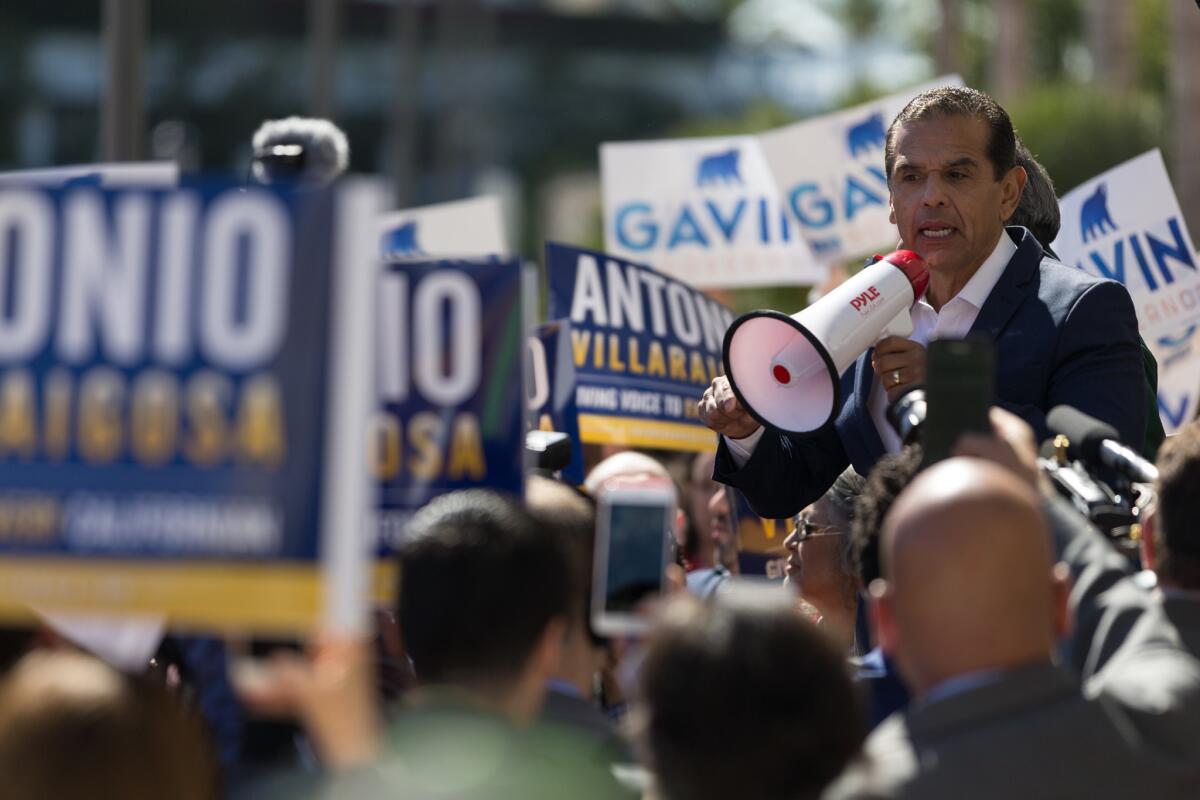
Antonio Villaraigosa was endorsed by the United Farm Workers at the California Democratic Convention on Saturday, a counterpoint to claims the previous night that he is not a friend to labor unions.
“Antonio has consistently stood with and worked with farmworkers in good times and tough times over the course of many years,” said Arturo Rodriguez, president of the union, saying Villaraigosa’s efforts stretched from picketing on behalf of striking grape pickers as a teenager to his days as an elected leader and beyond. “He made calls to legislators, he walked picket lines and he sought to use his influence to help farmworkers get better lives.”
Villaraigosa noted that while he had never worked in the fields, he felt a responsibility to stand up for farmworkers and other Californians to have rewarding work that allows them to provide for their families.
“I’ve stood with you my entire life,” he said, speaking into a bullhorn while addressing scores of red-shirted farmworkers. “I’m not a Johnny-come-lately to the UFW, to the struggle of farmworkers, to the struggles of the working people in this state.”
The workers chanted “Sí, se puede!” — “Yes, you can!” — and followed Villaraigosa as he marched around the San Diego convention center.
It was a warmer response than Villaraigosa received as he addressed the Democrats’ labor caucus the previous night. He was booed and heckled as a “union buster” because of his arc from a labor organizer to a vocal critic of teachers unions while mayor of Los Angeles.
Scenes from the California Democratic Party convention
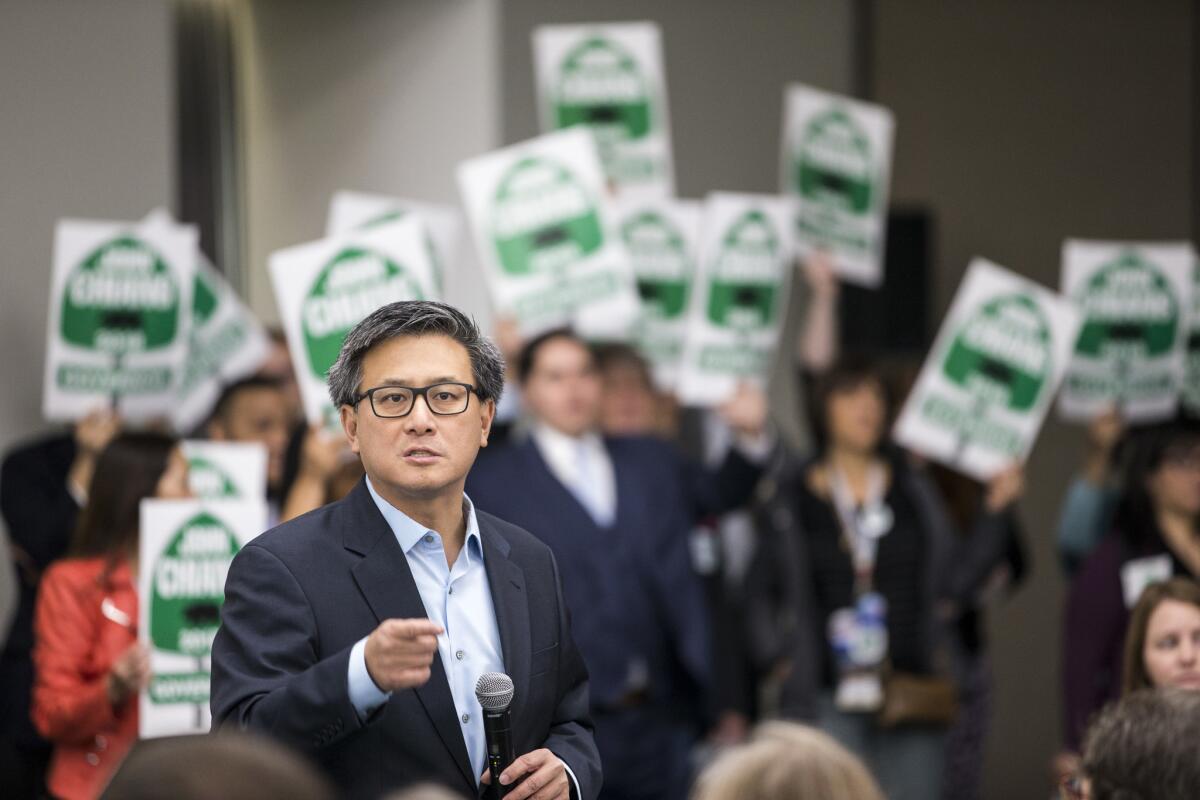
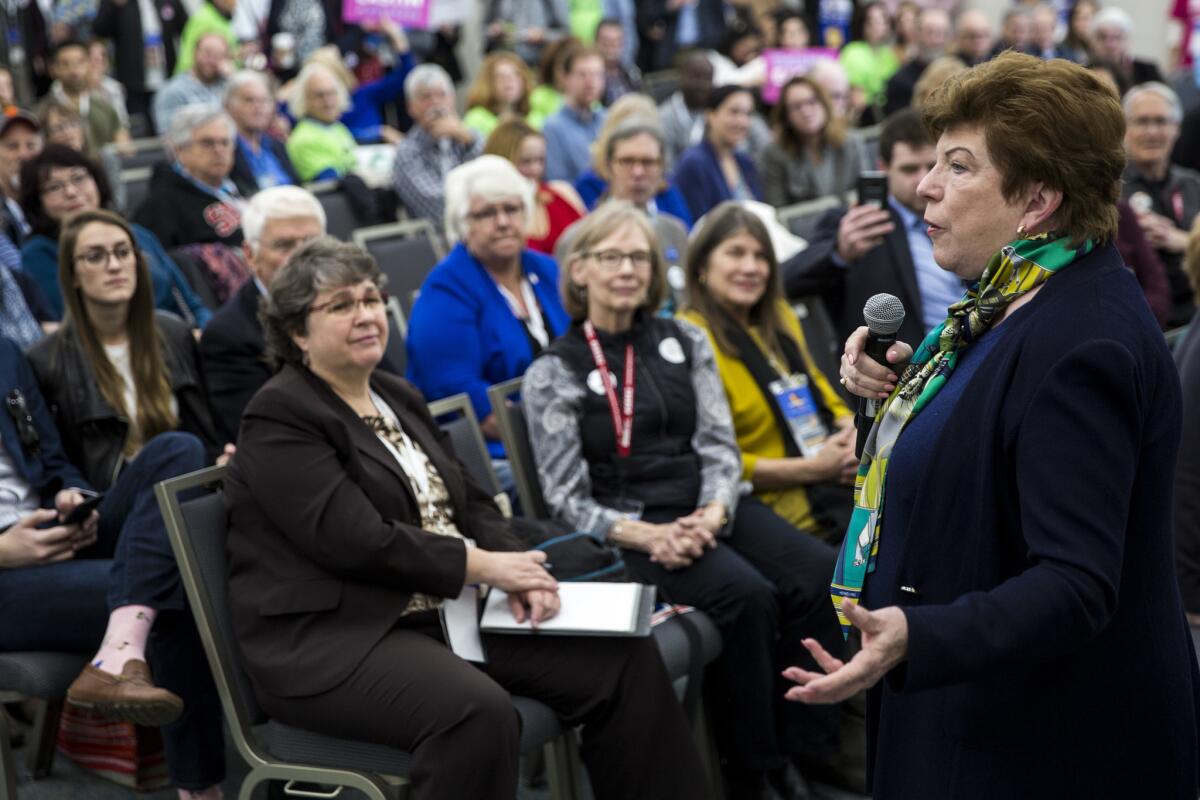
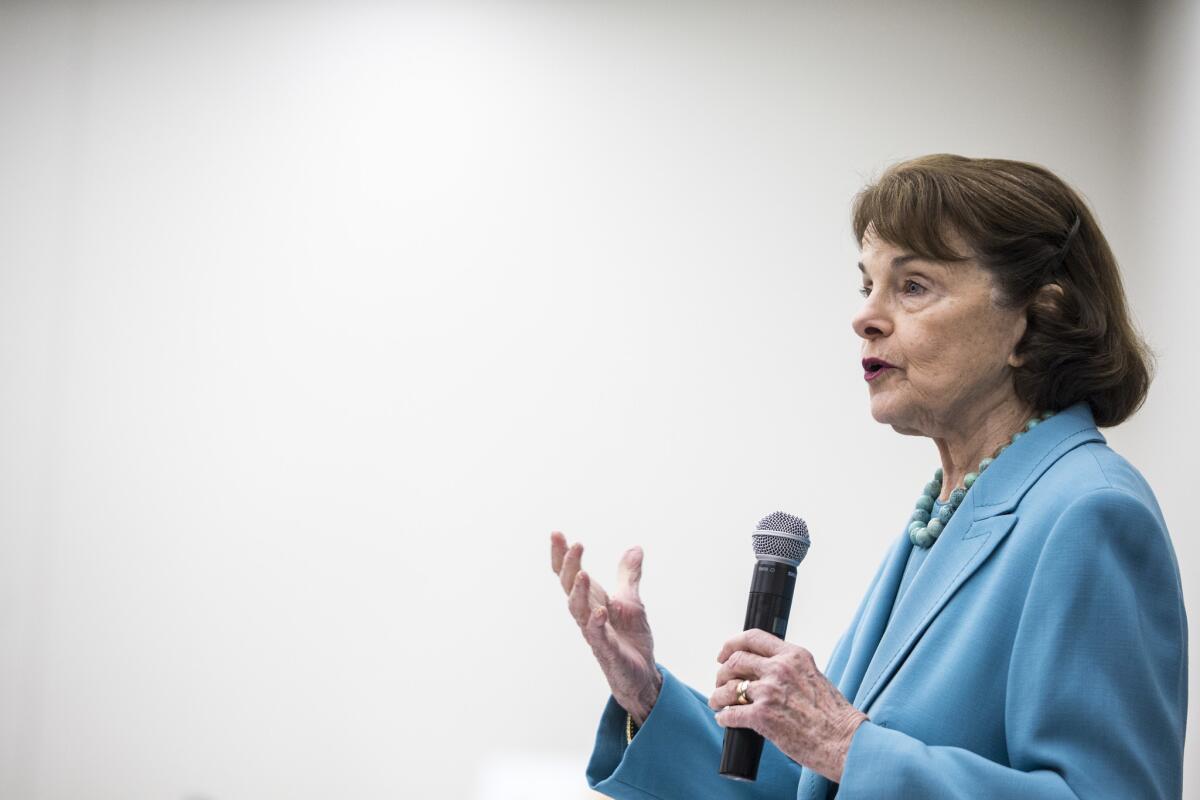
Times photographer Kent Nishimura is in San Diego and capturing the moment.
Check out a gallery of his images and follow him on Twitter.
Tom Steyer: ‘Trump is a clear and present danger’
Trump is a clear and present danger to every single person in this room .… We have to put principles above politics. So we can’t be polite in discussing this corrupt president.
— Tom Steyer, who is pushing for the president’s impeachment, at the California Democratic Party convention
Aliso Canyon activists heckle L.A. Mayor Eric Garcetti
Becerra boasts about how often he’s taken Trump to court
I’ve taken Vladimir Putin’s favorite president to court 28 times.
— Atty. Gen. Xavier Becerra, to delegates at the California Democratic Party convention
Watch Tom Steyer and statewide candidates address the California Democratic Party convention
Sen. Dianne Feinstein serves up scrambled eggs and red meat for Democrats at state party convention
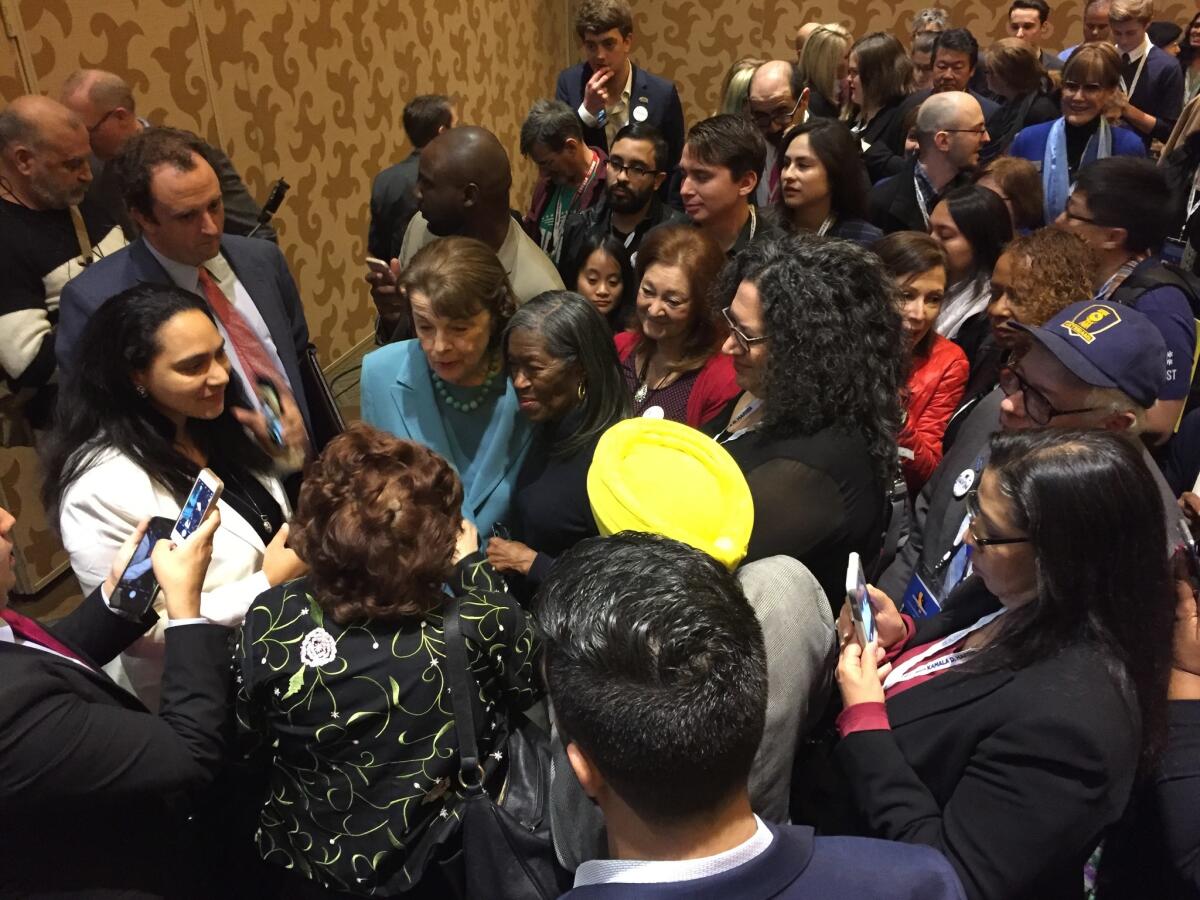
Sen. Dianne Feinstein stuck to core Democratic themes in a speech to delegates at the California Democratic Party convention in San Diego on Saturday, saying President Trump has disgraced the White House, and highlighting her decades-long support for the assault weapons ban and protecting immigrants.
The senator, who is running for her fifth full term, also indirectly touched on the intraparty challenge she faces from state Senate President Pro Tem Kevin de León of Los Angeles.
De León lags far behind in the polls and fundraising but has picked up strong support from labor unions and has at least an outside shot at nabbing the state party’s endorsement this weekend.
Feinstein said sometimes leaders catch heat for taking unpopular stands on the issues.
She pointed to her opposition in the mid-1990s to Proposition 187, a controversial ballot measure to deny public services, such as public education and healthcare, to people who entered the country illegally. Feinstein was running for reelection at the time and, after she announced her opposition, dropped 10 points in the polls.
“It taught me to listen to my ethical compass and do the right thing,” Feinstein told delegates munching on French toast and scrambled eggs at a breakfast she sponsored.
State Sen. Scott Weiner (D-San Francisco), one of the five politicians who warmed up the crowd before Feinstein took the stage, also touched on that theme when describing the advice the senator gave him when he ran for San Francisco supervisor.
“If you’re going to go into politics, don’t do it so that everyone loves you all the time. Because they’re going to love you one day, they’re going to hate you the next day, they’re going to be mad at you,” Weiner said Feinstein told him. “If you’re going into this just so people can like you, you’re in the wrong line of work. Because if everyone loves you, you’re not getting anything done.”
Feinstein received the biggest round of applause when she vowed to renew her push for an assault weapons ban, especially in the wake of the recent deadly mass shooting at Marjory Stoneman Douglas High School in Florida. She authored the original assault weapons ban that was passed in 1994, but Congress did not reauthorize it and the ban expired in 2004.
“I am not going to stop, ladies and gentlemen, until we get these AR-15s off of the street and out of the hands of people who would use them to kill others,” she said.
Noticeably, the lineup of politicians speaking at the Feinstein event were Latino — Los Angeles City Councilman Gil Cedillo, Rep. Norma Torres (D-Pomona) and Assemblywoman Blanca Rubio (D-Baldwin Park).
All praised Feinstein’s record on immigration. Cedillo emphasized her opposition to Proposition 187 and support for so-called Dreamers.
The praise comes a day after Feinstein was criticized during the state party’s Chicano Latino caucus meeting. De León received a warm welcome while Feinstein, who had another commitment, was a no show.
When delegates at that meeting were asked to stand up to show who they supported in the Senate race, most in the room stood when De León’s name was called. Only a handful stood for Feinstein.
California candidates pull out all the stops to woo Democratic delegates for an endorsement
Ingrid Gunnel must feel like the most popular voter in Southern California.
Text messages from Lt. Gov. Gavin Newsom routinely pop up on her cellphone. Insurance Commissioner Dave Jones, who is running for attorney general, penned her a handwritten letter. Entreaties from dozens of other politicians have appeared in her mailbox and Facebook timeline for weeks.
“I get text messages every five minutes, it feels like at least,” said Gunnel, a former elementary school teacher from Glendale who is now a union representative for United Teachers Los Angeles.
California Democrats agree they have too many candidates for Congress. What to do about them is the problem
Democratic activists in Orange County threw an impromptu party with cake, party hats and singing after Republican Rep. Darrell Issa announced he was retiring.
Watch: Feinstein arrives at convention women’s caucus meeting to standing ovation
Sen. Dianne Feinstein is courting Democrats this weekend in hopes of winning the state party’s endorsement for her reelection campaign.
She is trying to beat back a challenge from the left by state Senate President Pro Tem Kevin de León of Los Angeles. It could be a major blow to Feinstein if she fails to land the party nod after representing California in the Senate since 1992.
She received a warm welcome at a women’s caucus meeting Saturday morning.
Tom Steyer has a new Trump impeachment ad
Billionaire environmental activist Tom Steyer plans to unveil a new minute-long television ad Saturday focused on Russian interference in the presidential election as he addresses California Democrats gathering for their annual convention.
The spot, which will air on cable channels nationwide, is part of Steyer’s $40-million effort calling for the impeachment of President Trump.
“What would our founding fathers want us to do about this president,” Steyer asks, standing in front of Independence Hall in Philadelphia, where the Declaration of Independence and the U.S. Constitution were signed.
He notes that the Justice Department just announced the indictment of 13 Russians for interfering in American democracy.
“So what did this president do? Nothing,” Steyer says. “This president has failed his most important responsibility: protecting this country.”
Steyer launched an ad campaign about impeaching Trump in October with television ads, a petition drive and billboards in Times Square in New York. These moves have caught the president’s attention, with Trump calling Steyer “wacky” and “unhinged.”
On Saturday, Steyer plans to tell delegates his effort has collected nearly 5 million signatures. That would be a formidable list for Steyer if he chooses to run for office — perhaps the White House in 2020. The Democratic mega-donor says he is solely focused on the midterms.
L.A. Mayor Eric Garcetti, just back from South Carolina, warms up Democrats at San Diego convention
Feinstein, De León speak before California Democratic Party Labor Caucus
Dave Jones to Kevin de León: ‘It’s like the two armies meeting’
Group that grew out of Kimberly Ellis’ failed campaign pushes for rules changes in California Democratic Party
The signs on the California Nurses Assn. bus go Gavin, Gavin, Gavin
Congressional candidate renounces grandfather’s violent legacy, calls for Middle East peace
An East County congressional candidate is calling for a lasting peace between Palestinians and Israelis after a Tel Aviv newspaper published a story about his grandfather’s ties to a terrorist group.
Ammar Campa-Najjar, 28, of Jamul, says he never met his grandfather, Muhammad Yusuf al-Najjar, who died in 1973.
“To achieve peace, Palestinians and Israelis will have to make the same personal choice I’ve had to make: leave the dark past behind so that the future shines brighter through the eyes of our children” Ammar Campa-Najjar, a Democrat, said in a statement.
Gates plea in Russia investigation centers on meeting with California congressman
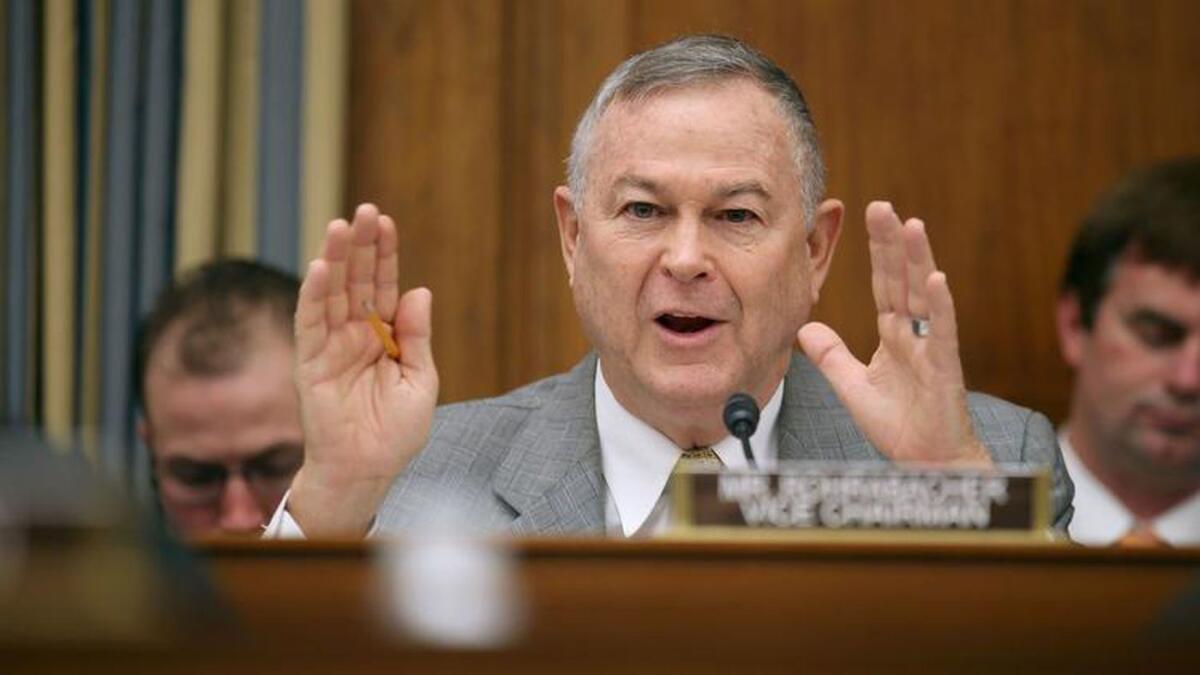
Former Trump campaign aide Richard W. Gates III is expected to plead guilty today to conspiracy and lying about a 2013 Ukraine-related meeting between his former business partner Paul Manafort, a lobbyist and California Rep. Dana Rohrabacher (R-Costa Mesa).
The meeting became public in the summer when Manafort belatedly filed a disclosure form for his work as a foreign agent on behalf of Ukraine. Rohrabacher at the time called it a “nice little dinner” and said that Russia and the Baltic states probably came up, but it wasn’t the focus of their conversation.
Three days after the dinner, Manafort contributed $1,000 to Rohrabacher’s reelection campaign. Gates was Manafort’s deputy on the campaign and continued to serve as a senior advisor through Trump’s inauguration. He is expected to testify against Manafort if his case goes to trial.
Documents show Gates originally told agents the meeting was not about their work for Ukraine, when in fact he and Manafort had reported back to Ukrainian leaders that the meeting with Rohrabacher went well.
Rohrabacher, who is traveling overseas, declined to speak with a Los Angeles Times reporter who reached him on his cellphone. Instead, he directed questions to his spokesman, a change in his usual interaction with the press.
“I can’t do any interviews off the cuff,” he said before hanging up.
Rohrabacher, chairman of the House Foreign Affairs subcommittee on Europe, Eurasia and Emerging Threats, has long been known for encouraging improved relations with Russia. When his name came up in the investigation, he attributed that to his work as the chairman of the subcommittee.
Rohrabacher spokesman Ken Grubbs said the subject of Ukraine only came up “in passing” because the men “reminisced and talked mostly about politics.”
“As the congressman has acknowledged before, the meeting was a dinner with two longtime acquaintances - Manafort and Weber - from back in his White House and early congressional days,” Grubbs said in an email. “It is no secret that Manafort represented [Ukrainian political leader] Viktor Yanukovych’s interests, but as chairman of the relevant European subcommittee, the congressman has listened to all points of view on Ukraine. We may only speculate that Manafort needed to report back to his client that Ukraine was discussed.”
11:40 a.m. This post was updated with response from Rohrabacher’s spokesman.
11:28 a.m.: This post was updated with more detail about the Gates plea.
California Democrats meet for their convention today. Here’s what to look for
Thousands of California Democrats are gathering in San Diego today for their annual convention, where potential presidential contenders will make appearances and state candidates will battle for endorsements from the party faithful in advance of the June primary.
Here’s what you need to know:
How many endorsements are up for grabs?
There are 167 statewide, congressional and legislative races taking place in 2018, but the bulk of these endorsements were effectively decided earlier this year at local endorsing conferences. But two dozen races — all of the statewide offices, plus heated legislative and congressional races — will be decided at the convention. Delegates will vote on Saturday, with some results announced on Saturday night and the remainder confirmed during the general session gathering on Sunday.
Why does the state party’s endorsement matter?
In many of these races, there are multiple Democrats running, and in some cases they risk splitting the vote in open seats and allowing two Republicans to advance past California’s top-two primary. Party leaders are already worried about this, and bylaws prevent them from directly helping candidates who don’t have a party endorsement, making it much harder for them to winnow the field if necessary.
Will the party endorse a candidate for governor or Senate?
All the major Democrats will be in San Diego trying to woo delegates for their support when the party votes on whether to endorse a candidate for governor or senator. The threshold is high — a candidate needs to win 60% of the votes to capture the endorsement.
Delegates also have the option of checking a box declaring no party endorsement granted. No candidate in the governor’s race is expected to receive enough votes to win the endorsement, largely because delegates are split on the four major Democrats in the race, Lt. Gov. Gavin Newsom, former Los Angeles Mayor Antonio Villaraigosa, state Treasurer John Chiang and former state schools chief Delaine Eastin.
Seeking her fifth full term, Sen. Dianne Feinstein would normally be a lock to win the party’s endorsement. But her biggest Democratic challenger, state Senate President Pro Tem Kevin de León, has enough support to possibly prevent that from happening
What are some of the biggest midterm endorsement fights?
There are several GOP-held House districts where the wide field of Democratic candidates means the party endorsement still hasn’t been settled. They include the 4th Congressional District held by Rep. Tom McClintock, Rep. Mimi Walters’ 45th Congressional District in Orange County, and the 48th and 49th districts, held by Rep. Dana Rohrabacher and Darrell Issa, respectively.
We’ll be watching for what could be particularly contentious jockeying for endorsements in the 22nd Congressional District (Rep. Devin Nunes) and the 25th Congressional District (Rep. Steve Knight), where Democratic candidates submitted signatures to pull their opponent’s endorsement off the consent calendar, a much easier path to nabbing the official nod from the California Democratic Party.
How will #MeToo affect the convention?
California Democrats will have a 24-hour hotline to field reports of sexual assault or harassment, and official events will have nods to women’s empowerment in the wake of sexual misconduct controversies in politics and other industries.
What remains to be seen is if the revelry at official and after-hours parties will be dampened by the scandals that have rocked the state Capitol.
Will Maxine Water’s microphone get cut off again?
The mystery around the congresswoman’s mic failure caused angered convention-goers in 2017.
She is set to speak around 2 p.m. Saturday in the general session.
Disney chief Bob Iger hosts fundraiser for Schumer and other Senate Democrats
New attack ad, website launched against Gavin Newsom in California governor’s race
The Asian American Small Business PAC launched a broadside attack against Gavin Newsom’s campaign for governor with a website and digital ad accusing him of having inappropriate relationships and a history of violating the “public trust.”
The ad tries to draw a parallel between Newsom’s past and the “epidemic of sexual misconduct” in the White House and Sacramento.
Titled “You Don’t Know Gavin,” the ad and website focus on the 2005 relationship Newsom had with his then-appointments secretary and the wife of a top aide, Ruby Rippey Gibney, while he was serving as mayor of San Francisco and going through a divorce.
The video also criticizes Newsom for dating a 19-year-old woman in 2006, when he was not married, and for allegations of sexual harassment filed against San Francisco’s general manager of the Recreation and Parks Department while Newsom was mayor.
Though the website states that the campaign is not affiliated with any candidate in the governor’s race, the Asian American Small Business PAC in the past has supported one of Newsom’s Democratic rivals in the governor’s race, state Treasurer John Chiang.
The Newsom campaign quickly seized on that connection, blaming Chiang for the “sleazy” attack.
“This attack from John Chiang’s operation is simply despicable, sleazy and the lowest of low,” Newsom campaign spokesman Nathan Click said. “It degrades the incredibly important conversation being had in our culture in an attempt to breathe life into Chiang’s flailing campaign. If Chiang has any decency, he will immediately renounce it.”
In November, the Chiang campaign launched a anti-Newsom website of its own that critiqued Newsom’s record as mayor, but it took down the site in January. Campaign officials said they would take a different approach.
The new attack on Newsom, the front-runner in the polls and in fundraising, comes at a crucial moment for Chiang. He is one of four top Democrats running, but he consistently polls below Newsom and Antonio Villaraigosa, former mayor of Los Angeles.
Chiang and Newsom, the state’s lieutenant governor, will have the chance to discuss the website this evening when the Democrats running for governor meet on stage for a candidates forum in San Diego.
‘We won’t be bullied’: California Democrats react to Trump’s immigration threats
President Trump on Thursday criticized California officials for how they are dealing with gangs and threatened to pull immigration and border agents out of the state to show just how bad things would be without federal help. California’s Democratic politicians weren’t happy, and swiftly responded.
“This administration has continually put a target on California’s back and we won’t be bullied,” Sen. Kamala Harris said in a statement. “Instead of targeting immigrant communities, this administration should focus their energy and resources on violent criminals and transnational gangs.”
Sen. Dianne Feinstein called it “not only mean spirited but patently false.”
“President Trump today renewed his attacks on California with more insults and threats. The president’s obsession with our state is growing more outrageous by the day,” she said in a statement.
State Senate President Pro Tem Kevin De León, who is running to unseat Feinstein, is the author of the “sanctuary state” bill that limits collaboration between federal immigration officials and local law enforcement agencies. He suggested he’d be happy to see ICE agents leave California.
Others were a bit more moderated in their response.
“Frankly, I do hope President Trump respects more of California’s sovereignty when it comes to immigration, cannabis and other matters that are best left to Californians,” Rep. Lou Correa (D-Santa Ana) said in a statement. “When the federal government fails to act states like California should take the lead. California has passed laws to help its economy and keep its communities safe. Our voters have spoken, President Trump should listen.”
State Atty. Gen. Xavier Becerra said in a statement that state and federal laws work together.
California housing crisis podcast: What mermaids have to do with affordable housing
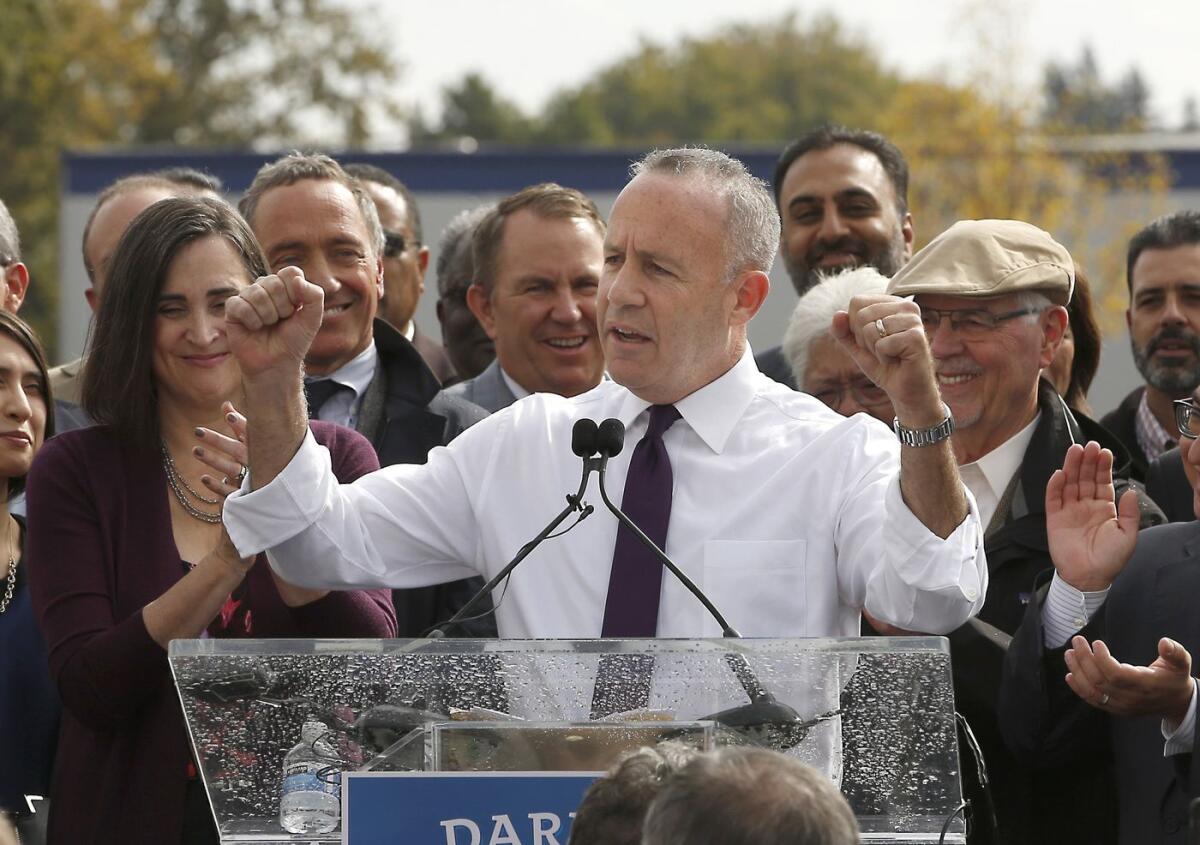
Since 2011, California lawmakers have lamented the demise of redevelopment, a state urban renewal program that provided billions of dollars for low-income housing development. There’s a new proposal in the Legislature now to bring a version of it back.
On this episode of “Gimme Shelter: The California Housing Crisis Pod” we talk about why the program died in the first place — in part because in addition to housing, taxpayer dollars were financing things such as the construction of a downtown Sacramento bar featuring women dressed as mermaids swimming in an aquarium.
Our guest is Sacramento Mayor Darrell Steinberg, who oversaw redevelopment’s dissolution as leader of the state Senate. Steinberg tells us what he’d like to see in a revived program, why homelessness is the most important issue facing California cities and how Sacramento is benefitting from an influx of Bay Area transplants.
“Gimme Shelter,” a biweekly podcast that covers why it’s so expensive to live in California and what the state can do about it, features Liam Dillon, who covers housing affordability issues for the Los Angeles Times’ Sacramento bureau, and Matt Levin, data reporter for CALMatters.
You can subscribe to “Gimme Shelter” on iTunes, Stitcher, Soundcloud, Google Play and Overcast.
California Sen. Tony Mendoza abruptly resigns, was facing expulsion after sexual harassment investigation
Tony Mendoza, a former East Los Angeles elementary school teacher who moved swiftly from local to state government elected offices, resigned from the California Senate Thursday as his colleagues moved to formally expel him after a series of sexual misconduct accusations.
The resignation was the culmination of an almost three-month saga which saw the Democrat stridently deny any improper conduct, all while accusing his fellow legislators of unfair treatment. He becomes the third state legislator to resign in the wake of allegations that have shaken the state Capitol community.
His resignation was announced just minutes before senators were poised to consider a debate on either expelling him or suspending him without pay for the rest of the year.
Under threat of expulsion, state Sen. Tony Mendoza resigns following sexual harassment investigation
Yes, Duncan Hunter was there for some of the improper charges he has repaid to his campaign
Rep. Duncan Hunter, R-Alpine, is suggesting to the national media that questionable expenses of his campaign funds took place in California while he was in Washington, D.C., doing the people’s business.
But a review of campaign records and social media by The San Diego Union-Tribune shows that Hunter was regularly present, with his family, when improper campaign spending happened.
A family rafting trip in Boise, Idaho, in 2015. A trip to Disneyland the same year. An Irish dance competition at the Arizona Grand Resort & Spa in 2016.
California Senate leader introduces resolution to expel Sen. Tony Mendoza
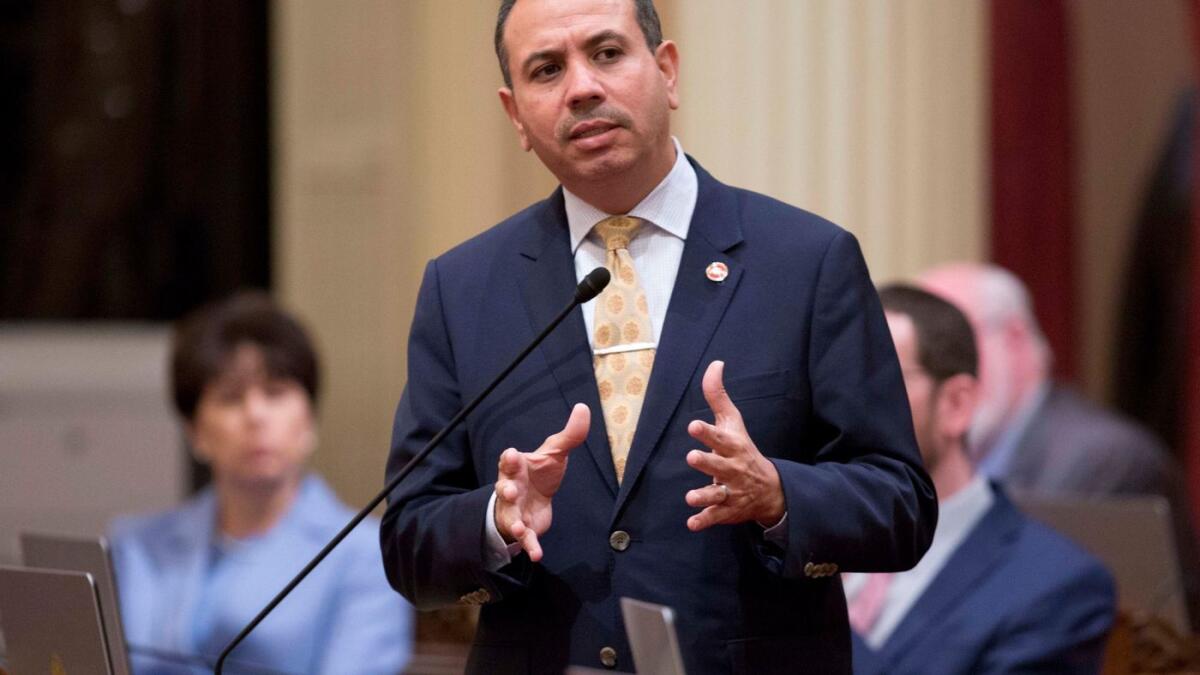
State Sen. Tony Mendoza, who faces increasing scrutiny over allegations of inappropriate contact with female staffers, could face a formal expulsion vote on Thursday under a resolution introduced late Wednesday night.
The resolution was authored by Senate President Pro Tem Kevin de León (D-Los Angeles). Last week, Senate leaders acknowledged an expulsion of Mendoza was a possibility.
No member of the California Legislature has been expelled since four senators were removed from office in 1905. Senators met in private caucus meetings on Wednesday to consider the fate of Mendoza, an Artesia Democrat who faces accusations of inappropriate behavior with six women during an eight-year period ending in 2017.
On Tuesday, the Senate released a report conducted by outside investigators that found Mendoza “more likely than not” engaged in “unwanted flirtatious or sexually suggestive behavior” with the women. Mendoza has denied the allegations.
“Following the completion of the independent investigation substantiating allegations Sen. Mendoza engaged in a pattern of inappropriate conduct with young female members of his staff, during which Sen. Mendoza was afforded ample opportunity to offer rebuttal evidence to contest the allegations against him with his attorney present, the chair of the rules committee introduced a resolution this evening to expel Senator Mendoza,” said a source close to Senate leadership who asked for anonymity to speak freely on the matter. “The resolution is expected to be considered in Senate Rules Committee tomorrow morning.”
In a letter sent to senators on Wednesday, Mendoza said he was “immensely sorry” if he had made anyone uncomfortable, though he renewed earlier complaints about the Senate’s investigation process.
Expulsion is not the only disciplinary tool at the senators’ disposal. Members can also consider suspending Mendoza with or without pay, or censuring him. All of the punishments are exceedingly rare. An unpaid suspension was made possible by voters through a 2016 ballot measure. The last censure of a California state legislator was in 1982.
Senate Resolution 85 says that the upper house “is committed to providing a workplace free of sexual harassment and, in furtherance of that commitment, has adopted a ‘zero tolerance’ policy regarding harassment.”
Mendoza’s colleagues could discipline him Thursday
Formal discipline against state Sen. Tony Mendoza could come on Thursday, after lawmakers privately discussed the findings of a sexual misconduct investigation and Mendoza lobbied colleagues with a last-minute letter defending his actions.
The investigation this week found that Mendoza “more likely than not” behaved in a flirtatious or sexually suggestive manner toward staffers.
Members of the Senate Democratic caucus met Wednesday behind closed doors for about three hours to hear the full report on the independent investigation and discuss recommendations from the Rules Committee on what disciplinary steps the chamber could take. State Senate leader Kevin de León and Sen. Toni Atkins (D-San Diego), the incoming Senate leader, declined to comment after the meeting.
Mendoza (D-Artesia), who has sued the state Senate over his forced leave of absence, said he was not allowed to attend the meeting.
“I was deeply disconcerted when reviewing the investigation summary,” Mendoza wrote in a letter to members of the Senate. “Though the summarized findings do not comport with my recollection or perception of the events described, I am immensely sorry if my words or actions ever made anyone uncomfortable.”
Mendoza has said he hasn’t been able to tell his “side of the story.”
His letter criticized the methods of the investigation and he explicitly urged his colleagues not to suspend or expel him.
A four-page summary report released late Tuesday afternoon said Mendoza had made unwanted advances toward multiple women, including staffers, while he served as an Assembly member from 2006 to 2012 and as a senator from 2014 to the present.
Abortion rights group endorses congressional candidate who talks about her own unplanned pregnancy
Abortion rights organization NARAL is endorsing Democrat Katie Hill’s bid to represent the Antelope Valley’s 25th Congressional District, citing her willingness to discuss her own experience with an unplanned pregnancy as a teenager.
“She will not just be [a] Congresswoman women and families can rely on, she will be a passionate and dedicated champion for our rights,” the organization said in a statement.
Hill has openly talked about what it was like to weigh getting an abortion at the age of 18. Hill spoke about the experience, which ended in a miscarriage, in a video posted to her campaign’s Facebook page in October after the House approved a bill that bans abortions after 20 weeks.
She is attempting to unseat Rep. Steve Knight (R-Palmdale). Hill is among half a dozen Democrats running in the district that narrowly backed Hillary Clinton for president in 2016.
California mayors push state for funding to address homelessness
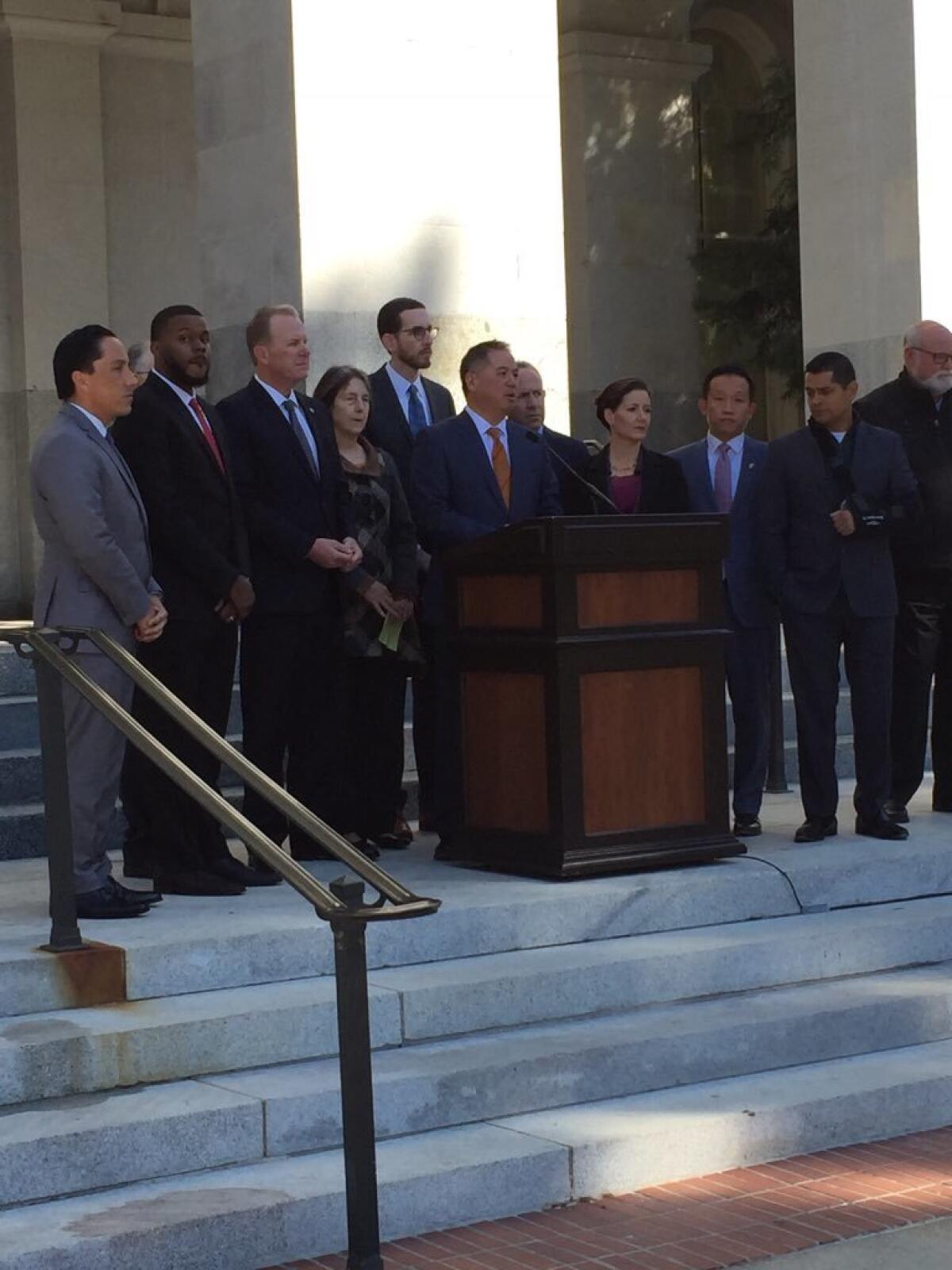
The mayors of California’s 11 largest cities are pushing for $1.5 billion in state money to address homelessness.
“Homelessness is the single biggest quality of life challenge we face in our cities,” said Sacramento Mayor Darrell Steinberg, who is leading the group of big-city mayors. “Cities cannot do it alone.”
The pitch comes in new state legislation, Assembly Bill 3171, which would require local governments to match the state dollars, resulting in $3 billion to fund homeless shelters, rental assistance, permanent housing and other efforts.
“We cannot continue to allow people to sleep on our streets every single night,” said Assemblyman Phil Ting (D-San Francisco), the author of the bill.
State senators also released legislation Wednesday, Senate Bill 912, that would allocate $2 billion to help house homeless residents and other low-income Californians.
State lawmakers said the funding for their plans should come out of the $6.1-billion tax revenue windfall Gov. Jerry Brown is anticipating in the coming year’s budget. Warning of a potential economic slowdown, Brown has proposed banking nearly all that money for reserves or in case of unexpected costs, such as wildfires.
Los Angeles Mayor Eric Garcetti did not attend Wednesday’s press conference in Sacramento, but he signed a letter supporting his colleagues’ request.
Democratic activists hoping to flip Rep. Darrell Issa’s seat find danger lurking in new polling
Group working to elect more scientists to Congress will spend $1 million on Los Angeles TV ads
A political nonprofit working to elect scientists to Congress announced Wednesday it has reserved just over $1 million in broadcast television air time in the Los Angeles in the two weeks leading up to June’s primary.
314 Action, a 501(c)(4) social welfare group, has endorsed a trio of Democratic House candidates who are running in three different crowded and competitive Orange County races to win seats currently held by Republicans.
The group is planning on spending between $5 million and $7 million to support its endorsed candidates during the midterm election, said executive director Joshua Morrow.
Former Obama administration technology advisor Brian Forde is running to unseat Rep. Mimi Walters, stem cell scientist Hans Keirstead is running in Rep. Dana Rohrabacher’s district, and pediatrician Mai Khanh Tran is a candidate to replace recently retired Rep. Ed Royce.
Morrow said the content of the ad hasn’t yet been determined. The spot could theoretically support one of or all three of the candidates.
“We are watching all three of these races very closely,” he said. “We want to ensure that our candidates get through the primary.”
The group also released a national poll Wednesday by Public Policy Polling that showed 55% of voters who backed President Trump said they are “much more or somewhat more” likely to vote for a candidate with a scientific background.
Meanwhile, 82% of the Democrats polled said they are “much more or somewhat more” likely to vote for a candidate with a scientific background.
“There is a real interest in scientists running for office,” Morrow said. “Scientists are going to lead the way to taking back the House.”
Democratic candidates for Congress square off on question of Nancy Pelosi as Speaker of the House
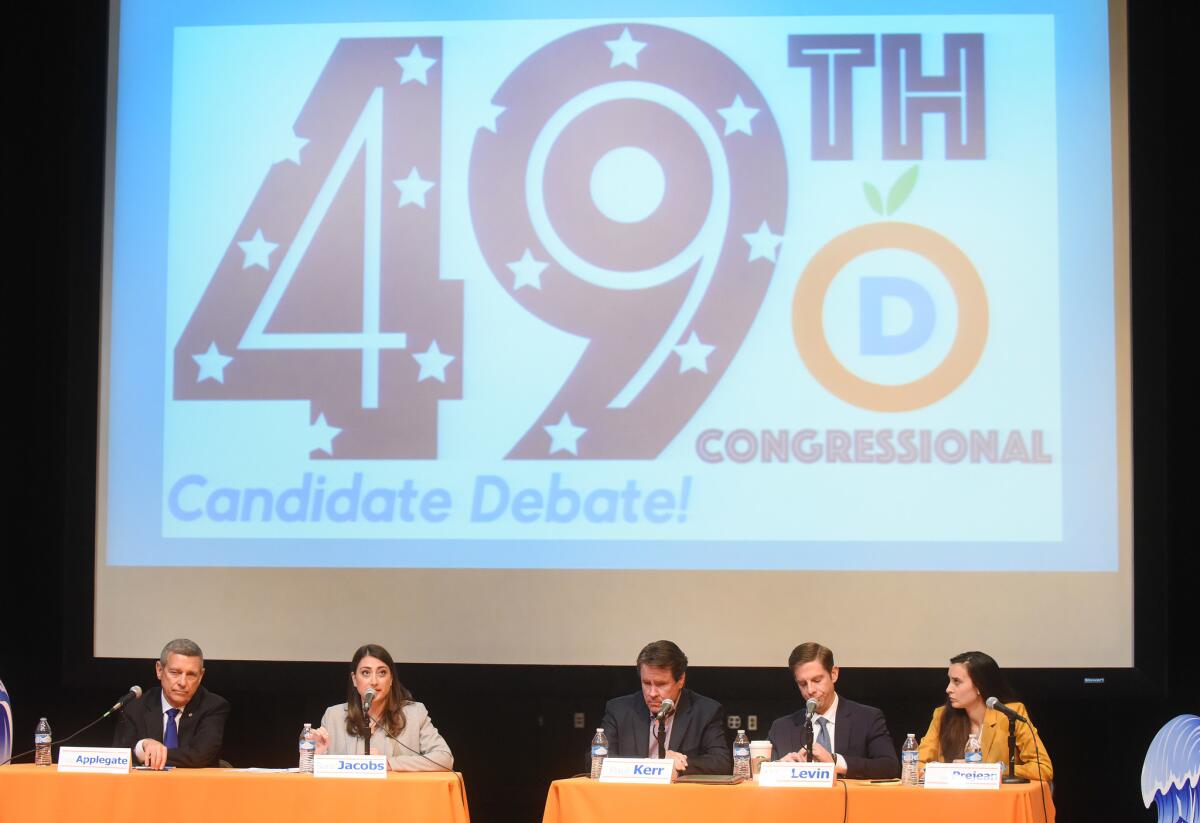
Five Democrats looking to replace retiring Republican Rep. Darrell Issa squared off at a debate in San Juan Capistrano on Tuesday night, struggling to differentiate themselves in a crowded and open race.
At least nine candidates are running in the primary and for most of the evening the five Democrats agreed on the issues, from opposing new toll lanes in the district to embracing the need for more gun control.
One touchy topic caused a rift: Would the candidates vote for Minority Leader Nancy Pelosi to become Speaker if Democrats win control of the House?
Doug Applegate, who came within a few thousand votes of unseating Issa in 2016, quickly gave an anti-Pelosi response.
“No,” he said. “We can do better. We need to move in a different direction.”
Sara Jacobs, Paul Kerr, Mike Levin and Christina Prejean all praised Pelosi but did not give a clear answer.
Prejean said she would “support the most qualified candidate” while Levin said he wanted to see a “a bold champion” for progressive causes.
Republicans have used Pelosi in campaigns, saying a vote for a Democrat is a vote for her as Speaker. Some of the younger generation of Democrats have challenged Pelosi, 77, in suggesting the party should put forth different leadership against President Trump.
The candidates largely fell back on identity politics, pushing their life stories as the best match for the sprawling district.
Applegate, Kerr and Prejean stressed their history as veterans. Marine Corps Base Camp Pendleton is located in the district.
Jacobs, 29, and Prejean, 31, said their youth and gender could bring out a diverse coalition of voters as the #MeToo movement continues to gather steam.
Jacobs scored some points when Levin, a man who boasts the endorsement of the National Organization for Women’s Political Action Committee, said that 2018 is the “year of the feminist,” and that “some men are feminist too.”
“While there are feminist men,” she said, “in 2018 it is time for a woman.”
She has been endorsed by the president of the California branch of the National Organization for Women and Emily’s List.
Levin got 57% of the vote among local delegates at a “pre-endorsement conference” last month, but it wasn’t high enough to prevent another vote at the Democratic Party convention this weekend in San Diego. That will determine who — if anyone — gets the party’s endorsement and subsequent financial support.
Jacobs and others criticized the endorsement process.
“We need to make sure that young people and women and other low-propensity voters are excited,” she said. “We can’t just hope that they are going to vote against one of the Republican candidates because of their past support for Donald Trump. We have to give them something to get out to the polls and vote for.”
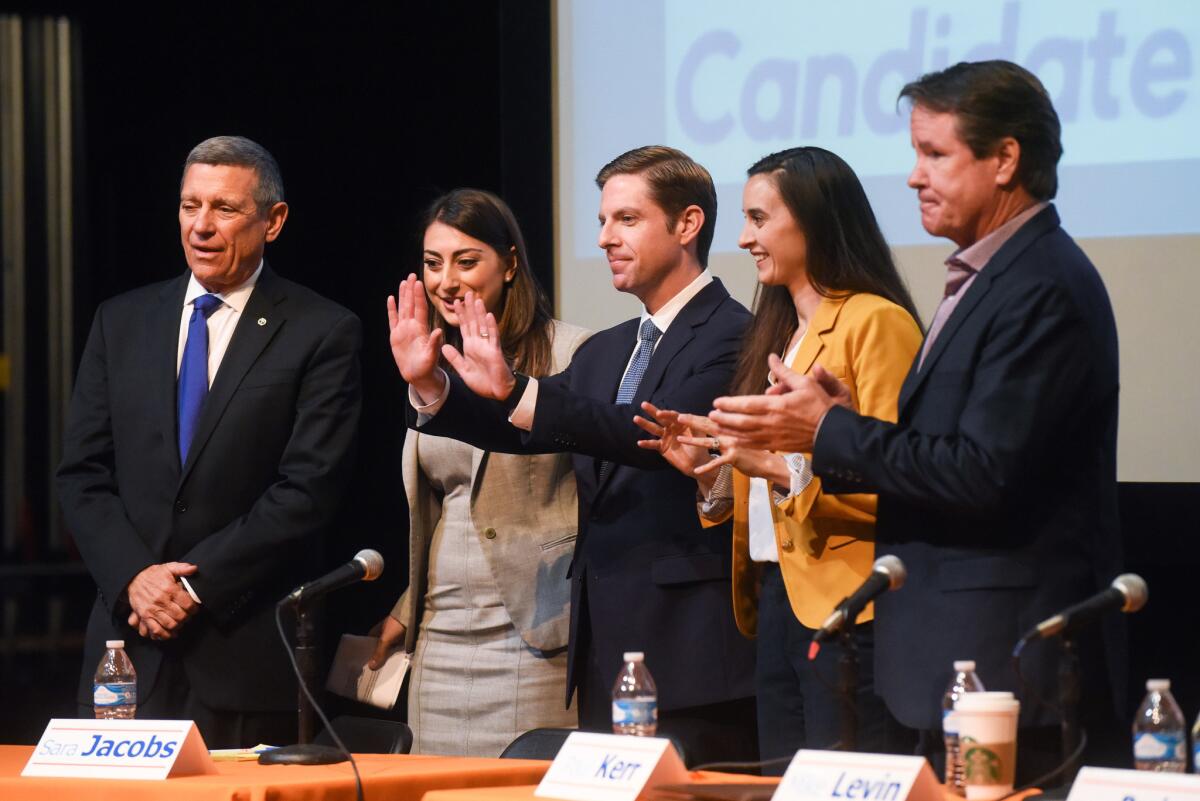
Emily’s List announces two more endorsements in California House races
Abortion-rights group Emily’s List has thrown its weight behind two more Democrats challenging GOP incumbents in California.
The group announced Wednesday that it’s endorsing Rachel Payne’s candidacy against Rep. Dana Rohrabacher in Orange County, and Virginia Madueño in the race to unseat Rep. Jeff Denham in the Central Valley.
In a statement announcing the endorsements, President Stephanie Schriock highlighted Madueño’s background as a small town mayor and business owner, and Payne’s leadership in the tech industry.
Of the seven districts where Emily’s List previously put Republican incumbents “on notice,” the group, which focuses on electing pro-choice Democratic women, has endorsed six challengers.
They include Katie Hill, who’s challenging Rep. Steve Knight, Mai Khanh Tran, a candidate for Rep. Ed Royce’s seat, Katie Porter, an opponent of Rep. Mimi Walters, and Sara Jacobs, hoping to replace Rep. Darrell Issa.
The group’s independent expenditure committee has debuted its first TV ad buy. Though the group previously said it’s ready to spend major resources in California House races, it’s unclear how much money it will invest. A joint fundraising committee benefiting four of the women’s campaigns was recently set up ahead of a fundraiser the group plans to hold at the end of February.
Gov. Jerry Brown meets privately with Interior secretary to urge no new California offshore drilling
Senate investigation concludes Tony Mendoza ‘more likely than not’ made inappropriate advances on staffers
State Sen. Tony Mendoza “more likely than not” behaved in a flirtatious or sexually suggestive manner toward staffers, a Senate investigation found.
The four-page summary report released late Tuesday afternoon described the findings by two outside law firms tasked with investigating allegations that Mendoza had made unwanted advances to female aides while he served as an Assembly member from 2006 to 2012 and as a senator from 2014 to the present.
Investigators spoke to 47 witnesses, including Mendoza, who was interviewed twice, according to the report.
In all, six women said they “personally experienced unwanted flirtatious or sexually suggestive behavior by Mendoza,” the report said. Four of those women were working as staff members, interns or fellows at the time. None of the women said they engaged in a sexual relationship with the senator, nor did they allege Mendoza was physically aggressive or “sexually crude” toward them, the report found. Although none of the women said they were explicitly threatened by Mendoza, they feared that complaining about his behavior would harm their careers, according to the report.
Among the findings in the report, investigators said it was “more likely than not” that as an Assembly member, he made unwanted advances on a 19-year-old intern during a Democratic Party convention and gave her alcohol in a hotel suite. The report also said that as a senator, Mendoza engaged in unwanted flirtatious behavior with two Senate fellows — recent college graduates working in the Legislature — as well as with one female lobbyist.
The report did not substantiate claims that three former staffers of Mendoza were terminated from their positions because they had raised concerns about his behavior. Rather, the report said, it was more likely than not that the employees were fired “for reasons unrelated to any complaint of sexual harassment.”
The summary comes several days after investigators completed their investigation. The findings of the full report will be presented to the Senate Democratic and Republican caucuses on Wednesday, as well as any recommendations from the Rules Committee for disciplinary action.
Related: Large swaths of Los Angeles County are without representation amid investigation
Feinstein urges Trump to back her ‘bump stock’ ban: ‘We need meaningful action’
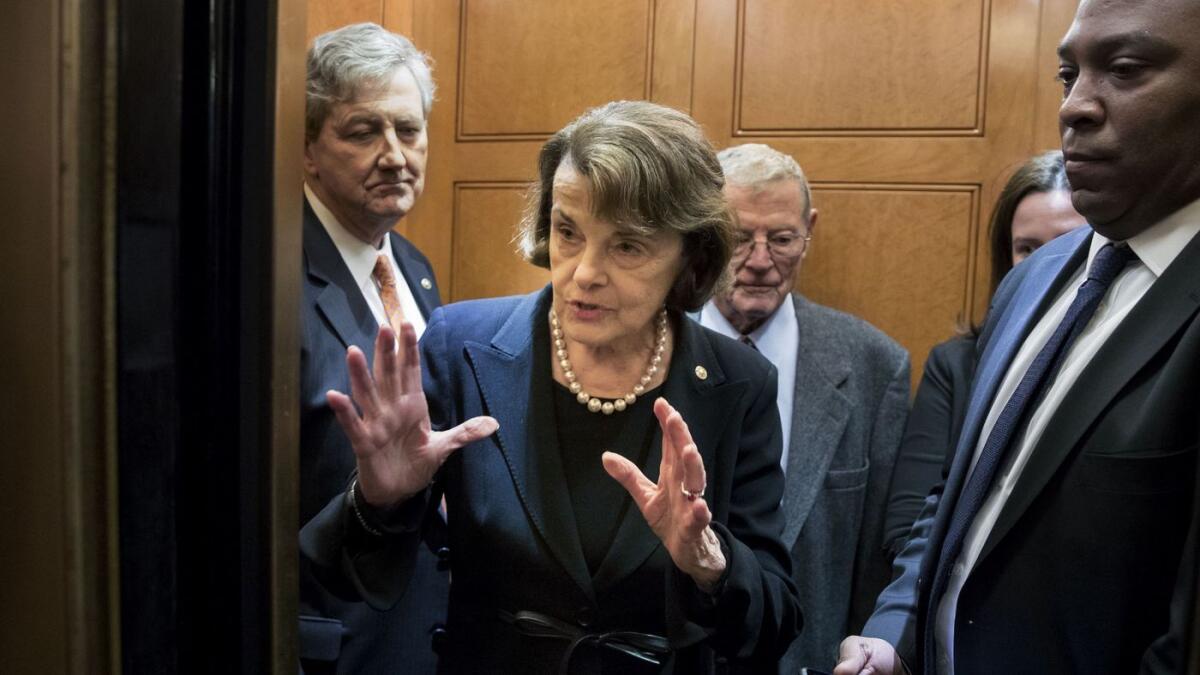
Sen. Dianne Feinstein is urging President Trump to back her gun-control legislation rather than have the administration try to do it alone.
Trump on Tuesday said he had signed a memo directing the Justice Department to propose regulations to “ban all devices” like “bump stocks” used in last year’s Las Vegas massacre.
Feinstein, the original author of the nation’s assault weapons ban, proposed legislation to ban devices that make semiautomatic weapons work more like automatic weapons after 59 people were killed and more than 500 others were injured at a Las Vegas country music festival, but the measure stalled soon after she put it forward.
Feinstein pointed to two instances in recent years where officials with the Bureau of Alcohol, Tobacco, Firearms and Explosives, commonly called the ATF, have said the agency does not have the authority to ban such rapid-fire devices on its own. Feinstein said that could be used in legal challenges.
“If ATF tries to ban these devices after admitting repeatedly that it lacks the authority to do so, that process could be tied up in court for years, and that would mean bump stocks would continue to be sold. Legislation is the only answer,” Feinstein said in a statement. “Words are one thing, Mr. President, but we need meaningful action. If you want these devices off the street, call congressional Republicans and tell them to stop blocking our bill.”
Blame California’s cities and counties for housing delays, not state environmental law, new study says
Those who want to blame a California environmental law for the state’s housing problems should instead point their fingers at cities and counties, according to a new report from researchers at UC Berkeley and Columbia University.
The California Environmental Quality Act, or CEQA, a 1970 state law, requires developers to analyze and eliminate a project’s effect on the environment before building. While often praised for preservation, CEQA is a continual target for those who argue the law blocks needed housing.
The real problem isn’t CEQA, but rather how local governments approve projects, the report said. CEQA only comes into play if a city or county decides to review housing developments individually. If a local government relies on zoning or other processes to determine whether a particular project gets built, developers don’t have to go through the CEQA process.
“It’s a choice that local governments are making,” said Eric Biber, a law professor at UC Berkeley and one of the report’s authors.
The study examined Bay Area cities San Francisco, Oakland, San Jose, Redwood City and Palo Alto. It found that all but Palo Alto require project-by-project review of any proposal with two or more homes, no matter if the development is planned on land zoned for the proposed amount of housing. In Palo Alto, this requirement is for any project of five units or more.
Doing so, Biber said, forces developers to learn specific and complex rules for getting almost all projects approved in each city, which drives much of the time, expense and uncertainty over housing. The study found that about 20% of the 27,612 homes proposed between 2014 and 2016 in the five cities had to undergo a full environmental analysis under CEQA, a process that can typically take more than a year. The remainder didn’t have to go through that analysis because of prior environmental reviews and other exemptions.
Biber praised the state Legislature’s recent efforts to ensure certain housing projects that met labor and zoning standards are approved without delay rather than cities deciding the fate of every individual project.
“This is much more than CEQA,” Biber said. “Really if you just went after CEQA, you’re not going to solve the problem.”
Sen. Dianne Feinstein courts Democratic delegates days before state party endorsement vote

California Democratic Party delegates received a mailer on Tuesday from Sen. Dianne Feinstein asking for their support in the endorsement race at the state party’s convention this weekend.
“Today, more than ever, California and our nation’s progress are threatened on many fronts by Donald Trump and the Republicans in Congress,” Feinstein wrote. “… California Democrats can and must lead Democrats across the nation to victory. Please know that I stand with each and every one of you and that I deeply appreciate all you do for our party and for the values we share.”
The mailer also touts Feinstein’s endorsement by scores of California political leaders, including Sen. Kamala Harris, House Minority Leader Rep. Nancy Pelosi of San Francisco, Lt. Gov. Gavin Newsom and Los Angeles Mayor Eric Garcetti.
It hit delegates’ mailboxes three days before they gather in San Diego for the state party’s annual convention.
Feinstein, a 25-year veteran of the Senate, is facing a challenge by fellow Democrat Kevin de León, the state Senate leader. Feinstein has a sizable financial edge over De León, but he has won some notable endorsements, including from the Service Employees International Union’s California chapter.
Both candidates, along with attorney Pat Harris, are vying for the state party endorsement, which requires a 60% vote from delegates.
Feinstein touted her leadership positions on high-priority Senate committees and warned that President Trump and congressional Republicans would roll back healthcare, immigration, environmental and other policies.
“We have endured constant attacks on our immigrant communities and witnessed the appointment of extreme judges with agendas. And daily, we have witnessed a president whose behavior shocks, divides, and appalls,” Feinstein wrote. “Marching together toward the November election, we will take our case to the voters of California and every other state in this land. It is imperative that we win that battle.”
California Atty. Gen. Becerra says he won’t appeal ruling that could change how judges award bail
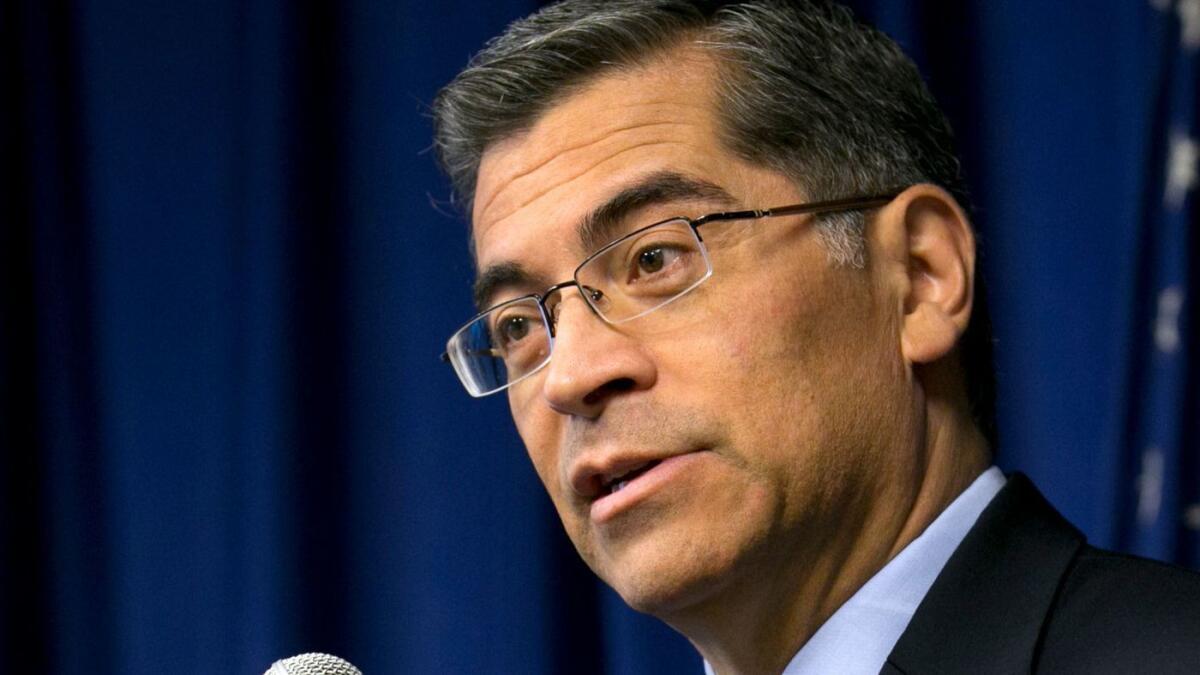
California Atty. Gen. Xavier Becerra on Tuesday said he would not appeal a state appellate court ruling that granted a new bail hearing for a San Francisco man accused of stealing cologne, paving the way for a change to the way judges across the state award bail.
The announcement comes after Gov. Jerry Brown pledged last year to work with state lawmakers and the state’s chief justice, Tani Cantil-Sakauye, on overhauling California’s bail system.
Kenneth Humphrey, who has been in jail since May 2017 while awaiting trial, could not afford the $350,000 bail set by the San Francisco Superior Court. In a decision last month, the 1st District Court of Appeal called into question the constitutionality California’s bail system, saying the practice of setting bail at high amounts is justified only for defendants deemed too dangerous for release.
The ruling requires judges across the state to change the way they set bail based on fixed amounts according to the charges and the defendant’s criminal history.
Becerra said he has directed his office to seek bail according to the state court’s ruling. To defend bail, he said, his prosecutors must see evidence that the court has conducted an analysis of a defendant’s ability to pay, risk of flight and danger to the public.
“I am doing what I can to add to that movement of bail reform,” Becerra said at a Sacramento news conference. “Nobody wants to be soft on crime. Today’s bail system doesn’t make you safer because if you’ve got the money and you’re dangerous, you still get out.”
El Cajon mayor announces he will challenge Rep. Duncan Hunter for Congress
El Cajon Mayor Bill Wells announced today he is running for Congress, challenging long-time Republican incumbent Rep. Duncan Hunter for a hotly-contested East County district.
Wells, who has held the mayoral position since 2013, is seeking to take over the 50th Congressional District, which serves more than 730,000 constituents in communities including Fallbrook, San Marcos, Valley Center and Escondido.
Making the announcement this morning at the Ronald Reagan Community Center in El Cajon, Wells said he aims to bring “conservative, Republican values to Washington, D.C.”
California drivers under 21 could lose license for year if caught on the road under the influence of marijuana
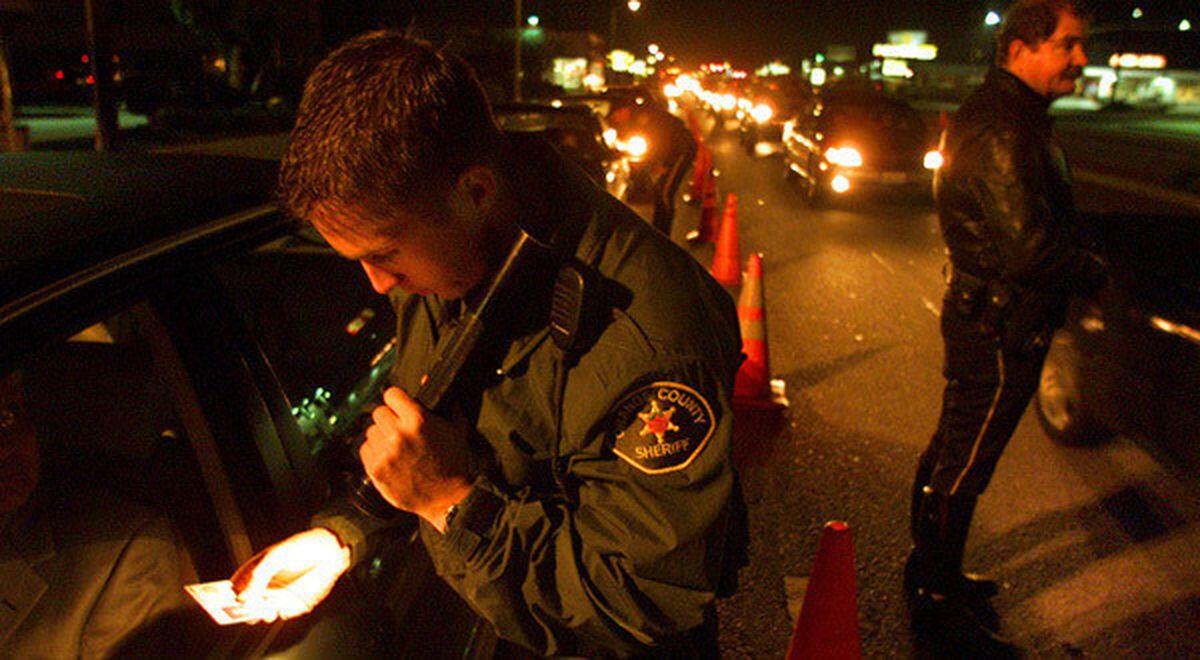
California motorists under the age of 21 would lose their driver’s license for a year if caught driving with marijuana in their system under new legislation, though the state still is developing methods of measuring the drug in the body and determining a standard for impairment.
State Sen. Jerry Hill (D-San Mateo) said he proposed the law so that the state would have the same “zero tolerance” policy for pot that it has for those under 21 who drive under the influence of alcohol.
“This bill will save lives by making it illegal for drivers under age 21 to drive under the influence of marijuana, just like current law for alcohol,” Hill said in a statement.
SB 1273 would target drivers under 21 who are pulled over on suspicion of driving under the influence of alcohol or drugs and who test positive for delta-9-tetrahydrocannabinol, the main psychoactive agent in marijuana. The bill foresees using an oral swab saliva test or another chemical field test.
The measure would exempt those who can provide documentation to show they are using marijuana for medical purposes.
Richard Desmond, an assistant chief for the California Highway Patrol, told lawmakers at a hearing Tuesday that research is underway to find the best way to measure impairment, but that it remains a challenge.
“We don’t have a device in the field to measure impairment by cannabis,” Desmond said.
Devices have been developed and are undergoing limited use in some jurisdictions, including San Diego, according to aides of Hill.
New governor’s race candidate Amanda Renteria releases video about ‘warriors’
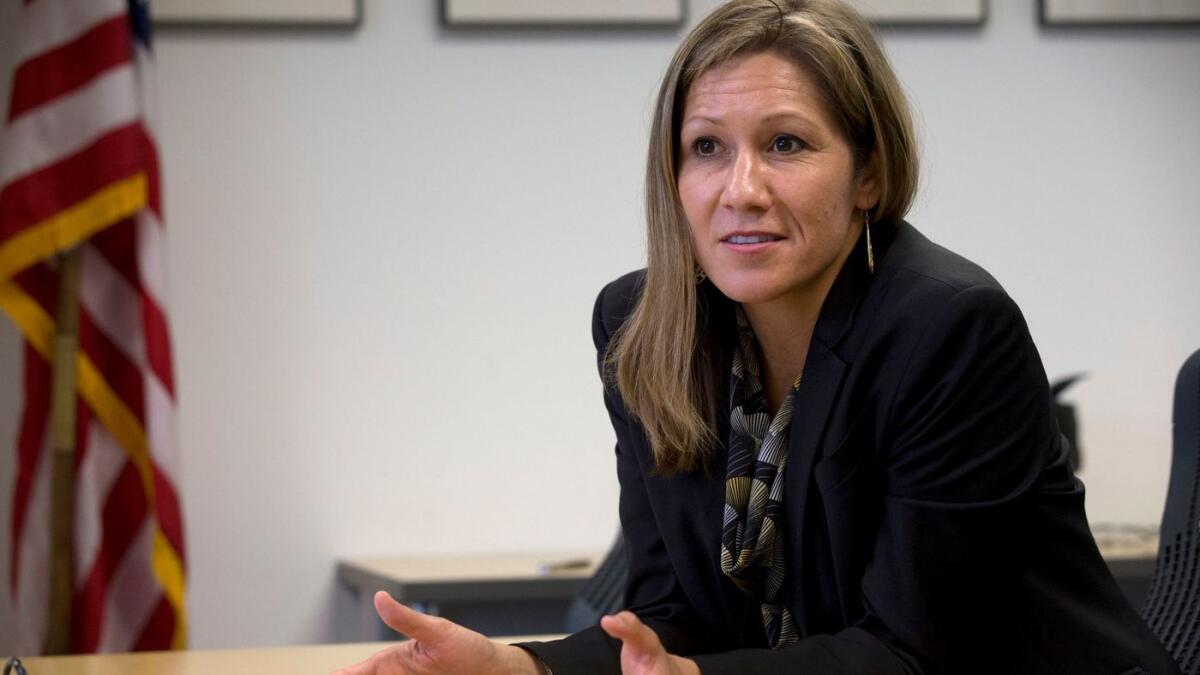
Amanda Renteria, the former Hillary Clinton aide who has been silent since filing paperwork to run for governor last week, released a minute-long video Tuesday morning.
It sheds little light on who she is or why she is running.
The online video features scenes of cities, the coast and farmland, and firefighters, a soldier, a gay couple, a construction worker, a professor and others that a voiceover describes as “warriors.”
“Greatness is built by the warriors, and warriors are just witnesses that choose to feel responsible,” a woman says over the images. “In California, we’ve always been warriors, believing in better, fighting for all, pushing us where we should be by caring about where one another has been. Though the tools of warriors are different, anyone can be a warrior.”
Renteria is seen with her family toward the end of the video.
“I think this is all about something that is starting, and we’re starting to not only understand our own power but our collective power together,” she said.
The hasty roll-out of Renteria’s campaign last week puzzled political strategists and elected officials. Renteria made no public statements after filing paperwork to enter the race, did not have a campaign website or any apparent staff.
The governor’s race has been underway for years, with the top Democratic candidates having raised millions of dollars and secured key endorsements.
Renteria previously ran unsuccessfully for Congress. The Central Valley native worked in Washington before serving as a top aide to Clinton’s 2016 presidential campaign and then in state Atty. Gen. Xavier Becerra’s office.
New ad attacks Villaraigosa for supporting a political ally’s son who was sentenced for stabbing death
GOP gubernatorial candidate John Cox plans to launch an online ad Tuesday attacking Democrat Antonio Villaraigosa over his support for a political ally’s son who was sentenced for his part in the stabbing death of a young man.
The ad focuses on Villaraigosa’s words on behalf of former Assembly Speaker Fabian Nuñez’s son, Esteban, as he was charged for his role in a 2008 street fight in San Diego that resulted in the death of 22-year-old Luis Santos.
The two-and-a-half-minute digital ad notes that when the younger Nuñez’s bail was set at $2 million, Villaraigosa was among the state political leaders who spoke out his behalf.
“ … the letter from then-Los Angeles Mayor Tony Villaraigosa – on official letterhead – must have hit the victim’s family hardest,” a woman says as a picture of Santos’ parents grieving at his grave is shown. A screenshot of Villaraigosa’s letter appears alongside it reading, “In my heart, I know Esteban Nuñez as a young man of good and upright character.”
Esteban Nuñez’s bail was reduced. The ad argues that people without political connections would not have the opportunity afforded to Nuñez, who pleaded guilty to manslaughter and was sentenced to 16 years in prison. Former Gov. Arnold Schwarzenegger, also a Nuñez ally, controversially cut his term to seven years.
A spokesman for Villaraigosa notes that the attack comes after Villaraigosa received the endorsements of the California Police Chiefs Assn. and the Peace Officers Research Assn. of California.
“We don’t think it’s an accident this attack comes the same week the state’s two most important law enforcement organizations endorsed Antonio Villaraigosa for governor. His record as mayor, lowering violent crime by nearly 50% with constitutional community policing, speaks for itself,” Luis Vizcaino. “He was one of 70 individuals who supported the idea that a young man, who made a terrible mistake, still deserved a fair and proper bail and would honor the terms of his bail — which he did.”
California legislation aims to increase rooftop solar in cities

A new bill from a Bay Area lawmaker aims to increase rooftop solar production throughout the state.
Senate Bill 1399 from Sen. Scott Wiener (D-San Francisco) would create a new system in which owners of existing buildings that have high energy use but little roof space could contract with owners of other local buildings that have lots of roof space, but little need for energy.
The idea, Wiener said in a statement, is to create more incentives for rooftop solar installations by matching those who could supply it with those who would use it.
“To meet our aggressive renewable energy goals, California needs to build dramatically more solar, including maximizing use of our empty rooftops and other developed spaces that are ripe for solar,” Wiener said.
Wiener’s legislation would require the California Public Utilities Commission, the state’s energy regulator, to develop such a system by 2021.
Dolores Huerta’s legacy and influence are shaping the race for this competitive California congressional district
Labor rights icon Dolores Huerta won’t be on the ballot in California’s 21st Congressional District, but she has influenced the Central Valley race Democrats view as one of their biggest pickup opportunities in the midterm elections.
Elected officials, local activists and other congressional sources said Huerta is having pointed conversations to try to make sure her son, Emilio Huerta, is the only Democrat challenging Republican Rep. David Valadao. A local lawyer, he lost badly to Valadao in 2016.
So far, Huerta is the lone candidate, a statistic that stands out at a time when Democrats are averaging half a dozen or so viable candidates to run against vulnerable California Republicans with control of the U.S. House at stake.
California Democrats gather this week to chart course for 2018, and hear from candidates for 2020
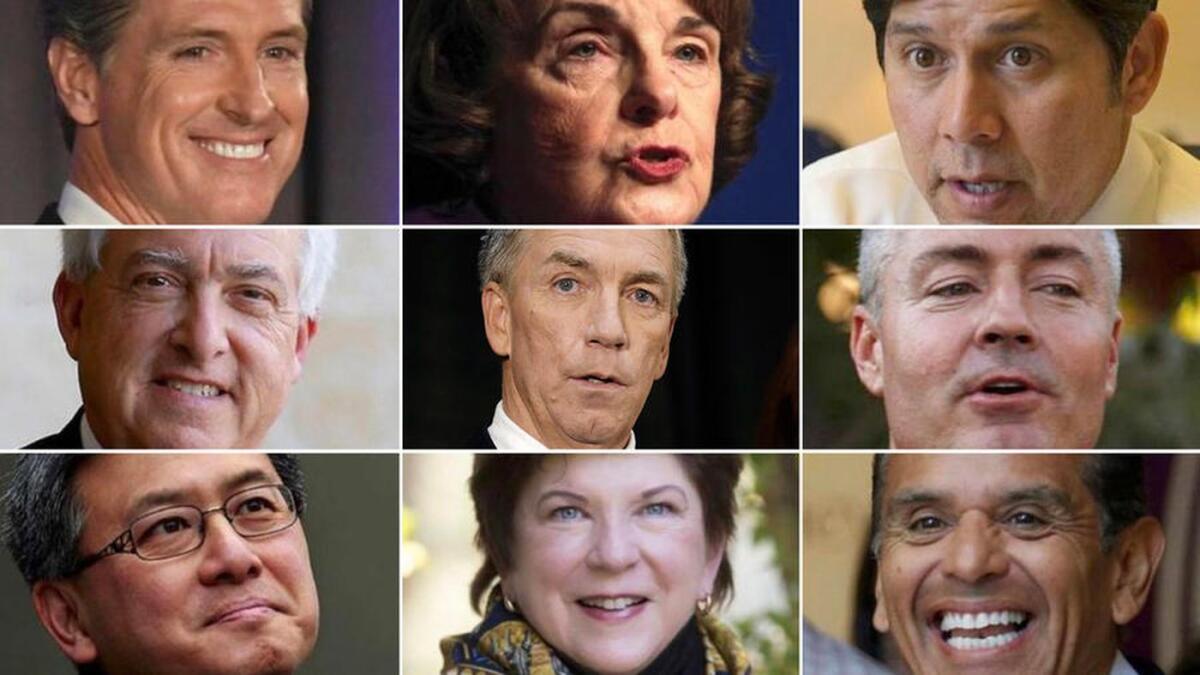
Thousands of California Democrats will gather this week in San Diego for their annual convention, featuring several potential presidential contenders as well as candidates battling for endorsements from the party faithful in advance of the June primary.
Potential 2020 candidates speaking at the convention include Oregon Sen. Jeff Merkley, Los Angeles Mayor Eric Garcetti, Sen. Kamala Harris and billionaire environmental activist Tom Steyer.
One notable California Democrat who repeatedly ran for president is not scheduled to appear: Gov. Jerry Brown, in his final year leading the state. He has previously faced protests and heckling from critics who did not agree with his stance on fracking.
During the three-day gathering that starts Friday, the party plans to show a tribute video for Brown before four of the candidates vying to replace him — Lt. Gov. Gavin Newsom, former Los Angeles Mayor Antonio Villaraigosa, state Treasurer John Chiang and former state schools chief Delaine Eastin — speak.
Sen. Dianne Feinstein and her opponent, state Senate leader Kevin de León, will also address the gathering.
Alcohol-fueled parties are a mainstay of party conventions, but things have changed this year.
Newsom — known for throwing the biggest convention parties that have closed off streets and featured celebrities such as rapper Common — will instead greet delegates on Saturday afternoon and pop in to parties Friday hosted by the California Teachers Assn. and the California Faculty Assn.
Chiang and Feinstein are hosting breakfasts.
This may be a reflection of the convention taking place against the backdrop of the #MeToo movement. In Democratic Party circles, questions have been raised about the freewheeling — and at times risky — behavior at state party conventions. The party’s convention planners responded by organizing a 24-hour hotline to report assault or threatening behavior. They also are increasing the presence of security.
Assemblywoman Cristina Garcia encouraged game of spin the bottle among staffers, ex-employee says

A former staffer to Assemblywoman Cristina Garcia (D-Bell Gardens) said the lawmaker discussed vulgar topics in the office and once encouraged her aides to play spin the bottle, according to a filing submitted to the state.
David Kernick alleged in a complaint to the state’s Department of Fair Employment and Housing that he was terminated from his position in Garcia’s district office in 2014, shortly after he raised concerns about Garcia urging staffers to play “spin the bottle” in her hotel room after a fundraiser. The complaint was first reported by Politico.
Kernick is one of four staffers who accused Garcia of fostering an improper work environment, including allegations that she discussed sex and used alcohol at work, in a letter to the Assembly last week. The remaining staffers remain anonymous.
Garcia’s office did not immediately respond to a request for comment. But in a statement last week, Garcia pushed back against the claims.
“I am confident I have consistently treated my staff fairly and respectfully,” she said.
Garcia has been on a voluntary unpaid leave since Feb. 8, after being accused by two men of making unwanted sexual advances. Garcia has denied wrongdoing and the Assembly is investigating.
Incoming state Senate leader endorsing Newsom for governor
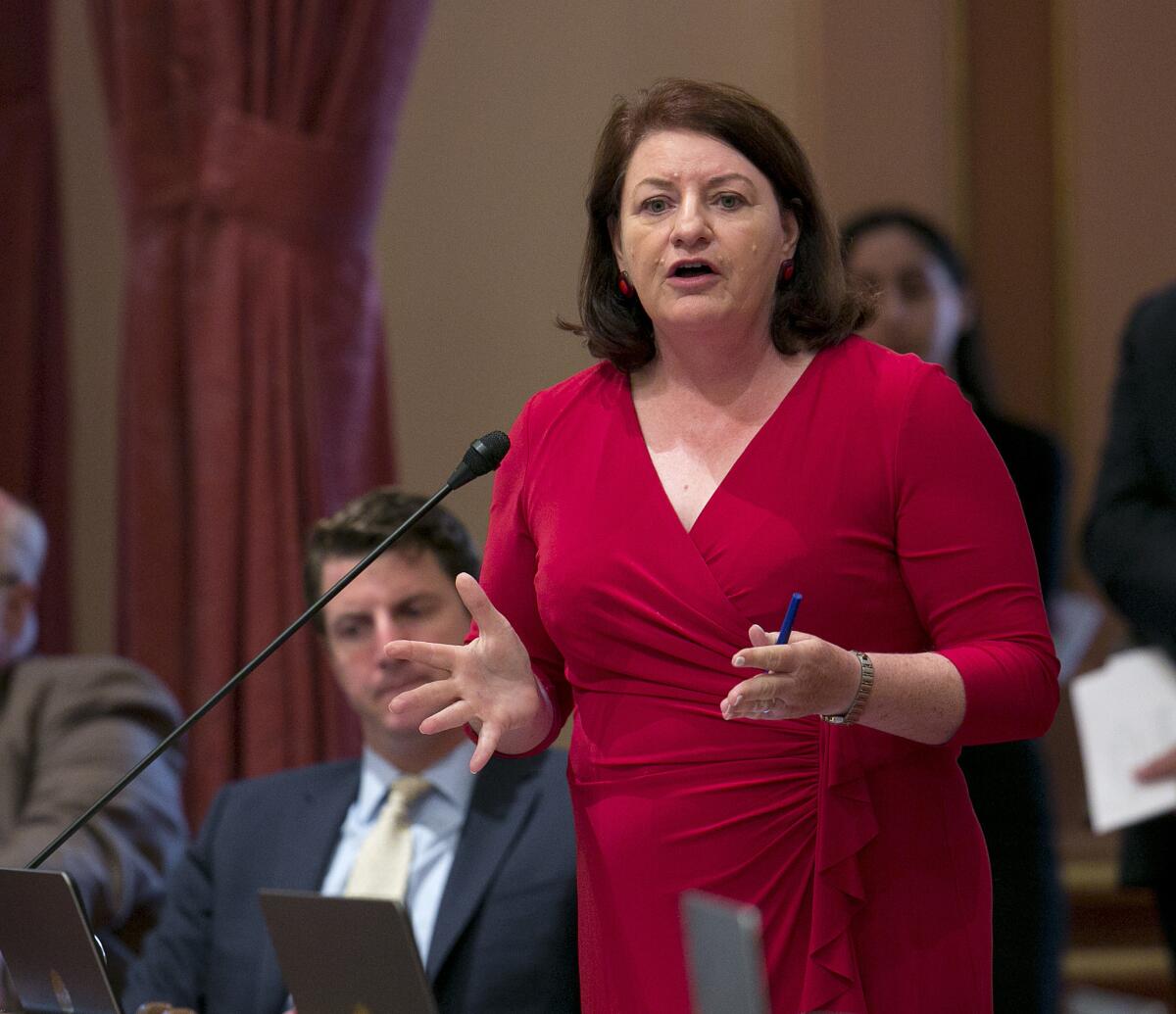
Democrat Toni Atkins of San Diego, who in March will become the first woman to lead the California Senate, has endorsed Lt. Gov. Gavin Newsom for governor.
Atkins praised Newsom’s record on addressing homelessness and affordable housing during his two terms as San Francisco mayor, saying he has been a politician who has not hesitated to “take chances to do the right thing.”
“He shares my passion for ensuring that every California family can afford a safe roof over their head and can live in a community near where they work, play, attend school and pursue their dreams,” Atkins said in a statement released by the Newsom campaign.
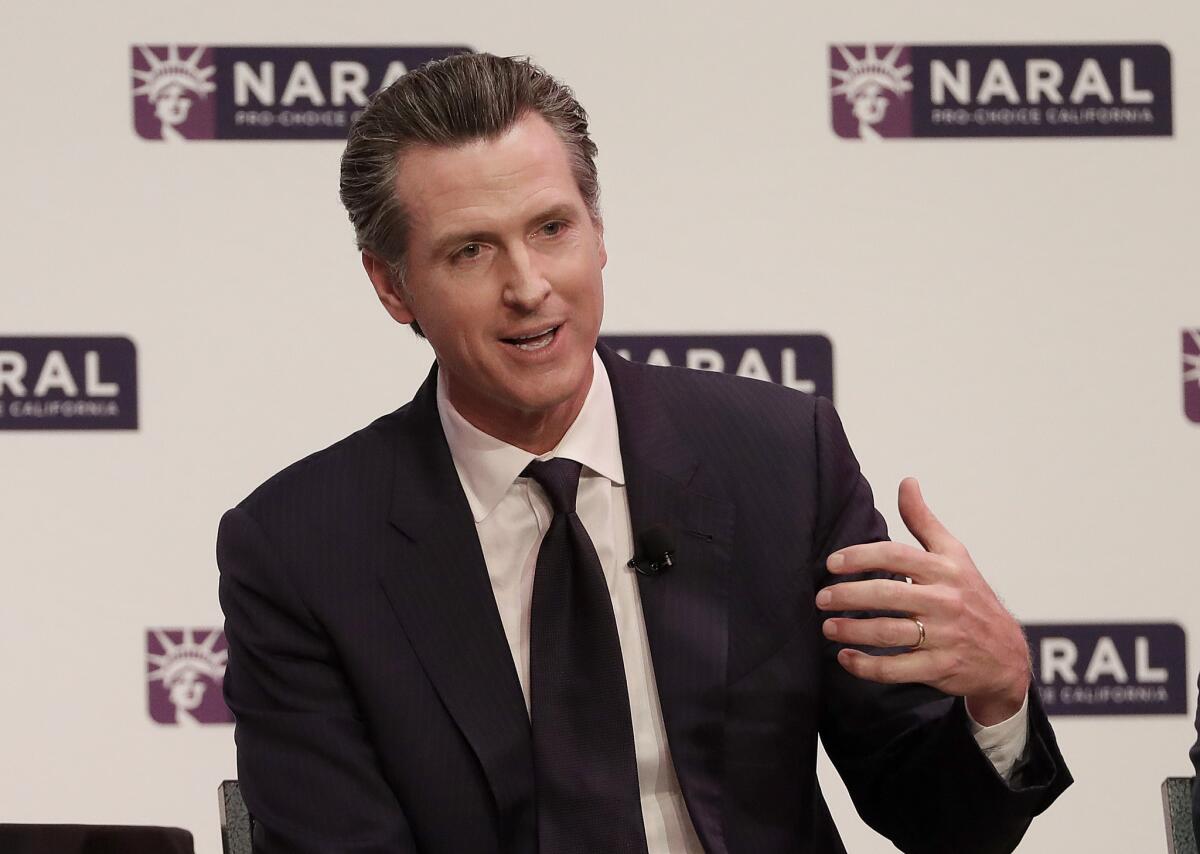
Atkins replaces Senate President Pro Tem Kevin de León (D-Los Angeles) as Senate leader. De León is running for the U.S. Senate.
Before her election to the state Senate, Atkins served as Assembly speaker and affordable housing was a top policy priority.
Newsom will be campaigning in San Diego on Monday. He’ll be back in San Diego on Thursday for a Democratic candidate forum and the California Democratic Party convention.
Newsom calls suggestion of voter suppression from Villaraigosa camp ‘sad’ and ‘desperate’
California gubernatorial candidate Gavin Newsom pushed back forcefully on Friday against a suggestion that his camp had anything to do with the surprise candidacy of Democrat Amanda Renteria for governor. An advisor to Antonio Villaraigosa’s campaign speculated that Newsom’s team wants Renteria in the governor’s race in an effort to split the Latino vote.
“It’s absurd. And sad at the same time,” Newsom told reporters after receiving U.S. Sen. Kamala Harris’ endorsement at USC. “To somehow suggest we’re part of it — I read that with bemusement. It is factually unequivocally, absolutely untrue.”
Newsom, currently California’s lieutenant governor, was responding to Mike Madrid, a Villaraigosa advisor, telling KQED that “something just doesn’t smell right” with the hasty, last-minute rollout of Renteria’s campaign. Madrid said he believes “the dots are there” to connect Renteria, a former Hillary Clinton aide who also worked for California Atty. Gen. Xavier Becerra, with Newsom’s campaign.
“Follow the money,” Madrid said. “If you start to see Gavin Newsom money, independent money start, you’re really going to know something is wrong. It’s part of the larger divide-and-suppress strategy of the Latino vote.”
Newsom was particularly incensed by the assertion of voter suppression.
“It’s insulting and unfounded … a desperate and sad assertion that is ludicrous and truly bizarre,” he said.
Renteria’s decision to enter the governor’s race so late in the contest, with no public statement or campaign website or apparent political team, dumbfounded even her allies. Attempts to reach her this week have been unsuccessful.
Newsom has been the dominant front-runner in fundraising, and led early polls. A new poll released last week shows Newsom and Villaraigosa, both Democrats, virtually tied.
Citing Florida shooting, California bill seeks to expand law allowing judges to seize guns from persons deemed dangerous

Two days after a mass shooting in Florida, a California lawmaker is seeking to revive a measure that would allow school staffs and coworkers to seek a court order to remove guns from people they believe are a danger to the public.
Assemblyman Phil Ting (D-San Francisco) wants to expand the current law that allows family members and law enforcement officials to seek an emergency restraining order from judges based on rulings that the person owns guns and poses a public risk.
The current law, enacted after the 2014 mass shooting in Isla Vista, Calif., allows judges to order the confiscation of guns for up to 21 days.
Ting would expand the bill to allow teachers and other employees on high school and college campuses to apply for a restraining order.
A similar expansion bill two years ago was vetoed by Gov. Jerry Brown who said it was too soon to expand a law before it was determined whether it was working.
Ting believes his new bill would have potentially helped school officials at Marjory Stoneman Douglas High School in Parkland, Fla., where a shooting by a former student left 17 people dead. School officials had put out an alert to watch out for the gunman.
“We decided after the Parkland, Florida, mass shooting incident that this [bill] is a tool that really could be used to protect students as well as workplace environments from mass shootings,” Ting said.
Update, 4 p.m.: An earlier version of this story included a bill number. There is not yet one assigned.
Democrat running to replace Rep. Ed Royce scores endorsement from Sanders-affiliated group
Medical pot for animals? One California lawmaker wants to open the door

Californians have been able to use marijuana as medicine for two decades, and soon their sick pets may also be able to take advantage of cannabis’ health benefits.
State Assemblyman Ash Kalra (D-San Jose) has introduced a bill that would require the Veterinary Medical Board to establish guidelines for licensed veterinarians to discuss the use of cannabis for animals.
“It is critical for the protection of our beloved pets that knowledgeable veterinarians be allowed to discuss the safe use and medicinal value of cannabis products already available to California consumers,” Kalra said.
Marijuana remains an illegal drug under federal law, and ballot measures approved by California voters only allow people to use it for medical and recreational purposes, according to an opinion put out by the state board.
“There is nothing in California law that would allow a veterinarian to prescribe, recommend, or approve marijuana for treating animals,” the state board opinion says. “Veterinarians are in violation of California law if they are incorporating cannabis into their practices.”
Democrats continue to dominate California’s voter rolls
The sexual harassment investigation into state Sen. Tony Mendoza is complete. His peers will decide his political fate next week
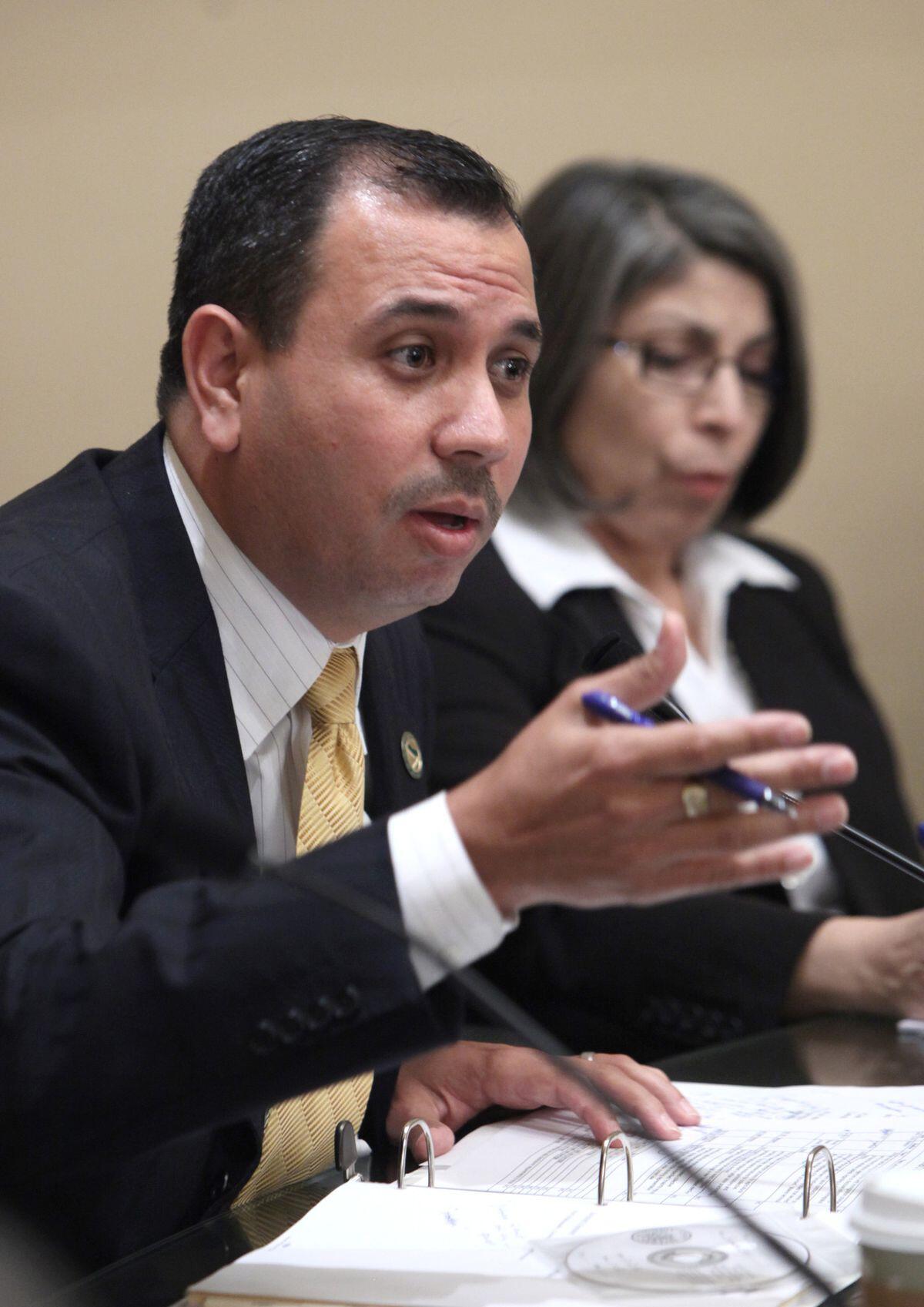
The state Senate Rules Committee on Friday received the results of an investigation by outside attorneys into sexual harassment allegations against Democratic Sen. Tony Mendoza of Artesia, setting the stage for the panel recommending next week whether discipline is warranted.
The panel spent two hours behind closed doors discussing the report, which is confidential. The review comes a day after Mendoza sued the Senate, seeking a court order to reinstate him from a forced leave of absence and declaring the investigation is biased and violated his rights to due process.
“The Committee will take the facts and findings under advisement and return on Tuesday ... to finalize recommendations to the body on the matter,” the panel said in a statement. In addition, if disciplinary action is recommended, the facts and findings of the investigation will be presented to Senate Democrats and Senate Republicans on Wednesday.
If the Rules Committee recommends disciplinary action and a resolution is considered on the Senate floor, Mendoza “will have the opportunity to contest the recommendation on the Senate floor.”
Among the options for punishment are suspending or expelling Mendoza. Such action would require a two-thirds vote of the Senate, while censure would require a majority vote.
Senate leader Kevin de León (D-Los Angeles), the chairman of the panel, declined to comment after the meeting. The fact-finding report was presented by Legislative Counsel Diane Boyer-Vine and the Senate’s outside employment counsel, Heather Irwin from Gordon Rees LLP.
State Sen. Toni Atkins (D-San Diego) has full confidence in the investigative report on which her panel was briefed, an aide said after the session.
Mendoza has denied allegations that he harassed three female aides, including one who said she felt uncomfortable with Mendoza’s behavior when she was a 19-year-old intern. The investigation looked at allegations Mendoza provided the underage intern with alcohol at a hotel suite while attending the 2008 state Democratic Party convention.
Mendoza denied the allegation. He also said he was trying to help a 23-year-old Senate fellow with her job search when he invited her to his Sacramento home to go over her resume. The woman declined the invitation, but another Mendoza aide claimed she was fired when she reported the invitation and other Mendoza actions.
A third former aide told personnel officials that she was uncomfortable with Mendoza’s “flirtatious” text messages, hugging and one-on-one dinners when Mendoza was in the Assembly. Mendoza was previously warned about his actions and the aide said his behavior improved.
Mendoza filed a lawsuit in Sacramento County Superior Court challenging the investigation and has formed a legal defense fund to cover the costs.
He also filed papers this week to seek reelection.
Lawmaker wants to force California police agencies to disclose surveillance policies

A state lawmaker has revived legislation that would require law enforcement agencies across California to disclose all of their surveillance equipment and enact public policies for their use of the technology.
The bill by Sen. Jerry Hill (D-San Mateo) also would require officers to fill out a report every two years on how they have used the tools. Police departments would have to seek approval from their city council on their public surveillance policies. Sheriff’s departments and district attorney’s offices would not, but the proposal would not stop county boards of supervisors from requesting their disclosure.
Similar laws drafted by Hill in previous years already exist for automatic license-plate readers and devices that simulate cellphone towers, known as Stingrays. But a Los Angeles Times review of records from 20 of the state’s largest police and sheriff’s departments, plus the Alameda County district attorney’s office, found some agencies had been slow to follow or have ignored the law.
Hill first attempted to improve those disclosure laws and expand them to all surveillance technology last year, but his previous bill was shelved in a committee amid fiscal concerns.
This year, he is trying again as civil rights lawyers and advocates say more transparency is necessary due to concerns about how surveillance tools are used against immigrant and Muslim communities have risen under the Trump administration.
“It’s important to strike a balance between the needs of law enforcement in crime-fighting and the public’s right-to-know and rights to privacy,” Hill said in a statement. “That’s what this bill strives to achieve.”
Sen. Kamala Harris endorsing Gavin Newsom for governor
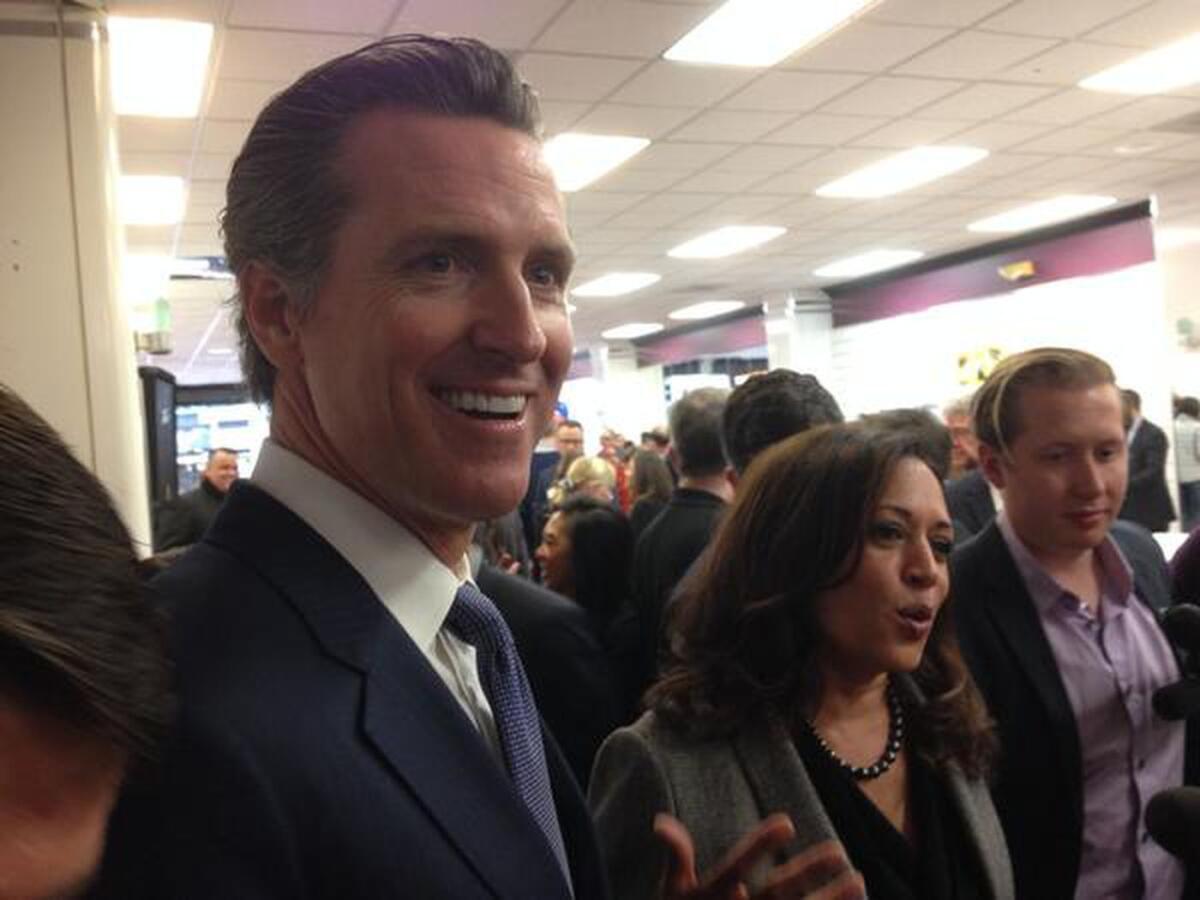
Sen. Kamala Harris plans to endorse Gavin Newsom in the California governor’s race Friday, according to a Newsom campaign official.
The move is not surprising — the two Democratic politicians share the same political advisors, began their careers in San Francisco city politics and have known one another for more than two decades.
They each got their start in politics thanks to former Assembly Speaker Willie Brown, who appointed them to political positions.
Newsom was mayor of San Francisco from 2004 to 2011. Harris was elected district attorney for the same years. In 2010, Newsom was elected lieutenant governor and Harris was elected attorney general.
Some questioned whether the two Democrats were heading for a political clash, but that was neatly avoided in early 2015 when Harris announced that she would run for retiring Sen. Barbara Boxer’s seat and Newsom announced he would run for governor.
Newsom was an early backer of Harris’ Senate campaign, pointing to her work in their shared hometown.
“If you can survive San Francisco politics, Washington, D.C., is a cakewalk,” Newsom told Harris supporters as he endorsed her at her Sacramento campaign office in January 2016.
Harris plans to return the favor for Newsom on Friday at 2 p.m. at USC, according to the Newsom campaign official, who was not authorized to speak about the matter publicly.
Sen. Tony Mendoza sues California Senate challenging forced leave of absence and sexual harassment investigation
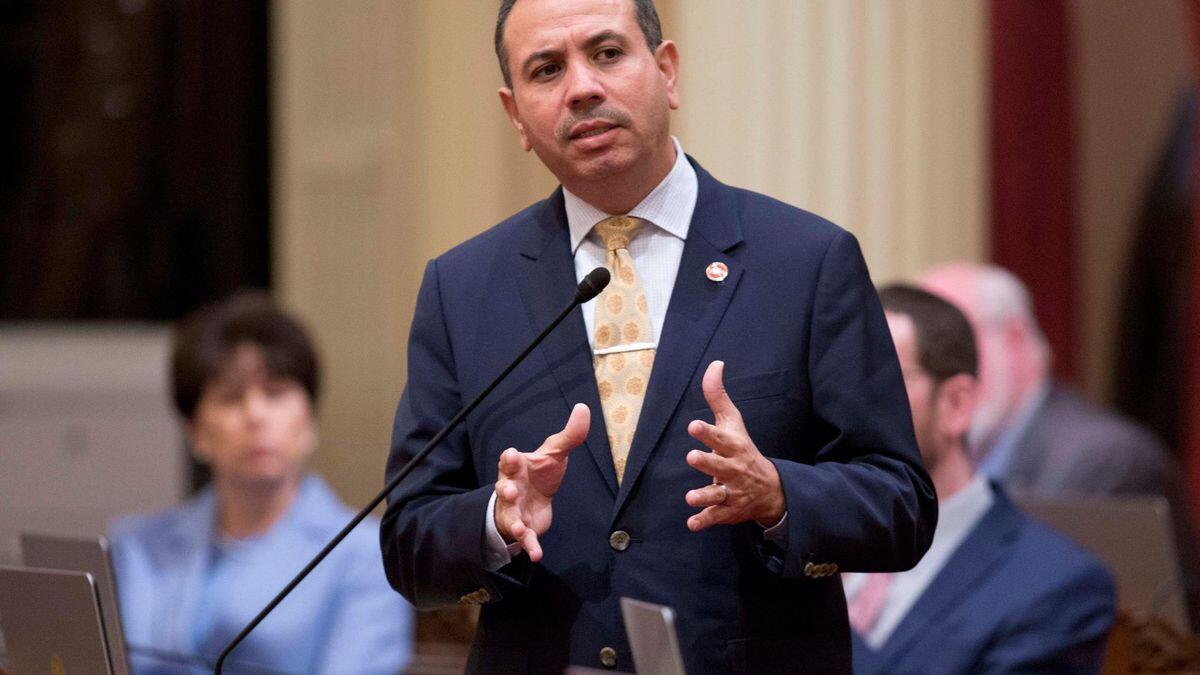
State Sen. Tony Mendoza (D-Artesia) filed a lawsuit Thursday against the California Senate, seeking to overturn a forced leave of absence and challenging an investigation into allegations that he sexually harassed three former female aides.
“This Kafkaesque process is the Senate’s response to the #MeToo movement,” the lawsuit says. “It is an unconstitutional sleight-of-hand where attacks on one Senator are used to hide other more serious allegations and offenders from public view.”
The lawsuit, which is joined by Mendoza constituent Roger Bagne, seeks an injunction to “lift Senator Mendoza’s unconstitutional suspension,” requiring the Senate to return Mendoza to his “full rights and priveleges [sic]” as a senator. Mendoza also seeks a declaration from the court that the Senate’s “secretive investigation and failure to advise Senator Mendoza of the allegations against him violates his right to due process.”
“The Senate’s disparate treatment of its own members and their constituents, along with its constantly-evolving and secretive investigative process is wrong and deeply troubling,” Mendoza said in a statement. “The Senate’s process and procedures for handling sexual harassment allegations remain a mystery, which unfairly impacts not only me, but also my constituents, the public, and victims of sexual harassment, who have no idea how their complaints will be handled.”
Mendoza’s lawsuit singles out Senate leader Kevin de León (D-Los Angeles) for publicly criticizing Mendoza, noting that they shared a house together until recently. De León did not immediately respond to a request for comment.
“However, because he is currently campaigning for a seat in the United States Senate, he is now distancing himself from Senator Mendoza as it is more politically expedient to avoid any negative fallout from his long tenure as Senator Mendoza’s co-tenant,” the lawsuit says.
Mendoza’s effort to have a court reinstate him to regular duties drew criticism from Christine Pelosi, chair of the California Democratic Party’s Women’s Caucus.
“He needs to stay gone, and he should respect the process that does exist and the law that his colleagues did pass to put him on leave,” Pelosi said.
However, Pelosi said Mendoza’s demand for a more open process is a legitimate request.
Mendoza agreed to take a leave of absence until Feb. 1 to allow the investigation by outside attorneys hired by the Senate to be completed, but the Senate Rules Committee voted just before it expired to extend it by 60 days or until the probe is completed.
Bagne, who voted for Mendoza in the last election, argued that the Senate has stripped him of his right to representation.
“What’s happening now does not bolster the public’s confidence in the integrity of the system,” Bagne said in a statement released by Mendoza. “I’m frustrated that my fellow neighbors and I have been left without representation just to fit in with election politicking.”
Mendoza said the Senate has not given him information on the scope of the investigation and what specific allegations have been made. The senator asserted that the Rules Committee failed last year to substantiate the claim of a former aide alleging she was fired in retaliation for reporting what she saw as improper behavior by Mendoza with a Senate fellow.
The lawsuit, filed in Sacramento Superior Court, alleges the Senate and its Rules Committee “are conducting a secret and apparently unbounded investigation into the last decade of Senator Tony Mendoza’s career without notice specifying the charges against him, the scope of the investigation, or the standards against which his conduct will be judged.”
Mendoza said the probe is biased and prejudged, and cited a comment by De León that he had “no decency” for making public appearances despite his leave.
The lawsuit alleges that there are currently pending investigations against at least six other sitting members of the Senate and eight members of the Assembly related to sexual harassment and misconduct, but it does not identify any of them.
The Times recently reported that documents released by the Legislature showed six investigations by the Senate, but some appear to be staff members, not senators. Senate leaders said only three senators are under investigation.
Mendoza says it shows disparate treatment that he was put on leave but a “Caucasian” senator accused of harassment was not, a reference to Sen. Bob Hertzberg (D-Los Angeles), who is facing an investigation for inappropriate hugging.
The lawsuit also challenges Proposition 50, which was approved by voters, saying its provision allowing the Senate to suspend senators without pay deprives them of their constitutional rights.
5:40 p.m.: This article was updated to include comments from Christine Pelosi.
4:30 p.m.: This article was updated to include more details from the lawsuit.
This article was originally published at 4:10 p.m.
California ethics panel members spar over how much they are paid for state service
The state’s ethics watchdog panel was divided Thursday in approving a proposal to retroactively provide extra pay to its members for work done on official state business.
The five members of the state Fair Political Practices Commission normally meet once a month and have been getting $100 for one day of preparing for meetings, and $100 for the day of the meetings, with the cap being $200.
However, the panel voted 3-2 to also provide members with $12.50 per hour — $100 divided by eight hours — for work done at other times on commission business, such as serving on a new subcommittee on governance issues. The panel made the pay retroactive to March 2017.
Commission Chairwoman Jodi Remke and Commissioner Frank Cardenas opposed the policy change in part because they said they don’t think the agenda for Thursday’s meeting made it clear enough to the public that action would be taken.
Cardenas, who is new to the panel and has no claims for back pay, cautioned against a rushed vote given that the members were voting to benefit themselves financially.
“Please be careful,” Cardenas told his colleagues. “Democracy in this country is under attack from within and without. We spent two hours today talking about money coming to members of this commission.”
The extra compensation was approved by Commissioners Allison Hayward, Maria Audero and Brian Hatch, who argued that it was consistent with past legal opinions on compensation. Hatch said it was insulting that he is working extra hours without pay.
“I am entitled to just compensation” for time preparing for meetings, Hatch said, voicing frustration that he has “been wasting my time filling out all these time sheets.”
The amount at stake is not likely to be significant in relation to the panel’s multimillion-dollar budget. Audero and Hatch could not immediately be reached for comment on how much the change in policy will mean to each of them financially.
Hayward said some months commissioners may get less than the $200 cap, but some more.
“The core issue however is that we didn’t have a properly implemented policy at all,” she said. “The state auditor frowns on such things.”
Updated at 4:55 pm to include comment from Hayward.
California’s senators split on ‘Dreamers’ fix as immigration bill fails
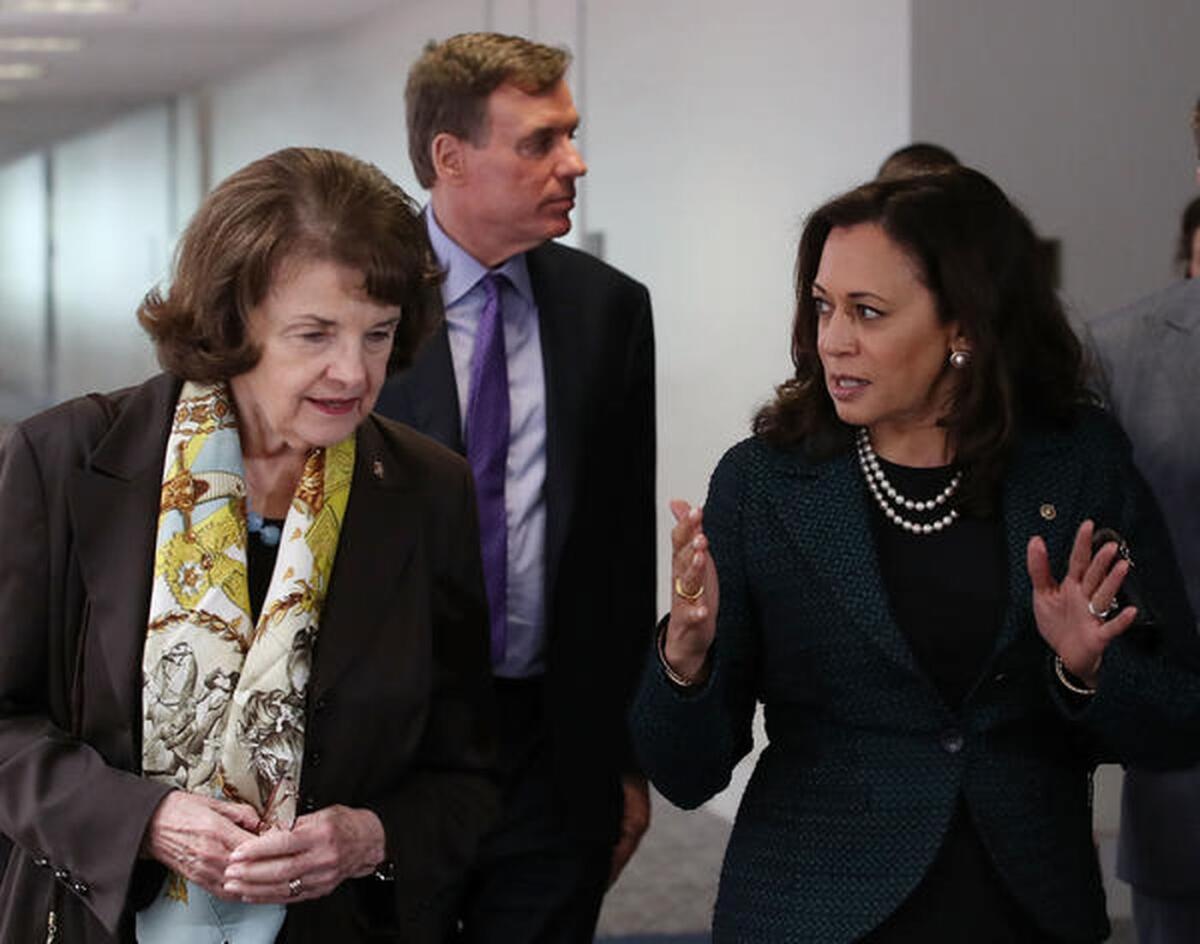
They both want to protect “Dreamers.” But California’s senators, both Democrats, cast different votes on a bipartisan immigration bill Thursday.
Many activists were upset by the plan to protect Dreamers from deportation in exchange for $25 billion for border security and wall funding.
Sen. Kamala Harris voted no. Sen. Dianne Feinstein voted yes.
The plan would have failed either way. It only received 54 of the 60 votes it needed.
Harris said in a statement that the border wall funding, a campaign promise made by President Trump, is “a waste of taxpayer money.”
“A wall will not secure our border and I remain concerned those billions of dollars may also be used to implement this Administration’s anti-immigrant agenda — one that targets California and its residents,” she said. “I recognize that my colleagues faced the impossible challenge of crafting a bill that could meet the White House’s unreasonable and ever-shifting demands. But regrettably this bill is simply not the answer,” Harris said.
Feinstein, who voted in favor of the bipartisan bill, said in a statement she is “beyond heartbroken at today’s result,” adding, “I’m disgusted.”
“The bill we voted on was flawed and not what I would’ve drafted. I’ve made my preference clear, and that’s a vote on a clean Dream Act without the poison pill amendments that Republicans insist on. But Democrats worked hard and made significant compromises to move a bill that addressed Republican concerns. And even then, they still voted it down,” she said.
Trump had threatened to veto the bipartisan bill.
The Senate brought up four separate proposals Thursday to deal with the legal status of people brought to the country illegally as children after Trump ended the program granting them temporary deportation protections, but none got the 60 votes needed to move forward. Each also addressed other immigration related issues. California’s senators voted alike on the three other proposals, which included one pushed heavily by the White House.
An estimated 222,000 people who benefited from the deportation protections live in California.
California special needs students would be allowed to use medical marijuana in school under new legislation

California minors with special needs or severe disabilities who rely on marijuana for medical purposes would be allowed to use the drug at their school under legislation introduced this week by state Sen. Jerry Hill (D-San Mateo).
The measure would allow a parent or guardian to administer the drug in the form of oil, capsules, tinctures, liquids or topical creams on school campuses where the practice has been approved by the county board of education, Hill said.
Students in kindergarten through 12th grade are currently prohibited by law from taking medical cannabis on school campuses, so parents have to take their children off campus to administer the medicine.
“This legislation is about giving students access to the medicine they need so they have a better chance for success in the classroom and in the community,” Hill said.
The measure does not allow the drug to be smoked or ingested through vaping on campuses.
The idea for SB 1127 was suggested to the senator by Nancy Magee, associate superintendent of the San Mateo County Office of Education. Magee said she knows a parent whose son suffers from Lennox-Gastaut syndrome, or severe epilepsy, and would have up to 50 seizures a day before he started taking medical cannabis.
“Children with significant health conditions often face challenges that interfere not only with their ability to attend school and to learn, but also to have normal childhood experiences like making friends and being part of a school community,” Magee said.
------------
FOR THE RECORD
Feb. 15, 2:07 p.m.: An earlier version of this post said that Nancy Magee, associate superintendent of the San Mateo County Office of Education, has a son with epilepsy. The boy she mentioned is actually the son of a parent whom Magee knows.
------------
California lawmaker wants to stop Facebook from sharing children’s information without clear consent from their parents
A Southern California legislator wants Facebook and other social media sites to obtain clear permission from parents before allowing children and teens to use their services.
Assemblyman Ed Chau (D-Monterey Park) says an increasing number of websites and apps are collecting personal information and content from young users that can be used to market brands and products. But the consent agreements that make these practices possible are often buried in general terms and conditions for use of service, and companies often allow minors to sign up with no more than a promise that they have asked their parents for permission.
A bill Chau introduced Wednesday would prohibit websites and apps from allowing California minors to agree to their terms. And if companies do seek any kind of permission from minors, they won’t be able to bury the details in the fine print of general use agreements.
Democrat running for Rep. Ed Royce’s seat gets nod from major California labor union
Vulnerable California Republican breaks with Trump on gas tax
Vulnerable California Republican Rep. Mimi Walters broke with President Trump on Thursday over his desire to raise the national gas tax to pay for infrastructure.
She responded on Twitter to a Washington Post article reporting that Trump is pitching a 25-cent increase in the gas tax. The current 18.4 cents per gallon national gas tax hasn’t been increased since 1993.
The topic has particular weight in California where several California representatives, including Walters of Irvine, are helping bankroll an effort to put a proposition repealing the state’s new fuel taxes and new vehicle fees on the 2018 ballot.
Republicans are hoping to make the tax hikes a major issue in California as a way to bring out Republican voters in a year when Democrats appear to have the momentum as they attempt to flip Republican-held seats. Walters’ campaign has contributed $25,000 to the state repeal effort.
The increased fuel taxes and new vehicle fees approved last spring by the Legislature are expected to raise $5.2 billion annually for road and bridge repairs and improvements to mass transit.
California lawmakers want to boost tenant protections
Following failure of a bill that would have expanded rent control, a trio of California lawmakers is introducing legislation aimed at adding other protections for renters.
Democratic Assemblymen David Chiu of San Francisco, Richard Bloom of Santa Monica and Rob Bonta of Alameda want to make it harder to evict tenants and extend timelines before evictions could occur.
“We’re in the midst of the worst tenant crisis in our state’s history,” said Chiu, chairman of the Assembly Housing and Community Development Committee. “Tenants are facing unprecedented hardships and constantly under the threat of eviction.”
Here are the three bills:
- Assembly Bill 2364 from Bloom makes changes to the Ellis Act, the state law that allows landlords to evict tenants from rent-controlled apartments if they are tearing down a building or getting out of the rental business. Bloom’s bill would make it harder for landlords to evict tenants unit-by-unit and provide one year’s notice before an eviction could occur.
- Assembly Bill 2343 from Chiu extends the time tenants have to pay rent before being evicted and gives tenants more time to respond to an eviction lawsuit.
- Bonta’s legislation, which he plans to introduce by the end of the week, would force landlords statewide to comply with a list of defined reasons, such as damaging a unit, creating a nuisance or not paying rent, before they could evict someone, a process known as “just-cause” eviction.
One third of California renters pay more than half their incomes on rent, according to a recent state report. Tenant advocates also are collecting signatures for a potential November ballot measure to expand rent control statewide.
Assemblywoman Cristina Garcia accused of improper workplace behavior by anonymous ex-staffers
A lawyer representing four anonymous former staffers of Assemblywoman Cristina Garcia (D-Bell Gardens) filed a letter with the Assembly on Wednesday, alleging the legislator had created an inappropriate workplace environment.
The allegations, unveiled in an unusual news conference on the steps of the state Capitol, involve alcohol use in the office and raunchy conversations about sex.
The letter comes on the heels of accusations by two men that Garcia made improper advances on them. Garcia has denied wrongdoing and went on unpaid leave while the matter is investigated.
The attorney, Dan Gilleon, said his clients saw an opportunity to voice their concerns after the initial allegations were made public last week.
“Ms. Garcia for so long has been acting like the hero of the Me Too movement,” Gilleon said. “They just knew that wasn’t anywhere near the truth.”
Gilleon said his clients did not speak out publicly because they fear reprisal, even though they are not currently employed by the Legislature.
“They are former employees, but they still want to be back here someday,” Gilleon said. “They want to be back in politics and they realize there are long memories in this business.”
In a statement released shortly after the news conference, Garcia did not address the specific allegations, but broadly pushed back against claims of a hostile work environment.
“In order for legislators to accomplish all we want for the people of our districts and the people of California, we need talented staff who feel empowered to do their work,” Garcia said. “That is the environment I strive for in my office and I am confident I have consistently treated my staff fairly and respectfully.”
Tim Reardon, a former chief of staff to Garcia, disputed the behavior described by the unnamed former staffers.
“In all the time I was there, not one of these staffers ever came to me,” said Reardon, who retired in 2016. “I know nothing of any of these incidents.”
Gilleon is a well-known attorney in San Diego who frequently sues law enforcement agencies on behalf of victims of alleged police misconduct. He also represented a city of San Diego employee in a sexual harassment case against former Mayor Bob Filner.
He told reporters that his clients would be willing to cooperate with an Assembly investigation into Garcia so long as he believes they will not face retaliation for their participation.
“What I’m going to be listening for is someone contacting me in good faith and saying, ‘Listen, we’re going to do whatever it takes to protect them,’” Gilleon said.
Times staff writer Liam Dillon contributed to this report.
Stockton Democrat temporarily takes over California Legislative Women’s Caucus while chair faces harassment investigation
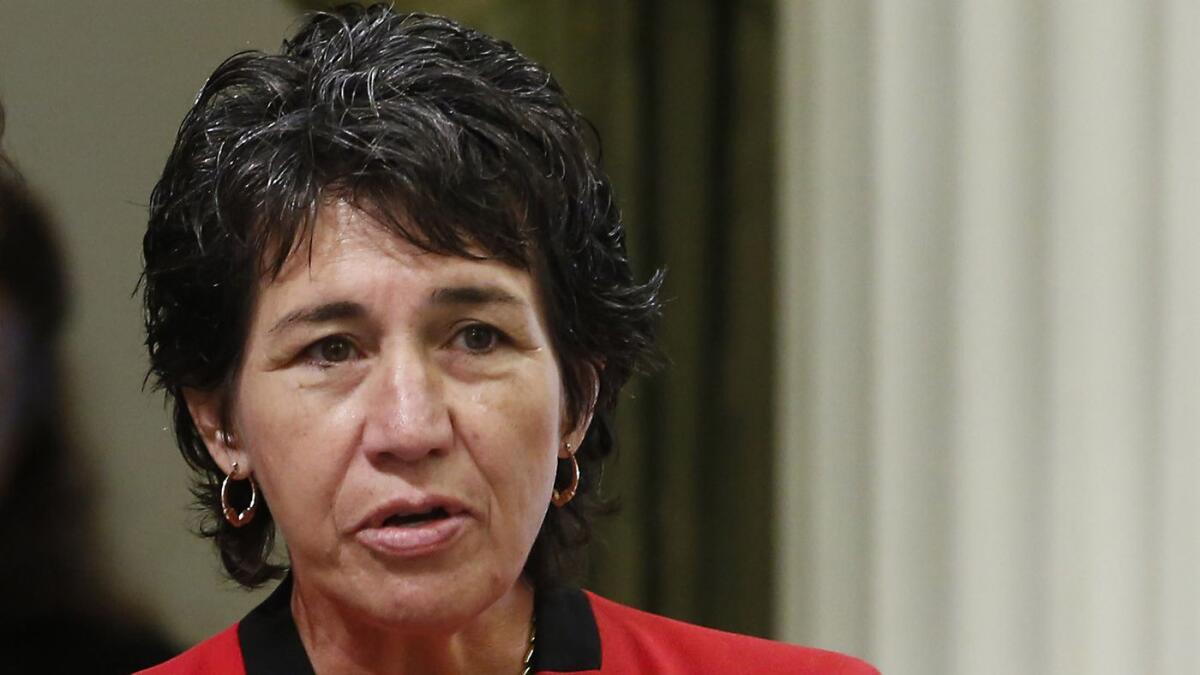
Assemblywoman Susan Talamantes Eggman (D-Stockton) will take the reins of the California Legislative Caucus, the group announced Wednesday, filling the vacancy created by Assemblywoman Cristina Garcia’s leave of absence over sexual harassment allegations.
Eggman will serve as “acting interim chair” of the bipartisan group, which has been influential in shepherding legislation pertaining to women, children and families. The caucus also has taken a lead role in responding to the sexual misconduct controversies that have engulfed the Capitol in recent months.
Those controversies hit particularly close to home last week, when Garcia was accused by two men of making improper advances. Garcia has denied wrongdoing, but voluntarily took unpaid leave pending an investigation into her conduct.
“I am humbled that my colleagues have placed their faith and trust in me to lead the Caucus during these challenging times and I look forward to working closely with Vice Chair Senator Leyva and the rest of my colleagues in the Caucus as we work to promote the well-being of women, children and families in California,” Eggman said in a statement.
Democratic candidates are starting to turn on each other in race for Rohrabacher’s seat
With a little over three weeks left before the candidate filing deadline, Democratic candidates are starting to turn on each other in California’s crowded House races.
In the 48th Congressional District, where Rep. Dana Rohrabacher is facing several well-funded challengers, Democrat Harley Rouda has just unleashed a pair of attack ads against one of his primary opponents, Hans Keirstead.
In one of the ads, called “Preposterous,” Rouda accuses Keirstead of lying about his credentials and making up a “phony story” about House Democratic leaders promising him plum chairmanship appointments if he’s elected.
Both claims have been pushed over the past several weeks as part of an accelerating stream of opposition research against Democratic candidates, much of it floated to reporters on condition of anonymity.
But Rouda’s ad is the one of the first significant moves by a major Democratic congressional candidate in California to publicly attack a fellow challenger. The ads will be part of a digital media buy of at least $10,000, his campaign says, aimed in part at state delegates who will meet to make the California Democratic Party’s endorsement in the race next weekend.
In a statement, Kyle Quinn, campaign spokesman for Keirstead, accused Rouda of “tired political games” and called the attacks “false and ludicrous.”
Previous ads from Rouda and other Democratic challengers have focused on badgering GOP incumbents or linking them to President Trump.
With more than half a dozen Democrats running in some races, including Rohrabacher’s, watch for more spending on negative ads as Democrats fight each other to make it through California’s top-two primary.
UPDATE
7:02 p.m.: This post was updated with a comment from Keirstead’s campaign.
Former top Hillary Clinton aide Amanda Renteria enters race for California governor
Amanda Renteria, a top aide to Hillary Clinton’s presidential campaign, is stepping down from her post at the California attorney general’s office to run for governor, according to Atty. Gen. Xavier Becerra.
“I wish her a great deal of luck. I obviously hired her because I knew she was pretty capable,” Becerra told The Times on Wednesday.
Renteria filed a statement of intent to run for governor with the secretary of state’s office. Attempts to reach her were unsuccessful.
Under investigation for harassment allegations, Sen. Tony Mendoza forms legal defense fund
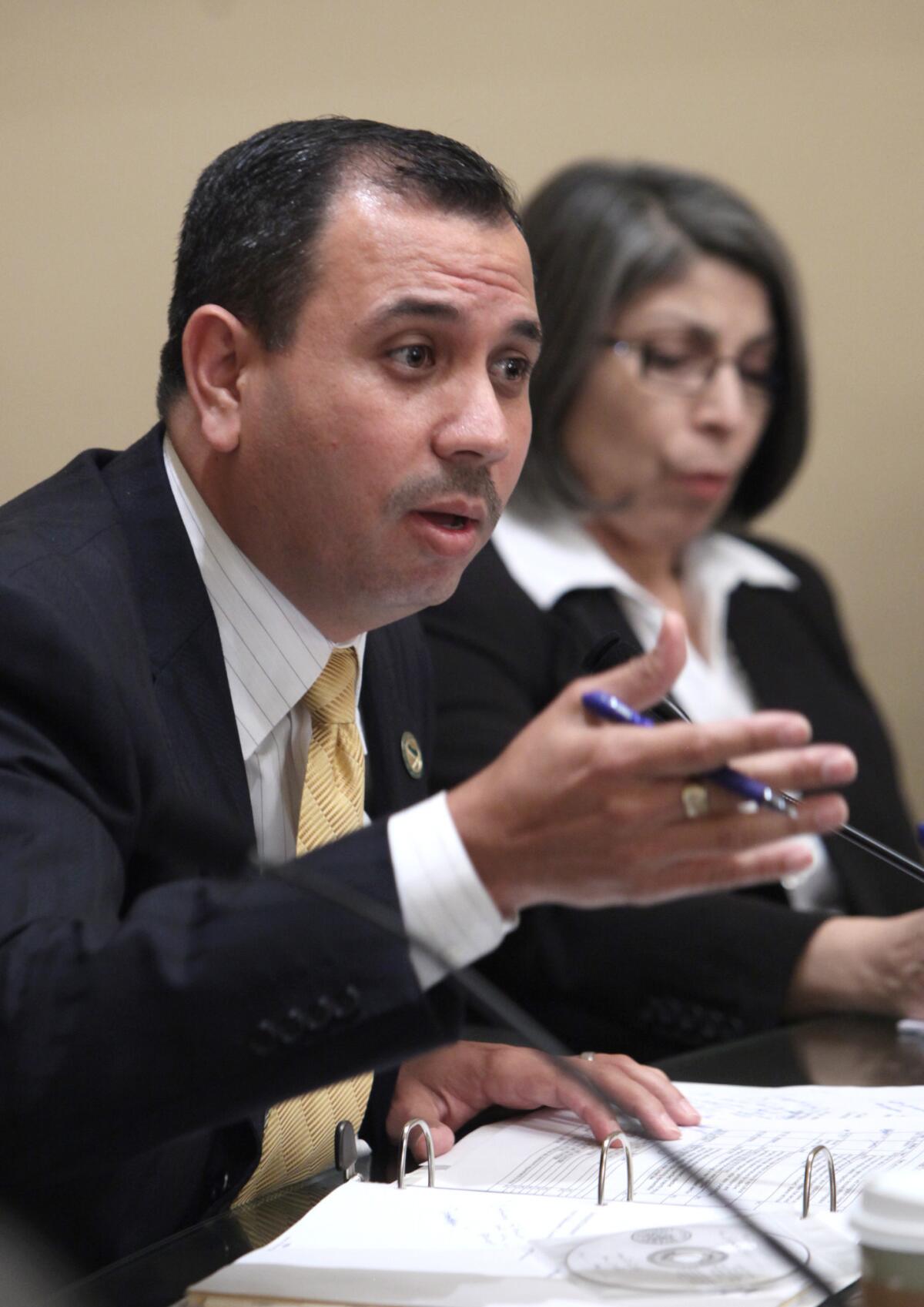
For the second time in as many years, state Sen. Tony Mendoza (D-Artesia) filed papers Wednesday to establish a legal defense fund, this time to raise money from political supporters to cover his legal expenses as he faces an investigation into allegations that he sexually harassed three female aides.
“The senator is required to defend himself in administrative, Senate and civil proceedings that are related to his conduct in office,” Mendoza’s filing says. “In or around December 2017, a former employee of the Senate filed a complaint with the Department of Fair Employment and Housing. In her DFEH complaint the former employee alleges she was terminated after reporting allegations that the senator had made a Senate fellow feel uncomfortable.”
The filing notes that the fair employment department issued the woman a right-to-sue notice and she has since filed a claim for damages to the Senate, a prerequisite to filing a civil action. It had not report any fundraising as of Wednesday.
The practice of allowing corporate interests and labor groups to make unlimited contributions to help legislators with legal problems is troubling to Kathay Feng, executive director of California Common Cause.
“There is that serious concern that there is the appearance or the reality that when special interests put money in unlimited amounts into a defense fund that it can have a strong impact on that legislator’s future votes,” Feng said.
Mendoza closed an earlier legal defense fund last year after raising $67,000 to defray costs of dealing with an investigation by the state Fair Political Practices Commission that determined he violated campaign finance laws during the 2012 election.
Mendoza and others ended up paying $63,000 in fines in that case. His earlier legal defense fund received contributions from casinos, including the Bicycle Club Casino; labor groups, including the State Building and Construction Trades; and trade groups, including the Personal Insurance Federation Committee.
Sen. Tony Mendoza gets criticism for introducing bills while on leave, but aide said the action was cleared with Senate

Christine Pelosi, chairwoman of the state Democratic Party’s Women’s Caucus, is criticizing the ability of Sen. Tony Mendoza (D-Artesia) to introduce 15 bills this week even though he is on a leave of absence pending an investigation of sexual harassment allegations.
Pelosi blasted the action on Twitter: “#WeSaidEnough to the FARCE of #CASenate‘s Tony Mendoza being ‘on leave’ for sexual harassment allegations but STILL being allowed by the Senate to introduce legislation.”
However, Mendoza spokesman Saeed Ali said the staff’s submittal of the bills was cleared with the Secretary of the Senate. The deadline for introducing bills for the year is Friday.
“The spot measures were put across the desk by the Capitol staff in order to protect Sen. Mendoza’s ability to introduce legislation and meet legislative deadlines,” Ali said. “The action is consistent with the leave conditions as it protects [the] senator’s ability to introduce measures within legislative deadlines.”
Rep. Kevin McCarthy brushes off questions about White House chief of staff job
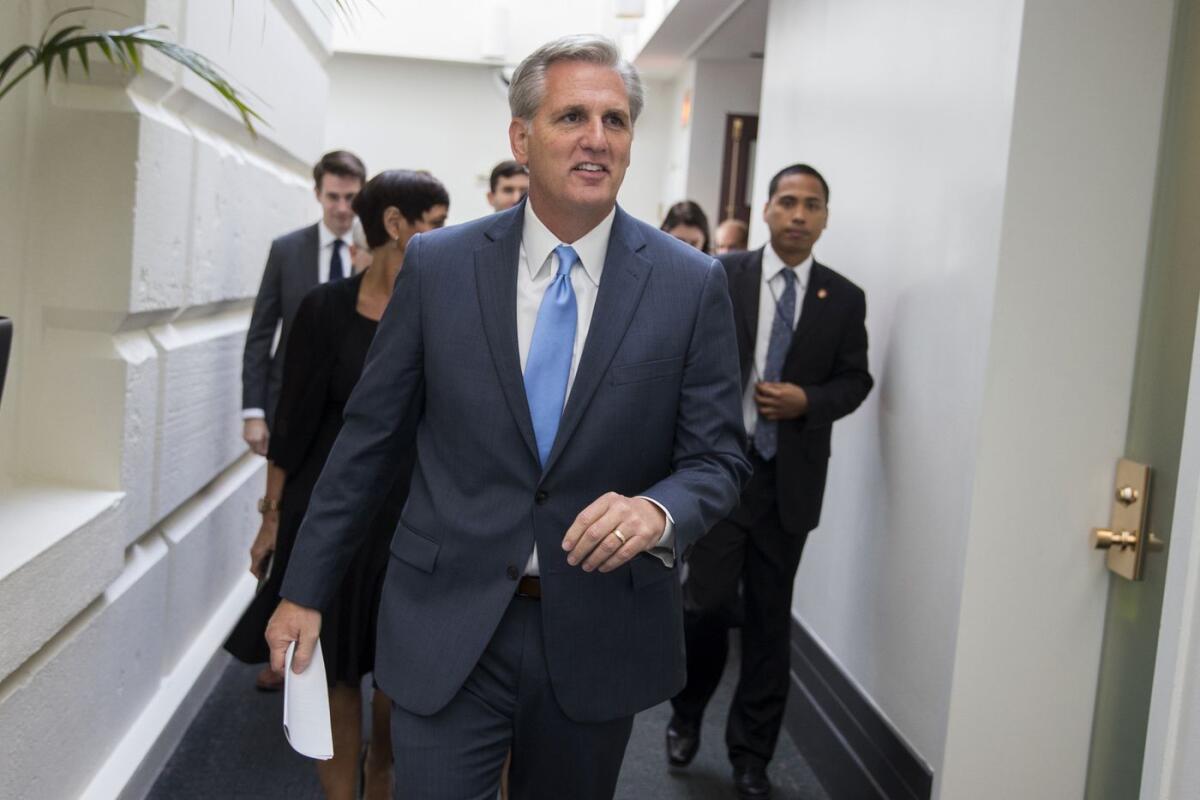
House Majority Leader Kevin McCarthy of Bakersfield said Wednesday he hasn’t spoken with President Trump about a job as his chief of staff.
“I have not spoken with the president about anything about a job, and I never have and there is no job opening,” McCarthy said when asked about rumors he may be among the picks to take the job during House Republicans’ weekly press conference.
“Oh, geez,” House Speaker Paul D. Ryan (R-Wis.) said in response to the question.
A source told Times reporters that President Trump is upset with current Chief of Staff John F. Kelly and his handling of domestic violence allegations against staff secretary Rob Porter, who resigned or was fired Wednesday. Kelly praised Porter a day before he left the White House as “a man of integrity and honor.”
Trump has referred to McCarthy as “my Kevin” repeatedly in the last year, and the two have a fairly close relationship. Rumors that McCarthy might be his next pick for chief of staff have circulated multiple times.
After Wednesday’s news conference, McCarthy wouldn’t say whether he would be interested in the job.
“There is no job. I’m not interested in a job that’s not there. I’m interested in being majority leader ... and that’s where my focus is,” he said.
McCarthy was considered the heir apparent for the speakership in 2015 after John A. Boehner (R-Ohio) abruptly resigned, but McCarthy suddenly withdrew from consideration after failing to win over House conservatives.
Countering Trump administration, a California legislator wants to ban work requirements for Medicaid
As states led by Republicans prepare to impose tough new conditions for Medicaid recipients with the Trump administration’s blessing, a California legislator wants to ensure no such requirements would be enacted here.
State Sen. Ed Hernandez (D-Azusa) has introduced a bill that would bar the state from asking the federal government’s permission to impose work or volunteer requirements in order for low-income residents to be eligible for Medicaid, known in California as Medi-Cal.
Last month, the Trump administration issued guidance that, for the first time in the program’s history, it would consider allowing states to enact work or community service requirements to qualify for Medicaid.
The state of Kentucky swiftly received permission to adopt such requirements in its Medicaid program. The state projected significant cost savings from the new conditions, but critics have argued that the changes to the program will make it harder for poorer residents to get healthcare. Indiana also got a waiver to establish work requirements, and other states are poised to seek similar changes.
In an interview, Hernandez said that with Senate Bill 1108, he is ”making a statement that people deserve healthcare. It’s more about access to care as opposed to limiting it or making it more difficult.”
The measure would also prohibit the state from seeking the federal government’s approval to impose waiting periods or time limits on coverage.
Jen Flory, a lobbyist with the Western Center on Law and Poverty, which is sponsoring the bill, said she didn’t believe California’s current leadership would want to change Medi-Cal so that it would inhibit residents from getting health coverage. The state has enthusiastically embraced the Medi-Cal expansion under the Affordable Care Act.
But she said there were concerns that the Trump administration would want to “strong-arm” states into pursuing such policies, and said Hernandez’s bill could guard against that.
“We think the Trump administration has it exactly backwards,” Flory said. “It’s not working that should give you access to healthcare. Healthcare enables you to work.”
He’s on a leave of absence during a sexual harassment investigation, but he’s just introduced flurry of bills
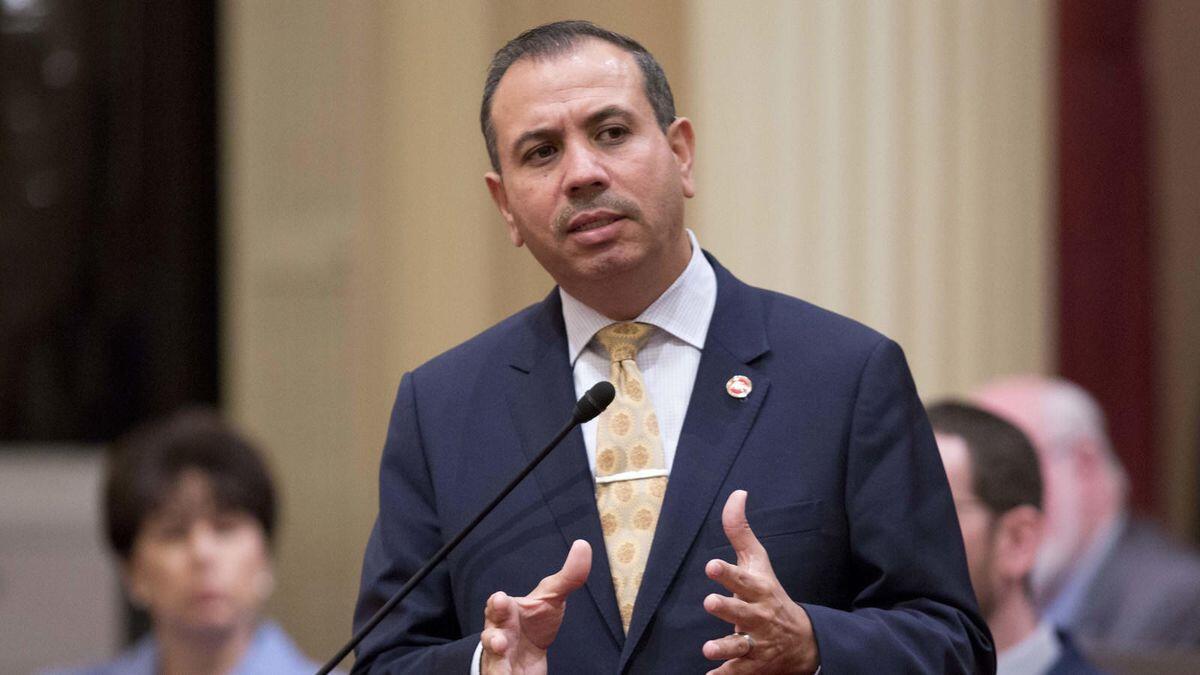
Despite being on a leave of absence pending a sexual harassment investigation, state Sen. Tony Mendoza has introduced 15 pieces of legislation this week, including a measure that would remove the Legislature’s exemption from state audits.
A representative of the Senate said the action does not violate the terms of Mendoza’s leave because his office is allowed to continue operating in his absence.
Friday is the last day for bills to be introduced for this session and most of the bills introduced by Mendoza are measures known as “spot bills,” which state a general topic but are meant to be amended later to include specific law changes.
The spot bills introduced by Mendoza relate to mail ballot elections, counties, workers compensation, health facilities and parks. Mendoza also introduced measures requiring government agencies that are late in contributing money to public pension funds to notify their members.
Another would postpone by one year a requirement that school buses be equipped with devices to warn if children are left on the buses.
Mendoza (D-Artesia) went on a leave of absence in early December to allow outside attorneys hired by the Senate to look into allegations that he harassed three former female aides, charges he has denied.
The Senate Rules Committee voted on Jan. 24 to extend the leave for 60 days or until the investigation is complete, setting conditions that Mendoza “shall not exercise any of the rights, privileges, duties, or powers of his office, or utilize any resources of the Legislature, during the period of the leave of absence.”
Assemblywoman Cristina Garcia (D-Bell Gardens) took a leave of absence on Friday pending a harassment investigation but has not introduced any bills since then.
Three of the top Democrats in the governor’s race vow to make California — and Sacramento — more diverse
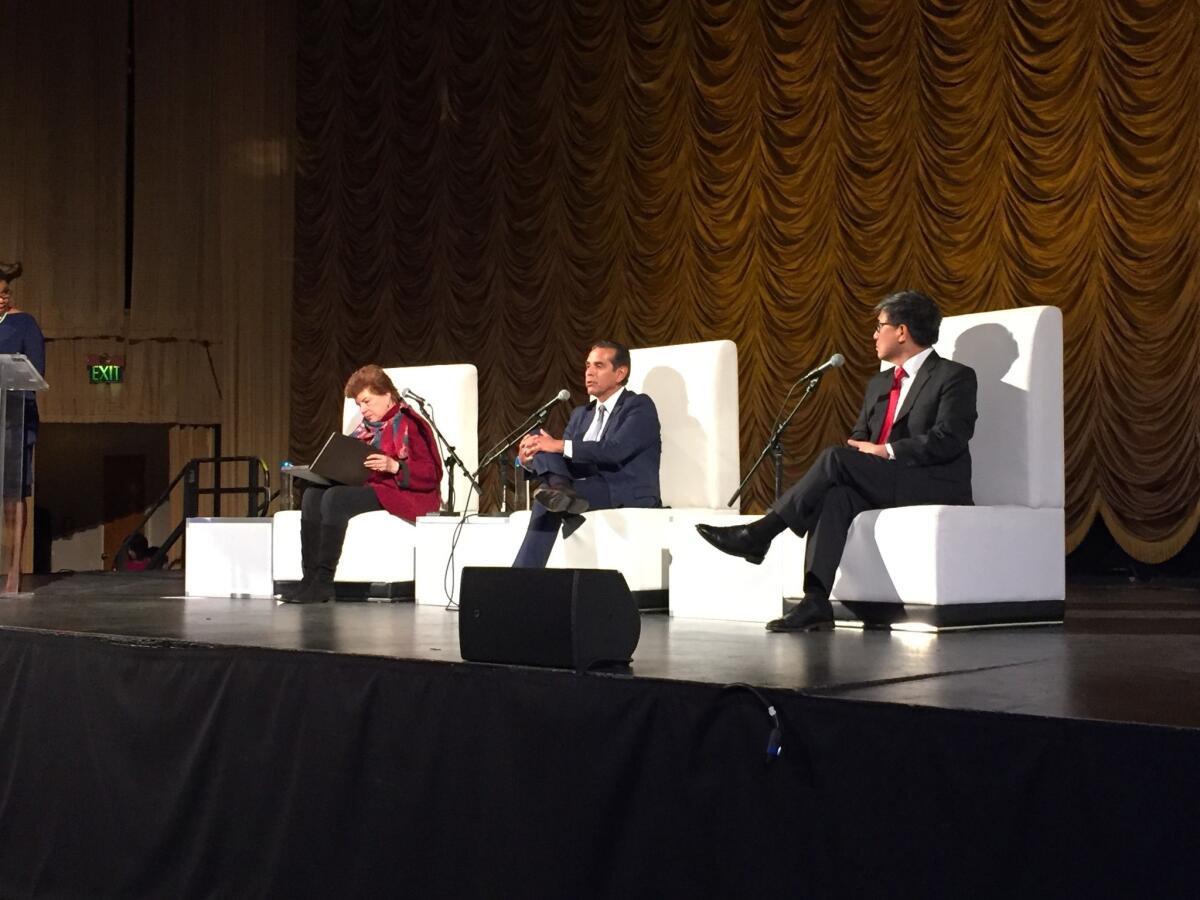
Three of the top Democrats in California’s race for governor vowed to help enrich the lives of women of color in California, both economically and in political influence, at a congenial candidate forum in Sacramento on Tuesday evening.
The event centered on issues affecting African American women in California, with the conversation focused on how the three would improve access to healthcare and education.
Former Los Angeles Mayor Antonio Villaraigosa, state Treasure John Chiang and former state schools chief Delaine Eastin aligned on nearly every issue. Each spoke of their records hiring diverse staff and fighting for equal rights.
Eastin, the only top female candidate in the race, took advantage of the receptive audience inside the Crest Theatre, calling for paid maternity leave, free college tuition and state-sponsored universal heathcare.
When asked about the #MeToo movement and protecting women in the workplace, Eastin quickly went after Sacramento political leaders who she said protected “thugs” in the Legislature by paying settlements to women who have come forward with allegations of sexual misconduct.
“It is outrageous that you as taxpayers have leaders of both houses of the Legislature using public money to buy people’s silence,” Eastin told the audience.
Lt. Gov. Gavin Newsom, the front-runner in the race, was campaigning in Los Angeles on Tuesday and did not attend the event. Villaraigosa and Chiang made sure the audience took notice of his absence.
“I come from a community where it’s important to show up,” Villaraigosa said.
The forum, called Our Time to Engage, was sponsored in part by the Oakland-based firm of Gray, Geer, Shelby and Vaughn.
Melanie Shelby, managing partner of the firm, moderated the event and pressed the candidates on issues important to many African American women in California.
Roughly 1 in 5 African American women in the state live in poverty, according to an analysis of census data by the National Women’s Law Center. Black women also suffer a severe wage gap in the workforce, earning just 60% of what white men are paid, and 82% of what African American men are paid, according to the U.S. Department of Labor.
African American women continue to be a major force in national politics. According to exit polls, more than 90% of black women voted for Democratic presidential nominee Hillary Clinton in the 2016 election.
In December’s U.S. Senate race in Alabama, African American women provided a staggering level of support for Democrat Doug Jones, with nearly 98% voting for him, according to exit polls. That support is credited with helping Jones defeat Republican Roy Moore, who was accused of sexual misconduct by several women, making Jones the first Democrat elected senator in Alabama in 25 years.
State Sen. Holly Mitchell (D-Los Angeles) drove that point home when she took the stage to wrap up the forum.
“When candidates speak our language, when candidates don’t take us for granted, we show up,” Mitchell said.
Veteran Democratic operatives leading a new PAC that plans to play in California’s House primaries
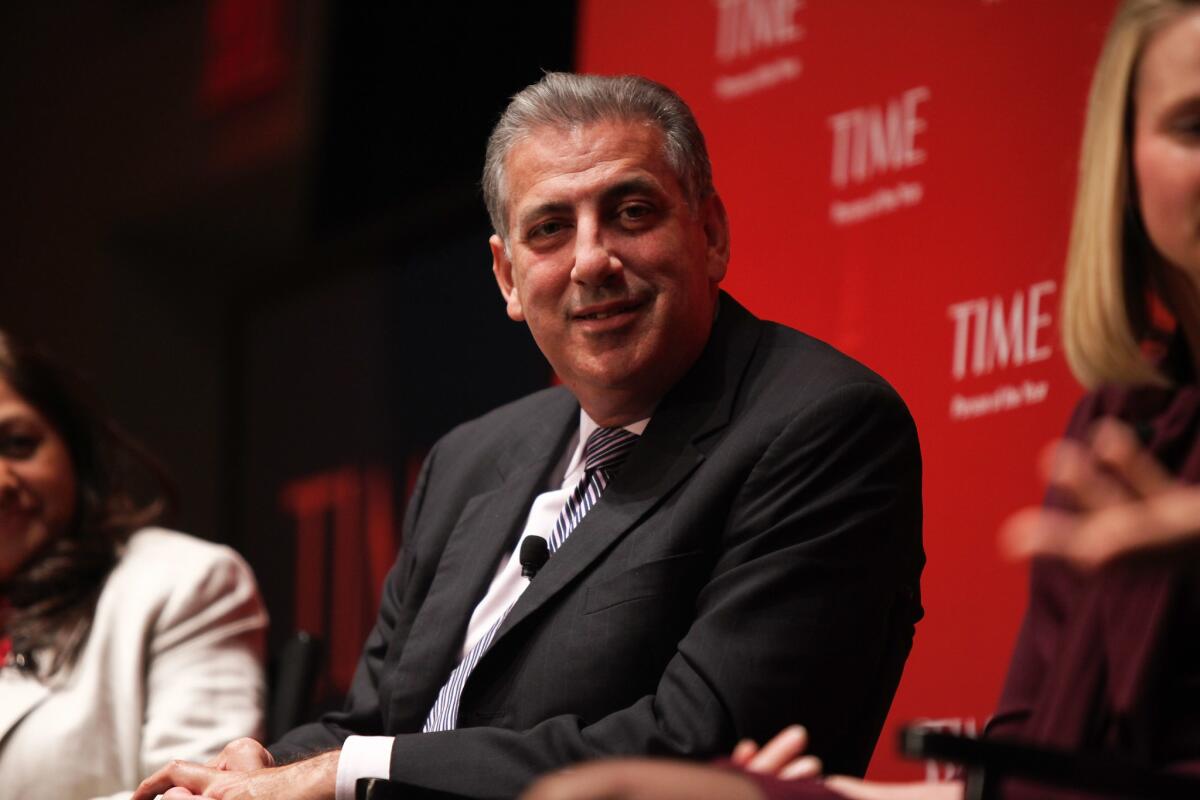
There’s yet another new PAC in town ahead of California’s midterm elections and this one is hoping to back Democratic candidates in already-crowded primaries for GOP-held seats.
Veteran Democratic strategist Joe Trippi and pollster Paul Maslin are calling their committee CA-BAM (get it?) and aim to raise about $5 million to spend on at least five House races here. The goal, according to a press release, is to “identify the strongest Democrats with the best path to victory” and spend money to help them win.
Trippi, who served as a media strategist for Democrat Doug Jones’ special Senate election victory in Alabama, now says he wants to help flip seats in California.
With its launch Tuesday, organizers are already pushing polling that shows Emily’s List-backed Katie Hill is their favored candidate in Rep. Steve Knight’s 25th Congressional District. A polling memo released by the group says Hill’s strength “comes from her ability to garner support beyond the Democratic base.” One of Hill’s primary opponents, two-time challenger Brian Caforio, received more than 70% of votes from in a recent pre-endorsement conference of party activists and is poised to receive the state party endorsement at next week’s convention.
“[Democrats] have won a lot of swing districts...in California by getting in early in the primaries,” said Josh Pulliam, the committee’s political consultant. “We want to bring that same approach to this open primary system.”
Pulliam says CA-BAM is already in the field with a poll in Rep. Darrell Issa’s 49th Congressional District, which has attracted at least five Democratic candidates and several other Republicans since Issa announced he would retire. The group is also looking at other closely watched House races in Orange County, including seats held by Reps. Dana Rohrabacher, Mimi Walters and Ed Royce, who is also retiring.
Pulliam said after spending money to ensure the best-positioned Democrat gets through the June 6 primary, the group will train their efforts against GOP incumbents in the general.
The group has reported receiving money from two donors so far: $1,000 from Stanford University professor Claude Goldenberg and $10,000 from Diane Lander-Simon, a former actress who is on the group’s board.
SEIU endorsement of Kevin de León is a big boost in his bid to unseat Sen. Dianne Feinstein
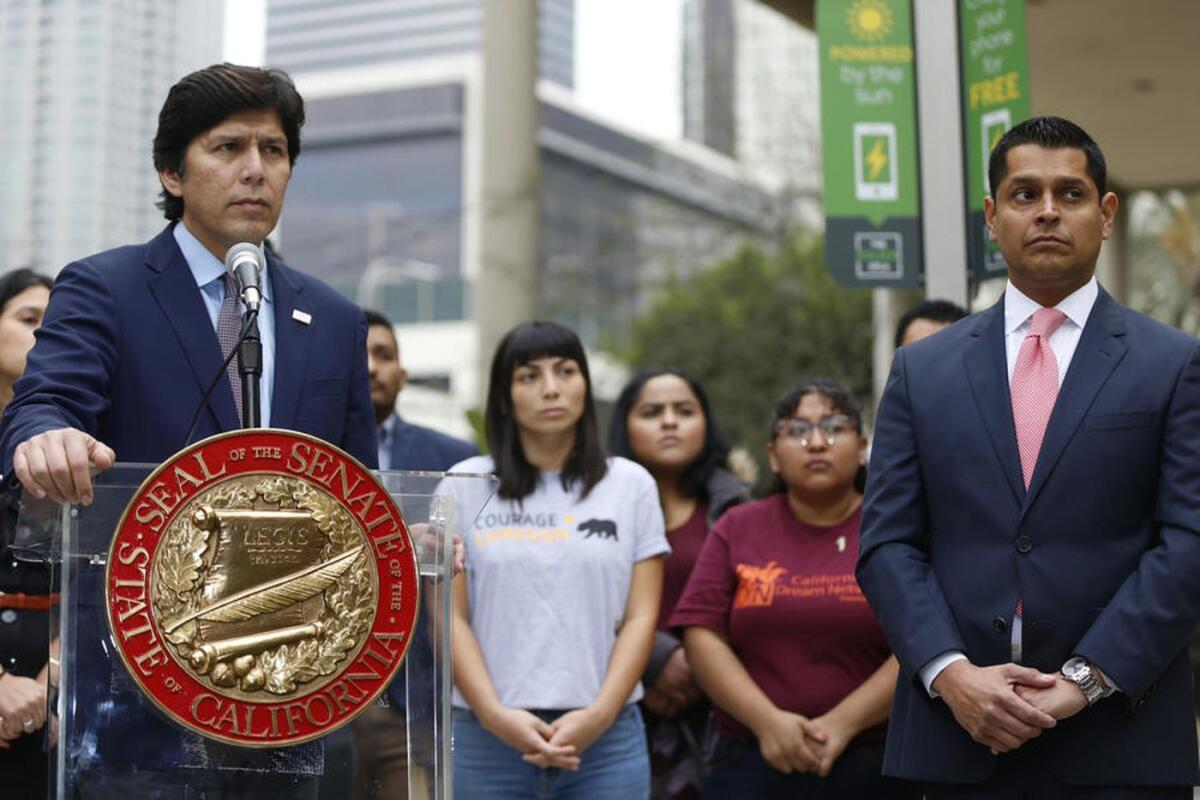
California Senate leader Kevin de León received a significant boost in his insurgent bid to defeat U.S. Sen. Dianne Feinstein on Tuesday, winning the endorsement of one of the state’s most politically powerful labor unions.
The Service Employees International Union announced it was endorsing California’s Senate president pro tem because of his efforts on a $15 minimum wage, immigration and environmental justice.
“Kevin de León is a leader who speaks up for California values. His leadership on the most pressing challenges facing California stands in stark contrast with the dysfunctional political establishment in Washington, D.C.,” said David Huerta, an executive board member with the union’s California group. “… He’s stood up for us and our California values again and again, and now we are proud to stand shoulder to shoulder and endorse Kevin de León to be our next U.S. senator.”
Bill Carrick, Feinstein’s long-time political advisor, said the endorsement would not affect their plans.
“The reality is we intend to compete for votes from everybody and we hope we’re going to get the support of not only labor members but SEIU members,” Carrick said. “He’s obviously got relationships based upon his relationships in Sacramento that are helpful to him.”
The SEIU announcement follows an endorsement of De León from the California Nurses Assn., another important labor group in the state. But that move was less surprising — CNA has a history of bucking the establishment, including their vocal support of Vermont Sen. Bernie Sanders over former Secretary of State Hillary Clinton during the 2016 Democratic presidential primary.
Nurses union backs Kevin de León in his effort to topple Sen. Dianne Feinstein >>
De León has been a champion of the nurses’ top legislative priority, a single-payer healthcare bill that passed the state Senate in 2016 but stalled in the Assembly because of concerns about costs.
SEIU is more establishment-minded and gave Feinstein high ratings in most of its legislative scorecards in recent years.
De León still faces a steep uphill battle trying to defeat the 25-year Senate veteran, primarily due to her enormous financial advantage over him. She started the year with nearly $10 million cash in the bank, while De León reported $360,000.
But the endorsement gives De León a burst of momentum in the lead-up to the California Democratic Party’s convention next week, when delegates decide whether to endorse in the race.
Updated at 5:47 p.m.: This post was updated to add a comment from Feinstein’s long-time political advisor.
Survivors of human trafficking in California can now sign up for confidential mailing addresses
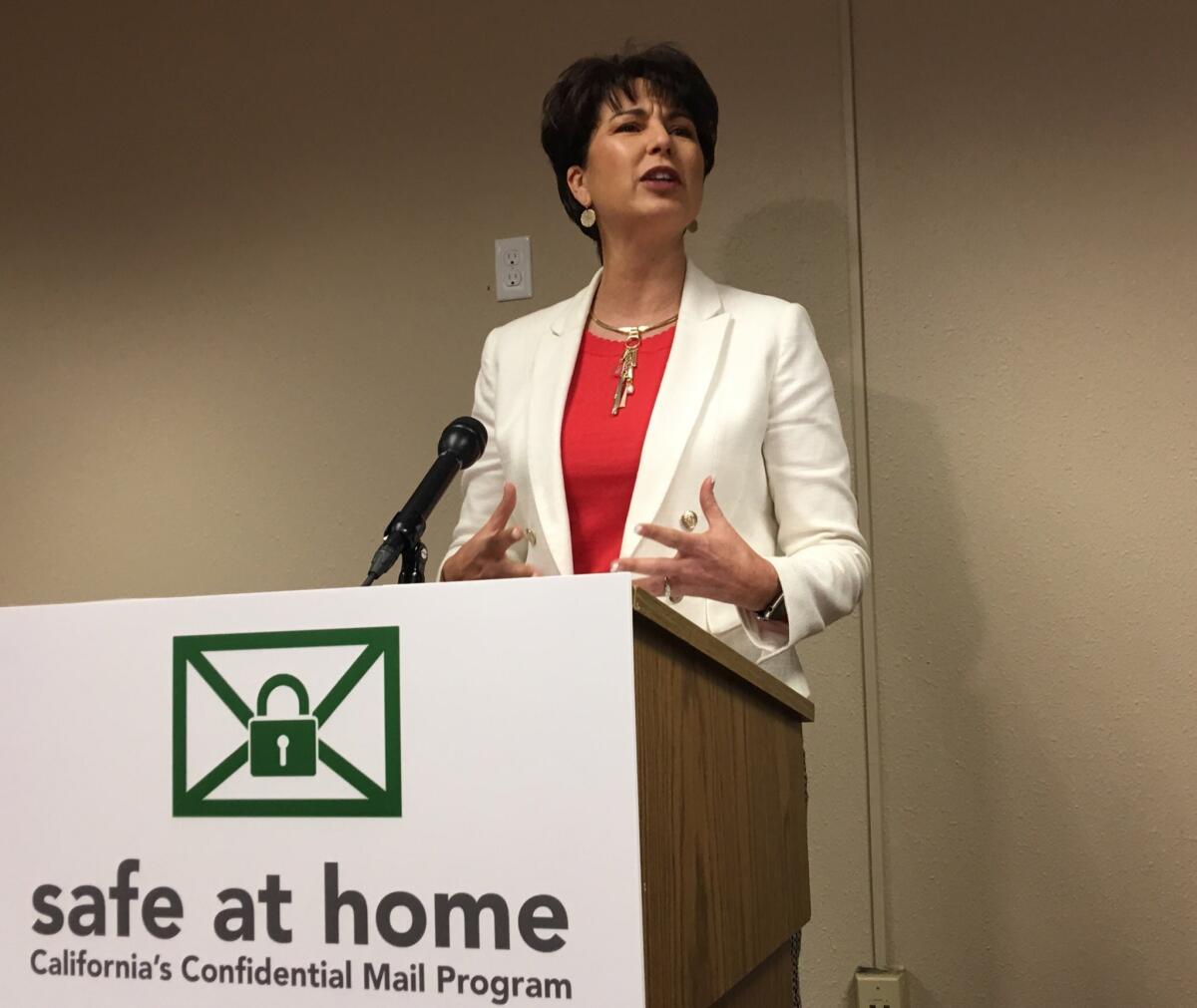
Human trafficking survivors can now sign up for a confidential mailing address program that enables some California crime victims to privately receive mail, open bank accounts and register to vote.
“California’s Safe at Home program has been a critical resource to survivors of domestic violence whose abusers continue to harass, threaten and stalk them even after they have ended the relationship,” state Sen. Connie M. Leyva (D-Chino) told reporters Monday. “Survivors of human trafficking often face similar threats ... and this is especially true when survivors have testified against their traffickers and fear retaliation.”
The Safe at Home initiative, established in 1999, has provided a free post office box and mail forwarding service to at least 7,000 victims of domestic violence, sexual assault and stalking. A state law last year introduced by Leyva, at the request of California Secretary of State Alex Padilla, expanded eligibility to human trafficking survivors.
As part of its expansion, Padilla overhauled the program’s website, informational materials and enrollment forms. He did not have an estimate on how many survivors could be potentially served.
But California has some of the highest reports of human trafficking in the nation, and a new report found it ranks No. 1 in the country for concentration of illicit massage businesses.
“We know the demand [for this program] is high,” he said.
Powerful labor union backs Gavin Newsom for California governor
The Service Employees International Union, one of the most powerful and deep-pocketed labor unions in the state, endorsed Lt. Gov. Gavin Newsom’s gubernatorial bid on Tuesday.
“SEIU California members are ready to work our hearts out to see Gavin Newsom sworn in as California’s next governor,” said Roxanne Sanchez, the union’s president. “We believe that California can show the nation the way forward to a society that values every person and makes real progress toward economic and racial justice. Gavin Newsom will be both a visionary leader and, more important, a partner of working people in accomplishing these goals.”
SEIU, which has about 700,000 members statewide, will focus on boosting support for Newsom in Los Angeles County and other large urban areas with a focus on minority voters and union households.
The union plans to spend a minimum of hundreds of thousands of dollars on these efforts and will put its members — most of whom work in Los Angeles County — to work on the ground, according to someone familiar with their plans who was not authorized to speak publicly.
L.A. County and minority voters are groups that Newsom’s strongest rival, former Los Angeles Mayor Antonio Villaraigosa, is counting on in his gubernatorial bid.
Villaraigosa sparred with SEIU Local 721 over layoffs and an increase in the retirement age when he was mayor, with the union at one point labeling him “Mayor Two-Face” and accusing him of “flying all over the country, managing his image and trying to secure his next job” while city workers struggled to serve Angelenos.
SEIU is among the most politically active labor unions in California. Its state council alone spent more than $14 million during the 2016 election, and that doesn’t include separate political spending by local chapters.
Last year, in a special election to fill an Assembly seat, the union’s state council spent at least $327,000 boosting Wendy Carrillo’s successful bid, according to financial disclosures filed with the California secretary of state.
The Democratic candidates have been courting the group, stopping by a strike by one of the union’s locals last year and promising to fight for higher wages for healthcare workers at another local’s forum earlier this month.
The announcement comes just over a week before California Democrats gather for their annual convention, where they will vote on endorsing candidates in the governor’s race and other contests. Groups such as SEIU will be visibly active trying to get their preferred candidate the nod.
California law expanding workplace protections against ICE raids is legal and necessary under Trump, state leaders say
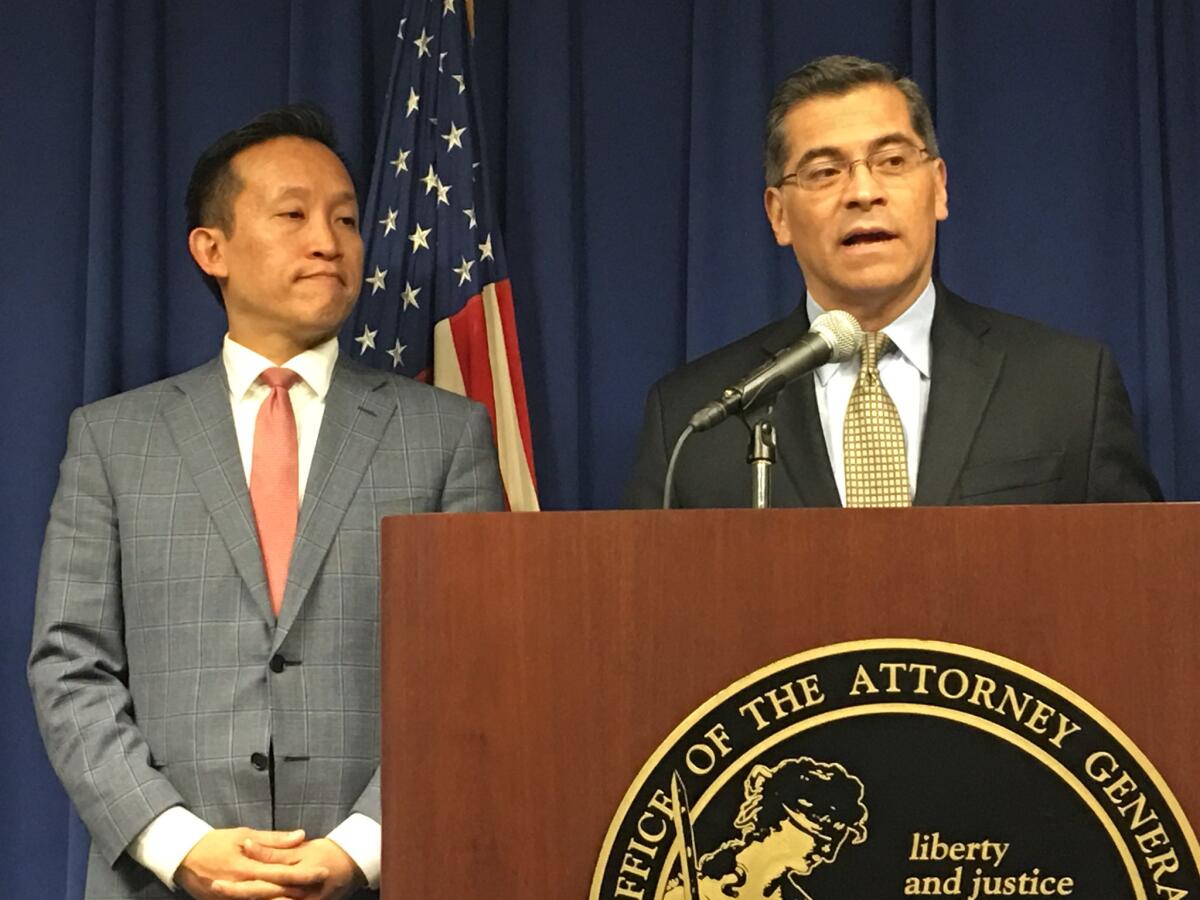
As nearly 80 Northern California businesses were put on notice this month of imminent immigration audits, state leaders on Tuesday attempted to assuage the concerns of employers over a new state law meant to expand workplace protections for employees against federal raids.
California Atty. Gen. Xavier Becerra and Assemblyman David Chiu (D-San Francisco), who authored the state law, called it necessary under a Trump administration bent on increasing deportations. They said it was drafted to work in concert with federal laws and would not put California businesses in violation of federal policies.
“Let me stress again, AB 450 is about privacy, constitutional rights and Californians at the workplace,” Becerra said at the news conference. “There is no conflict with what AB 450 requires and what federal laws require.”
California business owners have found themselves in the middle of a battle between the Trump administration and California state leaders, who have pledged to protect the rights of more than 2 million people living and working in the state illegally. Some owners have said they were not aware of the new requirements or were confused by them.
In an attempt to educate employers, Becerra and Chiu said they have been fielding questions from businesses across the state and working with business groups and trade associations. Becerra’s office plans to send out a statewide advisory on Tuesday with additional guidance.
The new law prohibits employers from allowing federal immigration agents on private business property without a judicial warrant. It also requires business owners to give their employees public notice — within 72 hours — of federal immigration inspections of employee records.
Businesses that fail to provide notice to employees face penalties of $2,000 to $5,000 for a first violation and $5,000 to $10,000 for each subsequent violation, though some exceptions may apply.
Becerra said California businesses were “in learning mode.” He believed none have been in violation of the new state law so far. He is working with the state labor commissioner to make sure the law is enforced, but whether it is will depend largely on people reporting activity.
Chiu said the new law would prevent employers from “aiding and abetting” unlawful searches on the part of the federal government.
“Whether it be agriculture or the restaurant world or the construction world or any of the other industries that the attorney general referenced, it is important that employers know what their rights and responsibilities are so that they can best protect workers and our economy,” he said.
California’s Legislature should require a formal vote to kill bills, Republican lawmaker says
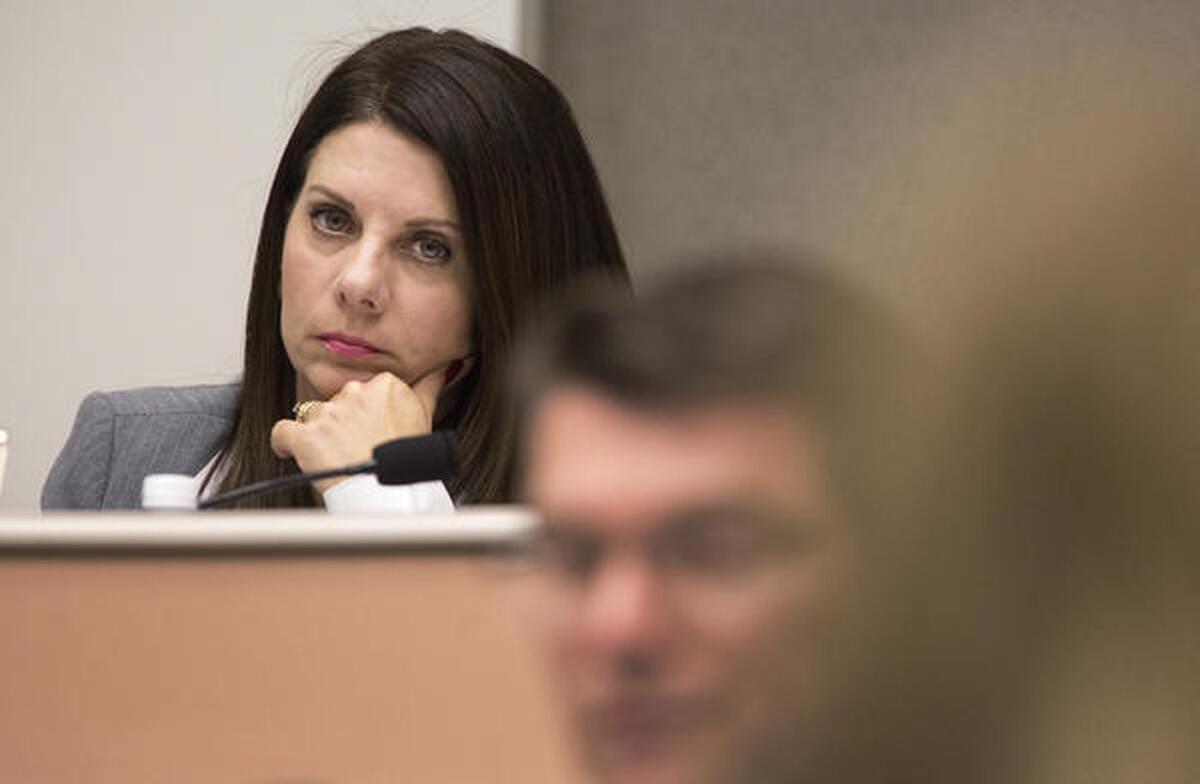
A Republican state lawmaker whose bill to protect legislative staff from workplace retaliation was killed four times without a formal vote says it’s time to change the rules of the Legislature.
“Don’t keep passing the buck,” said Assemblywoman Melissa Melendez (R-Lake Elsinore). “That’s a cowardly way of doing business.”
On Monday, Melendez introduced an amendment to the California Constitution that would require a roll call vote on each bill referred to a legislative committee. Under the common practice of appropriations committees in both the state Senate and Assembly, some bills are “held” without a formal vote and thus fail passage because they missed legislative deadlines.
Hundreds of bills are placed on the “suspense file” of the fiscal committees each year, based on staff analyses of what they would cost state taxpayers. Twice during the year — in May and again in August — lawmakers on those committees convene to quickly dispense with those bills. Legislation that is held never gets an up-or-down vote.
“Everybody can wash their hands of it, no one’s hands are dirty,” Melendez said of the existing process.
Her effort in 2017 to create whistleblower protections for legislative staff members was held without a vote in the Senate Appropriations Committee last summer. Democrats revived it in the wake of the ongoing focus on sexual misconduct in the Legislature, and Gov. Jerry Brown signed it into law last week.
Melendez’s Assembly Constitutional Amendment 23 would require the removal of any legislative chair whose committee didn’t call a formal vote on every bill in its possession. The lawmaker would be barred from serving on that committee for the remainder of the legislative session.
Campaign to recall Assembly Speaker Anthony Rendon fizzles
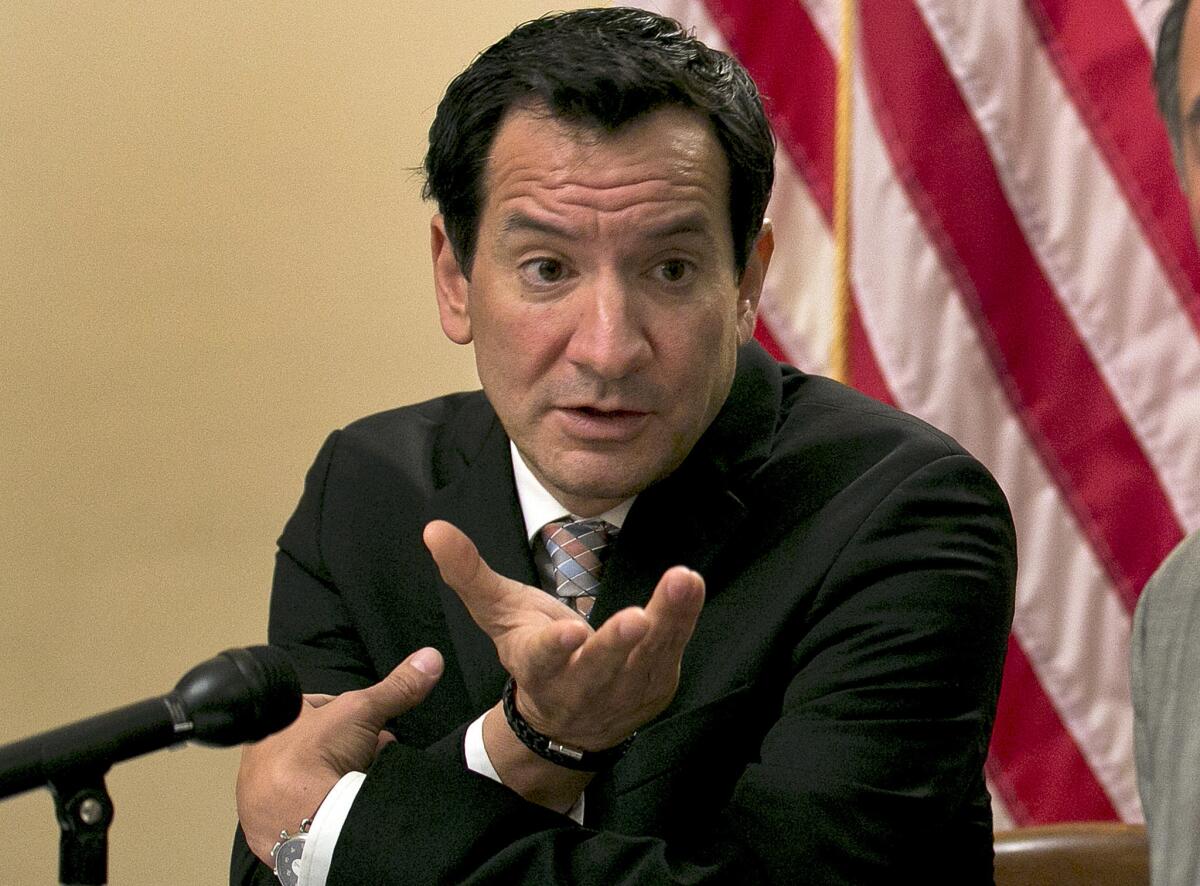
A grassroots effort to recall Assembly Speaker Anthony Rendon over his decision last year to shelve a single-payer healthcare measure has sputtered, according to organizers.
The Recall Rendon campaign posted on Facebook that their attempt to recall Rendon, a Democrat from Paramount, “will not move forward,” explaining that collecting the required 23,000 signatures was too burdensome.
The post, put up Friday, has since taken down. Stephen Elzie, an attorney working with the recall effort, said some involved with the campaign are now turning their attention to trying to oust Rendon in the fall. He is being challenged by Maria Estrada, a progressive activist.
“For the most part, we’ve shifted gears. People working on the recall are now working on Maria’s campaign,” Elzie said.
Rendon has faced progressive ire since last summer, when he decided to shelve Senate Bill 562, a measure to establish a single-payer healthcare system in California. Rendon said the proposal was “woefully incomplete,” pointing to the lack of a funding plan and barriers to implementation from the federal government and the state’s Constitution.
In July, activists took the first step to launch the recall petition. According to subsequent reports filed with the California secretary of state, the campaign did not report collecting any signatures.
“Speaker Rendon is grateful for the support of the voters in the 63rd [district] that refused to sign the recall petition,” said Bill Wong, Rendon’s campaign manager. “Nevertheless, we are not taking anything for granted and will continue to reach out to voters in an effort to earn their support for reelection.”
McCarthy and Pence fundraisers shored up vulnerable California Republicans
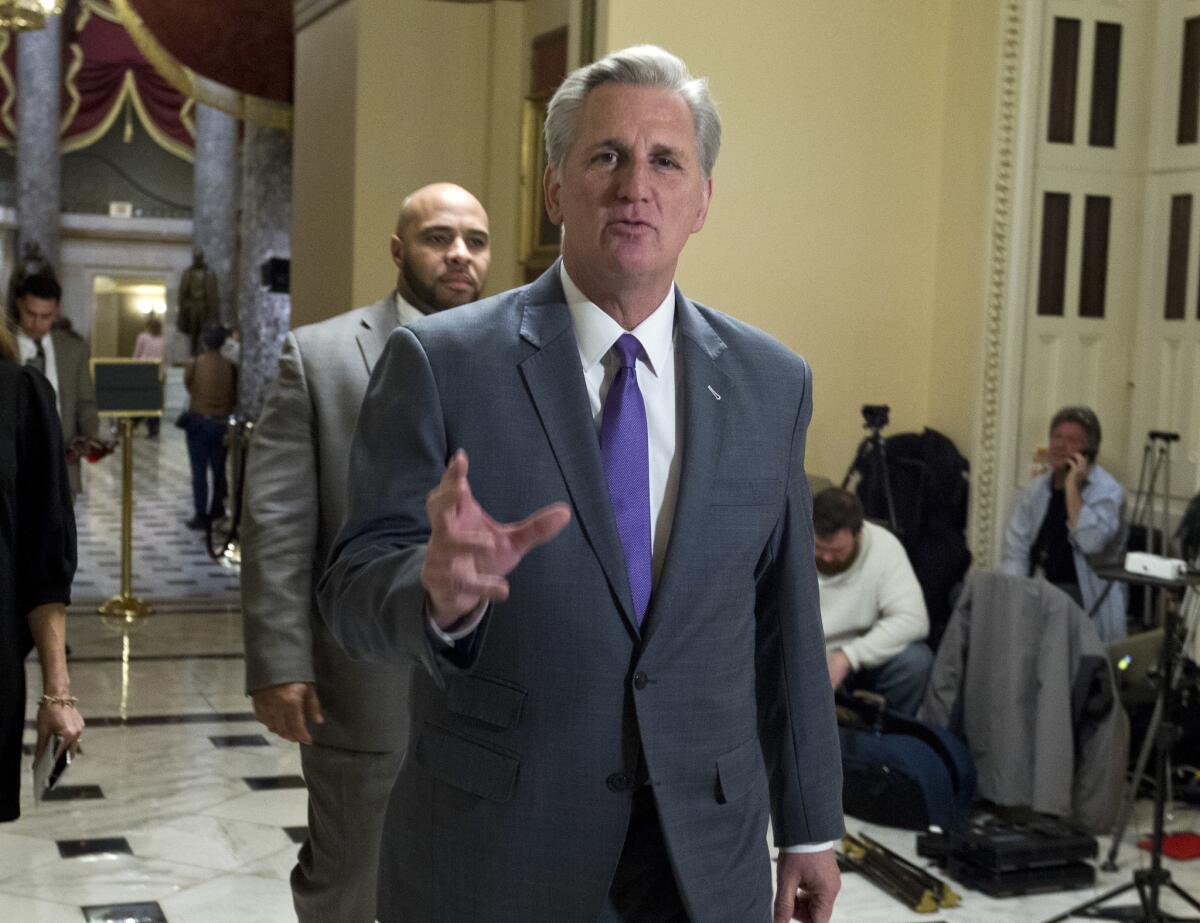
Some vulnerable California House Republicans can thank House Majority Leader Kevin McCarthy and Vice President Mike Pence for at least a fifth of the money they have raised for this year’s midterm elections.
A joint fundraising committee connected with Pence and McCarthy gave Rep. Steve Knight of Palmdale $133,000, or almost 28% of the money he’s raised in the last six months.
Central Valley Rep. David Valadao of Hanford isn’t far behind. He got $137,350, or 23% of the money he’s raised.
Huntington Beach Rep. Dana Rohrabacher’s $125,000 is 20% of the money he’s raised.
They are among the seven vulnerable California Republicans who have teamed up with McCarthy, of Bakersfield, and Pence to form the committee, called California Victory 2018. Each candidate gets a cut of the money the committee raises, mostly from major donors. So far it’s disbursed $4 million, with big chunks going to McCarthy’s campaign, to political action committees connected to McCarthy and Pence and to House Republicans’ campaign arm.
For Reps. Darrell Issa of Vista and Ed Royce of Fullerton (who have since announced their retirements) and Reps. Mimi Walters of Irvine and Jeff Denham of Turlock, the committee’s disbursement equaled 15% or less of their contributions.
The amount incumbents received from California Victory 2018 stands out because several Republican incumbents who got big donations from the committee have struggled to match contributions made to their Democratic challengers. Knight and Rohrabacher were both outraised by at least one opponent in the last six months, while Valadao has dramatically outraised his opponent.
Most of California Victory 2018’s donations were raised during a two-day trip to California that Pence made in October.
The largest single donation to the committee came from billionaire Los Angeles developer Alex Spanos, who is also majority owner of the Chargers. He gave $244,600 in September. Eight other prominent Californians gave $100,000 each.
Nurses union backs Kevin de León in his effort to topple Sen. Dianne Feinstein
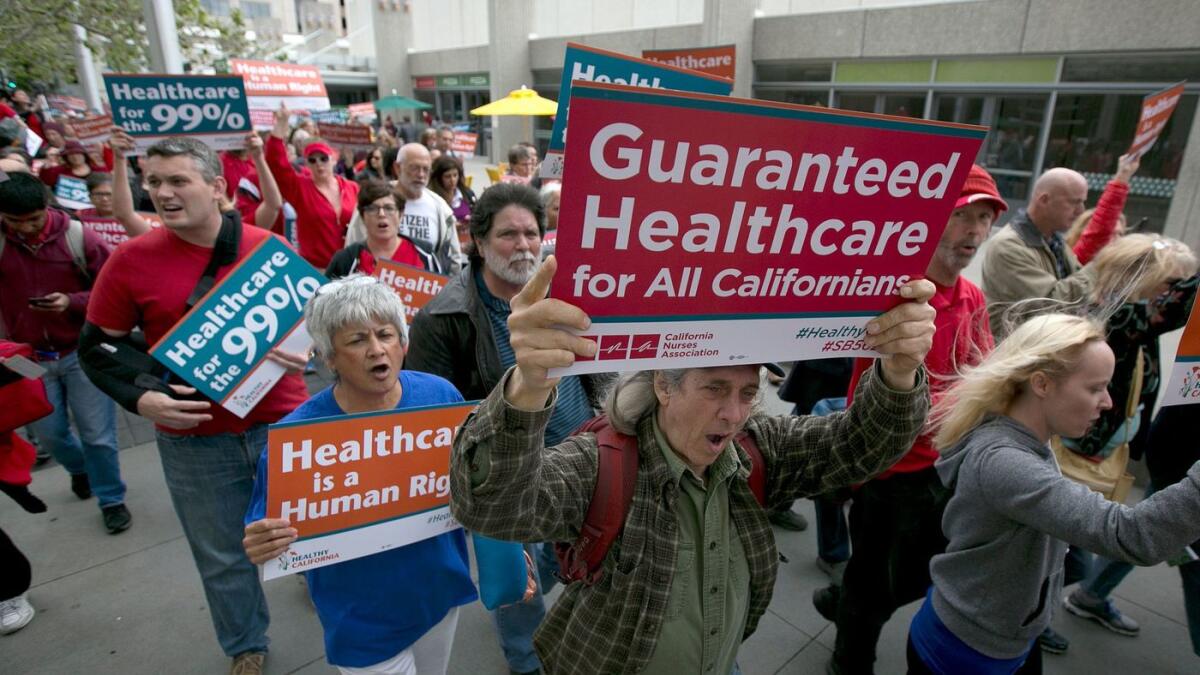
A powerful nurses union that has a history of jolting California elections endorsed state Senate President Pro Tem Kevin de León on Monday in his bid to topple fellow Democrat Dianne Feinstein in the U.S. Senate contest.
National Nurses United and its state organization, the California Nurses Assn., said it was backing De León because of his support for single-payer healthcare, including SB 562, a bill that passed the state Senate last year, but stalled in the Assembly because of concerns about funding.
“At a time when 15 million Californians still have no health coverage, or pay for premiums and still can’t afford to get the medical care they need, Kevin de León demonstrated outstanding political courage and leadership in shepherding passage of SB 562 in the California Senate,” said Malinda Markowitz, co-president of both nurses’ groups. She said their organizations also strongly back De León’s efforts on climate change and immigration reform.
De León faces an uphill climb in trying to defeat Feinstein, a 25-year member of the Senate. She holds an enormous lead in fundraising and the polls. He has based his candidacy on the concept that Feinstein, a measured, pragmatic voice in the Senate, no longer matches the liberalism of Democrats in California.
“Hard-working people throughout the nation are depending on California to bring our fight against dysfunctional establishment politics to the floor of the United States Senate,” De León said. “Now is the time to reject business as usual; the lives of millions of Americans depend on it.”
The nurses’ union has gained a reputation as the pot-stirrers of California politics. But they have a mixed record of success.
Instantly recognizable in their pastel scrubs, they followed then-Gov. Arnold Schwarzenegger around the country in 2005 to protest his effort to increase the patient-to-nurse ratios in state hospitals and emergency rooms. In 2010, they introduced the public to Meg Whitman’s housekeeper, an immigrant in the country illegally.
But in recent years, they have had less success, notably in their backing of Bernie Sanders’ presidential bid in 2016. A political action committee affiliated with the nurses spent nearly $4.8 million on an independent expenditure campaign supporting Sanders, according to the Center for Responsive Politics. In California, they also supported Kimberly Ellis in her unsuccessful campaign to be chairperson of the California Democratic Party.
John Chiang goes for the funny bone with new ad that closes with the message: ‘Stay woke.’
California state Treasurer John Chiang is riffing off the popular, kitschy Dos Equis beer ad “The Most Interesting Man in World” in a new digital spot for his campaign for governor.
The ad opens with scenes of Chiang walking through an orchard with a basket of fruit, shooting pool, strumming a guitar and sawing wood in a funky, frontier days hat.
The cool guy depicted in the spot might make anyone who knows Chiang smile. He’s embraced his low-key, wonky persona, saying he lacks the smoothness and political flash of his top rivals in the race, Lt. Gov. Gavin Newsom and Antonio Villaraigosa.
“He is … the most accomplished man in California,” says the narrator, Assemblywoman Lorena Gonzalez Fletcher (D-San Diego), who has endorsed his candidacy.
The 48-second spot is a tongue-in-cheek ode to the Democrat’s record overseeing the state’s finances as Treasurer and Controller, one of the primary themes of his campaign.
“As a child, he returned a lost wallet to a stranger. As an adult, he returned $3.1 billion to California,” the ad says, a reference to the value of the unclaimed property and money that was returned to residents by the Controller’s office during his two terms.
According to the campaign, this is the first in a series that will highlight Chiang’s record on fiscal issues. Newsom served two terms as mayor of San Francisco and Villaraigosa is the former Los Angeles mayor.
The ad ends with a shot of Gonzalez Fletcher sitting in a bar holding a drink.
“I don’t always endorse, but when I do, I endorse John Chiang for governor,” she says, closing with, “Stay woke, my friends.”
He once held the job as a Republican, but now Steve Poizner is making a no-party bid for California insurance commissioner
Eight years after losing a bitter Republican primary for governor and stepping away from California’s political scene, Steve Poizner said Monday that he will run again for the elected office he gave up in that contest — state insurance commissioner.
This time, he won’t run as a Republican.
“There’s no room for partisan politics at the Department of Insurance,” Poizner said in an interview, announcing the launch of a campaign to become the first independent “no party preference” candidate ever to win statewide office.
GOP candidate for California governor John Cox once linked gay rights to polygamy, bestiality

Republican gubernatorial candidate John Cox, at a presidential debate more than a decade ago, linked gay rights with “transvestites,” polygamists and people who have sex with animals.
The Rancho Santa Fe businessman, who was asked about the “homosexual agenda” during a 2007 Values Voters debate, responded by saying that while the United States is a free country, the government should not “sanction” gay relationships.
Cox also made a derogatory remark about transgender people.
“We also have this problem with transvestites who want to be school teachers,” he said. “What the Republican Party needs to stand for is school choice and home-schooling, so that we can keep our children in the schools of our choice, and we won’t have to deal with that.”
He then turned to a discussion of people who engage in illegal sexual acts with multiple spouses or animals.
“We certainly need to stand up for the proper behavior, we absolutely need to do that, but we need to use common sense, and talk about the fact that we can’t open the floodgates to polygamy and bestiality and all kinds of other things,” Cox said. “Kids, hold your ears.”
The comments, which Cox made during a short-lived unsuccessful presidential bid, were first reported by the San Jose Mercury-News on Monday. It was the same day Democratic gubernatorial candidate Gavin Newsom released a digital ad celebrating his decision 14 years ago Monday to grant marriage licenses to same-sex couples.
In a statement, Cox said Monday that the issue of gay marriage was settled by the Supreme Court and that his views had changed over time.
“Like many Californians, my views have evolved over the last decade. I concluded that it was inconsistent with my support for individual liberty, limited government and the right to privacy,” Cox said. “The focus of my campaign is economic growth and freedom and I’m looking forward to engaging the LGBTQ community and all Californians to revive the California Dream.”
Views about gay marriage have rapidly evolved over the past decade. In the 2008 campaign, nearly all of the Democrats running for president, including Barack Obama and Hillary Clinton, did not support gay marriage and were instead in favor of civil unions.
The 2007 Value Voters debate included many Republican presidential candidates, but not Sen. John McCain, who would become the party’s nominee, nor former Massachusetts Gov. Mitt Romney, who would become the party’s 2012 nominee.
At the event, Cox also said he supported a constitutional amendment to define marriage as between a man and a woman, opposed guest worker programs and any form of amnesty for those in the country illegally and pledged to veto hate-crimes legislation and legislation that prohibited employment discrimination on the basis of sexual orientation.
He also supported stopping schools from receiving federal funds if they expose children to “homosexual propaganda,” and said that liberals were weakening the “unique American culture” because of a focus on multiculturalism.
Democratic donor Tom Steyer on keeping people engaged in 2018
’16 was a wake-up call that we need to participate, that you have to protect your own rights, that American citizens have to stand up for their own interests because otherwise they’ll get trampled. If you are too tired by 2018, if you want to go back to bed, that’s going to be devastating for democracy itself. I worry about it but I’m hopeful,”
— Billionaire Democratic donor Tom Steyer on keeping activists engaged in 2018
On anniversary of Oroville Dam crisis, California lawmakers pass bill increasing inspections
California lawmakers unanimously passed new legislation Monday to inspect most dams and reservoirs annually, one year after state officials ordered emergency evacuations for hundreds of thousands of residents living below the Oroville Dam.
“More needs to be done to ensure the safety and integrity of our water infrastructure,” said Assemblyman James Gallagher (R-Yuba City), the bill’s author.
Under current law, state inspectors are required to examine the condition of dams, but don’t have specified timelines. Last year, after strong rainfall across Northern California, the Oroville Dam reached capacity and its main spillway was severely damaged. The threat of the spillway’s failure led to a sudden evacuation order due to fear of flooding and levee failures for miles around the dam.
“To have something that catastrophic occur should certainly be a wake-up call for all of us,” said Assemblywoman Susan Talamantes Eggman (D-Stockton) during debate on the bill.
The legislation, Assembly Bill 1270, is an urgency measure, meaning it will take effect immediately if Gov. Jerry Brown signs it.
Villaraigosa nabs another major law enforcement endorsement in his bid for governor
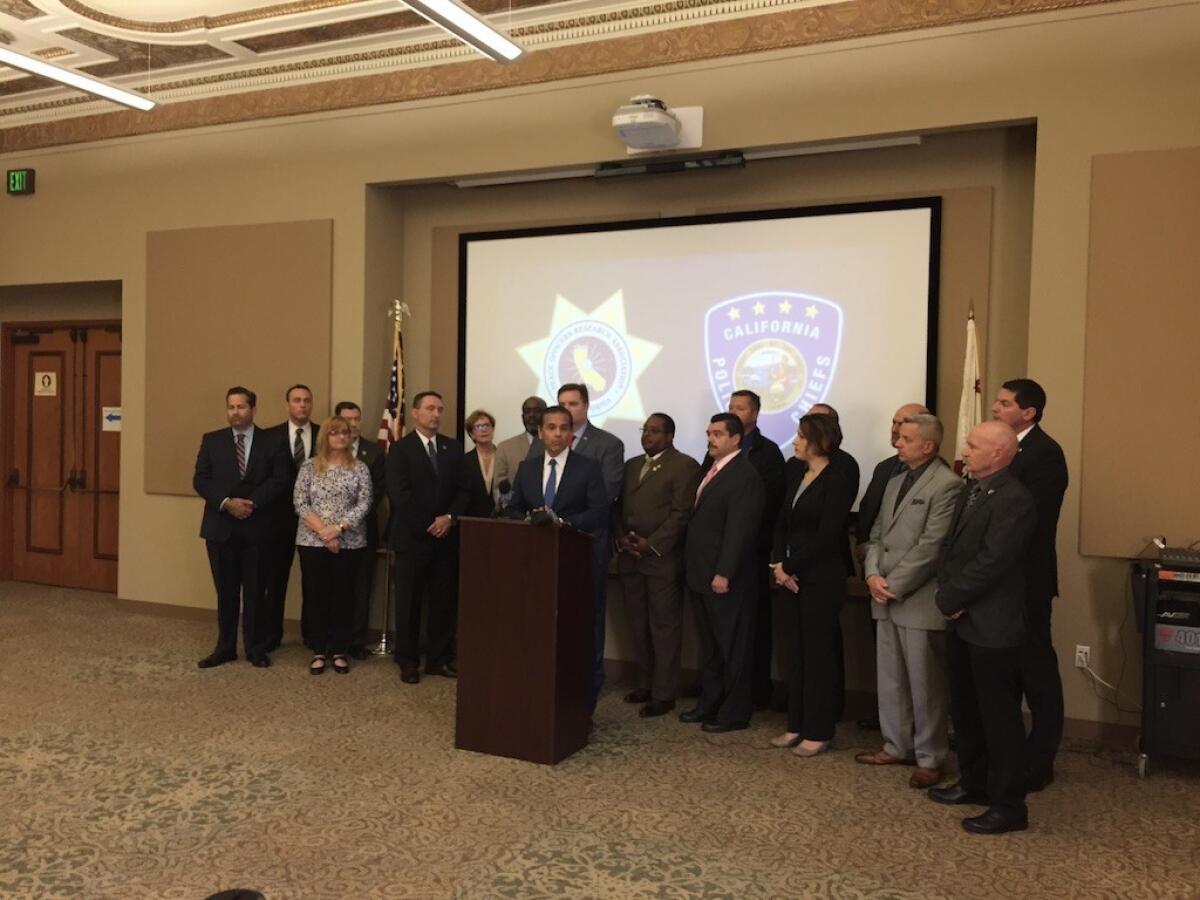
Former Los Angeles Mayor Antonio Villaraigosa on Monday received his second major endorsement from law enforcement in his 2018 bid for governor, giving him some influential and well-funded allies in a tightening race.
The California Police Chiefs Assn. announced its endorsement at a morning news conference a month after Villaraigosa was backed by the Peace Officers Research Assn. of California, the largest law enforcement organization in the state with 70,000 members.
“As a mayor of Los Angeles for eight years he tackled crime in one of the most challenging cities in the United States,” Gardena Police Chief Edward Medrano, president of the association, said at the news conference.
The endorsement comes in the wake of a poll showing Villaraigosa virtually tied with Lt. Gov. Gavin Newsom in the race.
Brian Marvel, president of the Peace Officers Research Assn., said his organization plans to launch an independent expenditure committee to back Villaraigosa’s campaign for governor.
That committee could help Villaraigosa contend with the significant advantage Newsom has in fundraising, as well as increase Villaraigosa’s appeal to moderates across the state.
Medrano said the police chiefs have some concerns about Newsom, the current front-runner in the governor’s race. He said Newsom had advocated for strong criminal justice reforms in recent years but has not given enough consideration to whether they have been effective.
Both law enforcement organizations also opposed the 2016 statewide ballot measure legalizing the recreational use of marijuana, a proposition that Newsom strongly supported.
During Villaraigosa’s eight years as mayor, he hired hundreds of police officers and violent crime plummeted in the city. The Democratic candidate has made his record one of the pillars of his campaign for governor.
Medrano said that with violent crime on the rise in the state, along with increased homelessness and a greater need for mental health care, the police chiefs saw Villaraigosa as the best candidate to work with law enforcement to address those concerns.
Los Angeles tenant groups oppose bill that could lead to a development boom near transit
A coalition of 37 low-income housing and tenant groups in Los Angeles is opposing state legislation that would dramatically increase new housing around transit.
Senate Bill 827 from Sen. Scott Wiener (D-San Francisco) would eliminate most local zoning restrictions within half a mile of rail and major bus stops across the state, allowing for new buildings that would be a minimum of four to eight stories tall. He argues that the bill is needed to address both the state’s housing shortage and environmental goals.
The tenant advocacy groups say the legislation would exacerbate the displacement of low-income Californians from neighborhoods surrounding transit.
“If SB 827 passes, we stand to lose out on tens of thousands of affordable homes near transit and we are putting families who depend on rent stabilization at greater risk of displacement at a time of severe housing and homelessness crises,” Alliance for Community Transit Los Angeles and the other groups wrote in a Feb. 12 letter to Wiener.
SB 827 is the highest-profile housing bill introduced so far this year and it has provoked strong responses on both sides. More than 120 top technology executives, including leaders at Reddit, Salesforce, Twitter and Lyft, have endorsed the bill, saying they need more housing to hire and retain their workforce. San Jose Mayor Sam Liccardo also has announced his support, as have some environmentalists who contend it’s necessary to meet the state’s climate change goals by encouraging transit-oriented development.
The coalition against the bill is equally as diverse. Sierra Club California has argued the legislation would make it harder to build new transit. Council members from wealthy cities across the state also have been pointed in their criticism. John Mirisch, a Beverly Hills city councilman, has said the bill reaches too far into local control over development.
Ad portrays Newsom as trailblazer on same-sex marriage
Lt. Gov. Gavin Newsom launched his first digital ad in the governor’s race on Monday, timed to the 14-year anniversary of when San Francisco issued the first marriage licenses to same-sex couples.
The minute-long spot argues that Newsom showed courage by being out front on issues such as gay marriage as well as universal healthcare and gun control.
The online ad starts with archival video of gay couples exchanging vows in 2004, as Newsom’s voice is heard declaring, “Today we can confidently say is the first day in the state of California that we are providing marriage equally and fairly to everyone and denying no one their right and their opportunity to live their lives out loud.”
A voiceover adds, “It takes courage to make real change. That’s Gavin Newsom,” before pointing to his record on healthcare, gun control and city budget issues. “Gavin Newsom for governor. Courage. For a change.”
The ad comes as a new poll suggests that the gubernatorial race is a virtual tie between Newsom and former Los Angeles Mayor Antonio Villaraigosa.
Newsom’s efforts on gay marriage are a seminal chapter in his political career. A few weeks into his first term as mayor of San Francisco in 2004, he ordered the city-county clerk to violate state law and issue marriage licenses to same-sex couples.
The more than 4,000 licenses Newsom granted were nullified by a court later that year, but he was ultimately vindicated, with gay marriage gaining public acceptance and, eventually, becoming fully legal.
When he acted in 2004, nearly every prominent Democrat opposed same-sex marriage and even some of his supporters thought he was committing political suicide. Some Democrats blamed him for their party’s 2004 presidential nominee, John Kerry, losing later that year, and some gay activists still argue he set their cause back by acting rashly.
In 2008, after the California Supreme Court upheld the legality of such relationships, an ebullient Newsom declared at a San Francisco City Hall news conference: “This door’s wide open now. It’s going to happen, whether you like it or not!”
Newsom’s proclamation became the centerpiece of an anti-gay-marriage ballot measure ad. He has since said he regrets the language he used.
Newsom’s campaign says the spot will eventually be his first television ad. The campaign plans to buy at least $10 million worth of airtime when the candidate goes up on television in the spring.
California police chiefs back Antonio Villaraigosa for governor
The California Police Chiefs Assn. on Monday endorsed former Los Angeles Mayor Antonio Villaraigosa for California governor, the second major law enforcement organization to back the Democratic candidate.
In January, Villaraigosa was also endorsed by the Peace Officers Research Assn. of California, the largest law enforcement organization in the state, with 70,000 members.
During Villaraigosa’s eight years as mayor, he hired hundreds of police officers and violent crime plummeted in the city. Villaraigosa has made his record one of the pillars of his campaign for governor.
State lawmakers want to restore an urban renewal and affordable housing program. But it’s complicated
Seven years ago, at the depth of the state’s budget crisis, Gov. Jerry Brown eliminated an urban renewal program that provided billions of dollars annually for economic development and low-income housing. Ever since, lawmakers have tried and failed to bring it back.
Now, with Brown on his way out of office next January, legislators are gearing up for another attempt. This time will be different, they say, not only because state government finances have improved, but also because they could have the support of Brown’s would-be successor. Leading Democratic gubernatorial candidates Gavin Newsom, Antonio Villaraigosa and John Chiang have all endorsed the program’s resurrection.
“We would love to work with this governor on it,” said Assemblyman David Chiu (D-San Francisco), who plans to introduce legislation this year. “But if it’s not meant to be by the time we’re able to get something to the governor’s desk, we want to be able for the next governor to move quickly.”
GOP candidate for California governor Travis Allen courts Trump voters at campaign rally on Capitol steps
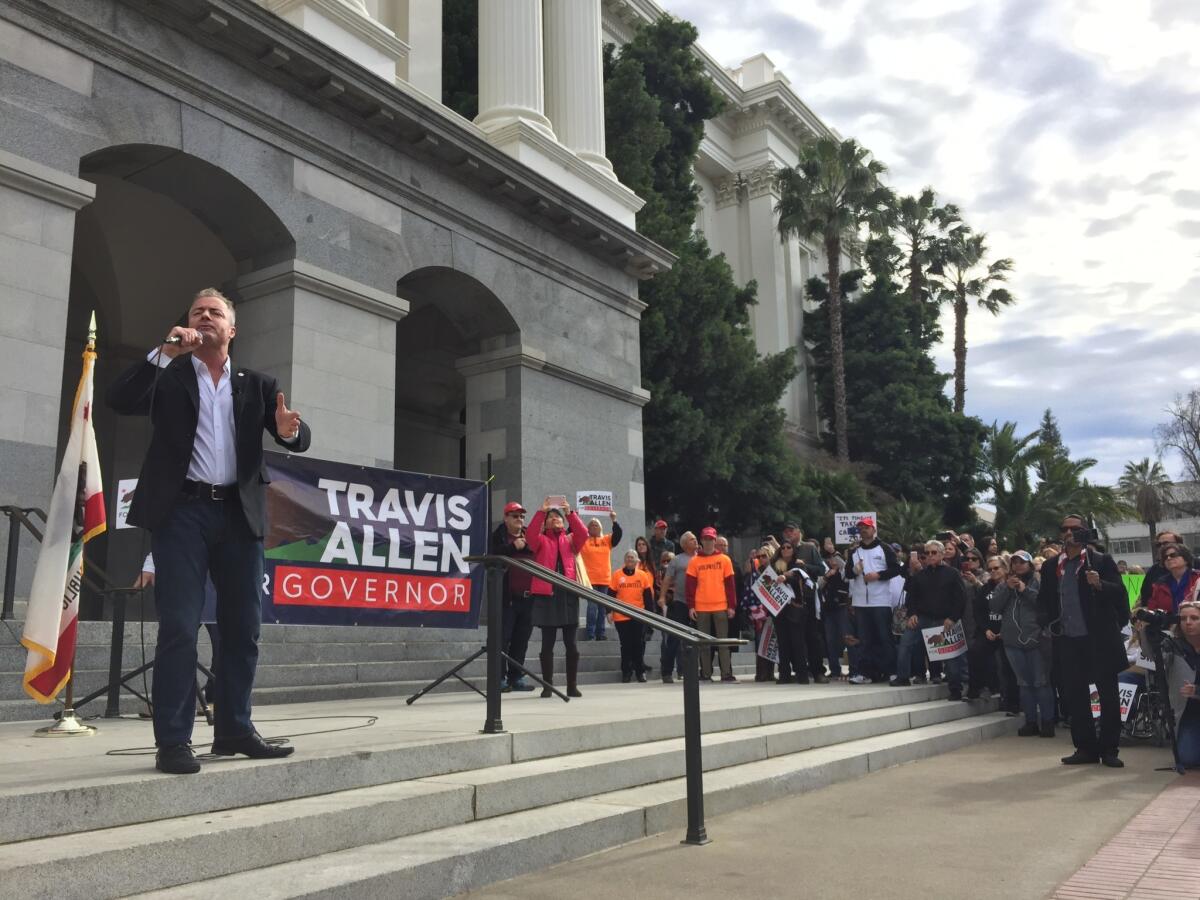
Calling himself the only “true conservative” in California’s race for governor, Republican Travis Allen revived up a crowd of supporters at the state Capitol Sunday with praise for President Trump and calls for cutting taxes and securing the border.
A few hundred people showed up to hear Allen, an assemblyman from Huntington Beach, at his “Take Back California” rally Sunday afternoon, an event peppered with patriotic chants and signs slamming Democratic Gov. Jerry Brown and calling for the repeal of the gas tax.
Allen rattled off a list of “day one” policy changes he would make if elected governor: repealing the newly approved gas tax; scrapping plans to replumb the state water supply system with the Delta tunnels; nixing the high-speed rail system and tossing out California’s so-called “sanctuary state” law.
He blamed Sacramento’s Democratic leadership for California’s high poverty rate, underperforming schools and crumbling highways and dams.
Allen told the audience that a “silent supermajority” of Californians share his priorities, not those of left-leaning political leaders. He argued that the state already had ample tax revenue to fix and expand roadways and improve public schools.
The assemblyman has tried to rally California Trump supporters and conservatives, saying he is best candidate to take on Lt. Gov. Gavin Newsom, the front-runner in the governor’s race. A recent poll, however, found Allen’s support among voters to be in the single digits, lagging far behind Democrats Newsom and former Los Angeles Mayor Antonio Villaraigosa.
“Do you want California to look like San Francisco with mounds of human waste?” Allen said to the crowd. “Do you want California to look like San Francisco and legalize heroin injection centers in your neighborhoods?”
He also blasted Villaraigosa, saying downtown L.A. looks like a “Third World country.”
But Allen was harshest on GOP rival John Cox, a Rancho Sante Fe businessman who has put $4 million into his own campaign.
Allen reminded the crowd, which was filled with Trump supporters, that Cox declined to vote for Trump in the 2016 election, and instead voted for Libertarian Gary Johnson, the former governor of New Mexico.
“This guy Cox voted for a guy who believes in open borders, legalized drugs and legalized prostitution,” Allen said. “I don’t know about you, but that sounds like Gavin Newsom to me.”
Allen is among the state lawmakers who have been accused of sexual harassment in the last several years, according to documents publicly disclosed this month by the California Legislature. A staff member alleged Allen made her “uncomfortable” by being too close to her, including touching her foot with his beneath a table during a meeting. Allen has denied wrongdoing, and did not address the issue at Sunday’s rally.
Jessica Bucher, 41, a stay-at-home mom from the San Francisco Bay area, called the allegation an “absolute joke.”
“I’ve tapped someone under the table accidentally. As a woman, it takes a little more than that to scare me,” Bucher said
California Politics Podcast: One member of the Legislature won’t be on the job this week
Lawmakers returning to the state Capitol on Monday will find that one of their colleagues has taken a leave of absence after new sexual misconduct allegations.
And the case again raises important questions about how these investigations should proceed.
This week’s California Politics Podcast episode examines the accusations made against Assemblywoman Cristina Garcia (D-Bell Gardens), as well as the final action last week on a new law granting whistleblower protections to legislative employees.
From there, our weekly political analysis turns to a new statewide poll in the race for governor showing a very close contest between Lt. Gov. Gavin Newsom and former Los Angeles Mayor Antonio Villaraigosa.
You can subscribe to the weekly podcast feed on iTunes, Soundcloud and Stitcher.
State, feds clash in court over Trump’s border wall
President Donald Trump’s vision for a “big, beautiful wall” along the U.S.-Mexico border faced its first substantial legal challenge in a San Diego federal courtroom Friday.
At the center of the case — three lawsuits that have been consolidated into a single matter — is whether the federal government had the authority to waive its compliance with a host of laws in order to rush border construction projects in San Diego and Calexico, including the eight border wall prototypes that have already been completed on Otay Mesa.
In a 2½-hour afternoon hearing witnessed by a packed courtroom, the California Attorney General’s Office and environmental protection advocates teamed up against the government, arguing that the Department of Homeland Security abused its discretion by broadly interpreting a law that has allowed such waivers.
Sexual misconduct accusations against California assemblywoman twist gender dynamics of #MeToo movement
A Los Angeles-area assemblywoman has voluntarily taken leave of her seat Friday after facing allegations of sexual harassment, an unusual twist of the gender dynamics shaping the misconduct controversies engulfing California’s state Capitol.
Assemblywoman Cristina Garcia (D-Bell Gardens) denied allegations that she made inappropriate advances on two men: a then-legislative staffer and a lobbyist. In a statement, she said she would take an unpaid leave of absence from the Legislature while she faces an investigation into her conduct.
“As I’ve said before, any claims about sexual harassment must be taken seriously, and I believe elected officials should be held to a higher standard of accountability,” Garcia said Friday.
Weapons training, live-fire shooting tests would be required for concealed gun permits under new bill

Gun owners would have to undergo specific training and pass a live-fire shooting test on a firing range in order to get a permit to carry concealed weapons in California under legislation proposed Friday.
The bill was introduced by Democratic state Assembly members Todd Gloria and Lorena Gonzalez Fletcher, both of San Diego, who said county sheriffs can currently issue concealed carry weapons permits without proof of proficiency, although some sheriffs have set standards.
“Under current law in California, a person who has never even fired a gun or received proper training on how to safely handle one can receive a permit and carry a loaded firearm in public,” Gloria said. “This jeopardizes public safety and has to be addressed.”
The legislation, AB 2103, would require permit applicants to receive a minimum of eight hours of training on firearm safety, handling and technique. The current law has no minimum time standard, Gloria said. The live-fire test would be administered to make sure that the applicant can safely handle and fire a gun.
The measure is supported by gun control groups Everytown for Gun Safety and Moms Demand Action.
“We require people to have training before they can drive a car,” Gonzalez Fletcher said. “We should do the same for people who want to carry a lethal weapon in public.”
The bill was criticized as duplicative and unnecessary by Sam Paredes, executive director of Gun Owners of California.
Paredes said applicants already go through some training but it isn’t necessary for many, especially former members of the military, to show they can fire a gun on a firing range.
“How many problems have occurred because someone didn’t taking a test on a firing range? None,” Paredes said.
Updated at 3:43 pm to include comment from Sam Paredes of Gun Owners of California.
Gov. Jerry Brown, Lt. Gov. Gavin Newsom greet Canadian Prime Minister Justin Trudeau in San Francisco
Assemblywoman Cristina Garcia to take leave of absence during investigation of misconduct allegations
Assemblywoman Cristina Garcia on Friday denied accusations of sexual misconduct but said she would voluntarily take unpaid leave while an investigation takes place.
“Upon reflection of the details alleged, I am certain I did not engage in the behavior I am accused of,” Garcia (D-Bell Gardens) said in a statement. But she added that “any claims about sexual harassment must be taken seriously, and I believe elected officials should be held to a higher standard of accountability.”
Garcia said she would take an unpaid leave “so as not to serve as a distraction or in any way influence the process of this investigation.” She urged the Assembly to conduct a “thorough and expeditious investigation.”
The statement comes one day after Politico reported that two men alleged improper sexual advances from Garcia. She has been one of the most vocal legislators speaking out about sexual harassment in the state Capitol.
California’s senators vote against spending bill to keep the government open
Democratic candidates for governor make promises to union workers ahead of key endorsement vote
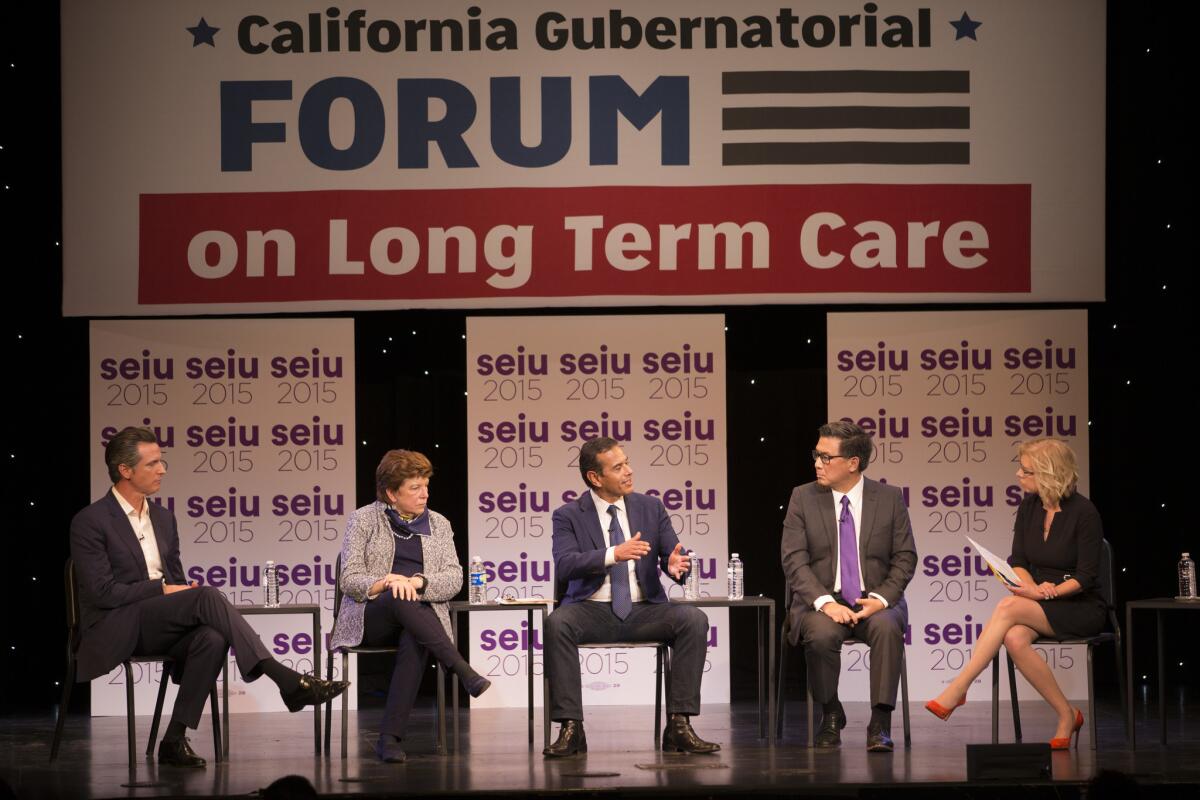
Days before one of California’s most powerful labor unions announces its endorsement in the race for governor, the four top Democratic candidates courted members of the group’s largest and most influential local chapter in Los Angeles on Thursday night.
The gubernatorial forum, which focused on the state’s long-term care needs for its growing senior population, lacked the disputes seen in recent debates between Lt. Gov. Gavin Newsom, former Los Angeles mayor Antonio Villaraigosa, state Treasurer John Chiang and former state schools chief Delaine Eastin.
The four candidates instead promised to fight for higher pay for in-home healthcare workers and stronger union protections for SEIU Local 2015, the largest chapter of the Service Employees International Union’s California organization. The state group is expected to announce its endorsement ahead of the California Democratic Party convention later this month.
“I intend to put $100 million in wage increases for this group of workers,” Villaraigosa said to cheers at a Koreatown high school theater where the event was held.
He told the crowd that while he was the state Assembly Speaker, he worked to make it easier for home healthcare workers to unionize and added $90 million to the state budget to increase their wages.
Chiang spoke about his plan to increase retirement savings opportunities for the workers.
“I have a record of getting things done. How many of you have direct deposit?” he asked. “That’s me. That’s me. I delivered for you. I kept the promise to you.”
Eastin noted that the workers were largely women.
“The elephant in the room is women are paid less. When you have a profession dominated by women, it tends to be under-supported,” she said. “In my first year, we will close the pay equity gap, by God!”
Newsom pointed to work he did as mayor of San Francisco, including establishing a trust fund to help provide home care for seniors and the disabled.
“I want to see what we did in San Francisco County as the floor, not the ceiling, for every other county in the state of California,” he said.
SEIU Local 2015, which hosted the forum, represents about 370,000 in-home healthcare, nursing home and assisted-living facility workers across California. AARP and the Milken Institute also sponsored the event.
Prominent right-wing blogger Mike Cernovich says he’s considering a bid for Congress in California
Far-right activist and blogger Mike Cernovich said Thursday he’s thinking about running for Congress in California this year. “It’s looking like a real possibility,” he tweeted to his more than 400,000 followers without revealing which district he might be considering.
The prominent right-wing figure who was an early peddler of the “Pizzagate” conspiracy theory has more recently been known for giving documents to Buzzfeed that led to its report about sexual harassment settlements by Rep. John Conyers (D-Mich.).
Cernovich lives in Laguna Niguel, within the coastal Orange County district that belongs to Rep. Dana Rohrabacher, who has said he’s “unequivocally running” for reelection.
Cernovich said in an interview that he wouldn’t run for Rohrabacher’s seat “under any circumstances,” adding that he respects the Republican congressman. He suggested he could run for Rep. Paul Cook’s seat 102 miles northeast of his home, but only if the 74-year-old Republican decides to retire.
(Members of Congress are not required to live within the districts they represent.)
“Can I take on the Republican Party machine? Get real. No. Zero percent,” said Cernovich, who is registered as an independent. “But if there are 10 people running in the primary and the establishment is split among them, I’m competitive in a 10-way knife fight. Then we’re in the game.”
Cook, who has served three terms, raised less money than a Democratic challenger last quarter and had $828,000 in the bank at the start of the year.
In a follow-up tweet, Cernovich said running for Congress would be “utterly taxing emotionally and financially” and that he would only run if “there’s a play to win.”
Cernovich was supposed to headline last year’s “Free Speech Week” in Berkeley before plans fell apart, and is said to be attempting to buy defunct website Gawker.
California Assembly speaker says allegations against assemblywoman are under investigation
Assembly Speaker Anthony Rendon (D-Lakewood) issued a statement late Thursday confirming there is an investigation into allegations of sexual misconduct made against Assemblywoman Cristina Garcia (D-Bell Gardens).
“The Assembly is working to prevent sexual harassment and to ensure there is a strong process in place for responding to inappropriate behavior and holding perpetrators accountable. As in other cases, the Assembly Rules Committee has hired an outside firm to investigate the incident reported,” Rendon said. “I trust that while the investigation proceeds Assemblymember Garcia will respond appropriately and in a way that fortifies the Legislature’s effort to create a new climate. As in other cases, while the investigation moves forward, I am also asking Assembly Human Resources to reach out to Assemblymember Garcia’s staff to ensure they feel safe in their work environment.”
Assemblywoman at forefront of #MeToo movement accused of sexual misconduct
Assemblywoman Cristina Garcia, chair of the Legislative Women’s Caucus who has been at the forefront of the movement against sexual harassment in the state Capitol, has herself become the subject of allegations of sexual misconduct. The Bell Gardens Democrat said she would “participate fully” in an investigation.
Politico reported Thursday that two men said Garcia made improper advances toward them. One, a former legislative staffer, said Garcia groped his back and buttocks and attempted to grab his crotch during a legislative softball game in 2014.
The former staffer, Daniel Fierro, told his former boss, Assemblyman Ian Calderon (D-Whittier) about the incident several weeks ago, his office said. Calderon then reported the incident to the Assembly Rules Committee.
Fierro told the Times he decided to speak out because he thought Garcia’s behavior was at odds with the #MeToo movement, which could harm the cause she was so closely associated with.
“I have female colleagues who have been through way worse than me,” Fierro said. “That conversation needs to be had. ...If their stories are being taken less seriously by people in the district because the messenger is not credible, that’s a problem.”
In a statement, Garcia said the details of the complaints only came to her attention on Thursday. She confirmed she did attend the legislative softball game in 2014, but added she has “zero recollection of engaging in inappropriate behavior,” which she said was inconsistent with her values.
“Every complaint about sexual harassment should be taken seriously and I will participate fully in any investigation that takes place,” Garcia said.
Politico reported about a second accusation from a lobbyist who was not named in the story. Politico reported the lobbyist said Garcia attempted to grab his genitals and made an explicit sexual proposition at a 2017 event.
Assembly Speaker Anthony Rendon confirmed there is an investigation and said in a statement, “I trust that while the investigation proceeds Assemblymember Garcia will respond appropriately and in a way that fortifies the Legislature’s effort to create a new climate. As in other cases, while the investigation moves forward, I am also asking Assembly Human Resources to reach out to Assemblymember Garcia’s staff to ensure they feel safe in their work environment.”
Garcia, one of the most outspoken legislators in the #MeToo movement, now finds herself facing criticism from colleagues. State Sen. Connie Leyva (D-Chino) called the allegations “very troubling.”
“I have consistently voiced my strong opinion that any legislator under investigation by either the Assembly or Senate should take an immediate leave of absence until the review is completed,” Leyva said in a statement. “As Vice Chair of the Women’s Caucus, I will be asking that the membership of the Caucus meet in the very near future to discuss the fate of Assemblymember Cristina Garcia as Women’s Caucus Chair.”
We Said Enough, the advocacy group that grew out of an open letter signed by more than 140 women—including Garcia—decrying the culture of harassment in California politics, said in a statement the organization was “concerned about these reports and they need to be investigated thoroughly, without delay.”
“The Legislature must establish a confidential reporting mechanism, with due process for accusers and the accused, early intervention and restoration for the entire community,” the group said.
5:11 p.m.: This post was updated to include comment from Daniel Fierro and We Said Enough. It also corrected the city represented by Assemblyman Ian Calderon.
6:20 p.m.: This post was updated with information from Rendon.
This post was originally published at 4:28 p.m.
In rare Sacramento appearance, Schwarzenegger says Trump’s EPA chief needs to go
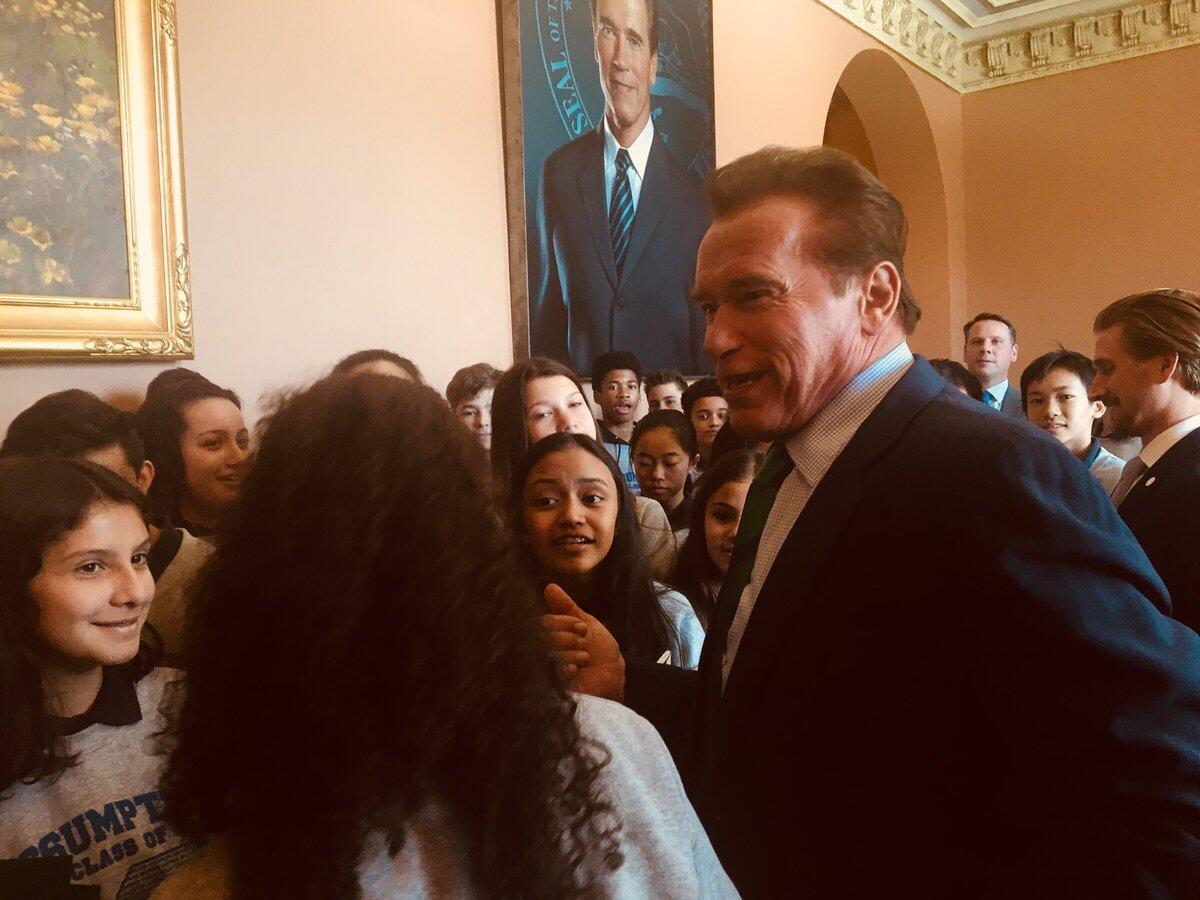
California’s most well-known Republican didn’t mince words Thursday in assessing the record of President Trump’s chief environmental adviser, EPA Administrator Scott Pruitt.
“He is without any doubt the wrong person at that place,” former Gov. Arnold Schwarzenegger said. “He does not represent the people. He only represents the special interests. He should be removed immediately.”
Schwarzenegger was in Sacramento to meet with seven state Assembly Republicans who support environmental protection policies. Last month, the former governor agreed to help the group in creating a new political action committee for electing Republicans in 2018.
“I have a great interest in making sure the Republicans do well in California,” he said after posing for photos with tourists in the state Capitol.
“I mean, the environment is not a political issue. It should be a people’s issue.”
The group met privately for a little more than half an hour in the office of Assemblyman Chad Mayes (R-Yucca Valley), the former GOP leader who stepped down after conservative activists criticized his support for last year’s law to extend the life of California’s cap-and-trade climate program.
It was not the former governor’s only jab at Pruitt, who on Tuesday told a Las Vegas television station that “assumptions” were being made that a warming of the planet “is a bad thing.” The EPA chief has also been critical of California’s long-standing ability to set its own vehicle emission rules.
Schwarzenegger told an audience at the state Air Resources Board Tuesday morning that Republican politics have changed since the days of the agency’s creation in 1968 — a law signed by Republican then-Gov. Ronald Reagan.
“Fifty years later you have Trump appointing Pruitt to the EPA,” he said. “What happened? So sad.”
California would bar organized tackle football before high school under new bill

California would become the first state to prohibit minors from playing organized tackle football before high school under a proposal made Thursday by lawmakers concerned about the health risks.
Just days after the Super Bowl, Assembly members Kevin McCarty (D-Sacramento) and Lorena Gonzalez Fletcher (D-San Diego) said they are introducing the “Safe Youth Football Act,” legislation that will be considered this year by state lawmakers.
Under the bill, organized tackle football would be allowed starting with high school freshmen.
The lawmakers said they were following advice of medical professionals who believe limiting tackle football would help prevent young athletes from sustaining long-term brain damage caused by repetitive tackling, hitting and blocking.
“The science is clear: head injuries sustained at a young age can harm kids for the rest of their lives,” Gonzalez Fletcher said in a statement. “Developing skills through flag football before high school is sound public policy from a health and safety standpoint.”
She cited studies have shown that Chronic Traumatic Encephalopathy is caused by repetitive impacts to the head sustained over a period of time. She said children who play contact sports during their most critical years of brain development are at a significantly greater risk for neurological impairments and CTE later in life.
McCarty noted that noncontact youth football has produced a number of NFL legends including Jerry Rice, Walter Payton, Lawrence Taylor, Jim Brown and Tom Brady.
“The Superbowl may be over, but the risk of brain injury to kids who play tackle football remains,” he said. “The Golden State’s children need to know that no touchdown or interception is worth long-term damage to their brains caused by tackle football.”
Californians are paying attention to how the Capitol handles its harassment scandals — and they’ve got mixed reviews
The sexual harassment controversies that have consumed California’s Capitol in recent months have got the attention of the state’s residents — even more than the brewing race to be the state’s next governor.
Forty-six percent of California adults — and nearly 60% of likely voters — are closely following developments of harassment and misconduct in Sacramento, according to a new survey by the Public Policy Institute of California. By contrast, only around a third of likely voters say they’re closely tracking news in the governor’s race.
The issue of sexual harassment in state politics surged into the limelight several months ago as part of the #MeToo movement. An open letter signed by more than 140 women denouncing a Capitol culture they described as rife with misconduct set off a domino effect, with two legislators resigning after facing allegations of harassment and another lawmaker currently on leave pending an investigation into his behavior.
Legislative leaders have scrambled to address criticism about the Capitol’s handling of harassment complaints. Last week, they disclosed records on 18 cases of sexual harassment or misconduct that were deemed substantiated, offering the most detailed glimpse so far into workplace misconduct investigations conducted by the Legislature.
Californians are divided on the Legislature’s response, the PPIC’s poll found — 38% of adults approve of how the matter has been handled, while 36% disapprove. Democrats are more likely to give legislative leaders high marks — 52% said they approved of their actions, while just 18% of Republicans and 28% of independents felt the same way.
New report reveals more about Rep. Duncan Hunter and the investigation into his campaign
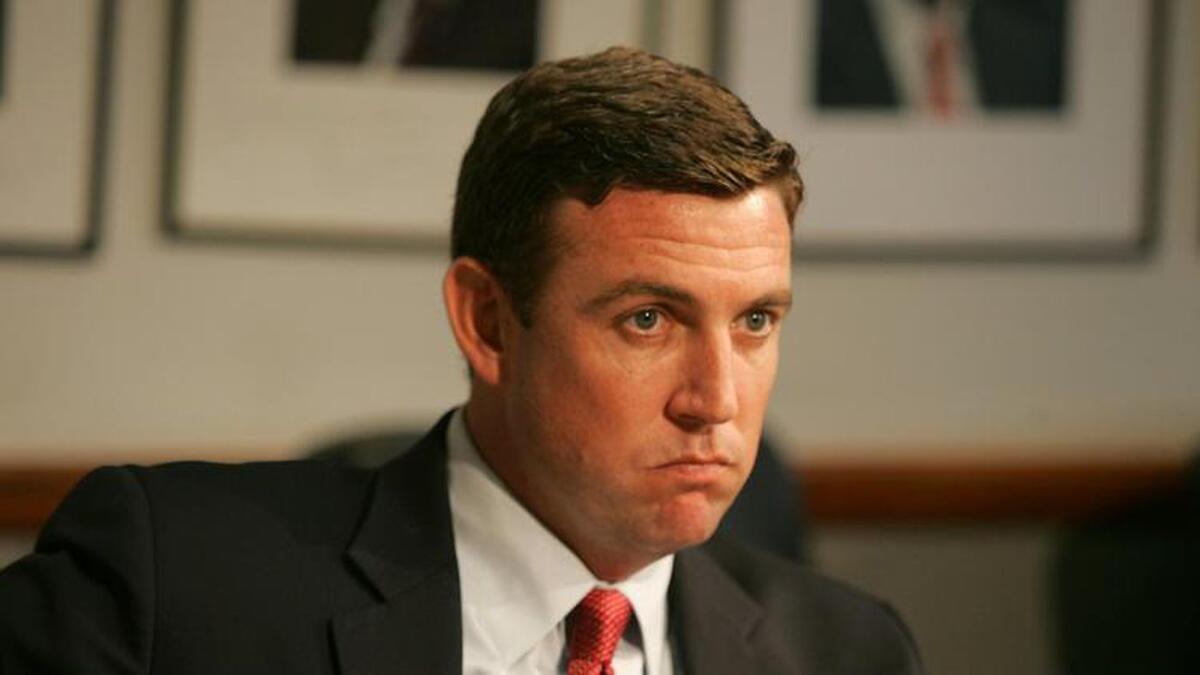
The FBI investigation into whether GOP Rep. Duncan Hunter of Alpine misused campaign funds for personal expenses appears to be intensifying, according to a report by Politico. The website revealed that additional grand jury subpoenas have been issued to people close to the five-term congressman. Here are some key new pieces of information from Politico’s report:
• Hunter’s parents and a female lobbyist he knows have received grand jury subpoenas. That followed a raid last February in which the FBI seized computers and documents from Hunter’s campaign finance compliance firm. According to Politico, Hunter’s wife and former campaign manager, Margaret Hunter, is at the center of the investigation and made many of the purchases in question. A subpoena was also issued to a business in Hunter’s district in December, according to the San Diego Union-Tribune.
• Hunter was surprised by the results of a review by an outside law firm his campaign hired to look at spending. In April 2016, more than $1,300 in video game purchases caught the attention of the Federal Election Commission and the Union-Tribune. Afterward, Hunter hired a law firm to review his campaign spending. Sources told Politico that Hunter was “shocked” when the review turned up more than $60,000 in improper campaign expenditures, which he later repaid and blamed on his wife. They included payments to a dentist, nail salons, theme parks, trips to Italy and $600 to fly the family’s pet rabbit. Hunter has said his wife no longer has access to the campaign credit card.
• He developed a relationship with a young woman on his staff that “caused some of his staffers to question” his judgment. Hunter refused to fire the woman, even after multiple staffers complained that her work attire was inappropriate and that she frequently missed work, Politico reported. According to the report, Hunter and the woman frequently texted each other and she often went with him to the Capitol Hill Club. The FBI has asked about the woman in its investigation, according to Politico’s report. When asked about alleged romantic relationships with the staffer and with a female lobbyist, Hunter called the questions “tabloid trash” but did not deny the claims.
• Hunter’s father defended him, but neither of them will comment on Margaret Hunter. Duncan L. Hunter, who served in the House for 27 years before helping elect his son to the seat, told Politico that his son is “a highly moral person of great character.” He also complained about the lengthy FBI investigation and noted “there’ve been no charges” against his son. Rep. Hunter recently said the investigation was taking too long and accused investigators of being politically motivated. Asked whether his daughter-in-law was innocent, Hunter Sr. declined to comment. Rep. Hunter also refused to answer when Politico asked whether he believed she misspent campaign funds.
• Some Republicans are pressuring GOP leaders to persuade Hunter to step down. They’re worried his legal troubles could cost them another House seat in a year that already looks very good for Democrats. While his district is solidly Republican, Hunter has been named one of the top Republican lawmakers in California that Democrats want to unseat in the midterms. He raised only $50,000 in the last three months of 2017, and his campaign is bleeding money.
FOR THE RECORD
1:48 p.m.: A previous version of this post stated that the FBI seized computers and documents in a raid in August. The raid occurred in February 2017.
Will drugged driving be a problem now that pot’s legal in California? This lawmaker wants the state to find out

With recreational marijuana sales now legal in California, one lawmaker wants to find out whether drugged driving is going to be a significant problem.
Assemblyman Ed Chau (D-Arcadia) has introduced a bill that would require all local law enforcement agencies to file annual reports with the state Department of Motor Vehicles detailing the number of arrests made for driving under the influence and the number of those arrests in which pot was suspected to be the substance causing impairment.
“Currently, the state has no uniform mechanism in place to evaluate cannabis drugged driving arrests as a result of legalization,” Chau said.
He noted that law enforcement agencies independently keep statistics on cannabis-related DUI arrests.
“This bill would require law enforcement agencies to forward their collected data to the Department of Motor Vehicles,” he said. “With that information, we will establish a statewide reporting system to evaluate the amount of cannabis drugged driving arrests and what policies are needed to address this dangerous behavior.”
The California Highway Patrol is separately studying the impact of marijuana on driving and whether new methods are needed to detect drugged driving.
Two California GOP seats moved in Democrats’ favor by election prognosticator
Following last week’s campaign finance reports, the nonpartisan Cook Political Report is saying Democrats have a better chance of winning two Republican-held seats in California.
Rep. Tom McClintock’s Northern California seat, was moved to likely Republican, down from solid Republican.
McClintock of Elk Grove was outraised by two of his opponents in the last three months of last year. The race was put on Democrats’ target list in the fall and this could be his first tough race since being elected in 2008.
In the strong GOP district, registered Republicans outnumber Democrats 44% to 29%, and McClintock has consistently won reelection with more than 60% of the vote.
Rep. Jeff Denham’s Central Valley seat joins two California seats in the Cook Report’s toss-up category.
Denham has been a Democratic target for years, and is sitting on a $1.9 million war chest, but he faces a slew of Democrats who were inspired to run by President Trump’s election.
Overall, the Cook Political Report shifted 21 Republican-held districts nationwide in Democrats’ favor.
‘Little’ Adam Schiff, Trump’s Twitter nemesis, liked it better when he had a nasty nickname to himself
When you get a busy congressman like Adam Schiff on the line, you don’t want to waste time with small talk. You want to get right to the point.
So I did: “Exactly, how tall are you, Congressman?”
Schiff chuckled, but he didn’t duck.
Republican John Cox boosts personal investment in his campaign for California governor to $4 million

GOP gubernatorial candidate John Cox told supporters on Wednesday that he was putting another $1 million of his money into his campaign, adding to his significant financial advantage among Republican candidates in the race.
“While we have gathered nearly 5,000 individual donors across California, it’s also important that I show continued investment in my campaign,” Cox emailed supporters.
The move brings the Rancho Santa Fe businessman’s total investment into his bid to $4 million — $1 million more than Republican Neel Kashkari spent on his primary and general election campaign in the 2014 governor’s race.
The circumstances of that race were different: Kashkari was running against a veteran Democratic incumbent and the field was much smaller. He was defeated by Gov. Jerry Brown by 20 points.
In the 2018 race, Cox entered the new year with nearly $2 million cash on hand, according to financial disclosures filed with the state.
That figure put him far ahead of GOP rival Travis Allen, an assemblyman from Huntington Beach who entered 2018 more than $200,000 in debt. The other top Republican in the race, former Rep. Doug Ose, won’t have to disclose finances until the spring because he entered the contest last month.
Despite Cox’s financial domination of his GOP rivals, he is many millions behind the three top Democrats in the race: Lt. Gov. Gavin Newsom, state Treasurer John Chiang and former Los Angeles Mayor Antonio Villaraigosa.
He also badly trails Democrats in most recent polling, including a Public Policy Institute of California survey released Wednesday night that found Cox had the support of 7% of likely voters, placing him in a statistical tie for third place.
Still, his financial advantage has allowed him to be the first candidate for governor to show up on radio and television.
Cox launched his second radio ad of the campaign on Monday, a 60-second spot called “Our Country, Our State.”
Poll: Newsom and Villaraigosa virtually tied in the governor’s race while California’s Senate race isn’t even close
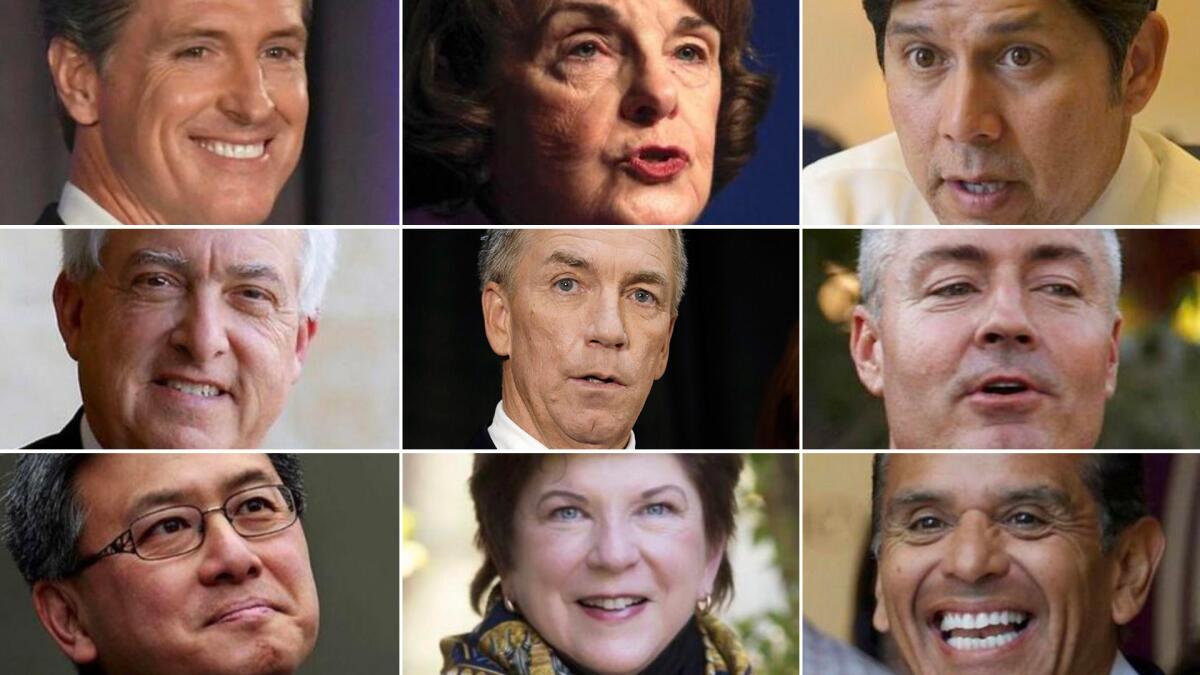
With less than four months to go until the June 5 primary, Lt. Gov. Gavin Newsom and former Los Angeles Mayor Antonio Villaraigosa are running practically neck and neck in the 2018 race for governor, according to a new poll by the nonpartisan Public Policy Institute of California.
California’s U.S. Senate race is a much different story. Sen. Dianne Feinstein, who is seeking a fifth full term, leads by a wide margin over her most formidable challenger, state Senate President Pro Tem Kevin de León of Los Angeles, the survey found.
All four of those top candidates are Democrats, showing just how dismal the prospects are for a Republican Party that has not won a statewide election in California since 2006.
The polls’ results largely mirror the findings in an earlier PPIC poll released in late November, though the race between Newsom and Villaraigosa has tightened a sliver.
PPIC President Mark Baldassare said the polls indicate that Newsom and Villaraigosa are solidified as the two front-runners leading into the primary. That’s significant because in California the two candidates who receive the most votes advance to the November general election, regardless of party.
But Baldassare cautioned that there is still time for political fortunes to rise and fall, especially given the volatility in Washington and, recently, on Wall Street.
In the governor’s race, Newsom was favored by 23% of likely voters in the state, with Villaraigosa close behind at 21% — well within the poll’s margin of error.
Newsom also leads the entire field in fundraising, giving him a major advantage in the home stretch of the primary campaign.
The other Democrats in the race lagged far behind. State Treasurer John Chiang came in at 9% and former state schools chief Delaine Eastin registered at 4%.
Among the Republicans, Huntington Beach Assemblyman Travis Allen was favored by 8% of likely voters, narrowly leading wealthy Rancho Santa Fe businessman John Cox, who was backed by 7%. Former Sacramento Rep. Doug Ose, who entered the race in January, was backed by just 3%.
Nearly a quarter of the likely voters questioned in the survey remained undecided.
All three Republicans in the race have emphasized their support for President Trump which, according to the poll, doesn’t seem to mesh with how California voters feel. Two-thirds of likely voters disapprove of the way the president has handled himself in office.
On the other hand, Republican support for repealing California’s recently approved gas tax could be a winning campaign message. State voters are evenly split on the idea, the poll showed.
Both Newsom and Villaraigosa had by far the highest name recognition among voters, but nearly a third of those surveyed had a unfavorable opinion of them — compared to 40% who had a favorable opinion — according to the poll.
Newsom’s strongest base of support is in the Bay Area, not surprising since he served two terms as mayor of San Francisco, as well as with self-described liberals. For Villaraigosa, the strongest support came from Latino voters, and he had a solid edge in Los Angeles County.
In the Senate race, Feinstein leads across the board: among men and women, all ethnicities and all major geographic regions of the state. The Democratic incumbent also leads among Latino voters and in Los Angeles County, De León’s home base.
“Feinstein is leading strong in areas where you think her challenger would need to do well,” Baldassare said.
Baldassare said De León’s poor showing is due in large part to the fact that he remains unknown to most California voters. Close to two-thirds of those polled had never heard of him or didn’t know enough about him to offer an opinion.
California voters divided over proposed measure to repeal increase in gas tax, survey finds

Likely voters are divided over a proposed initiative that would repeal recent increases in California’s gas tax and vehicle fees to pay for road and bridge repairs and mass transit improvements, according to the results of a survey released Wednesday.
The repeal of the gas tax is supported by 47% of likely voters and opposed by 48%, according to the statewide survey by the Public Policy Institute of California.
Repeal is supported by 61% of Republican voters and 52% of independents, but by only 39% of Democrats.
The Legislature, which is controlled by the Democratic Party, and Democratic Gov. Jerry Brown approved the tax and fee increases in April. They estimate the increases will raise $5.2 billion annually to begin whittling away at a large backlog of road and bridge repairs, and to expand mass transit.
A group backed by Republican members of Congress from California is getting close to collecting the 587,000 signatures needed to qualify a measure for the November 2018 ballot that would repeal the increase in gas taxes and require a vote of the people to raise fuel taxes in the future.
Starting Nov. 1, the state raised the state excise tax on gasoline by 12 cents, from 29.7 cents a gallon to 41.7 cents a gallon. The excise tax on diesel fuel increases by 20 cents, from 16 cents a gallon to 36 cents a gallon, and the sales tax rate on diesel increases from 9% to 13%.
Beginning Jan. 1, the state created a new annual vehicle fee ranging from $25 for cars valued at under $5,000 to $175 for cars worth $60,000 or more. In lieu of gas taxes, electric car owners will pay a $100 annual fee starting in 2020.
Former aide to Gavin Newsom speaks out about their affair while he was San Francisco mayor
The woman gubernatorial candidate Gavin Newsom had an affair with when he was mayor of San Francisco spoke out about their relationship on Wednesday after questions about the liaison emerged in the governor’s race.
Ruby Rippey Gibney said that although their relationship destroyed her home life, it probably shouldn’t be part of the discussion about sexual misconduct surrounding the #MeToo movement.
“I fully support the #metoo movement. In this particular instance, however, I am doubtful that it applies,” Rippey Gibney wrote on her Facebook page. “Yes, I was a subordinate, but I was also a free-thinking, 33-yr old adult married woman & mother. (I also happened to have an unfortunate inclination towards drinking-to-excess & self-destruction.)”
Talking about Dreamers, Nancy Pelosi gave the longest speech ever on the House floor
At 10:04 a.m. Washington time, Minority Leader Nancy Pelosi stood up in the House chamber and began speaking. For more than eight hours, she stood in four-inch heels, reading the stories of people brought to the country illegally as children, the people known as “Dreamers.”
She told stories of children who were smuggled across the border in a trash can. She spoke of Dreamers who gave high school graduation speeches but weren’t able to get loans to follow their classmates to college. She described the anxiety of people who lost their work permits following the initial short period President Trump gave them to renew their protections under the Deferred Action for Childhood Arrivals.
The San Francisco Democrat was demanding that House Speaker Paul D. Ryan commit to vote on fixing the legal status of Dreamers in exchange for support for a two-year spending plan to keep the government open past Thursday night.
Chorus of healthcare advocates praise single-payer system, but differ on how quickly California should pursue it
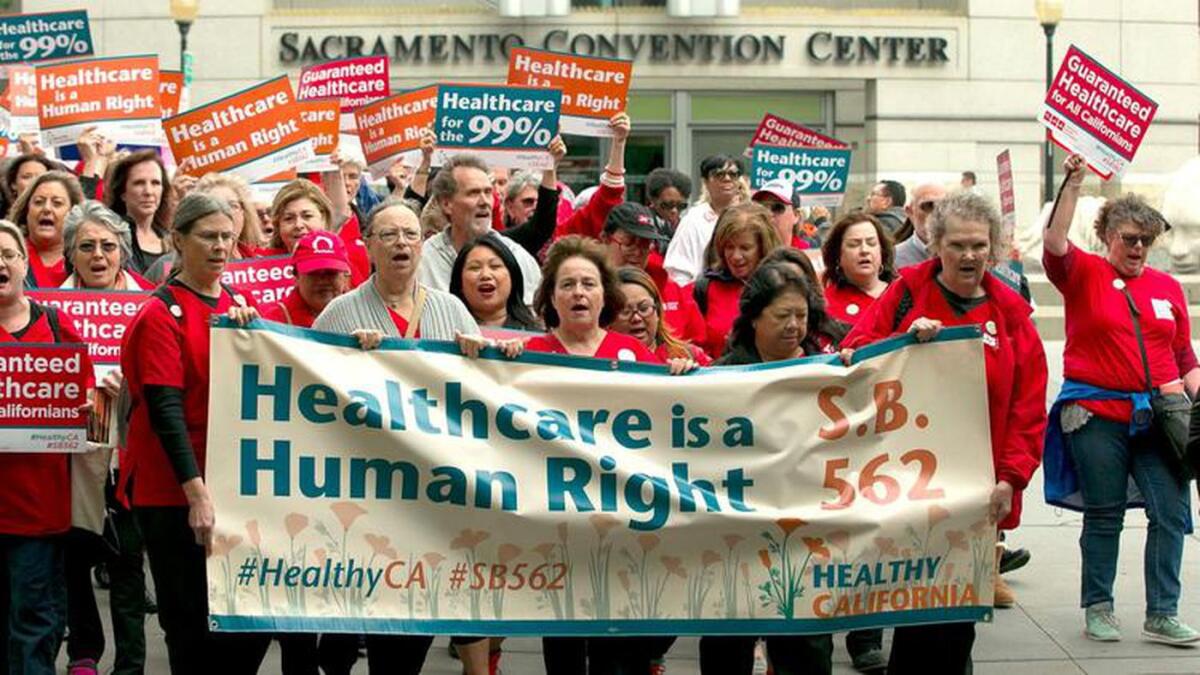
A months-long series of informational hearings on achieving universal health coverage in California culminated Wednesday with experts voicing widespread praise for creating a single-payer system, but starkly different opinions on the pace of such an overhaul.
The Assembly convened hearings in the face of activist outrage with last year’s shelving of SB 562, an ambitious bill that would establish a state-funded healthcare system to cover nearly all of Californians’ medical costs without requiring premiums or co-pays.
Proponents of SB 562, including its sponsors, the California Nurses Assn., continued their call for Assembly Speaker Anthony Rendon (D-Paramount) to advance the bill Wednesday, rolling out a new analysis finding that between 60% and 80% of denials for care issued by insurance companies were overturned by state regulators. The data, they argued, underscored the need to dramatically reduce the role of private insurance companies in Californians’ healthcare.
But other witnesses indicated unease with the sweeping changes that would be instituted by SB 562, including disruption for those currently working with private insurers or other health administrative positions that may be eliminated.
Dr. Stephen Tarzynski, president of the California Physicians Alliance, said the measure should be amended to create a more “realistic transition.”
“Some have criticized our approach as incrementalism,” Tarzynski said, adding he preferred to characterize it as “strategic planning.”
Anthony Wright, executive director of the consumer group Health Access, noted SB 562 would require the federal government’s approval to repurpose Medicare and Medi-Cal funds, a prospect he described as unlikely under the Trump administration.
“We want to continue to advocate, to organize and develop the goal of a single-payer, Medicare-for-all type system,” Wright said. “We should take steps in the meantime that do not require federal approval.”
Wright laid out a number of priorities he said should be pursued in the short term, including expanding Medi-Cal to cover adults who are in the country illegally and providing more subsidy assistance to make purchasing insurance on the Covered California exchange more affordable.
But Don Nielsen, political director for the nurses group, disagreed with the slower pace endorsed by the other witnesses.
“Doing it the way they want to — an incrementalist approach — is really not an effective way to go,” Nieslen said. “It potentially derails the momentum for doing single payer. [And] the approaches they’re talking about keeps insurance companies in the picture.”
California’s Legislature may put its new sexual harassment disclosure policy into state law
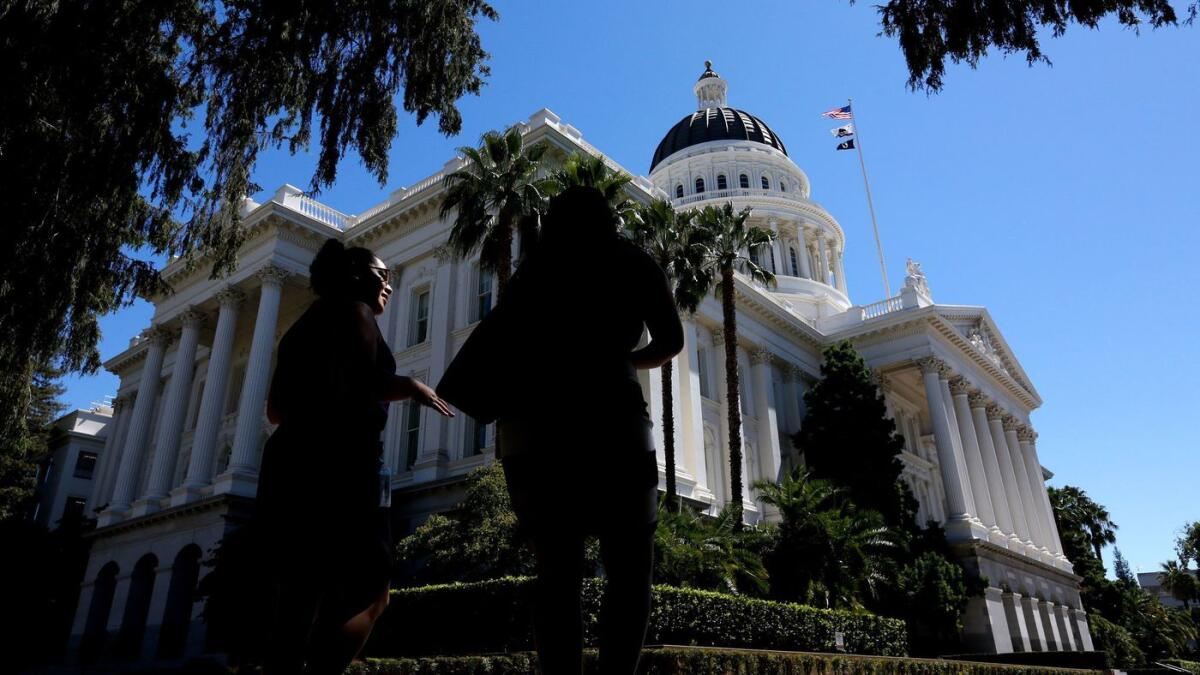
The decision by leaders of the California Legislature to voluntarily disclose some records related to sexual misconduct investigations could, under a new proposal, become state law.
On Tuesday, the Assembly Judiciary Committee introduced legislation to codify the guidelines unveiled last month for releasing records. Those rules were announced in the wake of conversations between Los Angeles Times attorneys and legislative officials, but do not have the force of law if future lawmakers reverse course.
“We are faced with a unique opportunity to fix some policies that should have been fixed a long time ago,” said Assemblyman Mark Stone (D-Scotts Valley), the committee chairman.
Last week, the Assembly and Senate released records showing 18 sexual harassment investigations since early 2006 — investigations in which discipline was imposed or where the allegations were “determined to be well-founded.” The records included investigations involving four sitting lawmakers, two former legislators and 11 former legislative staff members. One former staff member was the focus of two separate investigations.
But the records released were limited to those involving lawmakers or a “high-level legislative employee.” That distinction in the disclosure of staff records means that sexual harassment allegations against all other staffers could be shielded from public view.
Stone said the bill, for now, seeks to ensure transparency in cases of “abuse of power.” And he pointed out that recent events have made clear the limitations of the Legislative Open Records Act, the law enacted in 1975 that grants the Legislature unique and often more generous protection of records than other state or local agencies.
“This is an old law that long ago needed an update,” he said.
Nancy Pelosi now holds the record for the longest House speech, and she is still going
House Minority Leader Nancy Pelosi has been speaking on the House floor since 7:04 a.m. Pacific time, pushing for House Republican leaders to promise to hold a vote on a legislative fix for the status of people brought to the country illegally as children.
The San Francisco Democrat is now nearing hour eight, having blown past the previous record for the longest House speech anyone can remember, which occurred in 1909 when Champ Clark of Missouri held the floor for 5 hours and 15 minutes to speak against a tariff overhaul.
Unlike Pelosi, who has spoken nearly without interruption, Clark was repeatedly interrupted during his remarks.
Immigration lawsuit pits California Department of Justice against federal counterpart
The California Department of Justice on Wednesday took its federal counterpart to court, seeking an order to release documents that would explain the rationale of a threat to withhold law enforcement grants unless agencies in the state cooperate with immigration enforcement.
California Atty. Gen. Xavier Becerra filed the lawsuit in San Francisco against the U.S. Department of Justice and its Office of Justice Programs, following up a Freedom of Information Act request in September for information about new conditions placed on law enforcement grants under the Trump administration.
The new conditions were set by the federal government as California declared itself a sanctuary state that is restricting how local law enforcement agencies cooperate on immigration enforcement.
Five months after the formal request, Becerra said the federal government has not provided the documents.
“As citizens of this country, we have the right to examine public documents of our government by submitting a FOIA request,” Becerra said in a statement. “That’s a hallmark and indispensable tenet of an open and transparent democracy. The federal government doesn’t get to choose which laws it will obey, and U.S. Attorney General Jeff Sessions and his Justice Department should be in the business of enforcing, not violating, the law.”
The lawsuit was filed in the U.S. District Court for the Northern District Court of California.
Watch live: Nancy Pelosi holds the House floor over a promise for a DACA fix
House Minority Leader Nancy Pelosi, a California Democrat, wants House Speaker Paul D. Ryan (R-Wis.) to commit to holding a vote on a legislative fix for people brought to the country illegally as children, and she has been speaking on the House floor for hours.
The Senate appears close to a two-year spending bill that would avert another government shutdown, provide tens of millions of dollars in disaster assistance and increase military and domestic spending.
Pelosi sent out a statement earlier saying she wants a commitment from Ryan to bring a bill for so-called Dreamers to the House floor in exchange for her support for the massive bipartisan spending package. Senate Majority Leader Mitch McConnell (R-Ky.) made such a promise to Senate Democrats as part of a deal to end the last shutdown just weeks ago.
Hundreds of thousands of Dreamers have been protected by the Obama-era Deferred Action for Childhood Arrivals Program, which President Trump announced last year would be discontinued in March, though it since has been temporarily protected by a court order.
If the Senate bill were to pass and be signed into law, it would address several of the remaining big-ticket issues for the year, meaning there would be few other chances for Democrats to push for a legislative fix for the Dreamers.
“We have an opportunity now that is almost matchless” to get something done, Pelosi said. “I don’t know when we would have another opportunity that matches today.”
During her ongoing speech, Pelosi has been telling the stories of some Dreamers.
Republican candidates for California governor square off at debate over harassment allegations, conservative credentials
Debate over sexual misconduct in politics and a comparison of conservative bona fides dominated a boisterous forum Tuesday among the three top Republican candidates for California governor.
The San Francisco matchup came on the heels of news that one of the GOP contenders, Assemblyman Travis Allen of Huntington Beach, was named in a 2013 harassment complaint disclosed Friday by the California Legislature. The event also marked the first time former Sacramento-area Rep. Doug Ose appeared on a debate stage since joining the race last month.
Ose pitched himself as the most experienced politician in the room and showed an eagerness to attack his opponents, Allen and businessman John Cox of San Diego County. The discussion was interrupted several times by heated personal exchanges between the candidates as they sized up each other’s credentials.
In Rep. Ami Bera’s district, poll finds likely voters are narrowly ‘inclined’ to reelect the Democrat
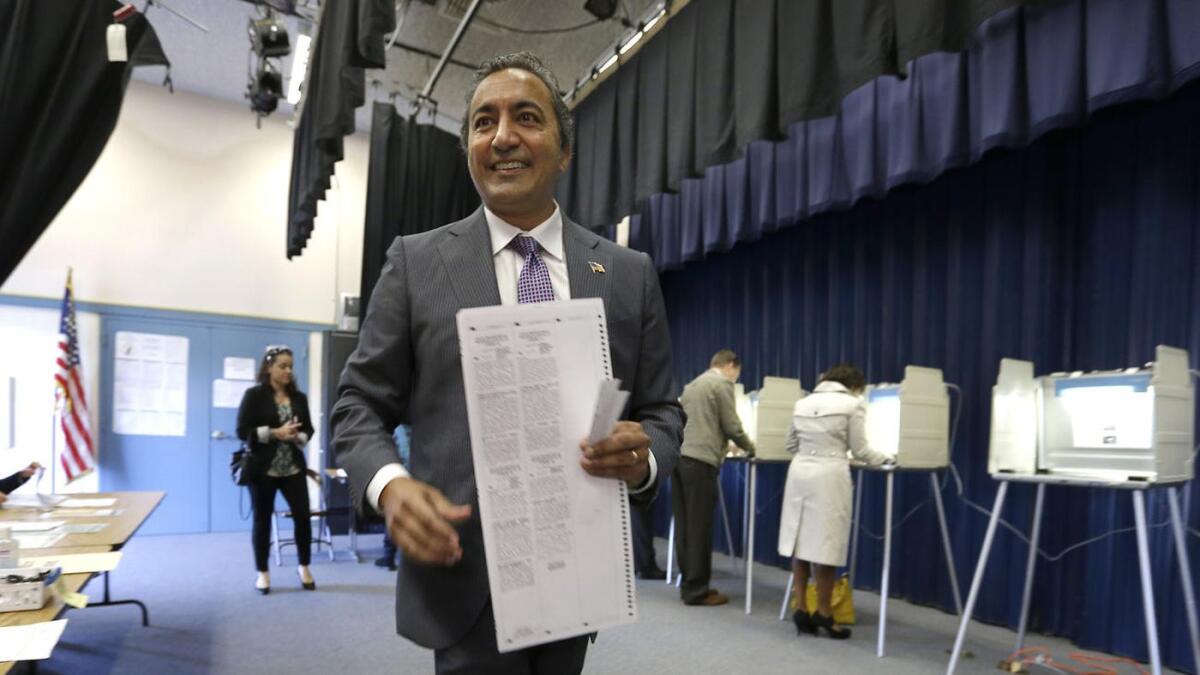
Most attention is focused on Democratic efforts to flip vulnerable Republican-held seats, but that doesn’t mean that the handful of potentially weak incumbent Democrats in California can breathe easy going into 2018.
A UC Berkeley’s Institute of Governmental Studies poll released Wednesday found that likely voters in one of the most volatile districts, the 7th Congressional District, are “inclined” to reelect Democratic Rep. Ami Bera of Elk Grove by a 48% to 44% margin.
The Sacramento-area seat is a frequent Republican focus. Bera won a third term with 51.2% of the vote in 2016 and so far, his 2018 opponents have struggled to break through or compete with his current $1.4-million war chest.
Opinions on reelecting Bera were divided along party lines, with 80% of Democrats inclined to back him and 81% of Republicans disinclined. No-party preference voters were about evenly divided.
The poll also found a high correlation between voters’ opinion of Bera and their opinions of President Trump.
The poll found that 59% of 7th District likely voters disapprove of Trump’s performance as president, and among those voters, 77% were inclined to support Bera’s reelection.
According to the poll, voters also said Bera’s votes against the House effort to repeal the Affordable Care Act and the Republican tax bill increased their willingness to support him.
On the tax bill, 50% said it made them more inclined to vote for Bera, while 39% were less inclined.
On the healthcare bill, 49% said it made it more likely they’d vote for him, while 36% said it reduces their chances.
The poll questioned 1,056 likely voters in Bera’s district in mid-January.
California lawmaker wants all Uber, Lyft cars to be electric by 2028

A Bay Area lawmaker wants to require Uber, Lyft and other ride-hailing companies to have all electric fleets by 2028.
Senate Bill 1014 from Sen. Nancy Skinner (D-Berkeley) would set goals for the electrification of ride-hailing cars over the next decade, and set aside up to $300 million to help subsidize the purchase of electric cars by ride-hailing drivers.
As the ride-hailing companies continue to gain popularity, particularly in urban areas, their cars should lead the way on adopting zero-emission vehicles, Skinner said in a statement.
“Electrifying rideshare vehicles cleans the air and protects our climate,” Skinner said.
SB 1014 would require the California Public Utilities Commission, which regulates ride-hailing, to coordinate with the California Air Resources Board, which regulates climate change issues, to set electrification targets. Skinner’s proposal sets a goal for 20% of the miles driven by the companies to be electric by 2020, 50% by 2023 and 100% by 2028.
Spokespeople for Lyft and Uber said the companies were reviewing the bill.
“While we are supportive of increasing the number of of electric vehicles on the road, we are also concerned about the impact of placing costly requirements on drivers who depend on ridesharing to make ends meet,” said Chelsea Harrison, a Lyft spokeswoman.
“We share Gov. [Jerry] Brown and Sen. Skinner’s goal of reducing climate emissions, and we look forward to working with policymakers to increase access to affordable [electric vehicle] mobility without limiting economic earnings opportunities,” said Austin Heyworth, an Uber spokesman.
Changes to Capitol Hill sexual harassment policy would put victims first, Rep. Jackie Speier says
The new sexual harassment reporting and settlement process for Capitol Hill staffers that was approved by the House Tuesday would put victims in control, said California Rep. Jackie Speier.
Speier (D-Hillsborough) and House Administration Committee members wrote the legislation that would simplify the current convoluted sexual harassment reporting process. The legislation follows a series of high-profile sexual harassment stories that have rocked Hollywood, the media and Capitol Hill. Speier said the current process was designed to protect harassers.
“The victim becomes the person we’re putting first and foremost,” Speier said at a news conference after the House approved the bill by a voice vote. “The victim will have support, the victim will have legal representation. The victim will be in charge and any member who thinks, moving forward, that they are going to get away with sexual harassment, we have a big wakeup call for you.”
Speier has worked for years to get the process changed, but the House only recently united behind a fix.
Among other changes, the bill eliminates required counseling and mediation periods for victims and mandates that members of Congress who settle claims repay the U.S. Treasury. It also increases transparency about harassment claims, and requires an ethics committee review for settlements.
The bill next goes to the Senate, where its future is uncertain. Some senators have said they want changes to the bill, and it’s not clear whether they will tweak the House bill or consider their own version.
The House also approved a resolution to explicitly prohibit lawmakers from having sexual relationships with staffers or using office accounts to settle harassment claims. The resolution also requires each congressional office to have a sexual harassment prevention policy. The resolution doesn’t need Senate or presidential approval to go into effect.
“These bills will bring much-needed reforms to the process available to congressional employees for filing workplace complaints and will ensure a more equitable and transparent process for victims and the American public,” co-sponsor Rep. Zoe Lofgren (D-San Jose) said in a statement.
California lobbyists could receive a four-year ban for sexual harassment under new legislation
Any California registered lobbyist found to have committed sexual harassment could be banned from similar work for up to four years under a plan introduced on Tuesday at the state Capitol.
“We need to protect people throughout the Capitol community from harassment and hold perpetrators accountable,” Assemblyman Marc Levine (D-San Rafael) said. “The scope of sexual harassment expands beyond the Legislature, and we have a duty to protect the entire community.”
Levine’s bill would require the state Fair Political Practices Commission, which oversees much of the regulation of lobbying, to investigate sexual harassment complaints made against individuals who are registered to lobby state officials. The ban for those found guilty could, in some cases, be imposed for as long as four years.
Last week, legislative officials revealed documents related to 18 sexual harassment investigations since early 2006 where the allegations had been validated in some way or discipline was imposed. None of those documents, however, pertained to lobbyists.
Two charts that officials provided to The Times showed as many as 12 individuals listed in allegations involving “lobbyists and others,” but no details were provided in those reports. It was unclear whether those allegations were supported by investigation efforts or dismissed.
Levine’s proposal, Assembly Bill 2055, doesn’t detail how the state’s ethics agency would investigate or pass judgment on allegations. A spokesperson for the lawmaker said in an email the bill will soon include a provision requiring that the findings of the investigations be made public.
The Nunes memo made this congressman a national name. But his California district cares about water, not Russia
At Old Salle Cafe, near the northern outskirts of this deeply conservative farming city, Archie Harrison said he did not know much about his congressman, Devin Nunes, nor did he need to know more.
“If he supports Trump, I support him,” the 51-year-old truck driver said Monday over a breakfast of steak and eggs, only hours after President Trump had hailed Nunes in a tweet as a future “Great American Hero.”
As Nunes finds himself at the center of a political firestorm in Washington over the release of his controversial memo about the Russia investigation, thousands of dollars are pouring into Democratic campaigns aiming to unseat him in the midterms. But in the Republican’s hometown of Tulare, where partisan rifts reflect those across the country, many constituents aren’t following the battle, even as it only seems to heat up.
Republican John Cox’s effort to create 12,000 ‘neighborhood’ lawmakers in California fails to make the ballot
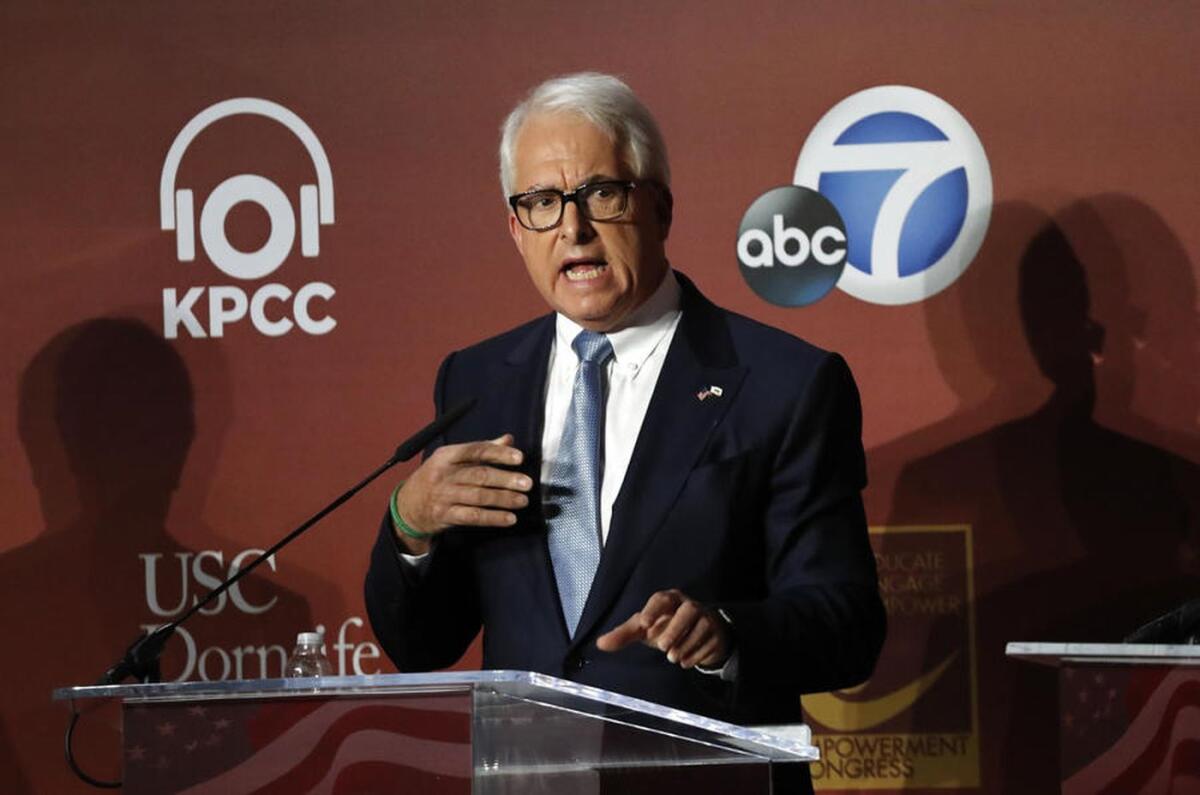
An effort to radically reshape California’s legislative branch of government by electing as many as 12,000 local representatives failed Tuesday to qualify for the November state ballot.
The proposal’s backer, Republican businessman and candidate for governor John Cox, spent six years trying to get his “Neighborhood Legislature” plan in front of voters. State elections officials announced that the latest campaign fell short by 25,501 valid voter signatures.
More than 18,000 signatures collected by petition circulators were rejected after local registrars reviewed each of the signatures collected over the course of the last several weeks.
Cox, of San Diego County, sought to substantially change the way members of the Legislature are elected, by handing over the selection of the men and women who serve in Sacramento to newly created neighborhood councils. The specifics of his measure would have required the election of 12,000 neighborhood representatives, from whose ranks the 120 serving at the state Capitol would be chosen. He insisted the sweeping change to legislative elections would make lawmakers more responsive to Californians by creating new representation at the local level.
The proposal would have also shrunk the Legislature’s budget by one third and would have imposed a new cap on the salaries of lawmakers chosen to serve in Sacramento.
Cox’s political team said on Tuesday that some county signature reports seemed incorrect, and hinted that there could be legal action to have some of the rejected signatures re-examined.
“Whether or not this reform idea is kept off the ballot, the goal and message of my campaign for governor haven’t changed, we need to eliminate the corrupting influence of special interest money in Sacramento and reclaim California,” said Cox in an emailed statement.
He first proposed the idea for the state’s 2012 ballot, but failed to gather the needed signatures for that effort, or for statewide elections in 2014 and 2016. For the latest attempt, he spent more than $2.3 million of his own money on signature collection. Last year, he told The Times that the ballot measure would help “take our government back from the funders, the cronies and the corrupt.”
The expanded Legislature idea was just one of Cox’s proposals for shaking up the legislative branch of government. In 2015, he wrote a proposed ballot measure to require legislators to wear NASCAR-inspired logos representing their top political donors while on the job at the state Capitol.
UPDATE:
1:25 p.m.: This article was updated with comment from Cox.
This article was originally published at 11:43 a.m.
It’s Ronald Reagan Day, California governor declares
California Gov. Jerry Brown has declared Feb. 6 Ronald Reagan Day in honor of the 107th anniversary of the former U.S. president and governor’s birth.
Brown said Californians should recognize Reagan’s diplomatic achievements with the former Soviet Union and the economic recovery that occurred during his presidency in the 1980s.
“Above all, we remember the man: his irresistible optimism, faith and good humor,” Brown wrote in a proclamation Tuesday. “As a way to honor his memory, I recommend that Californians give as generously as they can to the Ronald and Nancy Reagan Research Institute, an initiative of the Alzheimer’s Association.”
Reagan has remained a touchstone for conservatives in California. His former coastal mountain ranch in Santa Barbara, for instance, serves as a training ground for young conservative activists across the country.
Other California politicians got in on the honoring.
California joins other states to sue Trump administration over suspension of clean water rule

California is one of 10 states that sued the Trump administration on Tuesday to challenge its decision to suspend the 2015 Clean Water Rule aimed at protecting lakes, rivers, and streams from pollutants.
California Atty. Gen. Xavier Becerra said the lawsuit alleges the U.S. Environmental Protection Agency and the U.S. Army Corps of Engineers acted without authority in suspending the rule, did not provide a rational explanation and did not provide required notice and opportunity for public comment.
The 2015 rule provided a broader definition of waterways to be protected.
“The Trump administration should be doing everything in its power to keep our water clean, to protect our environment,” Becerra said in a statement. “Instead, it has decided to suspend the Clean Water Rule with cavalier disregard for our laws and deliberative process.”
The lawsuit was filed in federal court in New York and other plaintiffs include the states of New York, Connecticut, Maryland, Massachusetts, New Jersey, Oregon, Rhode Island, Vermont, Washington, and the District of Columbia.
Majority of likely voters ‘disinclined’ to reelect GOP’s Rohrabacher and Knight, according to new poll
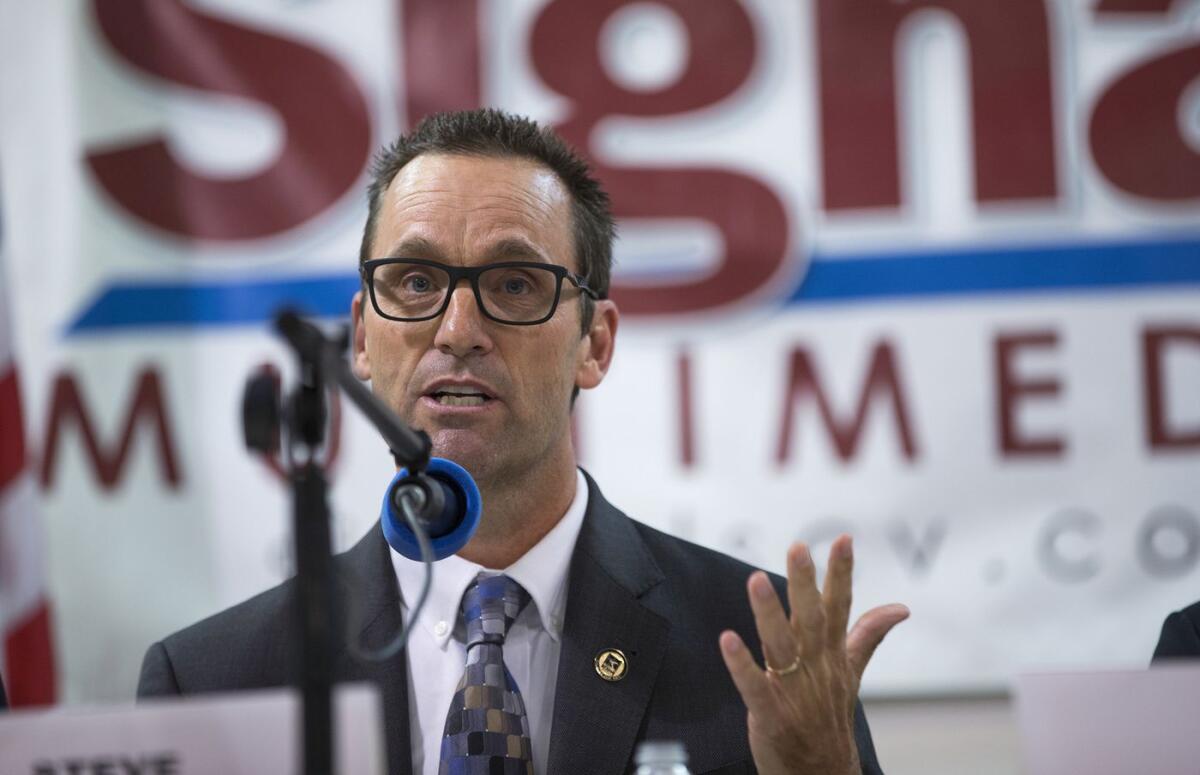
Vulnerable California Republicans’ chances of holding their seats may hinge on distancing themselves from President Trump, according to a poll of likely voters released Tuesday.
The mid-January poll by UC Berkeley’s Institute of Governmental Studies found that likely voters in two of the most competitive districts in the state are unhappy with Trump’s performance and are “disinclined” to reelect their members of Congress.
About 56% of likely voters in the 25th Congressional District, represented by Rep. Steve Knight of Palmdale, are disinclined to reelect the congressman, while 38% say they are inclined to do so.
While 78% of Republicans said they are inclined to support Knight, 90% of Democrats said they are not. Knight might face particular trouble among the 60% of no party preference voters who said they are disinclined to back Knight. In Californa, no party preference voters tend to lean Democratic at the polls.
In the 48th District, the poll found 51% of likely voters are disinclined to reelect Rep. Dana Rohrabacher of Costa Mesa while 41% say they are inclined to reelect him.
Partisan support and opposition was similarly high for Rohrabacher, with 73% of Republicans supporting him and 96% of Democrats opposing his reelection. But only 30% of no party preference voters said they aren’t inclined to back the congressman.
Both polls found that Trump remains unpopular in the districts. Among likely voters, 55% in Knight’s Antelope Valley-area district disapprove of the the president’s performance and 53% disapprove in Rohrabacher’s coastal Orange County seat.
In both districts, pollsters found a high correlation between likely voters who disapprove of Trump, disapprove of the Republican-controlled Congress and aren’t inclined to vote for Rohrabacher or Knight.
Democrats are trying to use two major bills passed by the House last year to attack vulnerable Republicans, but the poll shows likely voters place varying levels of importance on those bills.
When asked about Knight’s votes for the tax bill last December and to repeal the Affordable Care Act last May, likely voters said his votes makes them less inclined to reelect him by a 52% to 40% margin.
Knight’s seat is a recurring Democratic target and Democrats outnumber Republicans in voter registration there.
Rohrabacher’s district may be a tougher win for Democrats. The GOP holds an 11 percentage point registration lead there, and the congressman has consistently been reelected without much trouble.
Rohrabacher was among just a handful of members who voted against the tax bill, but the poll found likely voters split on how it would affect their midterm election votes: 32% said the congressman’s vote against the tax bill makes them more inclined to support him, 29% said it makes them less inclined, and another 34% said it has no effect.
But when asked about Rohrabacher’s vote to repeal the Affordable Care Act, 43% said it made them more likely to support his reelection, and 48% said it made them less likely to do so.
The Knight poll questioned 977 likely voters in the 25th District. The Rohrabacher poll questioned 1,310 likely voters in the 48th District.
UPDATES
11:28 a.m.: This post was updated with information of the partisan breakdown of the poll’s results.
This article was originally published at 10:58 a.m.
California Democrats have raised nearly two times as much money as the Republicans they are trying to oust
If Democrats are going to regain control of the U.S. House and return Nancy Pelosi to the speakership, they must forge a path through California.
A close look at the latest money picture in the competitive congressional races shows Democratic candidates already are raising historic amounts of money, even in unexpected districts.
Here are a few major takeaways by the numbers, which suggest a Democratic wave could indeed be on the horizon.
After years of delay, California Legislature approves whistle-blower protections for its own staff
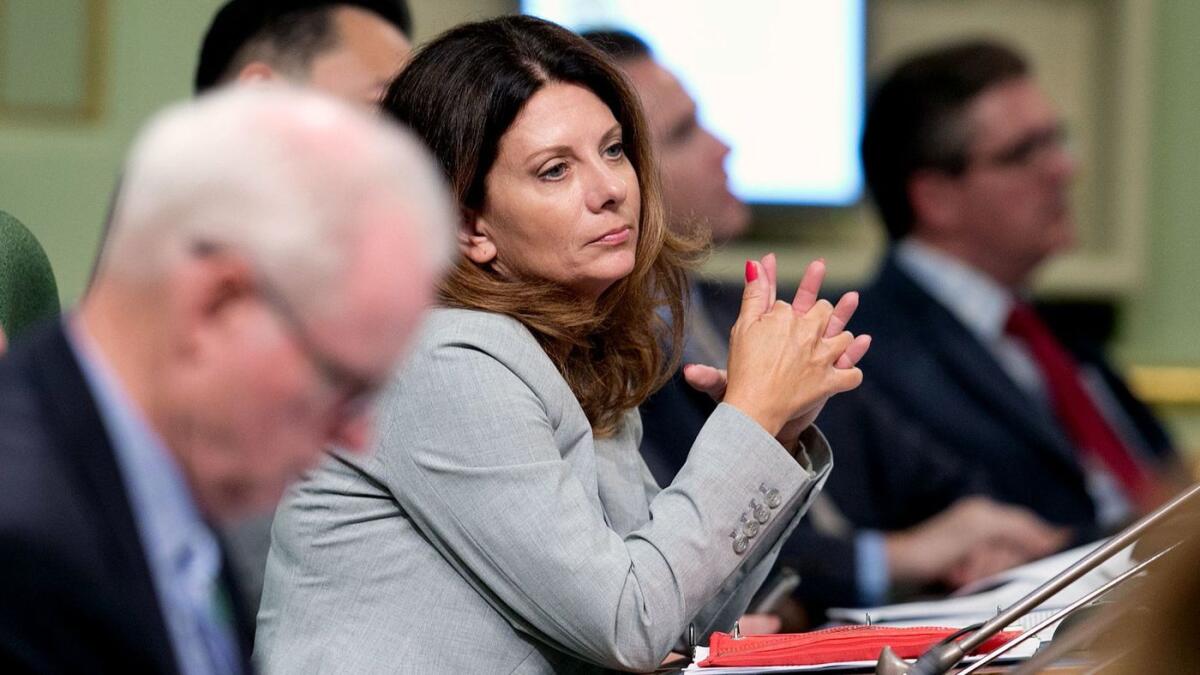
A bill to extend whistle-blower protections to Capitol staffers that had been repeatedly shelved in previous years cleared the Legislature on Monday and is headed to Gov. Jerry Brown’s desk.
The legislation by Assemblywoman Melissa Melendez (R-Lake Elsinore) would protect legislative employees who report legal or ethical violations, including sexual harassment, by fellow staff or lawmakers.
“No one should have to decide between keeping their job and reporting abuse,” Melendez said while presenting the measure, Assembly Bill 403, on the Assembly floor. It passed on a 74-0 vote to applause in the chamber.
Melendez first introduced the measure in 2014, after a string of ethical scandals in the state Senate led to the unprecedented suspension of three sitting senators. In four attempts, her proposal easily passed the Assembly, only to be held in the Senate Appropriations Committee with little explanation.
The renewed focus on sexual harassment in recent months breathed new life into the bill, with the list of co-authors swelling to more than 60 legislators. The measure was amended to more explicitly include protections for staff who are filing reports on sexual harassment and also to include an urgency clause, which would make it go into effect immediately should Brown sign it.
Assembly members and staff wore black to mark Monday’s vote, the final legislative hurdle for the measure. The bill also became a rallying point for advocates seeking an overhaul to the way the Capitol handles sexual harassment complaints. We Said Enough, a nonprofit group formed by some of the authors of an open letter released in October decrying Capitol culture toward women, lauded its passage.
“We hope that the passage of AB 403 provides some comfort to victims and acts as a warning to perpetrators that harassment and discrimination is unacceptable,” the group said in a statement. “The responsibility to change behavior rests with all of us, and as a community, we need to remain committed to continuing the fight for this goal.”
The vote came three days after the Legislature released records on more than a decade’s worth of substantiated sexual harassment claims filed in the Capitol. The disclosure offered the most detailed look yet on how the institution investigates and disciplines complaints of misconduct.
There were 18 substantiated cases of sexual harassment or abuse since 2006, according to the records, and both houses say additional investigations are ongoing. Assemblywoman Laura Friedman (D-Glendale) said the uptick in investigations in 2017 is not a reflection of increased harassment in the Capitol, but of more women coming forward.
“I think that this will have a chilling effect on people who operate in the Capitol, who know that women aren’t going to be silent any longer,” said Friedman, who chairs a committee tasked with evaluating the Legislature’s handling of harassment complaints. “They’re willing to come forward and this Legislature will investigate and we will release the names of people who are committing these kinds of actions.”
------------
UPDATES
4:02 p.m.: This article was updated with information about records released by the Legislature, and with a quote from Assemblywoman Laura Friedman (D-Glendale).
This article was originally published at 2:54 p.m.
------------
California lawmaker tries again to increase taxes on legal, accounting and other services
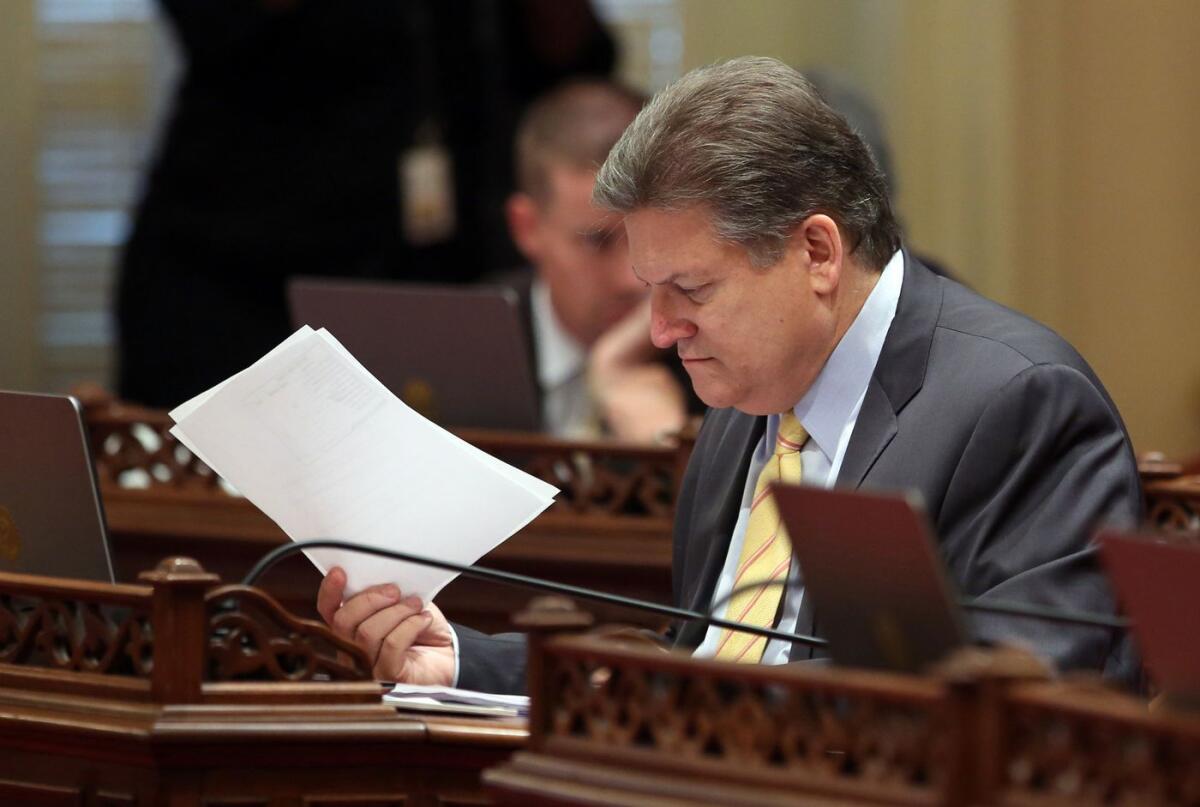
A state senator from Los Angeles wants to increase taxes on legal, consulting, accounting and other service work and use the money to cut other taxes and upgrade state infrastructure.
State Sen. Bob Hertzberg (D-Van Nuys) has introduced versions of the legislation for years in a bid to help insulate the state from boom-and-bust cycles in revenue drawn from relying heavily on income tax payments from the wealthiest Californians.
His current proposal, Senate Bill 993, is different from prior failed attempts because the recent federal tax overhaul provides new urgency to address California’s tax structure, Hertzberg said in a press release.
“The severe impact of the Trump tax on California means now is the time to bring this idea to life, in a way that is smart and creates lasting improvements to our tax system,” Hertzberg said.
Under the legislation, revenue from the increased taxes on service work would be used to cut other taxes and finance infrastructure improvements, workforce development and education, the release said.
Lawmaker wants to ease restrictions on legal weed at special events
A state lawmaker wants the state to relax its policies prohibiting organizers of festivals and other special events in California from allowing marijuana sales and use unless the event is at a county fairground.
Assemblyman Bill Quirk (D-Hayward) said Monday he introduced a bill on behalf of the city of Oakland, which wants marijuana sales to be allowed at its annual Art and Soul Festival this summer.
“These events support local economies and small businesses,” Quirk said in a statement.
“Despite the fiscal and communal benefits such events bring to a city or local community, current law prohibits local governments from approving applications for cannabis sales at special events if they are held anywhere but county property,” he added.
The bill would allow pot sales and use at special events on public and privately owned property, but would not supersede any local ordinance that bans smoking in some public places in a city.
Bid to hike commercial property taxes in California could raise $6 billion to $10 billion a year, analysis finds
A proposed November 2018 ballot initiative to increase property taxes on commercial land could add $6 billion to $10 billion to state coffers annually, according to a report by the state’s nonpartisan Legislative Analyst’s Office.
The proposal would make a dramatic change to rules implemented by California’s landmark Proposition 13 ballot measure that capped how much property tax bills could increase. Under the new measure, the state would receive more tax dollars from commercial and industrial properties by assessing them at their current market value, an effort known as “split roll” because existing tax protections on homes would remain in place. The new revenue would go to local governments and public schools.
While the amount of tax dollars raised by the proposal would be significant, the report from the legislative analyst included warnings. The revenue would depend heavily on the health of the state’s real estate market and could therefore be volatile. Similarly, raising property taxes on businesses could cause firms to leave or choose not to relocate to California, the report said.
“Overall, the measure’s effect on the health of the state’s economy is uncertain,” the report said.
Proposition 13 passed in 1978 amid concerns that rising property taxes could force people out of their homes. The ballot measure limited property taxes to 1% of a property’s value at the time of purchase and ensures that the assessed value on which taxes are based can increase by a maximum of only 2% a year — no matter how much a property’s market value goes up.
Backers of the proposed split roll initiative include the League of Women Voters of California and community organizing nonprofits California Calls and PICO California. They need to collect 585,407 valid signatures for the measure to make the November ballot.
None of the groups so far has reported raising the substantial sums needed to help qualify the measure or to wage what would likely be an expensive campaign opposed by business groups.
Trump vs. Schiff: president accuses Californian of wanting to run for higher office
As the highest ranking Democrat on the House Select Intelligence Committee, Burbank’s Rep. Adam Schiff has been the face of the Democratic opposition in the Russia investigation for months.
A Monday morning tweet in which the president accused him of leaking classified information and of being “desperate to run for higher office” has thrust Schiff front and center once again.
The tweet could be a response to the congressman’s appearance Sunday on ABC’s “This Week.” Schiff called the Nunes memo, which criticizes the FBI investigation into Trump’s associates and their possible ties to Russian meddling in the 2016 election, a “political hit job on the FBI.”
“The goal here really isn’t to find out the answers from the FBI. The goal here is to undermine the FBI, discredit the FBI, discredit the investigation, do the president’s bidding,” Schiff said.
Trump has used the memo to claim that the investigation is politically motivated, and has hinted he could use it to justify firing top law enforcement officials. He followed his criticism of Schiff with praise for another Californian, chairman of the committee Rep. Devin Nunes of Tulare, saying that Nunes “may someday be recognized as a Great American Hero for what he has exposed and what he has had to endure!” Nunes played a role in crafting the memo and pushed for its release over objections from Democrats, the FBI and some Republicans who said it cherry-picked information out of context that makes the FBI look bad.
Schiff responded on Twitter with a reference to an Axios report that the president’s private time is referred to as “executive time” on his schedule, even though he often watches television.
Catch up on who Schiff is, and why his background as a prosecutor makes him an interesting opponent in the investigation, with The Times’ profile from when the House investigation began last spring.
There’s a big problem for California Republicans, and it’s this year’s race for the U.S. Senate
There is something worse than seeing your political party lose — yet again — the race for one of California’s most prominent offices.
It’s when your party’s voters simply don’t show up on election day. And if enough of them simply sit out due to a lack of interest, it can endanger the party’s power for years to come.
That brings us to the U.S. Senate race, where Sen. Dianne Feinstein is seeking a fifth full term. With only days to go before the formal filing season opens, there’s not a single California Republican with any name I.D. who seems prepared to run against her.
California Politics Podcast: Sexual harassment in Sacramento goes from debate to documents
Even after last week’s disclosure of dozens of records of sexual harassment investigations from the past decade, the most important questions about workplace harassment at the state Capitol may still lie ahead.
On this week’s California Politics Podcast, we discuss the broader implications of lawmakers releasing new details about sexual harassment investigations since 2006 — namely, whether advocates for new rules and additional oversight now have a better sense of what’s likely to work.
We also review the newly filed campaign cash reports from major candidates in the races for governor and U.S. Senate. While it’s still early in both races, the tallies show one candidate in each race with a sizable advantage.
Former Sen. Roderick Wright blames love of spoken-word poetry for harassment claim that led to settlement
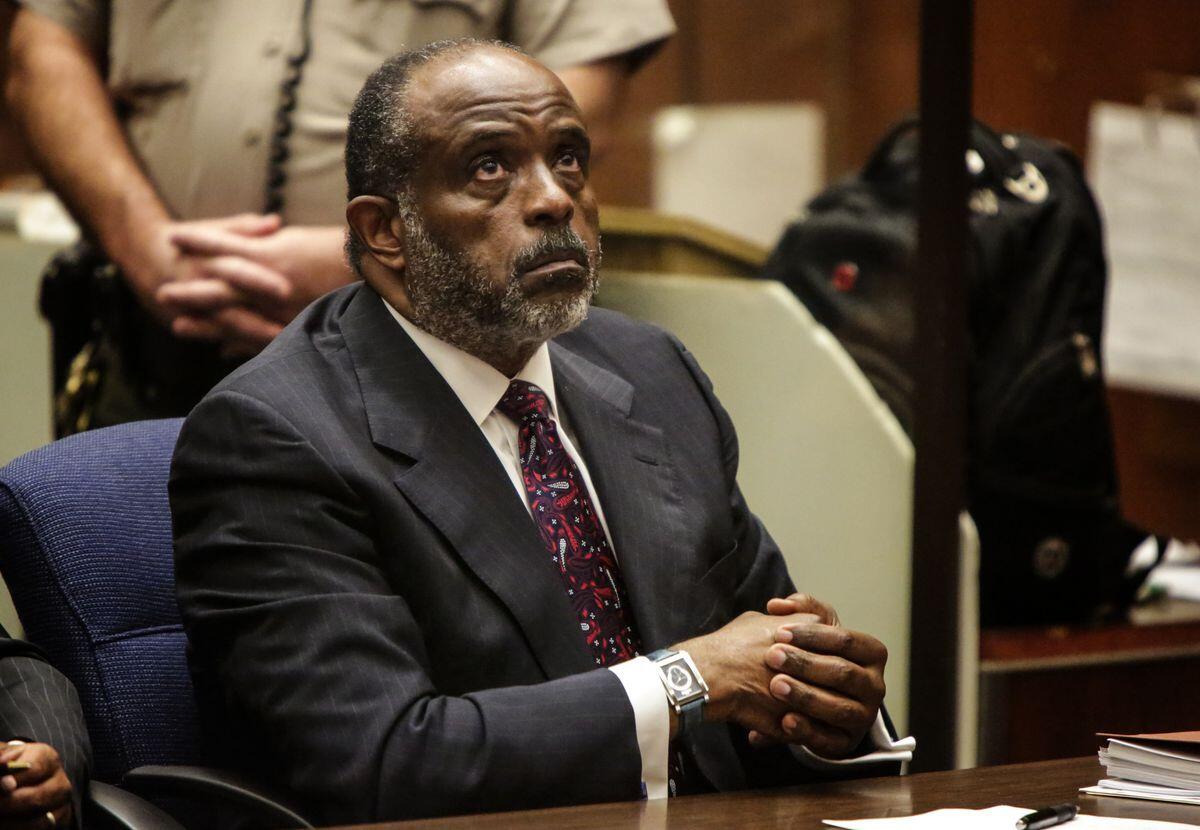
Former state Sen. Roderick Wright (D-Inglewood) was given a “stern admonishment” in 2010 by the Senate Rules Committee for repeatedly using coarse and vulgar language that offended a female staffer, according to a newly released letter from Darrell Steinberg, then leader of the Senate.
Wright said Friday that spoken-word poetry got him in trouble.
The Senate paid $120,000 in 2010 to settle a claim by Fahizah Alim, who alleged she was sexually harassed by Wright in 2010. At the time, The Times reported that Alim’s attorney, John Poswall, said Wright’s actions included inappropriate comments to Alim “over some period leading up to her ultimately leaving that office.”
The Legislature on Friday released a sheaf of records going back a decade regarding sexual harassment complaints sustained by the Legislature, and they included a report by Steinberg on Wright.
“The Senate Rules Committee has not found that your conduct constituted harassment of this employee as that term is defined by law,” Steinberg wrote. “Instead, the report concludes that a number of specific claims of coarse and vulgar language occurred as has been confirmed by you and members of your staff. This behavior contradicts the important policies and practices of this house.”
Wright admitted to part of the complaint that he had played excerpts from HBO’s “Def Poetry” series in his office where Alim could hear it, even though some of the poetry featured had profanity in it.
“There was no harassment. I didn’t touch her. I didn’t grab her,” Wright said. “I am a spoken-word artist. I looked at Def Poets. Somebody said they were offended. It wasn’t like I said ‘you’ve got to watch this.’”
Wright, who left office after he was found guilty in 2016 of lying about living in his district, said he may have also used profanity himself in the office.
“I might have used the F-word,” he said. “I often speak in spoken word. If you take exception to that it’s one thing, but it’s not like I consistently go around cussing out people.”
Have you experienced sexual harassment in government or politics? Share your story >>
State Sen. Ted Gaines asked aide to resign over sexual harassment allegations, then hired him as political consultant
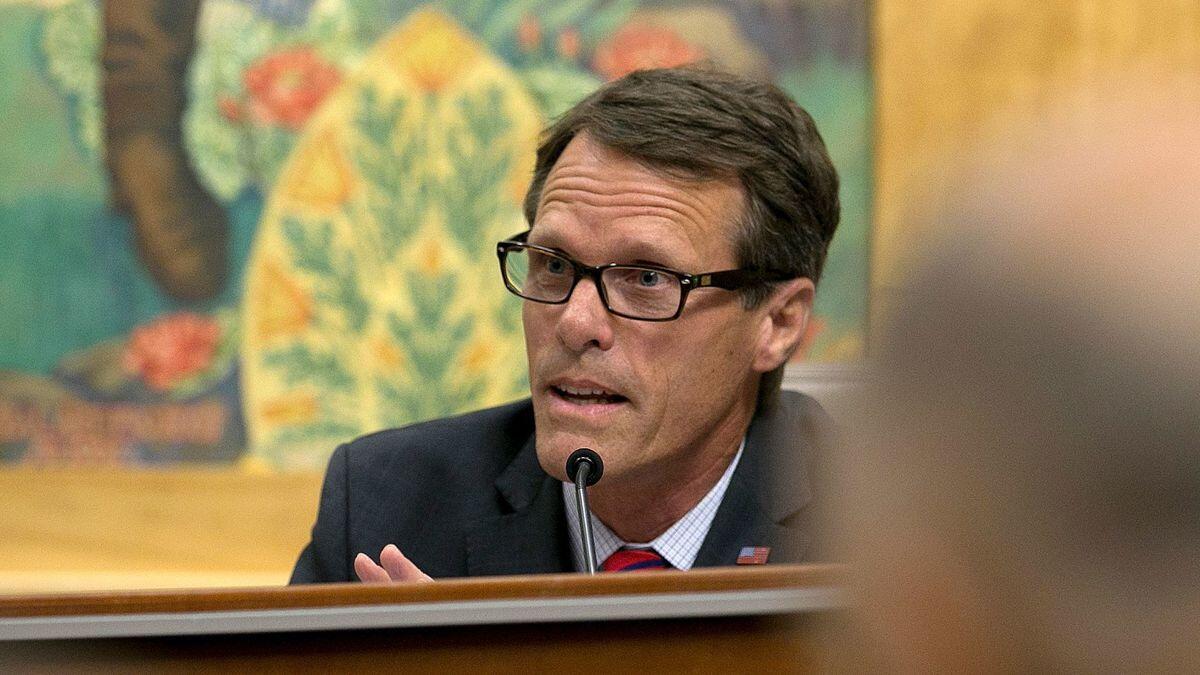
Two years ago, state Sen. Ted Gaines (R-Rocklin) asked his chief of staff to resign after hearing that the man had been accused of sexual harassment, but later put the aide on the payroll of his political campaign.
Steve Davey left Gaines’ legislative staff in 2015 after a complaint was made that a female subordinate felt uncomfortable with his treatment of her, which included unwanted physical contact, according to documents released Friday by the Senate. The complaint filed said that on two occasions, Davey put his arm around the staff member when they were at public events. Davey also yelled at her in front of others, according to the complaint.
Gaines issued a statement Friday that said he took the accusations seriously when he heard about them in December 2015 from personnel officials.
“I immediately communicated with Mr. Davey, who adamantly denied the accusation of sexual harassment,” Gaines said. “After giving the matter serious consideration, I made the decision to ask Mr. Davey to separate from my Senate office.”
Shortly after, Gaines hired Davey to work on his 2016 campaign as a consultant.
The senator said that at the time Davey “was undergoing some personal challenges outside of the office. I tried to help by counseling him and agreeing to allow him to earn some money by providing some services to my reelection campaign as an independent contractor. I believe my decision was the best for everyone involved.”
Davey did not return calls for comment.
Have you experienced sexual harassment in government or politics? Share your story >>
Sen. Tony Mendoza was warned in 2010 that his habit of hugging women ‘comes with peril’
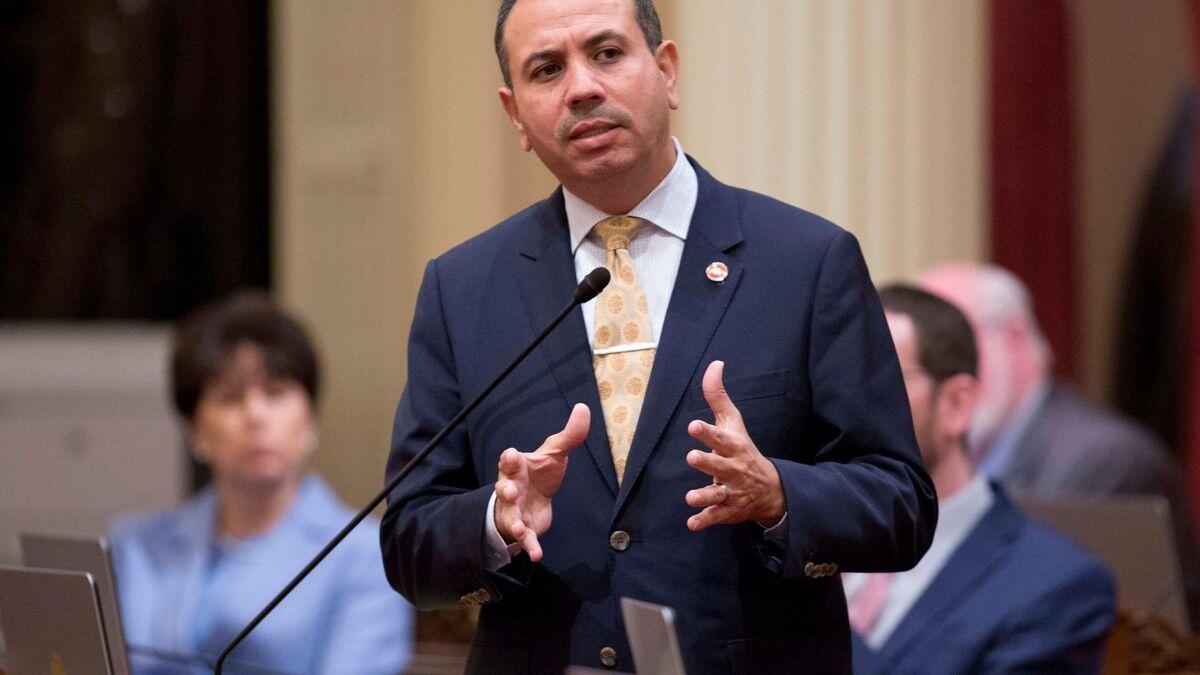
State Sen. Tony Mendoza has been under investigation for allegations of sexual harassment, but new documents released Friday show he was warned in 2010 by a personnel manager that his habit of hugging staff members “comes with peril,” and he should stop.
Mendoza is currently under investigation for inappropriate behavior with three former staffers, including former aide Haley Myers, who complained in 2010 about the same behavior described in the documents released Friday. The name of the complainant is redacted from the documents, which were part of a decade’s worth of complaints involving the Legislature.
Mendoza was a member of the Assembly when the staffer told Assembly Compliance Officer Lynda Roper that she felt “uncomfortable about Mendoza’s behavior” around her, including “flirtatious” text messages, hugging and one-on-one dinners. She said she feared for her job if she refused the invitations.
Mendoza acknowledged that he hugged the staffer, “but says he hugs everyone,” according to a report by Roper.
“I counseled him that this comes with peril: he should definitely not hug [the staffer] in the future and should avoid hugging any subordinates altogether. He said he understood and would be mindful of this in the future,” the report said.
Myers has said Mendoza’s behavior improved after he was counseled.
As for the dinners and drinks, Mendoza said that “it was his belief that (1) she wanted these outings to discuss her future plans, which may include running for office, and (2) given his limited time in the office and interruptions while there it seemed better to have these discussions off site,” Roper’s report said.
Mendoza seemed “perplexed” by the complaint, but promised to change his behavior and said he would not retaliate against the staff member, Roper said.
Mendoza said Friday that he parted with the staffer on friendly terms.
“The employee remained on staff without any issues in my Capitol office until the end of my term in 2012,” he said. “We have remained in touch since and, in fact, I provided her with a letter of recommendation as recently as summer 2017.”
Have you experienced sexual harassment in government or politics? Share your story >>
Senate staffer accused of sexual harassment was later appointed to Veterans Affairs post by Gov. Jerry Brown
Three months after a state Senate staffer was terminated over allegations of sexual harassment, he was appointed by Gov. Jerry Brown to a top position in the state Department of Veterans Affairs, according to state records released Friday.
Brown officials said the governor did not know about the accusations against Eric Worthen when the governor appointed him in September 2011 as assistant deputy secretary for administrative affairs at the California Department of Veterans Affairs.
Documents released Friday by the Senate show that Worthen had been previously accused of harassment while he worked as a legislative director for former state Sen. Leland Yee (D-San Francisco). Worthen was terminated from his job in July 2011 after a Senate investigation.
A female staff member said Worthen called her “sweetheart” and “baby,” talked multiple times about the size of his genitals and on one occasion told her, “You’re so beautiful. If you were into black men I’d be all up on you.”
The Senate substantiated the allegations of harassment against Worthen, according to a statement by the Senate.
Worthen went from a Senate job paying $73,700 to the Brown appointment that paid $95,000. He was dismissed from the Department of Veterans Affairs job in January 2014, but the governor’s office did not say why he was let go.
Worthen was indicted in April 2017 by a federal grand jury on charges of conspiracy to receive $12,000 in bribes to help a businessman obtain construction contracts at two veterans homes in Southern California.
Attorneys for Worthen did not return calls and emails for comment on the sexual harassment allegations.
The criminal charges against Worthen grew out of the FBI’s undercover bribery investigation of Yee that ended up with the former state senator going to prison on a five-year sentence for corruption.
Have you experienced sexual harassment in government or politics? Share your story >>
GOP gubernatorial candidate Travis Allen calls release of sexual harassment complaint ‘a political attack’
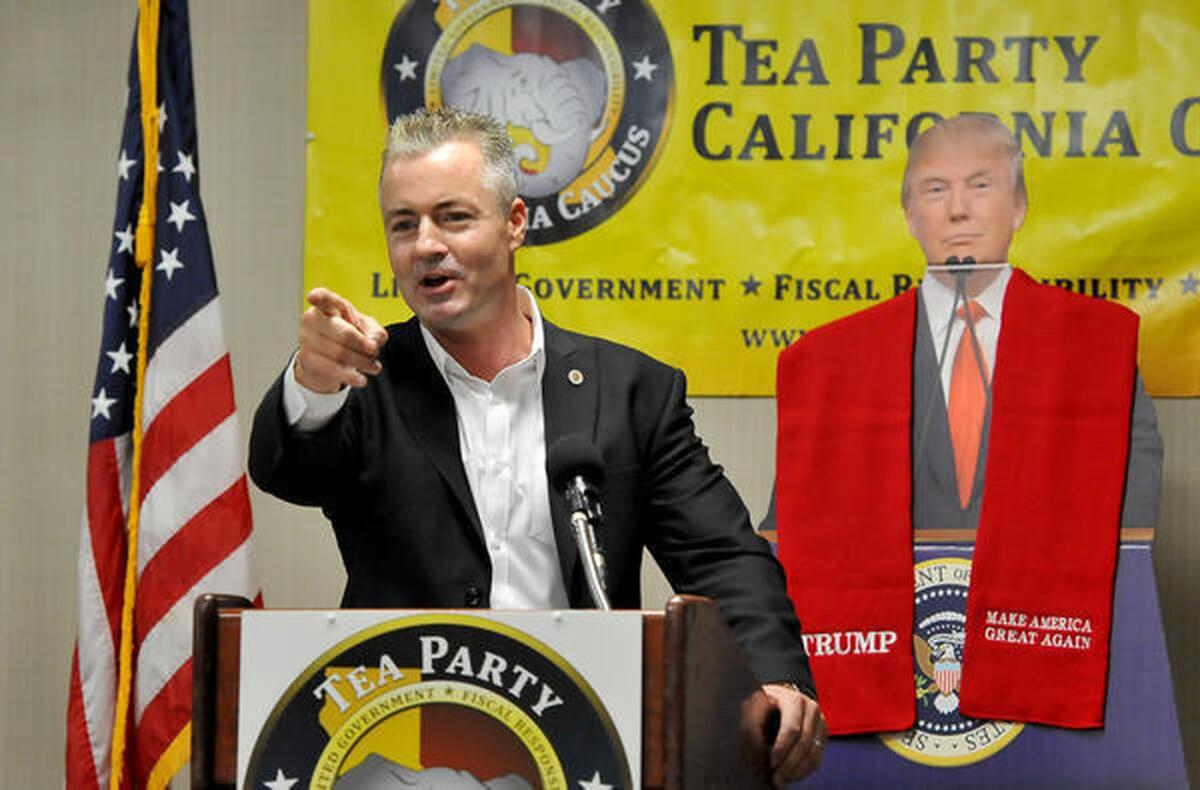
Gubernatorial candidate Travis Allen is among the state lawmakers who were accused of sexual harassment in the last several years, according to documents publicly disclosed Friday by the California Legislature.
Allen, a state assemblyman from Huntington Beach, was accused of repeated physical contact that made a staff member “uncomfortable” in early 2013. The woman alleged that Allen made it “a practice of being unnecessarily close to her,” such as touching her foot with his underneath a table during a meeting and approaching her from behind in a cafeteria and squeezing her shoulders, according to the documents.
Jon Waldie, then chief administrator to the Assembly, responded to the complaint by telling Allen to be “very conscious of his conduct,” according to the documents. Allen responded by saying he could not recall being “too familiar” with any staff members, but did recall two women being overly friendly with him outside of work.
Allen released a statement Friday through his spokeswoman denying the allegations, saying he was “shocked” when they were first lodged and arguing that their release was politically motivated.
“The release of this unsubstantiated complaint is a political attack by a Democrat-led committee. I’m sure I’ve shaken many people’s hands, tapped many people on the shoulder, and have even tapped people’s feet accidentally,” he said in a written statement. “But there has never been anything in any of my actions that has been inappropriate, and nor will there ever be.”
Allen is the lone Republican among the five lawmakers named in the documents. The other four are state Sens. Bob Hertzberg (D-Van Nuys) and Tony Mendoza (D-Artesia), Assemblywoman Autumn Burke (D-Marina del Rey) and former Assemblyman Raul Bocanegra (D-Pacoima), who resigned last year after facing allegations of harassment by multiple women.
The documents were released after three months of requests from Los Angeles Times reporters and lawyers, and include 79 allegations. There were 18 substantiated charges against five lawmakers and 10 senior staff members since 2006.
Former state schools chief Delaine Eastin, the only woman in the governor’s race and a Democrat, called on Allen to drop out of the contest.
“I say #TimesUp for ALL sexual harassers seeking to subjugate half the population. Travis Allen is now a known predator and should drop out,” she tweeted. “If he remains invited to joint events, I will be there to represent all women who have been harasssed [sic], passed over and disrespected.”
State Treasurer John Chiang, another Democratic gubernatorial candidate, also weighed in on the allegations contained in the documents, though he did not mention Allen by name.
“Powerful men have abused their power for far too long, and today’s news makes it even more clear that sexual harassment and abuse is not just a problem in Hollywood and in the boardroom, but in government and politics as well,” Chiang said in a statement. “Let me be clear, any man who has abused his power and sexually harassed others is unfit to serve: as a legislator, as a mayor, or as governor.”
Have you experienced sexual harassment in government or politics? Share your story >>
Updated at 4:05 p.m.: This post was updated to Eastin’s comments.
California Legislature releases a decade’s worth of records on sexual harassment investigations
Eighteen alleged cases of sexual harassment, ranging from sharing of pornographic photos to a staff member accused of grabbing a woman’s buttocks and genitals, were publicly disclosed by the California Legislature on Friday, detailed through investigation records that had been shielded in some cases for more than a decade.
Of the lawmakers named in the documents, four currently hold office: Assemblyman Travis Allen (R-Huntington Beach), state Sens. Bob Hertzberg (D-Van Nuys) and Tony Mendoza (D-Artesia) and Assemblywoman Autumn Burke (D-Marina del Rey). Also named was former Assemblyman Raul Bocanegra (D-Pacoima), who resigned last year after facing allegations of harassment by multiple women.
The documents, which include complaints since 2006 against five lawmakers and 10 senior staff members, were provided after three months of requests from Los Angeles Times reporters and attorneys. In all, there were 79 allegations: 62 claims filed in the Assembly about lawmakers or staff, in some cases about the same individuals, and 17 claims filed in the state Senate. The records provide the most detailed information, to date, of workplace sexual misconduct investigations at the Capitol in Sacramento and legislative district offices across the state.
California Legislature has spent $294,271 investigating sexual harassment claims since 2006
Sexual harassment investigations by the Calfornia Legislature cost taxpayers $294,271 from early 2006 through the end of last year, according to a document provided Friday to the Los Angeles Times.
Most of the money was spent by the Assembly in 2017 in the wake of intense scrutiny of misconduct under the state Capitol dome. The document marks the first time legislative officials have revealed the cost of outside investigators in examining claims against lawmakers, staff members and others.
Of the total amount, almost $144,000 was spent by the Assembly last year to investigate eight allegations. The Senate, which reported hiring no outside help on investigations from 2006 to 2016, spent slightly more than $47,000 last year in examining seven allegations.
Lawmakers also provided The Times with information regarding the number of staff changes that happened following sexual misconduct accusations — one of several pieces of information first requested last October.
A total of 30 staff members were dismissed, demoted or reassigned after investigations over the 11-year period — 22 in the Assembly, eight in the Senate. No additional details were provided on what happened to those staff members.
The Times also asked about people who were accused of multiple allegations in recent years in an effort to better understand the legislative work environment. Both houses disclosed raw numbers, but shielded the identities of the accused by referring to them with general descriptions such as “Person A” and “Person B.”
In all, seven people were the subject of multiple allegations in the Assembly. One person was identified by the Senate. The records were released to The Times as part of a broader disclosure of sexual harassment investigations since 2006.
Have you experienced sexual harassment in government or politics? Share your story >>
Nunes donates campaign cash to effort to repeal California’s gas tax hike
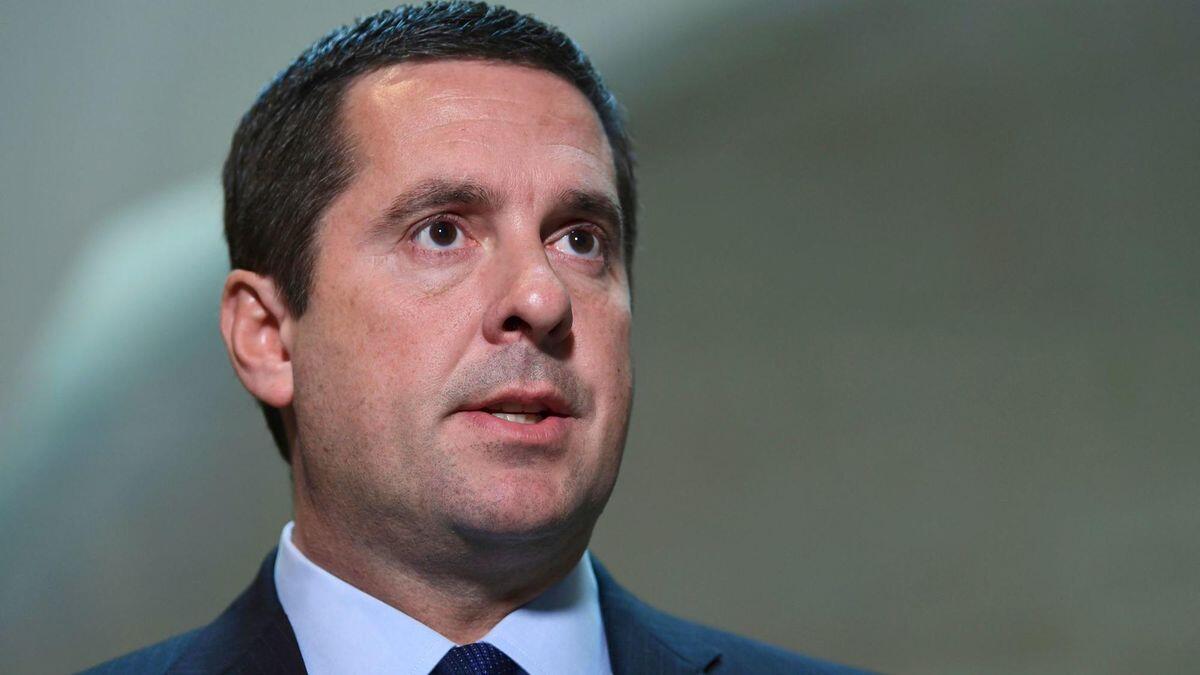
California’s Republican members of Congress are opening their wallets to help a financially strapped campaign to qualify an initiative that would repeal the state’s recent increases in gas taxes and vehicle fees.
If the effort works, it might drive a November turnout among voters who favor repealing the tax hikes — at a time when Republicans need a boost.
Among the contributors is Rep. Devin Nunes of Tulare, who has been in the headlines for very different reasons. Nunes, who campaigns against the gas tax back home, contributed $50,000 to Give Voters a Voice, the group reported Thursday.
Republican Rep. Doug LaMalfa of Richvale chipped in $2,500 to the campaign, which had previously received $100,000 from House Majority Leader Kevin McCarthy of Bakersfield and $25,000 each from Reps. Ken Calvert of Corona and Mimi Walters of Irvine.
The committee has raised about $615,000 to repeal the gas tax, but ended 2017 with just $3,791 in the bank.
Carl DeMaio, a former San Diego city councilman, sent a fundraising appeal Tuesday to supporters of the repeal measure saying that about 100,000 more petition signatures were needed to reach the required 587,000 to qualify the measure for the ballot. “[W]e are really low on funds now and we need more financial help in our final four weeks to get this done!” DeMaio wrote.
The repeal campaign also is getting help from DeMaio’s Reform California PAC, which raised $831,154 last year and ended 2017 with $225,000 in the bank.
Republicans see political benefit in putting a measure on the November ballot as a way to energize voters to go to the polls.
The gas tax and vehicle fee increases will raise more than $5.2 billion annually to repair roads and bridges and improve mass transit.
Group working to elect more scientists to Congress endorses Democrat running against Rep. Mimi Walters
California’s Democrats started 2018 with more money than their challengers
There are four California Democrats whom Republicans are attempting to unseat in the midterms, and a year-end checkup of their finances shows they seem to be doing just fine.
Rep. Scott Peters of San Diego and Rep. Raul Ruiz of Palm Desert led their nearest challengers in cash on hand by seven figures. Peters raised $361,218 in the last quarter of 2017 and had $2.2 million in the bank. His closest competitor, Michael Allman, loaned himself $300,000 and still had only $267,419 in cash on hand.
Ruiz put the most distance between himself and his challengers, raising $493,951 last quarter and amassing a total of nearly $2.1 million. Kimberlin Brown Pelzer, a soap opera actress and avocado farmer, raised a respectable $175,832 in her first quarter as a candidate, but that left her with just $146,663 in cash on hand.
Rep. Ami Bera (D-Elk Grove) had a little over $1 million in the bank after raising $341,681 in the final quarter of the year. Andrew Grant, a Republican business executive and Marine Corps veteran, had just $113,150 in the bank. Bera narrowly won reelection in 2016.
Three-time candidate Justin Fareed, a Republican running against freshman Rep. Salud Carbajal in a rematch, came the closest to catching up. He raised $160,809 between Oct. 1 and Dec. 31, compared to Carbajal’s $233,690. Fareed ended the year with $298,660 in cash on hand, while Carbajal had amassed more than $1.2 million.
Republican incumbents have struggled to keep up with their Democratic challengers. In seven of the 10 Republican-held districts The Times considers the most competitive, Democratic challengers out-raised the member of Congress.
Some young offenders charged in adult courts will have the chance to move their cases to the juvenile justice system
Dozens of people charged as adults for crimes they committed when they were under 18 will have a chance to move their cases to the juvenile justice system under a ruling issued Thursday by California’s highest court.
The state Supreme Court, affirming a lower-court ruling, found certain provisions of Proposition 57 could retroactively apply to some pending cases. The ballot measure, which was approved by voters in 2016 and has overhauled the state parole system, prohibits prosecutors from charging young defendants in adult court without a judge’s approval.
Under the state Supreme Court’s ruling, offenders charged as adults before Proposition 57 became law — and whose cases are not on final appeal — are now eligible for a hearing to request that their cases be moved to the juvenile justice system.
It is unclear how many cases could be affected. Prosecutors filed at least 360 juvenile cases directly to adult courts in 2016. Many counties, but not all, transferred those cases to juvenile courts after Proposition 57 became law.
Thursday’s ruling came in the case of a teen who was charged as an adult for sex crimes that authorities said he committed in 2014 and 2015 when he was 14 and 15 years old.
The state’s high court ruled that any state law that reduces punishment for a crime should apply retroactively to all cases in which the judgment was not final at the time it was enacted.
Proposition 57 does not reduce punishment, the court ruling stated, but the “possibility of being treated as a juvenile in juvenile court — where rehabilitation is the goal — rather than being tried and sentenced as an adult can result in dramatically different and more lenient treatment.”
By the numbers, Democrats look strong in Orange County congressional races they must win to flip the House
Democrats have a few problems to sweat over in this year’s midterm elections: winnowing their vast fields of candidates and navigating California’s top-two primary system, to name a couple.
But in Orange County, a key battleground as they attempt to take back the House, money doesn’t seem to be one of them.
Incumbents in all four Orange County districts held by Republicans raised less money than some of their challengers in the last quarter of 2017. The reports cover fundraising through Dec. 31, before Reps. Ed Royce of Fullerton and Darrell Issa of Vista announced they were bowing out. Their seats are two of the likeliest to flip to Democrats in November.
Rep. Mimi Walters of Irvine raised $253,722, less than two Democratic challengers. Brian Forde, a former policy advisor to President Obama, raised $403,829 last quarter. Law professor Katie Porter also beat Walters with $266,669, and her UC Irvine colleague Dave Min came in a close third with $212,575. Walters still has a considerable cash advantage and had more than $1.5 million in the bank.
For the second quarter in a row, Democratic challengers running against Rep. Dana Rohrabacher raised more money. He brought in $271,969 in the final months of 2017, a paltry sum for a competitive race. Hans Keirstead received $402,140 while Harley Rouda brought in $626,254. Both boosted their numbers with six-figure loans to their campaigns. Another candidate to watch: late entrant Rachel Payne, who reported raising $136,828 in the three weeks after she entered the race.
Issa, widely seen as the most vulnerable incumbent before he dropped out, raised $403,792 in the last three months of 2017 and ended the year with more than $1 million in the bank. His haul was eclipsed by real estate investor Paul Kerr, who raised $509,162, and newcomer Sara Jacobs, who raised nearly $1.4 million and had $1.2 million in cash on hand. Both Kerr and Jacobs drew from their personal wealth. He gave himself $450,000, and she gave her campaign $1 million.
Royce raised an impressive $482,841 between Oct. 1 and Dec. 31, leaving him with more than $3.6 million, one of the highest bank account balances of any vulnerable congressional incumbent. Royce, who announced on Jan. 8 he would retire, can use that money to help other Republicans or keep it in his congressional account. Gil Cisneros, a Navy veteran who won the lottery in 2010, loaned himself $750,000 and reported $896,066 in total fundraising last quarter. He ended the year with more than $1 million in the bank. Health insurance executive Andy Thorburn reported about $2 million in cash on hand, due mostly to $2.3 million he loaned himself. Thorburn’s latest filing indicated that most of that loan had been forgiven.
Several high-profile Republicans have stepped up to run in Royce’s district and in Issa’s. The first look at their campaign finances will come in reports due in April. But they’ll have to catch up to Democrats who have had a months-long head start or the benefit of personal wealth to fund their bids.
California’s mentally ill inmate population keeps growing. And state money isn’t enough to meet needs, lawmaker says
Gov. Jerry Brown has earmarked $117 million in his new state budget to expand the number of treatment beds and mental health programs for more than 800 mentally ill inmates found incompetent to stand trial.
State officials said they have struggled to keep up with the needs of a population that has jumped in size by 33% over the last three years, as judges are increasingly referring defendants to treatment. But one state lawmaker says additional funds are not enough.
Legislators, he said, need to update the laws used by judges to evaluate the mental health of people charged with crimes. And he has proposed his own legislation to keep mentally ill offenders out of the criminal justice system.
California cities say pension costs are high — and will get even higher in the next few years
Citing limited options for raising local taxes, the association representing hundreds of California cities warned that rising public employee pension costs might mean fewer services and longer emergency response times over the next several years.
“These pressures are not only mounting, but will force cities to make very tough choices in the next seven years and beyond,” said Carolyn Coleman, executive director of the League of California Cities.
The organization Thursday released a new analysis showing that 16% of the general fund budget in an average large city will go toward pension payments in just seven years’ time — close to double the percentage paid for those retirement stipends as of mid-2007.
Most cities have pension benefits managed by the California Public Employees’ Retirement System, or CalPERS. Returns on CalPERS’ $346-billion portfolio haven’t met long-term expectations over recent years. As of the summer of 2016, the system was projected to have assets to cover only 68% of its future obligations.
Local officials generally must increase their contribution to worker pensions if CalPERS investment returns shrink. The new analysis projects an average increase of more than 50% in the annual pension payments made by the state’s largest cities over the next seven years. The association found in a survey that most of the communities with police and fire employees expect to soon pay 54 cents in pensions for every dollar in salary. In some cities, those payments are expected to rise to 76 cents per dollar of salary.
“The impact of pension costs are becoming such a large element of so many city budgets, that it is inevitably going to cause the reduction in services,” said Dan Keen, the former city manager of Vallejo.
City officials who unveiled the report Thursday didn’t immediately offer proposals to address what they characterized as an “unsustainable” system in the near future. Other than employer payments and investment profits, higher employee contributions are the only other outlet to pay for existing pension agreements. Payments from local governments are rising this year as part of a 2016 decision by CalPERS to begin lowering the pension fund’s official long-term investment return predictions.
John Chiang accuses gubernatorial opponent Gavin Newsom of flip-flopping on single-payer healthcare
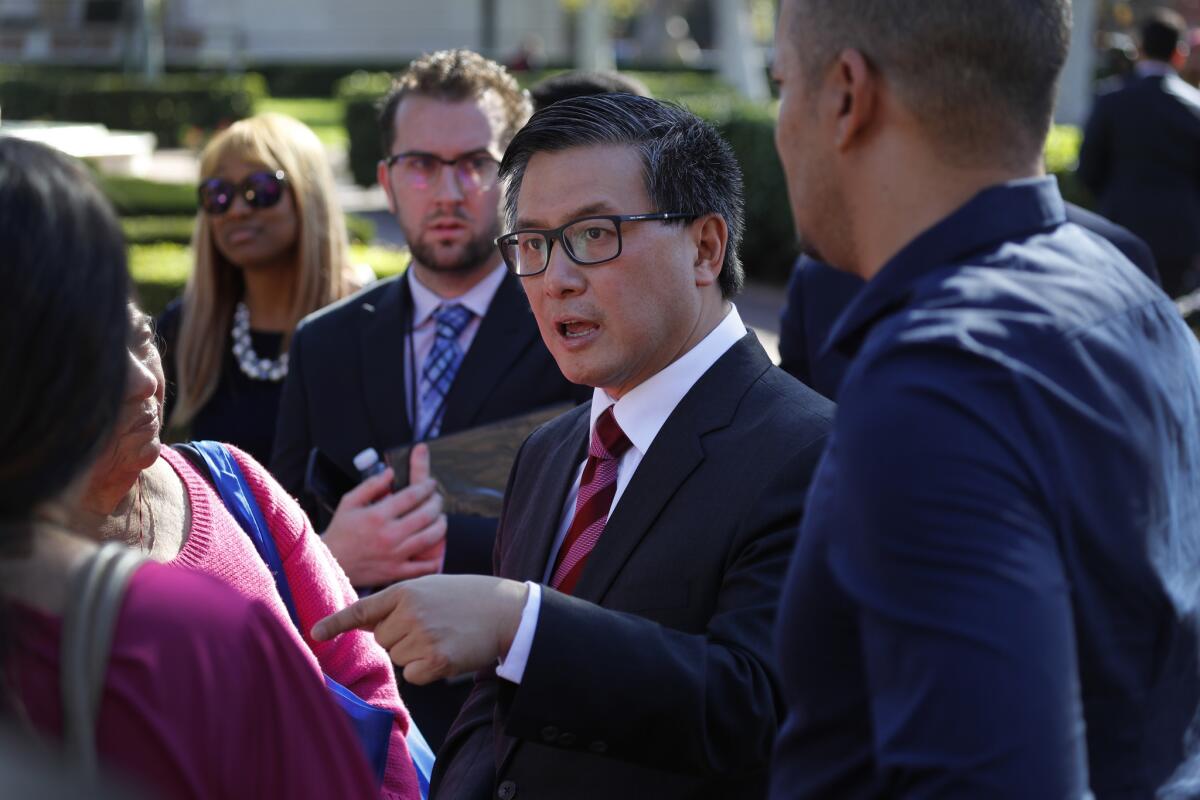
State Treasurer John Chiang criticized Lt. Gov. Gavin Newsom for his stance on single-payer healthcare Thursday, saying his chief rival in the governor’s race has flip-flopped on the issue.
Chiang and fellow Democratic candidate Antonio Villaraigosa have expressed concerns about the cost of establishing a state-sponsored universal healthcare program, which could run from $330 billion to $400 billion a year depending on various estimates.
Newsom has been a strong advocate for the idea, saying California needs a governor who isn’t afraid to take bold action. But Chiang, speaking to the Public Policy Institute of California in San Francisco on Thursday, accused Newsom of changing his tune.
Chiang said that while Newsom was mayor of San Francisco, he also expressed concerns about costs when county Supervisor Tom Ammiano first proposed a universal healthcare system for the Bay Area city (Ammiano has said the same thing).
Newsom now boasts about the plan being implemented while he was mayor.
“When Tom Ammiano pushed out the plan, Gavin was not supportive. Gavin had the same concerns as Antonio today,” Chiang said.
The Newsom campaign accused Chiang of “resorting to false and flailing attacks” a day after campaign finance reports showed that he trailed far behind Newsom in fundraising.
“For months Californians have heard Chiang trash the viability of a single-payer system here in California, and they won’t be fooled by his latest doublespeak,” Newsom campaign spokesman Nathan Click said.
Chiang said he supports universal healthcare but cautioned that enacting a state-sponsored system should only be done in incremental steps to ensure that it’s affordable.
“Let’s look at how much the state can provide,” Chiang said. “We don’t have to build a mansion at the beginning. Let’s build a starter house.”
Hundreds of California cities and counties will have to make it easier to permit housing, state says

Almost every city and county in California will have to streamline its rules for approving new housing following the passage of legislation last year, the state Department of Housing and Community Development said Thursday.
Every eight years, local governments receive targets from the state for new housing production in an effort to keep pace with population growth. But those targets have long been ignored with little consequence even as the state’s housing shortage has fueled record-high costs.
Senate Bill 35, passed as part of a package of housing legislation in 2017, requires cities that have fallen behind on their goals to make it easier to permit new construction. Under the bill, cities and counties must approve housing projects without delay if the proposals match a city’s underlying zoning rules. For example, the bill will fast-track 50 condominiums proposed on land now zoned for that amount of housing, but won’t if the proposal is for more than that.
The state housing department determined that 397 cities and counties — including Fresno, Long Beach, Los Angeles County and Sacramento — are behind on meeting housing goals at all income levels and must approve qualifying projects that reserve at least 10% of a development for low-income residents.
An additional 148 cities and counties, including Los Angeles, San Diego, San Francisco and San Jose, are meeting production goals for non-subsidized housing and therefore only have to approve without delay qualifying projects with at least half of the development set aside for low-income residents.
Sen. Scott Wiener (D-San Francisco), SB 35’s author, celebrated the housing department’s action with a video posted on Twitter.
Projects eligible for streamlined review under SB 35 have to comply with a host of conditions:
- They can’t be single-family homes.
- They can’t be along the coast.
- They can’t replace rent-controlled housing or buildings that have been occupied by tenants in the previous 10 years.
- Developers have to pay construction workers union-level wages and abide by union-level hiring rules.
Just 13 cities and counties are on track to meet all their housing goals and won’t be subject to the new approval guidelines, the housing department said.
Avoiding a showdown, state Sen. Tony Mendoza agrees to abide by extended leave of absence during harassment probe

Under investigation for sexual harassment allegations, state Sen. Tony Mendoza avoided a showdown with Democratic leaders Thursday by agreeing to abide by an extension of his leave of absence for up to 60 days — even though he complained the Senate Rules Committee acted prematurely.
Meanwhile, Rio Hondo College Trustee Vicky Santana of Whittier on Thursday became the second Democrat to take out candidacy papers for a possible challenge to Mendoza’s re-election campaign in the June primary.
Mendoza had originally agreed to a leave of absence that would have ended Thursday, but he stayed away from the Senate floor session.
“I am extremely disappointed that the Senate passed Resolution 79 in an effort to extend my leave of absence without the benefit of communications with me,” the Artesia Democrat said in a statement. “This action was shepherded through at the eleventh hour and represents a rush to judgment without the benefit of any evidence or due process.”
The senator, who has denied allegations that he acted inappropriately with three former female aides, said he was grateful that some of his colleagues in the Senate shared concerns about due process. But Senate President Pro Tem Kevin de León (D-Los Angeles), a former housemate of Mendoza’s, pressed for the extension to allow the investigation to be completed before he returns.
“I spoke with the pro tem, who continues to defend the Senate’s decision,” Mendoza said Thursday. “Though I adamantly disagree, I also understand that Resolution 79 represents the will of the Senate until it is overturned. I am considering my options, but will respectfully remain in the district as of today.”
Updated at 4:27 pm to include Vicky Santana becoming a potential challenger to Mendoza in the June primary.
Rep. Dana Rohrabacher’s challengers raised more money than he did for the second quarter in a row
For the second period in a row, Rep. Dana Rohrabacher’s fundraising has lagged behind that of his Democratic challengers in the hotly contested race for his 48th Congressional District.
The 15-term Republican reported raising $271,969 in the last three months of 2017 and ended the year with $713,144 cash on hand.
That’s significantly less than opponents Hans Keirstead and Harley Rouda, both Democrats, have reported raising. But much of the money raised by Rohrabacher’s challengers has come from their personal wealth.
Keirstead, a stem cell researcher, raised $402,140 during the same period, with a big chunk of it coming from a $165,000 loan he gave himself. He ended 2017 with $490,436 in the bank.
Laguna Beach businessman Rouda brought in $626,254, more than double Rohrabacher’s haul, but $500,000 of that was a personal loan from himself.
Several other Democratic challengers in the 48th Congressional District also have given or loaned their campaigns money, including Omar Siddiqui, who loaned himself $200,000 at the end of 2017, and Michael Kotick, who had given himself $55,000 and loaned himself $60,000 more in the final quarter.
Rohrabacher, who ranks as one of the most vulnerable California incumbents in a Times analysis, has had weak fundraising in the past. In the third quarter of 2017, he was out-raised by three of his challengers.
Rep. Steve Knight narrowly outraised by opponent in 25th Congressional District
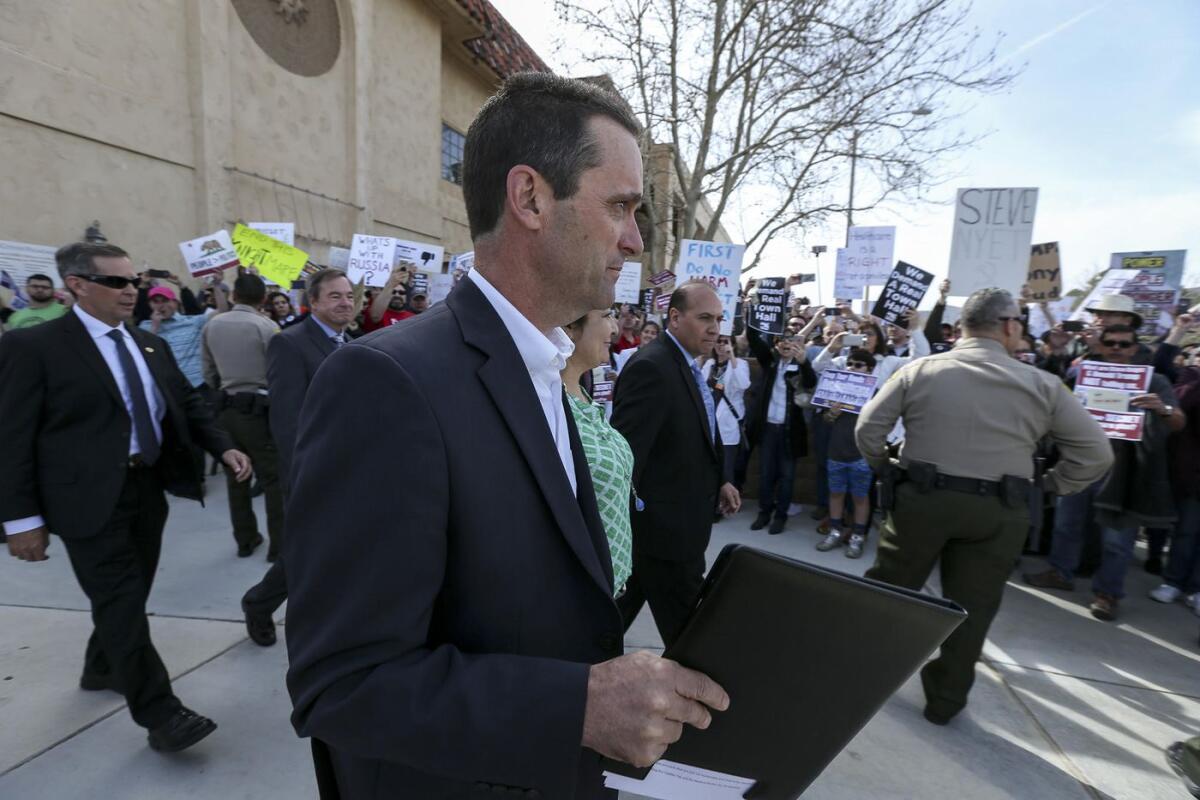
Democratic challenger Katie Hill narrowly out-raised Republican Rep. Steve Knight in the last three months of 2017, with another Democrat close on her heels in fundraising for the Antelope Valley area district.
Hill reported raising $252,351 in the final months of the year, positioning her to start 2018 with $382,848 in the bank.
Second-term lawmaker Knight, of Palmdale, lagged slightly behind, raising $240,244. He has an existing war chest from previous campaigns and still holds a fairly large lead with $794,748 in cash on hand.
Knight’s 2016 challenger, Bryan Caforio, who won the local Democratic Party’s pre-endorsement last week, raised $211,497. He had $377,203 in the bank.
It’s the second quarter Knight has been out-raised by one opponent and nearly out-raised by the other, though the positions were flipped in October with Caforio besting Knight and Hill coming in third.
House Democrats’ campaign arm has targeted the 25th Congressional District for years, and with the district narrowly backing Hillary Clinton for president in 2016, the party is again focusing on flipping it.
Four other Democrats have announced bids for the 25th District. Just one, Jess Phoenix, has more than $100,000 in cash on hand.
Long-stalled bill to give whistleblower protections to California legislative staffers advances
Gavin Newsom continues to far outpace his rivals’ fundraising in California’s race for governor
Democratic candidate for California governor Gavin Newsom leads the field in campaign fundraising — by a wide margin.
The lieutenant governor started the year with more than $16 million socked away in his campaign war chest, compared to just under $6 million each for his top two Democratic rivals, former Los Angeles Mayor Antonio Villaraigosa and state Treasurer John Chiang.
Those figures were made public on Wednesday when state candidates were required to file their campaign reports for the second half of 2017.
Republicans in the race lag far behind.
Lobbyists spent more than $1 million on a failed bill to help proposed Clippers arena

More than $1 million was spent lobbying last year on failed legislation that would have fast-tracked construction of a new Clippers arena in Inglewood, according to state lobbying disclosures released this week.
The legislation, Senate Bill 789 from Sen. Steven Bradford (D-Gardena), would have carved out exemptions from the California Environmental Quality Act, or CEQA, for the arena and related projects in Inglewood. CEQA requires developers to disclose and reduce the environmental effects of their projects, and CEQA lawsuits often tie up or kill proposals. The bill originally included similar exemptions benefiting Los Angeles’ 2028 Olympics bid, but organizers balked and Bradford removed the language.
Madison Square Garden Co., which owns Inglewood’s Forum and would compete with the new Clippers arena, spent more than $750,000 to lobby against the bill. Lobbyist Mercury Public Affairs and law firm Latham & Watkins were the largest recipients of the money. SB 789 stalled in an Assembly committee a week after it was introduced in September.
“When a deal gets made behind closed doors to rush a bill through the Legislature at the 11th hour, it takes a major effort to raise awareness of the facts and reveal the true impact on a community,” said Randy James, a spokesman for the Forum, in a statement.
Proponents of the bill spent considerably less. The Clippers arena developer, Murphy’s Bowl LLC, spent $265,000 through lobbying firm Lang Hansen O’Malley & Miller. The city of Inglewood spent $26,000 to support SB 789 and lobby on other state legislation, according to state disclosures.
The Clippers currently play at the AEG-owned Staples Center in downtown Los Angeles, which they share with the Lakers, and their lease runs through the 2024 season. Owner Steve Ballmer has said the team will honor it. The Clippers have not released public site plans or renderings for the Inglewood proposal.
Rep. David Valadao again out-raises his 2018 Democratic opponent, in a district Clinton won
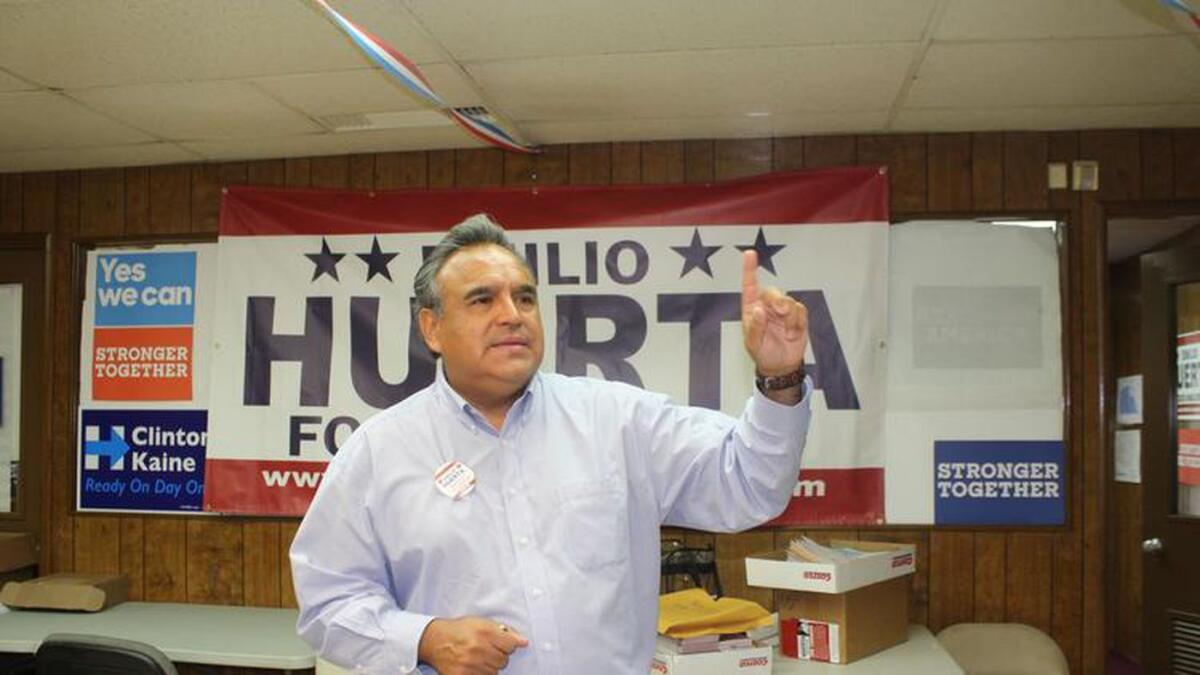
Republican Rep. David Valadao of Hanford, Calif., raised 10 times as much as his Democratic opponent last quarter, despite representing a district that backed Hillary Clinton for president in 2016, and where Democrats have a voter registration advantage.
It’s the third lackluster fundraising quarter in a row for Democratic challenger Emilio Huerta, the son of labor rights icon Dolores Huerta. He is the only announced challenger to the three-term congressman in the 21st Congressional District in the San Joaquin Valley.
The fundraising gulf stands out among the other high-profile races where five California incumbents were out-raised by Democratic opponents in the last three months of 2017.
Huerta reported raising $24,582.51 in the final quarter of 2017. Valadao pulled in $242,356 during the same time.
Huerta has $96,554 in cash on hand headed into 2018. Valadao has $981,190.
In 2016, Valadao beat Huerta with 56.7% of the vote. That same election Hillary Clinton won the district with 54.7% of the vote.
California housing crisis podcast: The complicated relationship between environmentalists and housing
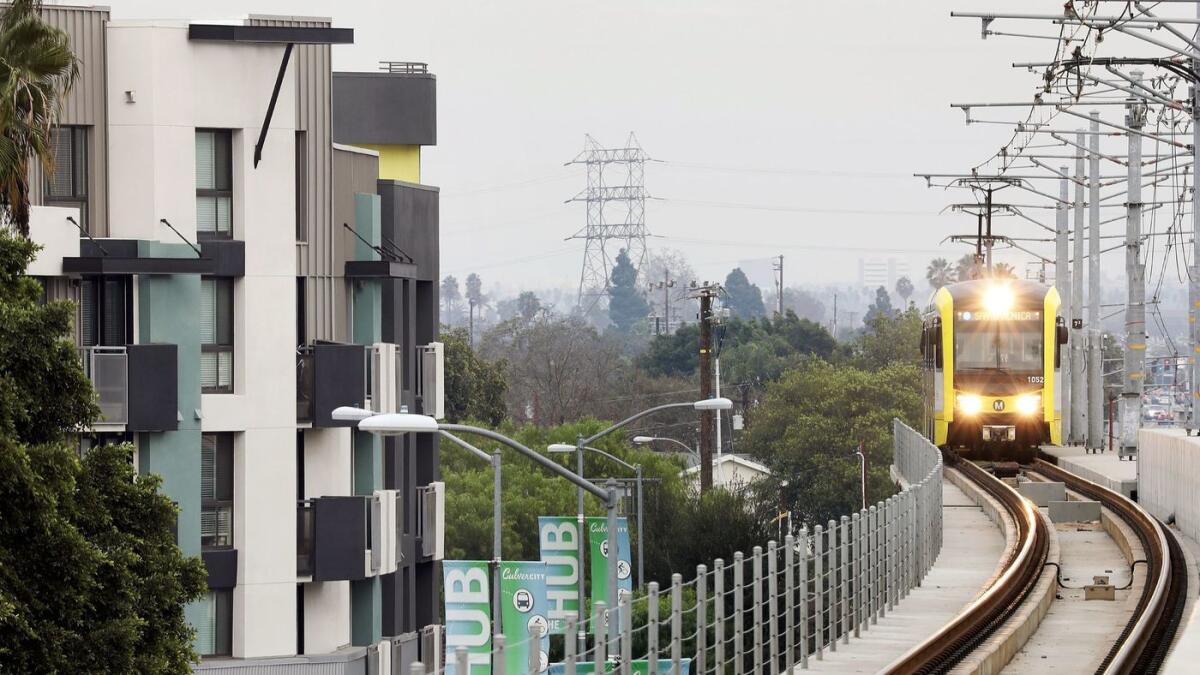
Cars and trucks are the largest source of California’s greenhouse gas emissions. Essential to meeting the state’s ambitious climate change goals, academics and other researchers have said, is to reduce the number of cars on the road by building new homes in already populated areas near jobs and transit.
Environmental groups have different perspectives on linking the cause of climate change to housing. On this week’s “Gimme Shelter: The California Housing Crisis Pod,” we dig deep into the intersections between environmentalism and development and focus on reaction to a proposal from Sen. Scott Wiener (D-San Francisco).
Wiener’s legislation, Senate Bill 827, would allow for a dramatic increase in housing development near major transit stops. But the Sierra Club California opposes the measure, arguing, among other reasons, that it would make it harder to build new transit and increase displacement of low-income residents. Ethan Elkind, director of the Climate Program at the UC Berkeley School of Law, joins the podcast and argues against the Sierra Club’s position and talks broadly about the environmental effects of growth.
“Gimme Shelter,” a podcast that covers why it’s so expensive to live in California and what the state can do about it, is recorded every two weeks and features Liam Dillon, who covers housing affordability issues out of the Los Angeles Times’ Sacramento bureau, and Matt Levin, data reporter for CALMatters.
Nunes memo furor helps one of his Democratic challengers raise $65,000 in one week
One of Rep. Devin Nunes’ opponents says he’s raking in donations thanks to the controversy about the House Select Intelligence Committee chairman’s very public push to release a controversial memo related to the Russia investigation.
Fresno County Deputy Dist. Atty. Andrew Janz, a Democrat, said that as of Wednesday night he had brought in a little over $65,000 over the last seven days while the memo has been in the news. That $65,000 is more than half as much as Janz reported raising in the previous three months.
“Congressman Nunes has given me the best gift a first-time candidate with almost no name recognition can receive, he has made himself the poster boy for what’s wrong with Congress and put a national target on his back,” Janz said in a statement.
Democrats have said they are targeting the 22nd District in their bid to take over the House, but they have a huge hill to climb in taking on a committee chairman in a district where his party has a substantial voter registration advantage. Nunes (R-Tulare) had $3.8 million in his war chest headed into 2018 and was reelected in 2016 with 67.6% of the vote.
Janz reported a relatively anemic $84,647 in cash on hand at the end of the year.
Nonetheless, Janz has hammered away at Nunes over his handling of the Russia inquiry. That includes the ethics investigation into whether Nunes released classified information to the press (the investigation was dropped in December) and now, the congressman’s insistence that a memo his staff drafted using classified information be made public over the FBI and Justice Department’s objections.
Nancy Pelosi asks for Devin Nunes to be removed as intelligence chair: ‘Put an end to this charade’
House Minority Leader Nancy Pelosi says fellow Californian Rep. Devin Nunes (R-Tulare) should lose the chairmanship of the powerful House Intelligence Committee over his handling of the Russia investigation and a memo Republicans say discredits the FBI’s role in a separate investigation.
Pelosi (D-San Francisco) said in a letter to House Speaker Paul Ryan that Nunes’ insistence on making the memo public over the FBI and Justice Department’s objections that it is inaccurate and contains classified information is putting the House of Representatives’ integrity at stake.
Fight over secret memo shows again how Nunes and Schiff, both Californians, couldn’t be less alike
California House Reps. Devin Nunes and Adam Schiff have been at public odds since shortly after the House Intelligence Committee launched its investigation into Russian meddling in the 2016 election.
As the ranking Democrat on the committee, Schiff last year called for Nunes, the Republican committee chairman, to recuse himself from the investigation following a fracas over Nunes’ bizarre late-night trip to the White House to view classified documents he said were related to the investigation.
For the last few weeks, the two have been stars of a dramatic national sideshow over whether to release a classified memo compiled by Nunes that is thought to make further claims about secret surveillance of the Trump campaign.
Schiff said late Wednesday night that Nunes secretly made “material changes” to the memo after the committee voted along party lines Monday to release it. Nunes brushed off Schiff’s allegation.
The fracas has helped one of Nunes’ Democratic challengers raise $65,000 in one week.
The Times’ George Skelton wrote last year about the congressmen and their wildly different districts and backgrounds:
“Rep. Devin Nunes, 43, of Tulare is a Republican former dairy farmer from the conservative southern San Joaquin Valley. His county has nearly a half million cows.
Rep. Adam Schiff, 56, of Burbank is a Democratic former federal prosecutor from liberal neighborhoods stretching from Glendale through Hollywood, Los Feliz, Echo Park, western Pasadena and La Crescenta. His district has the Hollywood sign.”
Read more of Skelton’s take, and our in-depth looks at Schiff and Nunes.
This post was updated with information about a Nunes challenger.
The cost of healthcare for California government workers when they retire rises sharply to $91.5 billion
California taxpayers are on the hook for more than $91.5 billion to provide health and dental benefits to state government workers when they retire, according to a report issued Wednesday by the state controller’s office.
That’s a substantial increase from last year’s estimate, a result of changes in the way the total debt is calculated and changes in the projected cost of healthcare in the coming decades.
Last year’s report put the total liability at just under $77 billion. The estimates are a reflection of what the benefits to state government workers— which are in addition to cash from pensions — would cost in present-day dollars. The debt, Controller Betty Yee said in a statement, will “remain a paramount fiscal challenge over the next three decades.”
Yee’s office estimates that the bulk of the new debt, almost $10 billion, is a result of trends in healthcare costs. An additional $4.8 billion is attributed to new rules adopted by the nationwide Government Accounting Standards Board. Those changes require retiree healthcare obligations be reported as part of annual financial statements, thus pegging them to the same kinds of investment assumptions that have partly fueled the increase in projected pension promises. Yee praised those changes on Wednesday as a step toward more transparency about state government’s true debts.
Since 2010, state officials have been pushing for pre-funding of these costs during contract negotiations with public employee unions. New employee contributions are being phased in over several years.
Kevin de León reports tiny sliver of rival Sen. Dianne Feinstein’s campaign cash
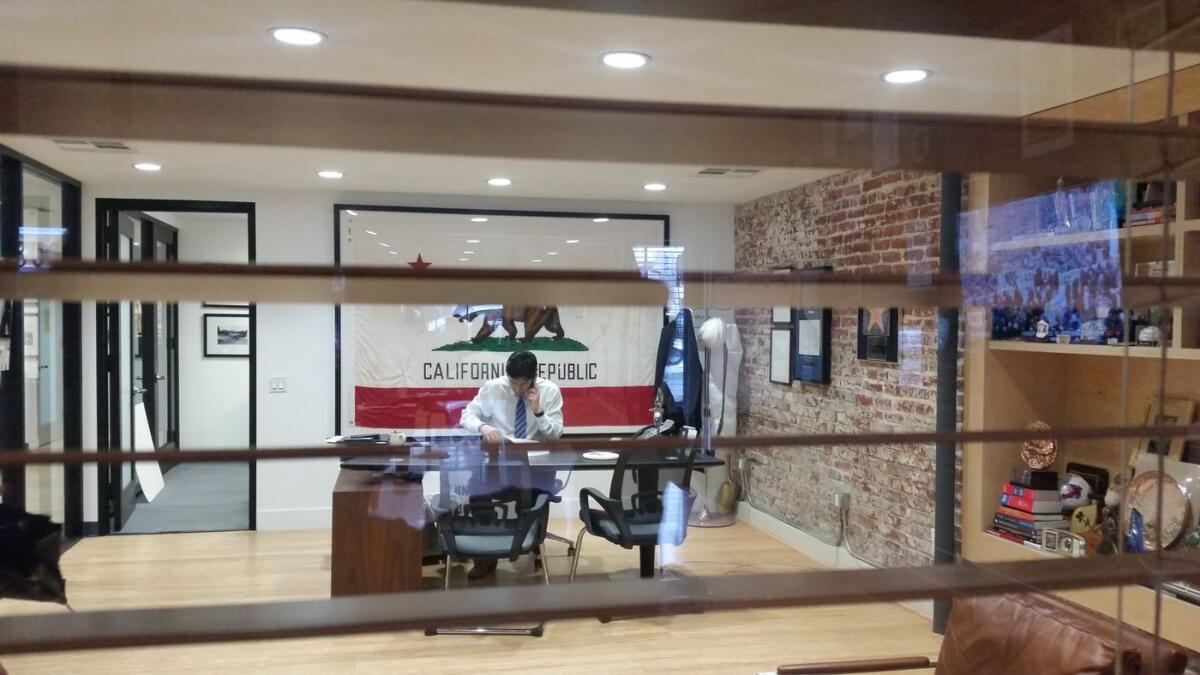
State Senate leader Kevin de León, a Democrat who is challenging Sen. Dianne Feinstein, kicked off 2018 with a tiny fraction of the money the veteran lawmaker has in the bank, according to federal fundraising documents filed Thursday.
De León reported raising nearly $434,000 and spending nearly $75,000 between entering the race on Oct. 15 and the end of 2017. He reported starting the new year with nearly $360,000 cash on hand, and more than $41,000 in debts.
In contrast, Feinstein reported having nearly $10 million in the bank, including a $5-million loan the Democrat made to her campaign in the final quarter of 2017.
Courtni Pugh, De León’s campaign manager, dismissed the financial disparity.
“We knew from the outset we were not going to be able to compete with Sen. Dianne Feinstein dollar for dollar. Kevin de León, like most Californians, does not have the personal riches to match someone with her vast wealth,” Pugh said in a statement. “We will need the continued support of grassroots progressives across this great state who want a representative in Washington, D.C. who will fight for them.”
Some political observers pointed to Feinstein’s loan as evidence she is anticipating a tough campaign. But California’s senior senator, who is among the wealthiest members of Congress, also loaned her campaign $5 million during her noncompetitive 2012 campaign. She later refunded herself the full amount.
Interest groups spent record $339 million on lobbying California state government in 2017
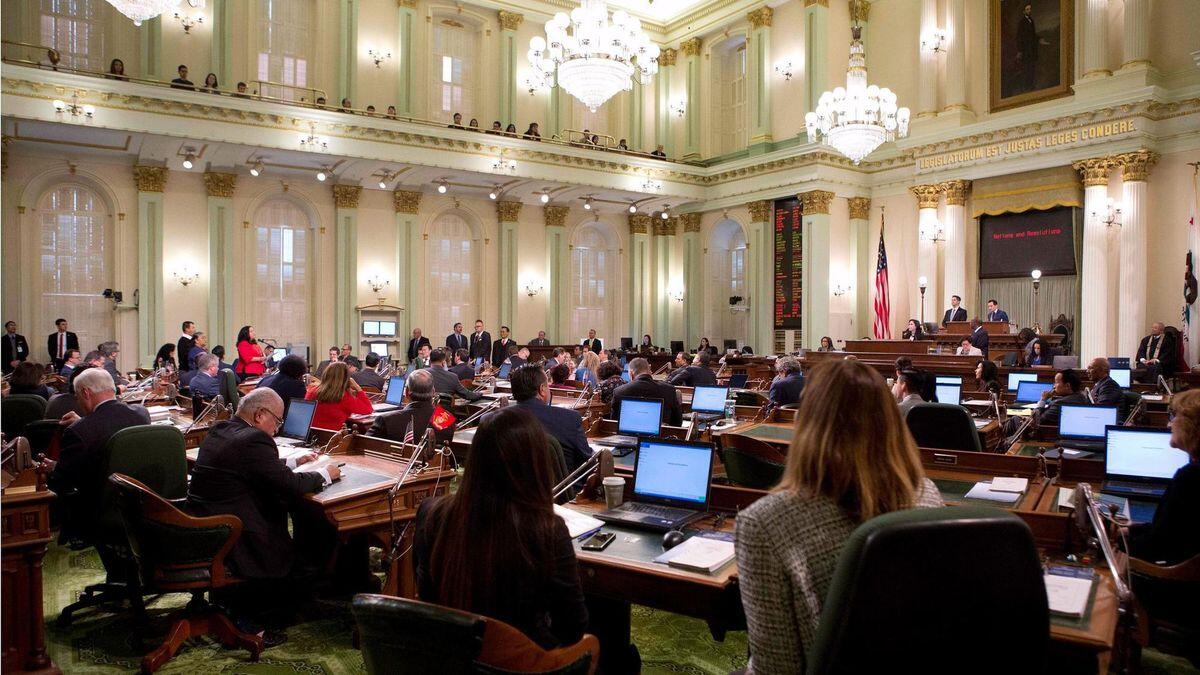
Fueled by activity from the oil industry attempting to influence the cap-and-trade debate, interest groups spent a record of more than $339 million lobbying California government officials last year.
The spending activity to influence elected officials and bureaucrats far exceeds the previous record of $314.7 million in 2015, new lobbying reports show.
Those reports also shed more light on how interest groups have expanded their “scope and sophistication” beyond sending a lobbyist to a public official’s office, according to Jodi Remke, chairwoman of the state Fair Political Practices Commission.
One example: special interest groups produced multimillion-dollar media campaigns “to rile the public on oil and gas issues, who in turn were relied on to influence their public officials,” she said.
The two top spenders on lobbying last year were Chevron ($8.2 million) and the Western States Petroleum Assn. ($6.2 million). Tesoro Refining and Marketing Co. was fourth at $3.2 million.
The spending by the petroleum association reflects “the enormous number of issues confronting the energy industry in California, and the potential impact those issues have on energy producers, refiners, consumers and businesses,” said Catherine Reheis-Boyd, the group’s president.
The Legislature voted in July to extend the cap-and-trade program, which requires polluters to buy carbon emission credits and which opponents argued will hurt businesses and add to the cost of goods and services for consumers.
The final version limited air quality regulators from adopting carbon-cutting rules for refineries, a big win for the oil industry.
“Unfortunately, money talks in Sacramento, and oil company money shouts,” said Jamie Court, president of the group Consumer Watchdog.
Other top 2017 spenders were the California State Council of Service Employees ($3.9 million), the California Chamber of Commerce ($2.8 million), the California Hospital Assn. ($2.7 million), the California Teachers Assn. ($2.4 million), the Howard Jarvis Taxpayers Assn. ($2.1 million), the California Nurses Assn. ($2.07 million) and AT&T ($1.9 million).
The taxpayer group unsuccessfully fought legislation that raised the gas taxes and vehicle fees in California to provide more than $5.2 billion annually for road and bridge repairs and mass transit.
The medical industry, including the California Medical Assn., was engaged in efforts to guard the Obama-era Affordable Care Act.
Atty. Gen. Xavier Becerra has big lead in campaign fundraising over challengers
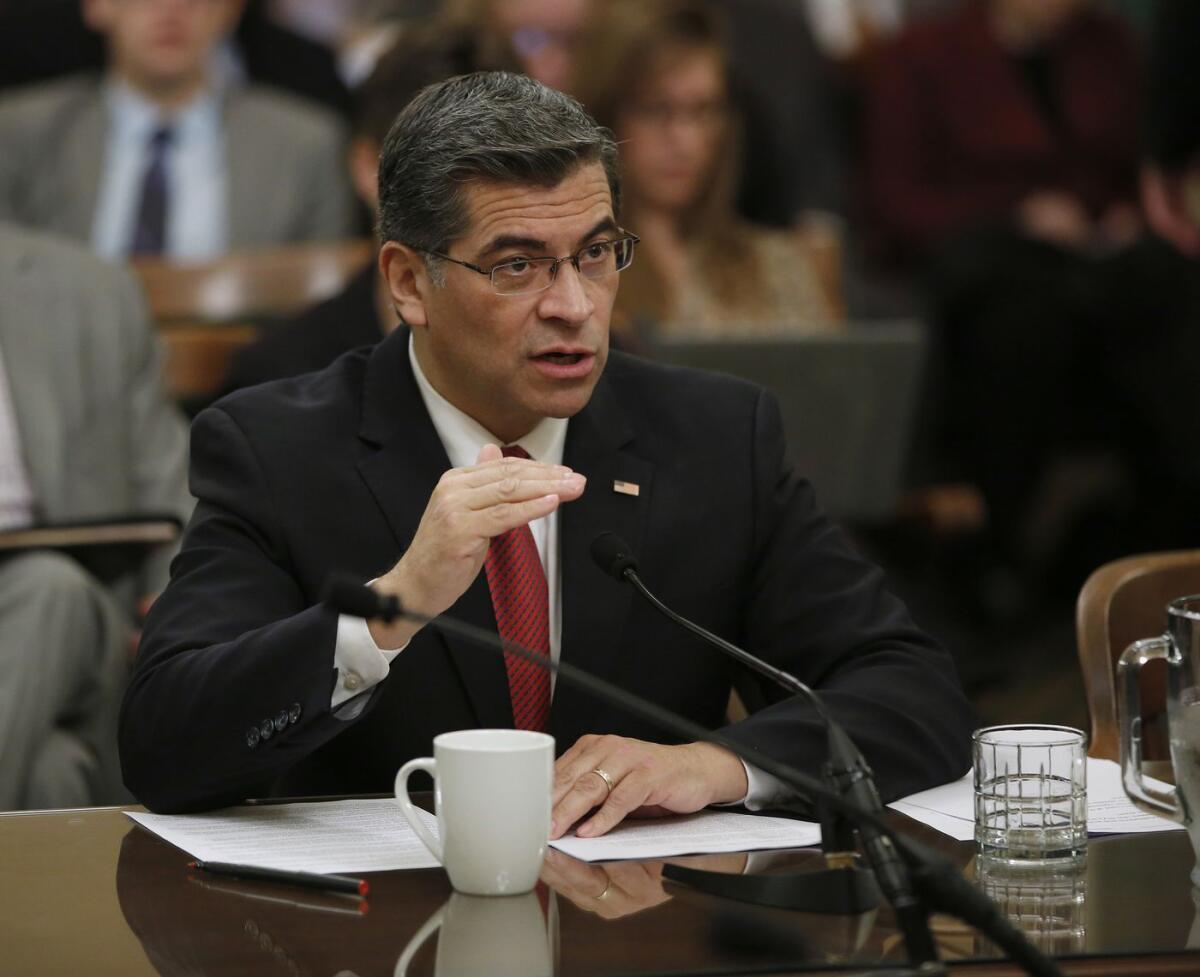
State Atty. Gen. Xavier Becerra maintained his large political fundraising lead over five possible challengers in the June 2018 primary, with the incumbent reporting he brought in $4 million last year, according to campaign disclosure reports filed Wednesday.
Becerra, a Democrat, is seeking election as attorney general after he was appointed to the post by Gov. Jerry Brown in December 2016 to serve the remainder of the term of Kamala Harris, who left the office when she was elected to the U.S. Senate.
State Insurance Commissioner Dave Jones, a fellow Democrat, has the second largest campaign fund among candidates for attorney general. He has raised $2 million for the contest and had $1.5 million left in the bank at the end of the year, compared to $3.1 million in cash left in Becerra’s account.
Many of Jones’ contributions have come from attorneys, while he has also received big campaign checks from the California Defense Counsel PAC, the California Federation of Teachers political arm and the California Hospital Assn. PAC.
Becerra also received many contributions from attorneys as well as unions. His contributors include the International Brotherhood of Electrical Workers PAC, California Assn. of Health Plans and California Professional Firefighters.
Retired El Dorado County Superior Court Judge Steven Bailey is the Republican candidate who has raised the most in the race for attorney general. He reported raising $211,642 last year and had $26,629 in the bank as of Dec. 31.
Republican Nina Salarno, an attorney and victims’ rights advocate, reported her campaign spent $10,374 last year and had nothing left in its account at year’s end. Republican attorney Eric Early raised $209,000 and had $125,000 left in the bank. Peace and Freedom candidate Adriane Bracciale, a criminal defense attorney in the Inland Empire, did not report any fundraising.
New California legislation would make it easier to build projects that meet climate goals. But environmentalists don’t like it
A Bay Area lawmaker wants to knock down what he believes is a key barrier to California meeting its ambitious climate change goals: one of the state’s most prominent environmental laws.
Assemblyman Tim Grayson (D-Concord) has introduced legislation that aims to make it harder for lawsuits filed under the California Environmental Quality Act, or CEQA, to stop construction of roads and public transit.
CEQA requires developers and public agencies to disclose a project’s environmental effects and take steps to reduce or eliminate them. But Grayson says the law can grind to a halt transportation projects that are needed to reduce the amount of cars on the road.
Gavin Newsom has more cash on hand than all his rivals for governor combined
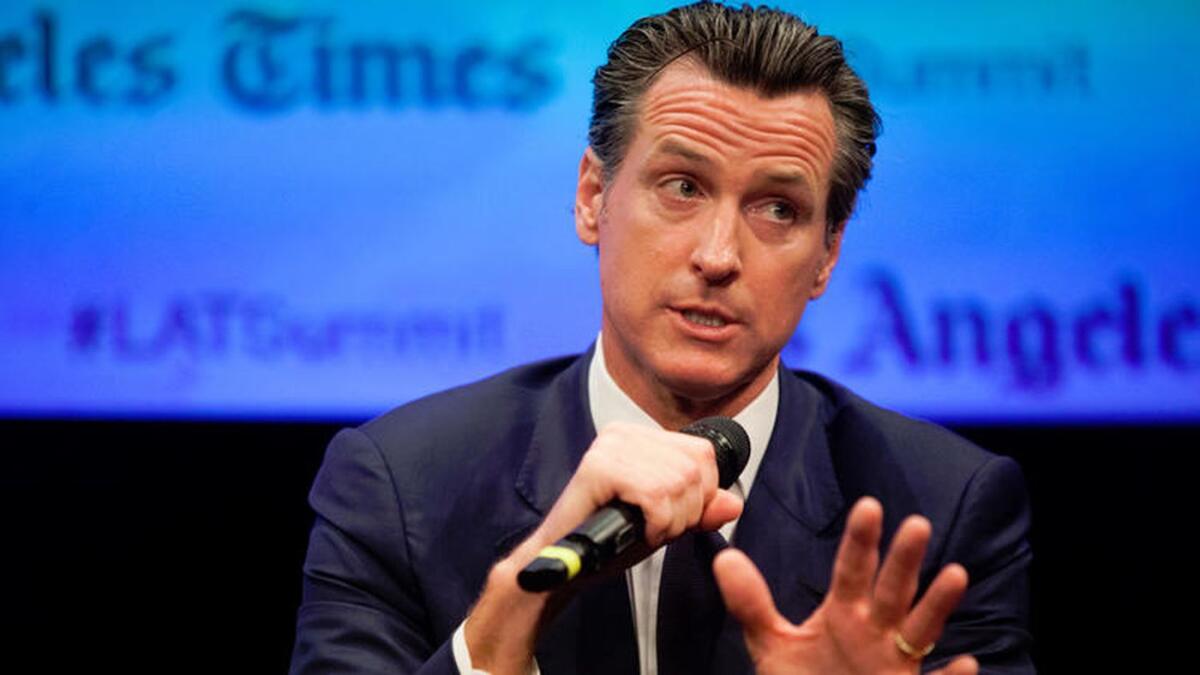
Gavin Newsom remains the dominant front-runner in fundraising in the California gubernatorial campaign, reporting nearly $16.7 million in cash on hand as the year started, according to disclosure documents filed with the state on Wednesday.
That’s more than all his gubernatorial rivals combined, and it’s a notable shift for a candidate who dropped out of the 2010 governor’s race in part because he was a lackluster fundraiser.
Newsom’s cash-on-hand figure is more than double what his nearest Democratic rivals – state Treasurer John Chiang and former Los Angeles Mayor Antonio Villaraigosa – each have in the bank, according to filings at the California secretary of state’s office.
As the campaign gears up in advance of the June 5 primary, Chiang and Villaraigosa have a little under $6 million each in their accounts. Businessman John Cox has nearly $2 million on hand, the most of any Republican candidate in the race. Other candidates have small sums, are swimming in debt or entered the race so recently they don’t have to disclose their finances.
Newsom, the state’s lieutenant governor, raised more than $10 million in 2017, roughly doubling his haul since he entered the race in early 2015. He has spent about 20% of the money he has raised, including $2.1 million last year.
Newsom campaign officials note that he has more than $2.9 million in his lieutenant governor’s campaign account, money he intends to transfer to the gubernatorial race. The transfer has not yet happened and it’s unclear how much is legally transferable.
Chiang’s campaign similarly notes that he has more than $3.2 million in his state treasurer’s campaign account.
John Chiang spent nearly every dollar he raised for governor’s race in final six months of 2017
Democratic gubernatorial candidate John Chiang spent nearly every dollar he raised during the last six months of 2017, according to a campaign financial disclosure statement filed with the California secretary of state’s office on Wednesday.
Chiang, the state’s treasurer, raised $1.3 million and spent $1,264,602 during this reporting period, according to the filing.
It’s a dramatic uptick in spending since he entered the race in mid-2016, and it occurred just before a campaign shake-up intended to reboot a candidacy that has been lagging in the polls.
Overall, Chiang has raised nearly $8.2 million for his gubernatorial bid and entered 2018 with nearly $5.8 million in the bank and $20,283 in unpaid bills.
That figure puts him far behind Democratic rival Gavin Newsom, on par with Democratic rival Antonio Villaraigosa and well ahead of Republicans John Cox and Travis Allen and Democrat Delaine Eastin.
Chiang campaign officials note that he has more than $3.2 million in his state treasurer’s account, money they intend to transfer to the gubernatorial race. The transfer has not yet happened, and it’s unclear how much is legally transferable.
Republican in strong GOP district raised less money than Democrats
Rep. Tom McClintock, the Northern California Republican whose district was recently added to Democrats’ list of vulnerable California seats, was outraised by two Democratic challengers last quarter.
McClintock, of Elk Grove, raised $215,854 between Oct. 1 and Dec. 31, less than the $260,724 Regina Bateson reported raising and significantly lower than Jessica Morse’s $291,761 haul.
The incumbent was already raising money at a faster clip than previous cycles, bringing in $651,168 in 2017 as opposed to the $523,986 he had raised in 2015.
Morse now has more cash in the bank than McClintock, with $488,842 reported as of the end of the year compared with his $461,943.
Morse, who previously worked on national security issues for the federal government, also raised more than McClintock in the previous quarter and had already been gaining on him in cash on hand. Bateson, a political science professor and former foreign service officer, is further behind with $276,060 in the bank.
The numbers could hint at trouble ahead for the five-term Republican, who is facing his first competitive race since first being elected in 2008. His district was named a Democratic priority in November.
McClintock represents a strong GOP district, where registered Republicans outnumber Democrats 44% to 29%. The conservative Republican has won reelection with more than 60% of the vote each time, but in recent months has faced noisy protests at his town hall meetings and the rise of left-leaning activists in his district.
No clear favorite on the challenger side emerged from last weekend’s Democratic Party endorsement conferences, with Morse gaining 55% of the 4th District vote among party delegates. The fight over the state party endorsement in the race will continue at next month’s state Democratic convention in San Diego.
Two other challengers in the race, Democrat Roza Calderon and Republican Mitchell Kendrick White, are not expected to post robust fundraising figures for the end of 2017.
Antonio Villaraigosa reports having almost $6 million socked away in bid for governor
Former Los Angeles Mayor Antonio Villaraigosa had more than $5.9 million in the bank at the beginning of the year for his gubernatorial bid, lagging far behind top Democratic rival Lt. Gov. Gavin Newsom.
Villaraigosa raised $4.4 million in 2017 and spent more than a quarter of that on his campaign, according to a summary of the campaign finance report he filed with the California secretary of state.
“We set out to make this a two-person race, and we have accomplished that by dramatically increasing our support in the polls, raising over $7 million and laying the foundation for a winning people-powered campaign. We are on track to advance to the general election and win in November,” Villaraigosa campaign spokesman Luis Vizcaino said in a statement released Wednesday afternoon.
Among the other major Democratic candidates, state Treasurer John Chiang reported having $5.8 million cash on hand and raising close to $4 million in 2017. Newsom’s financial report is expected to be available later today, but his campaign says it has a war chest of more than $19 million.
Former state schools chief Delaine Eastin reported having $184,000 in her campaign account as of Jan. 1.
California voters will consider a tax break for rainwater collection systems with Proposition 72 in June
GOP candidate for California governor John Cox starts 2018 with nearly $2 million in the bank
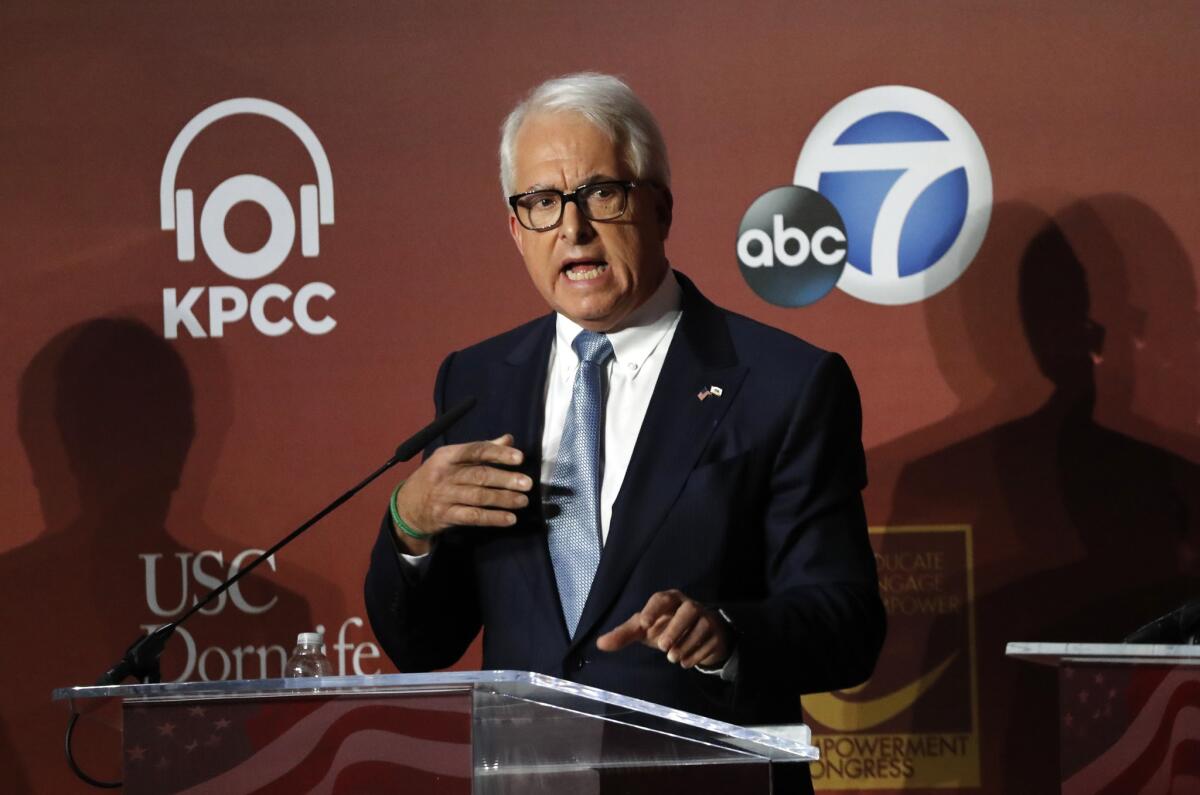
Republican gubernatorial candidate John Cox has nearly $2 million on hand as he tries to win one of the top two spots in the June primary, according to a fundraising disclosure report he filed with the California secretary of state’s office on Wednesday.
He reported raising $518,446 in 2017, on top of the $3 million the Rancho Santa Fe businessman donated to his campaign.
Cox’s cash on hand puts him far ahead of GOP rival Travis Allen, who entered 2018 more than $200,000 in debt. The other top Republican in the race, former Rep. Doug Ose, won’t have to disclose finances until the spring because he entered the contest only this month.
The three top Democrats in the race – Gavin Newsom, John Chiang and Antonio Villaraigosa – are expected to have several million dollars in the bank for the contest.
Sen. Dianne Feinstein has nearly $10 million in bank for campaign against fellow Democrat Kevin de León
Sen. Dianne Feinstein raised $1 million in the final months of 2017 and lent her campaign $5 million, according to a fundraising disclosure filed with the Federal Election Commission on Wednesday.
The cash infusions allowed the veteran senator to kick off the year with $9.8 million in the bank.
Feinstein last faced a competitive race in 1994. But she is being challenged this year by a fellow Democrat, state Senate President Pro Tem Kevin de León. He has not yet disclosed his fundraising efforts to date.
Other candidates running include liberal activist Alison Hartson, who reported raising $213,758, and attorney Pat Harris, whose fundraising figures are not yet available.
Some political observers pointed to Feinstein’s loan as evidence she is anticipating a tough campaign. But California’s senior senator, who is among the wealthiest members of Congress, also lent her campaign $5 million during her 2012 reelection, which was not a competitive race. She later refunded herself the full amount.
Travis Allen’s campaign for governor entered 2018 in the red
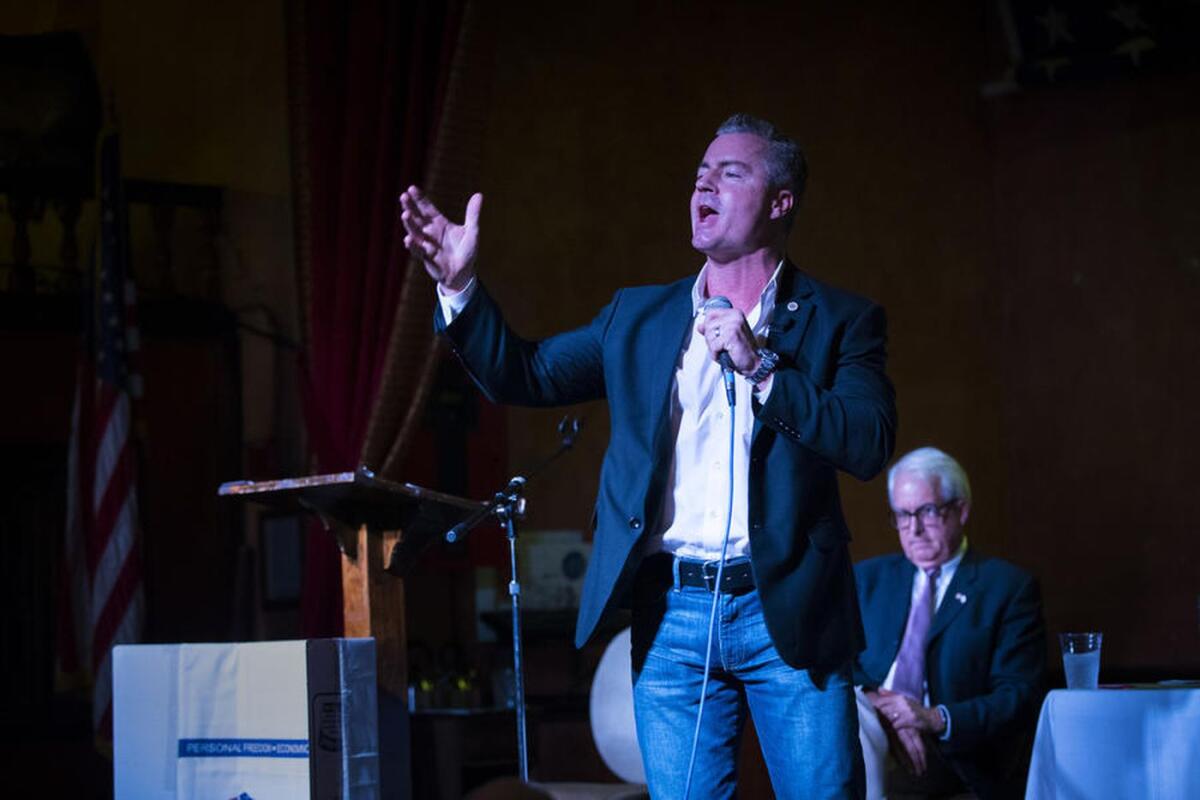
Republican gubernatorial candidate Travis Allen started the year more than $200,000 in debt, according to a fundraising report filed with the California secretary of state’s office on Wednesday.
Allen, a state assemblyman from Huntington Beach, reported raising $447,236 in 2017, with expenditures of $654,602, according to the filing. More than half of those expenses were unpaid, leaving Allen with $135,535 cash in the bank and $342,850 in unpaid bills.
Allen’s GOP rivals in the race have yet to report their fundraising totals for 2017, but he is almost certain to lag behind businessman John Cox, who has contributed $3 million to his own campaign. The other main Republican in the race, former Rep. Doug Ose, entered the race earlier this month and won’t be required to file fundraising reports until the spring.
The Republicans are likely to be dwarfed in fundraising by three of the Democrats in the race – Gavin Newsom, John Chiang and Antonio Villaraigosa — who have each raised several million dollars.
Dogged by an FBI investigation, Rep. Duncan Hunter raised just $50,000 in three months
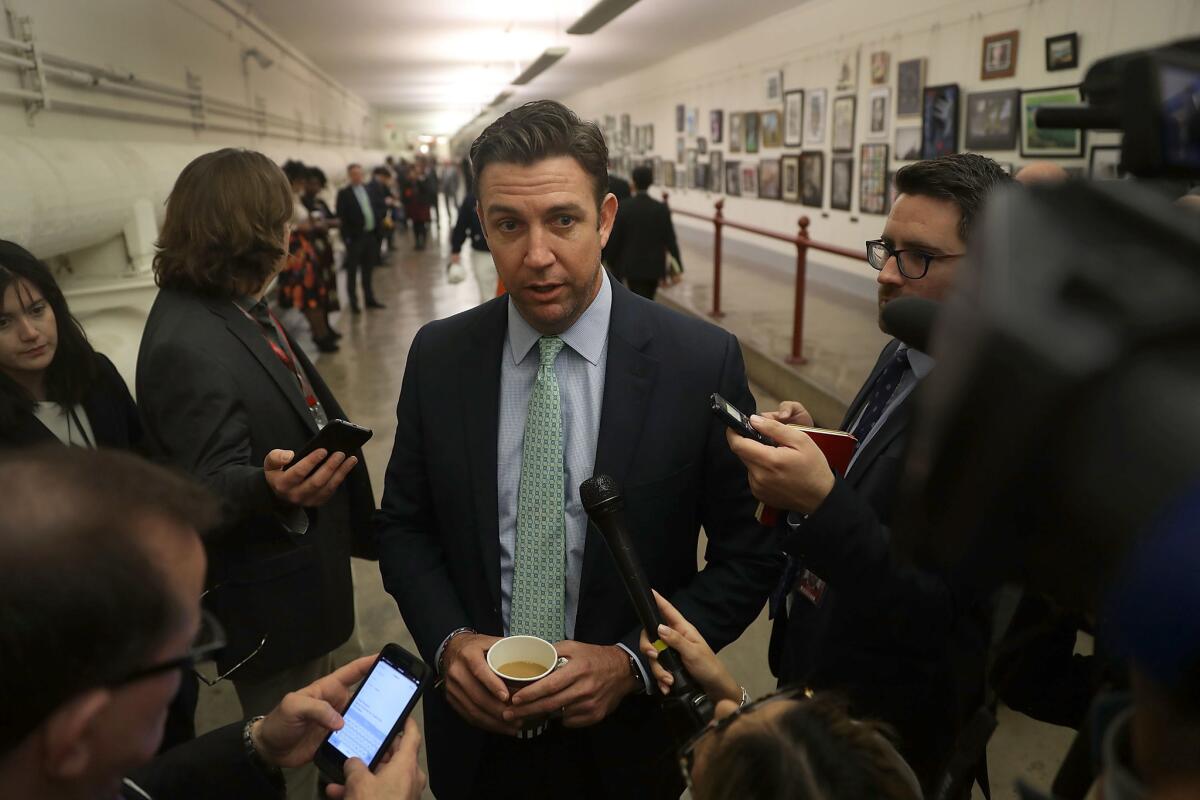
Rep. Duncan Hunter’s reelection campaign could be headed into a tailspin. According to the latest campaign finance reports, Hunter’s campaign is bleeding money.
The Republican from Alpine raised an anemic $50,703 in the last three months of 2017, according to the reports, but spent more than three times that — $178,168 — on legal fees as he battles an FBI investigation into whether he improperly used campaign funds for personal expenses. He started 2018 with just $290,904 in the bank, less than half of what he had stored up a year earlier.
The five-term congressman appears to be losing support within his district. Only one donor listed in Hunter’s year-end report lives inside Hunter’s 50th Congressional District: Molly Sylvester, a local businesswoman who owns a chain of vape shops in San Diego and gave him $2,000. (Hunter is known for vaping during a 2016 committee as he was arguing against a ban on e-cigarettes on planes.)
The rest of Hunter’s contributions come mostly from San Diego-area residents outside his district’s boundaries, D.C. lobbyists and out-of-state political action committees.
Hunter spent more on legal fees in the fourth quarter of 2017 than he did in any of the other periods last year. In total, Hunter has raised a total of $461,117 and spent a total of $535,215 on legal fees. His district has been listed by Democrats as one of their top targets in this year’s midterms, and at least two well-funded Democrats have emerged to challenge him.
“It was a challenging quarter but things are looking up,” said Dave Gilliard, Hunter’s campaign consultant.
The House Ethics Committee disclosed last March that the FBI was investigating Hunter for possible campaign finance violations.
Unusual spending charged to his campaign accounts included airfare for his family’s pet rabbit and payments to nail salons and his children’s private school. Hunter has reimbursed his campaign for about $62,000 of the expenses, which included oral surgery, a family trip to Italy and Disneyland gift shop purchases.
In a recent interview with a local television station, Hunter contended that investigators looking into his campaign spending are politically motivated and complained that the investigation was dragging into the political cycle for his reelection campaign.
After a grand jury subpoena was issued in the investigation earlier this month, rumors swirled that Hunter could be indicted or step down. There were reports that Rep. Darrell Issa, who recently announced he wouldn’t run for reelection in his neighboring district, would run in Hunter’s instead.
In response, Hunter said he is “100% running for reelection.”
FOR THE RECORD
Jan. 31, 2:25 p.m.: A previous version of this post misidentified Hunter’s district as the 52nd Congressional District. He represents the 50th District.
San Jose Mayor Sam Liccardo endorses Antonio Villaraigosa for governor
San Jose Mayor Sam Liccardo endorsed Antonio Villaraigosa for governor on Wednesday, saying he appreciated his record in elected office and his pragmatic approach.
“I look forward to working with him to narrow California’s economic divide and to build more affordable housing,” Liccardo said.
The men toured housing for homeless veterans in San Jose and held a roundtable about the affordable-housing and homeless crises.
Villaraigosa, the former mayor of Los Angeles, has focused his campaign on Californians who have been left behind in the economic recovery because of issues such as the lack of affordable housing. He has proposed the construction of 3.5 million homes by 2025, in part by reforming environmental regulations and streamlining the approval process.
Democratic candidate for governor Delaine Eastin raises less than $660,000 in 2017, putting her at major disadvantage
Democratic candidate for governor Delaine Eastin raised just under $660,000 in campaign funds in 2017, a far cry from the sums being raised by her Democratic rivals in the race.
The other major Democrats in the race, Lt. Gov. Gavin Newsom, former Los Angeles Mayor Antonio Villaraigosa and state Treasurer John Chiang, have raised millions. Newsom leads the pack, with a haul expected to exceed $20 million.
Given the amount she’s raised, Eastin’s campaign options are severely limited. Airing a single television ad in the Los Angeles market can run $2 million a week.
Eastin served as California’s elected state superintendent of public instruction from 1994 to 2002. She has focused her campaign on the need to improve the state’s public schools and universities, and enhance early child care.
Eastin loaned $100,000 to her own campaign, according to her campaign finance report filed with the secretary of state’s office.
The second-largest donor to her campaign was education advocate Katherine Welch of Piedmont, a former financial analyst who chairs Eastin’s campaign. Welch contributed a total of $53,000.
According to the report, Eastin’s campaign had just under $184,000 cash on hand at the end of 2017.
Californians with severe mental illness could be banned for life from owning firearms under new proposal
A state lawmaker wants to mandate a lifetime ban on possessing firearms by some Californians suffering from severe mental health issues, saying it may help reduce the number of suicides.
A bill by Assemblyman Evan Low (D-Campbell) would apply to some of those judged by the courts to be a risk to themselves and others who are approved for an involuntary 5150 hold for mental health treatment.
Currently, those people have their firearms taken away for five years, but psychiatric facilities often petition afterward for the guns to be returned, Low said.
The assemblyman’s bill would permanently remove the firearms of a person who has been placed on a 5150 hold twice in one year. It would also prohibit psychiatric facilities from filling out petition forms on a former patient’s behalf to have the guns returned.
“People at risk of harming themselves or others should not have easy access to firearms,” Low said in a statement. “Research shows that suicide with a firearm is the most common and by far the most lethal suicide method. Just having a firearm in the home is a strong predictor for gun suicide.”
The legislation is supported by the California District Attorneys Assn., according to Amador County Dist. Atty. Todd Riebe, the group’s president.
“AB 1968 gives prosecutors more time to access and review information that is critical to our ability to thoroughly vet and defend against petitions submitted by individuals who may pose such a risk,” Riebe said.
Democrats running for California governor play nice during debate focused on abortion rights
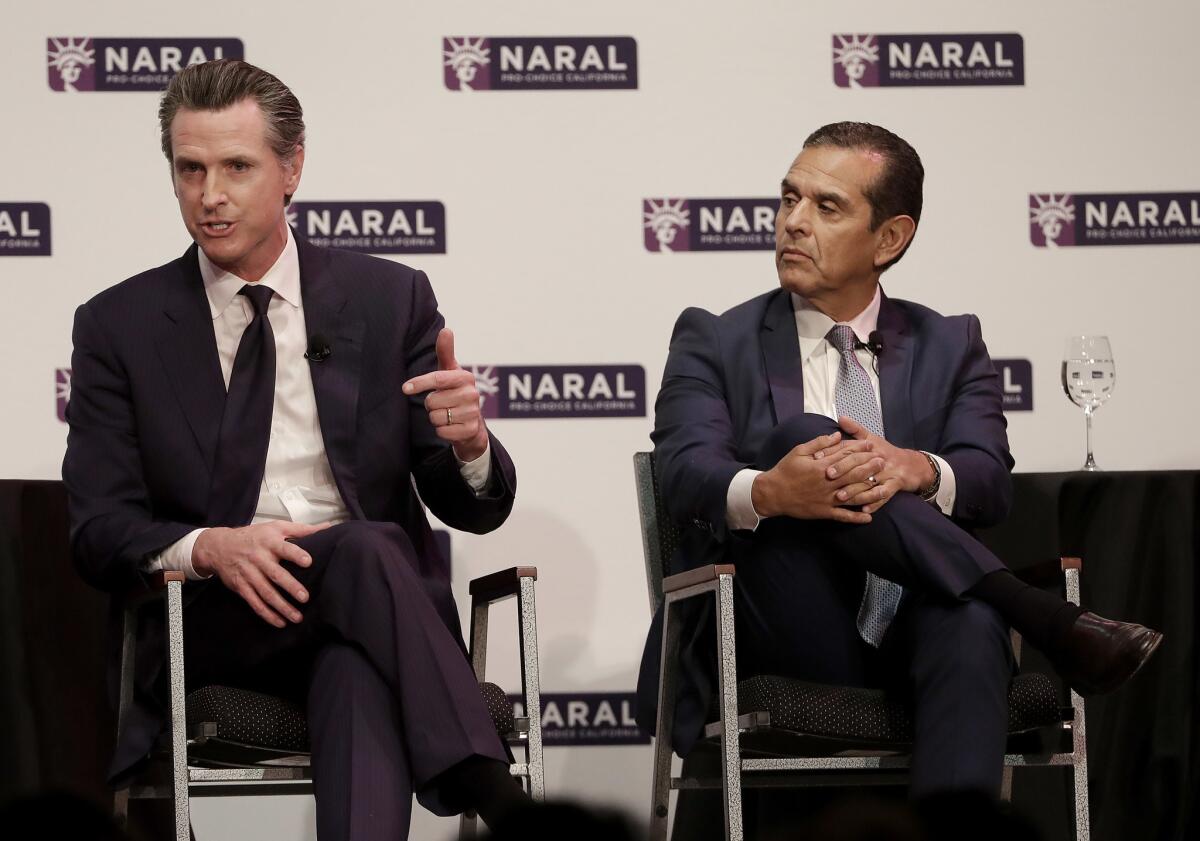
Anyone expecting fireworks at Tuesday night’s gubernatorial debate in San Francisco must have been sorely disappointed.
On the heels of two chippy clashes between the candidates in the last two weeks, the four Democrats on stage for a debate sponsored by the abortion-rights organization NARAL Pro-Choice California agreed on almost every issue. And they played nice.
In fact, the only one who was criticized was Gov. Jerry Brown. All four candidates criticized the governor’s veto of a bill last year that would have barred employers from firing workers for having an abortion, or giving birth to a child out of wedlock.
Two of the three Republicans in the race were invited to the event but did not respond. The third, former Sacramento Rep. Doug Ose, said he was not invited.
What early endorsement votes mean for California Democrats in competitive House races
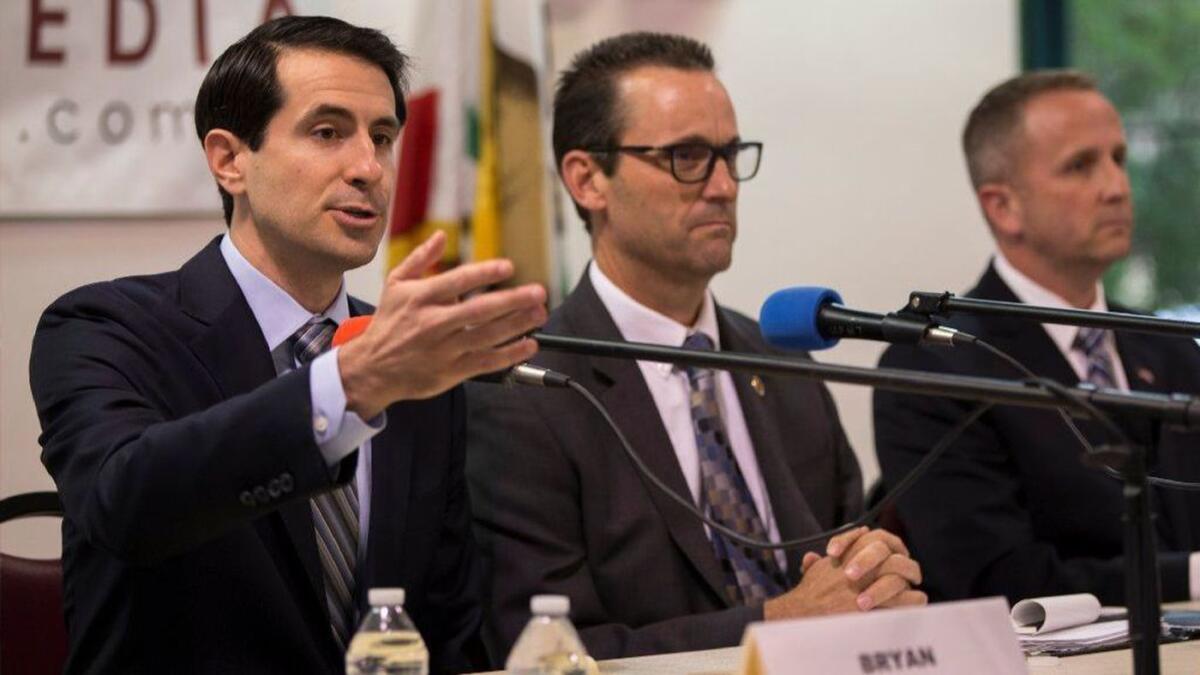
The winnowing process began this weekend for the dozens of California Democrats vying to take control of Republican-held House seats in the midterm election.
The rank-and-file delegates who make up the state’s Democratic Party met last weekend in small groups all over the state to cast early votes for their favorite candidates in House races.
These so-called “pre-endorsement conferences” are the first steps in the process to winning the party’s endorsement ahead of June’s primary.
The results give an early glimpse of where the competitive House races stand — who is consolidating strength among the party’s grass roots and which races remain wide open.
In many of these crowded races the imprimatur of the Democratic Party can give the endorsed candidates a meaningful way to stand out. The party’s endorsement does not necessarily mean a candidate is a shoo-in to make it out of the primary — more on that later.
John Chiang explores creating a state bank for the marijuana industry
State Treasurer and Democratic candidate for governor John Chiang on Tuesday announced his office will study whether California should create a state bank to serve California’s newly legalized marijuana industry.
The effort will be coordinated with the state attorney general’s office, with both agencies trying to determine the costs, legal implications and other possible barriers to creating a state-run bank.
The biggest risk may come from Washington. U.S. Atty. Gen. Jeff Sessions has indicated that the federal government will begin enforcing federal laws banning marijuana in states where cannabis is legal.
But it didn’t take long for one of Chiang’s Democratic rivals in the governor’s race, Lt. Gov. Gavin Newsom, to take a swipe at him. Within minutes of Chiang’s announcement, Newsom’s campaign manager criticized Chiang for not endorsing Proposition 64, which voters approved in 2016 to legalize recreational marijuana.
“John Chiang went out of his way to avoid endorsing Prop. 64 and virtually every other criminal justice reform ballot initiative since he’s been a statewide office holder,” Newsom campaign manager Addisu Demissie said in a statement.
The Chiang campaign dismissed the attack, saying the treasurer supported the private use of marijuana, but expressed reservations about whether the ballot measure would ensure cannabis was properly regulated and safeguards were in place.
“Today’s announcement is case in point how Treasurer Chiang is laying out concrete plans to tackle the issues facing California,” said Chiang’s press secretary, Nicholas Jordan. “While Gavin Newsom may have lost interest and is just looking for a pat on the back, there are still serious hurdles for the cannabis industry to overcome.”
Chiang and Newsom will join the other Democratic candidates for governor at a forum sponsored by the abortion-rights organization NARAL Pro-Choice California in San Francisco on Tuesday evening.
Montebello mayor says she is ‘seriously considering’ run against embattled Sen. Tony Mendoza
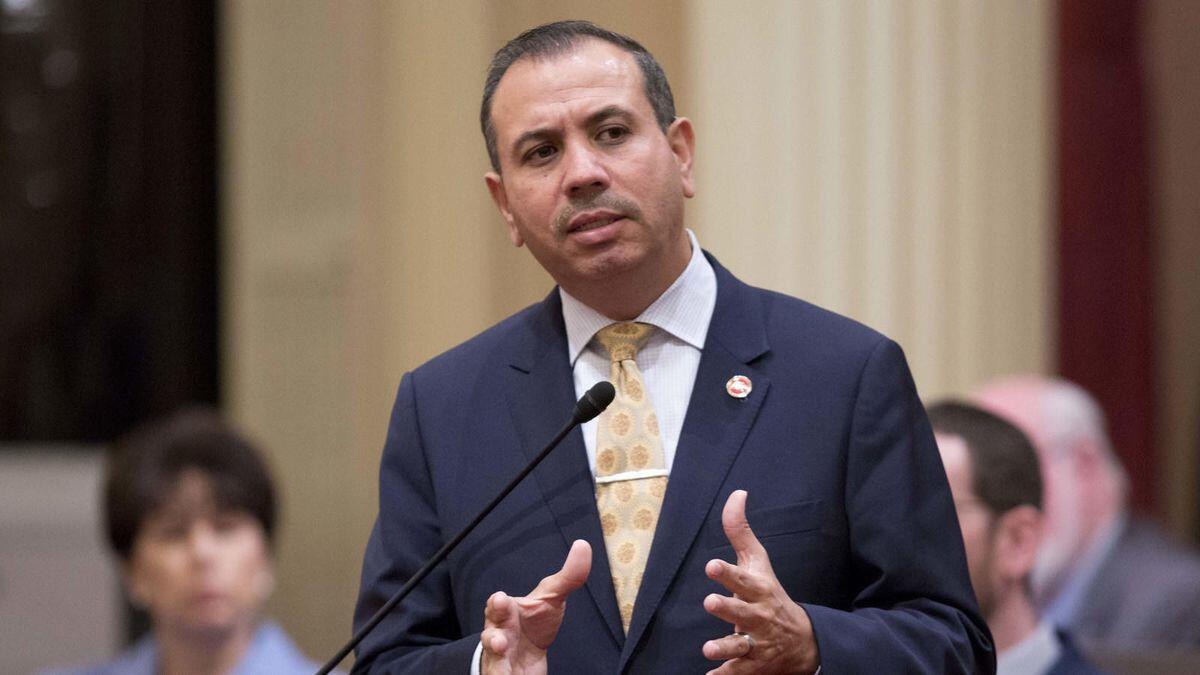
With state Sen. Tony Mendoza (D-Artesia) on a leave of absence pending a sexual harassment probe, Montebello Mayor Vanessa Delgado said Tuesday that one reason she is considering a possible election challenge to the incumbent is that there is no one standing up for the Senate district with him absent.
Mendoza, a Democrat from Artesia, is facing criticism from within his party for allegations he acted inappropriately with three former female aides. Mendoza denies wrongdoing.
“I am seriously considering it,” said Delgado, who is also a Democrat. “We’re unrepresented. We have been for some time, given Tony Mendoza’s leave. The way the timeline works out for his leave and a possible expulsion, somebody has to be positioned to run if he is going to leave early or not.”
Mendoza took the leave on Jan. 3 but the Senate Rules Committee voted last week to approve a 60-day extension to allow an investigation into sexual harassment to be completed.
Delgado, a commercial developer, said she has been building affordable housing in recent years and thinks she can help with the state’s affordable housing crisis if elected to the Senate.
“That’s one of my biggest passions and I think I can be helpful in creating some policy that way,” she said.
Delgado purchased a home in Montebello in 2014 from former Assemblyman Tom Calderon, who has since served a prison sentence for laundering bribes accepted by his brother, Sen. Ron Calderon, who remains behind bars. Still, Delgado said she is not allied with the once powerful Calderon family, which has supported candidates against Mendoza before.
“I don’t even know them. I’ve never interacted with them,” Delgado said of the family, adding that the house purchase was handled by her broker.
Laundry, dinner, TV: What’s in store tonight for a Californian acting as Democrats’ designated survivor
If the worst were to happen on Capitol Hill during President Trump’s speech tonight, Rep. Mike Thompson would be tasked with helping to rebuild the government.
The concept of a designated survivor is by now well known: The little known Cabinet secretary who doesn’t attend the State of the Union in order to preserve the line of succession in case the country’s leaders are attacked when they are all in one building. Since the Sept. 11, 2001, attacks, House and Senate leaders have picked members who would restart the legislative branch as well.
Thompson of St. Helena, who along with Rep. Doris Matsui of Sacramento was tapped by House Minority Leader Nancy Pelosi as Democrats’ designated survivors, said it is not exciting at all. He’s done it once before, and there is no underground bunker or undisclosed location. He’ll be at his home in Washington.
“I put a load of wash in this morning, so I’m going to dry that,” Thompson said. Then, it’ll be time to fold the laundry and iron his shirts, he said.
His television is in the kitchen, so he might make some soup as he watches Trump give his speech, though Thompson hasn’t decided what kind to make.
“The only requirement is that we can’t be on campus,” Thompson said. “Roughly translated that means I watch on TV at my house.”
Thompson said it’s an honor to be trusted with the responsibility. Still, there’s no handbook on what he’s tasked with doing if the worst happens.
“I asked my staff today, if something happens, where am I supposed to go?” Thompson said.
State Senate sinks effort to ban polystyrene food containers in California

The state Senate on Tuesday deadlocked for the second year in a row on a measure that would have prohibited California restaurants from providing take-out orders in disposable polystyrene food service containers starting in 2020.
Sen. Benjamin Allen (D-Santa Monica) was unable to get votes from even some fellow Democrats as the bill failed 18-16, three votes shy of the majority needed for passage.
Allen signaled that he may bring the proposal back next year.
“Just as we saw with the plastic bag ban, which took several years to enact, it takes time to get people comfortable with this type of change,” he said after the vote. “But we obviously need to spend more time educating my colleagues on the damaging impact of Styrofoam on our coastline.”
Supporters cited state research that found land-based litter constitutes nearly 80% of the marine debris found on California beaches and in oceans, and 90% of it is plastic. The containers do not decompose, but instead break up into many small pieces of plastic, Allen said.
“Polystyrene is now a bigger litter problem than plastic bags were” before they were restricted, Allen told his colleagues, noting similar bans have been approved by several California cities, including Santa Monica and San Francisco.
Sen. Scott Wiener (D-San Francisco) said the containers have contributed to massive islands of plastic waste in the ocean.
“People are disgusted and horrified, and they are wondering why we are allowing this to happen to our planet,” Wiener said during the Senate debate.
Opponents of the measure, including Republican John Moorlach of Costa Mesa, said the bill was unnecessary because many restaurant chains, including McDonald’s Corp. and Wendy’s International Inc., have voluntarily stopped use of such containers.
“It’s happening on its own, and it’s fantastic,” Moorlach said during the debate. “I’m wondering, why a law?”
Allen said some restaurants are still using the containers. “Sometimes it takes a little nudge when we know we have damaging products out there,” he said.
The measure is opposed by business groups including the American Chemistry Council, California Chamber of Commerce and California Restaurant Assn. The opposition groups said a litter-education program and expanded recycling would work better.
Seven California members of Congress are bringing Dreamers to the State of the Union
Hoping to keep pressure on President Trump and Congress to find a legislative fix for “Dreamers,” nearly two dozen members of Congress, including seven Californians, are bringing people who entered the country illegally as children to the State of the Union on Tuesday night.
“What I want Donald Trump to see tonight are the faces of these Dreamers,” Rep. Judy Chu (D-Monterey Park), the Congressional Asian Pacific American Caucus chairwoman, said at a news conference Tuesday.
Chu said her guest, Jung Bin Cho, 23, of Springfield, Va., is representative of the country’s 130,000 Asian American Dreamers.
“All he asks is not to be deported to a home he never knew,” Chu said. “Here he has roots, community and a future, and there are so many others like him.”
California is thought to be home to 222,000 of the 700,000 people who got temporary deportation relief and work permits under the Deferred Action for Childhood Arrivals program. President Trump moved in the fall to end the program. He gave Congress until early March before fully shuttering the program, a move that has been put on hold by a federal judge.
Congress hasn’t been able to find a solution that both Democrats and Republicans will accept. Nonetheless, some Dreamers said Tuesday they want to know their future, and soon.
UCLA graduate Denea Joseph, 23, said she’s hoping to become a lawyer and help write immigration policy.
“But that dream is deferred until Congress can pass a long-lasting solution to a longstanding problem. We need a clean Dream Act now,” she said.
Joseph, the guest of Sen. Kamala Harris (D-Calif.), is one of about 600,000 black Dreamers in the country.
At least one member of Congress had a problem with the Dreamers attending the State of the Union address. Republican Rep. Paul Gosar of Arizona said on Twitter Tuesday that he had contacted Capitol Police asking them to consider checking the identification of every person trying to attend the speech and “arresting any illegal aliens in attendance.”
The State of the Union address presents one of the busiest nights of the year for Capitol Police, and Congressional Hispanic Caucus Chairwoman Rep. Michelle Lujan Grisham of New Mexico pointed out that the officers aren’t going to go after people just trying to attend a speech.
Proposal to help Californians evade the effects of Trump’s tax overhaul passes the state Senate
Democrat running for Issa’s seat will launch TV ad during tonight’s State of the Union
Tom Steyer isn’t the only politico launching ads in California during tonight’s State of the Union address.
Sara Jacobs, a congressional candidate running for Rep. Darrell Issa’s seat, will launch her first TV ad during Tuesday’s coverage of the President’s speech.
The ad features video of Trump and says, “If we want to hold him accountable, we need to win back Congress.” Jacobs, who turns 29 this week and has the backing of pro-abortion-rights group Emily’s List, closes the 30-second spot by saying “It’s time for a new generation to change Washington.”
Jacobs is one of five Democrats hoping to flip Issa’s 49th Congressional District. She also faces several Republicans who have joined the race since Issa announced earlier this month that he would not seek reelection.
Also running his first TV ads Tuesday is John Cox, a Republican candidate for governor who skewers “special interests lobbyists” for “sticking it to the middle class” in a 30-second ad titled “Bacon.”
To go, or not to go? California’s members of Congress weigh the State of the Union question
For years members of Congress have used their State of the Union guests to send a silent message to the president. More and more, they are sending a different message by sitting it out entirely.
Some have publicly struggled with the decision of whether to attend, especially members in the California delegation who represent a state that positions itself as the face of the resistance to Trump’s policies.
“I don’t want to pretend in any way that I support this president,” Democratic San Diego Rep. Juan Vargas said on “KPBS Midday Edition” on Monday. “I don’t want to be two-faced. I’d like to, if he started acting presidential. I’d be happy to go again, but I’m not going to do that until he starts acting presidential, respecting women, respecting people of color and immigrants.”
Republican John Cox to launch first TV ad of governor’s race before Trump’s State of the Union address
Republican John Cox plans to launch the first television ad of the 2018 race for governor on Tuesday, moments before President Trump’s State of the Union address.
The 30-second ad, titled “Bacon,” is scheduled to debut 12 minutes before the speech. It will run for 10 days on Fox News Channel in California and cost $200,000, according to Cox spokesman Matt Shupe. It depicts lobbyists as pigs roaming through Sacramento and eating from a trough.
“Every legislative session, the special interest lobbyists head to Sacramento. They roam the corridors of power, buying influence and basically sticking it to the middle class,” a narrator says in the ad over the scenes of pigs. “Corporate welfare, liberal causes, and of course there’s the public employee unions, the biggest special interest of all. Ready to clean out the barn? Join John Cox. Because he has a plan to deal with the corrupting influence of the special interests.”
That plan? He doesn’t say, but images of sizzling bacon on the screen offer a hint.
Cox is the leading Republican candidate in fundraising, but has been placing in the single digits in recent polls.
The Rancho Santa Fe businessman who has never held elected office is not alone among politicians using the State of the Union to garner attention. Liberal billionaire Tom Steyer has bought ads calling for Trump’s impeachment around the speech.
#MeToo comes to the State of the Union with Rep. Jackie Speier urging colleagues to wear black
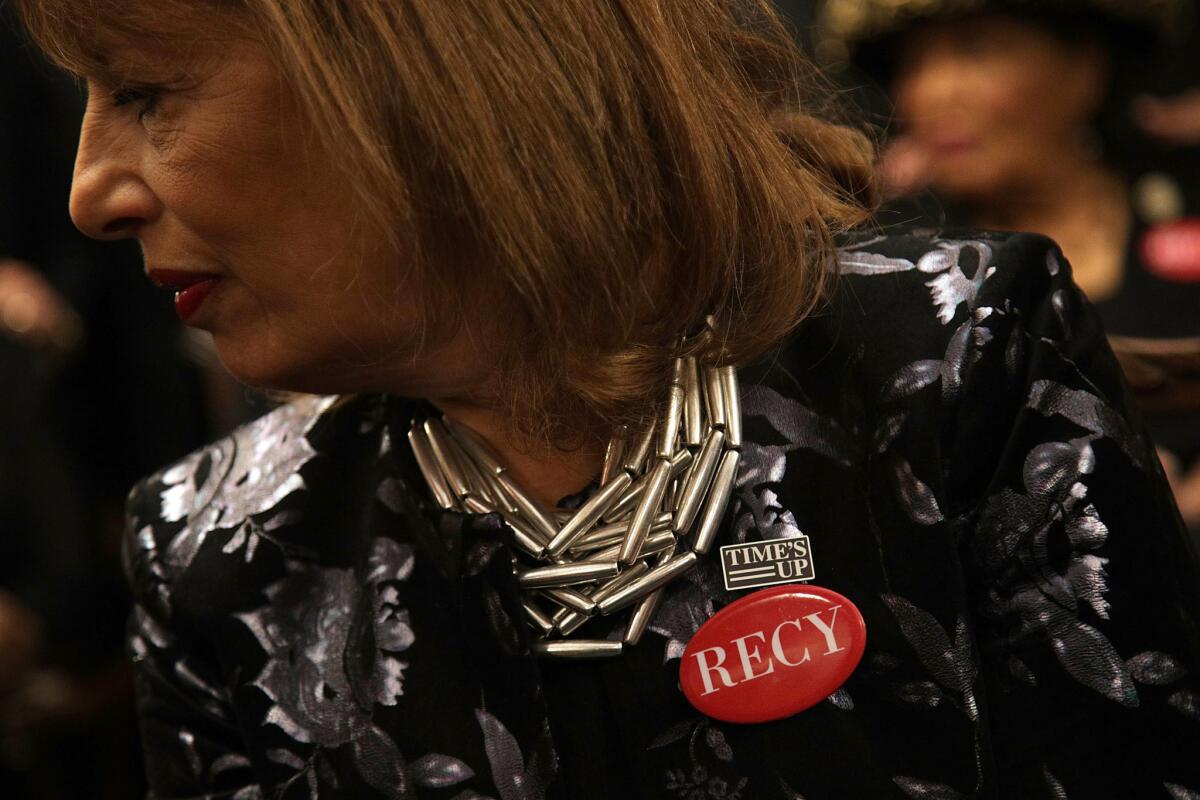
Rep. Jackie Speier of Hillsborough and other members of Congress are rallying colleagues to wear black to Tuesday night’s State of the Union address to recognize sexual harassment and assault, similar to the visual statement actors and musicians have made at award shows this year.
“This is a culture change that is sweeping the country, and Congress is embracing it,” Speier told NBC News.
Staff for at least a half-dozen California members say lawmakers will join Speier and the Democratic Women’s Working Group in wearing black to the speech in solidarity with women in multiple industries standing up to sexual harassment. It is meant to mirror the actresses and others in the Hollywood anti-harassment group Time’s Up, who wore black to the Golden Globes.
Speier, who is pushing for changes to the sexual harassment policies on Capitol Hill and revealed her own negative experience as a Hill staffer, is bringing Fatima Goss Graves, CEO of the National Women’s Law Center, as a guest to the State of the Union.
The House is working on legislation embraced by Speier that would overhaul how Capitol Hill staff report sexual harassment, including no longer allowing members of Congress to use taxpayer money to settle complaints.
Rep. Susan Davis of San Diego’s extra ticket is going to former State Department official Jenna Ben-Yehuda, who has helped bring attention to sexual harassment in the national security industry.
Rep. Mark DeSaulnier of Concord is bringing as his guest Army Master Sgt. Linda Ray, who was sexually assaulted by a superior in her unit. Both of them plan to wear black, according to DeSaulnier’s office.
California on pace to meet goal of 1.5 million electric cars by 2025, new study says
California is on pace to exceed its goal of 1.5 million electric cars on the streets by 2025, according to a new report from public policy think tank Next 10.
Nearly 350,000 electric vehicles have been sold in the state, and 2017’s growth rate in sales was almost 30% higher than 2016’s rate, the report found. Researchers credited reduced battery costs, lowering the overall price tag of the vehicles, and strong demand worldwide as key drivers of the increase in sales.
“The movement around the globe to move away from gas-powered vehicles is very significant and California is at the center of that,” said F. Noel Perry, a venture capitalist and Next 10’s founder.
Electric vehicle sales will only need to increase by 20% year-over-year through 2025 for the state to meet its target, the report said.
The study comes just after Gov. Jerry Brown announced a goal of putting 5 million electric vehicles on the state’s roads by 2030,
Perry called the new 2030 target, which Brown issued in an executive order Friday, “very, very ambitious” and said it’s difficult to know whether it’s possible. Key to the effort, he said, will be improving the state’s network of charging stations, which will need to be expanded rapidly to meet the new target.
Part of Brown’s announcement included plans to spend $2.5 billion to continue subsidizing electric car purchases and bring 250,000 vehicle charging stations and 200 hydrogen fueling stations to California by 2025.
Mary Nichols, the chairwoman of the California Air Resources Board, said in a conference call with reporters Friday that 40% of all passenger vehicle sales in 2030 would need to be electric for the goal to be met. Currently, the figure is 4.5% of sales.
“We think that is a very reasonable proposal,” Nichols said. “It’s not a stretch.”
State lawmakers will be considering an even more aggressive proposal on electric cars this year. Assemblyman Phil Ting (D-San Francisco) has introduced Assembly Bill 1745, which would ban the sale of gasoline-powered vehicles in the state after Jan. 1, 2040.
State senator facing harassment probe attracting possible challengers — from his own party

Montebello Mayor Vanessa Delgado, a Democrat, took out candidacy paperwork Monday to become the first challenger to state Sen. Tony Mendoza (D-Artesia), who is under investigation over allegations of sexual harassment.
Delgado, a commercial developer, could not be reached for comment late Monday. She sought the papers from the Los Angeles County Registrar of Voters two days after Mendoza failed to win 70% of the vote in a pre-endorsement meeting of local activists for the state Democratic Party.
Mendoza won 58% of the pre-endorsement meeting vote, which means he can seek an endorsement from delegates at the state Democratic Party convention next month.
The senator is currently on a leave of absence as attorneys hired by the Senate investigate allegations that he acted inappropriately with three women who worked for his office.
Mendoza has denied any wrongdoing. A Senate panel last week voted to extend his leave of absence by up to 60 days.
Federal immigration agents would need warrants to enter schools and courthouses under this state bill
The state Senate on Monday approved a bill that would prohibit federal immigration agents from entering schools, courthouses and state buildings to arrest or question people without a warrant.
Sen. Ricardo Lara (D-Bell Gardens) introduced Senate Bill 183 as part of a broader move by Democrats to counter President Trump’s calls for increased immigration enforcement and deportations.
On the Senate floor Monday, Lara said his legislation would help assuage the fears of hardworking immigrant parents dropping off their children at school, serving as court witnesses or paying their traffic tickets.
Lawmakers have said the heightened concerns over deportation have led many parents to keep their children home from school and to stop seeking basic social services, such as for food or healthcare. California Chief Justice Tani G. Cantil-Sakauye has said federal immigration officers have detained immigrants at courthouses across the country “in full force,” demanding to see the daily list of people due to appear “to check all the foreign-sounding names.”
Sen. Joel Anderson (R-Alpine) argued the bill would put court bailiffs and other law enforcement officials in a difficult position, forcing them to intervene with federal arrests.
“This is to ensure they have warrants,” Lara countered. “This bill isn’t requiring anyone to interfere with anyone trying to make an arrest.”
The bill moved out of the Senate chamber with a 28-7 vote and will now be considered by the state Assembly.
Joan Baez appears on California Assembly floor
New impeachment ads funded by Tom Steyer will run during Trump’s State of the Union address
Billionaire Democratic donor Tom Steyer plans to start airing new ads for his impeachment effort around President Trump’s first State of the Union address Tuesday night.
Steyer has pledged $40 million toward his effort to impeach Trump, which already has funded national ads, a petition drive and billboards in Times Square. The new ad is tightly focused on a ticking clock and features Steyer giving examples of the kind of damage a president could do in 30 seconds: order the deportation of immigrant children, threaten an unstable dictator, and “go into a rage” and use the nuclear launch codes.
It concludes: “How bad does it have to get before Congress does something?”
“The debate is no longer whether he has met the standard for impeachment, but whether members of Congress will allow him to get away with it,” Steyer said in a statement. “Waiting for a politically convenient time to acknowledge this jeopardizes the stability of our country and pushes us further away from our democratic values. We cannot wait until tomorrow, or next month, or next year. The time to act is now.”
The commercial will run on television through Feb. 12.
Two Californians among President Trump’s State of the Union guests
This post was updated to include Sharp, who is from Redding.
Central Valley candidate is back for third try at unseating Rep. Jeff Denham
After saying last June he wouldn’t make a third run against Rep. Jeff Denham, Central Valley beekeeper Michael Eggman will enter the race for the 10th Congressional District race on Monday.
Eggman, of Turlock, said in a news release that people asked him to reconsider his decision not to run.
“I received countless calls from local Democratic Party officials, local labor representatives and Central Valley working people who told me I was the only candidate who could beat an entrenched incumbent like Jeff Denham,” he said.
Eggman lost to Denham (R-Turlock) in 2014 by 12 percentage points and in 2016 by 3.4 percentage points. Hillary Clinton carried the district by 2.9 percentage points in 2016.
Democrats have again targeted the seat for 2018, and the primary field is already crowded with at least nine people who are raising money ahead of the March filing deadline.
Eggman had been running a political action committee called Red to Blue California to help oust Republicans in seven seats, including Denham’s. Eggman resigned as president of the group in order to run. Former Rep. Mike Honda is chairman of the organization.
The district includes all of Stanislaus County and the southern third of San Joaquin County, and includes Modesto, Tracy and Turlock. It’s dependent on the agricultural industry, and is among the poorest areas of the state.
California Politics Podcast: The job of being governor takes center stage
Within a span of less than eight hours last week, Californians saw the current governor deliver an early closing statement on his time in office and a fiery exchange between the leading candidates to replace him in 2019.
This week’s episode of the California Politics Podcast takes a closer look at Gov. Jerry Brown’s State of the State address on Thursday and the Los Angeles forum that night featuring six gubernatorial hopefuls.
We also check in on the rising tensions over a state senator’s leave of absence — and how lawmakers have now taken the unprecedented step of changing their standing rules to keep state Sen. Tony Mendoza (D-Artesia) from returning to work later this week.
Under investigation in Sacramento, state Sen. Tony Mendoza fails to get early endorsement of Democrats
Bill to evade President Trump’s tax overhaul gets watered down
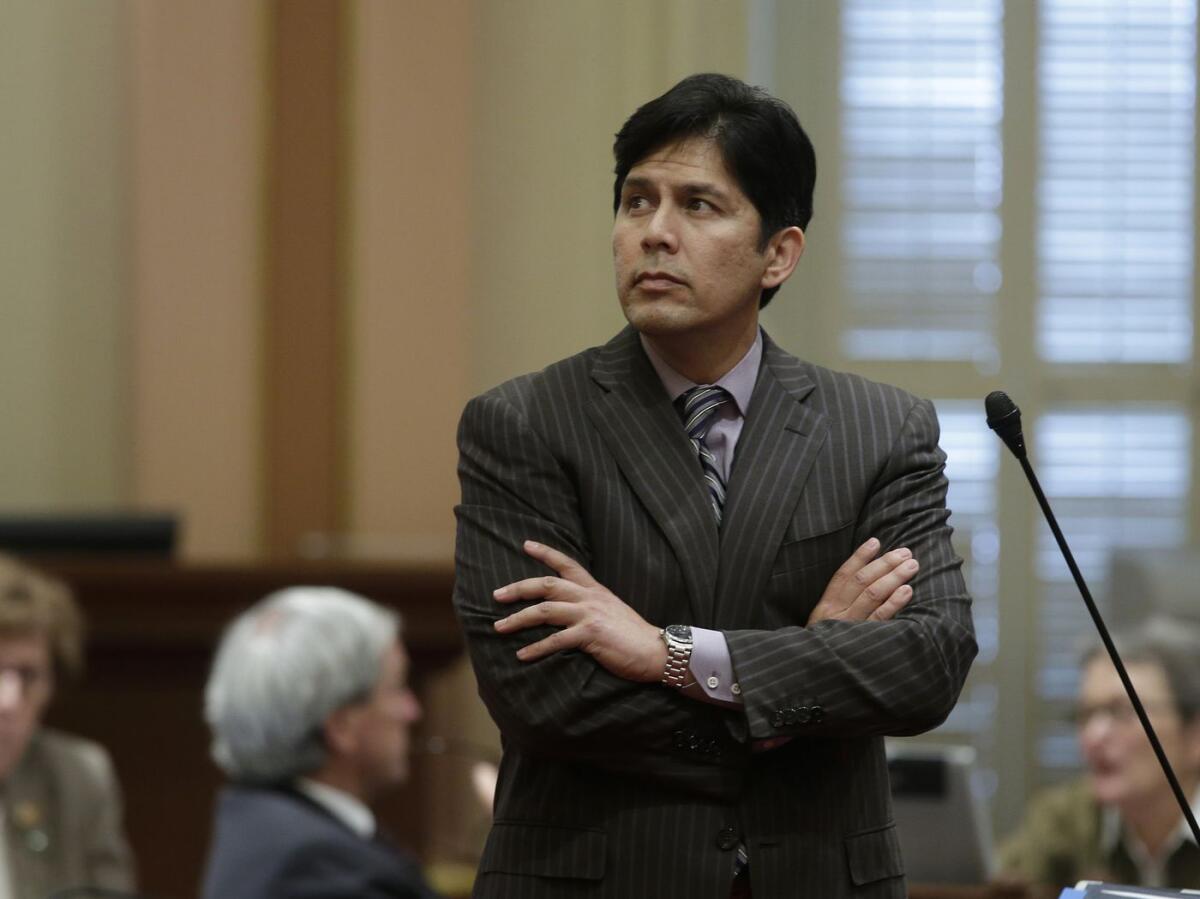
A bid to help Californians dodge the effects of President Trump’s tax plan has gotten a little less generous.
State Senate President Pro Tem Kevin de León (D-Los Angeles) has changed his bill allowing those who donate to a new state-run nonprofit to receive relief on both their state and federal taxes. In the new version of the bill, those who give to the nonprofit will reduce their state income taxes by 85% of the donation plus receive a federal charitable deduction.
Previously, De León was aiming to provide a dollar-for-dollar reduction in state taxes for those who donated. But tax law experts working on the bill with De León worried that amount could cause the federal Internal Revenue Service to crack down on the plan, and advised that a lower percentage was more legally defensible.
“The proposed 85% tax credit ... will give Californians the opportunity to fund programs they care deeply about while at the same time shielding them from some of the most egregious elements of Trump’s tax reform plan,” De León said in a statement.
De León, who also is running for U.S. Senate, introduced his bill after Trump and the GOP-led Congress passed a federal tax overhaul that capped state and local tax deductions at $10,000, an amount that disproportionately affects high-tax states like California. De León’s measure aims to allow Californians who previously used the state and local tax deduction — primarily single- and joint-filers reporting annual incomes of $100,000 or more — to instead take advantage of the charitable deduction.
U.S. Treasury officials have said they’re monitoring how states are attempting to work around the tax overhaul. Treasury Secretary Steven T. Mnuchin has called such efforts “ridiculous.”
De León made two more changes to his legislation, Senate Bill 227. The bill now clarifies that those subject to the alternative minimum tax also can receive benefits from making donations. De León also has tied SB 227 to new companion legislation, SB 581, so it won’t take effect unless both measures pass.
SB 581 will aim to ensure the new state-run charity won’t conflict with the state’s minimum K-12 school spending responsibilities under Proposition 98 and will allow fund donors to direct their contribution toward state education or parks spending, according to a draft of the bill provided by De León’s office.
Newsom’s gun control efforts win him big endorsement
Former Rep. Gabrielle Giffords and her husband, astronaut Mark Kelly, endorsed Lt. Gov. Gavin Newsom for governor on Friday citing his championing of gun control efforts.
Newsom was the force behind 2016’s Proposition 63, which outlaws the possession of ammunition magazines that hold more than 10 rounds, requires background checks for people buying bullets, makes it a crime not to report lost or stolen guns and provides a process for taking guns from people convicted of a felony.
Giffords was shot in the head while meeting with constituents in 2011. She and Kelly have become ardent gun control activists since her recovery. The couple was introduced by Aqeela Sherrills, an activist who works to curb gang violence and whose his son, Terrell Sherrills, 18, was killed in 2004.
“We know that the clearest most sensible voice on this issue and by far the greatest leader on this issue is Gavin Newsom,” Kelly said Friday to a crowd of Democratic party delegates and Newsom campaign volunteers.
“Stopping gun violence takes courage, the courage to do what’s right, the courage of new ideas,” Giffords said.
Newsom said the issue didn’t mean as much to him nine years ago, before he became a parent. He has four children, ages 1 to 8.
“This is a powerful moment, because it is about real people, it is about human beings, it is about lives, it is about community,” he said. “It is an emotional thing because it impacts so many people in the rawest of ways, people they love.”
California’s June ballot measures get numbers: Propositions 68, 69, 70 and 71
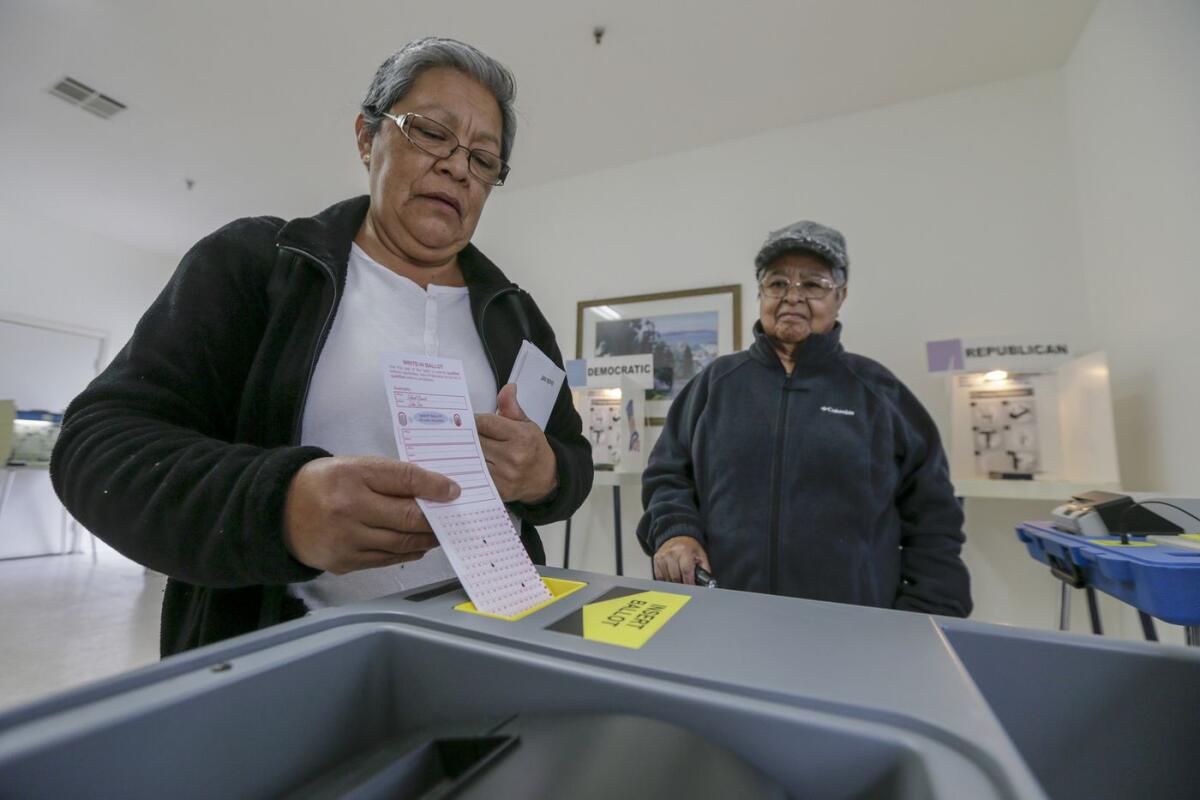
California’s secretary of state assigned numbers Friday to the four propositions on the June primary ballot, proposals crafted by state lawmakers last year. The list includes issues such as borrowing for drought, parks projects and restrictions on raiding new fuel tax revenues.
Under a 2011 law signed by Gov. Jerry Brown, proposals submitted by the public appear only on November statewide ballots — and as many as a dozen are now making their way through the process of collecting voter signatures.
In contrast, the four propositions voters will consider in June were the result of legislative negotiations on a variety of topics. Two of them encompass side deals on 2017’s biggest legislative debates: a new $52-billion transportation plan funded by taxes and fees and a reauthorization of California’s landmark cap-and-trade climate law.
Here are the measures that will appear on the June 5 ballot:
• Proposition 68: This measure is a $4.1-billion bond proposal, with most of the borrowed money going to drought, water, parks and coastal protection programs.
• Proposition 69: This amendment to the California Constitution would ban lawmakers from diverting either new diesel sales tax revenues or new vehicle registration fees away from transportation efforts. Both sources of revenue were included in the transportation plan signed by Brown in April. The ballot measure also exempts these revenues from being counted as part of a 1979 formula that places limits on state spending.
• Proposition 70: This constitutional amendment sets the stage for a dramatic showdown by 2024 over money collected from companies seeking extra room under California’s cap-and-trade system to emit greenhouse gases. Lawmakers, if this measure passes, will have to take a single up-or-down vote on future spending of those proceeds — and that could shine a spotlight on the state’s high-speed train project, which currently receives a portion of the money.
• Proposition 71: Perhaps the most significant measure on the June ballot is also the shortest. This constitutional amendment would make clear that any law enacted by voters through a proposition only takes effect once the final votes are tallied statewide and the election is certified. The state constitution currently says all propositions that appear victorious on election night automatically become law the next day, even though it can take days or weeks to finish processing ballots.
Feinstein has nearly $10 million on hand for reelection bid, according to her campaign
California will put 5 million electric cars on the road by 2030, Gov. Jerry Brown says
California Gov. Jerry Brown wants to put 5 million electric cars on the state’s roads by 2030.
Brown announced the new goal in his State of the State speech this week, and formalized the target in an executive order issued Friday.
“This executive order aims to curb carbon pollution from cars and trucks and boost the number of zero-emission vehicles driven in California,” Brown said in a statement.
Currently, the state’s goal is to have 1.5 million such cars on the road by 2025. Transportation is California’s largest source of greenhouse gases. Two years ago, lawmakers approved a target of reducing carbon emissions by 40% below 1990 levels by 2030.
Brown is proposing to meet the new electric car target with a $2.5-billion investment during the next eight years to continue state subsides for car purchases and bring 250,000 vehicle charging stations and 200 hydrogen fueling stations to California by 2025.
Brown also announced on Friday a proposed $1.25-billion plan to spend proceeds from the state’s cap-and-trade auctions in the coming year. Lawmakers will debate the proposal as part of state budget negotiations.
Gov. Jerry Brown’s State of the State speech, annotated
Times journalists annotated Gov. Jerry Brown’s State of the State speech. If you see a passage highlighted in yellow, you can click on it to see what we have to say about it. You can also highlight passages and leave your own comments.
Below is the text as delivered:
Thank you. Well, as my father used to say, “I accept the nomination!”
Personal attacks between Newsom, Villaraigosa creep into second major debate in California governor’s race

The candidates who hope to be California’s next governor clashed Thursday about immigration, healthcare and how they made their fortunes at a boisterous debate in front of a packed hall with a predominantly Latino audience.
As the clout of Latino voters continues to grow in California, the governor’s race could hinge on which candidate appeals most to this critical slice of the electorate. Many of the debate’s questions revolved around immigration, a touchstone issue to many in the audience.
But front-runners Gavin Newsom and Antonio Villaraigosa also unleashed deeply personal attacks in the debate at UCLA’s Royce Hall over how the other made his money, a shift from the policy spats that have emerged in prior clashes.
Gov. Jerry Brown looks back, pushes forward in his final State of the State speech
In his 16th and final State of the State address, Gov. Jerry Brown largely pivoted away from familiar warnings about California’s future to instead offer a valedictory message on what’s been accomplished since his unprecedented return to Sacramento in 2011.
“Very few places in the world can match that record,” he said on Thursday to an audience of state lawmakers and guests gathered in the Assembly chamber of the state Capitol.
Though a few suggestions were offered on how lawmakers should spend the year, his half-hour speech — the longest since his first tour of duty as governor — may be most remembered for the moment it marked in Brown’s own political odyssey and that of the state’s history.
Gabrielle Giffords and Mark Kelly to endorse Gavin Newsom for governor today
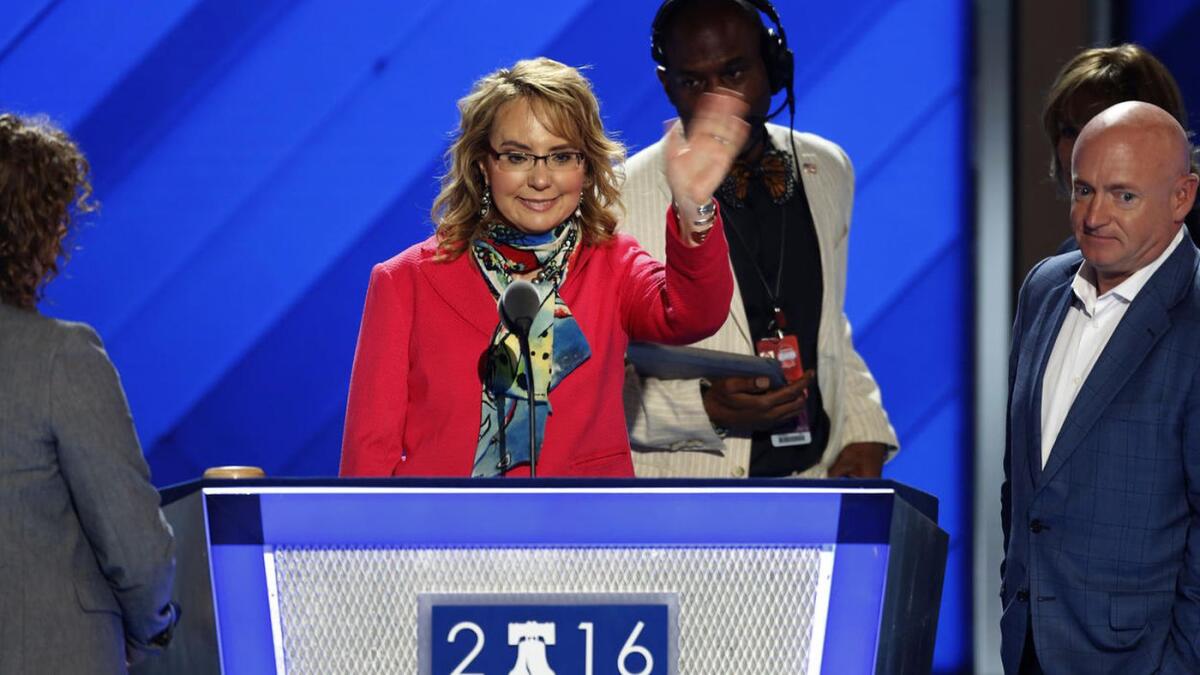
Former congresswoman Gabrielle Giffords and her husband, astronaut Mark Kelly, will endorse Lt. Gov. Gavin Newsom for governor on Friday.
Giffords was shot in the head while meeting with constituents in 2011. She and Kelly have become ardent gun control activists since her recovery.
Peter Ambler, the executive director of the Giffords’ Courage to Fight Gun Violence group, said the couple is endorsing Newsom because of his history of action on progressive causes, notably Proposition 63.
The initiative, which voters approved in 2016, outlaws the possession of ammunition magazines that hold more than 10 rounds, requires background checks for people buying bullets, makes it a crime not to report lost or stolen guns and provides a process for taking guns from people convicted of a felony.
“When we were deciding who to support for important offices like who’s going to be the next governor of California, we need somebody who’s going to have the courage to promote evidence-based policies that are actually going to save people’s lives,” Ambler said. “Gavin has illustrated that quality during his entire career.”
The endorsement is set to take place at 11:30 a.m. at a union hall in Los Angeles.
Giffords’ group has 82,000 active members in California.
DACA supporters rally outside California governor debate at UCLA
Attorney, Air Force veteran is latest Democrat to enter race in Issa’s 49th District
California proposal could be a fix for banks reluctant to handle cash from pot shops

Just weeks after California began licensing marijuana sales, a state lawmaker on Thursday proposed legislation to allow financial institutions to handle money from cannabis businesses.
Because marijuana remains an illegal drug under federal law, federally insured and regulated banks have refused to conduct transactions with firms profiting from the drug.
That has state officials worried about robberies and other crimes as hundreds of state-licensed marijuana business are forced to conduct many transactions, such as paying taxes, with large amounts of cash.
Sen. Bob Hertzberg (D-Van Nuys) introduced a bill that would give a new state charter to financial institutions that are not federally insured to issue certified checks and handle payroll for marijuana workers licensed by the state.
Institutions would also be able help cannabis firms pay their state and local taxes and rent.
“Proposition 64 allowed legalized recreational marijuana in the state, but did nothing to address the lack of financial services available to this industry,” Hertzberg said in a statement. “These businesses handle significant economic activity, yet they are forced to operate under the table and with little government oversight, as if they’re a black-market operation.”
The measure was drafted in collaboration with Board of Equalization member Fiona Ma.
State Senate panel votes to extend Sen. Tony Mendoza’s leave of absence until harassment investigation is completed
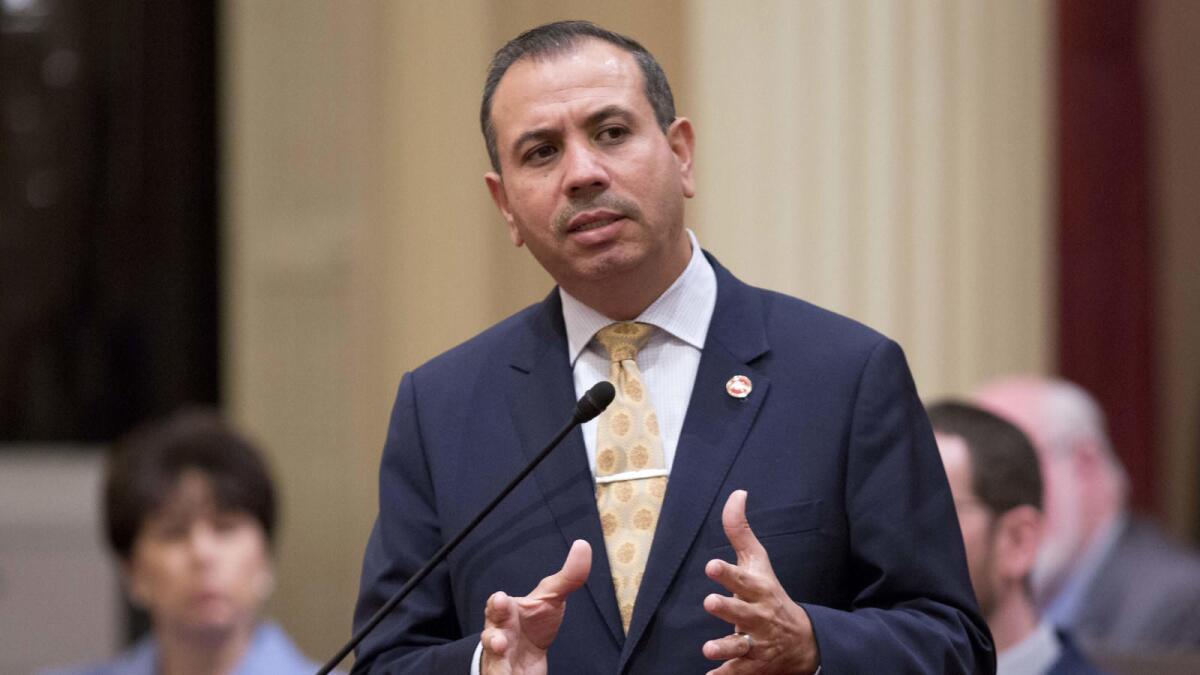
A state Senate panel voted unanimously Thursday to extend the leave of absence taken by Sen. Tony Mendoza (D-Artesia) by up to 60 days to allow the completion of an investigation into sexual harassment complaints, even though the senator has not agreed to an extension beyond his planned Feb. 1 return date.
The bipartisan action by the Senate Rules Committee came after the full Senate voted 27-9 following a heated debate to grant the rules panel the power to extend leaves taken by legislators.
Democratic senators said Mendoza should not be allowed to return to work next week before the investigation is completed because it would send the wrong message and be intimidating to women who work in the Capitol who have complained about him.
“We have a member who has been accused of very serious allegations and an outside investigation has been launched so as to ensure integrity to the process,” said state Sen. Benjamin Allen (D-Santa Monica). “That investigation is nearing completion, but its still underway.”
Mendoza is under investigation for allegations that he acted inappropriately with three female former aides, including an intern and Senate fellow. The senator has denied wrongdoing but agreed early this month — while facing a threat of being suspended — to take a leave of absence until Feb. 1.
The investigation by private attorneys hired by the Senate is not expected to be complete until mid-February and Mendoza’s Democratic colleagues do not want him to return to his job until the probe is finished. Senate Democrats have threatened to vote to suspend Mendoza if he tries to return to work before the probe is ended.
“I am disappointed at the Senate’s action today,” Mendoza said in a statement after the vote. “The ad-hoc action today is now part of the pattern that contradicts the Senate’s commitment to reform and to an open, transparent and fair process as its action today was adopted without any notice to me.”
Mendoza stirred things up by having a letter delivered to the Senate just before the session that criticized a “dearth of leadership” by the Senate leadership that he said has led to his unfair treatment.
Mendoza was noncommittal about extending the leave but left open the possibility.
“If the body feels that it would increase the positive public perception of the investigation, the issue should be addressed with me directly before the leave expires,” Mendoza wrote.
In a statement after the vote, he cited his proposal for direct talks, adding “ I stand by my offer.”
Sen. Joel Anderson (R-San Diego) opposed the rule change, saying it could be abused in the future and bypasses a policy that allows senators to be suspended with a vote of the house.
“If you extend a leave of absence against the wishes of the member that’s not a leave of absence, that’s a suspension, and under Prop. 50 it needs to come to this floor and we all need to vote on it,” Anderson said.
Sen. Jeff Stone (R-Murrieta) said the vote shows the Democrats were putting one of their own and their supermajority ahead of the interests of women who were sexually harassed.
“SR 79 is offensive,” Stone said. “It gives a senator an extended paid vacation while allegations of sexual harassment are being investigated by this body.”
Senate leader Kevin De León called Stone’s comments “undignified” while Allen called on Republicans who are seeking to expel Mendoza to support an immediate expulsion of President Trump, who he said “has been accused by many more women of more serious sexual misconduct.”
Republican Sen. Anthony Cannella of Ceres supported the rule change and the extension.
“We all are doing our very best to get through this dark time so we can deal with this investigation and other investigations,” said Cannella, who joined most of the Democrats in voting for the rule change.
Updated at 4:25 pm to include statement on vote by Mendoza.
San Diego County supervisor is latest Republican to vie for Issa seat
Following devastating wildfires, Gov. Jerry Brown will examine forestry policies

A new task force of scientists and forestry experts will “review thoroughly the way our forests are managed and suggest ways to reduce the threat of devastating fires,” Gov. Jerry Brown announced in his State of the State speech Thursday.
Brown cited California’s growing severity of wildfires — eight of the state’s most destructive have occurred in the last five years — and the effects of climate change as driving the need to develop new forestry policies.
The governor said the task force also will examine how the state can increase resiliency and carbon storage capacity in forests.
“Trees in California should absorb CO2, not generate huge amounts of black carbon and greenhouse gas as they do today when forest fires rage across the land,” Brown said in his speech.
When Brown announced his proposed state budget earlier this month, he included a significant uptick in funding for firefighting capability, continuing a years-long effort at spending more on fire prevention.
Progressive PAC Democracy for America endorses Katie Porter in race against Rep. Mimi Walters
After final State of the State speech, Gov. Brown takes his time
Gov. Brown applauds U.S. Senate Republicans who voted against Obamacare repeal
Governor vows to protect state’s gas tax hike
Gov. Jerry Brown thanks and takes swipe at President Trump during his State of the State speech
Gov. Jerry Brown getting ready to begin his final State of the State speech